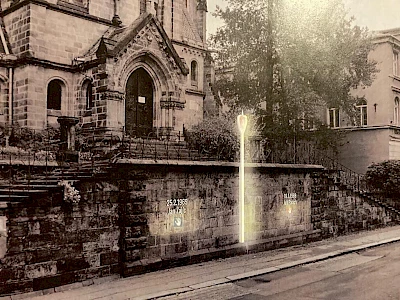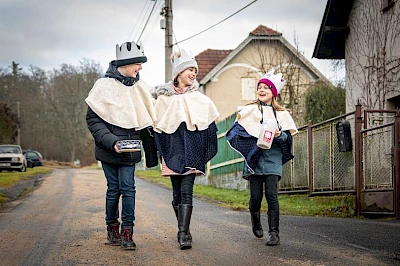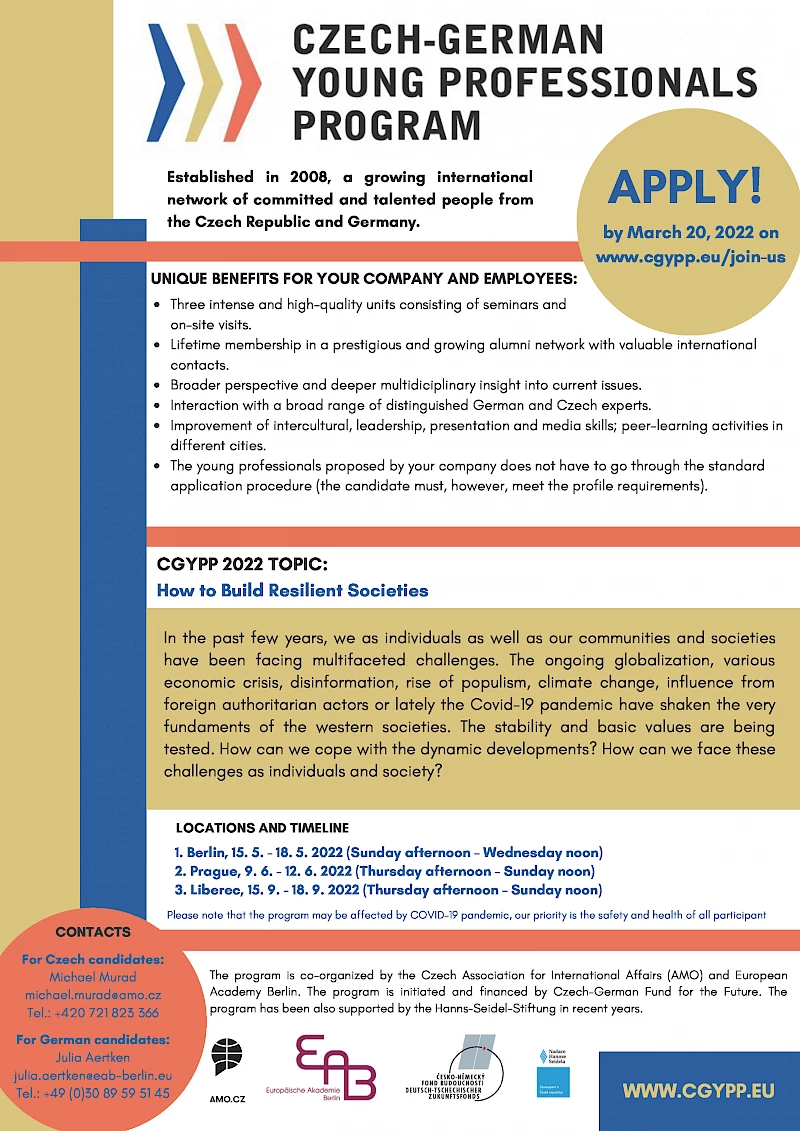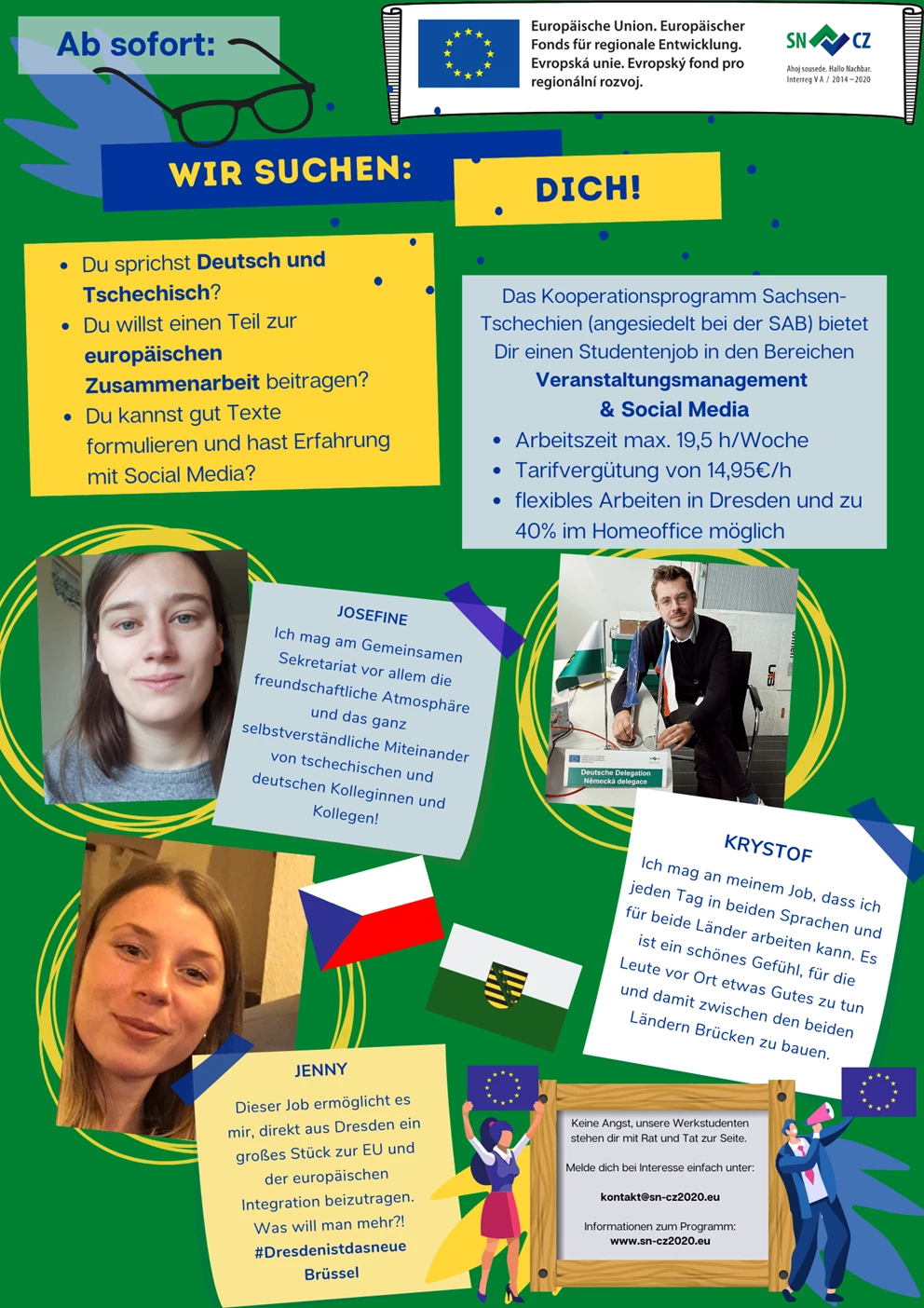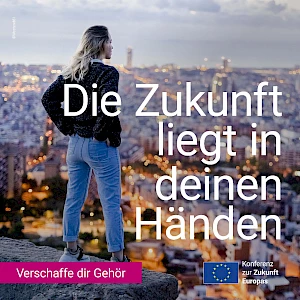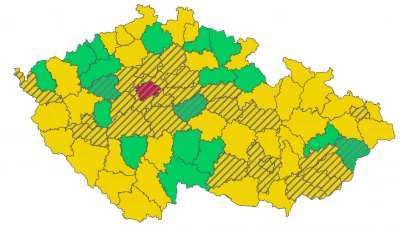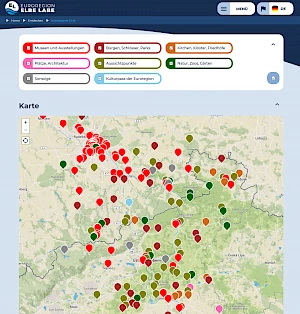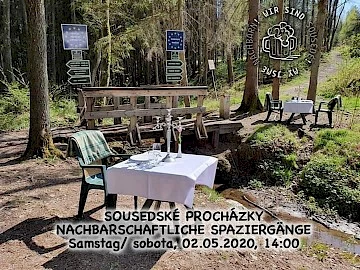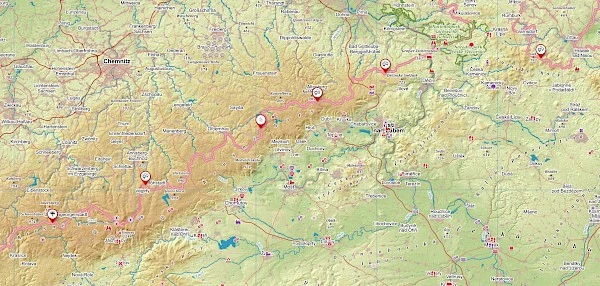News
October 2025
Elbfähre startet endlich im November
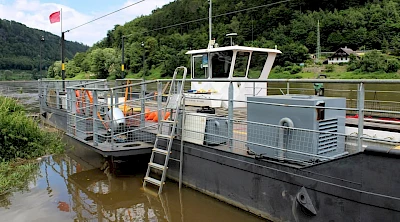
Ursprünglich sollte die Elbfähre zwischen dem Dorf Dolní Žleb (Niedergrund) und der Staatsstraße 62 zwischen Děčín und Hřensko schon im Oktober wieder starten. Nun hat es doch etwas länger gedauert. Nach über einjähriger Zwangspause nimmt die Fähre nun an diesem Samstag (1. November) wieder Fahrt auf. Der neue Betreiber der Gierseilfähre setzt täglich von 8-18 Uhr über. Zwischen 12 und 13 Uhr ist Mittagspause. Lediglich bei Hoch- oder Niedrigwasser wird der Fährbetrieb ausgesetzt. Das soll künftig durch ein Fähnchen sichtbar sein. Weht die tschechische Nationalfahne, ist die Fähre in Betrieb, weht eine rote Fahne, ist kein Fährbetrieb möglich. Man soll den Fährmann auch durch eine Klingel herüberrufen können. Angetrunkene Personen können übrigens von der Mitreise mit der Fähre ausgeschlossen werden.
Der Fährbetrieb erleichtert den Menschen, die in Dolní Žleb leben, die Reisemöglichkeiten. Mit der nächsten Stadt Děčín ist das letzte Dörfchen am linken Elbufer auf tschechischem Staatsgebiet nur über die Eisenbahn sowie eine enge Straße verbunden, die schon bei leichtem Hochwasser gesperrt werden muss. Aber auch Touristen sind eifrige Nutzer der Fähre.
Für eine Überfahrt zahlen Erwachsene ab 15 Jahre 30 Kronen (1,25 Euro), Kinder bis einschließlich 14 Jahren zahlen nur die Hälfte. Die Querung mit dem Fahrrad kostet 50 Kronen (2,10 Euro) und mit dem Auto 100 Kronen (4,20 Euro).
Museum Varnsdorf wird saniert
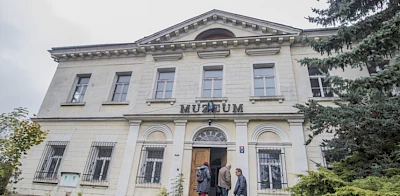
Die Sanierung war überfällig. Seit Mitte Oktober wird am Museum in Varnsdorf gearbeitet. Im Zuge der Sanierung erhält der Hof des Museumsgebäudes eine Überdachung. Der Raum darunter wird künftig der zentrale Ort, an dem Kulturveranstaltungen stattfinden können. Außerdem erhält das Gebäude einen Aufzug, damit alle Etagen barrierefrei zugänglich sind. Weiter werden die Toiletten saniert und der Eingangsbereich. Auch der Bereich außerhalb des Museums verändert sich. Erneuert werden Fußwege, Grünpflanzen sowie Eingangstreppe. Das Museum ist für die Zeit der Sanierung in den Kinder- und Musikbereich der Stadtbibliothek gezogen. Die Sanierung soll im Herbst 2027 abgeschlossen sein.
Das Museum Varnsdorf ist eine Zweigstelle des Gebietsmuseums in Děčín, das übrigens auch gerade saniert wird.
Das Museum in Varnsdorf entstand 1902, musste allerdings oft umziehen, ehe es in den Jahren 2009/2010 in das Gebäude zog, das nun saniert wird. Zur Sammlung des Museums gehören Exponate aus der Geschichte der Textilproduktion, wertvolle koptische Stoffe sowie ein Teil des Nachlasses der sorbisch-tschechischen bildenden Künstlerin und Werbegestalterin Hanka Krawcec.
EU finanziert Batteriezüge
Spätestens ab 2032 sollen auf drei Regionalstrecken des Bezirks Ústí Batterie betriebene Züge eingesetzt werden. Dafür hat der Bezirk Ústí fast 2 Milliarden Kronen (83 Millionen Euro) aus dem Programm TRANSGov zugesprochen bekommen. Das Vorhaben betrifft die Strecken Osek-Most-Louny-Rakovník, Žatec-Louny-Lovosice-Ústí nad Labem sowie Ústí nad Labem-Děčín-Česká Lípa-Liberec, also auch zwei, die in die Nachbarbezirke Mittelböhmen und Liberec reichen.
Die Fördermittel decken 70 Prozent der Gesamtkosten. Der Bezirk plant nun eine Ausschreibung für die Lieferung der Züge.
Tschechisch-Deutsche Kulturtage eröffnet
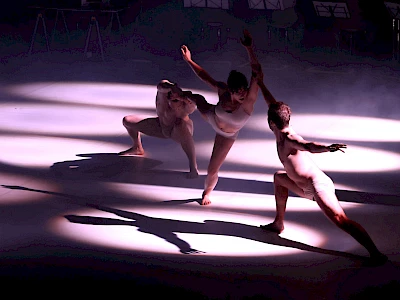
Im Festspielhaus Hellerau wurden am Donnerstagabend die 27. Tschechisch-Deutschen Kulturtage feierlich eröffnet. Gut 400 Gäste erlebten im Europäischen Zentrum der Künste eine mitreißende Vorstellung des Prager Orchesters für zeitgenössische Musik BERG und der ebenfalls aus Prag stammenden Tanzkompanie 420PEOPLE. Sie führten das Stück INspiraCe des Komponisten Tomáš Reindl in einer Choreographie von Sylva Šafková auf.
Zuvor hatten die Präsidentin der Euroregion und Kulturbürgermeisterin der Landeshauptstadt Dresden Annekatrin Klepsch und der frühere Botschafter der Tschechischen Republik in Deutschland und heutige Direktor der Abteilung Mitteleuropa im tschechischen Außenministerium Tomáš Kafka in zwei bemerkenswerten Reden die Bedeutung der Kultur und Meinungsfreiheit in der Demokratie und der grenzübergreifenden Zusammenarbeit gewürdigt.
Bis zum 16. November finden auf beiden Seiten der Grenze, in Dresden und Ústí nad Labem, sowie in weiteren Kommunen über 100 Veranstaltungen fast aller Genres in verschiedensten Formaten statt. Einen Überblick über das vollständige Programm der Tschechisch-Deutschen Kulturtage findet sich auf der Webseite des Festivals.
Next week, Czech Film Wednesday once again overlaps with the Czech-German Culture Days. We have picked out a special gem that has probably never been shown in Germany: "Černí baroni" (The Black Barons) from 1992, a cult comedy that was later turned into a TV series, which somewhat overshadowed the film. But it didn't deserve that.
The members of the so-called auxiliary technical battalions (PTP), which formed a special component of the Czech "People's Army" in the 1950s, were known as the Black Barons. Black was the color of their epaulettes, and they were called barons because they were the only full-time soldiers at the time who had money, as they received part of their pay in cash.
The social composition of these units was interesting: On the one hand, conscripts were assigned to the "Pétépaks" (PTP-lers) because of a physical deficiency, such as "chest weakness", but also the politically unreliable editor of the racing magazine or an assistant director. On the other hand, there were also people with a criminal past or for racist (Roma) or classist (former nobility) reasons. Like the "Pétépaks", their commanders, who were generally characterized by exceptional stupidity, were similarly low in the military hierarchy.
We have again scheduled two performances, of which the one at 8 p.m. is already as good as sold out. Tickets are still available for 5.30 pm.
More about the movie and tickets
(This is an automatic translation by DeepL Translator.)
Gericht weist weitere Klage gegen Neubaustrecke ab
Das Bezirksgericht in Ústí nad Labem hat eine Klage der Gemeinde Přestavlky bei Roudnice nad Labem (Raudnitz) sowie weiterer Gemeinden gegen den Bezirk Ústí wegen des Trassenverlaufs der geplanten Hochgeschwindigkeitsstrecke für die Eisenbahn von Prag nach Dresden abgewiesen. Die Gemeinde beklagte vor Gericht das Fehlen einer Studie, welche die Auswirkungen nicht nur der Bahnstrecke an sich, sondern auch des geplanten Terminals bei Roudnice dokumentiert. Die Gemeinde räumt ein, dass die Fahrzeit von nur noch 19 Minuten nach Prag möglich werde, aber eben das können auch ein Problem werden: "Zwischen dem reichen Prag und einer Region, die sich am anderen Ende der ökonomischen Möglichkeiten befindet, würden dann nur noch 19 Minuten liegen", so der Vertreter. Doch der Bezirk habe sich mit seiner Entscheidung nicht mit dem eigentlichen Bau, sondern nur mit dem Trassenverlauf befasst, so die Argumentation des Gerichts.
Während das Gericht die Klage zurückwies, hat der Bezirk die Kommunikation mit den Gemeinden verstärkt. Das erkennen auch die Gemeinden an. Nach den Bezirkswahlen im vergangenen Herbst habe sich der Umgang seitens des Bezirks um 180 Grad gewendet. "Die Neubaustrecke kommt. Jetzt geht es aber darum, sie im Einklang mit der Landschaft und der Natur zu bauen", wird ein Vertreter in der Tageszeitung Mladá fronta Dnes zitiert. Der Bezirk erwägt wiederum die Beauftragung einer Studie über die Auswirkungen.
Das Gericht in Ústí befasste sich nicht das erste Mal mit der Neubaustrecke. Zuvor hatten bereits die Kleinstadt Chlumec sowie Gemeinden bei Litoměřice gegen die Trasse geklagt. Auch diese Klagen wurden abgewiesen. Die Gemeinden kündigten weitere rechtliche Schritte an.
Die Neubaustrecke befindet sich weiter in der Phase der Planung und vor allem Genehmigung. Der Baustart ist für 2028 zuerst für das Teilstück zwischen Prag und Litoměřice und dem Erzgebirgstunnel vorgesehen. Später folgen die anderen Abschnitte. 2045 soll die gesamte Strecke fertig sein.
Hřensko geht gegen Ramschhändler vor
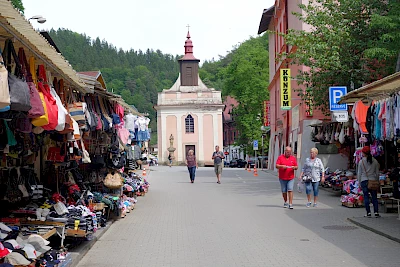
Der Grenzort Hřensko (Herrnskretschen) in der Böhmischen Schweiz geht gegen die Ramschbuden in seinem Ortszentrum vor. Die vor allem bei Touristen beliebten Buden sind dem Ort schon länger ein Dorn im Auge. Bisher waren aber alle Versuche, sie loszuwerden, gescheitert. Die Bürgermeisterin Kateřina Horáková hat aber offenbar einen Weg gefunden, einen Teil zu entfernen und den anderen zu reglementieren.
„Wir lassen die Grundstücke vermessen. Einige Buden stehen auf unseren Grundstücken“, so die Bürgermeisterin im Tschechischen Rundfunk. „Wo die Messungen ergeben, dass die Bude auf öffentlichem Grund steht, muss sie abgerissen werden“, kündigt die Bürgermeisterin an. Sie rechnet mit ungefähr sieben Ständen, bei denen das der Fall ist.
Außerdem arbeitet die Gemeinde an einer neuen Marktordnung. Die soll regeln, dass die Buden einheitlich aussehen und mit ihrem Aussehen dazu beitragen, dass die Ortsmitte malerisch wirkt.
In den Buden wird überwiegend billige Ware in zweifelhafter Qualität aus Fernost angeboten. Regelmäßige Kontrollen zeigten außerdem, dass es sich oft um gefälschte Markenware handelt. Auch Stücke sind mit faschistischem Hintergrund sind häufig zu finden. Zudem entdeckten Zöllner und die Polizei in den Buden und Lagern, dass die Händler dort auch Drogen verticken. Die Kunden sind in der Mehrheit Touristen aus Deutschland.
Zoo Ústí eröffnet Gibbon-Wald
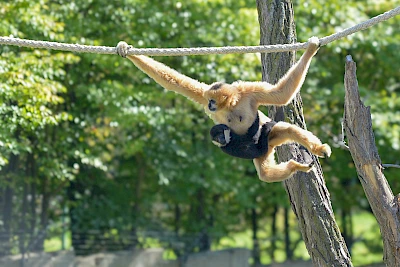
Der Nördliche Weißwangen-Schopfgibbon bekommt im Bergzoo von Ústí nad Labem (Aussig) ein neues Zuhause. Am Samstagmittag wird das neue Gehege, der sogenannte Gibbonwald, eröffnet. Das Gehege wurde in den letzten Monaten mitten im Areal errichtet, wo eigentlich die Sika-Hirsche leben. Dort befindet sich ein Wäldchen, besagter Gibbonwald, der nun den Primaten als Heimstätte dient. Außerdem entstand ein Gebäude, wo die Menschenaffen von Pflegern behandelt werden können. Dazu wurden zwei Fütterplattformen errichtet. Das ist für Zoogäste attraktiv, da man die Gibbons dort nämlich gut sehen kann. Das Wäldchen wiederum bietet Schutz vor den Besucherblicken. Der Zoo wird kommentierte Fütterungen anbieten, bei denen die Gibbons gut beobachtet werden können. Für die Zukunft plant der Zoo im Wald die Aufstellung von Kameras, um ihnen online zuschauen zu können.
Der Gibbonwald ist ein erstes größeres Projekt im Zoo, dem in Zukunft noch weitere ambitionierte folgen sollen. Vor allem geht es um eine angemessene Unterbringung der Tiere, die in einem Teil der Pavillons heute nicht mehr gegeben ist. Der Zoo musste deshalb auch einige Tiere wie Elefanten abgeben. Der alte Pavillon der Gibbons, wo auch andere Affen untergebracht waren, wird abgerissen. An der gleichen Stelle sollen in Zukunft das große Gehege "Kongo-Urwald" entstehen.
Glocken für Verneřice
In Verneřice läuteten erstmals nach über 80 Jahren wieder die Glocken. Die hiesige Annenkirche wurde mit vier neuen und zwei historischen Glocken ausgestattet. Die Glockenweihe am vergangenen Samstag nahm der Bischof von Litoměřice (Leitmeritz), Stanislav Přibyl, vor. Die Glockenweihe ist der Höhepunkt einer fast 20 Jahre währenden Rettung der Kirche.
Zu verdanken ist das vor allem dem hiesigen Pfarrverwalter Marcel Hrubý. Er ist im Gebiet um Děčín sowie in der Böhmischen Schweiz kein Unbekannter, denn dort hat er bereits über ein Dutzend Kirchen gerettet. Manche wie in Markvartice waren schon komplette Ruinen. Möglich war die Rettung nur durch geduldige Arbeit, viele freiwillige Helfer und vor allem viele Spenden. Im Fall von Verneřice spendeten sogar die Nachkommen der früheren deutschen Bevölkerung. Aber auch unter der tschechischen Bevölkerung im Ort kommt die Sanierung der Kirche gut an. Die Gemeinde stellte mehrere Hunderttausend Kronen zur Verfügung. Die größte Unterstützung kam mit 4,5 Millionen Kronen (185.000 Euro) vom Regionalministerium. Zu den Geldgebern gehört auch der Deutsch-Tschechische Zukunftsfonds. Eine besondere Ehre wurde Marcel Hrubý zuteil, der in diesem Jahr mit dem Preis des Bezirkshauptmanns ausgezeichnet wurde. Der aktuelle Bezirkshauptmann Richard Brabec ließ es sich nicht nehmen und wohnte auch der Glockenweihe bei.
Die vier neuen Glocken wurden im bayerischen Passau gegossen. Die eine historische Glocke stammt aus dem nahen Mukařov, die zweite läutete einst in Robeč.
Die alten Glocken der Annenkirche wurden in der Zeit der Ersten Republik der Tschechoslowakei (1918 bis 1938) angeschafft, als Ersatz der Glocken, die im Ersten Weltkrieg eingeschmolzen wurden. Sie ereilte das gleiche Schicksal im Zweiten Weltkrieg. Nach dem Krieg wurde die ursprünglich deutsche Bevölkerung nahezu vollständig vertrieben. Die Kirche stand in den 1970er Jahren kurz vor dem Abriss, so wie die Kirchen in der Umgebung in Valkeřice, Rychnov und Merboltice, die damals nicht wegen Baufälligkeit, sondern in erster Linie aus ideologischen Gründen abgerissen wurden. Am Ende wurde die Annenkirche doch verschont, da sie erst zwei Jahre vorher saniert worden war.
Rekordsammlung für Dana-Drábová-Rakete
Es brauchte gerade einmal einen Tag, bis die nötigen 12,5 Millionen Kronen (514.000 Euro) zusammenkamen. So viel kostet der bodengestützte Marschflugkörper Flamingo aus ukrainischer Produktion. Es hatten mehr als 8.000 Menschen gespendet.
Die tschechische Initiative Dárek pro Putina (Geschenk für Putin) hatte aufgerufen, für einen Flamingo zu spenden, der dann an die ukrainische Armee gegeben werden soll. Das besondere an dieser Waffe: Sie trägt den Namen von Dana Drábová, der Anfang Oktober verstorbenen langjährigen Chefin der tschechischen Atomaufsichtsbehörde. Drábová galt als vehemente Unterstützerin der Ukraine. Dass mal eine Rakete ihren Namen tragen würde, hatte die Initiative mit ihr schon länger vereinbart. „Nun kam es leider erst nach ihrem Tod dazu“, teilte die Initiative mit.
Die Spendenaktion wurde im Rahmen einer Gedenkveranstaltung in Prag für Dana Drábová ausgerufen, an der auch Präsident Petr Pavel teilnahm. Organisatoren der Gedenkveranstaltung waren neben der Initiative „Dárek pro Putina“ die Vereine „Post Bellum“ und „Havloids Memorial Club“.
Government formation delayed
The formation of a new government following the parliamentary elections in the Czech Republic has been delayed. After the election winner ANO had already reached an agreement with the two smaller parties Motoristé (Motorists' Party) and the right-wing populist SPD on the distribution of ministries a week ago, the process was slowed down at the beginning of this week. This was due to the personnel proposals of the Motoristé party in particular, which met with strong public rejection. For example, the motorists had proposed their honorary chairman Filip Turek for the Ministry of Foreign Affairs. However, the daily newspaper Deník N then published earlier posts by Turek on social media in which he made homophobic, xenophobic and openly racist comments. Some posts also glorified the Nazis.
Turek and his party leader Petr Macinka tried to give the impression that the quotes were not genuine. This also concerns Macinka himself, who is to become environment minister. Scientists and environmental organizations have already protested against this. Macinka is considered a close confidant of former President Václav Klaus, who denies climate change. Macinka had already announced that he wanted to rid the ministry of the "Greens", but Andrej Babiš, who is expected to be the next head of government, then asked the Motorists' Party to nominate non-party experts as ministers. The third partner, the SPD, had already announced similar plans. However, the Motorists' Party insists on appointing its own people.
Babiš has now drawn the conclusion and postponed the appointment of ministers. He announced that the future government would now first work on the program. This should be ready by the beginning of November. The constituent session of the new parliament will take place on November 3. Andrej Babiš has since conceded that the new government will probably not be sworn in until December.
However, Babiš also has to reassure people on other levels. A withdrawal from NATO or the EU, as demanded by the SPD in its election program, is out of the question. On Friday, he added that he also does not want to increase the budget deficit planned for 2026. The background to this is the decision by the outgoing government not to reintroduce the draft for 2026 to the new parliament. The draft had already been approved by the government and submitted to parliament before the elections. Sending the bill to the new parliament a second time is actually considered a formality. The government still in office had rejected this on the grounds that it did not want to be responsible for the spending increases announced by the ANO and SPD. However, this step would significantly delay the budget formation process and the Czech Republic would almost certainly start the new year with a provisional budget. In the meantime, however, President Petr Pavel has also spoken out in favor of re-submitting the prepared draft to parliament.
On the death of Ivan Klíma and Dana Drábová
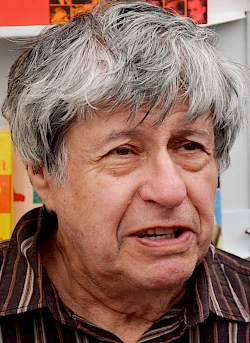
The Czech Republic is mourning the death of two great personalities. On October 4, the writer and playwright Ivan Klíma died at the age of 94. He was one of the most successful Czech authors, whose works have been translated into over 30 languages. Klíma spent 3.5 years in the Theresienstadt ghetto as a child. The National Socialists had turned the former garrison town into a transit camp from where Jews were deported to the extermination camps in conquered Poland. Klíma survived the ghetto and later joined the Communist Party, from which he was expelled in 1967 due to his critical stance. After the suppression of the Prague Spring, he was banned from publishing. His works could only be published in samizdat (self-publishing) in his home country, but were translated and published abroad. His novels published in German included "Der Gnadenrichter", "Meine ersten Lieben" and "Meine fröhlichen Morgen". Klíma was a signatory of Charta 77 and received numerous awards after 1989. Of the famous three "Ks" of the Prague Spring (Milan Kundera, Ivan Klíma, Pavel Kohout), only the 97-year-old Kohout is still alive, according to an obituary.
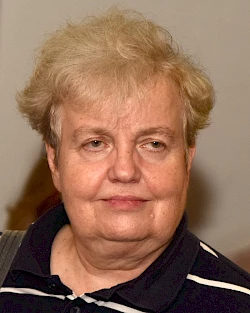
30 years younger than Klíma was the nuclear physicist Dana Drábová, who died on October 6 after a long illness. Until the end, she used her X account to report on the current radiological radiation situation in Ukraine, where one of the largest nuclear power plants is occupied by Russian troops. Drábová had been the director of the Czech Nuclear Supervisory Authority since 1999 and was also regarded abroad as a renowned nuclear expert. She served twice as a member of the Board of Governors of the International Atomic Energy Agency (IAEA). She was also Chairwoman of the Western European Nuclear Regulators Association (WENRA). She has also advised the Japanese government since 2018. Drábová played a key role in defusing the heated atmosphere, particularly between Austria and the Czech Republic, over the Temelín nuclear power plant, which was inaugurated in the early 2000s. In addition to her undisputed authority, she focused on maximum transparency and was also regarded as a respected authority outside the energy industry in the Czech Republic. She was active in local politics and repeatedly made political statements. At the beginning of 2023, for example, she openly supported the current President Petr Pavel in the election campaign against his rival Andrej Babiš.
Forest fire trial continues
The district court in Ústí nad Labem (Aussig) must once again deal with the arson trial against former volunteer national park ranger Jiří L. The Court of Appeal in Prague overturned the acquittal and ordered the trial to continue. Not all evidence had been exhausted. At the same time, it could not be ruled out that the arsonist of the large forest fire in the summer of 2022 was not someone else. The district court had acquitted Jiří L. due to a lack of evidence. Jiří L. had initially admitted to the arson, but then recanted his statement. In another trial, L. had been acquitted of arson of smaller objects in Bohemian Switzerland such as a raised hide, a barn and a chalet.
The devastating forest fire broke out at the end of July 2022 in Malinový důl in Bohemian Switzerland near Hřensko. The fire spread extremely quickly due to severe drought and stronger winds and even spread to Saxon Switzerland. The fire was only finally extinguished weeks later.
Prize for Czech Expo pavilion
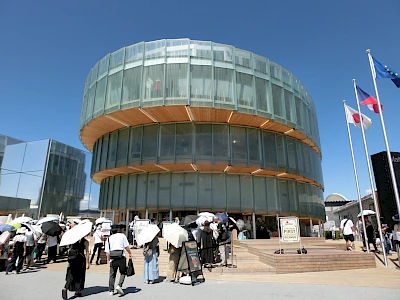
The Czech pavilion for the World Expo in Osaka has won the silver medal in the category for smaller pavilions with an exhibition area of up to 1,500 square meters. The International Bureau of Exhibitions (BIE), which awards the prizes, praised the building for its original architecture, which combines tradition, innovation and sustainability. The Expo ended on Tuesday in Osaka, Japan.
For the Czech Republic, it is the biggest success since the 1970 World Expo in Brussels, where the country, then still Czechoslovakia, scored in several categories, including design. This time, the pavilion attracted attention with its daring construction. The façade of the building, which widens towards the top, is made of glass. The core is made of wood.
Schäferwand has a restaurant again
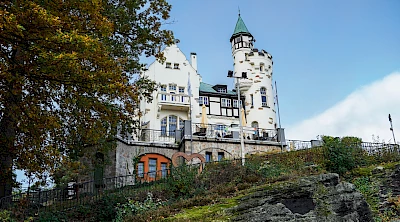
There is once again a restaurant on Pastýřská stěna (Shepherd's Wall) in Děčín. It opened in the small chateau, which towers over Děčín with its white façade. Popularly known as Nebíčko (Little Heaven), it is one of the town's most popular views. The Schäferwand is a striking rock in the middle of the city, which drops steeply to the left bank of the Elbe opposite the castle. The wall can even be conquered via via ferratas. There have been several restaurants in the castle in the past. However, the operators failed time and again. Most recently, there was a snack bar, but it was not open all year round. The building belongs to the city, which rents it out to the operating company Mountain development.
The building has been renovated in recent years. The new restaurant will officially open on Saturday. It will initially be open from Thursday to Sunday from 11 a.m. to 11 p.m., with the associated bistro only open at weekends. In the summer season, the operators expect the restaurant to be open every day. There is also a vacation apartment above the restaurant.
The most important Christmas tree in the Czech Republic
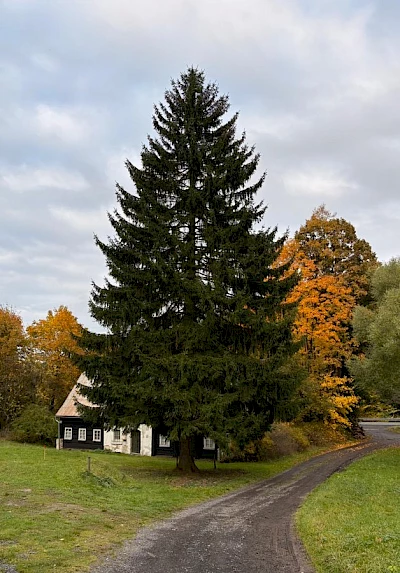
Every year, people eagerly await the Christmas tree that will be erected on the Old Town Square in the center of Prague. This year, the common spruce comes from the border region with Saxony, more precisely from the municipality of Jiřetín pod Jedlovou. The spruce stands on a private property. It would have had to be felled anyway because the 26-metre tree could pose a threat to the nearby log cabin in the foreseeable future. The tree is already 85 years old and its stability is no longer guaranteed due to the often damp subsoil. The root system has also spread far into the surrounding area, owner Rudolf Storczer told the daily newspaper Děčínský deník. The tree was planted by his father.
The owner was delighted that his tree was chosen to stand at the Christmas market on the Old Town Square. The selection also has the advantage that the municipal company Technologie hlavního města Prahy (THMP) will now take care of the felling and removal. They will have to shorten the tree by three meters and transport it to Prague during the night on 22 November and set it up at its destination.
This is the 15th time that Prague has held a public competition to find the Christmas tree for its most important Christmas market. The competition is open to entries from all over the country. The best chances are given to common spruces with a height of 23 to 25 meters, well proportioned and ideally located near a street.
The Christmas tree will be festively illuminated on November 29, the Saturday before the 1st Advent, when the Christmas market on the Old Town Square opens.
(This is an automatic translation by DeepL Translator.)
Results of the Czech parliamentary elections
Parliamentary elections were held in the Czech Republic on October 3 and 4. As a result, the previous government was voted out of office.
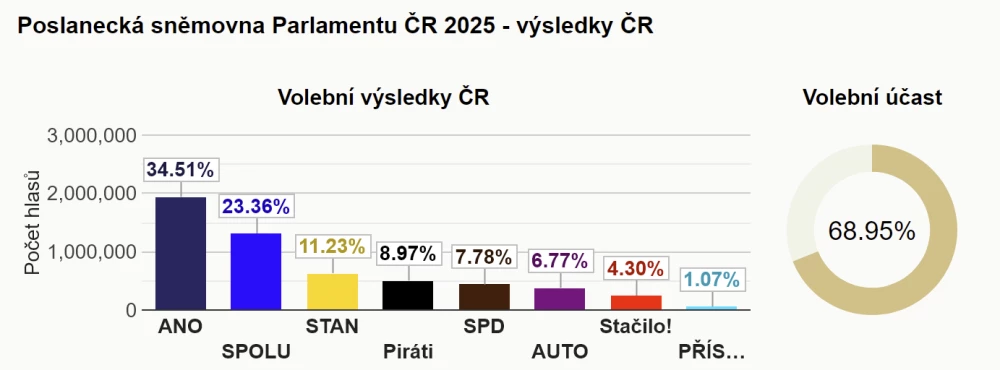
The clear winner of the election is the ANO party of billionaire Andrej Babiš, who was already head of government from 2017 to 2021. His party received 35% of the vote. The latest polls had predicted a result of around 30%, which is why it is assumed that voters from smaller parties have switched to ANO to ensure the current government is replaced. Babiš is currently in talks about forming a joint government with the right-wing populist SPD (Party of Direct Democracy), which achieved 8%, and the motorists' party Motoristé sobě (Motorists), which achieved 7%. Both were thus below the forecasts, meaning that they also appear to have lost ground to the ANO.
The previous governing parties, the conservative alliance SPOLU (23%) and the mayoral party STAN (11%), lost their majority. Until last year, the Pirates were also part of the government and this time they achieved 9%.
The Stačilo! alliance, which is dominated by the - only slightly modernized - communists of the KSČM and was considered a potential coalition partner of the ANO before the election (which already governed with the KSČM in 2018-2021), failed to reach the 5% hurdle with 4.3%. The Social Democrats of the ČSSD, who had disappeared into insignificance, were also accommodated there, which had been heavily criticized and led to a number of prominent party resignations. Before the election, Stačilo! was predicted to win around 7%, but many voters seem to have switched from this party to ANO.
The very high voter turnout of 69%, the highest since 1998, is pleasing. Voter turnout in the Czech Republic is often quite low, and the country is usually among the worst performers in European elections in particular.
The result was completely different for Czechs voting abroad: SPOLU won here with 39%, ahead of the Pirates (28%) and STAN (22%). The Ano party only achieved around 4%, the SPD and Motoristé sobě around 2% each. 37,654 Czechs cast their votes abroad, which corresponds to a voter turnout of 79%.
What can ANO, SPD and Motoristé expect?
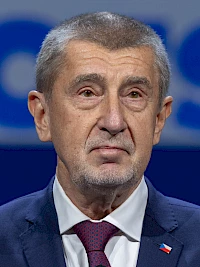
In the German and Western press, Babiš and the ANO were often lumped together with Orban, Fico and the FPÖ and it was feared that after his election victory, the Czech Republic would also join the fundamental opposition to the EU, particularly with regard to support for Ukraine. However, various commentaries in the Czech press do not see this danger. Although ANO would be a member of the "Patriots for Europe" group in the EU Parliament with various right-wing populist parties such as Fidesz, the FPÖ or the Rassemblement National, this should not be taken too seriously, as Babiš is above all a pragmatist. It is also emphasized that the ANO and the German AfD should not be equated, even if the latter was pleased with Babiš's election victory.
Unlike the aforementioned parties, the ANO has never focused on the issue of migration, for example. Membership of the EU and NATO are also absolutely not questioned. Babiš is seen as a politician who, like a businessman - which he actually is - looks above all at what goes down best with his "customers", i.e. the voters, and can easily adapt his political stance accordingly. This became very clear in the first year of the COVID pandemic in particular. He would not be a fundamental threat to democracy and the rule of law, but great care must be taken to separate his economic interests from political action. This is seen as the greatest danger, and President Petr Pavel has also clearly called for a legally secure solution for Babiš's separation from his Agrofert group and his media companies, which he has been promised. Babiš is expected to focus on socio-political issues such as the rising cost of living, pensions and energy prices. In his first term of office, he had already gained a lot of sympathy from this group of voters with a series of benefits for pensioners, for example.
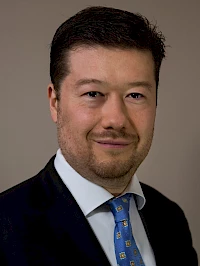
There are great fears regarding a change in Czech policy in support of Ukraine. The Czech ammunition initiative has greatly helped the country in its defense against Russia's invasion and has given the Czech Republic a lot of prestige. While Babiš was still talking about ending this initiative before the election, he is now emphasizing that, above all, no companies should be allowed to make excessive profits from it and that no money should be made available from the Czech state budget for this or for arms deliveries. This should be done via NATO or the EU. A blockade policy like that of Hungary and Slovakia was not to be expected.
With regard to the Czech Republic's relationship with Germany and the EU, commentators do not expect any major changes. Some even believe that the businessman Babiš gets on very well with Friedrich Merz and that he is particularly interested in good relations due to his business interests in Germany.
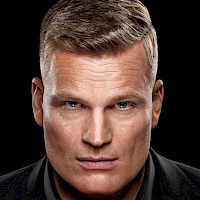
The ANO's exploratory talks with the SPD and Motoristé this week are intended to clarify, among other things, whether they will form a coalition or tolerate an ANO minority government. The differences between the two smaller partners are likely to play a key role in this. The Motoristé are essentially seen as an economically liberal party that advocates deregulation, privatization, lower taxes and state cuts. Membership of NATO and the EU is not an issue for them, even though the party has become big primarily through its criticism of the EU's Green Deal. The SPD, on the other hand, is at least a right-wing populist party that most closely resembles the AfD, with xenophobia and rejection of migration at its core. It is in favor of leaving the EU and has a critical relationship with the rule of law, which is why SPD leader Okamura's statements this week that he wants to become interior minister and immediately dismiss the police chief because he himself is under investigation were met with clear rejection even from future partner ANO. It is doubtful whether Babiš wants such an errant figure or party in his cabinet.
The first test for the new government will be the adoption of the budget. The draft was submitted by the previous government. The ANO and SPD want to increase the deficit it contains, while the Motoristé are against it.
Brabec remains Hejtman in Ústí
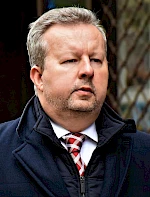
Richard Brabec from the ANO party, who was only elected hejtman of the Ústí district last year, has won a mandate in the parliamentary elections. It was already assumed last year that he would stand for election and there was speculation as to whether he would give up the post of hejtman after just one year(we reported). Now it is clear: he will renounce the mandate he won and remain hejtman in Ústí.
Goat track could be extended
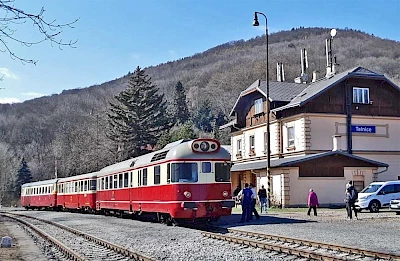
Back in July, we had to report that the so-called Goat Railway between Oldřichov u Duchcova and Krupka město had been placed on a list of lines to be closed by the Czech Railway Administration. The railroad can currently only run from Děčín to Krupka as tourist line T11(information and timetables here) and the renovation of the rest of the route was deemed uneconomical. It has now become known that the railroad administration has changed its position and is considering renovating the section of line. The district of Ústí, which is particularly keen on the tourist potential of the line, has made a strong case for this.
If you would like to receive our weekly review regularly in your email inbox, sign up for our newsletter.
To the newsletter registration
(This is an automatic translation by DeepL Translator.)
Zde je upravený překlad s použitím *"Bezirk Ústí "* místo "Region":
---
Overall result of the parliamentary election 2025 - Czech Republic*
- ANO - 34.57 % of the votes → 80 mandates
- SPOLU - 23.33 % of the votes → 52 seats
- STAN - 11.21 % of the vote → 22 seats
- Pirates - 8.94 % of the vote → 18 seats
- SPD - 7.79 % of the vote → 15 seats
- Motorists for themselves (AUTO) - 6.77 % of the vote → 13 seats
Results 2025 - Ústí (Ústí)* district
- ANO - 44.85 % of the votes → 7 seats
- SPOLU - 15.40 % of the votes → 2 seats
- STAN - 9.61 % of the vote → 1 mandate
- SPD - 9.13 % of the vote → 1 mandate
- Pirates - 6.96 % of the vote → 1 mandate
- Motorists (AUTO) - 6.79 % of the vote → 1 mandate
(This is an automatic translation by DeepL Translator.)
Long ride to Děčín Castle reopened
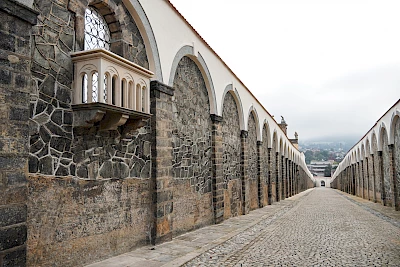
After two years of renovation, the driveway to the castle in Děčín has been reopened to visitors. The impressive ramp, known as the Long Drive due to its length of almost 300 meters, was one of the last parts of the castle that had not yet been renovated after decades of use by three different armies. The driveway was partially resurfaced. However, many of the sandstone slabs were reused on the sides. In addition, some historical elements were reinstalled or moved back to their original positions. A new balcony was inserted from the rose garden. The ornately decorated wrought-iron gate of the upper portal was also restored. In addition, a small chapel at the lower end was moved to its historical position.
The last part of the palace to be restored is the rose garden and the pavilion known as the Sala Terrena, which adjoins the western end of the rose garden. The city will then turn its attention to objects in the area surrounding the palace. These include the garden house in the south gardens and the Marienwiese.
Ústí restores first important tomb
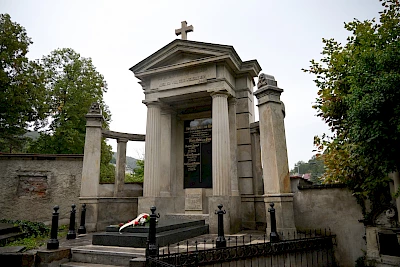
The city of Ústí nad Labem has restored the first of a series of architecturally valuable tombs. These are also graves of important personalities from the city's history. The grave of the von Wölfel family of entrepreneurs in the cemetery in Střekov fulfills both criteria. Alexander Edler von Wölfel was once the general director of the Association for Chemical and Metallurgical Production, today's Spolchemie plant in the middle of the town.
The city took over a dozen graves from the state last year, as no one had looked after them for a long time. The graves were therefore in need of restoration. The graves are of sentimental value to the city, which is why it is making money available for the restoration of the often magnificent graves. The restoration of the von Wölfels' tomb took just over half a year and cost 1.5 million crowns (61,000 euros). The tomb had to be stabilized, fitted with a new roof and the back wall renovated. The inscriptions were gilded and several sandstone elements were replaced.
D8 highway tunnel completely closed
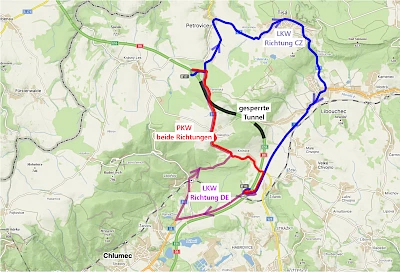
As in April and July, the D8 highway from Dresden to Prague is once again completely closed for a week from today just after the border. The reason is the renovation of the tunnels of the highway D8 shortly after the border (tunnel Panenská and tunnel Libouchec). Two different detour routes have been signposted. As up to 30,000 vehicles a day are usually counted on this section, traffic chaos is expected in the surrounding area, but after the experience of the closures the first two times, this is expected to subside after a few days.
Some of the possible roads to avoid the closure are very narrow. Two separate detour routes have therefore been designated for freight traffic (and buses): For journeys in the direction of the Czech Republic, you have to exit in Petrovice and then wind your way through Petrovice, Tisá and Libouchec to rejoin the highway at the Telnice slip road (no. or km 80). In the opposite direction, leave the highway at this exit and drive via Varvažov, Telnice and Nákleřov to the Petrovice slip road. The police will deploy a larger force to ensure that trucks and buses adhere to this regulation and that oversized vehicles avoid the area on completely different routes.
A shorter route is available for cars: After the Petrovice exit, turn right and drive via Nákleřov and Telnice, but then not to Varvažov, but by turning left after the sharp bend via Knínice to the Telnice slip road back onto the highway. This route works in both directions.
As soon as the work on the tunnels is completed, traffic will be reopened on October 8. This will also mark the end of the tunnel renovation work that has been ongoing since spring. It was the first major renovation since the new highway was built. After the refurbishment, car drivers are now allowed to drive at a maximum speed of 100 km/h in the tunnels. Previously, the speed limit was 80 km/h, which is well worth adhering to as the speed is measured in the Panenská tunnel.
(This is an automatic translation by DeepL Translator.)
September 2025
The closure will last from October 2 to 8. The Panenská and Libouchec tunnels will be completely closed and undergo a comprehensive renovation and modernization of the data networks and technologies.
Source: https: //www.idnes.cz/usti/zpravy/dalnice-d8-tunely-modernizace-uzavirka-objizdky-policie.A250929_135951_usti-zpravy_grr
(This is an automatic translation by DeepL Translator.)
Close race in Czech elections
One week before the parliamentary elections, pollsters are predicting a tight race. The ANO party of former Prime Minister Andrej Babiš is still clearly leading the polls. However, according to all polling institutes, ANO is losing ground in the final stages and is now no longer above 30 percent. But the first runner-up, the governing coalition Spolu of Prime Minister Petr Fiala (ODS), is also losing ground in the polls and, unlike a few weeks ago, is now below 20 percent. In contrast, smaller parties are making gains, particularly the Pirates (almost 12 percent) and the Motorists (around 7 percent), while slight increases in the polls are also reported for the mayoral party STAN (almost 12 percent).
This means that ANO will almost certainly win the parliamentary elections, but will face a difficult time forming a government. On the one hand, this is due to the fact that seven alliances from no fewer than 13 parties now have a real chance of entering parliament. Added to this are the gains made by smaller parties. ANO would therefore have to include at least two, if not three, parties as coalition partners in the government. The right-wing populist party SPD has the best chances. Hopes are also pinned on the alliance Stačilo! (Enough is enough), which is based on the merger of the Communists and Social Democrats, and the Motorists.
Polling stations will open on Friday, October 3, at 2 pm. You can vote until 10 pm. Voting will then continue on the second day, October 4, at 8 am and end at 2 pm. We can therefore expect reliable election results on Saturday evening.
Teachers' salaries and pensions to rise
Teachers and pensioners in the Czech Republic can look forward to more money. From January, teachers' salaries are to rise by 7 percent. This has been agreed between the trade unions and Education Minister Mikuláš Bek. However, the government still has to give its approval. Other professional groups in the public sector can also look forward to higher wages. Salaries for firefighters are set to rise by 5 percent.
Teachers have been covered by a regular statutory pay rise for two years. This stipulates that their salary must be 130 percent of the average gross wage. In the second quarter of this year, this was 49,402 crowns, the equivalent of around 2,033 euros. The teacher's salary would therefore have to be around 2,650 euros by law.
Ferry in Dolní Žleb goes back into operation

After a break of almost a year, the car ferry in Dolní Žleb is back in operation. Passengers and vehicles are to be transported across the Elbe again from October.
The town of Děčín, to which the ferry belongs, had been looking for a new operator for almost a year. The last operator ceased operations in November last year. After two unsuccessful tender procedures, Děčín was successful after all. The new operator has already taken over the ferry.
The reason for the long search was, on the one hand, the strict conditions imposed on ferry operators, which are equivalent to those for skippers of inland cargo vessels. In the meantime, the Czech Republic has succeeded in softening these strict conditions for ferrymen. But one reason was also money. While the last operator was still available for 300,000 crowns a year, the new operator charges 1.5 million crowns (almost 62,000 euros) a year. The contract runs for two years.
The ferry runs daily between 8 a.m. and 6 p.m., unless the water level is too high or too low. It is one of the last yaw rope ferries in the Czech Republic and is mainly used by tourists as well as locals. While the village of Dolní Žleb is located on the left bank of the Elbe, the ferry ends on the right bank at highway 62 from Děčín to Hřensko.
New cycle path from Česká Kamenice to Kamenický Šenov
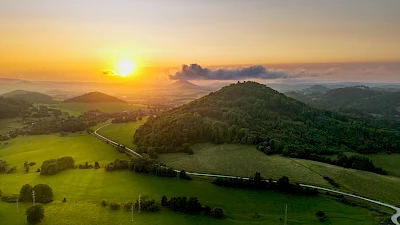
A new cycle path connects the two towns of Česká Kamenice and Kamenický Šenov. The route, which is designed not only for cyclists but also for inline skaters, now ensures greater safety. Until now, cyclists had to use the busy main road. At the same time, the route leads through the charming and protected landscape of the Bohemian Central Mountains. It was built along a railroad line and therefore also has a comfortable gradient.
The new cycle path is a joint project between the two towns, which was also supported by the districts of Ústí nad Labem and Liberec, as it crosses the border between the two districts. However, most of the money came from the state coffers. There is also a connection to another municipality with the branch to Prysk.
In Česká Kamenice, cyclists have a good connection to cycle paths to Stará Oleška or Kunratice and on to Všemily as well as to the Ploučnice cycle path. In Kamenický Šenov, however, the cycle path ends at the train station. However, there are already plans to continue at least as far as the Herrenfelsen (Panská skála) with its typical basalt organ pipes in the near future. Later, the cycle path is to be extended to Česká Lípa.
Fewer eight-year grammar schools
Two districts in the Czech Republic are planning to reduce the number of eight-year grammar schools. While the East Bohemian district of Hradec Králové wants to abolish some classes with eight-year grammar schools for the first time in the coming school year and replace them with four-year grammar schools, the Central Bohemian district has already started this and will continue with the project in the next school year.
In the Czech Republic, elementary school lasts five years. After that, for the first time, there is the option of switching to a so-called eight-year grammar school. A second option is to switch to the eight-year grammar school after seven years. However, most pupils switch to the Gymnasium after nine years, where they take the Abitur within four years. This last option is now to be strengthened in both districts.
The plans are primarily based on the recommendations of education experts. They see the disadvantage of early selection in the eight-year grammar school. In contrast, eight-year grammar schools are very popular with parents. Every year, there is a huge battle for the few places available, which also benefits specialized and not entirely cheap tutoring agencies that prepare the predominantly eleven-year-old primary school pupils for the demanding entrance exams.
North Bohemian winegrowers enjoy a good harvest
Winegrowers in the traditional winegrowing regions on the slopes of the Elbe around Litoměřice and Roudnice are facing an average, if not slightly above-average harvest this fall. Everything now depends on whether the harvest is not affected by too much rain in the last few meters. One way or another, however, this year's problem will not be the same as last year. Back then, a large part of the harvest was destroyed by late frosts in spring, similar to Saxony.
(This is an automatic translation by DeepL Translator.)
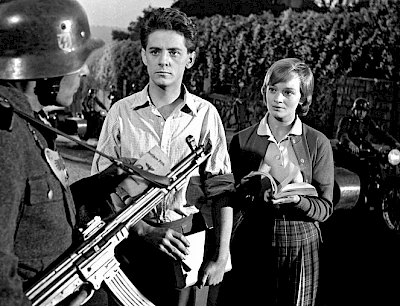 On October 1, there will be another Czech Film Wednesday at Zentralkino Dresden, this time with the impressive drama "Vyšší princip" (The Higher Principle) from 1960, which is the second most popular Czech film of all time (behind Pelišky).
On October 1, there will be another Czech Film Wednesday at Zentralkino Dresden, this time with the impressive drama "Vyšší princip" (The Higher Principle) from 1960, which is the second most popular Czech film of all time (behind Pelišky).
The film is about the pupils of a small-town grammar school in 1942, shortly before their final exams. After the successful assassination attempt on Reich Protector Heydrich, Nazi terror breaks out and people are executed by the dozen. Three of his classmates are arrested following the denunciation of the son of a well-known collaborator. One of their teachers, who actually prefers to live in the world of the classics and quote Seneca rather than deal with the here and now, is shocked by this and bravely tries to save the three of them.
In a way, the 1960 film is an example of the transition from the largely propagandistic filmmaking of the 1950s to the greater freedom of the 1960s, which led to the Czechoslovak New Wave, among other things. More differentiated characters instead of woodcut-like characters and the depiction of the German occupation in more facets are evidence of this. Nevertheless, the depressed atmosphere of the time can be felt very well.
We have only scheduled one performance at 8 pm this time. So you may have to hurry to get tickets.
More about the movie and tickets
(This is an automatic translation by DeepL Translator.)
After 88 years: Masaryk's last words
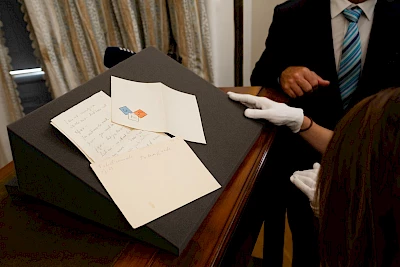
Almost 90 years after the death of the first President of Czechoslovakia, Tomáš Garrigue Masaryk, his last words have been published. They were contained in a sealed envelope, which was opened on Friday in the presence of President Petr Pavel and Masaryk's great-great-grandson Tomáš Kotík at the Czech presidential summer palace in Lány. Historian Dagmar Hájková then read excerpts from the five-page letter, which was written in English and translated directly into Czech. In it, Masaryk assumes that he will soon die due to his state of health and describes his ideas about his funeral. He also commented on his compatriots ("Our people are all right if they keep calm."), on the far-right Slovak politician Andrej Hlinka ("He is a blockhead because of his politics with the Hungarians. But we have to forgive him.") and about the strong German minority in the country ("The Germans should stay with us."). He also describes himself as no wiser. On the coexistence of Czechs and Germans, he said: "The Czechs are hard-working, the Germans have a certain honesty, but they certainly steal more." And he encourages people to keep talking: "If people are uneducated and stupid, you can't do anything with them. People like to be stupid. But don't make it easy for them: argue with them!" Masaryk urges.
Masaryk's son, diplomat and later Foreign Minister Jan Masaryk, wrote down the last words. The authenticity of the letter was confirmed on the spot, but it is not yet certain when it was written. It may indeed have been dictated in the last days before Masaryk's death on September 14, 1937, but it may also have been written during an earlier phase of a serious illness in 1934, when Masaryk was still president. At the end of 1935, he had resigned from office prematurely after being re-elected for another seven-year term in 1934 at the age of 84. Historians have also pointed out that Masaryk tended to use simple sentences when dictating due to his state of health.
Jan Masaryk gave the envelope with his father's last words to his secretary Antonín Sum, who managed to send the envelope to Masaryk's former secretary Lumír Soukup in Great Britain after the violent communist takeover in February 1948. Jan Masaryk died in March 1948 of unexplained causes. It can be assumed that he was either thrown out of the window of his official residence on behalf of the new communist rulers or was forced to commit suicide.
Soukup returned to Czechoslovakia in 1991 and handed the last words back to Antonín Sum, who had remained in Czechoslovakia. In 1996, Sum, together with Masaryk's grandchildren, came to the conclusion that it was still too early for publication. A year before Sum's death, he gave the envelope to the National Archives. In the meantime, he had sealed the envelope with the proviso that it would not be opened until 20 years after it was handed over.
New plans for the last lignite shaft
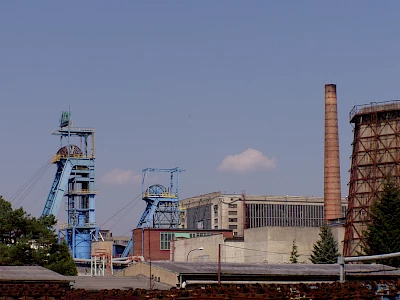
It was the last lignite mine in the Czech Republic. Nine years ago, the "Centrum" shaft near Most was closed. This marked the end of the last chapter of underground lignite mining in the Czech Republic. After nine years, a new era is now beginning for the site. The Ministry of Culture had previously allowed the owner, the mining company Sev.en, to demolish the majority of the buildings. Almost all of the buildings were stripped of their monument status, with the exception of a winding tower and a system that took miners to the depths and back and also transported coal. This installation is to be exhibited at the Most Mining Museum in future.
Demolition work is due to begin this year. The site will then be developed for industrial use. A university laboratory for the production of green hydrogen is also planned. This is being developed in cooperation with the nuclear research center in Řež near Prague and the university in Ústí.
New arrival at Děčín Zoo
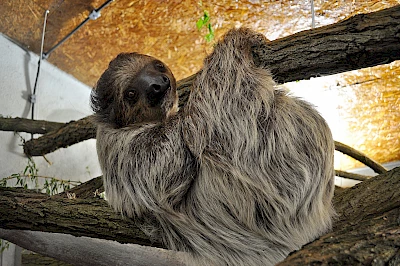
A sloth has been bringing joy to Děčín Zoo for a few weeks now. For the first time in its 76-year history, the zoo has managed to get a specimen of this species into its care. The former kangaroo house was converted for this purpose. The one-year-old female sloth came from Jihlava Zoo and, according to the zoo, has already settled in well.
But that is not the end of the story. They are planning to breed her and are still waiting for a suitable male. Until then, the zoo wants to prepare the outdoor enclosure for the sloth.
One year after the flood
One year after the devastating floods in the Czech Republic, the T.G. Masaryk Water Research Institute in Prague has estimated the damage at around 70 billion crowns (around 2.8 billion euros). However, this is not yet a final figure.
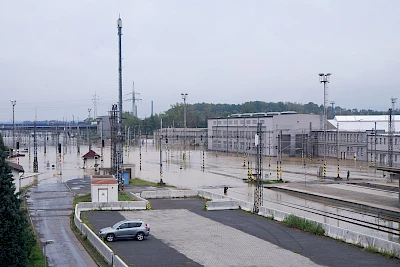
The heavy rainfall, particularly in the Moravian-Silesian Region and the Olomouc Region, caused severe flooding. The damage was limited, mainly thanks to the early warning system of the Hydrometeorological Office. However, as there were several heavy downpours, the ground was no longer able to absorb the water after the first ones. It was the last rainfall that caused the most serious damage. Without these, the flooding could have been at the level of a flood that only occurs every 50 years. However, more rain fell overall than during the last severe flood in Moravia in 1997.
The towns of Opava, Jeseník and Krnov were the worst affected, as was Ostrava, where the two major railroad stations (the main station and Svinov) were under water for days. However, the floods also caused serious damage in smaller communities in particular. A total of 400 detached houses and apartment buildings were affected. The greatest damage was caused to roads and water infrastructure. In many places, the damage is still visible today. In one year, only 20 percent of the damage could be repaired, especially in the smaller communities.
The willingness to donate in the country was exemplary. Non-governmental organizations collected almost 1 billion crowns (40 million euros) in donations alone.
Czech children eat too little fruit and vegetables
The Czech State Health Office recommends that children eat five child's-fist-sized portions of fruit and vegetables a day to ensure a healthy diet. However, only four percent of all children and their parents adhere to this recommendation. "Many parents think that two to three portions are enough," according to the latest report from the office. On the contrary, children often eat the wrong foods, preferring sweet drinks and flavored dairy products.
Another deficiency identified by the health authority is the lack of important minerals. Calcium is lacking across all generations. Magnesium deficiency is also visible in society as a whole, especially in women and senior citizens. The lowest levels were found in young women between the ages of 15 and 17. Half of women of childbearing age and half of children between the ages of 7 and 10 suffer from iron deficiency. Sodium, on the other hand, is consumed in abundance. The sodium levels of 91 percent of men between the ages of 15 and 59 were well above the norm.
The monitoring also examined the external influences on health and found negative effects from noise in particular, as well as air and water pollution. There was no information on whether the situation had improved or worsened. The results relate to long-term values.
(This is an automatic translation by DeepL Translator.)
A number of items were on the agenda at today's meeting of the Culture/Tourism/Local Recreation specialist group at the Kulturní centrum Řehlovice. But first, the group was warmly welcomed by Lenka Holíková and Veronika Krülle-Kotoučová and given a tour of the cultural center.
Afterwards, Mgr. et Bc. Jan Vondrouš, the new director of the Collegium Bohemicum, presented its work and plans for the future following the change at the top. It was noted with pleasure that the Collegium intends to become more involved in the Czech-German Cultural Days.
Ms Dudová from the company Uneeqly then presented the success of the digitization of the cultural pass of the Elbe/Labe Euroregion. Around 500 new users of the app with the digital pass are added every year.
Following a discussion on the further development of the Czech-German Culture Days, decisions were made on the support of smaller cultural projects from the specialist group's own budget. Three proposals were approved, but one was rejected. The projects supported are the Liquid Sound workshop in the Heymannbaude, the updating of the Elbe/Labe Euroregion museum portal and the translation of the ghetto-theresienstadt.de website into Czech.
(This is an automatic translation by DeepL Translator.)
National parks prepare new hiking trail across the border
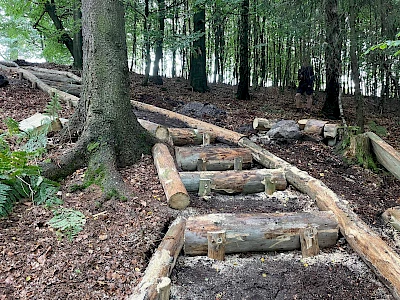
It is a small sensation. A new cross-border hiking trail will be opened between the Saxon Switzerland and Bohemian Switzerland national parks next spring. It will be the first new hiking trail to directly connect the two national parks since the Bohemian Switzerland National Park was established in 2000. However, the newly marked hiking trail is not a completely new trail. On the German side, it consists of already marked hiking trails and runs via Reitsteig and Fremdenweg to the Großer Winterberg, from there down the Winterbergstraße and across the Grenzweg and the border to the Czech Republic. There is also an existing trail here, known as the historic Promenade Trail, which runs above the Elbe and Kamnitz valleys (Kamenice).
In the future, the newly marked trail will also officially cross the Promenade Trail, but this is not yet possible for safety reasons. The Bohemian Switzerland National Park is therefore building a new spur trail up to Dlouhý roh (Long Horn) at a cost of 22,000 euros. From there, the trail leads along existing paths down into the Suchá Bělá valley and on to the road from Hřensko to Mezní Louka (Rainwiese), before turning off onto the Mlýnská cesta (Mill Trail) towards Mezná (Stimmersdorf) after a while.
The newly marked trail runs completely outside the quiet zone in the Czech Republic, which is why walking on it would already be permitted. You are not allowed to leave marked paths within the quiet zone. However, there are hardly any marked paths in the quiet zone on the Czech side. In Saxon Switzerland, on the other hand, hikers can use a dense network of marked hiking trails even in the quiet zone.
Reminders of vanished villages
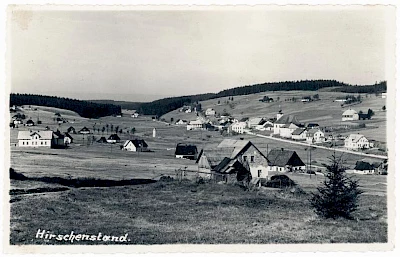
For the third year in a row, the Czech Republic is commemorating vanished villages on September 20. This year, the central ceremony will take place in Jelení (Hirschenstand) in the Ore Mountains.
Disappeared villages are primarily those that were depopulated by the expulsion of the German population after 1945 and were not repopulated afterwards. Many villages were located in the mountains with harsh climatic conditions that new settlers were often unable to cope with. At the same time, many workers were needed in the North Bohemian industry, which meant that the former German villages in the mountains were abandoned or not resettled at all.
Czechoslovakia also created a heavily guarded border directly in the border region, not only with West Germany, but also with the friendly GDR. As a result, many villages were razed to the ground. Another reason for the destruction of villages was the creation of restricted military areas, such as in the Doupovské Mountains, as well as the ongoing open-cast lignite mining and the creation of dams and reservoirs. A total of 2,400 places are said to have disappeared.
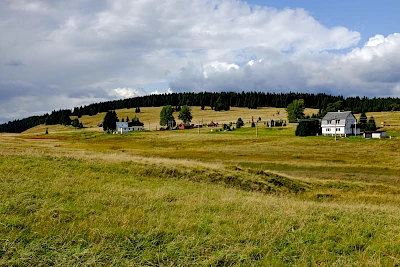
A young family has taken over one of the few remaining houses in Jelení (Hirschenstand) in the Ore Mountains and runs a cozy guesthouse with an alpaca farm. This family is also portrayed in the book "Mitten am Rande", which was published by the Elbe/Labe Euroregion 2021 together with the Czech association Antikomplex. The book is unfortunately out of print, but you can read the interview with Alice Janstová (and many others) online. You will learn a lot about the place and its surroundings and will be drawn there all the more.
To the interview with Alice Janstová
Next milestone for high-speed rail line
The Czech railroad administration has published the documentation for the first Czech section of the planned Prague-Dresden high-speed rail line. This involves the first section from Prague to the vicinity of Litoměřice. This section is generally considered to be the least problematic and, according to the plans, is to be built and completed first. It will be followed by the section through the Central Bohemian Uplands, which will be the last to be completed. The third Czech section is the one via Ústí nad Labem and through the Ore Mountains tunnel to the German-Czech border.
The environmental impact assessment process can begin with the documentation. This examines the impact of the construction project on the environment. Authorities, local self-governments, various organizations and also the affected public can participate in the process and raise objections that the railroad administration must refute or change its plans. Only once the environmental impact assessment has been successfully completed do the planning approval and building permit processes begin.
Although the railroad administration is making good progress, there are also risks in this first section. This is because one municipality (Hrobce) is still taking legal action against the route that was approved by the Ústí nad Labem district last year. So far, the legal action has been unsuccessful. The municipality now wants to appeal to the Constitutional Court.
North Bohemian rents on the rise
North Bohemia, and the Ústí district in particular, is one of the poorest regions in the Czech Republic. As a result, rents for apartments have tended to be moderate in the past. However, this has no longer been the case for the past three years. In cities such as Ústí nad Labem, Děčín, Litoměřice and Louny in particular, rents have risen by an average of 30 to 40 percent in the last three years. The daily newspaper Mladá fronta Dnes reports on cases in which rents have risen by half in some cases. For example, a young couple in Ústí used to pay 9,000 crowns (360 euros) for a 2+1 apartment (2 rooms plus kitchen and bathroom). Now they have to pay 12,000 crowns (480 euros), which for the couple means a full net salary for one of them.
In addition to inflation, the report also blames the influx of students in Ústí, in Děčín the proximity to Saxony (interesting for commuters) and in Louny and Litoměřice the proximity to Prague (also for commuters). Experts expect a further increase in the coming years, albeit at a slower pace.
In the Czech Republic, home ownership is much more widespread than in Germany. However, higher mortgage interest rates and stricter rules, particularly with regard to a higher equity ratio, have made access to home ownership much more difficult, especially for young people. They are mainly the ones who now live in rented accommodation without any prospect of home ownership.
Ten new Saxon-Czech projects approved
The small project fund in the Elbe/Labe Euroregion supports Saxon-Czech projects with up to 20,000 euros. The decision-making committee met today in the City-Wache in Dresden. It received 11 project applications, slightly fewer than hoped for. Funding amounting to €69,017.60 was approved for 10 applications. One application was rejected.
In contrast to the last meeting in June, this time there was only one sports project. Instead, the areas of culture and education, as well as social issues, were more strongly represented.
Five of the approved applications with a funding volume of €33,206.40 came from German applicants, and five applications with a funding volume of €35,811.20 also came from Czech applicants.
All information on the individual projects (including the rejected projects) can be found on the website of the Elbe/Labe Euroregion.
If you would like to receive our weekly review regularly in your e-mail inbox, please register for our newsletter.
To the newsletter registration
(This is an automatic translation by DeepL Translator.)
The steering committee for the small project fund in the Elbe/Labe Euroregion met today in the City-Wache in Dresden. With 11 project applications, it received slightly fewer than expected. Funding amounting to €69,017.60 was approved for 10 applications. One application was rejected.
In contrast to the last steering committee in June, only one sports project was included this time. Instead, the areas of culture and education, as well as social issues, were more strongly represented.
Five of the approved applications with a funding volume of €33,206.40 came from German applicants, and five applications with a funding volume of €35,811.20 also came from Czech applicants.
All information on the individual projects (including the rejected projects) can be found in the list of projects.
(This is an automatic translation by DeepL Translator.)
Experience Vorderzinnwald in a new way
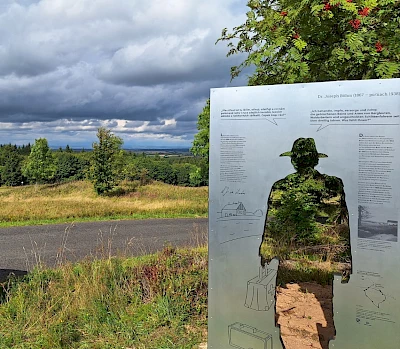
It has recently become possible to experience the former village of Vorderzinnwald near Fürstenau in a new way. The municipality of Dubí has replaced the outdated nature trail, whose boards you passed on the way to the Mückentürmchen, for example, with a modern nature trail.
It is approx. 2.5 km long and consists of 10 boards on which personalities tell short stories about various aspects of the former village. These include, for example, Queen Carola of Saxony, who talks about the chapel (which she was very involved in building), the teacher Němec, who talks about village life, and Dr. Böhm, the local doctor who gave the Doktorberg its local name. There are also people living today: Christa Knaute, the last living inhabitant of Vorderzinnwald, talks about the former inn run by her parents. And the Zinnwald local chronicler Wolfgang Mende talks about his grandfather, who tiled the roof of the chapel.
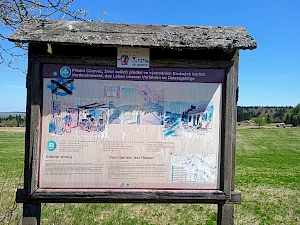
The 10 personalities are recognizable on the boards as silhouettes that you can look through. In addition to the short stories, there are also old photos. The educational trail also contains a wooden box with artifacts from the former village, e.g. shards or a pot. You can add your own finds to these. The trail has not yet been officially opened, but can already be visited.
At the same time, the war memorial that once stood next to the chapel was rebuilt in its original location. A torso of it and various stones were found in the rubble of the chapel and have now been used for the new memorial. Even the original metal plaque is there, but it is so rusty that the inscription is no longer legible.
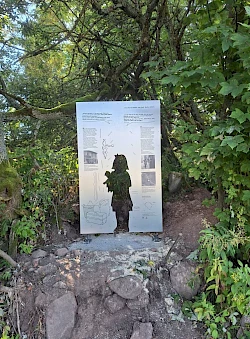
The concept for the nature trail was largely developed by the Ústav pro interpretaci místního dědictví ČR (Office for the Interpretation of Local Heritage) and, as you would expect in Vorderzinnwald, German scholar Jan Kvapil from Ústí nad Labem was very involved. The project was funded by the ČEZ Foundation and implemented by the municipality of Dubí. Jan Kvapil reports that next year the chapel's ground plan will be made tangible and possibly even a shelter will be built.
The Elbe/Labe Euroregion had the chapel virtually resurrected in 2022. You can find more information and a short video with beautiful aerial shots on our website.
Information and video about the virtual chapel
Prefabricated building in Chomutov evacuated
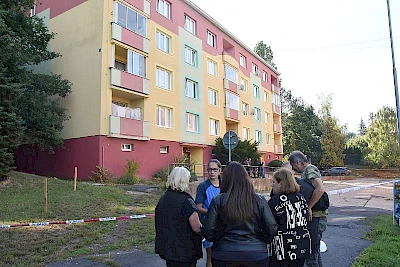
On Thursday night, a prefabricated building with two staircases in Chomutov (Komotau) had to be evacuated after sensors reported movements in the building and its stability was no longer secure. This affected 17 people. The city administration was aware of the problem. The cause could be found underground, where dryness is changing the clayey soil. For the time being, the stairways are no longer accessible.
Structural investigations were carried out on Thursday to check whether individual support measures could at least allow residents to return to their apartments for a short time to retrieve their personal belongings. This was promised for one staircase on Friday, but would be too dangerous for the other, reports Deník.
Czech municipalities and districts with surpluses
In the first half of 2025, municipalities and districts in the Czech Republic generated the second-highest surpluses since 1993, reports the Ministry of Finance. At around CZK 65 billion (approx. EUR 2.6 billion), this is around 22% less than in the previous year. Although revenue increased by 2.5%, the local authorities had to settle claims in connection with the insolvency of Sberbank CZ. As a result, expenditure was 7.8% higher than in the previous year. The reserves of municipalities and districts totaled CZK 560 billion (approx. EUR 22.4 billion) at the end of June.
However, the financial situation varies greatly from municipality to municipality. Prague, for example, has the highest reserves per capita, while other municipalities have to save for investments for a long time.
In view of this, the Ministry of Finance considers a reform of the distribution of tax revenues to be appropriate. While the three large cities in particular could accumulate increasing reserves, the state would have to go into debt in order to fulfill its tasks. In Germany, on the other hand, it is often complained that the federal government transfers tasks to the municipalities without providing them with adequate funding, meaning that municipal coffers are usually very low.
Czech Republic buys German tanks
The Czech government approved the purchase of 44 German Leopard 2A8 tanks on Wednesday. These will cost CZK 34.25 billion (approx. EUR 1.37 billion), including adaptation to the needs of the Czech army. The first tanks are to be delivered to the Czech army in 2028, the rest by 2031. In total, the Czech Republic plans to purchase 77 tanks in six variants.
With the current purchase, the Czech Republic is joining a framework agreement with the German Ministry of Defense in order to achieve lower prices. In addition, Czech industry is to be involved in production.
Change at the top of the wealth ladder
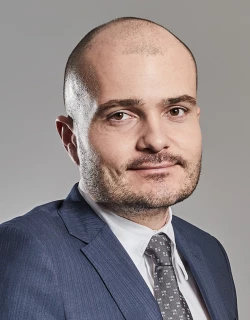
According to the latest ranking of the weekly newspaper Euro, Michal Strnad, owner of the defense company CSG, is the richest person in the Czech Republic. His assets are currently valued at 330 billion crowns (13.5 billion euros). The heiress to the PPF financial group, Renáta Kellnerová, and her family are close behind with an estimated fortune of 315 billion crowns (approx. 13 billion euros). Last year's winner Daniel Křetínský, majority owner of Energetický a průmyslový holding (EPH), which operates lignite mining operations in Lusatia and the Leipzig region, came third with an estimated 280 billion crowns (11.4 billion euros).
The former - and possibly next - Prime Minister and owner of the Agrofert holding company, Andrej Babiš, is in 8th place with CZK 85 billion (approx. EUR 3.4 billion).
Brown hares endangered in the Czech Republic
After Austria, rabbit plague is now also spreading in the Czech Republic, reports Radio Prague. Hundreds of carcasses of infected hares have been found in southern Moravia, following a recent increase in the number of cases in Lower Austria and Vienna. Rabbits are less affected than free-ranging hares.
Myxomatosis, also known as rabbit plague, is caused by a virus that originated in South America and wiped out practically the entire European population of wild rabbits in the 1970s and 1980s. Since 2018, a mutation that also affects brown hares has spread from Portugal via the Netherlands and Germany to Austria and now to the Czech Republic. An animal infected with the virus usually dies within a few days. Prevention is impossible in the wild, meaning that mass deaths of the already endangered brown hares must be expected.
Crown jewels are on display for 14 days

The Czech crown jewels spend most of their time locked up in St. Vitus Cathedral at Prague Castle and are only occasionally taken out and put on public display. On September 15, the time has come again: the seven key holders - the President of the Republic, the Prime Minister, the Presidents of the Senate and the Lower House, the Archbishop of Prague, the Mayor of Prague and the Dean of the Metropolitan Chapter of St. Vitus in Prague - meet in the Crown Chamber and open the vault. Afterwards, the valuable items will be exhibited in the Vladislav Hall of the castle, reserved for school classes for two days, but from September 18 to 29, the general public will be able to see them.
(This is an automatic translation by DeepL Translator.)
August 2025
Wieder freie Fahrt auf der Autobahn bei Ústí
Ab Sonntag ist die Autobahn zwischen dem Tunnel Libouchec und der Abfahrt Trmice wieder ohne Einschränkungen befahrbar. Den ganzen Sommer hatte ein Firmenkonsortium aus Eurovia CZ und Strabag Sis den 14 Kilometer langen Abschnitt erneuert. „Wir haben den Asphalt erneuert, den Seitenstreifen gereinigt, den Mittelstreifen und die Bewässerung repariert“, zählte Sprecher Jan Rýdl von der Straßen- und Autobahndirektion auf. Es war die erste umfassende Sanierung seit der Inbetriebnahme der Autobahn 2006.
Die Sanierung der beiden großen Erzgebirgstunnel Libouchec und Panenská dauern dagegen noch an. Ein letztes Mal müssen Autofahrer ab dem 2. Oktober für eine Woche eine Vollsperrung der Tunnel in Kauf nehmen. Zuvor hatte es in diesem Jahr bereits zwei einwöchige Vollsperrungen gegeben. Für die übrige Zeit ist die Durchfahrt auf eine zweispurige Röhre begrenzt. Ende Oktober soll die Generalsanierung der Tunnel abgeschlossen sein. In beiden Tunneln wird die Feuersignalanlage sowie Verkehrssteuerungsanlage und das Informationssystem erneuert. Außerdem wurde auch die Anlage zur Geschwindigkeitsmessung überarbeitet und ergänzt. Im längeren Tunnel Panenská gilt ein Streckenradar. Überschreitungen werden auch bei Ausländern geahndet und Strafzahlungen an die Meldeadresse im Ausland gesandt.
Allerdings können sich Autofahrer nach der Generalsanierung auf eine Anhebung der zulässigen Höchstgeschwindigkeit von jetzt 80 auf dann 100 km/h freuen.
Mehr Auslandstschechen zur Wahl gemeldet
Das Interesse an den bevorstehenden Parlamentswahlen in Tschechien ist auch bei den Landsleuten im Ausland groß. Bis zum Ablauf der Frist am vergangenen Sonntag hatten sich 24.206 Personen in die Wahlverzeichnisse in den Auslandsvertretungen eintragen lassen. Das sind über 5.000 Personen mehr als bei den letzten Wahlen vor vier Jahren.
Ein Grund für den Anstieg dürfte die neu eingeführte Briefwahl sein. Sie soll jenen Landsleuten im Ausland die Wahl erleichtern, die nicht in der Nähe einer Vertretung wie einer Botschaft oder eines Generalkonsulats leben. Bisher war die einzige Möglichkeit, am Wahltag in den Ort mit einer Auslandsvertretung zu reisen, was häufig finanziell und zeitlich aufwändig war. In Deutschland kann persönlich in der Botschaft in Berlin sowie in den Generalkonsulaten in München, Dresden und Düsseldorf gewählt werden. Nun können Auslandstschechen neu ihre Wahl per Brief an die Botschaften und Konsulate senden.
Allerdings müssen Interessenten für die Briefwahl einige Hürden nehmen. Nach der Eintragung ins Wahlregister, die bis letzten Sonntag erfolgen konnte, mussten Interessenten an der Briefwahl bis diesen Freitag die Wahlunterlagen beantragen. Momentan ist noch nicht bekannt, wie viele Personen letztlich die Briefwahl beantragt haben. Das größte Interesse an der Wahl im Ausland registrierte das Außenministerium aus den USA mit 2.374 Wählern vor London (1.976 Wähler) und Sydney (1.233 Wähler). Insgesamt kann in 108 Auslandsvertretungen gewählt werden.
Die Briefwahl wurde von der aktuellen Regierung durchgesetzt. In Tschechien selbst gibt es sie noch nicht. Die Opposition sah hinter der Entscheidung vor allem Eigeninteresse, denn die tschechischen Staatsbürger im Ausland wählen regelmäßig Mitte-Rechts-Parteien, was ungefähr der jetzigen Regierung entspricht. Vor vier Jahren gewann mit absoluter Mehrheit die gemeinsame Liste aus Piraten und Bürgermeistern vor der Koalition Spolu (Zusammen) der Parteien ODS, TOP09 und KDU-ČSL. Die Partei ANO des früheren Premiers Andrej Babiš kam bei den Auslandswählern nicht einmal über die 5-Prozent-Hürde.
Doch das Interesse an der Wahl aus dem Ausland ist geringer als von der Regierung erwartet und wohl auch erhofft. Sie war von 50.000 Wählern ausgegangen. Nun ist es knapp die Hälfte. Nachbarland Slowakei lässt schon seit 2006 aus dem Ausland per Brief wählen. Seitdem stieg die Zahl der Briefwähler von damals 7.000 auf 58.000 bei den Wahlen vor zwei Jahren. Auch in Tschechien rechnet man damit, dass das Interesse langsam steigen wird.
Den Ausgang der Wahlen werden die Auslandstschechen aber auch mit der Briefwahl nicht beeinflussen. Nach der neuesten Umfrage führt die Partei ANO mit dem ehemaligen Premier Andrej Babiš als Spitzenkandidaten unangefochten mit rund 32,7 Prozent der Stimmen. Das Regierungsbündnis Spolu folgt mit großem Abstand (21,3 Prozent) vor der populistischen SPD (11 Prozent) und den ebenfalls mitregierenden Bürgermeistern (10,9 Prozent). Dahinter würden es der Umfrage nach noch die Piraten (8,5 Prozent) und das Linksbündnis Stačilo (7 Prozent) in das Parlament schaffen. Vor allem auf den zwei vorderen Plätzen ist der Abstand schon seit Monaten unverändert. Beobachter gehen davon aus, dass Spolu anders als vor vier Jahren keine Aufholjagd mehr schaffen kann. Im Unterschied zum letzten Mal sind sie jetzt in der Regierung und deren Beliebtheit in der Bevölkerung ist nicht sehr hoch.
Die einzige Hoffnung der Regierung beruht noch auf den vielen unentschlossenen Wählern. Spannend könnte es auch werden, sollte das Linksbündnis am Ende doch nicht über die 5-Prozent-Hürde kommen. Doch damit ist aktuell nicht zu rechnen.
Historisches Bahnhofsgebäude von Žatec saniert
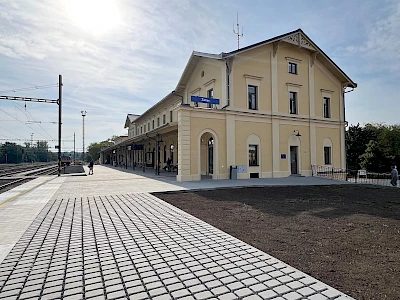
Die Hopfenstadt Žatec (Saaz) hat wieder ein repräsentatives Bahnhofsgebäude. Das denkmalgeschützte Bauwerk aus dem Jahr 1873 wurde 20 Monate saniert und erstrahlt nun wieder im alten Glanz. Gleichzeitig wurde das Gebäude, dessen Zustand lang zu wünschen übrig ließ, mit modernen Elementen wie Aufzug und Sicherheitskameras ausgestattet. Anders als gewohnt wurde die Sanierung sogar schon fünf Monate früher abgeschlossen. Damit hat die Stadt, die wegen dem Erbe und der Tradition der Hopfenverarbeitung UNESCO-Weltkulturerbestätte ist, nun wieder eine würdige Visitenkarte für alle, die mit dem Zug anreisen. Im Bahnhofsgebäude will die Kommune einen Informationspunkt über aktuelle Veranstaltungen in der UNESCO-Stadt einrichten.
Allerdings ist die Anreise mit dem Zug aus Sachsen immer noch mit viel Zeitaufwand verbunden. Von Dresden aus braucht der Zug mit zweimal Umsteigen in Ústí nad Labem und Most mehr als 3 Stunden. Von Chemnitz aus dauert es mit Umsteigen in Cranzahl und Chomutov sogar 4 Stunden.
Touristen kehren in die Böhmische Schweiz zurück
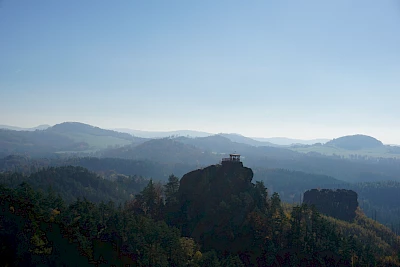
Drei Jahre nach dem Großbrand in der Böhmischen Schweiz herrscht in der Tourismusbranche wieder Optimismus. „Das ist endlich mal wieder eine gelungene Saison“, sagt zum Beispiel Roman Pluháček, dem in Mezná ein Ressort mit mehreren Gebäuden gehört. „Außerdem ist die Saison ja noch lange nicht zu Ende“, ergänzt er gegenüber dem Tschechischen Rundfunk Český rozhlas.
Allerdings ist nicht alles wie vor dem Brand. So dominieren Touristen aus dem Ausland, während tschechische Touristen eher in der Minderheit sind. Zugleich überwiegen vor allem Tagestouristen.
Einen positiven Impuls bekam die Saison durch die lang erwartete Eröffnung der Edmundsklamm bei Hřensko. Seit Mitte Juli dürfen wieder Touristen in die Klamm und mit den Kähnen fahren. Allerdings nur von Hřensko aus und in Begleitung. Die Zahl der Tickets ist pro Tag auf 120 begrenzt. Eintrittskarten können nur vor Ort in der Tourist-Info für den gleichen Tag gekauft werden. Die Tourist-Info ist ab 8 Uhr geöffnet. Die Wilde Klamm ist dagegen wie üblich geöffnet.
Weitere attraktive Wege wie der Gabrielensteig oder die oberen Zugänge zur Wilden Klamm oder der Edmundsklamm sind weiterhin gesperrt.
Original-Handschriften des Braven Soldaten Schwejk entdeckt
Wissenschaftler haben bisher unbekannte Handschriften von Jaroslav Hašeks Bestseller „Die Abenteuer des braven Soldaten Schwejk“ entdeckt. „Fast 90 Jahre war ein Großteil der Handschriften des Romans bei Hašeks Verleger Adolf und später seinem Sohn Karel Synek verwahrt und niemand wusste davon“, sagte der Leiter des Denkmals des nationalen Schrifttums, Michal Stehlík. Bei den nun entdeckten Schriften handelt es sich um ein Fragment des zweiten Teils, um den kompletten dritten Teil des Romans und um Abschnitte des vierten und letzten Teils. Dabei handelt es sich nicht nur um die Handschrift von Hašek. Ab dem dritten Teil begann er den Roman seinem Mitarbeiter Kliment Štěpánek zu diktieren. Die Handschriften fanden sich nun im Nachlass von Karel Synek. Sie werden nun restauriert und digitalisiert und damit auch Forschern zur Verfügung gestellt.
Der stark satirische Roman „Die Abenteuer des braven Soldaten Schwejk“ war ein Welterfolg, obwohl er unvollendet blieb. Hašek starb bereits 1923 mit nicht einmal 40 Jahren. Er gehört zu den erfolgreichsten und meist übersetzten Werken der tschechischen Literatur.
Mehr Polizei im Grenzgebiet
Die Kleinstadt Krásná Lípa (Schönlinde) hat seit kurzer Zeit eine eigene Stadtpolizei. Nun wollen zwei weitere Gemeinden nachziehen, nämlich Chřibská (Kreibitz) und Jetřichovice (Dittersbach). Wobei Stadtpolizei im Fall von Jetřichovice etwas ungenau ist, da die Gemeinde gar keine Stadt ist. Jetřichovice ist jedoch stark von Touristen frequentiert und die Ordnungshüter sollen sich vor allem um Falschparker und eben die Einhaltung der öffentlichen Ordnung und Sicherheit kümmern.
Bis jetzt ist dafür in beiden Orten die Staatspolizei „Policie České republiky“ (Polizei der Tschechischen Republik) zuständig, die jedoch nicht mit eigenen Standorten vor Ort ist und auch keine regelmäßige Streife fährt, sondern nur je nach Bedarf anreist. Sowohl Jetřichovice als auch Chřibská planen mit zwei Angestellten. Die Polizisten von Chřibská sollen zudem auch für das benachbarte Kytlice (Kittlitz) zuständig sein. Die Ortspolizei soll in beiden Gemeinden jeweils ab Januar 2026 ihre Tätigkeit aufnehmen.
Wenn Sie unseren Wochenrückblick regelmäßig in Ihr Email-Postfach bekommen möchten, melden Sie sich für unseren Newsletter an.
The theater ensemble Geisslers Hofcomoedianten, together with the Dresdner Theaterkahn, invites you to a unique celebration of the 300th birthday of Giacomo Casanova at Duchcov Castle. On September 19 and 20, two theater productions about Casanova's last days in Duchcov will premiere - the play was written by Peter Wekwerth. The program will be accompanied by contemporary music performed by students and teachers from the Teplice Conservatory, a tour of the castle in Casanova's footsteps and a small snack.
Program of the evening (same for Friday and Saturday):
- 17:00 - Start of the event and performance of the Dresden theater barge Giacomo Casanova. Sensuality and longing
- 19:00 - Concert with music from the period performed by students and teachers of the Teplice Conservatory, guided tour of the castle in Casanova's footsteps with commentary, refreshments
- 21:00 - Performance of Geissler's court comedians Casanova project: Jak voní ramlice (How fragrant the ramlice is)
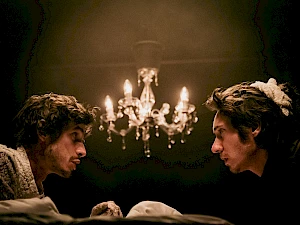
You can find more information here.
PHOTO: Kateřina Hubertová, PR a propagace Geisslers Hofcomoedianten z. s.
(This is an automatic translation by DeepL Translator.)
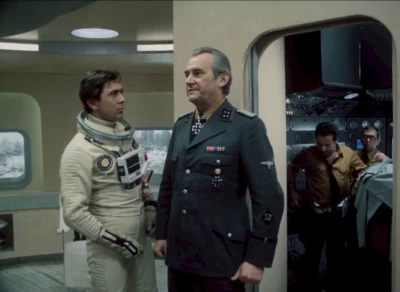 Am 3. September ist er wieder da: der Tschechische Filmmittwoch im Zentralkino Dresden. Diesmal zeigen wir Ihnen mit »Zítra vstanu a opařím se čajem« (Morgen wache ich auf und verbrühe mich mit Tee) eine Science-Fiction-Komödie von 1977.
Am 3. September ist er wieder da: der Tschechische Filmmittwoch im Zentralkino Dresden. Diesmal zeigen wir Ihnen mit »Zítra vstanu a opařím se čajem« (Morgen wache ich auf und verbrühe mich mit Tee) eine Science-Fiction-Komödie von 1977.
Im Film geht es um eine Gruppe von alten Nazis, die dank Anti-Aging-Pillen in einer friedlichen Zukunft leben, in der Zeitreisen möglich geworden sind. Das wollen sie nutzen, um Hitler die Wasserstoffbombe ins Jahr 1944 zu bringen, damit er den Krieg noch gewinnen kann. Allerdings erstickt ihr Pilot an einem Hörnchen, wonach sein Zwillingsbruder sich für ihn ausgibt. Das bringt natürlich eine ganze Reihe von Verwechslungen und Missverständnissen mit sich. Als nach der Rückkehr von der Zeitreise einige Personen doppelt existieren, wird das Durcheinander noch größer, während der gutherzige Zwillingsbruder versucht, alles wieder ins Lot zu bringen.
Mit einem von kleinen, nebenbei eingestreuten Gimmicks bis zu doch etwas Klamauk reichendem Humor zählt diese Komödie zu den beliebtesten tschechischen Filmen der 1970er Jahre. Dazu tragen sicher auch beliebte Schauspieler wie Petr Kostka, Jiři Sovák, Vlastimil Brodský und Vladimír Menšík bei.
Wir vermuten, dass diese wilde Komödie auf viel Zuspruch treffen wird, deshalb haben wir wieder zwei Vorstellungen angesetzt, eine um 18 Uhr und eine wie üblich um 20 Uhr.
Edmundsklamm remains in operation until the beginning of November
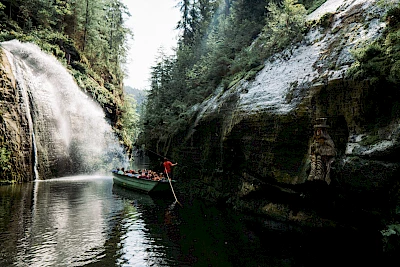
Edmund's Gorge in Bohemian Switzerland has been open to visitors again for a month now. After three years of closure, the interest in a boat trip was enormous and has not waned to this day. In the first month, the municipality of Hřensko (Herrnskretschen) counted 4,000 visitors.
However, access is restricted. A personalized ticket is required for the visit, which can only be purchased for the same day at the tourist information office in Hřensko. In addition, initially only 50 people were allowed into the gorge each day and only if accompanied. This number was increased to 120 after the first week.
With the end of the Czech summer vacations at the end of August, the likelihood of acquiring one of the coveted tickets increases. There is time until the beginning of November. Before the devastating fire disaster in 2022, this was the traditional end of the boat trips. The municipality of Hřensko has now decided to keep the Edmundsklamm open until the latest possible date in the first season of the reopening. Only in bad weather will tickets not be sold.
A ticket costs 400 crowns (around 16 euros). It is personal and entitles the holder to enter at a set time. Admission includes an accompanied walk to the landing stage for the boats, including a boat trip and return to Hřensko via the same exit.
Czech Republic commemorates the suppression of the Prague Spring
The Czech Republic commemorated the 57th anniversary of the suppression of the Prague Spring on Thursday. President Petr Pavel warned against distorting the events of that time and called for the defense of the values that have accompanied humanity for a long time. In this context, he also referred to Russia's war against Ukraine, which Russia interprets as a defense of its own interests, just as the Soviet Union did in 1968.
On the night of August 21, 1968, units of the Soviet army and the armies of three other Warsaw Treaty states (Bulgaria, Poland, Hungary) invaded the territory of Czechoslovakia. The invasion had been finally decided three days earlier and was intended to stop the liberalization under party leader Alexander Dubček, which went down in history as "socialism with a human face".
Over 60 people fell victim to the invasion in the first few days. In the end, their number totaled 108, most of them in Prague and eastern Slovakia.
While the armies of Poland, Hungary and Bulgaria soon withdrew, the Soviet Union army remained in the country and even increased its presence to 750,000 soldiers. As a result of the invasion, all previously won freedoms were revoked. Hundreds of thousands lost their jobs and were forced to emigrate or go underground.
Documentary film is Czech Oscar hopeful

For the first time, the Czech Republic is sending a documentary film into the race for the Oscar for Best Foreign Language Film. The Czech Film and Television Academy chose the film "Ještě nejsem, kým chci být" (I am not yet who I want to be) by director Klára Tasovská. The film is about the life of Czech photographer Libuše Jarcovjáková, from the harsh underground of communist Czechoslovakia to exclusive photo shoots for fashion guides in Tokyo and her dramatic escape to West Berlin, where she witnessed the fall of the Iron Curtain. The film had its world premiere at the Berlinale 2024 and won the Czech Lion for Best Documentary that year. It was also screened last year in the presence of photographer Libuše Jarcovjáková to a sold-out audience at the Czech-German Culture Days in Dresden.
On December 16, it will be decided whether the film will be among the final 15. On January 22, 2026, it will be announced which five films have been officially nominated for the Oscars.
The last Czech Oscar success was almost 30 years ago. In 1996, the film "Kolja" by director Jan Svěrák won the Oscar for Best Foreign Language Film. 30 years earlier, "Obchod na korze" (The Shop in the Main Street, coming next year to Czech Film Wednesday) by directors Ján Kadár and Elmar Klos was the first Czechoslovak film to win the Oscar. Two years later, the prize went to Czechoslovakia for the second and last time for Jiří Menzel's "Ostře sledované vlaky" (Sharp Observed Trains).
Most is planning a cable car from the lake to Hněvín Castle
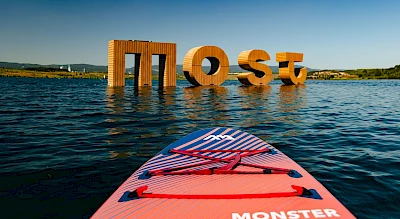
Lake Most near the town of the same name, Most (Brüx), may be the youngest open-cast mining lake in the Czech Republic to date, but the town is making rapid progress with its tourism infrastructure. One highlight was the Olympic Festival last summer, which drew the attention of the whole of the Czech Republic to the city and the lake. In the meantime, two new major projects are already being planned. To improve access from the city to the lake, the city is planning to build a pedestrian bridge from the regional museum to the lake shore. The older Matylda open-cast mining lake is also to be included in the bridge construction. So far, there is only one access to the lake near the Holy Trinity Church, where there are also parking spaces. Architectural designs are expected to be submitted by the beginning of 2026 at the latest. Construction is scheduled to begin in 2027, or 2028 at the latest. The city of Most is planning to finance the project with money from the State Fund for Transport Infrastructure.
The second project is the construction of a cable car to the local mountain Hněvín with the castle of the same name. As visitor numbers are increasing, the city hopes that a cable car will provide an elegant solution. The cable car will also have its valley station at the lake and thus connect two attractions - the lake and the castle. Users of the cable car who come by car will be able to park at the lake. To finance the cable car project, Most is hoping for money from the ČSA opencast mine revitalization fund, where coal mining will soon come to an end.
Free period products at Czech schools
From January 2026, all schools in the Czech Republic must be equipped with free period products in ladies' toilets. This is stipulated by an amendment to the hygiene guidelines of the Ministry of Health. Specifically, all schools attended by female pupils over the age of 9 are affected. The age limit was chosen to include all elementary school in the first stage. In the Czech Republic, the first stage runs from Year 1 to Year 5.
"Menstruation is not a matter of choice, but a natural part of life, and no schoolgirl should have to go home, improvise with toilet paper or be ashamed to ask for help because of it," said Health Minister Vlastimil Válek at the presentation of the new regulation.
The initiative is not only aimed at schoolgirls who are surprised by their period. It also applies to schoolgirls from poorer families who are often unable to afford sufficient period products.
While the Czech Republic is leading the way within the European Union with this initiative, the country still has one of the highest VAT rates on period products in the EU at 21 percent. In Germany, it is 7 percent. It is lowest in Ireland and the UK, where they are exempt from VAT.
Prague makes public transport more expensive
In Prague, local public transport will become more expensive from January. A one-way ticket for 30 minutes will then cost 39 crowns (around 1.60 euros) instead of the previous 30 crowns. A one-way ticket for 90 minutes will increase from 40 to 50 crowns (approx. 2 euros). Tickets will be slightly cheaper if you buy them via the Prague public transport app "Lítačka". Day and three-day tickets are also more expensive. The prices of monthly passes, subscription tickets and other season tickets for three months or the whole year remain unchanged.
The city management is selling the unpopular measure accordingly, as single or day tickets are mainly bought by tourists. Residents of Prague, on the other hand, mainly use season tickets for one month or the whole year.
The one-way tickets or day tickets are valid for subway trains, buses, streetcars and suburban trains within the city of Prague.
(This is an automatic translation by DeepL Translator.)
Marie 1 and Marie 2 are bored. Their favorite pastime is to let older men invite them to a restaurant and then quickly turn them down again. Tired of finding the world pointless, they decide to take the game to the extreme.
This wonderfully playful film by Czech director Věra Chytilová, which was banned after the crushing of the Prague Spring, was already a cult film in the 1960s: two anarchic women mess up pretty much everything, including themselves in the end. A punky, feminist, unbridled and crazy poem that is as psychedelic and pop as it is subversive and daring.
With an introduction by Dr. Frank Schmidt, art historian, TU Dresden
Directed by: Věra Chytilová
ČSSR, 1966 | 76 minutes | Czech with German subtitles
(This is an automatic translation by DeepL Translator.)
Prosecution for serious fire in Most
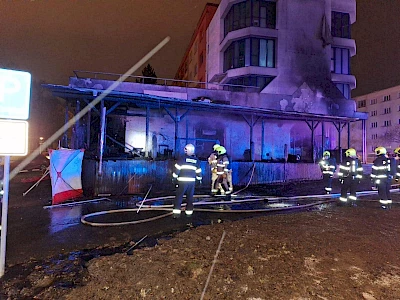
More than half a year after the tragic fire in the restaurant "U Kojota" in Most, the police have completed their investigation. Charges have been brought against two people. "The manager and the person authorized by her to run the restaurant have been charged with negligently endangering the public," said police spokesman Kamil Marek. According to the newspaper Mladá fronta Dnes, the accused are the married couple Miloslav and Jana Čech. If convicted, both face up to 10 years in prison.
The investigators also relied on several expert reports from the fields of fire protection and healthcare. According to these, the cause of the devastating fire on January 11 shortly before midnight was the accidental tipping over of a gas mushroom on the restaurant terrace by one of the guests. This damaged the seal between the valve of the pressure vessel and the heating regulator and allowed a propane-butane gas mixture to escape, which ignited on the mushroom heater. In just a few seconds, the fire spread not only to the terrace, but also to almost the entire restaurant. Unfortunately, it blocked the way to the door. A second door was locked. So those present only had a few seconds to save themselves. Six people died at the scene and a seventh later died seriously injured in hospital. Seven other people were injured, two of them seriously.
The investigators compiled a very long list of defects as reasons for the fire. "The investigation brought to light serious breaches of the obligations under the Fire Protection Act," continued police spokesman Marek. In addition, the terrace was roofed over without a valid building permit and later covered with PVC foil. The fire protection regulations should then have been adapted, which did not happen. There were no regular preventive fire safety inspections, nor was the fire protection equipment inspected. The most recent inspection took place in April 2008. The placement of a garden heater in the premises of the terrace, which had not been structurally approved, was particularly serious, as was the storage of several pressurized gas cylinders in the rooms of the restaurant, which also contradicted the operating instructions provided by the seller of the mushroom heater.
Wet weather causes later harvest
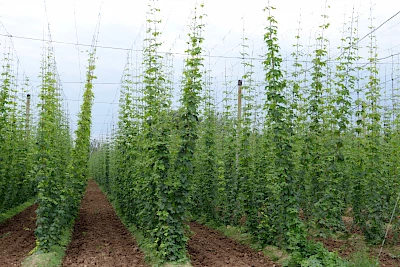
The wet weather in July delayed the harvest in the fields in northern Bohemia by a good month. At the beginning of the current warm period, only half of the grain harvest had been completed in the entire Ústí district, and in some cases winter wheat and winter barley could only now be harvested from the fields. The beet harvest is already over 80 percent complete, with above-average yields already emerging. However, farmers are expecting quality losses due to the weeks of wet weather in the middle of the harvest period.
In contrast, the hop harvest will not begin until this weekend. The Czech Republic is one of the largest hop producers in the world. The largest hop-growing region in the Czech Republic is around Žatec. The harvest there is expected to be average at best. One risk is the current hot days, which could end the ripening process prematurely without achieving the desired bitter content. As in Germany, it is mainly seasonal workers from Romania and Bulgaria who help with the harvest.
Hop acreage in the Czech Republic has fallen slightly in recent years to 4,815 hectares. However, the decline is not as great as in the USA. Hop growers are also negotiating for state support to expand hop acreage.
Northern Bohemia is also an important location for fruit growing.
China annoyed by Czech president
China breaks off all contact with Czech President Petr Pavel. This is the country's reaction to Pavel's private visit to the Dalai Lama in India. At the end of July, after a working visit to Japan, Pavel traveled back to India on a private mission to congratulate the Dalai Lama on his 90th birthday. In China's view, the Czech president thereby harmed sovereignty over Chinese territory.
The Presidential Chancellery commented on China's move by saying that there was currently no direct communication between the presidents of the two countries and that China's decision therefore did not change the current situation.
President Pavel received support from the parties in the ruling coalition. The largest opposition party ANO did not wish to comment on the situation.
The Czech Republic has taken a critical stance towards China in the long term. The President of the Senate, Miloš Vystrčil from the ruling ODS party, paid an official state visit to Taiwan. The speaker of parliament, Markéta Pekarová Adamová from the governing TOP 09 party, has also visited Taiwan. In the Czech Republic, it is also common practice to fly the Tibetan flag on town halls and other public buildings such as schools on March 10, the anniversary of the popular uprising in Tibet.
Czech Republic buys 44 Leopard tanks
The Czech Ministry of Defense has decided to purchase 44 Leopard 2A8 main battle tanks. The costs amount to just under 1.4 billion euros. The purchase is part of a large order from the Franco-German manufacturer KNDS, which is organized by Germany and has been joined by several countries. Subject to the approval of the Czech government, the official order is expected to be placed in the coming weeks. This would mean that Defense Minister Jana Černochová would have achieved her self-imposed goal of completing the tank order during her mandate. A new parliament is elected in the Czech Republic at the beginning of October.
The first Leopard 2A8 tank is due to be delivered in 2028, with delivery to be completed in 2031.
Parents spend an average of 100 euros on school supplies
Spending on school supplies in the Czech Republic amounts to the equivalent of around 100 euros per child. This is the result of a survey conducted by the research agency NMS Research. The costs are higher for first-graders at an average of 120 euros. A quarter of those surveyed reported costs of over 120 euros. The largest item for first-graders is naturally the school bag. According to NMS Research, expenditure remained unchanged compared to the previous year.
However, according to the survey, the biggest challenge is not school supplies, but costs for class funds, all-day activities, excursions, ski camps and after-school care. There are some major differences in after-school care fees. They can range from 200 to 600 crowns (8-24 euros) per month.
In contrast to Saxony, however, parents do not have one major expense: the cost of celebrating the start of school, i.e. sugar cones, parties and everything else that is organized. This tradition does not exist in the Czech Republic.
Incidentally, there is still some time before school starts in the Czech Republic. The new school year doesn't start until September 1.
Museum Teplice shows Bihl porcelain

Last year, Dutchman Jan Jager donated 50 banana boxes of ceramics from the Gustav Biehl company in Ladowitz (now Ledvice) to the regional museum in Teplice. Jager had collected the tableware for 35 years before giving it to the museum. Parts of the collection are now on display in a special exhibition at the museum.
In a way, the porcelain has returned to its place of origin. Only a small part of the former Ledvice still exists. A huge coal-fired power station now stands in its place, and parts of it have also been demolished due to open-cast lignite mining. The "Porcellan- und Steingutfabrik G. Bihl & Com." has also long since ceased to exist. With the expulsion of the German population in 1945, production was stopped and never resumed.
Gustav Biel actually came from Künzelsau in eastern Franconia. He later worked in coal mining, mainly in the Petschek family mines. In 1896, he took over the Hanke family's pottery factory. The factory experienced its heyday in the 1920s and 1930s. The majority of the collection also dates from this period. Typical for Biehl tableware is the spray decoration from 1927 to 1935. After the occupation of the Sudetenland by Germany, many export markets collapsed. The factory therefore concentrated primarily on the production of technical porcelain such as insulators.
The exhibition at the regional museum is on display until October 12.
(This is an automatic translation by DeepL Translator.)
Liberec district takes over the Ještěd Tower

The striking tower on Mount Ještěd is expected to become the majority property of the Liberec Region this year. The leadership of the Liberec Region approved the new terms of the purchase agreement, which is expected to come into force by the end of the year. The purchase price is estimated at 181 million crowns (around 7.2 million euros). The purchase price is still to be confirmed by an independent expert opinion. The purchase agreement is to be finally approved by the district parliament at the end of August.
The core of the agreement with the previous owner České Radiokomunikace (ČRa) is an agreement on the continued use of the tower by ČRa as part of the digital broadcasting network in the Czech Republic. The award-winning building by architect Karel Hubáček is also a mountain hotel, restaurant and transmitter. The purchase agreement also clearly defines which areas ČRa is guaranteed to be able to continue using in the future and what restrictions this means for the new owner. An annual usage fee was also agreed, which can be adjusted annually in line with inflation from 2028. However, the increase may not exceed 5 percent.
Taking control of the tower is a prerequisite for the long-planned renovation of the listed building, which is to take place over the next ten years. An architectural study has already been prepared for this. ARN STUDIO from Hradec Králové (Königgrätz) was selected.
The Liberec district will pay the purchase price from the 2025 budget, for which a reserve has been set aside. The district plans to apply for funding for the renovation. The costs for the renovation, which must be true to the original both externally and internally, are estimated at around 400 million crowns (16 million euros).
Duchcov Castle opens new Casanova exhibition

Duchcov Castle (Dux) is preparing a new tour dedicated to its famous resident Giacomo Casanova. The previous exhibition has been revised since last fall. The date of the reopening has not yet been set. However, castle administrator Bedřich Hrabovský told Czech Radio Český rozhlas that the probable date is mid-August. "We are in the final stages. What's still missing now is the demarcation of the areas for visitors and then wiping and cleaning everything again," said Hrabovský. The last time the rooms where Casanova spent the last 13 years of his life were renovated was 35 years ago. The renovation cost the equivalent of around 40,000 euros.
Giacomo Casanova was in the service of Count Joseph Karl Emanuel von Waldstein from September 1785. He worked for him as a librarian, continued to travel extensively and, above all, completed his "Histoire de ma vie" (History of My Life) at the castle.
New Prague-Bubny railroad station opens

Prague has a new transportation hub. Bubny station opened at the end of last week. At the same time, the railroad line from Masaryk station towards Kralupy nad Vltavou and via Prague-Dejvice to Kladno also went back into operation. Construction work on the line and the new station took over two years. The station has been completely rebuilt. All that remains of the old Bubny station is the main building, which houses a memorial to the deportation of the Jewish population from Prague by the Nazi occupation in the early 1940s.
The new station is also a transportation hub and thus offers better connections to the Vltavská metro station and the streetcars that run above the metro station. A level crossing in Holešovice, which often caused traffic jams, has also been removed. The former Holešovice stop has been removed.
The Výstaviště stop is also new, located at the exhibition grounds, the popular Stromovka Park and near the Modern Art section of the National Gallery.
In the future, the station and the line will become even more important. They are part of the high-speed rail line to Prague's Václav Havel Airport, which is due to be completed by 2030.
Change of ambassador in Prague
After four years, the mission of the German ambassador in Prague, Andreas Künne, is coming to an end. Künne will be moving to Bern as EU Ambassador to Switzerland. Before his time in Prague, he spent three years as the United Nations and Counter-Terrorism Commissioner at the German Federal Foreign Office. From 2011 to 2015, he worked in Pretoria (South Africa), where he headed the Department of Economic and Global Affairs as envoy. In Germany, he worked in the Federal Chancellery and as a political advisor. His focus was on security policy and multilateral issues.
Four years is a regular period of service for ambassadors. Künne succeeded Christoph Israng four years ago. According to the embassy, a successor for Künne has already been chosen, but his name has not yet been officially confirmed. In a farewell video on X, Künne said his successor would be an experienced diplomat.
ČEZ increases stake in British nuclear power plant manufacturer
The Czech energy group ČEZ has completed its investment in the British manufacturer of small, modular nuclear power plants Rolls-Royce SMR. Following the last transaction in June, ČEZ now holds 20 percent of Rolls-Royce SMR. The Czechs paid almost a quarter of a billion euros for the entire share package.
The Czech company has thus secured strategic influence in the further development of small, modular reactors, which are also to be built in the Czech Republic. In addition to three reactors for British sites, this also includes the first such nuclear reactor in Temelín. "But we are still at the beginning," said ČEZ CFO Martin Novák. ČEZ's involvement includes the supply of parts for the reactors by the power plant technology subsidiary Škoda JS or by other companies from the ČEZ Group.
The Czech Republic is relying on small modular nuclear power plants to establish emission-free energy security. In addition to a new large power plant unit in Dukovany in southern Moravia, these are to gradually replace the coal-fired power plants, which are to be shut down by the mid-2030s. Small nuclear power plants are also planned at current coal-fired power plant sites, such as in Dětmarovice (north-east Moravia) and Prunéřov in northern Bohemia, near the border with Saxony.
More free charging stations for e-bikes
Cyclists can charge their e-bikes free of charge at more and more restaurants and hotels. Operators are offering charging as an additional service, just as they have been offering WiFi for decades. Some providers also provide cables, although a deposit is often required. However, the costs for the actual charging are borne by the provider. The charging stations are often compatible with various systems such as Shimano or Bosch. Ordinary 230-volt sockets are also frequently offered for the charger you bring with you.
In addition to restaurants and accommodation facilities of all kinds, tourist information offices and tourist facilities such as outdoor pools, museums and even petrol stations often offer this service. In the Děčín district, there is a charging station in Jetřichovice in Bohemian Switzerland and two in Česká Kamenice (tourist information office and outdoor pool). In the Ústí district, bikes can be charged at the Labská bašta restaurant in Střekov, at the Tivoli restaurant in Velké Březno, at Chata Florian in Telnice or at the Air Restaurant Petrovice parking lot. In the Litoměřice district, there are options at the Orlen petrol station in Lovosice, on the main square in Bohušovice nad Ohří or at the U Přívozu snack bar in Velké Žernoseky. In the Teplice region, free charging is available, for example, at the Eurocamp Barbora campsite in Oldřichov, in the atrium of the town museum in Duchcov, on the terrace of the restaurant at Komáří vížka and at Dubí Golf Club.
If you would like to receive our weekly review regularly in your email inbox, sign up for our newsletter.
To the newsletter registration
(This is an automatic translation by DeepL Translator.)
Commemoration of massacre in Ústí

At the end of July, representatives of the city leadership of Ústí nad Labem (Aussig) together with German associations and citizens commemorated the terrible massacre 80 years ago. The first commemoration took place in U Cukrovaru Street in the Krásné Březno (Schönpriesen) district, where an ammunition depot exploded at the time. Afterwards, the commemoration continued on the Elbe Bridge, but this time, due to construction work, not on the Beneš Bridge as usual, but on the railroad bridge, where the memorial plaque was temporarily moved. The German ambassador to the Czech Republic, Mr. Andreas Künne, representatives of the regional assembly of German associations and the deputy federal chairman of the Sudeten German Landsmannschaft, Steffen Hörtler, were also present at the commemorations.
On July 31, 80 years ago, members of Czech militias and other Czech citizens carried out a massacre among members of the German minority. The cause was the explosion of the ammunition depot in Schönpriesen, for which a sabotage operation by a werewolf unit was blamed. However, it was never investigated what really happened in the ammunition depot, nor were members of a werewolf unit ever identified and convicted. Instead, people of German nationality were indiscriminately shot, otherwise killed in agony and pushed off the Beneš Bridge, both dead and alive, and then shot at in the river. Historians put the number of dead at between 43 and 100, plus a high number of injured.
Dramatic decline in rail freight traffic
The rail freight company ČD Cargo is laying off 700 employees by the end of the year. The company explained the painful step with the difficult market situation. As a result, the volume of goods transported by rail has been falling continuously for years. The total volume of goods transported by rail in the Czech Republic fell by 5.3 percent in the first half of the year alone, and by 3.2 percent at ČD Cargo. Since 2022, the volume of goods transported has fallen by a seventh.
Various factors are responsible for the decline in rail transportation. Paradoxically, these include the energy transition. Until now, coal and the transportation of oil products have been a significant part of rail transport. Added to this is the decline in the European steel industry, which transports many of its products by rail. In the Czech Republic, this particularly affects the closure of the Liberty steelworks in Ostrava. The weakening chemical industry with repeated production stoppages is also causing problems for rail freight transport. Both the steel and chemical industries have high energy costs, which makes production in Europe unprofitable in the long term.
Another factor is the decline in timber transportation after the damage caused by the bark beetle has subsided. In addition, there are structural reasons such as the efforts of competitors to avoid transportation with short wagon rows. In the past, ČD Cargo in particular put together many freight trains from individual wagons from individual railroad stations or industrial connections and collected them into large transports. ČD Cargo now charges significantly higher fees for such small transports, which is why demand has fallen. Since then, goods have preferably been transported by road. The only transport by rail that is growing is intermodal transport, i.e. the transportation of one and the same load unit alternating between rail, road and possibly water. This mainly concerns container transport.
The decline is not a purely Czech phenomenon, but affects almost the entire European market. Accordingly, the volume of goods transported by rail is declining despite growing transport volumes. Experts assume that the trend will continue in the coming years.
Elbe ferry in Žleb still out of service

The car ferry in Dolní Žleb is still out of service. The city of Děčín was unable to find a new operator in the first round of tenders and has now put the operation out to tender for a second time. If the search is successful, the ferry could go back into operation in mid-September at the earliest.
The ferry connects the village on the left bank of the Elbe with state road 62 and is mainly used by tourists and climbers, but also by locals who use the state road to get to Hřensko and on to Germany or towards Růžová or Jetřichovice more quickly by car. The state road is also faster to Děčín. On the left bank of the Elbe, the village is only connected to the district town by a small road, which is often only designed for one car.
The new operator will receive significantly more money from the town of Děčín, but will also have to invest in the maintenance and repair of the ferry itself in future. In addition, the ferry will now operate daily from 8 a.m. to 6 p.m. instead of the previous 7 a.m. to 6 p.m. or 7 a.m. to 8 p.m. in summer.
The ferry's forced break is nothing new. Every year, the ferry has to pause for several months due to the water level. The ferry cannot be operated either at low water, as has been the case in recent weeks, or at high water. The ferry is a yaw rope ferry comparable to the one in the spa town of Rathen.
Czech Republic exports more armaments
Arms exports from the Czech Republic increased by 86 percent to a volume of 91 billion crowns (3.6 billion euros) in 2024. This is according to figures from the Czech Ministry of Industry and Trade. Most export licenses related to exports to Ukraine, which was affected by the Russian invasion. In total, the Czech Republic delivered military equipment worth 47.1 billion crowns (around 1.9 billion euros) to Ukraine last year. The Czech Republic also supplied military equipment to Bulgaria (11 billion crowns), the Netherlands (8.5 billion crowns) and Vietnam (5.3 billion crowns). Most export licenses after Ukraine were approved for exports to Slovakia, the USA, Israel and Great Britain. In contrast, the Ministry of Industry rejected applications for exports to Belarus, North Korea and Syria.
The import of military equipment also increased significantly in 2024, by almost 130 percent to 26 billion crowns (1 billion euros).
Bonuses for wild boar hunting
Wild boar are often uninvited guests in urban areas. In Ústí nad Labem (Aussig) in particular, this is a long-term problem that the city is unable to get under control. In search of food, the animals repeatedly invade the urban area and have already set up their resting places near the city. The easily accessible food near garbage cans, but also deliberate feeding, are the reasons why Ústí cannot get rid of the problem.
The city has now reacted and increased the premium for shooting a wild boar from 500 crowns to 2,000 crowns, i.e. from around 20 euros to 80 euros. The city hopes that this will not only increase the shooting rate, but will also reward the greater effort required to shoot a boar. Unlike in the wild, this is associated with considerable safety regulations, which cause additional costs.
At the same time, the city council records high levels of damage caused by wild boar to public and private property. In Ústí, they regularly appear in prefabricated housing estates or parks. Wild boars are not entirely harmless to humans, especially during the breeding season. The wild boars themselves are now accustomed to the presence of humans.
As a further measure, the city is planning to prune public green spaces, especially bushes and shrubs at the edge of the urban area, where wild boars like to retreat. The pruning is intended to ensure that the wild boars can no longer stay close to the city. In addition, two large steel cages continue to be used as traps. The wild boars in the cages are killed.
Ústí has earmarked the equivalent of 80,000 euros in its budget for the shooting premiums.
If you would like to receive our weekly review regularly in your email inbox, sign up for our newsletter.
To the newsletter registration
(This is an automatic translation by DeepL Translator.)
July 2025
At Czech Film Wednesday on August 6, we will be showing the absolute cult film of the 2000s: "Samotáři" (Loners).
In various loosely connected episodes, the film shows bizarre young people in Prague in the late 1990s who are all a little lost. They first have to come to terms with the great freedom that the advent of capitalism has brought. All the characters are in search of happiness and togetherness, but individualism and fear of commitment always stand in the way. Sometimes it's just the excessive consumption of marijuana and the associated weaknesses in short-term memory. One wants to understand life by constantly filming everything and helps his friends to finally break up. The other desperately chases after his childhood sweetheart, who must want him now that he has become a successful doctor. She, in turn, suddenly finds herself at her parents' house as an ethnographic object of study, where Japanese people want to experience a real Czech family.
The film's cult status is also underlined by the fact that various quotes and characters from the film have found their way into everyday Czech culture and are quoted from time to time.
(This is an automatic translation by DeepL Translator.)
Old dining car to Prague partly until fall

The farewell to the beautiful old dining cars of Czech Railways České dráhy is getting closer and closer, but there is still one last deadline. From Saturday, July 26, all trains on the Eurocity line Prague-Dresden-Berlin-Hamburg will run exclusively with the modern ComfortJet carriages. In addition to a Siemens Vectron locomotive, they are also equipped with a control compartment at the other end of the train. They also have new dining cars, but these have fewer seats compared to the classic and very popular dining cars and for many also lack the old flair.
However, lovers of the old dining car can still enjoy the dignified atmosphere of the old carriages for a while on six train connections. These are the EC 259, EC 171 and EC 379 trains departing from Dresden Hauptbahnhof at 2.41 am, 9.10 am and 1.10 pm. Conversely, this applies to trains EC 378, EC 170 and EC 258 departing from Prague Central Station at 10.28, 16.28 and 20.28.
However, the reason for the exceptions is not a concession to the numerous fans of the old dining car, as Petr Šťáhlavský, spokesman for České dráhy, explains: "The Siemens - Škoda Group consortium has not yet delivered all the complete ComfortJet trains. These consist of nine carriages including the control compartment and dining car. Only the eight carriages with the locomotive and the old dining car are in operation on the connections mentioned. However, everything is going according to plan and they will be gradually added to the Prague-Berlin route by the fall, so that at some point in September only the new trains with new dining cars will be running."
České dráhy has ordered a total of 20 ComfortJet trains from Siemens - Škoda Group and is gradually converting its fleet. The first new trains could already be seen on the Prague-Berlin route last autumn, at that time still with a locomotive and old dining car. The first complete ComfortJet trains have also been running on this route since spring of this year. Incidentally, they not only look stylish, but also offer significantly more legroom than some old ICE trains, for example. In addition, special windows allow the mobile phone signal to pass through unhindered. All previous amenities such as a dedicated Wi-Fi network, power sockets and USB ports, some of which České dráhy offered long before Deutsche Bahn, will of course remain in place.
On Thursday, České dráhy trains ran to Flensburg, Kiel and Hamburg for the last time. Due to the modernization of the Berlin-Hamburg line, all trains will be rerouted for nine months. Passengers traveling to Hamburg will then have to change to other trains from Berlin, which will take an alternative route via Stendal and Uelzen to Hamburg. České dráhy trains will start and end in Berlin.
Incidentally, the good old dining cars will in future run on express trains on the Prague-Ostrava-Bohumín route in purely Czech long-distance services.
Hřensko lets more people into the Edmundsklamm Gorge
Edmund's Gorge has been open again for a week, so far only in trial operation for 50 people per day. However, the experience of the first week has been so good that the municipality of Hřensko, which owns the gorge, is now increasing the number of visitors to 120 a day. "We now have more staff available to accompany the groups," explained Mayor Horáková exclusively for this newsletter.
This is very good news for all those planning a trip to the gorge after the three-year closure. As expected, demand is high and tickets must be purchased at the tourist information office in the building of the local authority, which is located on Uferstraße on the Elbe. However, as the first few days showed, the 50 tickets sold out in no time at all. The relatively high price does not change this. Instead of 200 crowns (approx. 8 euros) as before the closure, the ride in the Edmundsklamm now costs 400 crowns (16 euros) in the two summer months. Out of season in the months of May, June, September and October, a ticket costs 350 crowns (14 euros).
On the first day last Saturday, the first visitor was already there at 6 am. The second visitors arrived at 7.20 am. The tourist information office opens daily at 8 am. The last people in the queue that had formed by then on Saturday left empty-handed. The only option then is to try again on another day. There is no advance sale. Online sales are also not possible. Under these conditions, all those who are already accommodated on site naturally have an advantage. Those coming from further away have to get up very early, but the municipality is planning to introduce an online reservation system. "We're working on it, but unfortunately I can't say whether we'll be able to do it this year," explains Mayor Horáková. Getting up early is also required during the week. "The tickets were usually sold out by 9 a.m.," continues Horáková. Incidentally, tickets can be paid for at the tourist information office by card or cash, as well as in crowns and euros.
If you are one of the lucky ones and have purchased one of the 120 personalized tickets per day, you will be allocated a specific time to meet the gorge guides. But be careful, the meeting point is not at the entrance to the gorge, but 300 meters further into the gorge. There is a lockable gate there. "Not that anyone waits at the entrance, that would be a shame. But everything is actually well explained at the tourist information office," assures the mayor.
She points out that 100 percent safety can still not be guaranteed. Visiting the gorge is entirely at your own risk. "We will observe how the gorge behaves and then evaluate all the data," says the mayor of Hřensko, Kateřina Horáková, with a view to a further increase in daily visitor numbers.
If all this is too complicated for you, there is still the Wild Gorge, which is open as normal but can only be reached by taking a detour via Mezná or Růžová. The ride in the Wild Gorge is open daily from 9 am to 5 pm and costs only 200 crowns (8 euros) per person.
Fewer falcon offspring in Bohemian Switzerland

Only eleven young falcons were born in nests in Bohemian Switzerland or in the Elbe Sandstone Mountains. That is the poor result of this year's breeding season. It was not improved by the eagle owl (two young) and the black stork (1 young). However, as in previous years, humans were not to blame this time. The national park would like to thank visitors for their consideration. The national park imposes a ban on entering sensitive areas during the breeding season, which was observed this year.
However, most of the clutches and young were victims of the cold spring (clutches) and predators (clutches and young) this year. No other reasons are known. In the case of the eagle owls, only two nests were used at all, in each of which one young was reared. Other nesting sites from previous years remained unoccupied.
The access ban will remain in force until the end of July.
Social Democrats run together with Communists
The Czech Social Democrats have joined the joint electoral list Stačilo! (Enough is enough!) for the autumn parliamentary elections. This electoral alliance, which consists mainly of representatives of the Communist Party, has already celebrated its first successes in the European elections and the district elections last year. Stačilo! also ranks well above the 5 percent threshold in the polls for the parliamentary elections. The Social Democrats Socdem (formerly ČSSD) are a different story. Despite a change of name and new party leadership, the party has not managed to get above 3 percent in the polls. The party has therefore decided to join the Stačilo! candidate list, with the Social Democrats being the smaller partner.
Both sides are celebrating the project as a strong left front. Critics recall the forced unification of German Social Democracy with the Communist Party in the eastern part of Germany after 1945, which later became the GDR. Before 1989, the Social Democratic Party was banned in Czechoslovakia. Social Democracy is the oldest party in the Czech Republic with a history of over 130 years. It provided the prime minister until 2017 and was in government for 16 years between 1998 and 2021. In 2021, like the Communist Party, it fell well short of the 5% threshold.
If you would like to receive our weekly review regularly in your email inbox, sign up for our newsletter.
To the newsletter registration
(This is an automatic translation by DeepL Translator.)
Film awards presented in Karlovy Vary

The prizes were awarded at the famous International Film Festival in Karlovy Vary last weekend. The main prize, the Crystal Globe, went to the film "Raději zešílet v divočině" ("Better to go mad in the wilderness") by Slovakian director Miro Remo, a documentary about a pair of twin brothers who live as dropouts on a lonely farm in the Bohemian Forest. Or rather, one should say: lived. Because one of the two 62-year-old brothers, František Klišík, died the night after the award ceremony, which they had both attended. The exact circumstances of his death have not yet been revealed, except that his body was found in a pond in a village near Prague.

The director visited the two brothers Ondřej and František Klišík repeatedly over the course of five years and followed their lives. He did not spare the conflicts between them. Incidentally, we intend to show the film next year during the Czech-German Culture Days.
Other prizes went to the Norwegian Pia Tjelta as best leading actress for her role in the romantic drama "Don't Call Me Mama" and to the German-Spanish actor Alex Brendemühl as best leading actor for his role in the film "When a River Becomes the Sea".The Special Jury Prize went to the Iranian film "Bidad" ("Injustice") by director Soheil Beiraghi about a young singer who fights against the fact that women are not allowed to perform in public in Iran. A special award also went to 15-year-old Kateřina Falbrová for her role in the film "Sbormistr" ("The Choirmaster").
What next for the goat track?

The Czech railroad administration Správa železnic has presented a list of lines for which a number of parameters would justify closure. This is not yet a decision, but a basis for negotiations with local authorities.
This list also includes a section of the so-called Goat Railway between Oldřichov u Duchcova and Krupka město. The goat train was out of service for years until operations between Děčín and Krupka were resumed as tourist line T11 (information and timetables here). The rest of the line from Krupka to Oldřichov u Duchcova is now under consideration, as its repair would probably cost around CZK 200 to 300 million. The railroad administration considers this uneconomical, but the Ústí district would like to use the line as an extended tourist route. Now both have to negotiate with each other.
Czech Republic relaxes drug policy
A reform of criminal law approved by the Czech Senate at the beginning of July, which will come into force in January 2026, also includes new regulations regarding the possession and consumption of cannabis. In future, the cultivation of up to three cannabis plants per person will be legal, as will the possession of up to 100 grams of cannabis at home and the carrying of up to 25 grams on the road. In addition, minor violations of these limits will no longer automatically be treated as a criminal offense, but as an administrative offense. In future, a clearer distinction will be made between offenses committed with or without the intention to sell.
Until now, drug policy in the Czech Republic has been relatively relaxed with regard to cannabis, but possession was still not legal. Anyone caught with up to 15 grams was not prosecuted, but treated as an administrative offense (and often not prosecuted at all).
New nuclear power plant units cost CZK 407 billion
The website e15.cz has calculated from the recently published contracts between the South Korean company KHNP and the majority state-owned operating company Elektrárna Dukovany II that the new nuclear power plant in Dukovany will cost around CZK 407 billion (approx. EUR 16 billion). The website emphasizes that many sections of the contracts have been blacked out and that the total sum had to be calculated from various individual figures.
Jackals detected in the Czech Republic

There have been individual reports of jackal sightings in the Czech Republic for several years, but now it has become known that their presence has been confirmed for the first time using wildlife camera footage. As reported by the Agency for Nature and Landscape Conservation of the Czech Republic, this was achieved at the beginning of April in the Tabulová nature reserve near Břeclav in the south-east of the Czech Republic.
The jackal spreads naturally from the Balkans. It arrived in the Czech Republic via Hungary, where it is already relatively common, and Slovakia. It has been suggested that one of the possible reasons for the current spread of the jackal into new areas is climate change and the shortening of permanent snow cover in the areas it inhabits. The absence of predators such as the wolf also favors the spread. In terms of behavior (including towards humans) and diet, the jackal is said to be comparable to the fox.
If you would like to receive our weekly review regularly in your e-mail inbox, sign up for our newsletter.
To the newsletter registration
(This is an automatic translation by DeepL Translator.)
Edmundsklamm gorge open again from July 19

The municipal council of Hřensko decided yesterday to reopen the Edmundsklamm Gorge from next week. However, this is associated with a number of restrictions.
The Edmundsklamm will be open to the general public from June 19, before which it will be open to the residents of Hřensko on June 15 and 16 and to a closed group on June 17.
For the time being, only 50 people are allowed to enter the gorge per day. This is only possible as part of a guided tour. The boats turn back at the end, so it is not possible to walk on to the Wilde Klamm. Tickets can only be purchased at the tourist information office at the municipal office in Hřensko. The price has not yet been set, but it is speculated to be around CZK 400. In the event of bad weather, access will be suspended, which will be decided on a day-to-day basis. Visitors with baby carriages, dogs, small children or people with reduced mobility are not allowed to visit for the time being.
Lignite mining in Bílina will end by 2033 at the latest

The last Czech lignite mine in Bílina will cease operations on December 31, 2033 at the latest. This was announced yesterday by the Czech Mining Authority. The operating company Severočeské doly, which belongs to the semi-state-owned energy group ČEZ, had agreed on this date with the Czech government in May and applied for the operating license itself. However, ČEZ also has plans to become climate-neutral by 2030. It is therefore uncertain whether the operation of the Bílina mine will continue at all until 2033.
Ten years ago, the limits for possible lignite mining were extended beyond the limits set in the 1990s, which was highly controversial at the time. ČEZ has not yet claimed this extension and is unlikely to do so again. Two years ago, the company applied for an operating license until 2035, having even indicated a long-term mining perspective until 2050 five years earlier. However, the Czech government was already pursuing a plan to phase out coal by 2033 at the time and appears to have achieved this goal through negotiations.
Government approves state treaty on the Ore Mountains tunnel
The Czech government has approved the draft contract for the construction of the railroad tunnel through the Ore Mountains as part of the Dresden-Prague high-speed rail line. The tunnel will be just over 30 km long, of which almost 12 km will be in the Czech Republic. The construction costs are currently estimated at around 1.8 billion euros. According to the contract, the Czech Republic will bear around 39 percent of these costs. Passenger trains will be able to travel at 200 km/h in the tunnel, thus helping to reduce the travel time from Dresden to Prague to one hour.
DB InfraGO AG and DB Energie GmbH will be responsible for operation on the German side, while the Czech state railroad administration Správa železnic will be responsible for operation on the Czech side. The contract still has to be ratified by the parliaments in Prague and Berlin.
EU sees progress in the rule of law
In its annual report on the state of the rule of law in the EU member states, the European Commission on Tuesday acknowledged that the Czech Republic has made progress in areas such as shortening the duration of proceedings and the remuneration of judges and public prosecutors. Deficits were still noted in investigations into corruption at the highest level and in the transparency of media ownership.
According to the Commission, the Czech judicial system works efficiently, but there are still gaps. It therefore recommends that further measures be taken to shorten the duration of proceedings and ensure the independence of investigations and prosecutions in high-level corruption cases, as well as to resume the review of legislation on conflicts of interest.
According to the European Commission, transparency of media ownership remains a problem area where no positive developments can be reported. "Police are stepping up efforts to tackle attacks on journalists, but harassment of journalists online remains a problem," the report states.
Moose in Zlín

A young moose has applied for the role of the animal that will fill this year's summer slump in the Czech Republic. It has already been spotted several times in the area around Zlín in the past two weeks, feasting on greenery in gardens, swimming in lakes, running around on roads and showing little fear of people or cars. There are therefore also several videos of him, e.g. here or here. Occasionally the police accompany him and try to lure him away from traffic routes.
It is thought to have migrated from Poland. There are said to be around 20 moose in the Czech Republic, 15 of them in Šumava. It is speculated that the moose is on its way there from Poland.
(This is an automatic translation by DeepL Translator.)
The camp is aimed at young people between the ages of 15 and 25 from Germany and the Czech Republic. It is jointly organized by ČSOP (Czech Society for the Protection of Nature), BUND Dresden and NaJu Dresden-Neustadt.
The camp is part of the cross-border Elbe floodplain project to protect and preserve our shared river landscape. As we still have places available, we have extended the registration period - so registration is still possible!
Important key data:
- Target group: Young people aged 15-25 from Germany and the Czech Republic
- Date: July 26 - August 02, 2025
- Location: Kostomlaty pod Milešovkou, Czech Republic
- Costs: None
- Registration deadline: July 14, 2025 (extended, as there are still places available!)
- More info & registration: https://www.bund-dresden.de/elbauensommercamp/
What the camp offers:
- A week of outdoor adventure with tents, climbing courses and campfire evenings
- Nature research along the Elbe with experts from NaJu, CSOP and BUND
- Zoological and botanical excursions
- Birds of prey show and night-time bat monitoring
- First aid course and team building
- Cultural exchange and cross-border friendships
- Boat trip on the Elbe and visit to Litoměřice
- Discovery of the Bohemian low mountain range
Source: BUND Dresden
(This is an automatic translation by DeepL Translator.)
No trespassing in Bohemian Switzerland at night

The administration of the Bohemian Switzerland National Park has issued a ban on entering the area of the national park at night. The reason for this is the high risk of fire due to drought and heat. The ban applies daily from 10 p.m. to 6 a.m. as long as there is at least a medium risk of fire. If the fire risk increases further, you are only allowed to walk on marked paths. You can find the current regulations on the website of the National Park Administration (in Czech, but this can be solved technically).
Firefighters and park rangers had their first major operation near Jetřichovice on Monday when a fire broke out at Rudolfův kámen (Rudolf's Stone). Eleven fire department units and a helicopter helped to extinguish the fire, which covered an area of around 8,000 square meters.
Yesterday morning, numerous people in northern Bohemia called the fire department to report a possible forest fire due to the smell of smoke. However, this smoke came from the large fire in the Gohrischheide north of Zeithain and even extended as far as Liberec. The Czech media were therefore reassured and advised to keep the windows closed.
Blackout throughout the Czech Republic

Today, Friday, the Czech Republic was hit by a widespread blackout around midday, most severely in Prague and the north of the country. The blackout had a major impact on public transport, mobile communications and simple things like electronic payments. The fire department had to be called out in many cities to rescue people from stuck elevators.
The failed substations were all back in operation in the afternoon and the power supply was gradually being switched back on. The cause of the large-scale power outage has not yet been clarified. According to a company that operates the power grid, a top-level line that supplies the north and east of the country failed. According to the National Cyber and Information Security Agency, the power outage is not the result of a cyber attack.
D8 highway completely closed
As in April, the D8 highway just over the border has been completely closed for a week since Wednesday. The reason is the renovation of the tunnels on this stretch. Two different detour routes have been signposted. You can find all the details in our report from Tuesday. Another complete closure for a week will take place at the beginning of October.
Czech Republic experiences driest six months since 1961

The first half of the year has not been as dry as this year for 64 years. According to preliminary data, only 222 millimetres of precipitation have fallen since January, which corresponds to around 66 percent of the normal value from 1991 to 2020, reports the Czech Hydrometeorological Institute. Even though it rained the most in the north and west, the regions did not differ greatly. February was the driest month, with only around a third of the usual amount of precipitation. The best month was June, but even then it was only 76 percent of the normal amount.
As a result, according to the Intersucho project, the Czech Republic is currently experiencing very high soil dryness. Over 80% of the country suffers from severe to extreme drought, while only a negligible part is not affected by drought. The few areas with low to moderate drought are mainly located in the north and west of the Czech Republic.
Czech Republic particularly climate change skeptical

According to a recent Eurobarometer survey, the Czech Republic is one of the three countries in the EU where climate change is seen as the least problematic. While an EU average of 85% of respondents think that climate change is a serious problem, only 67% in the Czech Republic, followed only by Romania (65%) and Estonia (60%). In Germany, 84% of respondents said the same. When it comes to support for the EU's goal of becoming climate-neutral by 2050, the Czech Republic is in second-last place with only 51% (ahead of Estonia with 46%). In Germany, 80% are in favor of this.
Small holidays in the Czech Republic
Tomorrow, July 5, is a public holiday in the Czech Republic, as is July 6. The former celebrates the arrival of the missionaries Cyril and Methodius in Moravia in 863, while the latter is dedicated - slightly macabrely - to the burning of Jan Hus at the stake in Constance in 1415. As both days fall on the weekend, our neighbors unfortunately cannot look forward to additional days off. As both are also so-called minor public holidays, on which all larger stores are also allowed to open, they are practically unnoticeable this year.
If you would like to receive our weekly review regularly in your email inbox, sign up for our newsletter.
To the newsletter registration
(This is an automatic translation by DeepL Translator.)

The two tunnels on the D8 highway just behind the border (Panenská Tunnel and Libouchec Tunnel) will be completely closed for a week from July 2. The reason for this is repair work in the tunnels. As up to 30,000 vehicles a day are usually counted on this section, traffic chaos is expected in the surrounding area.
Some of the possible roads to avoid the closure are very narrow. Two separate detour routes have therefore been designated for freight traffic (and buses): For journeys in the direction towards Czech Republic, you have to exit in Petrovice and then wind your way through Petrovice, Tisá and Libouchec to reenter the highway at the Telnice entrance (no. or km 80). In the opposite direction, leave the highway at this exit and drive via Varvažov, Telnice and Nákleřov to the Petrovice entrance. The police will deploy a larger force to ensure that trucks and buses adhere to this regulation and that oversized vehicles avoid the area on completely different routes.
A shorter route is available for cars: After the Petrovice exit, turn right and drive via Nákleřov and Telnice, but then not to Varvažov, but by turning left after the sharp bend via Knínice to the Telnice entrance back onto the highway. This route works in both directions.
It is the route over the Nollendorf Pass, which was also used by Napoleon's troops. Today, you can take the opportunity to stop in Nollendorf (Nákleřov) at the rustic U Johnů inn, which was called U Napoleonu until a few years ago.
June 2025
New ridge path in the Ore Mountains

From Petrovice to Keilberg: the ridge trail on the Bohemian side of the Ore Mountains is now complete. The missing 143-kilometer section was opened this week. The section connects to the existing Ore Mountain Ridge Trail in the Karlovy Vary district. The ridge trail is also already signposted from the east, so that hikers can now use it in the Ore Mountains and Bohemian Switzerland as far as the Šébr Pass.
The historic ridge trail in the Ore Mountains was opened in 1902 and was established by the German-Bohemian Ore Mountains Association. Based on the historic ridge path, the new one can also be recognized by the typical blue ridge.
Dresden researcher: better public transport services in the Czech Republic
Dresden researcher Steffen Dutsch believes that local public transport services in the Czech Republic are better than in Germany. In an interview for Radio Prague, Dutsch considers the Czech Republic to be ahead in terms of network density, frequency of journeys and operating times, which are better in regional transport in particular. A not insignificant factor is also the attractive pricing. The interest of the media and politicians in public transport is also higher in the Czech Republic, which he himself feels. In Germany, there are no interviews with him on this topic. As a result, public transport is also used much more in the Czech Republic. At the same time, there are significantly more means of transport available to passengers in the Czech Republic. While Leipzig has an average of 2,500 passengers per means of public transport at peak times, Brno has only 750. The comparison is similar for smaller cities: Pirna has an average of 2,200 passengers, while Děčín has only 1,500.
Steffen Dutsch heads the Public Transport Research Group at the Faculty of Transport at the Technical University of Dresden. He is particularly interested in local public transport in the Czech Republic and cross-border transport to and from Germany. He is currently working with Czech colleagues on a better cross-border transport service for Saxon-Bohemian Switzerland.
New environmental assessment for Děčín barrage
The Czech Waterway Directorate RVC has launched a new environmental assessment procedure for the planned Elbe barrage at Děčín. The last procedure was aborted years ago without success because the client was unable to present any compensation measures for the vegetation near the banks of the river that would disappear during the construction of a barrage. The new procedure should now also make appropriate compensation measures possible.
The barrage is to be built unchanged in the area of the Loubí district downstream of the Elbe and will raise the Elbe by up to 3.5 meters. The barrage is to extend to the southern end of the city near Nebočady. RVC wants the barrage to enable stable year-round freight shipping, which is currently not possible for up to six months of the year due to low water levels.
However, the structure is highly controversial. Environmental associations and the Bohemian Switzerland National Park are against it. The city of Děčín itself is positive about the project. The environmental assessment is expected to take two years. It is expected that the Saxon neighbors will also be allowed to have their say. The last environmental assessments were also cross-border.
Court overturns Babiš acquittal
The Supreme Court in Prague has overturned the acquittal of former Prime Minister Andrej Babiš in the "Stork's Nest" case and returned it to the Municipal Court of Prague for a new trial. This is the second time that the acquittal has been overturned. After the Municipal Court acquitted Babiš at the beginning of 2023, the same decision followed again in the previous year after the Supreme Court had already called for a retrial in the fall of 2023.
Babiš is accused of subsidy fraud. He and his company Agrofert are alleged to have illegally collected EU funding for the construction of the "Stork's Nest" vacation resort south of Prague. In its new reasoning, the Supreme Court now leaves little room for an acquittal. This could have consequences for the upcoming parliamentary elections in the fall. According to opinion polls, Babiš's ANO party is clearly in the lead and he has a good chance of becoming prime minister again. The Pirates have already called for Babiš to step down as lead candidate. Babiš himself considers the proceedings to be politically motivated. The former entrepreneur was also one of the richest people in the Czech Republic for a long time.
(This is an automatic translation by DeepL Translator.)
The Roter Baum Dresden association and the Dům dětí a mládeže Ústí nad Labem are organizing two vacation camps for German and Czech children at a riding stables near Litoměřice with the support of the Elbe/Labe Euroregion.
Unfortunately, a caregiver who speaks German and Czech has dropped out at very short notice. We are therefore looking for someone who can take on the role of interpreter at the camp at short notice.
The two periods are from 28.6. to 7.7. and from 8.7. to 17.7.
An expense allowance of 500 € will be paid. Travel expenses will be reimbursed. Accommodation in the camp accommodation may be possible (if desired) and meals are included.
Would this be something for you? Or could you help us by informing school pupils or students about this opportunity?
If you are interested, please contact Jacqueline Muth from the Red Tree directly to clarify all organizational and other questions: 0351/8582702 or ferienfahrtenroter-baum.de.
Please also share this appeal with other people who might be interested and could help us.
(This is an automatic translation by DeepL Translator.)
 Im heißen Monat Juli zeigen wir beim Tschechischen Filmmittwoch einen Film mit Scheiterhaufen: Otakar Vávras Monumentalwerk »Kladivo na čarodějnice « (Hexenhammer) über mittelalterliche Hexenverfolgung, das aufgrund der offensichtlichen Parallelen zu den Schauprozessen nach 1948 in der Tschechoslowakei kaum gezeigt wurde, läuft am 2. Juli um 20 Uhr im Zentralkino Dresden.
Im heißen Monat Juli zeigen wir beim Tschechischen Filmmittwoch einen Film mit Scheiterhaufen: Otakar Vávras Monumentalwerk »Kladivo na čarodějnice « (Hexenhammer) über mittelalterliche Hexenverfolgung, das aufgrund der offensichtlichen Parallelen zu den Schauprozessen nach 1948 in der Tschechoslowakei kaum gezeigt wurde, läuft am 2. Juli um 20 Uhr im Zentralkino Dresden.
Ein abgehalfterter Inquisitor wird in die Stadt Šumperk gerufen, um das geringe Vergehen einer abergläubischen Bettlerin zu untersuchen. Er konstruiert einen Prozess, dessen Methoden - schlicht unbegrenzte Folter - das Geständnis aller Angeklagten garantieren. Erst geht es gegen den ärmeren Teil der Bevölkerung, doch nach und nach werden immer mächtiger Personen angeklagt, allesamt anständige und edle Bürger. Unter dem Deckmantel, die Region von Hexen zu säubern, werden Dutzende unschuldiger Leben geopfert, wobei das Ziel jedoch einzig und allein in Bereicherung und Machtausübung liegt. Es scheint fast so, als ob niemand diesen Irrweg stoppen könnte...
Der Film basiert auf wahren Begebenheiten und beschreibt Vorkommnisse, die durch die erhaltenen Gerichtsakten gut dokumentiert sind. Mit den Hexenprozessen in seinem Monumentalwerk aus der Zeit der Prager Frühlings spielte der berühmte Regisseur Otakar Vávra allerdings auch auf die kommunistischen Schauprozesse nach 1948 an (die ihr Vorbild in jenen Stalins hatten). Auch dabei konnten die Eliten der Kommunistischen Partei, die an einem Tag noch die Macht hatten, bereits am nächsten im Gefängnis sitzen. Der Film wurde vor der Niederschlagung des Prager Frühlings begonnen, jedoch erst 1969 veröffentlicht. Er landete zwar nicht im Tresor, wurde jedoch nur sehr selten im Kino und überhaupt nicht im Fernsehen gezeigt.
Dieser Film wird im Rahmen der Reihe "Tschechischer Filmmittwoch" gezeigt, wie immer in Originalfassung mit deutschen Untertiteln.
What traces did the suppression of the Prague Spring and the Solidarność movement leave behind? What did these experiences mean for the concepts of freedom and different understandings of the state after 1989? What distinguishes these processes in the East Central European states from the transformation phase in reunified Germany? How do these three countries relate today to questions of security, nation and Western democracy and how do they relate to Putin's Russia? What is their attitude towards freedom in the face of noisy right-wing populism? Have they already reached the end of illusions?
These panel guests from Poland, the Czech Republic and Germany are looking for answers to these and other questions:
Marko Martin, born in 1970 in Burgstädt, left the GDR in May 1989 as a conscientious objector and lives as a writer in Berlin. His publications include the essay collections Dissidentisches Denken and "Brauchen wir Ketzer?" Voices against power.
Radka Denemarková, born 1968 in Kutná Hora, is a Czech author, playwright, screenwriter, essayist and translator of German literature. Her novel Hours of Lead was awarded the "Brücke Berlin" prize in 2022.
Ireneusz Paweł Karolewski, born in Skierniewice in 1971, is Professor of Political Theory and Democracy Research at the University of Leipzig. He previously taught at the University of Wrocław and the University of Potsdam. He has held visiting professorships at Harvard University, the University of Montréal and the Hebrew University of Jerusalem. His research interests include democratic theory, nationalism, citizenship and collective identities.
Moderator: Tamina Kutscher, journalist, moderator and expert on Eastern Europe
Tickets for the event are available in the e-shop of the Deutsches Hygiene-Museum and cost 3 euros (concessions 1.50 euros).
(This is an automatic translation by DeepL Translator.)
Fighting fire in the national park with drones

In future, two drones will help to detect and localize sources of fire in the Bohemian Switzerland National Park at an early stage. One drone was purchased six months ago. A second is to be added in the second half of this year.
In future, the drones will be controlled by a squadron of pilots. The pilots will be on call around the clock. If necessary, the drones can also be controlled via cell phone and from home. "This will significantly reduce the time between a fire being reported and its localization in often difficult-to-access, rocky terrain.
However, the national park has now introduced a whole range of fire protection measures to ensure safety, especially as summer approaches. For example, fire patrols take place regularly. In addition, the park has now installed six large water tanks with a total capacity of 390,000 liters of water. The last one was added near Brtníky in the spring. "This means we have water where there is little," says the national park. In addition, there are another 13 small tanks with 1,000 liters of water each. Floating obstacles also help the fire department to pump out extinguishing water from the rivers.
In order to reach the source of the fire quickly in the rough terrain, the national park has had a specially prepared quad bike for firefighting operations for several years.
In addition, the national park has felled and removed endangered tree trunks. New, more fire-resistant trees such as beeches or oaks have been planted on bare patches. The national park rangers' cars are now equipped with fire-fighting water backpacks.
Edmundsklamm gorge to reopen soon
In the border village of Hřensko, preparations for the reopening of Edmundsklamm Gorge are in full swing. The popular excursion destination has been closed since the devastating fire in summer 2022. For a long time, trees damaged by the fire threatened to fall into the gorge, taking some of the boulders with them. These dangers have now been eliminated. However, trees can still break and rocks can still fall. In order to still be able to open the gorge to visitors, the municipality is planning to allow entry for a limited number of people, who will always be guided in groups through the gorge to the boat trips. "The necessary safety regulations are already available in a working version," Mayor Kateřina Horáková told Czech Radio Český rozhlas. A final monitoring and meeting with the chief geologist of the Bohemian Switzerland National Park is still pending. In addition, the specific conditions under which access will be possible in the future still need to be clarified. If Mayor Horáková has her way, the gorge could be reopened at the beginning of July.
Faster to Liberec from December
With the major rail timetable change on December 14, traveling from Saxony to Liberec will be much faster. By then, a notorious bottleneck in cross-border traffic will have disappeared: a three-kilometre-long track between the Czech border station Hrádek nad Nisou and the German town of Zittau. It runs across Polish territory and has been in need of renovation for decades. As it is purely a transit line, with no stopping point in Poland, there was very little motivation for the Polish side to invest money in the renovation. So the trains rumbled along the track at a maximum speed of 40 km/h.
However, the Polish railroad company PKP Polskie Linie Kolejowe is now renovating the section of track. From December, trains will be able to travel at 100 km/h on this line. This will considerably reduce the journey time. There will also be renovation work on the line between Liberec and Hrádek nad Nisou, which will also be completed by the new timetable. The train will then travel ten minutes faster between Liberec and Zittau.
But the shorter journey time is one thing. The fact that this will result in completely new transfer times is another. From Zittau, passengers from the Czech Republic will now be able to board a train to Görlitz, Dresden or Berlin every hour. The same applies vice versa, of course. Both the L7 line from Liberec via Zittau, Varnsdorf to Seifhennersdorf and the RE2 from Dresden to Liberec will have new timetables from mid-December.
However, one last slow section will remain in the future. This is the border bridge over the Neisse, on which only 50 km/h is permitted. However, the effect is not that significant and the bridge will remain unrenovated until further notice. Passengers will have to use the replacement bus until December due to the construction work. But the new timetable will make travel more convenient.
Funding approved for 24 projects
The Local Steering Committee for the Small Projects Fund in the Elbe/Labe Euroregion met today in Modlany. With 27 project applications, it received more applications for a decision than ever before in this funding period. Sports projects made up a large proportion of the applications this time, while the areas of culture and education were also well represented.
Funding amounting to €212,937.20 was approved for 24 applications. Two applications were rejected and one was deferred for revision. 13 of the approved applications with a funding volume of €98,831.60 came from German applicants and ten applications with a funding volume of €114,105.60 came from Czech applicants.
All information on the individual projects (including those rejected) can be found in the list of projects.
Toilets along the Elbe cycle path

The city of Děčín has installed two mobile toilets along the Elbe Cycle Path in its municipal area. The aim is to make the popular long-distance cycle path even friendlier. The toilets are also economical, requiring neither energy nor regular maintenance. What's more, they have already been manufactured in an environmentally friendly way, using wood as the construction material.
The principle of the toilets is reminiscent of outhouse toilets. In the toilets, sawdust is sprinkled on the excrement after defecation, which also neutralizes any odours.
A further three toilets are to be installed by the start of the vacations at the beginning of July.
Czech government wins vote of confidence
The Czech government has successfully passed a motion of no confidence due to the Bitcoin affair. The vote was initiated by the opposition, which wanted to withdraw confidence from the government due to the affair. All 98 members of parliament from the governing parties present supported the government. Only 94 MPs were in favor of bringing down the government. In addition to the ANO and SPD, who had initiated the vote, the Pirates also voted against the government.
In the so-called Bitcoin affair, the Ministry of Justice had accepted a Bitcoin gift worth over 1 billion crowns (40 million euros) from a convicted criminal. Although Justice Minister Pavel Blažek (ODS) did not see any illegal actions on his part, he resigned at the end of May. However, the opposition is insisting that the entire government should resign, as Prime Minister Petr Fiala (ODS) also bears responsibility for the scandal. Finance Minister Zbyněk Stanjura (ODS) was the focus of particular criticism. He is accused of having known about the affair earlier than he admitted.
(This is an automatic translation by DeepL Translator.)
The steering committee for the small project fund in the Elbe/Labe Euroregion met today in Modlany. With 27 project applications, it received more applications for decision than ever before in this funding period. Funding amounting to €212,937.20 was approved for 24 applications. Two applications were rejected and one was deferred for revision.
Sports projects made up a large proportion of the applications this time, while the areas of culture and education were also well represented.
13 of the approved applications with a funding volume of €98,831.60 came from German applicants, ten applications with a funding volume of €114,105.60 came from Czech applicants.
All information on the individual projects (including those rejected) can be found in the list of projects.
(This is an automatic translation by DeepL Translator.)
Brückenabriss stoppt auch Eurocitys
Der Abriss der Brücken im Elbtal geht weiter. Diesmal ist eine Spannbetonbrücke im Stadtteil Ústí-Mojžíř betroffen. Aufgrund des schlechten Zustands des Bauwerks plant die tschechische Straßen- und Autobahndirektion (ŘSD) Abriss und Neubau der Brücke. Da über die Brücke die Fernstraße I/62 führt, sind umfangreiche Umleitungen zwischen Děčín und Ústí nad Labem nötig. Der Transitverkehr und alle Fahrzeuge über 3,5 Tonnen werden großräumig über die Autobahn D8 Dresden-Prag sowie die Gemeinden Libouchec und Jílové umgeleitet. Diese Umleitung gilt ohnehin schon aufgrund der Erneuerung der Beneš-Brücke in Ústí. Autos bis 3,5 Tonnen dürfen kurz vor Mojžíř von der Fernstraße in das Wohngebiet abbiegen und schwenken hinter Mojžíř wieder auf die Fernstraße ein.
Von dem Brückenabriss betroffen ist auch der internationale Eisenbahnverkehr. Wer zwischen dem 24. und 29. Juni mit dem Zug von Dresden nach Ústí und weiter nach Prag fahren möchte, muss bis Ústí mit dem Ersatzverkehr per Bus vorlieb nehmen.
Der Neubau soll bis Ende 2026 abgeschlossen sein und dann 100 Jahre halten, verspricht ŘSD. Die Kosten für Abriss und Neubau der 291 Meter langen Brücke belaufen sich auf 10 Millionen Euro.
Fabrik-Gebäude von Hans Richter steht unter Denkmalschutz

Der Dresdner Architekt Hans Richter kommt im Nachbarland Tschechien zu späten Ehren. Das von ihm entworfene Fabrikgebäude für die Textilfirma Schindler aus dem Jahr 1929 wurde unter Denkmalschutz gestellt. Den Antrag stellte der jetzige Eigentümer der Firma, Martin Veselík.
Das tschechische Kulturministerium hebt damit die Bedeutung des funktionalistischen Gebäudes hervor, das bis heute als Fabrik für Wirkwaren genutzt wird. Es befindet sich nur wenige Hundert Meter vom zentralen Platz von Krásná Lípa entfernt.
Lange Zeit war das nordböhmische Werk von Hans Richter unbekannt. Er stand vor allem für die Moderne in Dresden, war an Wohnsiedlungen wie auch Fabrikgebäuden beteiligt und zählt zu den exponiertesten Vertretern des Neuen Bauens in Dresden.
Richter wurde 1882 im damaligen Königswalde (heute Království, Stadtteil von Šluknov) geboren, absolvierte eine Lehre zum Maurer in Rumburg (Rumburk) und lernte später an der Staatsgewerbeschule in Reichenberg (Liberec). 1902 kam er nach Dresden, wo er an der Kunstakademie studierte. Seit 1919 wirkte er als freischaffender Architekt in Dresden, doch seine Kontakte nach Nordböhmen rissen nie ab. Seine ersten Aufträge erhielt er in der alten Heimat. Und auch während der Zeit des Zweiten Weltkrieges entzog er sich den Nationalsozialisten, die seinen Baustil verfemten, durch teilweisen Rückzug nach Nordböhmen. Doch auch nach dem Krieg blieb er verfemt. Bis auf die Mitarbeit am Wiederaufbau der Volksbühne in Berlin bekam er keinen offiziellen Auftrag mehr.
Sein Werk in Nordböhmen wurde erst in den vergangenen Jahren bekannter, vor allem unter maßgeblicher Zusammenarbeit des Stadtmuseums Dresden mit dem Stadtmuseum in Ústí nad Labem. Viele Gebäude, die in Nordböhmen nun Hans Richter zugerechnet werden, waren vorher als solche nicht bekannt. Und womöglich sind immer noch nicht alle von ihm entworfenen Gebäude identifiziert.
Tschechien passt Arbeitsvisa an
Tschechien hat die Ausgabe von Arbeitsvisa aus Ländern außerhalb der Europäischen Union angepasst. Die Regierung hat beschlossen, in ihren Auslandsvertretungen mehr Visa für hochqualifizierte Arbeitskräfte auszugeben. Die Zahl der möglichen Visa pro Jahr für gering Qualifizierte wurden dagegen teilweise gesenkt.
Erhöht wurden die Quoten konkret für Vertretungen in Indien und China für IT-Experten aus Indien sowie für Hochqualifizierte aus China. Auch aus Thailand, Vietnam und den Philippinen dürfen ab 1. Juli, wenn die Änderung in Kraft tritt, mehr Hochqualifizierte zum Arbeiten nach Tschechien kommen. In der Auslandsvertretung in Bangkok wurde sogar die Quote für restliche Visa, sprich Arbeitsvisa ohne Qualifikationsvoraussetzung, um 60 Plätze auf 220 pro Jahr erhöht. Hintergrund sind die Thai-Massage-Salons in Tschechien, wo Masseurinnen aus Thailand arbeiten. Aber auch das wird nicht reichen. Die Zahl der Visumanträge ist sechsmal höher als die Visumquote.
Dagegen wurden die Restquoten für die Vertretungen in Afrika gestrichen. Dabei ging es um 120 Plätze pro Jahr. Unverändert für diese Länder bleiben 420 Plätze für Wissenschaftler und Experten. Neu können in den Vertretungen in Tokio und Taipeh (Taiwan) jeweils 60 Visa für Hochqualifizierte ausgegeben werden. Die betreffen aber nicht die Länder Japan und Taiwan. Für Bürger dieser Länder besteht freier Zugang zum tschechischen Arbeitsmarkt. Die Visa gelten für andere asiatische Länder wie Vietnam und Philippinen.
Die Novelle wurde vom Innenministerium vorbereitet und betrifft Arbeitsvisa für mehr als 90 Tage.
In Tschechien leben mehr als eine Million Ausländer, die meisten mit über einer halben Million stammen aus der Ukraine. Danach folgt mit rund 120.000 Menschen die Slowakei. Weitere Herkunftsländer sind Vietnam (70.000) sowie Mongolei, Philippinen, Indien, Kasachstan und China mit jeweils 10.000 Personen.
Gericht: SPD bleibt im Extremismusbericht
Ähnlich wie die AfD in Deutschland hat auch die tschechische Partei SPD ein Problem, als rechtsextremistisch bezeichnet zu werden. Dabei handelt es sich um die Partei Svoboda a příma demokracie (Freiheit und direkte Demokratie), eine Namensgleichheit der Abkürzung mit der deutschen SPD ist also rein zufällig. Ihre Klage gegen die Erwähnung der Partei im Extremismusbericht des Innenministeriums für 2023 wurde nunmehr durch das Kreisgericht in Prag 7 abgelehnt. Das Gericht befand zwar, dass sich die SPD mit Themen von gesamtgesellschaftlicher Bedeutung auseinandersetze, vor allem mit dem Thema Migration, das als solches nicht extremistisch ist. Doch die Art und Weise, wie die SPD und vor allem ihr Vorsitzender, der Tschechojapaner Tomio Okamura, das kommunizieren, sei geeignet, Hass und Angst zu verbreiten und zu Gewalt aufzuhetzen.
Die SPD tauchte 2023 nicht das erste Mal in einem Extremismusbericht auf und auch nicht zum letzten Mal. Im Bericht für das Jahr 2024 wird die Partei ebenfalls erwähnt. Gegen ihren Vorsitzenden ermittelt sogar die Polizei wegen Aufhetzung zum Hass im Zusammenhang mit der Kampagne vor den Bezirkswahlen, in der sich Okamura mit einem rassistischen und xenophoben Unterton geäußert hatte.
Museum in Děčín wegen Bauarbeiten geschlossen
Das Gebietsmuseum in Děčín bleibt bis auf Weiteres wegen Modernisierungsarbeiten geschlossen. Laut Rundfunk Český rozhlas sollen die Bauarbeiten bis Ende September abgeschlossen werden. Im ganzen Gebäude wird die Elektroinstallation ausgewechselt. Die Räume erhalten eine neue Beleuchtung und auch eine neue Heizung. Außerdem wird neu ein Aufzug eingebaut. Die Umbauten betreffen auch den Hof, wo häufig Veranstaltungen wie der Weihnachtsmarkt stattfinden. Die Ausstellungsräume erhalten außerdem einen neuen Fußboden. Die Arbeiten sollen für die Zukunft auch zu niedrigeren Betriebskosten beitragen.
Das Museum befindet sich seit 1953 in dem früheren Jagdschloss der Thun-Hohensteins und ist fußläufig vom Hauptbahnhof Děčín zu erreichen. Kern der Dauerausstellung ist die Elbeschifffahrt.
Wenn Sie unseren Wochenrückblick regelmäßig in Ihr Email-Postfach bekommen möchten, melden Sie sich für unseren Newsletter an.
Justice minister resigns over Bitcoin affair
A scandal involving bitcoins worth around 1 billion crowns (40 million euros) is currently rocking the Czech Republic. A few days after it came to light, Justice Minister Pavel Blažek (ODS) drew the consequences on May 30 and submitted his resignation.
The case concerns bitcoins that the convicted drug dealer Tomáš Jiřikovský had handed over to the Ministry of Justice. They came from a confiscated deposit that the police had returned to the offender after his release from prison in 2021. Jiřikovský donated 30 percent of the bitcoins to the Ministry of Justice, which later sold them for around 1 billion crowns.
Minister Blažek justified his resignation by saying he wanted to prevent damage to the government. There was nothing to suggest that the donated bitcoins originated from illegal activities.
Experts, the media and not least the opposition are much less certain about this than the resigning minister. The opposition even considers the entire government to be responsible. Finance Minister Zbyněk Stanjura and Prime Minister Petr Fiala (both ODS) must also have known about the Bitcoin gift. Stanjura also admitted this. He had even warned Blažek that accepting the gift was not a good idea. However, he had neither been privy to the acceptance of the bitcoins nor to their sale.
The police are also investigating the matter for aiding and abetting money laundering, among other things.
In the meantime, Prime Minister Fiala has appointed Eva Decroix (ODS) as his successor as Minister of Justice, who is to be inaugurated next week by President Petr Pavel. Decroix wants to commission an external investigation into the events surrounding the Bitcoin gift and present the government with a precise timeline of events as soon as possible.
The gift of bitcoins comes at an inopportune time for the government, as a new parliament will be elected in the fall. In opinion polls, the current governing parties were already around 10 percentage points behind the opposition before the affair. Now it is likely to be even more difficult to defend the parliamentary majority.
Paradoxically, Pavel Blažek, one of the government's most successful ministers, who also implemented long-planned reform projects for which he was even praised by parts of the opposition, is leaving. On the day he announced his resignation, parliament voted in favor of the amendment to the Criminal Code, Blažek's last major reform project. The editor-in-chief of the specialist journal "Česká justice" acknowledged that Blažek had in principle implemented all the projects he had planned for his time in office.
Database for Czech Nazi victims of the execution site in Dresden

Who were the people who were killed during the National Socialist dictatorship at the Dresden execution site on today's Münchner Platz? A new database from the Institute for the Study of Totalitarian Regimes (ÚSTR) in Prague answers this question, at least for the Czechoslovakian victims. Between 1939 and 1945, thousands of people with Czechoslovakian citizenship were executed on the territory of the German Reich. There were 889 in Dresden alone, and no other country apart from Germany had more people executed in Dresden.
The fate of around 300 of them can now be found on the new website popravenizavalky.cz. The website is currently available in Czech, but a German version will be available by the end of the year. At the same time, research will be continued and extended to other execution sites. The Prague Institute has been working closely with the Münchner Platz memorial in Dresden for some time.
Czech Republic signs contract for the expansion of the Dukovany nuclear power plant
On Wednesday, the Czech government signed the contract for the construction of two nuclear power units in Dukovany by the Korean company KHNP. The signing took place shortly after the Supreme Administrative Court decided to suspend the temporary ban on the signing. According to the government, it used the window of opportunity to finalize the contract. KHNP was not only the best bidder, but also the one with the best guarantees, said Industry Minister Lukáš Vlček. KHNP has agreed that 30 percent of the supply services for the construction of the blocks will be provided by Czech companies. This share is to rise to 60 percent at a later date.
For its part, the European Commission has confirmed that it will continue to investigate the award of the contract. A letter from the EU Commissioner for Prosperity and Industrial Strategy, Stéphane Séjourné, with the aim of suspending the award procedure had previously led to a slight upset in Czech-French relations. The Czech government accused the Commissioner of speaking more for the French energy company EDF than for the EU Commission. EDF had also bid for the major contract, but was unsuccessful. EDF then accused the Czech Republic that KHNP was only able to submit its good bid with the support of the South Korean government and therefore turned not only to the district court in Brno, but also to the EU Commission.
There is already a nuclear power plant with four units in Dukovany in southern Moravia. Once completed, two more units will supply energy.
State medal for German-Czech merits

A large number of personalities from the field of German-Czech relations were awarded the medal "For Services to Diplomacy" by Czech Foreign Minister Jan Lipavský. Among them are two German citizens, Tomislav Delinić, head of the Prague office of the Konrad Adenauer Foundation, and David Michel, the long-standing head of the Saxon liaison office in Prague and current head of the "International Relations" department in the Saxon State Chancellery. The Berlin-based writer Jaroslav Rudiš was also honored. Other award winners are the publicist Petr Brod and the journalist Ludmila Rakušanová, two personalities who lived in exile in Germany for a long time until 1989. The Post Bellum association and its project Paměť národa (Memory of the Nation), which collects audio recordings of people and their biographies, and the Bernardo Bolzano Society for its annual symposium "Dialog uprostřed Evropy" (Dialogue in the Middle of Europe) and its contribution to deepening the peace dialog in Europe and the world were also honored.
Tyrš Bridge also reopened for cars
After several weeks, the Tyrš Bridge in Děčín has been reopened to car traffic. Previously, the city center bridge could only be crossed by bike and pedestrians. Cracks in the steel at one bridgehead had led to the complete closure of the bridge at the end of April. A company then shored up the affected section of the bridge. Further investigations were positive, so that it is now possible to open the bridge for cars. The bridge remains closed to trucks and buses.
If you would like to receive our weekly review regularly in your email inbox, sign up for our newsletter.
To the newsletter registration
(This is an automatic translation by DeepL Translator.)
May 2025
Tierische Vision für See Milada

Am Tagebausee Milada könnte in Zukunft ein großes Reservat für Tiere aus Asien entstehen. Stadt und Bezirk Ústí nad Labem stellten das ambitionierte Projekt „Wilde Milada“ gemeinsam mit dem städtischen Zoo Ústí vor. Auf 700 Hektar Fläche sollen je nach Herkunft vor allem größere Tiere eine neue Heimat finden. Thematisch wird das Gelände in drei Flächen aufgeteilt. Im Gehege „Tschechische Urzeit“ sollen Przewalski-Pferde, Wisente, Rothirsche und Nachzüchtungen des ausgestorbenen Auerochsen angesiedelt werden. Das Gehege "Asiatische Riesen" widmet sich der Ansiedlung von Großtieren wie Elefanten und Nashörnern sowie den Wildrindern Gaur und Banteng. Ein drittes Gebiet nennt sich Vogelbucht. Alle drei Gehege sollen für Menschen zugänglich sein, aber gleichzeitig sollen die Tiere ungestört leben können.
Das Projekt ist der Versuch, das Gebiet um den Tagebausee weiter zu entwickeln. Schon früher hatten die beteiligten Kommunen ausgeschlossen, am See Bauland für die Entstehung von Hotels auszuweisen. Insofern dürfte es für all jene eine Enttäuschung sein, die darauf gehofft hatten. Auch Campingplätze sind nicht vorgesehen. Seit 2015 wird der Milada-See touristisch genutzt. Bisher stehen am Ufer mobile Einheiten für Gastronomie und den Verleih von Wassersportgeräten. Auch Landschaftsmöbel und mobile Toiletten gehören zur Ausstattung. Die Wege sind beliebt für Touren mit Inline Skates und Rad sowie bei Läufern. Weitergehende Gestaltungsvorschläge blieben bislang in der Schublade.
Gelingt das Zoo-Projekt, würde in Zukunft die Hälfte der Fläche am See für Tiere ausgewiesen sein. Die andere Hälfte bleibt wie bisher dem Tourismus vorbehalten. Für den Zoo würde sich neu die Möglichkeit eröffnen, dass große Tiere wie Elefanten und Nashörner, die unlängst noch im Zoo lebten, zurückkehren können. Um großen Tieren den nötigen Lebensraum zu bieten, kann der Zoo in Ústí schon heute nicht mehr die gestiegenen Bedingungen erfüllen. Der Zoo bleibt aber weiter bestehen und vor allem für kleinere Tiere vorgesehen.
Die große Unbekannte bleibt, wann das Zoo-Projekt umgesetzt wird. Größter Hinderungsgrund für eine weitere Entwicklung des Milada-Sees ist die Freigabe durch das Bergamt. Bis heute sind die Braunkohlevorräte im See-Gebiet nicht abgeschrieben. Theoretisch könnte Tschechien also jederzeit zum Bergbau zurückkehren. Zweite große Bremse ist die Finanzierung eines so ambitionierten Projekts, dessen Kosten auf einen mittleren zweistelligen Millionenbetrag geschätzt werden. Alle Beteiligten hoffen auf den EU-Transformationsfonds für die Kohleregionen.
Uni in Děčín plant Erweiterung
Was haben Děčín und Prag gemeinsam? Beide sind Standorte der Technischen Universität ČVUT. Hauptstandort ist natürlich Prag. Aber seit 30 Jahren hat die nordböhmische Elbestadt eine Außenstelle mit inzwischen zwei Fakultäten: der Fakultät für Kernphysik und der Fakultät für Verkehr. Děčín ist mit seinen knapp 46.000 Einwohnern eine der wenigen tschechischen Städte dieser Größe, die über eine Universität verfügen.
Im 30. Jubiläumsjahr steht die ČVUT in Děčín zugleich vor den womöglich größten Veränderungen in ihrer bisherigen Geschichte. Mit über 200 Millionen Kronen (ca. 8 Millionen Euro) will die Universität am ehemaligen Kaiserbahnhof Děčín-Východ (Tetschen-Ost) einen neuen Unicampus vor allem mit Forschungseinrichtungen schaffen. Das Gebäude steht schon seit Längerem leer.
In Zukunft soll hier zu den Themen Wasserstoff und Kernphysik geforscht werden. Außerdem soll weitere Lehre aus Prag auch in Děčín angeboten werden. Ziel ist, am Ende alle acht Fakultäten wie in Prag auch in Děčín zu haben. Außerdem wünscht sich die Děčíner Außenstelle, in Zukunft auch Promotionsstudenten aufnehmen zu können.
Bei den Děčíner Bären ging's zur Sache

Wir berichteten vor drei Wochen von der Ankunft der Bärin Irina im Zoo von Děčín, wo sie dem Bären Bruno in Zukunft Gesellschaft leisten soll. Das erste Zusammentreffen der beiden Sibirischen Braunbären im Außengehege des Zoos Děčín stand im Zeichen handfester Auseinandersetzungen. Dabei hatte Platzhirsch Bruno keinesfalls die Nase vorn. Denn seine neue Partnerin, die Anfang Mai aus dem Zoo in Brno nach Děčín kam, entpuppte sich als wilde Irina. Nach zwei Wochen, die beide in benachbarten Käfigen zubrachten und sich bereits durch die Gitterstäbe kennenlernen konnten, ließ Bärin Irina keinen Zweifel daran, wer in Zukunft in der Partnerschaft die Hosen anhaben wird. Das Aufeinandertreffen lief im Beisein von Tierärzten und sogar der Feuerwehr, die auch gleich zu Beginn eingreifen musste: Irina bekam zweimal die Wasserspritze zu spüren, damit Bruno überhaupt aus seinem Nachtlager rauskam. Bruno musste so einige Schläge und Bisse einstecken. Er zeigte sich seinerseits durchaus neugierig und schien an Freundschaft interessiert, wehrte die Angriffe aber resolut ab.
Trotz der teils heftigen Angriffe lief die Kontaktaufnahme für Zoologe Petr Haberland "viel weniger wild ab, als ich erwartet hatte." Nun sei abzuwarten, wie sich die beiden weiter aneinander gewöhnen. Der Zoo hat vom ersten Treffen ein Video aufgezeichnet, das einen guten Eindruck vom Zusammentreffen der beiden Bären gibt.
Skigebiet Telnice steht zum Verkauf
Das Skigebiet Zadní Telnice im Erzgebirge ist bei Deutschen längst kein Geheimtipp mehr. Gut erreichbar über die Autobahn Dresden-Prag wird es auch aus dem Raum Dresden gut besucht. Nun steht das Skigebiet zum Verkauf. Die bisherigen Eigentümer wollen es aus Altersgründen verkaufen.
"Eigentlich ist das nicht ganz neu. Wir sind schon seit drei Jahren auf der Suche nach einem Käufer", sagt Ivan Soukup, einer der Eigentümer und langjähriger Betreiber in der Tageszeitung Ústecký deník. Grund für den Verkauf ist das Alter der Eigentümer. Soukup gehört mit seinen 60 Jahren zu den jüngeren.
Das Skigebiet hat sich in den vergangenen elf Jahren rasant entwickelt, gerade auch dank Skitouristen aus Sachsen. Vor allem der Viersitzer-Sessellift, der Anfang 2014 in Betrieb genommen wurde, hat das Skigebiet in eine andere Liga gehoben. Mit seinen neun Pisten mit insgesamt über fünf Kilometer Länge sowie weiteren sechs Schleppliften hatte das Skigebiet schon vor Inbetriebnahme des Sessellifts bessere Voraussetzungen als die Skigebiete auf sächsischer Seite des Osterzgebirges. Außerdem können fast alle Pisten auch künstlich beschneit werden.
Doch auch in Telnice, das bis zu 800 Meter hoch liegt, kann man sich Minustemperaturen nicht basteln. Immer öfter war das Skigebiet in den letzten Jahren nur wenige Wochen in Betrieb. Erst im vergangenen Winter herrschten wieder bessere Bedingungen. Läuft es gut, hat das Skigebiet ein anderes Problem: Die Flächen für Parkplätze sind in dem engen Tal begrenzt und bei guten Schneebedingungen schnell besetzt. Die Anreise mit dem Bus ist zwar theoretisch möglich, aber die Haltestelle ist viel zu weit vom Skigebiet entfernt, so dass doch alle mit dem Auto anreisen.
Wie der Ústecký deník berichtet, gebe es bereits Interessenten für einen Kauf. In ernsten Verhandlungen stehe man aber noch mit keinem, so Ivan Soukup gegenüber der Zeitung. Wie viel Geld Soukup und die anderen Eigentümer für das Skigebiet verlangen, sagte er nicht. Aber gewünscht ist ein niedriger zweistelliger Millionen-Kronen-Betrag, also umgerechnet zwischen 1 und 2 Millionen Euro.
Laut Soukup stehe man aber unter keinem Zeitdruck. Das ist eine gute Nachricht auch für alle sächsischen Telnice-Fans. Sollte es vor dem nächsten Winter noch nicht klappen mit dem Verkauf, hänge man einfach noch einen Winter dran.
 On the first Wednesday in June, we will be showing the black-and-white comedy "U pokladny stál..." at Czech Film Wednesday. (Despite its age, CSFD ranks it in the TOP 10 of the most popular Czech films and even at the top of all films made before 1960.
On the first Wednesday in June, we will be showing the black-and-white comedy "U pokladny stál..." at Czech Film Wednesday. (Despite its age, CSFD ranks it in the TOP 10 of the most popular Czech films and even at the top of all films made before 1960.
This movie is a classic comedy of mistaken identity, which was not uncommon at the time. It is set in the hospital and health insurance milieu and plays a lot with class arrogance, class differences and human weaknesses. Despite the pace and the humor, it also has a clear socially critical side.
It is about a nurse who is involuntarily mistaken for the head doctor, while the head doctor voluntarily pretends to be a nurse in order to test his sweetheart. Along the way, the health insurance company is shown as a greedy octopus that only wants to help the rich.
We must issue a warning about this movie: There is almost continuous and fairly rapid talking in it, which means you are very busy reading the subtitles. If that's not your thing, this movie is probably not for you. Fortunately, you can follow the plot without having to understand every sentence.
We didn't schedule a second screening this time because we expected it to be a little less popular. Nevertheless, only 20 seats are still available. So if you want to see the movie, you should buy your tickets quickly.
More about the movie and tickets
(This is an automatic translation by DeepL Translator.)
Czech Republic promotes preservation of German graves

For the first time, the Czech government is launching a funding program for the preservation of old German graves. This has been approved by the liberal-conservative cabinet in Prague. Around 400,000 euros will be available for 2026 at the start of the Ministry of Regional Development's project. According to the Ministry, the first applications can be submitted at the end of this year or the beginning of 2026. Local authorities and associations are eligible. Up to 70 percent of the costs can be funded.
The Czech Republic committed to maintaining the graves and cemeteries of the former German population back in the days of Czechoslovakia in the 1992 Neighborhood Treaty with Germany. For decades, however, no attention was paid to the graves, with the exception of those where descendants were still living in the Czech Republic.
Some graves were torn down to make room for new graves. The German graves were often the target of vandalism. Cemeteries with German graves that were no longer used fell into disrepair or were forgotten.
For a long time, it was mainly associations that looked after the preservation of individual cemeteries or graves. In recent years, more and more municipalities have joined in. The Czech government has also become involved in maintenance. A specially founded cemetery commission, which included historians and representatives of the German minority, was anchored at the highest level of the government office and produced a handbook for municipalities. What was still missing, however, were finances, as the municipalities were overwhelmed by the large number of German graves. According to estimates by the ministry, there are hundreds of thousands of graves of people of German origin in Czech cemeteries. In the Ústí nad Labem district on the border with Saxony alone, there are said to be around 20,000.
This is now set to change with the funding. For the regional ministry, it is clear that the money is just a drop in the ocean for now. However, with the help of EU funds, the amount is set to increase further in the coming years. A total of 80 million crowns (3.2 million euros) is to be made available by 2029.
National Socialist Germany occupied the Sudeten regions of what was then Czechoslovakia in 1938. In March 1939, the Wehrmacht also invaded the rest of what is now the Czech Republic. After the Second World War, around three million Sudeten Germans were expelled from the restored Czechoslovakia.
Bridge in Děčín partially reopened
More than two weeks after the Tyrš Bridge over the Elbe in Děčín had to be completely closed due to damage to the bridge structure, pedestrians and cyclists can now cross the bridge again. Municipal buses and emergency service vehicles are also allowed to use the bridge. The opening was made possible after a company shored up the affected part of the bridge. According to Mayor Jiří Anděl, cars could also return to the bridge within two weeks.
However, the traffic situation in Děčín will soon become even worse. As a prestressed concrete road bridge has to be demolished in Mojžíř, a district of Ústí, all bypass traffic from Děčín to Ústí will be routed via Teplická Street to Bynov and then via Jílové and Libouchec to the Dresden-Prague freeway.
Between June 24 and 29, the Děčín-Ústí train line will also be affected by the bridge demolition. During this time, there will be a full closure and rail replacement services. The Eurocity trains from Berlin to Prague will then be replaced by a coach between Dresden and Ústí.
Czech Republic earns money from Ukrainian refugees
158,000 Ukrainian refugees had a job in April of this year. This means that the number has continued to rise. A year ago, 114,000 refugees were still in work. In this way, the Czech Republic is not only successfully tackling the shortage of skilled workers. The country is now also taking in more money than it spends on refugee aid. This has been the case since the third quarter of 2023. However, revenue has increased further since then and amounted to 6.9 billion crowns (276 million euros) in the first quarter of this year. The amount is made up of revenue from social security contributions and taxes such as VAT, excise duties and income tax.
In the same period, the Czech Republic spent 3.8 billion crowns (152 million euros) on refugee aid. This money went towards housing support, schools and medical care for refugees, as well as aid in Ukraine.
Improved integration into the labor market also means a decrease in the number of people who are dependent on financial aid. In April, 86,000 people were still receiving social assistance, compared to 94,000 a year ago and 149,000 two years ago. The Czech Republic is one of the countries that has taken in the most refugees from Ukraine in relation to its population.
Karlín barracks reopens

One of Prague's most popular cultural institutions is opening its doors again. From Tuesday, cultural events will once again take place in the former barracks in the Karlín district. For the time being, only the barracks courtyard can be used until the final decision is made by the building authorities in Prague 8. In the meantime, drinks will be served in tents. The organizers around operator Matěj Velek are primarily concerned with sending a signal: We are back.
For years, the barracks, which were built in the 19th century, were a popular place of entertainment, especially for the capital's inhabitants. Families with children found things to do here, as did young people. Some met up for a drink, others went to the summer cinema or one of the many concerts, others played beach volleyball. Just over a year ago, the closure of this incomparably popular area came as a shock. Local residents had repeatedly demanded closure due to the noise and ultimately succeeded. The land use plan did not designate the barracks for cultural activities, but still for security and the army.
The barracks had belonged to the city of Prague since January 2024, which had received the building in exchange. At the end of the year, the city decided to change the plan. However, Velek also emphasizes the great support that this place of alternative culture has received over the past year through protests, petitions, letters to politicians and officials and donations.
Two lawsuits are currently still pending due to noise, and the approval process for a partial renovation and structural changes is also underway, at the end of which the interior spaces are to be used again. The barracks have already written to the neighbors and presented noise protection measures. For example, there will only be three concerts per year and never later than 10 pm. Bonfires are prohibited in the summer months, waste glass may only be disposed of during the day and the summer cinema will only be shown with headphones.
North Bohemia prepares for a dry summer
The water reservoirs at the Ohře (Cheb) waterworks are well filled, most of them already 100 percent full. In anticipation of a dry summer, the remaining reservoirs are now being filled to the brim. In this way, the water company wants to keep the watercourses at a minimum flow rate over the summer.
The water company, which not only covers the Ohře catchment area, but also the tributaries on the right bank of the Elbe in northern Bohemia such as Ploučnice and Kamenice, is already feeling the effects of the drought. According to the water company, the flow rates are 30 to 50 percent lower than the long-term average for May. This is due to the low precipitation last winter. Only the Ploučnice is at 50 to 70 percent of the long-term average for May.
(This is an automatic translation by DeepL Translator.)
A summer language course in Czech for foreigners will take place again in Jihlava in summer 2025. The registration deadline is June 25, 2025.
Date: Sunday 27. 07. to Sunday 03. 08.2025
Price: 735,00 EUR
The language school AJODA is looking forward to your registration!
Further information can be found here:
New observation tower planned in northern Bohemia

In summer 2026, the Saxon-Czech border region will be enriched by an observation tower. The town of Šluknov (Schluckenau) is planning to build a tower on the 510-metre-high Jitrovník (Jüttelsberg) peak. If everything goes as planned, this would be the first new observation tower to be built in the region known as the Šluknov Peak in over 120 years. The tower on Tanečnice (Tanzplan) was last inaugurated in 1905. This is also the northernmost lookout tower in the Czech Republic to date. From summer next year, it will be the tower on Jitrovník.
It is not the first tower on this mountain. In 1888, Johannes Vogel had a mining chalet built. In the same year, a 24-metre-high observation tower was built next to it, but it was torn down by a storm in 1903 and never rebuilt. However, the Bergbaude continued to welcome guests. After the Second World War and the expulsion of the original German population, the chalet served as a recreation home and vacation camp for various companies. Privatized after 1989, it burned down in 1998 and fell into disrepair.
The city is planning a new tower with a height of 31 meters. Durable and easy-to-maintain materials such as galvanized steel and wood will be used. The tower, which was designed by Prague architect Tomáš Beneš, is being built by the Lemonta company from Sokolov. Martin Chroust, head of the city administration department, promises views as far as the Krkonoše Mountains. "On a clear day, you can see the Schneekoppe and the Keilberg in the Ore Mountains," he says.
The construction of the tower is being financed by the municipality with the help of the EU project "Fugauer Zipfel - gemeinsam vergessen wir nicht" (Fugauer Zipfel - together we won't forget), which is being carried out in collaboration with Sohland in Saxony. The project runs until the end of November 2026 and the funding amounts to 670,756.97 euros. The project is reminiscent of the former village of Fukov (Fugau), which juts out into Upper Lusatia like a Czech peninsula. Šluknov has long maintained close contacts with Sohland. As part of the project, an exhibition on the history of tourism on Jitrovník, the creation of an educational trail along sacred monuments and the music festival "Music connects neighbors" are also planned. On the German side, Sohland is repairing the hiking trail to Fukov as part of the project, creating a new crosswalk to Fukov and upgrading the railroad stop in Taubenheim for tourism.
Poisoned wolf in Bohemian Switzerland

A poisoned dead wolf has been found in the Bohemian Switzerland National Park. According to the national park administration, the discovery took place near Rynartice at the beginning of the year. According to laboratory data, the animal was killed with the neurotoxin carbofuran. "This is the first case in the Bohemian Switzerland National Park in which an animal has been poisoned," explained national park spokesman Tomáš Salov. The national park therefore filed a complaint.
In order to gather evidence and track down the culprit, the national park deployed specially trained dogs from the Czech Ornithological Society. The poisoned wolf had a collar, which made it possible to track its movements. Together with national park rangers, the dogs searched an area of around 30 hectares near the villages of Jetřichovice, Doubice and Chřibská. Finds of dead small predators and birds of prey are also being examined. "These cases may also indicate illegal behavior," said Salov.
"We need to know the extent of the problem. We are planning to investigate the peripheral areas of the national park in particular," the national park spokesman continued. It is also not certain that the poison attack was directed against wolves. The poison can also be a threat to free-roaming domestic dogs and other animals.
However, the dead wolf in Bohemian Switzerland is not the only case. Between February and April, four dead wolves were gradually found in the Reichenstein Mountains (Rychlebské hory) in the east of the Czech Republic on the border with Poland. They too had apparently been poisoned. The substance used is not yet known.
The existence of wolves in Bohemian Switzerland has been known since 2012 and since then the wolf population has steadily increased. The wolves now live in a total of six wolf territories, which also extend into Saxony. There has only been a wolf population in the Reichenstein Mountains since 2022.
Edmundsklamm does not open after all
The wait is not over yet. Contrary to the latest reports, which held out the prospect of opening Edmund's Gorge in Bohemian Switzerland as early as the end of May, the municipal council of Hřensko has now decided to wait for the results of several expert opinions. "We are still waiting for reports from the geologist and the safety engineer. Then we will analyze and assess the risks. So we still have work to do," Mayor Kateřina Horáková told Czech broadcaster Český rozhlas. The felling of five high-risk trees is also planned above the Edmundsklamm gorge. This is also to take place before the reopening.
New roadmap for coal phase-out
If the Czech government has its way, the country will phase out lignite mining in 2033. In its coalition agreement from 2021, it agreed to create the conditions for this. In the case of the semi-state-owned energy company ČEZ, it has apparently succeeded in doing so. The company announced that it would cease production at its largest opencast mine, Bílina, near the small town of the same name at the foot of the Ore Mountains two years earlier. The company originally had a mining permit until 2035.
Although environmental organizations such as Greenpeace had called for an end to extraction as early as 2030, they welcomed the decision. ČEZ plans to replace energy from coal, which still accounts for around 40 percent of the Czech energy mix today, with alternatives with low emissions, primarily renewable energy sources, temporarily also with gas-fired power plants, but in the long term with the construction of new nuclear reactors. The company is planning to build two new power plant units at its nuclear power plant in Dukovany in southern Moravia.
The Bílina opencast mine will be ČEZ's last opencast mine where coal is still being mined. The second opencast mine, Nástup Tušimice between Chomutov and Kadaň, will cease production as early as 2029.
The two other coal companies have also indicated that they may not operate their opencast mines until the already approved production period. The owner of Sev.en Energy, Pavel Tykač, which operates the ČSA opencast mine near Litvínov and Vršany west of Most, already hinted last year at an earlier end for Vršany, whose reserves would last until after 2050. The ČSA opencast mine has already been preparing for the end of production for a year.
A few years ago, the company Sokolovská uhelná, which operates an open-cast mine in the Sokolov region near Karlovy Vary (Carlsbad), assumed that mining would continue until 2040. It is currently predicting that mining will end between 2030 and 2035.
All of the Czech Republic's opencast lignite mines are located in northern Bohemia on the border with Saxony. Phasing out coal would not only be good for the climate, but would also help air quality and the quality of life in general in the Czech-Saxon border region. The coal region is to be renaturalized or developed into tourist areas in the future.
Dispute with France over expansion of Dukovany nuclear power plant
The above-mentioned expansion of the Dukovany nuclear power plant is currently leading to a dispute between the Czech government, the EU Commission and France, reports Radio Prague, among others. The South Korean company KHNP has been awarded the contract for the expansion project. The semi-state-owned French company EDF, which had also submitted a bid, lodged an objection to this decision, which was rejected by the Czech antitrust office. The contract with KHNP was therefore due to be signed the week before last. However, the regional court in Brno prohibited this shortly beforehand at the request of EDF .
In addition, the EU Commission has now intervened in the person of Stéphane Séjourné, the EU Commissioner for Prosperity and Industrial Strategy, who also called for the signing of the contract to be postponed in a letter to the Czech government. As Séjourné is French, voices are being raised in the Czech Republic which suspect that the French government is exerting influence in favor of EDF. The company itself refers to the support of the French government in a press release. Prime Minister Fiala yesterday accused EDF of violating the Czech Republic's security interests. The tone is therefore becoming increasingly harsh.
EDF's main accusation is that KHNP was only able to offer such a favorable price and thus win the case thanks to state subsidies from South Korea. This is also the background to the interference by the EU Commission, as EDF had already requested an investigation into this matter at the end of 2024. However, Czech Industry Minister Lukáš Vlček says that he is not aware of any official investigation by the EU Commission. It is also suspected that France's goal of strengthening the European nuclear industry could play a role.
Czech Republic to vote in early October

President Petr Pavel has set October 3 and 4 as the election dates for the parliamentary elections in the Czech Republic. This means that the elections will take place on the regular date after four years. In 2021, elections were held on October 8 and 9.
The election days traditionally fall on a Friday and a Saturday. While voting will take place from 2 pm to 10 pm on Friday, polling stations will be open from 8 am to 2 pm on Saturday. For the first time this year, voters abroad will be able to vote by post if they have registered on the electoral roll of the relevant mission abroad (embassy or consulate general) by August 24. They must also apply for postal voting by August 29.
The 2021 elections resulted in the current center-right governing coalition of the Spolu party alliance (ODS, KDU-ČSL, TOP09) and the STAN mayoral party. Originally, the coalition also included the Pirates. Four years ago, the strongest force was Spolu (28%) under the leadership of current Prime Minister Petr Fiala (ODS). Spolu narrowly won over ANO (27%), which was led by then Prime Minister Andrej Babiš. Four years ago, voter turnout was 65.43 percent.
Polls have shown an unchanged picture for months: ANO is ahead of Spolu (20 percent) with 35 percent. It is followed by STAN (12%) and the right-wing populist party SPD (10%). The Pirates and the Motorists are slightly above the 5 percent threshold. The left-wing populist alliance Stačilo! (Enough!) came in at 4.5 percent in the latest polls. All three parties are therefore not yet certain to enter parliament.
The only recent change was the merger of the SPD with smaller parties from the right-wing spectrum (Svobodní, Trikolora, Pro). After that, preferences in opinion polls rose by two percentage points. Another Czech specialty is the Motorist Party, which opposes the European Green Deal and the phase-out of combustion engines. The party achieved a respectable result in last year's European elections, but is still in danger of losing its seat.
If the current polls prove correct, a governing coalition between the ANO and SPD would be likely after the elections. However, many respondents still say they do not know who they are voting for.
If you would like to receive our weekly review regularly in your email inbox, sign up for our newsletter.
To the newsletter registration
(This is an automatic translation by DeepL Translator.)
The Czech Republic also has a bridge problem

Shock in Děčín: the Tyrš Bridge remains closed until further notice. This is due to cracks on the left bank of the bridge, which were discovered during planned construction work. The city had already closed the bridge to truck traffic and buses on April 30. Cars, cyclists and pedestrians could therefore continue to use it. At midday on May 2, the bridge was completely closed due to new findings.
However, the bridge is not a prestressed concrete bridge like the Carola Bridge in Dresden. The steel bridge was opened in 1933 and therefore dates from a similar time to the Beneš Bridge in Ústí nad Labem, which is currently being renovated (see last newsletter).
Ondřej Smíšek, Děčín City Councillor for Transport, told the daily newspaper Děčínský deník that he is optimistic that the Tyrš Bridge will soon be reopened to cars, pedestrians and cyclists. A company is to install additional supports at the left-hand bridgehead. These already exist at the bridgehead on the right bank. He explained the cracks as being due to long-term fatigue. However, the city is not planning a comprehensive renovation or a replacement solution. The bridge itself is in good condition and the additional supports are a long-term solution.
However, with this "long-term solution", buses will not be able to cross the bridge. According to Smíšek, this is desirable but very unsafe. However, this is a major problem because almost all city bus routes cross the bridge.
Long traffic jams formed on the four-lane New Bridge, especially at the entrances and exits, by the beginning of the week at the latest. The city has prepared scenarios to react if the situation worsens, Smíšek told Děčínský deník. Retailers and restaurants on the Old Town side of the bridge are also affected and have been difficult to reach ever since.
In the Czech Republic, three Elbe bridges in northern Bohemia have already been closed to traffic, either planned or unplanned: In addition to the Tyrš Bridge in Děčín and the Beneš Bridge in Ústí, this is the Ervín-Špindler Bridge in Roudnice. All three bridges are made of steel.
A bear for the zoo in Děčín

Irina is the new bear at Děčín Zoo. She was brought to Děčín from the zoo in Brno at the beginning of the week. At the zoo on the Schäferwand rock high above the Elbe, Irina will keep Bruno the brown bear company. After an acclimatization phase, they will be allowed into the outdoor enclosure over the next few weeks, first alternately and then together.
The two brown bears belong to the Siberian brown bear subspecies, also known as the Kamchatka bear in Czech. Grizzly bears lived at Dečín Zoo for a long time. After their death, Bruno arrived, as the bear is also the zoo's logo and therefore its figurehead. The zoo also focuses on native animal species. Bears, on the other hand, are not found in either the Czech Republic or Germany. However, the population of Siberian bears in particular has changed for the better in recent decades, meaning that they are rarely kept in zoos today. Děčín is now the only zoo in the Czech Republic with these bears. Brno will focus on breeding polar bears in the future. Speaking of breeding: a partner for Bruno does not mean that offspring are to be expected, as further zoo keeping is no longer desired. Bruno was therefore neutered some time ago. But if everything goes normally, the two of them have another twenty years together in Děčín ahead of them.
Hřensko plans to open Edmundsklamm Gorge at the end of May
After almost three years of closure, the reopening of the popular Edmundova soutěska (Edmund's Gorge) in Bohemian Switzerland is approaching. According to the mayor Kateřina Horáková, it could start at the end of May. Preparations are already underway in close coordination with the Bohemian Switzerland National Park. Not only is the hiking trail due to open at the end of May, but boating is also due to start again. The municipal council of Hřensko will decide on this on May 14. It is already clear that there will be no visit to the gorge as before the forest fire in summer 2022. Limited access is only planned when accompanied by employees of the municipal administration or rangers from the national park.
After the forest fire, which reached the upper edge of the gorge, trees and boulders threatened to fall into the gorge. In the meantime, the national park has had risk trees removed.
Czech economic situation brightens
The Czech economy is in better shape than the German economy. The signs have been pointing to growth again for some time now. Inflation recently fell to an annual low of 1.8 percent in April. This is the lowest figure for seven years. Compared to March, prices fell by 0.1 percent. The price trend thus continued to support private consumption, which has become the strongest driver of the Czech economy. Retail sales rose by 3.4% year-on-year in March and by a robust 0.6% compared to February. Industrial production also increased, although at 1.4% in March it remained at the same pace as the previous month. In contrast, the upturn is more pronounced in the construction industry, where production is already up for the fifth month in a row on an annualized basis. In March, the pace increased to a double-digit 12.1% compared to March 2024.
On Wednesday, the central bank ČNB also decided to cut the key interest rate from 3.75 percent to 3.5 percent. The move had been expected and Governor Aleš Michl also curbed expectations of further interest rate cuts, as the scope in this direction is limited. However, the interest rate cut will continue to help the economy. Risks remain in foreign trade, which has been a pillar of the economy for decades. However, the export-oriented country is highly dependent on Germany, from which no growth impetus is currently to be expected. The automotive industry, the most important pillar of the Czech economy, is also causing concern due to the US customs policy and the slow transition to electromobility.
The popular actor Jiří Bartoška is dead

The popular Czech actor Jiří Bartoška has died at the age of 78. Bartoška was best known before 1989 for television series and films such as "Sanitka" (Rescue Service). He was actively involved in the Velvet Revolution. In 1998, he shone in the feature film "Je třeba zabít Sekala" (The Bastard Must Die) in the leading role of the priest, which earned him a nomination for the Czech film award "Bohemian Lion". With the film "Všichni moji blízcí" (All My Neighbors), he finally won a film award the following year. In addition to his roles in film, Bartoška also remained loyal to the theater.
Born on March 24, 1947 in Děčín, he began his career by playing at the acting studio in Ústí-Střekov for several years before moving to Prague's Divadlo na Zábradlí (Theatre on the Balustrade) in 1978.
After 1989, however, his name is inextricably linked with the Karlovy Vary Film Festival. After the state decided to discontinue the festival in 1993, Bartoška was one of those who took it into their own hands to save it. He remained at the helm of the festival until the very end, leading it back into the premier league of European film festivals for over 30 years.
Unknown person demolishes monument to the Red Army

The attacks on monuments erected in the Czech Republic in honor of the Soviet Army or the Red Army do not stop. This week, an unknown person damaged the monument dedicated to Red Army soldiers in Teplice so severely that it fell off its pedestal and was almost completely destroyed. Mayor Jiří Štábl (ANO) condemned the act. According to media reports, criminal proceedings have been initiated in Russia.
Since Russia's invasion of Ukraine in February 2022, there have been repeated attacks on Russian monuments in the Czech Republic. The town of Litoměřice recently decided to dismantle the soldiers' memorial there. However, there were also debates about these monuments after the annexation of Crimea by Russia and the invasion of eastern Ukraine in 2014.
If you would like to receive our weekly review regularly in your email inbox, sign up for our newsletter.
To the newsletter registration
(This is an automatic translation by DeepL Translator.)
Wichtige Elbbrücke in Ústí wird fast zwei Jahre saniert

In Ústí nad Labem fällt seit einer Woche mit der Beneš-Brücke eine der wichtigsten Verkehrsadern aus. Anders als in Dresden kommt die Sperrung nicht überraschend, sondern geplant. Die Generalsanierung einer der zwei Straßenbrücken über die Elbe in Ústí wurde sogar mehrfach verschoben. Doch in der Nacht zum 26. April war es soweit. Bis zum 19. Dezember 2026 wird die Stahlbrücke nun saniert.
Um diese anspruchsvolle Verkehrssituation in den Griff zu bekommen, wurden umfangreiche Maßnahmen ergriffen. Neben der Beneš-Brücke entstand eine Behelfsbrücke für Fußgänger und Radfahrer. Radfahrer müssen ihr Rad allerdings schieben. Der motorisierte Straßenverkehr wird über die benachbarte Marienbrücke (Mariánský most) umgeleitet. Über diese Brücke fahren auch die Ersatzbusse, die anstelle der Oberleitungsbusse eingesetzt werden. Zusätzlich wurde eine Zuglinie von Bahnhof Střekov (Schreckenstein) zum Westbahnhof (Ústí západ) eingerichtet, die in beide Richtungen jede halbe Stunde fährt. Als zweite Fußgängerbrücke kann wie gehabt auch die Eisenbahnbrücke genutzt werden. Bis Ende Mai entsteht auf der Střekover Seite der Marienbrücke zudem ein Parkplatz für 200 Autos, von dem man vom Auto auf den Öffentlichen Nahverkehr umsteigen oder die Fußgängerbrücke nutzen kann. Die Parkgebühr kostet für den ganzen Tag symbolische 20 Kronen (0,80 Euro), um Autofahrern den Umstieg zu erleichtern.
Außerdem wurde ein ausgeklügeltes Verkehrsleitsystem geschaffen, das für möglichst wenig Standzeiten sorgen soll. So können zum Beispiel Autos, die von Střekov über die Marienbrücke kommen, nicht direkt ins Stadtzentrum abbiegen, sondern müssen dies über den Kreisverkehr unterhalb der Větruše (Ferdinandshöhe) tun. Für den Transitverkehr bestehen weiträumige Umfahrungen, eine Durchfahrt des Stadtzentrums ist nicht möglich. Für Besucher empfiehlt sich die Anreise mit dem Zug oder Bus, zumal im Mai auch die Sanierung der Straßenbrücke über die Eisenbahnstrecke im Stadtteil Mojžíř beginnt. Dann ist die Anreise durch das Elbtal von Děčín nur noch über die rechte Elbseite möglich. Bei der Brücke in Mojžíř handelt es sich übrigens um eine Spannbetonbrücke.
Für die Bewohner von Střekov wurde eine Vielzahl von provisorischen Maßnahmen ergriffen, welche bis Ende 2026 eine sichere Versorgung ermöglichen sollen. So wurde eine vorübergehende Feuerwehrstation eingerichtet. In eine ehemalige Schule zog ein Sozialdienst ein, der dauerhaft für die Seniorenhilfe besetzt ist. Er kümmert sich auch um Einkäufe auf der anderen Elbseite. Denn zu allem Überfluss muss auch der einzige Supermarkt in Střekov wegen einer Generalsanierung für drei Monate schließen. Außerdem wurde für ältere Personen ein Taxidienst für Fahrten zum Arzt oder zum Einkauf eingerichtet.
Die ersten Tage nach der Schließung verliefen in Ústí zwar mit einigen Staus, aber die Polizei hatte eine schlimmere Situation erwartet. Allerdings dürften wegen der Feiertage am 1. und 8. Mai auch einige Einwohner im Urlaub sein. Einige Hundert Menschen feierten am ersten Tag der Sperrung auf der Brücke den Abschied von der Beneš-Brücke.
Die Dr.-E.-Beneš-Brücke wurde am 9. August 1936 eröffnet und trägt ihren Namen nach dem langjährigen Außenminister und zweiten Präsidenten der Tschechoslowakei. Sie war nach der Eisenbahnbrücke, die damals auch eine Straßenbrücke war, die zweite Elbbrücke von Ústí.
Die Beneš-Brücke ist nicht die einzige Elbbrücke, die in Nordböhmen gerade saniert wird. Seit März ist die Ervín-Špindler-Brücke in Roudnice wegen Sanierung gesperrt. Auch hier handelt es sich um eine Stahlbrücke. Sie wurde 1910 gebaut. Die Wiedereröffnung ist bereits für März 2026 geplant.
Plzeň feiert Befreiung
In Plzeň beginnen die Feiern zum 80. Jubiläum der Befreiung der Stadt und großen Teilen Westböhmens und Südwestböhmens durch amerikanische und belgische Streitkräfte. In Anwesenheit von Kriegsveteranen, ihren Angehörigen und Nachkommen, des belgischen Königs Philippe und des tschechischen Präsidenten Petr Pavel feiert die Stadt bis zum 6. Mai mit vielen Veranstaltungen. Höhepunkt ist ein historischer Umzug mit historischer Militärtechnik. Plzeň wurde am 5. und 6. Mai 1945 befreit. Die meisten Befreier leben nicht mehr oder sind schon zu alt für die beschwerliche und weite Reise. Dieses Jahr zum ersten Mal dabei ist der 99-jährige Harry Humason.
Litoměřice beseitigt sowjetisches Soldatendenkmal

Der unbekannte sowjetische Soldat verschwindet aus dem Jirásek-Park in Litoměřice. Das Stadtparlament entschied mit einer Mehrheit von 16 Stimmen für eine Beseitigung des Denkmals bis zum 19. Juni. Dagegen stimmten fünf Vertreter, vier enthielten sich der Stimme.
Das Denkmal mit dem Namen „Ehre und Ruhm der Sowjetarmee“ wurde 1975 zum 30-jährigen Jubiläum des Kriegsendes und sieben Jahre nach der Niederschlagung des Prager Frühlings durch sowjetische Panzer errichtet.
Nach dem russischen Überfall auf die gesamte Ukraine im Februar 2022 wurde mehrfach seine Beseitigung gefordert. Es wurde mit roter Farbe beschmiert. Eine Initiative, die von einem breiten Parteienbündnis mit Ausnahme der rechtspopulistischen Partei SPD unterstützt wurde, vereinte sich letztendlich zu dem Antrag, das Denkmal zu beseitigen. Eine private Firma sicherte den kostenlosen Abtransport des Denkmals zu. An der Stelle des Denkmals soll ein neues Kunstwerk entstehen.
Dubí hat große Pläne mit dem Wildgehege Mstišov
Die Stadt Dubí bereitet eine Umgestaltung des Wildgeheges im Stadtteil Mstišov vor. In dem Waldstück leben mehrere Hirscharten und Wildschweine. Das Gehege ist beliebtes Ausflugsziel nicht nur von Einwohnern aus Dubí, sondern auch aus Teplice und Umgebung.
Aktuell verhandelt die Stadt mit dem Staatsforst Lesy ČR über den Ankauf von vier Hektar Grundstück, welche in die neue Gestaltung des Geheges einfließen sollen. „Wir müssen die Mauer zur Straße reparieren und das denkmalgeschützte Tor. Die Gehege müssen erneuert werden. Außerdem fehlt es an Räumen für die Mitarbeiter im Gehege, aber auch an Toiletten für Besucher“, zitiert die Tageszeitung Mladá fronta Dnes den Bürgermeister Jiří Kašpar. Auch an einen Spielplatz ist gedacht.
Bei der Ausarbeitung eines neuen Konzepts für das Gehege hilft Petr Fejk, der langjährige Direktor des Zoos in Prag. Das Konzept soll bis Ende Mai fertig sein. Demnach könnten in das Gehege auch neue Tierarten wie Vögel einziehen. Bürgermeister Kašpar denkt an eine Zusammenarbeit mit der Tierauffangstation Falco im Böhmischen Mittelgebirge bei Litoměřice.
Das Wildgehege wurde bereits Anfang des 18. Jahrhunderts durch den damaligen Eigentümer der Ländereien Franz Karl Clary-Aldringen gegründet. Am Rande des Geheges steht auch das beliebte Ausflugsrestaurant „Jagdschlösschen Dvojhradí“. Das Restaurant im chinesischen Stil brannte 2018 nieder und wurde vor einigen Jahren wiedereröffnet.
Notenbank verkauft ikonische Filiale in Ústí

Die Filiale der tschechischen Notenbank Česká národní banka (ČNB) war eines der ersten modernen Gebäude in Ústí nach Laben nach der Samtenen Revolution 1989. Mit seinem riesigen Pendel an der Fassade und an prominenter Stelle gegenüber der barocken Vojtěch-Kirche (Adalbert-Kirche) nicht weit vom Hauptbahnhof ist es unübersehbar. Doch die Tage als Filiale sind gezählt. Die Notenbank will sich im Rahmen einer Reorganisation des Filialnetzes von dem Gebäude trennen. Gleiches gilt für die Filiale in Plzeň (Pilsen). Bereits seit November letzten Jahres ist der Schalterbetrieb geschlossen. Es ist noch nicht so lange her, als man hier noch alte ungültige Kronenscheine in neue umtauschen konnte. Für diesen Service muss man inzwischen bis nach Prag fahren. Kommunikation und Dienstleistung für die Kunden der Notenbank werden digitalisiert. Die Kunden sind vornehmlich öffentliche Verwaltungen, Schulen, Kindergärten, Krankenhäuser und staatliche Unternehmen.
„Für uns und unsere Kunden bedeutet die Umstellung eine Einsparung von Geld und Zeit. Für eine Übergangszeit bieten wir bargeldlose Dienstleistungen noch vor Ort an, ab 2027 wird die Dienstleistungen komplett digitalisiert“, sagt eine Banksprecherin. Bis dahin könnte das Gebäude schon einem neuen Eigentümer gehören.
Tschechische Wirtschaft wächst
Die tschechische Wirtschaft konnte das erste Quartal mit einem deutlichen Wachstum abschließen. Laut ersten Schätzungen legte das Bruttoinlandsprodukt gegenüber dem letzten Quartal 2024 um 0,5 Prozent zu. Die deutsche Wirtschaft war im gleichen Zeitraum um 0,2 Prozent gewachsen. Im Vergleich zum ersten Quartal 2024 legte die tschechische Wirtschaft um 2 Prozent zu.
Verantwortlich für das Wachstum war vor allem eine anhaltend gute Kauflaune der privaten Haushalte. Vorsichtig positiv wirkten sich auch der Zuwachs bei den Bruttoinvestitionen und dem Außenhandel aus. Die Bruttowertschöpfung erhöhte sich im Baugewerbe, dem Dienstleistungssektor und im Einzelhandel. Rückläufig war sie wie im Quartal zuvor im verarbeitenden Gewerbe. Die Aussichten haben sich durch die Zollpolitik der USA verschlechtert. Tschechien wäre zwar davon weniger direkt als indirekt über Nachbar Deutschland betroffen, mit dem das Land über Handel, deutsche Investoren und Zulieferer eng verflochten ist. Helfen könnten laut Analysten eine weitere Senkung der Leitzinsen durch die tschechische Notenbank ČNB von derzeit 3,75 Prozent auf 3,5 Prozent.
April 2025
 At Czech Film Wednesday on 7 May, we will be showing the 1967 comedy "Svatba jako řemen" (Wedding on a Knife's Edge), which, despite its timeless humor, was so socially critical that it disappeared into the vault for 22 years.
At Czech Film Wednesday on 7 May, we will be showing the 1967 comedy "Svatba jako řemen" (Wedding on a Knife's Edge), which, despite its timeless humor, was so socially critical that it disappeared into the vault for 22 years.
In the evening, three high-spirited young men get drunk and pick up a young sales clerk from the station. The next day, she reports a rape to the police. An eager young officer, who strictly adheres to the rules, takes over the investigation. And because the young man has neither experience nor tact, he causes chaos right from the start. Not just one, but several weddings suffer as a result, but the investigation still yields results.
This comedy is a fine example of those popular Czech films with a special kind of humor that doesn't make you laugh out loud all the time, but still works well decades later. It also shows the typical Czech ability to skillfully weave in serious and critical aspects. The highly unvarnished and credible, i.e. obviously too negative, portrayal of state authorities was the reason why the film ended up in the vault.
But if you look closely, the police don't come off too badly in the movie. Instead, various "normal" people with less pleasant character traits are shown: a lot of selfishness and little consideration, bad treatment of women, abuse of power in unexpected places, corruption on several occasions, social pressure that is not due to socialism, and even the way families treat each other is sometimes aptly described by the term "hyena", which appears in the film. The whole thing has something of a morality tale about it. Perhaps the motivation for the vault was not the thought "Our state authorities are not like this!", but rather "Our people are not like this!"
The best thing to do is to see for yourself.
More about the movie and tickets
(This is an automatic translation by DeepL Translator.)
Warning about counterfeit highway vignettes
Vignettes for using the freeways in the Czech Republic are now only available electronically and can be purchased either via the edalnice.cz portal or from some vending machines. A warning is now being issued in the Czech Republic about a fraudulent website modeled on edalnice.cz. If you shop there, you pay an inflated price but do not buy a vignette, which is unfortunately not so easy to notice as you cannot see whether the vehicle has been registered in the toll system. At edalnice.cz you can also check whether a valid vignette exists for a particular license plate.
At the same time, the Ministry of Transport warns against other websites where you can actually purchase vignettes, but which charge high surcharges. Specifically, these are currently czdalnice.cz, digitale-vignette-online.cz, e-vignettes.com and e-vignette.cz. You should avoid them at all costs.
Futuristic cable car to the Jeschken

The city administration of Liberec has now officially announced which gondola design it has chosen for the reconstruction of the cable car to Jeschken (Ještěd). It is a futuristic design by designer Anna Marešová. It is characterized by complete glass walls and also offers views through the roof and floor. It can accommodate up to 100 people.
The cable car was shut down in 2021 after a serious accident. It is now hoped to be able to resume operations in five years' time. The cable car will be extended by almost 800 meters to enable a direct transfer from the streetcar.
Only CZK 20,000 fine for illegal veranda burnt down
In January, the wooden veranda of a restaurant in Most was the scene of a serious fire in which seven people died and others suffered serious burns. The enclosed veranda had been built illegally and had never received a building permit. This should have resulted in a fine of millions of euros. However, it was built 16 years ago and the matter is therefore time-barred. For this reason, the city of Most has now only imposed a fine of CZK 20,000 (approx. EUR 800) on the operators for violating the building regulations over the last five years.
Czech pavilion opened at Expo in Osaka

Last Saturday, the EXPO 2025 world exhibition opened in Osaka. The Czech Republic is represented there with its own pavilion in a prominent location directly on the waterfront (far away from the German pavilion). The pavilion was essentially built from wood and glass, almost entirely manufactured in the Czech Republic and then transported to Japan in containers to be assembled there. Inside, a spiral ramp leads to the auditorium, where Czech artists will perform, e.g. the Czech Philharmonic Orchestra, the Cirk La Putyka circus and the Alfa Pilsen Theater. The building also houses a restaurant, which can serve up to 2000 meals and 5000 beers (Pilsner Urquell) per day. It is expected to attract 12,000 to 15,000 visitors a day. On the first day, around 10,000 visitors came and drank 1000 beers.
According to research by Czech Radio, the building cost around CZK 286 million (approx. EUR 11.4 million), almost 50% more than planned. This is justified by higher fire protection requirements from the Japanese authorities and additional measures to protect against earthquakes. The costs correspond almost exactly to the sum that the government had originally estimated for the total costs of the six-month presentation of the Czech Republic at the EXPO. Income of around CZK 192 million (approx. EUR 7.7 million) is expected from renting out the building and selling it after the EXPO.
The Czech Republic's most important goal with its EXPO presence is to strengthen relations with Japan, both in terms of tourism and business. According to Foreign Minister Lipavský, Japan is the second largest investor in the Czech Republic and Japanese companies account for 5% of the Czech Republic's gross domestic product.
Czech Republic completely independent of Russian oil
Czech Prime Minister Petr Fiala announced today that the Czech Republic is completely independent of Russian oil for the first time in its history. The expansion of the western TAL pipeline is now complete and oil from the port of Trieste will flow to Litvínov in northern Bohemia.
The expansion of the pipeline was decided in 2022 and started a year ago. Its current capacity is sufficient to cover the entire Czech demand. The TAL pipeline runs from Trieste across the Alps to Germany and is 750 kilometers long. The Czech Republic is connected to it via the 350-kilometer-long IKL pipeline between Bavaria and Nelahozeves.
Crude oil has not flowed through the Druzhba pipeline from Russia to the Czech Republic since March. Its future is currently being discussed, but shutting it down would be the wrong approach, said Ivan Indráček from the Association of Independent Oil Producers.
Czech Republic currently very dry

Precipitation in the Czech Republic has been particularly low this year, continuing the deficit that has prevailed since October, according to the Czech Hydrometeorological Institute (ČHMÚ).
By mid-April, only around 46% of the usual precipitation (77 mm) had fallen in the period from 1991 to 2020. The most precipitation still fell in the Krkonoše and Jizera Mountains, but even there it was only around 60% of the usual amount. April is particularly dry throughout the country, with only 10% of the long-term average. As a result, the soil has dried out considerably, which is a major problem for agriculture as well as for nature. Unfortunately, meteorologists are also unable to announce a positive outlook for the coming weeks.
Slight improvement in the environmental situation in the Czech Republic

In an EU comparison, the state of the environment in the Czech Republic has improved slightly. This is shown by the corresponding analysis of the bank Česká spořitelna and the data portal "Europe in Data", which was published on Wednesday. Following 22nd place in the two previous years, the Czech Republic came in 19th place this time, just behind Germany.
The Czech Republic ranks poorly in terms of emissions, share of renewable energy and waste, while it ranks well in terms of water consumption and transport emissions in particular. The ranking does not show a clear regional pattern (see map). The more northerly countries perform quite well, as do Croatia, Slovenia, Romania and south-western Europe.
Easter riding in Mikulášovice
The revived tradition of Easter riding in Mikulášovice in the Šluknov region will take place for the 15th time on Sunday. From 10.30 a.m., Holy Mass will be celebrated in the Church of St. Nicholas with musical accompaniment from the region. After the mass, the Easter procession will make its way through the village until around 2 pm.
Easter egg exhibition in Libotenice
Once again this year, the traditional Easter egg exhibition will take place in Libotenice on the Elbe, not far from Litoměřice. The works of art are not only present there at Easter, as they can be admired all year round in the gallery run by the Czech Association of Easter Egg Painters. Normally you have to book a visit, but the gallery is open all year round at Easter, this year from April 18 to 21 from 10 am to 4 pm. You can not only admire the beautiful pieces, but also buy them.
More about the Libotenice Easter Egg Gallery
Egg procession on Charles Bridge

Last Sunday, the annual egg procession took place on Prague's Charles Bridge. However, this is not directly related to Easter, but to a curious incident: the whole of Bohemia was supposed to support the construction of Charles Bridge in 1363 by supplying eggs, which were used in the mortar at the time (again, this is not a legend, but scientifically proven). However, as these are known to be very sensitive, legend has it that the inhabitants of the village of Velvary hard-boiled them before transporting them, making a fool of themselves throughout Bohemia.
In a fine example of self-irony, a procession from Velvary to Charles Bridge has been held every year on Palm Sunday since 2015 to commemorate the embarrassment, led by the mayor and with many people dressed in medieval costumes. Of course, a wagon with hard-boiled eggs laid softly on straw is a must, and many other eggs are carried in baskets. These are then handed over to official representatives in Prague amid applause and laughter.
Egg prices rise particularly sharply in the Czech Republic
The Velvary residents' egg delivery may have been somewhat smaller this year, as eggs are currently particularly expensive in the Czech Republic. In an EU comparison, prices here rose the most in March in relation to both the previous month (+20.4%) and the previous year (+44.4%). Belgium, Spain and Bulgaria recorded similar developments, while eggs became cheaper in Croatia and Ireland. However, even the Czech price increases are small compared to the USA, where eggs cost almost twice as much as a year ago.
New record in the snail race
A new course record was set at the snail race during the large Zahrady Čech garden fair in Litoměřice (we reported last week): The proud winner covered the 33 cm in just 1:58 minutes, beating off more than 30 competitors.
If you would like to receive our weekly review regularly in your email inbox, sign up for our newsletter.
To the newsletter registration
(This is an automatic translation by DeepL Translator.)
Hip Hop mobil Sachsen is looking for a Czech partnerfor future joint cross-border activities. If you are interested, please contact Mario Möckel via e-mail: mario.hiphopmobil@gmail.com or by phone+491729373821 or the office of the Euroregion Elbe/Labe.
Important information about Hip Hop mobil Saxony: 
Purpose
To promote hip-hop culture and music in Saxony, especially among young people, and to promote German-Czech cooperation and cultural exchange.
Goals
- Promotion of hip-hop workshops and events in Saxony
- To support local hip-hop artists and groups
- Creating a platform for the exchange and networking of hip-hop enthusiasts in Saxony and the Czech Republic
- Promotion of German-Czech cooperation and cultural exchange
Activities
- Organization of hip-hop workshops and events (e.g. concerts, battles, graffiti workshops) in Saxony and the Czech Republic
- Supporting local hip-hop events and festivals in Saxony and the Czech Republic
- Operation of an online platform for the exchange and networking of hip-hop enthusiasts in Saxony and the Czech Republic
- Organization of German-Czech hip-hop projects, e.g:
- "Hip-hop without borders": a project that brings together hip-hop artists from Saxony and the Czech Republic to produce and perform together
- "Graffiti Workshop": a project that brings together young people from Saxony and the Czech Republic to create graffiti art together.
Target group
Teenagers and young adults in Saxony and the Czech Republic who are interested in hip-hop culture and music.
Location
Saxony (with a focus on the major cities of Dresden, Leipzig and Chemnitz) and the Czech Republic (with a focus on the major cities of Ústí nad Labem, Liberec and Prague).
Partners
- Cultural institutions in Saxony and the Czech Republic
- Hip-hop associations and organizations in Saxony and the Czech Republic
- Schools and youth centers in Saxony and the Czech Republic
Contact:
E-mail: mario.hiphopmobil@gmail.com
Phone: 01729373821
Website: (hiphopmobil- sachsen.de)
(This is an automatic translation by DeepL Translator.)
With the barrage it goes on after all

The efforts to build a new barrage on the Elbe near Děčín are gaining momentum: The Czech Waterways Directorate has awarded the contract for an environmental impact assessment for measures to improve the navigability of the Elbe between Ústí and the border. Several variants are being examined, including a combination of several smaller barrages or a variant without barrages in addition to the single barrage. The head of the directorate expects construction to start in 2032.
The plans for a new barrage were actually canceled by the Czech Ministry of the Environment in 2019 due to a lack of necessary benefits. The discussion was last held in public three years ago, when the construction of a single barrage was already favored as the only sensible solution. This time too, the Ministry of Transport is proclaiming this as the most sensible option. The fact that the Minister of the Environment, who caused the plans to be canceled in 2019, is now Hejtman of the Ústí Region adds an interesting note to the matter. However, he is running for the parliamentary elections in the fall and may then give up his current post.
Without further measures on the German side, any solution can only improve the navigability of a few additional kilometers. In view of the increasingly unreliable water level of the Elbe as a result of climate change, massive construction measures and thus environmental interventions would be necessary in Germany. It is difficult to imagine that these would be politically feasible, especially as the volume of ship transport has been falling for years.
Opening of the view of the Prebischtor

Tomorrow, Saturday at 11 a.m., the new viewing platform on the Mill Trail(see map) in Bohemian Switzerland will be opened to the public, according to the National Park Authority. It replaces the existing viewpoint from 2023 and will be complemented by a permanent open-air exhibition with large-format photographs showing the development of the landscape in this part of the national park.
"The view from the new viewing platform over the naturally regenerating forest will undoubtedly become one of the most popular in the coming years. We are taking advantage of the relatively short period of a few years during which the majestic rock faces around the Prebisch Gate can be viewed up close," says Petr Kříž, Director of the Bohemian Switzerland National Park Authority.
The National Park Authority cordially invites visitors to the opening of the platform. To get there, you can use the bus connections and get off at the bus stops Pravčická brána, Mezní Louka or Mezná. Cars can be parked in the parking lots in Mezní Louka. From the bus stops and parking lots it is about a two to three kilometer walk.
Ore Mountains nature reserve unsafe
The Czech government has been working for several years to designate the entire Ore Mountains as a nature reserve on the Czech side. Within the protected area, there are to be four types of zones with different protection status. The term "nature reserve" therefore has a different meaning than in Germany and also includes parts that would be a landscape conservation area or have no protection status here. Designating the entire mountain range as a protected area would have the advantage that a uniform protected area administration could then be established, which could simplify many processes. At present, only individual sub-areas are protected on the basis of different legal bases (e.g. Natura 2000, FFH, natural monuments).
The Ministry of the Environment's original plan to establish the protected area this summer now seems unrealistic. Several dozen municipalities from the Ústí and Karlovy Vary districts have just sent around 240 comments on the plans to the Ministry of the Environment. These would have to be processed and negotiations with the municipalities conducted within a few months. There could be a change of government in the fall, after which the cards may be reshuffled.
Large garden exhibition in Litoměřice

The Zahrada Čech (Garden of Bohemia) exhibition grounds in Litoměřice are hosting their 37th large garden market until Sunday. Gardening is at least as popular in the Czech Republic as it is in Germany, so people will flock there in large numbers (over 20,000 last year). There are several hundred stands to look at and buy from. Based on various personal reports, a visit seems particularly worthwhile if you are looking for high-quality or simply completely different plants. German garden markets are said not to be able to keep up in terms of selection and quality.
There will also be a cultural program. A highlight will be the snail race in Hall G tomorrow Saturday at 2 p.m., in which the athletes will have to cover a distance of 33 centimeters.
Due to the large number of visitors, parking spaces are always in short supply. We therefore recommend taking the Wanderexpress Bohemica (7.45 a.m. from Dresden). It is only a 20-minute walk from the station to the exhibition grounds. The main entrance is on Českolipská Street(see map).
Dolní Žleb ferry needs a new operator
A new operator is being sought for the ferry in Dolní Žleb. The previous operator terminated the contract with the town of Děčín, which is why the ferry has been out of service for several months. The city is now looking for a new operator. If you are interested: You can submit your offer here until 10 a.m. on April 23.
Replacement service to Moldava
Last week we reported on the start of the tourist train lines, and now we regret to inform you that the one to Moldava is running as a replacement bus service this weekend (as it did last weekend). Dubí station, a good boarding point from Dresden, will unfortunately not be served at all. This is due to construction work on the line.
Lowest birth rate - highest population

In 2024, the Czech Republic achieved two completely contradictory records at the same time: on the one hand, 84,311 children were born, the lowest number in the last 200 years, and on the other hand, the population reached its highest level since the end of the war. This is according to figures published yesterday by the Czech Statistical Office.
The birth rate in the Czech Republic has been falling for several years. The current development can be compared to the beginning of the 1990s, the uncertain time for many after the collapse of socialism with the implementation of new values in life, said Prague demography professor Jiřina Kocourková at a conference on Tuesday. Today, the number of people for whom descendants are the condition for a fulfilled life is decreasing.
On the other hand, the total population in the Czech Republic reached 10,909,500 at the end of last year, the highest level since 1945. This shows that the negative natural population trend - i.e. the excess of deaths - has been more than offset by immigration.
Robert Holec runs for parliament

The Party of Mayors and Independents (STAN) has chosen the mayor of Dolní Poustevna, Robert Holec, as its top candidate in the Ústí region for the parliamentary elections in the fall. Current polls put the party at over 10 percent, so he has a good chance of entering the Prague parliament.
Holec has been committed to the border region and cross-border cooperation for years and maintains close contacts with the neighboring town of Sebnitz. This is also how he describes his goals in the elections: "I will work to ensure that the small towns and municipalities in the peripheral areas of our country are not forgotten. My aim is to stop the gap widening between them and the big cities."
Libor Rouček leaves SOCDEM
Former MEP Libor Rouček is resigning from the Czech Social Democratic Party (SOCDEM, formerly ČSSD), as he announced in an open letter to the party leader and her deputy. He criticized that the party had taken the wrong direction under their leadership and accused the two of even negotiating behind the scenes with the right-wing populist ANO party about placing SOCDEM members on ANO election lists. The ANO party leader denied this, but confirmed talks.
The Czech Republic is one of the few European countries in which no social democratic party plays a significant role. The former ČSSD was an important political force until 2017 and often formed the government, most recently from 2014 to 2017 with Bohuslav Sobotka as Prime Minister and ANO as a junior partner. Incidentally, this was the first Czech government since 1993 to last a full parliamentary term. Since then, the ČSSD's star has been in steady decline, and the renaming to SOCDEM did not help. In the following government, it was only a junior partner under ANO leader Andrej Babiš, after which it did not even enter parliament. The current polls for the parliamentary elections in the fall show that it will probably end up well below the 5% threshold again.
Libor Rouček was one of ČSSD's most important European politicians and has been co-chair of the German-Czech Discussion Forum, a platform of the German-Czech Future Fund, for many years.
(This is an automatic translation by DeepL Translator.)
The Roter Baum Dresden association and the Dům dětí a mládeže Ústí nad Labem are organizing three joint vacation camps for German and Czech teenagers in the Czech Republic this summer. They are still looking for supervisors, especially for the German children.
The dates are as follows:
- 28.06.-07.07. in Třebušín with approx. 35 children from 10 to 15 years of age
- 08.07.-17.07. in Třebušín with approx. 35 children from 10 to 15 years old
- 19.07.-25.07. in Jiřetín pod Jedlovou with approx. 50 children from 8 to 12 years old
All three camps are very close to nature. In Třebušín, they take place on a farm with lots of animals and the possibility of horse riding. In Jiřetín, the interesting surroundings invite to go on excursions. The supervisors are relatively free to design the daily program together with the children.
Czech language skills are of course an advantage for such a mixed vacation camp, but are not absolutely necessary in an in-depth form.
The teams of supervisors are also mixed German-Czech. The supervision ratio will be approx. 1:8. The payment per assignment (i.e. per vacation camp) including preparation is a flat rate of 240 euros.
A preparatory meeting is planned for Sun, 27.04.2025, in Jiřetín.
Further information and the possibility to register can be found on the website of the Roter Baum Dresden.
More details and registration (DE)
You can also contact us directly:
Jaqueline Muth
+49 351 858 27 02
ferienfahrtenroter-baum.de
Closed highway leads to traffic chaos

As expected, the closure of the two highway tunnels on the D8 near the Saxon-Czech border led to traffic chaos on the detour routes. Lines of trucks stretched for miles, some of which stood in the villages all night with their engines running, blocking access to properties. The mayor of Telnice told the newspaper Deník that the residents hardly slept a wink during the night. Cars trying to drive past the queues of trucks sometimes obstructed oncoming traffic. It is therefore advisable to avoid this route by car until Wednesday and to drive around it as much as possible.
This tunnel closure is only the first of three: it will be repeated from July 2 to 8 and from October 2 to 8.
Tourist lines start the season

The Ústí Region has a number of train and boat lines that only operate during the tourist season. This year's season opened last weekend and will run until November 2. The 11 railroad lines include, for example, the connection to Moldava, the goat train from Děčín to Krupka or the motoráček to Zubrnice. The two boat lines run from Ústí upstream to Mělník and downstream to Bad Schandau. Most lines only run at weekends and on public holidays.
We actually recommend - not only because of the name - the Elbe-Labe ticket for such excursions. For holders of the Germany ticket, however, it may be cheaper to buy a day network ticket for the Ústí district. This costs 200 crowns (approx. 8 euros) for individuals, and group rates are also available. The easiest way is to install the "DÚKapka" app, which is also available in German. You can use it to find connections and buy tickets.
Bus to Teplice cheaper

Since Tuesday, fares for the international bus route 360/398 between Dresden and Teplice have been simplified. Previously, a rather expensive special fare had to be purchased for cross-border journeys, which meant that holders of a VVO ticket (including the Deutschlandticket) had to pay for the Altenberg fare zone again, but now it is possible to combine the two network fares VVO and DÚK (Doprava Ústeckého kraje). The reason for this is the integration of the first stop on Czech territory ("Cínovec clo") into the VVO Altenberg fare zone on April 1. If you have a ticket for the VVO or a Germany ticket, you can use it to travel to the first stop on the Czech side without paying extra and also "top up" at the low DÚK fare (e.g. 46 crowns for a journey to Teplice). As before, this is possible directly on the bus (only in Czech crowns) or alternatively via the "DÚKapka" app mentioned above.
Article by Till Menzer
Europe's first autonomous train in regular operation

And something else about transport: from tomorrow, an autonomous train will be running in regular service with passengers for the first time in Europe, reports Radio Prague. It will run between Kopidlno near Jičín and Dolní Bousov near Mladá Boleslav. The railcar, named "Edita", was converted by the company AŽD Praha and equipped with all kinds of modern technology, in particular sensors that record the surroundings. As completely autonomous train operation is not yet permitted, there will still be a driver on board.
If anyone would like to try it out at the weekend: the train runs three times a day, the connection can be found at idos.cz. However, you can't get tickets there. Czech Railways tickets cost a hefty 997 crowns (approx. 40 euros) for a 38-minute journey.
Paulinen valley accessible again and Kyjov reservoir completed

The Pavlinino Valley (Pavlinino údolí), a popular excursion destination near Jetřichovice in Bohemian Switzerland, is accessible again. It had been closed since the end of January because several thousand trees that threatened to fall onto hiking trails or into Chřibská Kamenice had to be felled. Now you can once again experience the rich flora and fauna of the valley, e.g. chamois.
After two years of reconstruction, the small reservoir near Kyjov can now also be enjoyed again without any structural damage. Fish have been reintroduced and the fire department has its reservoir of extinguishing water back for possible forest fires.
Schools want to continue teaching German
A new education plan will come into force in the Czech Republic in 2027. The original plan to abolish the obligation to learn a second foreign language has fortunately been averted, as hardly anyone would have learned German then. However, it has now been decided that English will be compulsory as a first foreign language from year one. There is resistance to this from schools where German has been offered as a first foreign language up to now, e.g. in Cheb (Eger). These schools see their special profile threatened by the new regulation, as two foreign languages from the first year onwards would be too much for the children. It is understandable that nowadays no one should be released from school without a knowledge of English. The schools therefore want exemptions to offer German from the first grade and English as a second foreign language later on. After the Czech government recognized the right of the German minority to German-language lessons in some districts of North Bohemia last year, this could kill two birds with one stone.
Faster train connection Liberec-Prague will be more expensive
A train journey from Liberec to Prague, around 85 km as the crow flies, currently takes over 2.5 hours. The line is single-track for long stretches and in poor condition. The Hejtman of the Liberec district, Martin Půta, has now announced that the cost of speeding up the line is estimated at around 80 billion crowns (approx. 3.2 billion euros), around 60% more than assumed 6 years ago. The extension would reduce the journey time to 68 minutes. However, construction is not expected to start before 2028 and completion is not expected until 2035 at the earliest. Since 1990, 16 studies have been carried out on the line, and in 2003 it was expected that faster trains would be running in 2010. However, other routes in the Czech Republic were always preferred.
Animal abuser sentenced to prison
In the Czech Republic, there has been a public debate for several months about farmers who violate minimum standards of animal husbandry and are often described as downright cruel to animals. Some cases have been documented by animal welfare organizations with secret filming. The authorities promised to carry out more frequent inspections.
The Ústí nad Labem District Court has now sentenced the director of a farm in Měděnec in the Ore Mountains to 6 years and nine months in prison for cruelty to animals. His manager was sentenced to 2 years on probation. Both were responsible for the agonizing deaths of at least 41 cattle. In a verdict of the previous instance, there was still talk of several hundred dead animals, whereas the current verdict was limited to cases that could be proven by autopsy.
The cattle on the farm were provided with insufficient and inferior feed and did not have sufficient access to water. In addition, they did not receive veterinary care. As a result, they were completely emaciated and suffered constant pain.
New sculpture by Skála in Prague

The well-known artist František Skála devotes himself to a wide range of artistic activities and is a painter, sculptor and book illustrator, as well as a musician and performer. He was present in Dresden for several months in 2023 with a sculpture of a dog made of iron wire on the banks of the Elbe (at the Filmnächte square). Now he has presented a new work in Prague with the (original, untranslated) title "Spinne Dreifußschauplatz", reports Radio Prague. As so often, he draws inspiration from the animal world. He has placed a spider under a three-legged, oversized flower table, which moves when someone approaches it.
The model for the spider is an invasive species, the large trembling spider, which has destroyed the native spiders. He sees this as a parable for our rotten civilization, which he believes is heading for destruction: "I don't see why it shouldn't go extinct when all previous great civilizations have also gone extinct. I don't think contemporary pride is appropriate. If you look at world events, I think the strategy to hasten the end is already underway. Either there will be a major breakthrough or an end." The "Spider Tripod" can still be seen for a month in front of the National Theater in Prague.
In October, a representative exhibition of the artist's work from the last three decades of his career will open in Dresden's Lipsius Building.
Rabbit hopping championship

At the beginning of the 1970s, a sport called Kaninhop was created in Sweden, in which rabbits jump over obstacles or particularly far or high. The main idea at the time was to keep the animals busy. In the meantime, the hobby has spread to - some - other countries. More than 100 animals took part in the Czech championship in Nové Město na Moravě last weekend, reports the ČTK news agency.
The Czech Republic - where the whole thing is called Králičí hop, while the others stick to Kaninhop - is one of the most successful countries. At the 9th European Championships in Switzerland last year, Czech athletes won 13 of the 30 medals awarded. Only Germany was close behind with 14, with the remaining three going to Sweden. Otherwise, only Switzerland and Denmark were represented.
(This is an automatic translation by DeepL Translator.)
March 2025
Highway tunnel completely closed for a week from April 1

The two tunnels on the D8 highway just behind the border (Panenská Tunnel and Libouchec Tunnel) will be completely closed for a week from April 1. The reason for this is repair work in the tunnels. As up to 30,000 vehicles a day are usually counted on this section, traffic chaos is expected in the surrounding area.
Some of the possible roads to avoid the closure are very narrow. Two separate detour routes have therefore been designated for freight traffic (and buses): For journeys in the direction of the Czech Republic, you have to exit in Petrovice and then wind your way through Petrovice, Tisá and Libouchec to rejoin the highway at the Telnice slip road (no. or km 80). In the opposite direction, leave the highway at this exit and drive via Varvažov, Telnice and Nákleřov to the Petrovice slip road. The police will deploy a larger force to ensure that trucks and buses adhere to this regulation and that oversized vehicles avoid the area on completely different routes.
A shorter route is available for cars: After the Petrovice exit, turn right and drive via Nákleřov and Telnice, but then not to Varvažov, but by turning left after the sharp bend via Knínice to the Telnice slip road back onto the highway. This route works in both directions.
It is the route over the Nollendorf Pass, which was also used by Napoleon's troops. Today, you can take the opportunity to stop off in Nollendorf (Nákleřov) at the rustic U Johnů inn, which was called U Napoleonu until a few years ago.
Twelve new INTERREG projects approved
 Twelve new projects were approved last week in the INTERREG program Saxony-Czech Republic 2021-2027 with a total funding of 8.9 million euros. In detail, these are the following projects (with funding amount)
Twelve new projects were approved last week in the INTERREG program Saxony-Czech Republic 2021-2027 with a total funding of 8.9 million euros. In detail, these are the following projects (with funding amount)
- Network for railroad innovation with SME participation in the border region Erzgebirge/Krušnohoří (821,833.81 euros)
- Ability to determine unknown heat flows in small and medium-sized production facilities (913,931.61 euros)
- NET4DIGI: Saxon-Czech cooperation network for the digitalization of SMEs (652,526.45 euros)
- Deepening cross-border cooperation between SMEs in the Liberec region and Saxony (EUR 219,023.75)
- For themselves since 1875, together in the future / Oberwiesenthal and Kovářská (749,329.60 euros)
- Rescue service without borders (227,362.16 euros)
- Solving environmental risks in post-mining landscapes (551,601.24 euros)
- Soccer verein(t) - Inclusion project of Chemnitzer FC and FK Banik Most-Sous (708,194.26 euros)
- Making the surrounding countryside a tourist experience (979,995.34 euros)
- From Athena to garden gnomes / Děčín and Pirna museums (330,318.31 euros)
- Childhood and education in the aristocracy and bourgeoisie from a historical perspective (834,757.88 euros)
- Landscape and man - live and virtual in the museum (1,965,932.00 euros)
Anyone wishing to find out more about the individual projects is welcome to take a look at the minutes of the committee meeting (PDF).
The program provides around 142 million euros from the European Regional Development Fund (ERDF) for cross-border projects in the areas of innovation and competitiveness, climate change and sustainability, education, lifelong learning, culture and tourism as well as partnership cooperation. To date, a total of 80 projects have been supported with funding amounting to around 96 million euros.
Czech Republic seeks bone marrow for little Madlen

The case of Madlen, who is almost two years old, made the Czech media: the girl suffers from aplastic anemia, a disease in which the production of blood cells is severely impaired. One of the consequences is a very weak immune system, which is why Madlen is isolated in a contamination-free environment in the hospital and only her parents are allowed to see her in special protective clothing. A bone marrow transplant could provide a cure, but it is very difficult to find a suitable donor. Even her three sisters are not suitable.
After the father publicized the case on social media and further reports followed in other media, people in the Czech Republic are now flocking in large numbers to the donation facilities and registering with one of the two relevant registries. The registry for cell donations in Prague is receiving hundreds of applications per day, whereas normally there would only be a handful. Last weekend, the registry received as many applications as it normally does in four months. In total, over 2000 people have registered in the last two weeks. In the meantime, donors are being recruited in various regions of the Czech Republic who can provide a DNA sample at local facilities. We can only hope that the search is successful.
Acute measures against foot-and-mouth disease
Foot-and-mouth disease is currently spreading in Hungary and Slovakia. Although this disease is not dangerous for humans, it is a serious and sometimes fatal burden for many animals, including cattle, pigs and other hoofed animals. Sick animals are usually slaughtered. The problem is that the virus that causes the disease can easily be carried into the stables by humans via shoes, clothing or vehicles and is highly contagious.
A few weeks ago, the Czech Republic therefore issued an import ban on livestock and animal products from Slovakia and Hungary. This week, the measures were tightened: all animal transports between Slovakia and the Czech Republic will be restricted to four border crossings. These will be equipped with disinfection facilities for vehicles over 3.5 tons. The fire department assumes that it will be able to decontaminate 250 vehicles per hour. As of today, the ban on animal imports also applies to Lower Austria and Burgenland, as a new outbreak in Hungary has spread to Austria.
Other measures to limit the risk of the disease include the closure of wild animal enclosures to prevent infection and a general ban on entering fields. Workers will still be able to enter the fields, but will have to pass a disinfection threshold. So far, the measures seem to be working in the Czech Republic, at least no cases of foot-and-mouth disease have occurred. At the same time, the responsible minister said that not everything was as it should be in Slovakia.
Environmental disaster after serious train accident
On 28 February, a freight train carrying more than 1000 tons of benzene derailed near Hustopeče nad Bečvou in the east of the Czech Republic due to excessive speed and caught fire. The actual accident was quickly brought under control by the fire department. It will be more difficult to get the resulting environmental disaster under control. Czech Environment Minister Petr Hladík described the accident as the largest of its kind in the world, which will take several years to clean up and cost hundreds of millions of crowns.
Around 400 cubic meters of the highly flammable, highly toxic and carcinogenic benzene is believed to have leaked during the accident. However, experts are trying to prevent it from spreading into the groundwater by building barriers. These are erected at a depth of up to seven meters between the accident site and the lake. However, benzene has now also been detected in the wells of a cottage settlement. The groundwater is therefore contaminated and the pollution is spreading towards the Bečva River. The contaminated soil at the site of the accident must now be removed as quickly as possible.
The situation is not helped by the disputes between the Minister of the Environment and the responsible Hejtman of the Olomouc district. The former is pushing - as is the local mayor - for the declaration of a state of danger, which would facilitate and speed up processes. The Hejtman has so far rejected this. One possible reason for this could be the different party affiliations of the two men, especially in view of the upcoming parliamentary elections in the fall. ČT24, for example, suspects that the underground protective wall and the removal of the soil may already have begun without this dispute.
(This is an automatic translation by DeepL Translator.)

The two tunnels on the D8 highway just behind the border (Panenská Tunnel and Libouchec Tunnel) will be completely closed for a week from April 1. The reason for this is repair work in the tunnels. As up to 30,000 vehicles a day are usually counted on this section, traffic chaos is expected in the surrounding area.
Some of the possible roads to avoid the closure are very narrow. Two separate detour routes have therefore been designated for freight traffic (and buses): For journeys in the direction towards Czech Republic, you have to exit in Petrovice and then wind your way through Petrovice, Tisá and Libouchec to reenter the highway at the Telnice entrance (no. or km 80). In the opposite direction, leave the highway at this exit and drive via Varvažov, Telnice and Nákleřov to the Petrovice entrance. The police will deploy a larger force to ensure that trucks and buses adhere to this regulation and that oversized vehicles avoid the area on completely different routes.
A shorter route is available for cars: After the Petrovice exit, turn right and drive via Nákleřov and Telnice, but then not to Varvažov, but by turning left after the sharp bend via Knínice to the Telnice entrance back onto the highway. This route works in both directions.
It is the route over the Nollendorf Pass, which was also used by Napoleon's troops. Today, you can take the opportunity to stop in Nollendorf (Nákleřov) at the rustic U Johnů inn, which was called U Napoleonu until a few years ago.
 The project "Our neighbors - country and people II" by Buntes Sebnitz e.V. and the Club of Czech Tourists is entering its second year. Once again, there will be monthly excursions to interesting destinations in the border region. Everyone is invited to come along!
The project "Our neighbors - country and people II" by Buntes Sebnitz e.V. and the Club of Czech Tourists is entering its second year. Once again, there will be monthly excursions to interesting destinations in the border region. Everyone is invited to come along!
The first excursion will take place on April 6. Details can be found here:
To the details of the excursion
Participation is free of charge, but donations are requested.
(This is an automatic translation by DeepL Translator.)
 Film Wednesday on April 2nd at 8 p.m. in the Zentralkino offers a serious but very watchable piece this time: the 2008 drama "Karamazovi" (The Brothers Karamazov).
Film Wednesday on April 2nd at 8 p.m. in the Zentralkino offers a serious but very watchable piece this time: the 2008 drama "Karamazovi" (The Brothers Karamazov).
In the film, a group of actors from Prague travel to Krakow to perform Dostoyevsky's "The Brothers Karamazov" in the steelworks in Nowa Huta, an emotionally charged play about family, faith, immortality, infidelity and the redemption of the human soul. The rehearsals are disrupted by, among other things, the personal tragedy of a member of the audience, who asks that the play continue for him. The rehearsal becomes a captivating performance for a single spectator. Suddenly, the greatest drama takes place not on stage, but in the audience...
After comedies such as "Příběhy obyčejného šílenství" and "Samotáři", director Petr Zelenka and leading actor Ivan Trojan have turned their attention to a more serious subject. Profound philosophical questions are dealt with against an unusual backdrop and great emotions are shown in the face of an individual tragedy. In many places, it is almost impossible to tell whether the actors are in the play or not. This draws the audience all the more into the action. The impressive backdrop of the huge steelworks creates a special visual power that lends the play and thus the film additional strength. Some of the images could be taken as still lifes.
More about the movie and tickets
(This is an automatic translation by DeepL Translator.)
Ústí barrage to be visited on Saturday

On World Water Day tomorrow, Saturday, various water-related sites will be open in the Czech Republic. These include the Masaryk Barrage in Ústí nad Labem, below Střekov Castle. Visitors can see a museum, a fish ladder observation room, the engine room of the weir and the hydroelectric power plant with its three Kaplan turbines. This opportunity does not come around very often.
Bílina wants to turn to the water
The river Bílina gave the town of Bílina (Bilin in German) its name. But you don't notice anything of the river in the town, which has been badly damaged by industrialization and brown coal mining. It rises in Zákoutí in the Ore Mountains above Chomutov, but shortly after Chomutov it flows through a pipe because of a coal mine, then through an artificial canal created by the demolition of the old Most, and in the center of Bílina in a deep concrete bed, so that the water is almost invisible from the street. Sections of the Bílina are popular for canoeing. After 49 km, it finally flows into the Elbe in Ústí.
Bílina town hall has now commissioned a concept for the riverside promenade and the area around the river from the railroad station to the famous Kyselka spa. The plan reflects a fundamental change in attitude towards the river. Over a distance of 2 km, various access points to the water are to be created in nine sections, the riverbed is to be renaturalized and paddlers are also being considered. As a kind of pilot project, an area in front of the central school canteen was revitalized last year and is now particularly popular with schoolchildren. A subsequent section is to be rebuilt this year.
Funicular in Prague is being renovated

The famous funicular up Petřín in Prague is undergoing extensive renovation. The old carriages will be replaced by new, very modern ones. On Tuesday, the old carriages were retired after 40 years of service and transported away. One of them will be on display in the Museum of Technology in Chomutov. Only in the second half of next year will it be possible to travel up to the "little Eiffel Tower" by train again. Until then - and afterwards - we recommend walking through the orchards. Especially in spring, when the fruit trees are in bloom, it is a unique experience to sit among the trees and let your gaze wander over the city.
Radio Free Europe / Radio Liberty to stay
During the Cold War, the US-funded station Radio Free Europe / Radio Liberty broadcast from Munich to the Eastern Bloc. With the end of the Cold War, it was supposed to cease its work. However, it had been an important station for the opposition in Czechoslovakia, which is why Václav Havel as President and Václav Klaus as Prime Minister were united in a rare effort to save it. They provided him with a building in Prague, to which he moved exactly 30 years ago. Most recently, he broadcast in 23 countries where the free press is considered to be under threat or is absent.
The Trump administration now wants to close the foreign broadcaster, but the Prague government wants to keep it. It addressed this at the meeting of foreign ministers in Brussels on Monday and received support for this, particularly from Central and Eastern Europe. EU High Representative for Foreign Affairs Kaja Kallas also described the radio station as "a beacon of democracy". However, it is unclear whether the EU will be able to fill the funding gap.
Permanent residence for some Ukrainian refugees

The Czech government has decided to introduce the possibility of special permanent residence for Ukrainian refugees in the Czech Republic. The prerequisites for this are temporary protection status for at least two years, an annual income of more than CZK 440,000 (approx. EUR 17,600) and a good reputation. In addition, they must not have received any humanitarian benefits since July last year. For each additional person registered jointly, the required income increases by CZK 110,000 (approx. EUR 4,400). The children would have to go to school in the Czech Republic. According to an NGO, the government is expecting around 20,000 applications. The government emphasizes that the temporary protection status for Ukrainian refugees is not being called into question, but that this is an additional offer for well-integrated people.
Since the beginning of the conflict in Ukraine three years ago, the Czech Republic had granted temporary protection to a total of 659,970 people by the end of last year. Among the EU countries, the country took in the most Ukrainian refugees in terms of population. Almost 400,000 refugees from Ukraine enjoyed temporary protection in December 2024, i.e. there were around 36 refugees per 1,000 inhabitants.
Inflation in the Czech Republic was well above the EU average
Inflation in the Czech Republic was significantly higher than in most other EU countries in the five years from January 2020 to January 2025, reports Radio Prague. While the average in the EU was 24.6%, it reached 39.8% in the Czech Republic. This was the fifth highest figure in the EU, with Hungary leading the way at 53.5%. The price increase varied greatly for different product groups: for clothing, the Czech Republic took the top spot in the EU with 49.3%, the average being 11.4%, as well as for accommodation with 58.3% compared to the EU average of 29.5%. For food, the Czech Republic was in the middle of the pack with 33.6% inflation and for petrol, at 13.4%, below the EU average of 21.7%.
EU map on regional disparities

In the 9th Cohesion Report, the European Commission published, among other things, an interesting map on the economic development of Europe's regions. This is also available as an interactive map. The regional classification is based on the so-called NUTS 3 level. In the Czech Republic these are the districts (kraj), in Germany the districts and independent cities. The index indicates how likely the individual regions are to be on a growth path, based on data from 2001 to 2021.
Overall, the map shows the interesting picture that the EU Commission sees a much more optimistic outlook for the east and north of Europe than for the west and south. Within the Czech Republic (see chart), a differentiated picture emerges: one can recognize the usual suspects for rather backward regions, i.e. the districts of Karlovy Vary and Ústi in north-western Bohemia and Moravian Silesia in the east. Interestingly, the South Bohemia region is not doing very well either. For the rest of the Czech Republic, however, the EU Commission is more confident than average.
The interactive map offers even more indicators at regional level, so it is definitely interesting to try them out a little. For example, there is a map on threats to development, in which not only the three districts mentioned are attested a declining working population and a lack of tertiary education, but also Saxony, among others.
Up to 900,000 Czechs have harmful alcohol consumption
The National Monitoring Center for Drugs and Addiction presented its annual report on alcohol and drugs this week. At a press conference, the head of the agency warned against excessive alcohol consumption in the Czech Republic.
The population is divided into four groups according to daily alcohol consumption and risk level: harmful with health damage, risky with health risks, moderate and abstinent. A daily consumption of between 40 and 60 g for men and between 20 and 40 g for women is considered risky, anything more is considered harmful. A standard alcoholic drink contains 16 to 20 g of alcohol.
Between six and ten percent of over 15-year-olds, i.e. between 600,000 and 900,000, are harmful drinkers. Between 15% and 18% drink alcohol at risky levels. That is 1.3 to 1.6 million. Up to 13% of adults drink excessively at least once a week - up to 21% of men and up to 7% of women.
Czech Republic ranks 20th in happiness
The Wold Happiness Report 2025 has just been published by Oxford University, which examines how happy people are in which countries. Various indicators such as social support, prosperity, freedom and corruption are examined and weighted in 140 countries. This year, particular attention was paid to the aspects of caring and sharing.
As usual, Scandinavian countries landed in first place. The Czech Republic is in 20th place, up from 18th last year. Germany is two places behind, compared to 24th place in the previous year.
If you would like to receive our weekly review regularly in your email inbox, sign up for our newsletter.
To the newsletter registration
(This is an automatic translation by DeepL Translator.)
Tibetan flag throughout the country

In hundreds of Czech towns and villages this week, the Tibetan flag flew on town halls and other public buildings. The flag was even waved on the highest mountain in the Czech Republic, the Schneekoppe.
The nationwide (and international) campaign commemorates the suppression of the Tibetan uprising, which began on March 10, 1959 and is said to have claimed around 86,000 lives. The action has been taking place since the mid-1990s and aims to commemorate the ongoing violation of human rights in Tibet.
There is a special tradition of support for Tibet and sympathy for the Dalai Lama in the Czech Republic, which dates back to the time when, thanks to Václav Havel, the country attached particular importance to human rights internationally. Meetings between politicians and the Dalai Lama have often led to disagreements with China.
"Vlny" wins Bohemian Lions

The film "Vlny" was awarded the "Bohemian Lion", the most important Czech film prize, by the Czech Film and Television Academy (ČFTA) as the best feature film of 2024. It also won the Lions for Director and Screenplay (Jiří Mádl), Best Supporting Actor (Tatiana Pauhofová and Stanislav Majer) and Best Sound (Viktor Ekrt). It also received the Audience Award. The film had been submitted as the Czech entry for the Oscar and was also shortlisted as one of the 15 best, but was ultimately left empty-handed.
"Vlny" ("Waves") deals with the efforts of Czech radio employees in the 1960s to provide the population with truthful news despite censorship and pressure from the Stasi. After the suppression of the Prague Spring in 1968 by Warsaw Pact troops, radio editors continued to broadcast from a secret station for some time.
With a total of 13 awards (but not the most prominent ones), the film "Amerikánka" is the second big winner of the year. It deals with growing up in Czech children's homes under socialism in a visually unusual way. "Ještě nejsem, kým chci být", about the photographer Libuše Jarcovjáková, was named best documentary film.
We showed the latter, including an interview with the protagonist, at the Czech-German Culture Days last year. Both "Vlny" and "Amerikánka" will be part of our program this year.
Škoda Auto defies the trend

Contrary to the trend of most European car manufacturers, Škoda Auto reports its best business results ever for 2024. Sales increased by 4.7% to 27.8 billion euros, operating profit by 30% to 2.3 billion euros, and the return on sales to 8.3%. A total of 926,600 vehicles were sold (+6.9%). In Europe, the company became the 4th best-selling car brand for the first time. In addition to the expected countries such as Germany (market share 7.3%) and the Czech Republic, France, Spain, Italy and the UK were the most important sales markets. Outside Europe, the focus is on India, and a new plant is currently being ramped up in Vietnam. The company has set itself the target of doubling its sales of electric cars by 2025.
This is good news for the Czech Republic, as Škoda Auto accounts for a significant share of the Czech gross domestic product. In 2021, this was around 5% (with around 1/3 less sales than in 2024) and is likely to have increased in the meantime (unfortunately we could not find more recent figures). This makes it the most important company in the country. It employs around 35,000 people in the Czech Republic.
Unfortunately, Škoda is also an exception in the Czech Republic, as Czech industrial production has been stagnating for two years and fell slightly in January. The main reason cited for this is the weak economic momentum throughout Europe and in Germany in particular, which is hitting an export nation like the Czech Republic hard. After all, a third of Czech exports went to Germany.
Czechs donate for "gift for Putin"

The Czech Republic is supporting Ukraine, which is under attack from Russia, with military equipment not only from the state, but also from civil society. In 2022, the initiative "Dárek pro Putina" ("Gift for Putin") was founded, which buys weapons for Ukraine through private donations. Donald Trump's actions in recent weeks (in particular his unspeakable interaction with President Zelenskyi in the White House on February 28) have led to a sharp increase in donations, including for the purchase of a Black Hawk military helicopter. Last week, the initiative reported that around 20,600 people had donated a total of 24 million crowns (approx. 960,000 euros) in just 5 days. Since the initiative was founded in May 2022, more than 990 million crowns (approx. 39.6 million euros) have been raised.
Bruno gets a partner

The Kamchatka bear Bruno has been living at Děčín Zoo since 2019, and all this time alone. The zoo had been looking for a suitable partner for some time and has now found one in the form of Irina in Brno, where Bruno originally came from.
The zoo asked for donations for Irina's journey from Brno to Děčín. In return, people could buy symbolic kilometers and follow on a map how far Irina had already come. In just four days, 176 people had paid for all 320 kilometers. Nevertheless, the journey cannot start immediately, but is a complicated process in which the needs of both bears have to be taken into account.
Trail markings are renewed

These days, the active members of the Czech Tourist Club (KČT) are out and about renewing the well-known hiking trail markings. In the Czech Republic, neither the state nor the municipalities take on this task, but the KČT is responsible for marking and signposting the hiking trails. There is a sophisticated system for this, which in our opinion is one of the best in the world. Such high-quality, uniform and detailed signposting and marking is hard to find anywhere else. This is mainly thanks to the voluntary commitment of many KČT members.
Funding approved for 20 projects
The steering committee for the small project fund in the Elbe/Labe Euroregion held a five-hour meeting in Dubí today. It received 25 project applications for decision. Funding amounting to € 271,563.20 was approved for 20 applications. Four applications were rejected and one was deferred for revision. Eleven of the approved applications with a funding volume of € 156,886.40 came from German applicants and nine applications with a funding volume of € 114,676.80 came from Czech applicants. In total, 71 projects (43 Czech, 28 German) with a total volume of €783,084.00 are being funded in the current Small Projects Fund (running since 2024). Until the end of the current funding period in 2027, funds amounting to approx. 3.1 million euros are still available in the Small Projects Fund.
If you would like to receive our weekly review regularly in your email inbox, sign up for our newsletter.
To the newsletter registration
(This is an automatic translation by DeepL Translator.)
The steering committee for the small project fund in the Elbe/Labe Euroregion met today in Dubí for a five-hour session. It received 25 project applications for decision. Funding amounting to € 271,563.20 was approved for 20 applications. Four applications were rejected and one was deferred for revision.
Eleven of the approved applications with a funding volume of € 156,886.40 came from German applicants, nine applications with a funding volume of € 114,676.80 came from Czech applicants.
All information on the individual projects (including those rejected) can be found in the list of projects.
(This is an automatic translation by DeepL Translator.)

The Elbe/Labe Euroregion is currently hosting a geography student from Ústí nad Labem who is conducting a research project in cooperation with the Euroregion. This project includes a survey among the inhabitants and institutions of the border region on regional identities. We would be very pleased if as many people as possible would take part in this survey and disseminate it further.
What is it about?
The research project examines the perception of regions in the border area of the Czech Republic, Germany and Poland. A key question is: What is a region or your region?
For some, their region is a larger urban area or a district, for others it is a vast natural area or a historically defined area. Each of these regions has its own characteristics that distinguish it from other regions. There are various natural, historical, social or economic aspects that make up their identity and usually evoke positive emotions and a sense of belonging, giving us a feeling of home.
The project at J. E. Purkyně University in Ústí nad Labem aims to uncover these regional characteristics and understand how the inhabitants feel connected to their region. This will be used to create a regional map that can serve as a basis for development planning in municipalities and districts.
How can you get involved?
Everyone is invited to take part in this project and contribute their views and feelings to the research. An interactive online questionnaire has been created for this purpose.
On the one hand, we would be very happy if you would complete this questionnaire. It will take about 15 minutes. Please note: it is easier to complete on a computer than on a cell phone.
Secondly, it would be great if you could also forward this invitation to participate in the project to other people and institutions in the German-Czech border region. The more people take part, the better the research results and thus their practical benefits will be.
More about the project
This is a funded project at the Jan Evangelista Purkyně University in Ústí nad Labem (UJEP-SGS-2022-53-001-3: Participatory mapping as a tool for visualizing regional dynamics), which is part of the dissertation entitled "Fluid regionalisation in a multi-layered Europe".
If you have any questions, please feel free to contact the project leader Martin Bartůněk (martin.bartunek@ujep.cz) for further information.
If you are curious about how such a map of different types of regions could look like (see excerpt above), you can find an example here.
Concordat with the Vatican approved

Yesterday, the Czech parliament approved the ratification of an international treaty with the Vatican that regulates various aspects of the relationship between the Catholic Church and the state(here in Czech). The Senate has already approved it, so all that is missing is the signature of President Pavel.
This concordat was and is particularly controversial due to the regulations on the secrecy of the confessional. Critics fear that this could hinder the investigation of allegations of abuse within the Catholic Church. According to Justice Minister Blažek, however, the treaty would not define the scope of the secrecy of the confessional and - unlike similar treaties with other countries - would not declare this right to be inviolable and absolute. Therefore, according to the minister, the situation of abuse victims in the church will not worsen. The Czech Bishops' Conference takes the same view.
In addition to the secrecy of confession, the Concordat states that the Czech Republic guarantees full freedom of thought, conscience and religion in accordance with the legal order. It also guarantees the right to refuse military service and to refuse to provide health services for reasons of conscience or religion under lawful conditions. According to the agreement, marriages entered into in the Catholic Church have the same validity and legal consequences as civil marriages. Both parties will cooperate in the protection and preservation of cultural heritage.
The matter already has a long history: Parliament discussed a draft agreement back in 2003 and did not approve it at the time. And this time, too, it is not yet a done deal, as some MPs have announced that they will appeal to the Constitutional Court. President Pavel will then decide whether he will wait until the court's ruling before signing the treaty. If the treaty is ratified, the Czech Republic would be one of 64 countries worldwide and 25 in Europe with a concordat. Incidentally, the concordat of the Federal Republic of Germany is still the one concluded with Hitler in 1933, which is still in force.
Wages are rising, poverty is falling
The average gross monthly wage in the Czech Republic rose to CZK 49,229 (approx. EUR 1970) in the 4th quarter of 2024 , reports ČTK. This is an increase of 7.2% compared to the same period last year. Less inflation, this means a real wage increase of 4.2%. However, it should be noted that the income of around two thirds of all employees is below the average. The highest average increases were recorded by Czech pensioners.
According to the annual household survey for 2024 (which roughly reflects the situation in spring), the proportion of people with an income below the poverty line fell from 9.8% to 9.5%. There are clear differences between different groups here: While around 9% of all two-parent families suffer from income poverty, this affects around 36% of single parents. Overall, the Czech Statistical Office emphasizes that the Czech Republic is in a relatively good position compared to the EU average.
High turnover from gaming machines
In the Czech Republic, 983 billion crowns (39.20 billion euros) were wagered on games of chance last year, an increase of 12.5% compared to the previous year, according to ČTK. The largest share was accounted for by technical games (78.8%), i.e. primarily slot machines, ahead of sports betting. Around 21.4 billion crowns (853.39 million euros) were collected in taxes from gambling.
By way of comparison: according to a study by the German gaming machine industry, gross revenue of around 5.3 billion euros was generated from gaming machines in Germany in 2022. This is just over a sixth of the turnover generated by vending machines in the Czech Republic, which has around eight times the population. Even if the statistics are certainly not directly comparable due to different counting methods and sources, a ratio of around 46:1 is certainly remarkable.
This makes it clear why gambling machines are seen as a major social problem in many areas with a rather socially disadvantaged population (e.g. in northern Bohemia). A keen eye will also notice the close proximity of gambling dens and pawnbrokers in Ústí, for example.
Better financial support for students
What BAföG is in Germany, the social scholarship in the Czech Republic currently amounts to approx. 5000 CZK (approx. 200 euros). However, the eligibility requirements - particularly with regard to parental income - are very strict, meaning that only around 500 students throughout the Czech Republic can benefit from it. This is not only criticized by student representatives, but all parties in parliament also see an urgent need for change here, as many students have to work on the side and the Czech Republic has had one of the lowest student numbers in the EU for a long time.
The Czech government wants to raise the income limits before the elections in the fall and thus increase the number of eligible students almost twenty-fold. Other parties want to go even further. It is therefore to be expected that the new regulation will pass through parliament and come into force next year.
Every tenth inhabitant of the Czech Republic is a foreigner

The number of foreigners living in the Czech Republic for longer periods (more than 3 months) was 1,094,090 at the end of 2024, according to the Czech Ministry of the Interior. The proportion of foreigners in the Czech Republic is therefore around ten percent. The increase compared to 2023 was around 28,000 people and therefore lower than in previous years.
The TOP 10 countries of origin are as follows (as a percentage of all foreigners)
| Ukraine | 589.456 | 54 % |
| Slovakia | 121.472 | 11 % |
| Vietnam | 69.015 | 6 % |
| Russia | 38.970 | 4 % |
| Romania | 21.049 | 2 % |
| Bulgaria | 17.733 | 2 % |
| Poland | 17.733 | 2 % |
| Germany | 14.072 | 1 % |
| Mongolia | 11.768 | 1 % |
| Hungary | 11.650 | 1 % |
Czechs split on support for Ukraine
According to a survey commissioned by Czech Television, just over half of the Czech population is in favor of restricting further arms deliveries to Ukraine. The number of those who see a victory for Ukraine with the return of the territories occupied by Russia as the ideal outcome of the war is also roughly equal to the number of those for whom this consists of a ceasefire with territorial cessions (around 48% in each case). As many as 4% of respondents want Russia to win and occupy the whole of Ukraine. Opinions are also roughly split in half for and against continued generous aid for Ukrainian refugees. Nevertheless, around 61% are in favor of tougher sanctions against Russia.
Teacher shortage in the Czech Republic too
It is not only the German school system that is suffering from a shortage of teachers, but also the Czech one. According to the Ministry of Education, there could be a shortfall of around 23,000 qualified teachers at primary and secondary schools by 2035, reports Radio Prague. This could lead to an increase in the proportion of unqualified teachers to 20% (currently 10% at primary schools and 7% at secondary schools). To prevent this from happening, Education Minister Bek wants 5% more student teachers to enrol at universities next semester. The universities, however, make it clear that they are not at all prepared for this.
Liberec's Hejtman Půta survives vote of no confidence
 Hejtman of the Liberec district Martin Půta (see Newsletter 6/25), who was found partially guilty in a corruption trial at the beginning of February, has survived a vote of no confidence. The opposition parties, the right-wing populist ANO and the far-right SPD, had sought this because the conviction was not yet final. However, only 20 of the 45 members of the district parliament voted in favor. Půta continues to fight for a complete acquittal.
Hejtman of the Liberec district Martin Půta (see Newsletter 6/25), who was found partially guilty in a corruption trial at the beginning of February, has survived a vote of no confidence. The opposition parties, the right-wing populist ANO and the far-right SPD, had sought this because the conviction was not yet final. However, only 20 of the 45 members of the district parliament voted in favor. Půta continues to fight for a complete acquittal.
(This is an automatic translation by DeepL Translator.)
February 2025
Dear friends of Czech film,
The response to the FIlmmittwoch in March has already been overwhelming again, so this time we have decided to show the film twice in the main auditorium, once at 6pm and once at 8pm. The later screening is already largely sold out, but tickets are still available for 6pm. So be quick, because from Wednesday we will start general advertising for the movie.

At Film Wednesday on March 5, we will be showing the film "Jára Cimrman ležící, spící" (Jára Cimrman lying down, sleeping), the only film about the biggest Czech pre-Internet meme invented by the famous duo Smoljak/Svěrák. Jára Cimrman is an unrecognized genius and a thwarted national hero, an artist of all genres spurned by the authorities and the public and an inventor who is always a few minutes late. There are countless anecdotes about him, he has left his mark all over the Czech Republic and he is probably one of the country's best-known personalities.
The film can only shed a small light on his life, at least on what is known about it (which does not include the beginning and end). Cleverly embedded in a framework story, he is shown as a teenager (sic!), as an inspirer of great contemporaries, as an inventor, painter and playwright and as an anti-monarchical tutor to the children of Archduke Franz Ferdinand.
But beware: if you take the first step into the Jára Cimrman cosmos here, you may never find your way out again. Addictive potential! On the other hand, it can also be very helpful in gaining a better understanding of the Czech Republic, its history and its inhabitants.
(This is an automatic translation by DeepL Translator.)
Two dead in knife attack in Hradec Králové
The Czech Republic was rocked by a bloody attack on Thursday: In a shopping center in Hradec Králová, two sales clerks (aged 19 and 38) were attacked by a man with a knife and seriously injured. They died on the spot despite prolonged attempts at resuscitation. The police arrested a 16-year-old Czech about 1 km from the scene of the crime, who has since confessed to the crime. Nothing is yet known about the motive, the victims appear to have been chosen at random. The police are assuming a lone perpetrator with no links to terrorist or criminal groups. The first indications appear in the press that the perpetrator may have had psychological problems.
Czech Republic also net recipient of EU funds in 2024

Last year, the Czech Republic paid around 60 billion Kč (approx. 2.4 billion euros) into the EU budget, but received around 143 billion Kč (approx. 5.7 billion euros) from the budget and various other programs, according to the Czech Ministry of Finance. The largest revenues came from the Structural and Cohesion Funds with Kč 36 billion (approx. EUR 1.4 billion), from the Common Agricultural Policy with Kč 25 billion (approx. EUR 1 billion) and from separately listed reconstruction aid funds (React-EU, Just Transition Funds, National Recovery Plan, Next Generation EU) with Kč 74 billion (approx. EUR 3 billion).
In the more than 20 years since the Czech Republic joined the EU on May 1, 2004, the Czech Republic has paid Kč 937 billion (approx. EUR 37 billion) into the EU budget and received Kč 2.16 trillion (approx. EUR 86 billion) from it. Over the entire period, this amounts to a net surplus of Kč 1.22 trillion (approx. EUR 49 billion). The balance has fluctuated significantly over the years (see chart).
Icefalls are back

The icefalls at Brtníky (Zeidler) in Bohemian Switzerland do not appear every year. They are also becoming increasingly rare due to global warming. But just now the conditions were right and the icefalls have grown to a nice size. But you will have to hurry to see them. The next few warmer days will be very hard on them.
The website of the Bohemian Switzerland Tourist Board (České Švýcarsko o. p. s.) describes the circular route to the icefalls and how to get there in detail. If you switch the page to Czech (top right), a picture of a hiking map also appears.
To the website of České Švýcarsko o. p. s.
Germans in 5th place for popularity
Czechs are often said to have a rather ambivalent relationship with their German neighbors, which is characterized by both admiration and rejection. It is difficult to prove whether this is the case, especially as such sweeping statements are difficult to make anyway.
When it comes to actually living next door to each other, 73% of Czechs consider Germans to be unproblematic or preferred neighbors. This is shown by a recently published study by the renowned Institute for Empirical Research (STEM). This is sometimes abbreviated in the media as "Who are the most popular foreigners?" This interpretation can be questioned if the question was actually about preferred neighbors. The TOP10 "preferred foreign neighbors" are as follows (the fact that Jews are listed here should not be interpreted as anti-Semitism in the Czech context):
-
Slovaks: 93 %
-
English: 83 %
-
Americans: 81 %
-
French: 79 %
-
Germans: 73 %
-
Croats: 73 %
-
Jews: 71 %
-
Vietnamese: 71 %
-
Chinese: 55 %
-
Serbs: 52 %
The study also examined general views on foreigners. For example, 63% of the population believe that foreigners living in the Czech Republic pose a security risk.
A week's break
This newsletter is taking a week's vacation and will not be back until 7.3.
(This is an automatic translation by DeepL Translator.)
Jetřichovice hinders the rescue of a landmark

If you walk from Jetřichovice to Marienfelsen, you will see a large, impressive building on the right-hand side of the village, which almost looks like a castle, but has unfortunately seen better days. It was a sanatorium for children opened in 1927, but has been empty since 2005. In 2006, the district sold it to a private owner who wanted to build a hotel in it. However, this plan fell through and nothing happened for a long time, and despite public pressure, the district did not want to buy the building back. In 2020, it was acquired by an operator of various hotels in the area who wanted to convert it into a luxury wellness hotel. Many were happy that this offered a chance to preserve the building.
Today, however, the Jetřichovice municipal council has adopted a new zoning plan that prevents the construction of any further buildings on the site of the former sanatorium. The owner criticized this in advance, as it would make it impossible to economically renovate and use the large building. He said he would not accept this decision and would sue the municipality for damages. Other residents are also dissatisfied with the devaluation of their properties as a result of the new plan and have announced their intention to fight back.
According to several press reports, the whole thing makes a shoddy impression: the new land use plan was approved in just 8 minutes and without debate. The council meeting took place in the morning, which is very unusual and makes it difficult for citizens to participate. A discussion about the plan was prevented on the grounds that the citizens had had 12 years to speak. This is probably unlawful. The plan was only available in paper form in advance. It also appears that the new plan has increased the value of land owned by the mayor and deputy mayor themselves. It can therefore be assumed that the whole matter will end up in court. Incidentally, the municipality and its mayor are already involved in a trial for alleged attempted subsidy fraud.
No new casino in Hřensko

The border town of Hřensko, a popular excursion destination in Saxon-Bohemian Switzerland, known for the Edmund Gorge and the nearby Prebisch Gate, has had a regulation banning gambling in certain places since 2015. This was extended to the entire municipal area in 2024. A company that had previously applied for a permit for a new casino was subsequently refused. It lodged an appeal against this with the Ministry of the Interior, which was rejected this week, reports Czech Radio.
The municipality argued that this type of business could destroy the genius loci of Hřensko - that of a purely touristy, peaceful village. According to Mayor Kateřina Horáková, a majority of residents and businesspeople had spoken out against it in an unofficial survey. There were also fears of crime, which the local police alone would be unable to combat.
Ústí district brings up the rear in terms of quality of life

Bank Česká spořitelna and the "Europe in Data" platform have analyzed the quality of life in the Czech Republic. The city with the highest quality of life is Turnov in the Liberec region, followed by Luhačovice and Nové Město in Moravia. Bringing up the rear is Podbořany in the Ústí district, shortly followed by Bílina in the same district and Karviná near Ostrava.
Among the districts, Ústí performs worst overall and, together with the districts of Karlovy Vary and Moravian Silesia, forms the "usual trio" of bottom performers, which is also often seen in other surveys. Half of the 20 worst-ranked cities are located in the Ústí district. The very poor performance of Teplice (201st), Děčín (196th) and Žatec (193rd), for example, is somewhat surprising.
The study looked at 37 indicators such as the economic situation, healthcare, education, amenities for residents and the quality of the transport infrastructure. The country was divided into 206 micro-regions, most of which cover a city and its surrounding area. It was found that a poor ranking is often dependent on factors such as unemployment, the number of foreclosures or population migration. The crime rate or the affordability of housing deprived other cities of good rankings, e.g. also Prague.
In some cases, the differences between the regions in the Czech Republic are serious, e.g. in terms of poverty indicators, which is partly due to the distribution of severely disadvantaged and socially vulnerable groups such as the Roma. Nevertheless, political efforts to achieve greater equality between the regions or to integrate disadvantaged groups are very limited. It was therefore all the more striking that President Petr Pavel made special mention of this topic in his New Year's address. Some observers even suspect that the importance of this topic became clear to him during his travels around the country and helped him to overcome his now apparent weariness with office. In his second term of office, which he is now seeking after all, he will continue to devote himself to this issue.
For those who want to take a closer look at the data: To the Prosperity Index of the regions (Czech only)
Czech economy back in the TOP10
 In an annual index on the health of national economies, also compiled by Česká spořitelna and the "Europe in Data" platform, the Czech Republic has improved significantly and is in 9th place (2024: 14th). This index does not describe the size or value added of an economy, but rather its internal condition.
In an annual index on the health of national economies, also compiled by Česká spořitelna and the "Europe in Data" platform, the Czech Republic has improved significantly and is in 9th place (2024: 14th). This index does not describe the size or value added of an economy, but rather its internal condition.
The most important factor for the improvement was the significant fall in inflation. The retention of more income and capital in the country was also rated positively. In contrast, the Czech Republic's character as a "low-wage factory" with too little added value is problematic.
Sweden has the best economic health, followed by Germany and Denmark. At the bottom of the ranking are Bulgaria, Poland and Greece. This may come as something of a surprise in the case of Poland, but is attributed to its high national debt and low investment rates.
Czech Republic and Germany downgraded in the Corruption Index

In Transparency International's Corruption Index 2024 published this week, both Germany and the Czech Republic have dropped places. Germany scored 75 out of a possible 100 points, three fewer than in 2023, placing it in 15th place (2023: 9th place) on the list of 180 countries. The Czech Republic is in 46th place on the list with 56 points (2023: 57 points, 41st place). Scandinavian countries, Singapore and New Zealand repeatedly occupy the top spots.
Germany was criticized for problems in connection with the North Stream pipeline, the political influence of the automotive industry, a lack of lobby control and the smooth transition of politicians into business. In the Czech Republic, the problem is rather the lack of a government strategy against corruption and the slow implementation of corresponding measures, often only under pressure from Brussels.
Hard-working beavers save millions

In the Brdy Protected Landscape Area (CHKO Brdy) near Plzeň, the administration has been planning the renaturation of a section of the area for six years. Meadows are to be transformed into a wetland using dams. Kč 30 million (approx. EUR 1.2 million) had already been earmarked for this and the building permits for the dams had been issued.
But the beavers were quicker than the authorities: In just one night, they are said to have created several dams - probably only 6 to 8 specimens - that fulfill exactly the desired purpose, reports Radio Prague. Allegedly, however, they had not even taken part in the Europe-wide tender for the construction work. The authorities are nevertheless satisfied with the work and can now use the budgeted funds for other purposes.
(This is an automatic translation by DeepL Translator.)
Lawsuits against high-speed rail line dismissed

click here for map
The small town of Chlumec at the foot of the Ore Mountains and the village of Hrobce on the southern side of the Bohemian Uplands filed a lawsuit against the route of the Dresden-Prague high-speed rail link in November. Both communities are located at the end point of a planned tunnel. At the heart of the complaints was criticism of the choice of route. In Chlumec, only one variant would have been examined, while two of the three variants in Hrobce would only have been considered as a sham because the Ministry of Defense had already rejected them beforehand. In both municipalities, other areas would have been kept free for such a route for decades, which would now not be used for this purpose.
On Monday, the Ústí nad Labem District Court dismissed both claims. The route had been selected by the Ústí nad Labem district in accordance with the law. According to judge Jiří Dörfl, Chlumec, for example, would not be affected by the planned Ore Mountains Tunnel: "In the narrow area between Chlumec and Stradov, which the plaintiff particularly emphasized, the route will run in the tunnel, so there will be no impact on the surrounding area," he said.
The mayor of Hrobce has already announced that she will appeal. Chlumec also plans to continue to fight back: "We will definitely continue. And if you ask my opinion, I'm very disappointed, because we were actually told by the court that it wouldn't affect us at all. Moreover, the court did not take into account the main argument of our lawyer at all, namely that the feasibility of the project as such was not examined at all," said independent mayor Veronika Srnková.
Hejtman Půta largely acquitted

Another report from the courtroom, this time from Liberec: the local hejtman (i.e. the head of the Liberec district) Martin Půta had been charged with abuse of office and corruption. He allegedly accepted bribes amounting to 800,000 kč (approx. 32,000 euros) from the construction company Metrostav. In addition, he allegedly provided Metrostav with benefits in connection with the reconstruction of a church in return for the employment of an acquaintance. Hejtman has been prosecuted since 2014, when he was acquitted, but the verdict was overturned in 2020.
In the opinion of the court, corruption in the second case could not be proven this time either, but Půta was found guilty of the first case and sentenced to a one-year suspended prison sentence and a fine of 50,000 Kč (approx. 2,000 euros). The verdict is not yet final, and Půta filed an appeal on the spot to prove his innocence in the first case as well.
Eight other people and five companies were charged in the same proceedings. Půta's case was more of a minor matter, but received the most media attention. Tickets had to be issued in advance to attend the trial due to limited room capacity. Hejtman is a popular figure and a strong supporter of the Neisse Euroregion and cross-border cooperation with Saxony and Poland.
Highway tunnel temporarily closed from April

The Czech Road and Motorway Directorate is planning a major overhaul of the longest highway tunnel in the Czech Republic this year: the repair of the Panenská and Libouchec tunnels (the two behind the Petrovice exit). Around 750 million Kč (approx. 30 million euros) will be invested in the first major reconstruction of the tunnel after twenty years of operation.
The renovation is scheduled to begin in April and last until the end of the year. For most of the time, one of the tubes will remain open to traffic. At the start of the work in April, in July and in October, however, full road closures are to be expected for around a week. This is likely to lead to considerable traffic problems in the villages on the detour routes.
Cars can use the neighboring border crossings in Petrovice or Cínovec during the full closures. Trucks, however, will have to travel much further, either to Hora Svatého Šebestiána in the west or to Jiříkov in the Schluckenau tip. This could lead to several thousand additional trucks per day in towns such as Děčín, Jílové, Česká Kamenice or Rumburk. According to a five-year-old traffic count, over 7,000 heavy trucks pass the border crossing on the D8/A17 highway every day.
The expected traffic chaos will be exacerbated by further construction measures such as the renovation of the Beneš Bridge in Ústí nad Labem and the closure of the bridge in Mojžíř, which will mean that the road between Děčín and Ústí nad Labem will be impassable for some time.
Renovation of the hotel on Klínovec uncertain again

It was only in November last year that there was hope that the increasingly dilapidated hotel on Klínovec would soon be rescued: the municipality of Boží Dar had found a new strategic partner in Prague Season to renovate the hotel with ample funding from the EU's Just Transition Fund. At the time, the costs were expected to amount to around 415 million Kč (approx. 16.6 million euros), 85% of which was to be subsidized. Another strategic partner had previously withdrawn.
But now new problems are emerging: Although the building is owned by the municipality of Boží Dar, the site at the top of Klínovec belongs to the municipality of Jáchymov. The mayor of Jáchymov is against the redevelopment plans because, in his opinion, they violate the current land use plan. An extension would be planned, but nothing could be added to the listed building. The municipality of Boží Dar naturally takes a different view. If an agreement is not reached soon, the subsidies will be at risk.
The hotel, which is around 120 years old, has been empty since 1993 and is falling into disrepair. A video from Czech Television from November offers an insight into the interior.
ČEZ relies on renewables

The semi-state-owned energy company ČEZ, the largest energy company in the Czech Republic, still operates nine coal-fired power plants, most of which are located in northern Bohemia and northern Moravia. Coal currently still accounts for 50% of heat and 40% of electricity production in the Czech Republic. As part of the planned coal phase-out in the Czech Republic, the Group is now beginning to convert its power plants. One of them near Mělník has already been converted into a gas and steam combined cycle power plant. The Group plans to invest a total of 3.2 billion euros in this over the next five years. Part of this will come from the EU's modernization fund, from which the Czech Republic will receive 20 billion euros.
Although replacing coal with natural gas avoids 50% to 70% of CO2 emissions, decarbonization must continue in order to achieve climate neutrality. In the longer term, ČEZ is also planning to use biogas and biomass, build large solar plants (e.g. on the sites of former lignite mines such as Nástup near Chomutov) and produce hydrogen using solar power.
Public participation in controversial lithium project

The ČEZ Group not only produces energy, but is also the majority owner of the lithium ore mining project in Cínovec. The Ústí district has now begun the first stage of public participation, giving citizens the opportunity to comment on the situation surrounding the mining, transportation and processing of lithium at Cínovec and the settlement of Dukla in the Teplice district. A decision on the project is to be made by the end of the year. Incidentally, this will run independently of the lithium project on the German side in Zinnwald.
At the beginning of the year, ČEZ reported on the current project status. The plan is no longer to process the ore near the Dukla settlement in Újezdeček on the outskirts of Teplice, but to simply reload the ore there and transport it by rail to the energy company's site at the Prunéřov power plant near Kadaň for processing. A feasibility study is currently being prepared.
There was strong local opposition to the original plans. In any case, politicians in the region are quite skeptical about the project, as a survey before the 2024 district elections showed. Like the local population, many politicians are concerned about the impact on the environment and people and also fear that the profits from the project will be generated elsewhere and not in the region.
Anyone who wants to find out more about the lithium project on the Czech side can do so at the Geomet information center in Mstišov near Dubí (address: Školní 299, Mstišov, 417 03 Dubí). It is open every Wednesday from 10 am to 4 pm. You can also see drill cores from exploratory drillings.
(This is an automatic translation by DeepL Translator.)
January 2025
Prague to be tunneled under

The Czech Railway Administration (Správa železnic) is planning a major project of underground regional rail links in the center of Prague. It consists of two intersecting tunnels with a total length of 10.6 kilometers, a new two-level station under the main railway station and four other new underground stations. This will also provide the airport with a direct connection to the main station. The Ministry of Transport has now selected the preferred option from a feasibility study, for which the necessary planning and approval processes are now beginning.
Construction work will begin in 2035 at the earliest, and train services are not expected to start before 2047. At current prices, the project is expected to cost around 7.4 billion euros in total. The aim is to handle the ever-increasing commuter traffic from the Prague region to the city in a sustainable way. The existing tracks can no longer accommodate additional trains, and the Central Bohemian Region is expecting a population increase of 300,000 people over the next 25 years.
13 mammoths found in Ústí

Prehistoric bone finds were discovered in November during construction work on the new large judicial complex (some also call it the Palace of Justice) in Ústí-Bukov. They have since been excavated, examined and presented to the professional public this week.
It is a camp of mammoth hunters who lived here around 22,000 years ago during the so-called Gravettian culture. The remains of at least 13 mammoths were found among thousands of animal bones as well as various man-made artifacts. The latter include stone tools and basalt blocks, which were probably used to break open the bones of mammoths.
On January 27 and 28, the site was presented to almost a hundred archaeologists and other natural scientists from the Czech Republic and abroad. In particular, they discussed the working methods, the methods for documenting the finds and the sampling strategies for researching the environment of that time. State-of-the-art methods will be used to obtain maximum information about the life of hunter-gatherers, the fauna of the time and the environment in general and its changes during the last Ice Age.
Jan Masaryk's death is investigated again

Jan Masaryk, son of the first Czechoslovak President Tomáš Garrigue Masaryk, was Foreign Minister of Czechoslovakia from 1940. He remained so even after the Communists came to power in February 1948, but on March 10, 1948, he was found dead in his pyjamas under the window of the bathroom in his official apartment in the Czernin Palace (Černínský palác), then and now the seat of the Ministry of Foreign Affairs. This is sometimes referred to as the "third defenestration of Prague". It is still not clear whether it was murder or suicide (or an accident). This question has come up again and again, especially since the Velvet Revolution. The topic has also been dealt with in literature, e.g. in a very interesting way from the perspective of Palais Czernin by Marek Toman in his book "In Praise of Opportunism" from 2021.
The investigation is now entering a new round: the Office for the Documentation and Investigation of Communist Crimes (Úřad dokumentace a vyšetřování zločinů komunismu, ÚDV), a special body of the Czech police, is once again investigating the case on suspicion of murder. The background to this is previously unknown documents from the diplomatic archives of France, the USA and Great Britain that emerged in August last year. These could contain new information and help to solve the case.
Czech transport minister in Dresden

The Czech Minister of Transport, Martin Kupka, visited Dresden yesterday. The main reason for this was, of course, the limited navigability of the Elbe due to the collapsed Carola Bridge and the closed bridge in Bad Schandau. He met with Dresden's Lord Mayor Dirk Hilbert and toured the Carola Bridge with him. This was followed by a meeting with Regina Kraushaar, Saxony's Minister of State for Infrastructure and Regional Development. The Dresden-Prague high-speed rail link was also discussed. The minister published a short video of his visit on Facebook (you can also watch it without logging in). Dirk Hilbert also commented on Facebook: He praised the Czech transport minister's visit and at the same time criticized the fact that the German transport minister had not yet announced his visit to Dresden. There would obviously be more interest in Prague than in Berlin.
Discussion about prestressed concrete roofs on industrial halls
It is not only Saxon bridges that are at risk of collapse as prestressed concrete structures, but according to Czech engineers and technicians also many roofs of industrial halls. Similar to the Carola Bridge in Dresden, experts at the Technical University of Ostrava see a fundamental problem in errors made when installing the prestressed concrete trusses used from the 1960s onwards. Later, improper conversions also contribute to water penetrating the trusses and leading to corrosion. The researchers pointed to four collapses of such industrial halls in the Czech Republic since 2010, including a disused industrial hall in Ostrava in April 2023. The Chamber of Authorized Engineers and Technicians (ČKAIT) is now calling for increased, regular inspections of statics. In this context, the collapse of a pedestrian bridge in Prague-Troja in 2017 is mentioned as the best-known Czech example of the collapse of a prestressed concrete bridge.
Fewer traffic fatalities in the Czech Republic
Czech roads are becoming safer and safer. In 2024, the number of road deaths fell to 438, 17 fewer than in the previous year. This gives the Czech Republic a relative figure of around 40 road deaths per 1 million inhabitants. In comparison: In Germany, there were 2830 road deaths in 2024 (extrapolated), or around 34 per 1 million inhabitants.
Other positive (i.e. numerically negative) trends were the reduction in the number of seriously injured persons and pedestrians killed to the lowest level since records began, the number of cases of driving under the influence of alcohol or drugs by ten percent and the number of speeding offenses, also by ten percent.
 The encouraging development in the Czech Republic is attributed, among other things, to the L17 program, which enables novice drivers aged 17 and over to drive with a mentor. This is intended to make young drivers more responsible, and there has also been a reduction in alcohol and drug-related accidents. Around 20% of novice drivers would have taken advantage of this program in 2024. There are also other campaigns such as "Kamarádi v automobilu" (Friends in the car) or "Nultá hodina autoškoly" (Zero hour driving school), which are aimed at young people.
The encouraging development in the Czech Republic is attributed, among other things, to the L17 program, which enables novice drivers aged 17 and over to drive with a mentor. This is intended to make young drivers more responsible, and there has also been a reduction in alcohol and drug-related accidents. Around 20% of novice drivers would have taken advantage of this program in 2024. There are also other campaigns such as "Kamarádi v automobilu" (Friends in the car) or "Nultá hodina autoškoly" (Zero hour driving school), which are aimed at young people.
"Dry February" campaign
In other countries, there are often calls to consciously abstain from certain foods in January, e.g. alcohol ("Dry January") or meat ("Veganuary"). While these "Januaries" have their last day today, "Suchej únor" (Dry February) begins tomorrow in the Czech Republic.This campaign has been running since 2013 and, according to the organization of the same name, 1.2 million adults took part last year, i.e. around 13% of the population aged 15 and over.
At the same time, Czech breweries are recording a significant increase in the consumption of non-alcoholic beers, reports Radio Prague. According to historian Filip Vrána, it has risen by around 1/3 from 2019 to 2023. This is not a short-term fad, but a long-term trend.
More Czech beer and food in Dresden
For lovers of Czech cuisine, there is a new place to go in Dresden: the new restaurant "Babička im Rausch" has opened in Pieschen. The name has nothing to do with the grandmother's alcohol consumption. Rather, the restaurant is a kind of branch of "Babička" in Pirna, which has moved into the previous restaurant "Rausch" (formerly "Rausch&Rausch"). Operator Josef Micek is also responsible for the "Hurvinek" in the east of Dresden. For him, the installed tank beer system was the decisive reason to take over the restaurant, with which he can now offer fresh, unfiltered and unpasteurized beer from Pilsen for the first time. This is not possible in his other restaurants and is otherwise a rarity in Dresden.
If you would like to receive our weekly review regularly in your email inbox, sign up for our newsletter.
To the newsletter registration
(This is an automatic translation by DeepL Translator.)
Accused arsonist acquitted

In 2022, a major fire in Bohemian and Saxon Switzerland devastated an area of around 1100 hectares and has resulted in access bans to this day. In November, the former national park ranger Jiří L. was charged as the alleged arsonist, who was also accused of other smaller arsons (e.g. the hut at the observation tower on Vlčí hora, high seats and feeding sites). Yesterday, the public prosecutor had demanded 12 years in prison for this.
Today, however, the defendant was acquitted of the main charge by the Ústí nad Labem District Court. He received a two-year suspended prison sentence for the smaller fires and must undergo inpatient psychiatric treatment. However, according to the court, it could not be proven that he had set the major fire in the summer of 2022. He had - already undergoing psychiatric treatment - made a confession, which he later recanted. According to the defense, this confession by a mentally ill person was the only evidence. As a motive, the public prosecutor cited pent-up anger over the fact that he had not been offered a job as a ranger. The verdict is not legally binding; the public prosecutor lodged an appeal on the spot.
Edmundsklamm gorge partially open again in spring
Edmund's Gorge, which has been closed since the forest fire in summer 2022, will be partially accessible again from Easter, announced the mayor of Hřensko, Kateřina Horáková. Work is underway to clear paths and repair railings. The first tourist groups with guides will be able to enter the gorge again around Easter. The Wild Gorge above will be accessible again from the beginning of April.
At the same time, the mayor had to announce that the Gabrielensteig to the Prebischtor will remain closed until at least 2027. The danger of falling trees and boulders would simply be too great, both for forest workers and tourists. You can see what it looked like in spring 2024 in a video on YouTube (with German subtitles).
Beer exports are rising, beer consumption is falling
 Beer exports by Czech breweries reached a new high of 5.74 million hectolitres in 2024, according to the Statistical Office. The most important target countries were Slovakia, Germany, Poland and Russia. With regard to the latter, all major Czech breweries point out that they do not deliver to Russia, but that this must have been done via intermediaries.
Beer exports by Czech breweries reached a new high of 5.74 million hectolitres in 2024, according to the Statistical Office. The most important target countries were Slovakia, Germany, Poland and Russia. With regard to the latter, all major Czech breweries point out that they do not deliver to Russia, but that this must have been done via intermediaries.
While Saxony has a state winery, there is one state brewery in the Czech Republic: Budějovický Budvar in České Budějovice. On average, around 75% to 80% of all Czech breweries' production is consumed in the country. The reverse is true for Budějovický Budvar, where around 70% goes abroad. This state brewery also set a record with 1.9 million hectolitres of beer in 2024 and increased exports by 4%. This is a significant proportion of total Czech exports.
In contrast to these increases, beer consumption in the Czech Republic is falling. In 2023, an average of "only" 128 liters were consumed per capita (2022: 136 l). The reasons generally cited are not increasing health awareness, but above all rising prices for beer itself and for restaurant visits in general. Nevertheless, the Czech Republic remains the undisputed world champion in per capita beer consumption by a clear margin. This was followed in 2023 by Austria (99 l), Germany (88 l) and Poland (87 l). Consumption is also declining in these countries.
Czechs more satisfied with the EU
The Czechs' attitude towards the European Union has improved again, and in some areas the number of pro-Europeans was higher last year than it has been for years. For example, 51% of citizens were satisfied with the country's EU membership and three-fifths of citizens would vote to remain in the EU in a referendum, the highest figure since 2019. Only a quarter of people are in favor of the introduction of the euro in the Czech Republic, which is low, but a similar proportion was last recorded by the agency 11 years ago. This is according to a survey conducted by the STEM agency in August and September 2024, the results of which were published yesterday.
Milan and Věra Kundera back in Brno

The urns containing the remains of Milan Kundera and his wife Věra have arrived in Brno. Milan Kundera died in July 2023 and his ashes were kept at home by his wife. She then contacted the city of Brno, Kundera's hometown, and agreed on the burial of both of them in Brno. The Brno City Council agreed to bury their remains in the last available grave in the Circle of Honor of the Central Cemetery. Věra Kundera also died in September 2024. Both urns have now been brought to Brno, where they will be kept for the time being in the Moravian Regional Library, to which Kundera had also bequeathed his literary estate. An architectural competition is currently being held for the design of the tomb.
Tip for Kundera fans: On February 5, we will be showing the 1968 film "Žert" (The Joke), based on the novel and screenplay of the same name by Milan Kundera, at Czech Film Wednesday.
(This is an automatic translation by DeepL Translator.)
The HLAVNÍ elementary school in Mojžíř is one of the most important educational institutions in the city of Ústí nad Labem. The school is looking for a partner in the German-Czech border region for cross-border projects.
Contact:
Marek Koníř - Special Projects Manager - Department of Municipal Organizations, Strategic Development and Investments
Phone: +420 475 271 121
E-mail: Marek.Konir@mag-ul.cz
Brief information about the school:
Hlavní Primary School in Mojžíř is one of the most important educational institutions in the city of Ústí nad Labem. It is located in the Mojžíř district, which is known for its social and cultural diversity. The school focuses on providing basic education for students from first to ninth grade.
School details:
- Address: Hlavní 193, 400 11 Ústí nad Labem - Mojžíř
- School type: Primary school with grades 1 to 9
- Focus: Focus on inclusive education, support for pupils with different educational needs and integration of children from different social backgrounds
Activities
- Study groups and leisure activities :
- The school offers a variety of interest groups, including sports, creative workshops and student parliament activities
- Pupil support:
- Tutoring and support for pupils who need help with their learning.
- Working with parents:
- Working closely with parents and the community, particularly through parents' evenings.
Role in the community
The school plays an important role in the community of the Mojžíř residential area and helps children and parents to overcome social and educational barriers. Its inclusive approach promotes cohesion and cooperation between different population groups.
Project title:
"Schools connect the region: community and nature days"
Project objective:
The main objective of the project is to strengthen community and cross-border cooperation between schools in the Elbe Euroregion through thematic days focusing on children's relationship to school, community and nature. The project encourages the active participation of pupils, teachers and parents in joint activities that improve the school environment and strengthen relationships between schools on both sides of the border.
Key activities:
1st Earth Day
2nd Children's Day
3rd School Day
4th Sports and Health Day
5. community day
Project benefits:
- Increased participation of children in community life and increased sense of responsibility for their environment
- Establishment of long-term cooperation between schools in the Czech Republic and Germany
- Development of pupils' language and social skills through international encounters
- Improvement of the school environment and the quality of life in the communities.
(This is an automatic translation by DeepL Translator.)
The members of the Děčín association "(STO) Z LEDU VEN" [translation "(HUNDREDS) FROM THE ICE OUT"] are looking for a German partner for future joint cross-border activities. If you are interested, please contact Mr. Jiří Pinka via e-mail: pinka.jiri@gmail.com or our office of the Euroregion Elbe/Labe.
Brief introduction of the association and its members
The Děčín Association of Creative Optimists (STO) VOM EIS RAUS celebrated its 30th anniversary in 2024.
The great joy of the current members is organizing exhibitions and meetings. The members hope to bring pleasant times and inspiration to their supporters. Five years have passed since the publication of the last catalog. During this time, a number of exhibitions and vernissages have been organized - in the chateaux in Šluknov and Teplice, in the gallery in Lovosice. Most often, our works can be seen at the chateau in Děčín, where our events accompanied by the JAZZ TRIO from Děčín are well attended. In addition to the joint exhibitions, some of our members also exhibit individually. The painter Jiří Pinka, the artist Helena Keilová and the designer Mirko Šmajler at the Děčín Theater, the photographer Emílie Mrazíková at the Information Centre in Ústí nad Labem. Sculptor Václav Žilík, Mirko Šmajler and Bohumil Eichler exhibited their works at the Děčín Castle. We are still in friendly contact with the VINCŮCH association in the town of Valašské Klobouky, whose works were on display in the castle gallery in Děčín in 2022, and this year we are looking forward to several more exhibitions, which we are preparing with great pleasure - in Bílina, Kadaň, Mladá Boleslav and of course again in Děčín.
We would be delighted to welcome you to some of the events.
Karel Veselý
Photographer Karel Veselý is a founding member of the association (1994), a passionate traveler and hiker. Originally a mechanical engineer, he enjoys photographing mountain and urban landscapes and preparing documentation for various events.
Jiří Pinka
The painter Jiří Pinka is a longtime member of the association and joined it in 1997. He values freedom of expression in his work and focuses on two basic directions - abstract and naïve. Both are created in a combined technique in which acrylic materials predominate. In his work we find a lot of fantasy and light humor.
Václav Žilík
The sculptor Václav Žilík is originally a chemist, but today he works with bronze sculptures. His work is dominated by figurative themes and sculptural portraits. He is the author of the book "The Heart in the Hand", which was published in 2019.
Emilie Mrazíková
Photographer Emilka Mrazíková trained in reproduction photography and very quickly turned to amateur photography. She looks for motifs for her photos everywhere in her surroundings and finds unusual beauty and poetry in seemingly ordinary things. She takes part in competitions and projects and presents her work in solo and group exhibitions.
Helena Keilová
The artist Helena Keilová is an arranger by profession. Her paintings and collages are made of colored leather and are the result of momentary ideas and moods.
Marcela Sufčáková
The painter Marcela Sufčáková is a graduate of the College of Arts and Crafts and later of the Faculty of Education at Charles University. She works as an art teacher at the art school in Děčín. She is engaged in painting, drawing, graphic art and the production of pewter jewelry.
Mirko Šmajler
The artist and designer Mirko Šmajler is a freelance artist and painter.
Miroslav Waldauf
Miroslav Waldauf studied at the Faculty of Medicine at Charles University in Prague and began taking photographs during his studies. After graduating, he moved to Děčín for professional reasons, where he briefly became a member of the local photography club. He had been drawn to painting since childhood. Little did he know at the time that he would only find time for painting when he retired after joining the Creative Optimists club. Years later, he met some of his former photographer colleagues there and made friends with enthusiastic painters.
Bohumil Eichler
Photographer Bohumil Eichler graduated from the photography school in Opava and devotes himself entirely to professional photography; he is a member of the Association of Professional Photographers. He is a lecturer, publicist and workshop organizer, a specialist in advertising photography and, more recently, in election campaigns. In 2002 he was awarded the international title QEP in Brussels and is a member of the board of the authors' protection organization. He regularly publishes and organizes photographic expeditions abroad, his preferred subjects are landscape, sports, street photography and social events. He is the author of the books The Subway Goes to Motol, My Vysočina and Czech-Bohemian Switzerland.
Josef Litochleb
The painter Josef Litochleb worked with wood for many years as a manufacturer of models for mechanical engineering. Today, he mainly works in abstract art, but is also a master of pencil and charcoal drawing.
Jiří Kubricht
Documentary filmmaker Jiří Kubricht lives and works simultaneously in Karlovy Vary, Prague and Děčín. He graduated from the Faculty of Electrical Engineering at the Czech Technical University in Prague. He has enjoyed filming movement for himself and others since childhood. He is the author of a documentary film about our association.
Zuzana Šmajlerová
The photographer Zuzana Šmajlerová lives and works in Prague as a camerawoman for Czech Television.
Jana Čápová
The painter Jana Čápová has been an amateur painter for 20 years. She chooses acrylic, oil or a combined technique as her material. Her work is characterized by colourfulness and diversity as a means of expression. She likes to try out new ways to express her mood and joie de vivre. She has been a member of the association since 2023.
Stanislava Suchardová
The painter Stáňa Suchardová studied at the Faculty of Civil Engineering at Brno University of Technology. Her favorite technique is oil and watercolor painting, but she also likes to draw with pencil and pastel. She also works with illustrations. She likes to paint landscapes and flowers. She has been a member of the association since 2022.
(This is an automatic translation by DeepL Translator.)
 February's Czech Film Wednesday will be a little more serious: we are showing the 1968 film "Žert" (The Joke), based on the novel of the same name by the great Milan Kundera.
February's Czech Film Wednesday will be a little more serious: we are showing the 1968 film "Žert" (The Joke), based on the novel of the same name by the great Milan Kundera.
This film is about a young man - himself a communist - who is not only expelled from the party for a private joke about communism, which his own girlfriend denounces, but is also sent to an army punishment unit and then tortured in mining for several years. Years later, he accidentally meets the wife of the former friend who had shamefully betrayed him. He decides to seduce her out of revenge, which he succeeds in doing but ultimately backfires.
The basic tenor of the film is summed up well by a statement from director Jireš: "Žert is a film about unhappy victims with memories and happy perpetrators who have lost their memories." The film had been in the vault since 1971 and was not shown again until 1990.
The novel by Kundera, who co-wrote the screenplay, is partly based on his own experiences: He experienced expulsion from the party himself for a trifle after making fun of a party training session. However, he was not humiliated and maltreated for years afterwards, but was soon allowed to return to the bosom of the party. Žert impressively demonstrates that enthusiasm for Stalinism, which was blinded to the point of conscience, and the consequences for the victims of that time. The impossibility of satisfaction for the victims for the suffering inflicted on them becomes tangible. Kundera's own role in this context is highly controversial.
More about the movie and tickets
(This is an automatic translation by DeepL Translator.)
Serious fire accident in Most


On Saturday last week, there was a serious fire accident in Most in which seven people died. Initially, there were six fatalities and eight people, some of whom were seriously injured - three of them in a critical condition. The injured were taken to hospitals in Most and Ústí nad Labem and three seriously injured people were taken to Prague. One patient in Prague succumbed to her extensive burns three days later. This makes it one of the most serious fire accidents in the history of the Czech Republic and the shock in Most is correspondingly great.
A fire broke out on the wooden veranda of the "U Kojota" restaurant late one evening during a private party and quickly engulfed the entire building. According to eyewitnesses, the cause was most likely an overturned mushroom heater powered by a gas cylinder. The gas cylinder literally exploded. There were other such mushroom heaters on the veranda, some of whose gas cylinders had also exploded. It was therefore a particularly complicated operation for the firefighters. In a dramatic rescue operation, a seriously injured person who had been trapped by the fire in the toilet was rescued.
As a result of the accident, a brief discussion arose about the safety of gas-powered heaters, but this died down again. During a visit to the site, the Czech Minister of the Interior announced that fire departments would be carrying out more checks in places of assembly. The city of Most has already carried out some this week, and in the Ústí district the trade authorities began inspecting restaurants on Wednesday.
Second foreign language remains compulsory
The Czech Ministry of Education, Youth and Sport has presented a new educational framework program for preschools and elementary school. It is described as the biggest change in regional education in the Czech Republic for 20 years. Elementary school in the Czech Republic cover grades 1 to 9 and are not thematically specialized.
One particularly controversial aspect of the education reform was the original plans to abolish the obligation to learn a second foreign language. Allegedly, this would overburden the pupils. The embassies of various European countries (especially neighboring countries), the German-Czech Future Fund, the German minority in the Czech Republic, many business representatives and a whole range of other institutions and individuals strongly criticized these plans. It is now stipulated that all children must learn English from Year 1 and a second foreign language from Year 7, whereby they can choose between German, French and Spanish. The reason given for this restriction to three languages is that otherwise it cannot be guaranteed that the foreign language will be offered at the transition to secondary school. The regulation will be binding from 2034.
Ancient boundary stone restored

The Saxon-Czech border was established in the Treaty of Cheb in 1459 and has hardly changed since then. This makes it one of the oldest borders in Europe. And that also applies to many a boundary stone.
On Thursday, the restored Three Lords' Stone was unveiled near Oberwiesenthal and Boží Dar ( click here for the exact location). It has stood there as a boundary marker since 1729, but by now it was barely recognizable, which is hardly surprising when you've been exposed to the elements at an altitude of 1165 m for almost 300 years. It has now been restored on the initiative of the Saxony State Office for Geographic Information (GeoSN) and was unveiled in its new splendor on Thursday.
The stone is approx. 1.35 m high and has three sides. On one side are the initials of Augustus the Strong and the coats of arms of the Electorate of Saxony and the Kingdom of Poland, on the south side are the Austrian double-headed eagle and the Bohemian lion, and on the third side are the coats of arms of Baden and Saxe-Lauenburg.
Gold treasure on display in Teplice

During excavations at the edge of the Nástup Tušimice mine south of Chomutov, two Iron Age graves containing an unusually large gold treasure were discovered. The finds were made five years ago during preliminary archaeological investigations of a small burial ground, but have been kept secret until now for fear of treasure hunters.
The archaeologists were investigating burial sites of the Bylan culture, which was small but not insignificant (and yet without a German Wikipedia entry). They uncovered five chamber tombs, two of which were particularly striking and dated to between 600 and 650 BC. Girls between the ages of 16 and 20 were buried in both graves. They had been adorned with gold jewelry, among other things, for their final journey. Seventeen spirals and two gold balls were found, which were probably worn as hair ornaments. According to archaeologist Jana Doležalová from the Institute for the Preservation of Archaeological Monuments in Northwest Bohemia, such an extensive find from the early Iron Age is a real sensation.
The gold treasure is now on loan to the Teplice Regional Museum as part of the special exhibition "Coal" until March 30, 2025. The exhibition is open Tuesday to Friday from 1 pm to 5 pm and Saturday and Sunday from 10 am to 12 noon and 1 pm to 5 pm.
Czech victory at the Dakar Rally
After we reported two weeks ago on the visit of Czech President Petr Pavel to the camp of the Czech Dakar Rally participants, we do not want to withhold an important result from you: Czech racer Martin Macík managed to defend his title in the truck classification from last year. He finished two hours and 21 minutes ahead of Mitchel van den Brinka from the Netherlands, followed by Aleš Loprais from the Czech Republic just five minutes behind.
Saturn in space
On Tuesday, the largest Czech satellite to date was launched into space on a SpaceX rocket. It is independent of foreign technology and, with its cameras, will primarily be used for military reconnaissance, but also for crisis management, for example. The satellite is called SATurnin-1, and anyone who follows Czech Film Wednesday will understand why we find it funny.
If you would like to receive our weekly review regularly in your email inbox, sign up for our newsletter.
To the newsletter registration
(This is an automatic translation by DeepL Translator.)
Neuer Vogelpark auf Bergbauhalde

Die Tschechische Ornithologische Gesellschaft (ČSO) entwickelt auf einer Abraumhalde bei Most einen großen Vogelpark unter dem Namen "Střimická výsypka", der an das unter der Halde verschwundene Dorf Střimice erinnert. Dafür steht ihr östlich des Most-Sees eine Fläche von 251 ha zur Verfügung, die sie komplett erwerben konnte. Die Kosten von ca. 30 Mio. Kč werden über EU-Fördermittel aus dem Just-Transition-Fonds sowie private Spenden von über 2000 Personen finanziert.
Bis jetzt sind die Halden in Bezug auf Flora und Fauna ein armes Gebiet. Aber genau darin liegt auch das Potenzial, denn hier kann großflächig und aus einem Guss gestaltet werden. Neben Wäldern, z.B. wärmeliebenden lichten Eichenwäldern, soll es viele beweidete Offenlandflächen, Feuchtgebiete, Röhricht und einen Obstgarten geben. So hofft man unter einer großen Vielfalt an Arten auch den Wiedehopf anzulocken, der das Wappentier des Parks ist. Zudem wird der Park mit dem nahegelegenen Most-See verbunden, so dass die Menschen zu Erholung und Bildung gelockt werden. Erste Besucherrundgänge sind bereits in diesem Jahr geplant.
Neue Visualisierung der Schnellbahnstrecke Dresden-Prag

Die Deutsche Bahn hat ein neues Video zur Visualisierung des aktuellen Planungsstandes der Schnellbahnstrecke Dresden-Prag veröffentlicht. Dabei werden eine ganze Reihe von Details entlang der Strecke zwischen Dresden und Ústí erläutert und anschaulich dargestellt.
Über die Aussprache des Ortsnamens Chabařovice muss man leider hinweghören. Das ist kein Zeichen guter grenzüberschreitender Zusammenarbeit.
Sanierung des Krankenhauses in Rumburk beginnt
In diesem Jahr wird der Bezirk Ústí mit der Sanierung des Krankenhauses in Rumburk beginnen. Dieses hatte er vor wenigen Jahren von der Stadt Rumburk übernommen und damit vor dem Bankrott und der Schließung bewahrt. Das Krankenhaus ist das einzige für die ca. 55.000 Einwohner im Schluckenauer Zipfel und steht seit vielen Jahren in der Diskussion. Für die ersten Arbeiten wurden im Haushalt des Bezirks 400 Mio. Kč (ca. 16 Mio. €) bereitgestellt.
Angesichts der damals drohenden Schließung gibt es seit mittlerweile 7 Jahren ernsthafte Bemühungen einiger Bürgermeister und Senatoren aus dem Schluckenauer Zipfel, das Krankenhaus in Sebnitz (und damals auch noch Ebersbach) für tschechische Patienten zu öffnen. Es wurde jedoch von den tschechischen Krankenkassen immer verweigert, in einem einfachen und verlässlichen Verfahren die Kosten dafür zu übernehmen. In dieser Hinsicht gab es letztes Jahr etwas Bewegung in der tschechischen Gesetzgebung. Es wird spannend, ob der Druck auf die tschechische Regierung in dieser Sache nachlässt, wenn nun begonnen wird, das einheimische Krankenhaus zu sanieren.
Mieten in Tschechien

Eine Untersuchung der Firma Deloitte auf Basis von Daten aus Immobilienportalen zeigt, dass die Durchschnittsmiete in allen tschechischen Bezirksstädten im 3. Quartal 2024 gestiegen ist und nun 310 Kč/m² (ca. 12,40 €) beträgt. Leider war keine Angabe dazu zu finden, aber es ist zu vermuten, dass hier die Warmmiete gemeint ist.
Spitzenreiter ist natürlich Prag mit durchschnittlich 422 Kč/m² (ca. 17 €), auf Platz 2 liegt Brno mit 361 Kč/m² (ca. 14,40 €). Dann folgen die meisten anderen Bezirksstädte mit Werten zwischen 250 und 300 Kč/m² (ca. 10-12 €).
Auf den unteren Plätzen finden sich die "üblichen Verdächtigen": Karlovy Vary, Ostrava und Ústí nad Labem, das mit nur 203 Kč/m² (ca. 8 €) das Schlusslicht bildet. Niedrige Wohnungsmieten sind an sich nicht unbedingt schlecht, aber in diesen Fällen deuten sie auf soziale Probleme hin und passen damit in das Bild, dass die drei Bezirke in vielen Statistiken zu sozialen und wirtschaftlichen Indikatoren abgeben.
Deloitte unterteilt den Wohnungsmarkt in "Ziegelhäuser", Plattenbauten und Developer-Projekte (also vermutlich moderne Neubauten). Während die Durchschnittsmieten für erstere nahe beim Gesamtschnitt liegen, sind Plattenbauten ca. 15% günstiger, die Developer-Projekte hingegen ca. 20% teurer.
Tschechien importiert mehr Strom aus Deutschland

Im vergangenen Jahr hat Tschechien erstmals seit 2020 wieder mehr Strom aus Deutschland importiert als dahin exportiert. Das hat die Zeitung Hospodářské noviny anhand von Daten der tschechischen Energieaufsichtsbehörde (bis November) und der Bundesnetzagentur berechnet. Danach wurden 8226,9 GWh von Deutschland nach Tschechien und 4352,8 GWh in umgekehrter Richtung transportiert, was im Saldo einen deutschen Überschuss von 3874,1 GWh bedeutet.
Die Größenordnungen vom Importen und Exporten sind vor allem von den Strompreisen an der Börse bestimmt. Man kann also aus der Statistik nicht schlussfolgern, dass Tschechien zu wenig oder Deutschland zu viel Strom produziert hätten. Vielmehr hat Deutschland vor allem Strom aus Frankreich, Dänemark und der Schweiz importiert, während Tschechien in die Slowakei und nach Österreich exportiert hat. Dies schwankt im Jahresverlauf sehr stark, abhängig vom Stromangebot (also ob z.B. Wind und Sonne liefern) und der Nachfrage (ob z.B. in Frankreich im Sommer wenig Strom zu Heizen benötigt wird, die Kernkraftwerke aber trotzdem laufen), schreibt die Hospodářské noviny.
Wenn Sie unseren Wochenrückblick regelmäßig in Ihr Email-Postfach bekommen möchten, melden Sie sich für unseren Newsletter an.
2024 again the warmest year

As in Germany and worldwide, 2024 was also the warmest year in the Czech Republic since records began. In the case of the Czech Republic, the national average temperature has been calculated since 1961 (the red line in the adjacent diagram is its 5-year moving average). At 10.6 °C in 2024, this was 0.6 °C above the average for 2023, which was the previous record year.
The records for Prague go back even further, as the Clementinum there has been collecting weather data since 1775. The average value for this station was 13.3 °C. This was the highest in the 250 years recorded, 3.5 °C above the average for this period. The meteorologists also pointed out that the warmest 15 years were all after 1990, 13 of them in this millennium alone.
Coal phase-out by 2033
In the week before Christmas, the Czech government presented the climate and energy plan required by the EU. The first version from summer 2024 was heavily criticized and has now been presented in a less ambitious form. It includes the intention to increase the proportion of renewable energies to 30 percent by 2030. Coal-fired power generation is to be phased out by 2033 at the latest. However, the energy companies are assuming an earlier date here, as CO2 certificates are already making this electricity rather uneconomical. At the same time, the plan emphasizes the importance of nuclear energy for the Czech Republic.
New toll prices in the Czech Republic
New - and in most cases higher - toll prices have been in force on Czech highways since January 1. They increase according to a fixed schedule, which takes into account inflation in particular, but also the expansion of the route network.
The following prices now apply to passenger cars:
| Validity | Price |
|---|---|
| 1 day | 210 Kč (approx. 8.40 EUR) |
| 10 days | 290 Kčč (approx. 11,60 EUR) |
| 1 month | 460 Kčč (approx. 18.40 EUR) |
| 1 year | 2440 Kčč (approx. 97.60 EUR) |
Further information on the highway toll in the Czech Republic (e.g. where it does not apply) can be found on our website.
More information about the highway toll
Czech embassy in Syria reopened
The Czech embassy in Damascus, which was closed shortly before the fall of dictator Assad, has now been reopened. This is of great importance not only for the Czech Republic: as neither the USA nor most EU states have an embassy in Syria, the Czech embassy is also looking after their citizens there. The background to this special position is that communist Czechoslovakia used to have good relations with Syria and these continued even after the founding of the independent Czech state. For this reason, the embassy was not closed after the outbreak of the Syrian civil war, meaning that the Czech diplomats were ultimately the only ones from the EU to remain in Damascus.
Partnership instead of marriage for all
On January 1, an amendment to the Civil Code on same-sex partnerships came into force in the Czech Republic. On the one hand, the name of the partnership changed from "registered partnership" (which has existed since 2006) to "partnership". On the other hand, the conditions are somewhat closer to those of marriage. Partners can now adopt each other's children, but not other people's children. They can also accumulate joint assets and receive a widow's or widower's pension after the death of a partner. Klára Laurenčíková Šimáčková, the government commissioner for human rights, criticized the fact that the rights of same-sex couples remain lower than those of married couples, meaning that the Czech Republic lags behind not only Western European countries, but also many former Eastern Bloc countries.
More donor organs in the Czech Republic
By mid-December 2024, 298 post-mortem organ donors had been counted in the Czech Republic. A new record of over 300 should therefore be reached by the end of the year. According to the head of the coordinating center, around 900 people in the Czech Republic are still waiting for an organ donation: "Basically, every patient on the list in this country receives a donor organ within a year. For liver transplants, the average waiting time is only three months. By comparison: in neighboring Germany, the average waiting time for a donor organ is three years."
The Czech Republic is one of the three countries in the world with the highest organ donor rate. The main reason for this is the opt-out regulation that applies here, i.e. if you do not register in the national register for refusal of organ donation, you are automatically considered a donor.
President Pavel after New Year's speech at the Dakar Rally 2025

In his New Year's address, Czech President Petr Pavel referred, among other things, to the much-criticized statement by Prime Minister Fiala that - if he is allowed to form the government again - wages in the Czech Republic would be paid like in Germany in a few years (we reported). Pavel said that real wages should grow more slowly, but that it would be good if they were paid in euros in a few years' time. However, there is currently no strong political movement to introduce the euro in the Czech Republic. Pavel also emphasized the importance of the Czech Republic's ties to the West and the need for fairness in the upcoming election campaign in order not to damage democracy. His appeal to reduce regional differences in development in the Czech Republic was also interesting. Overall, the President tried to look to the future with optimism despite all the international crises and uncertainty.
At the beginning of the new year, President Pavel is on a private visit to Saudi Arabia to attend the Dakar Rally 2025. Pavel is known to be a big motorcycle fan, making life difficult for his bodyguards from time to time. Now he is visiting several Czech teams taking part in the 2025 Dakar Rally. And they used to be quite successful: last year, Martin Macík won the rally in the truck category. You can see what it looks like on site, for example, in a video by photographer Petr Lusk on Facebook. The president plans to be there for five days and sleep in a tent like all the participants.
If you would like to receive our weekly review regularly in your email inbox, sign up for our newsletter.
To the newsletter registration
(This is an automatic translation by DeepL Translator.)
December 2024
 Even if the first Wednesday of the month falls on New Year's Day - you don't have to miss out on Czech Film Wednesday. This time we are showing the satirical comedy "Saturnin" from 1994, as always in OmU at 8 pm in the Zentralkino Dresden.
Even if the first Wednesday of the month falls on New Year's Day - you don't have to miss out on Czech Film Wednesday. This time we are showing the satirical comedy "Saturnin" from 1994, as always in OmU at 8 pm in the Zentralkino Dresden.
Saturnin is a somewhat special servant in the service of a somewhat conservative young man from a good family. He repeatedly turns his life upside down, but ultimately only for his own good. Whether it's his arbitrarily changed living situation, his reputation as an adventurer based on rumors or, above all, his clever and effective way of dealing with his demanding aunt Kateřina - he adds variety to his master's previously rather peaceful and predictable life and is a truly helpful spirit in the process.
Saturnin has been a household name in Bohemia for several generations. In 1942, Zdeněk Jirotka wrote a very successful book with this title.
More about the movie and tickets
(This is an automatic translation by DeepL Translator.)
The most beautiful Christmas tree in the Czech Republic in Velký Šenov

According to the readers of the Deník newspaper, the most beautiful Christmas tree in the Czech Republic can be found in the small town of Velký Šenov in the Šluknov region. It received around 20% of the almost 70,000 votes cast. It therefore repeated its success from the previous year and finished slightly ahead of the Christmas tree in Kněževes near Rakovník.
Man must not smile on his ID card
He took his case all the way to the Czech Constitutional Court (Ústavní soud), but without success: a man in the Czech Republic was refused an identity card with a photo of him smiling. He argued that he was a member of the Church of Smiles (Ecclesia Risorum), but this did not help him. The Constitutional Court did not consider the obligation to have a neutral facial expression with a closed mouth when taking a photo for an ID card to be an infringement of the man's fundamental rights and did not consider it necessary to grant him an exception on grounds of conscience. The Church of Smiles had tried to register as a religious community, but was denied in 2019.
The Light of Peace from Bethlehem is distributed

The Light of Peace from Bethlehem (Betlémské světlo) has arrived in the Czech Republic. Scouts brought it from Vienna to Brno. Tomorrow, Saturday, it will also be distributed by scouts by train throughout the country. There will be many activities, especially at train stations and in churches.
For example, it will arrive in Ústí nad Labem by Regiojet and (if it is hopefully on time) will be blessed at 11.30 am in the church of Nanebevzetí Panny Marie (Assumption of the Virgin Mary, the one with the leaning tower). You can also pick it up on the following days. It will arrive in Děčín at 12.33 pm and will be distributed in several churches on Sunday. It will arrive in Teplice at 13:03. Here the distribution will only take place on Christmas Eve, usually between 10 am and 12 noon. If you are interested, we can recommend a visit to the impressive Beuron Chapel, which is otherwise only occasionally possible (see https://de.mapy.cz/s/ke zomobemo).
The tradition of the Light of Peace from Bethlehem began in 1986 in Upper Austria as an initiative of the Austrian Broadcasting Corporation. The flame is actually brought from the Church of the Nativity of Jesus in Bethlehem. This year, however, this is not possible due to the security situation in the Middle East. Therefore, last year's light was kept in the pilgrimage church of Christkindl in Steyr and is now being distributed from there.
Jan Svěrák has also made a film entitled "Betlémské světlo", which was shown last year at the Czech-German Culture Days.
Living standards in the Czech Republic are approaching the EU average
According to the recently published Statistical Yearbook of the Czech Republic 2024, the Czech Republic's GDP per capita adjusted for purchasing power reached 91% of the EU average last year. This was a small increase of one percentage point compared to 2022. Luxembourg remains the leader with 239%, while Bulgaria is at the bottom with 64%. Germany is at 115%.
Despite a 0.3% decline in economic output, the Czech Republic maintained its position as the country with the lowest unemployment rate in the EU last year. Although this rose to 2.6%, it remained well below the European average of 6.7%.
Court of Auditors criticizes use of EU funds
The Supreme Court of Audit (NKÚ) in Prague published its latest report on the utilization of EU funds on Wednesday. Although a net 40 billion euros had flowed into the Czech Republic since 2004, this had mostly been spent on projects with little added value. As a result, convergence with Western living standards has been slower than elsewhere. Between 2003 and 2022, the gross domestic product per capita adjusted for purchasing power rose by 33 percentage points in Poland compared to the EU average, in Lithuania by as much as 38, but in the Czech Republic by only 19. The Court of Auditors sees the reason for this in a poor selection of target areas. For example, measures in the area of employment are hardly helpful in the country with the lowest unemployment rate in the EU. Another example is the promotion of large companies with funds that were actually intended to support small and medium-sized enterprises.
Germany abolishes fees for gas transit
Today's decision in the Bundestag to amend the law on the gas storage levy means that the transit fees for transporting gas via Germany to the Czech Republic, which have been heavily criticized by the Czech Republic, will no longer apply. The Czech Minister for Industry and Trade, Lukáš Vlček, was very pleased with the decision.
Wolf hit by car recovers

In November, a wolf equipped with a transmitter and monitored as part of the REDEMA research project was hit in Bohemian Switzerland. The collision was even filmed. As this is the last wolf in the project still wearing its transmitter, its loss would probably have meant the end of this project component. However, it recovered, remained rather quiet for some time and only moved in a small radius. He is now roaming around again and has also crossed the road where the collision happened several times. It also recently went into a photo trap again.
The REDEMA project is funded by the INTERREG program Saxony-Czech Republic and serves to research the red deer population in Saxon-Bohemian Switzerland. Among other things, the influence of the wolf on the deer is being investigated.
German club collects record sum
The German Club in Litoměřice (Leitmeritz) has been bringing together people interested in the German language every week to practise conversation for eight years now. Donations are always collected for charitable causes. This year, a total of CZK 71,000 was raised, which was donated for tuition for children in foster families.
Fewer fireworks in Prague

Once again this year, there is a ban on private fireworks displays in Prague's historic center and many other places. This includes the areas surrounding many social and health facilities as well as natural areas such as waterways and parks. Overall, the ban affects relatively large parts of the Czech capital. Fines of up to CZK 100,000 are threatened for violations.
Newsletter takes a Christmas break
This is the last newsletter for 2024. The next one will be published as planned on January 3, 2025. Until then, we wish you a Merry Christmas and a good start to the next year.
 The production of this newsletter is co-financed by tax funds on the basis of the budget adopted by the Saxon State Parliament.
The production of this newsletter is co-financed by tax funds on the basis of the budget adopted by the Saxon State Parliament.
(This is an automatic translation by DeepL Translator.)
An interview with Hejtman of Ústí

The new governor of the Ústecký kraj (Ústí region), Richard Brabec, spoke about his goals and perspectives in an interview with the daily newspaper Deník.
In terms of content, he focused on two topics: firstly, he would like to direct six to seven billion euros from the EU's Just Transition Fund into the district to support economic transformation and reduce the gap between the district and other regions. He sees his district, together with the Karlovy Vary Region, as the least developed in the Czech Republic, while the Moravian-Silesian Region (around Ostrava), which is also often among the laggards, is, in his opinion, on a much better path, partly because of successful universities.
The second important topic for him is the so-called excluded neighborhoods, where socially disadvantaged people – often Roma – live in concentrated and undignified conditions. There are many property owners there who make a killing by accommodating poor people in completely dilapidated houses because their rent is paid directly to them by the state. Brabec wants to put a stop to this and push for legal changes in Prague. In his opinion, residential buildings for the poor are better off in municipal hands, which is quite a remarkable statement for an ANO politician. He also strongly opposed the initiative of a senator from the conservative ODS party, who proposed throwing the homeless in jail.
Regarding his own prospects, he was somewhat unclear as to whether he would remain Hejtman for more than a year. He will run again in the fall 2025 parliamentary elections and, if elected, may vacate his seat in Ústí. It should be noted that he came into this role unexpectedly after the previous candidate dropped out due to corruption investigations a few weeks before this year's district elections. It is possible that he was just quickly pulling the potatoes out of the fire for the ANO.
Ham instead of beer in Litoměřice

The site of the former municipal brewery in the middle of Litoměřice is in a prominent location – right next to the castle – and is probably best known for its striking chimney. Beer has been brewed here since 1720 (including a beer called Kalich), but production had to be discontinued in 2002. The city then acquired the site and, with the help of funding, partially renovated it in order to lease it to a new brewing company. However, the new tenant's activities were not successful and it had to withdraw.
Now a local manufacturer of high-quality ham and other sausage products, PRŠUTÉRIE Chovaneček (note the nicely Czechized Italian), has taken over the area and will start production as early as January. The next part of the area to be redeveloped was officially opened today. For the city, this is a further step towards revitalizing and reviving this neighborhood, which is located exactly between the famous market square and the castle, two important tourist highlights. The city has already done a lot at Tyršovo náměstí, and next year the inner area of the brewery grounds will be redeveloped.
Few women in science
The position of women in science in the Czech Republic is worse than in any other EU country. This is reported by Landesecho, citing a report by the Academy of Sciences of the Czech Republic based on data from 2005 to 2022. The total share of Czech women in top university and research positions in 2022 was 13.5 percent. Across the board (not just in top positions), the share of women was 28.7 percent.
Female scientists believe that women in the Czech Republic have to work much harder than their male colleagues to achieve the same positions. Although the number of female doctoral students in the Czech Republic is increasing, there are still too few women in senior positions. The differences are already apparent in the education of young people, as technical and scientific fields continue to be promoted as male professions.
Old Fugau inhabitants wanted
 The town of Fugau (Czech: Fukov) was located directly on the Bohemian-Saxon border in the Schluckenauer Zipfel (or Fugauer Zipfel, to be precise), a bulge on a bulge of the border between Taubenheim and Neusalza-Spremberg. The railroad line from Dresden to Zittau passes here for about 1 km over Czech territory (see map).
The town of Fugau (Czech: Fukov) was located directly on the Bohemian-Saxon border in the Schluckenauer Zipfel (or Fugauer Zipfel, to be precise), a bulge on a bulge of the border between Taubenheim and Neusalza-Spremberg. The railroad line from Dresden to Zittau passes here for about 1 km over Czech territory (see map).
In 1945, the village had 145 houses and a population of about 800. After World War II, the German inhabitants were expelled and the village was completely demolished by 1960. In contrast to Vorderzinnwald, for example, there are hardly any traces of the earlier settlement here.
The initiative ‘Světlo pro Fukov’ (Light for Fugau) would like to use a series of events next year to commemorate the fact that the village completely disappeared from the map 65 years ago. On the one hand, there will be a happening on site in September, and on the other hand, an exhibition will be organized.
For this, they are looking for witnesses who lived in Fugau and whose memories they would like to record. They are also looking for photos or other objects for their exhibition.
Anyone who is a contemporary witness or knows contemporary witnesses or can help with photos and objects is cordially invited to contact the initiative by email at zaniklaobecfukov@gmail.com or by phone at +420 732 745 571.
 The creation of this newsletter is co-financed by tax revenues based on the budget approved by the Saxon state parliament.
The creation of this newsletter is co-financed by tax revenues based on the budget approved by the Saxon state parliament.
Onset of winter blocks roads in the Ústí district

Large amounts of snow fell in northern Bohemia today, Friday. Not all road users were prepared for this. Crossing the Ore Mountains proved to be particularly difficult. Several accidents meant that it was almost impossible to cross the border in our region in the morning.
The D8 highway was completely closed from the morning due to a broken-down truck near Petrovice in the direction of Germany. The detour via Libouchec and Tisá was prevented by a fallen tree into which a car had crashed. There was also an accident involving two cars in Petrovice itself. Fortunately, there were no injuries in these cases. In contrast, there was a fatality in an accident on the D8 near Ústí in the direction of Prague, when a car hit a truck and partially went underneath it. Here, too, the highway was completely closed for a long time. The traffic situation slowly eased around midday.
Wages in the Czech Republic like in Germany in four years?

Czech Prime Minister Petr Fiala sparked a debate about wage levels in the Czech Republic with a statement on a talk show on November 17. He said that the four years of his government had not yet been enough, but in another four years it could ensure wages similar to those in Germany. Given that the average Czech wage level is just under 40% of the German level, this is a bold statement, even if the relative gap is narrowing year on year. Criticism from economists and trade unions, among others, was prompt. There is now a debate about exactly what the prime minister meant.
What is interesting about the debate, however, is on the one hand that Germany was chosen as the standard of comparison as a matter of course, meaning that the role model effect of the big neighbor is still present. On the other hand, it is clear in some of the contributions that the external view of the economic situation and the level of development in Germany (e.g. in terms of digitalization and automation) is less pessimistic than in the debates in this country.
New series premieres in Ústí

This evening, two parts of the new series "Limity" will be exclusively previewed at Hraničář in Ústí nad Labem. The series about a toxic waste entrepreneur who becomes an environmental activist against his will was largely filmed in the Ústí region. This was financially supported by the Ústí region. In addition to Ústí nad Labem, filming locations included Děčín, Trmice, Teplice, Libochovice, Horní Jiřetín and Terezín.
Director Petr Zelenka is one of the Czech Republic's best-known filmmakers. With films such as "Knoflíkáři", "Samotáři", "Rok ďábla", "Příběhy obyčejného šílenství" or "Karamazovi", he has been known since the end of the 1990s. He is also represented in the Czech Film Wednesday program with almost all of these films. In "Limity", he will interweave the themes of ecology and family with his well-known humor. The series will be shown on Czech television from February 2025.
Record in the Teplice Botanical Garden
The Botanical Garden in Teplice has reported a record number of visitors this year. For the first time, it welcomed more than 50,000 people in one year. The director, Petr Šíla, attributes this not only to the attractive exhibitions but also to the extensive accompanying program. This also includes the cooperation with the Schellerhau Botanical Garden, which will hopefully be continued and intensified in the coming years.
Euroregion Elbe/Labe has a new president

And now some news on our own behalf: At yesterday's general meeting of the Kommunalgemeinschaft Euroregion Oberes Elbtal/Osterzgebirge e.V. (the official name of the German half of the Elbe/Labe Euroregion), Dresden's Mayor of Culture Annekatrin Klepsch was elected as the new President. The long-standing President Dirk Hilbert, Lord Mayor of the state capital Dresden, did not run for the office again after 15 years, according to his own explanation with a heavy heart due to a lack of time. Manuela Förster from the District Office in Pirna and Thomas Peters, Mayor of Bad Gottleuba-Berggießhübel, were elected as Vice Presidents, as well as Dresden City Councillor Bettina Kempe-Gebert as a further member of the Board. The other committee representatives on the working committee and the joint council of the Elbe/Labe Euroregion were also newly elected as scheduled.
 The production of this newsletter is co-financed by tax funds on the basis of the budget approved by the Saxon state parliament.
The production of this newsletter is co-financed by tax funds on the basis of the budget approved by the Saxon state parliament.
(This is an automatic translation by DeepL Translator.)
At the 5th LLA EEL meeting, 11 small Czech-Saxon project applications were submitted. One application was withdrawn by the applicant before the meeting. Ten applications were approved by the committee.
(This is an automatic translation by DeepL Translator.)
November 2024
Food collection helps those in need

Last Saturday, food banks replenished their stocks with a large-scale food collection. Customers, especially in supermarkets, can put part of their purchases in collection bins set up by the food banks. In particular, the banks were able to collect long-life foodstuffs such as rice, UHT milk, tinned meat and pasta. A total of 640 tons of goods were donated throughout the Czech Republic. Donations can still be made via online markets until December 3.
The food banks in the Czech Republic are comparable to the food banks in Germany. However, the banks do not pass on their donations directly to those in need, but through other charitable organizations. Both the number of people in need and the number of organizations involved is constantly increasing. At the Ústí District Food Bank based in Litoměřice, the number of partner organizations increased by 5 to 60 this year.
At the same time, the volume of food collected is also increasing. This comes not only from supermarkets, which are obliged to hand over food that is past its sell-by date to the banks, but also from farmers, who are obliged to donate some of their produce, the growth of which was supported by state subsidies, either in kind or in cash. Additional food also comes from Saxony from the Sächsische Tafel, with which the food bank in Litoměřice has been cooperating for some time.
The next food collection is planned for spring.
Czech regional transport to become more expensive
Bad news for users of regional transport in the north Bohemian district of Ústí. From January, prices for buses and trains will rise by an average of 15 percent. This is still a moderate increase, as inflation in the Czech Republic has been around 24 percent in the last two years.
According to the district administration, this is purely an adjustment to inflation. "We do this every two years with a view to the price trend over the last 18 months," says Tomáš Rieger, District Councillor for Transport. As a result, all prices increase, from one-way tickets to network tickets and season tickets for certain routes. The price of the annual ticket for the entire Ústí district alone remains unchanged at 18,000 crowns (720 euros). Regional transport costs 3 billion crowns (120 million euros) a year. The district would like to cover a third of this with income from ticket sales and the state subsidy.
Before that, there will be some improvements. The new bus timetable from December 1 and the new rail timetable from mid-December will mean more frequent connections on some routes. There will be improvements to bus services beyond the district boundaries in particular. For example, there will be more direct buses from Varnsdorf via Nový Bor and Česká Lípa to Prague, so that in future there will be a bus to Prague every hour, and even every half hour during rush hour. On some routes, such as from Krupka, Dubí and Duchcov to the spa town of Teplice, departure times will change to ensure connections to trains from Teplice main station.
The district has also improved the DÚKapka transport app. A German language version was recently introduced. This allows German users to conveniently buy tickets or search for a connection. Another new feature is that tickets that have been purchased but not yet activated can be returned.
However, no new trains or buses have been introduced. Quite the opposite. In the course of the new timetable, Czech Railways České dráhy (ČD) will replace the modern Regiopanter trains with old double-decker trains from GDR production. In future, the modern trains will run in the Pardubice district in Eastern Bohemia, where ČD was obliged to use modern trains in a new contract. This clause does not apply in the Ústí district, much to the detriment of passengers, who will have to make do with a less comfortable ride. Railroad romantics with an appreciation for old trains will probably be pleased. The double-decker trains from the 1980s are known in the Czech Republic as "Honecker's last revenge".
German-Czech journalism prizes awarded
This year's German-Czech Journalism Awards were presented in Potsdam. The seven winners received the prizes, which are endowed with 2,000 euros, in the categories text, audio and multimedia, in both languages. There was also a prize dedicated to the journalist Milena Jesenská.
From a record number of 121 entries, the journalists Marek Švehla, Phlipp Krohn (text), Adéla Petrová and Marianne Allweiss (audio), Pavel Šimák and Katrin Molnár with Jana Šustová (multimedia) and Lukáš Houdek (Milena Jesenská Prize) were honored. The contributions dealt with topics such as the memorial to the Porajmos, the Nazi genocide of the Roma, the young generation of the Vietnamese minority in the Czech Republic, Franz Kafka and the border deaths at the Iron Curtain.
The German-Czech Journalism Prize is awarded by the German-Czech Future Fund together with the journalists' associations of both countries, the German Journalists' Association (DJV) and the Journalists' Syndicate of the Czech Republic (Syndikát novinářů ČR).
 The production of this newsletter is co-financed by tax funds on the basis of the budget approved by the Saxon State Parliament.
The production of this newsletter is co-financed by tax funds on the basis of the budget approved by the Saxon State Parliament.
(This is an automatic translation by DeepL Translator.)
 This lyrical comedy by director Jiří Menzel from 1980, based on the famous novel of the same name by Bohumil Hrabal, draws primarily on the writer's rich poetic imagery, in this case from his memories of a peaceful life in the small town where his father was the brewery manager. The sequence of humorous episodes linked by the main characters - the manager's charming wife, her loving husband Francin and his brother Pepin - is interwoven with the constant conflict between the ambitious Francin and the board of directors made up of representatives of the town. Francin's career is threatened above all by the crazy ideas of the noisy Pepin, but also by the irresistible aura of his wife, to which all the gentlemen succumb...
This lyrical comedy by director Jiří Menzel from 1980, based on the famous novel of the same name by Bohumil Hrabal, draws primarily on the writer's rich poetic imagery, in this case from his memories of a peaceful life in the small town where his father was the brewery manager. The sequence of humorous episodes linked by the main characters - the manager's charming wife, her loving husband Francin and his brother Pepin - is interwoven with the constant conflict between the ambitious Francin and the board of directors made up of representatives of the town. Francin's career is threatened above all by the crazy ideas of the noisy Pepin, but also by the irresistible aura of his wife, to which all the gentlemen succumb...
With this film, we have a really typical Czech feel-good comedy in our program - just in time for the pre-Christmas season. There are many more or less bizarre characters in a series of intricate situations, garnished with a fine sense of humor that still works even after more than 40 years, played by some of the most popular Czech actors and actresses. In short, it's because of films like this that Czech cinematography is so popular with us.
Attention! The large auditorium in the Central Cinema is almost sold out. For this reason, the cinema is again making the small auditorium available to us. If you are interested, we recommend that you secure your tickets very quickly.
(This is an automatic translation by DeepL Translator.)
Regional Forum in Liberec
Yesterday and today, the 2nd German-Czech Regional Forum took place in Liberec. After Chemnitz last year, Liberec was the venue this time. The aim of the regional forum is to bring together a wide range of institutions and committed people to improve cross-border cooperation between the Czech Republic and Saxony and Bavaria. Topics included the future of INTERREG, improving education in the neighboring languages and sustainable tourism. The more than 200 participants exchanged ideas in several workshops and worked together to find solutions to existing problems.
The Regional Forum is a kind of preliminary stage to the so-called Regional Council, which was agreed in the coalition agreement of the coalition government and was intended to contribute to solving problems in the border region as a regularly meeting body. This was driven forward by the Saxon Ministry for European Affairs and the Foreign Office. The future of the regional forum is uncertain as there will (most likely) soon be personnel changes in both and other parties will take over. Many would like to see a meeting in Bavaria next year. We are curious.
Interested party for station building in Moldava

The severely neglected railroad station building in Moldava in the Ore Mountains may have a future. After several unsuccessful attempts by the municipality to sell the building (see also weekly review no. 54 from 1.11.), it could soon find a buyer after all. The Výtopna Zdice association from the central Bohemian town of the same name not far from Beroun, south-west of Prague, would like to buy the building at the price of the last bidding round. At that time, Moldava offered the station at auction for 3 million crowns (120,000 euros). The association would like to convert the land and building into a railroad museum. It operated a museum in Zdice for almost 20 years, but was recently terminated by the owner České dráhy (Czech Railways) due to dilapidation and has now found a replacement in Moldava.
On December 7, the association would like to present part of its exhibition in Moldava to mark the 140th anniversary of the arrival of the first train in Moldava. There will also be an authentic ticket commemorating the first arrival. The association has also announced a small TT scale model railway layout. Railroad souvenirs will be on sale and a small Advent snack will be provided. The event starts at 11 am and runs until 7 pm. A Santa Claus train will run from Teplice. The station can also be reached by train on the usual weekend services.
According to Český rozhlas radio, the association has reached an agreement with the municipality on a non-refundable first installment of 500,000 crowns (20,000 euros). The remaining part of the purchase price of 2.5 million crowns is due by the middle of next year.
Czech Republic cuts pensions for former communists
The Czech Republic has cut the pensions of former communist functionaries. According to the Ministry of Labor and Social Affairs, they will receive an average of 1,473 crowns less per month, which corresponds to around 58 euros. The reduction affects 177 people.
In return, the pensions of 430 former dissidents were increased by an average of 4,400 crowns per month (around 174 euros). Labor and Social Affairs Minister Marian Jurečka commented on the move as a rather symbolic act to compensate people for injustices committed during the socialist era.
Opposition members were generally only able to work in low-paid temporary jobs or were removed from their jobs under the communist regime before 1989. In addition, some spent many years in prison. As a result, they are often in a much worse position than former communist functionaries when it comes to claiming an old-age pension.
National park removes 640 trees in Hřensko
Memories of the terrible forest fire two years ago came flooding back. Back then, helicopters had helped extinguish the fire from the air. Some of the helpers came from abroad. This time, too, the helicopter came from abroad. An Mi-8 from the Slovakian company Techmont removed felled trees from the steep slopes above the road between Hřensko and Schmilka at the beginning of November. The helicopter was deployed on behalf of the Bohemian Switzerland National Park and transported almost 20 tons of wood from the forest over two days. This involved trees damaged by bark beetles and forest fires that had been felled in recent months for safety reasons. However, only a fraction of the felled trees were removed over the two days. This is because these first flights are initially a test run that the national park is now evaluating.
"Transporting trees by helicopter is nothing new for us. However, the aim here was to find out how many personnel are needed on the ground for an efficient operation. Complicating factors are the steeply sloping terrain and the proximity of houses and roads," national park spokesman Tomáš Salov is quoted as saying in the daily newspaper Děčínský deník. The personnel were therefore not only needed to prepare and follow up the transport, but also to secure and close off the affected area.
The national park had a total of 640 trees felled, not only above the Hřensko - Schmilka road, but also above Hřensko in the Kamenice valley. They must be removed by March next year. This is when the birds' breeding season begins. If the trees cannot be transported by March, the work cannot continue until August.
The removal of the felled trees is necessary to protect the steel nets above Hřensko, which protect the village from falling rocks. The steel nets are designed to hold up pieces of rock weighing up to 20 tons. However, the tree trunks can damage the nets or otherwise impair their functionality.
According to the national park, removing the tree trunks by helicopter is the only option in this difficult-to-access terrain. But it also costs a lot of money. The national park estimates the total cost at 8 million crowns (320,000 euros).
Christmas markets in the border region

In the upcoming pre-Christmas period, a large number of Christmas markets in Saxony and the Czech Republic will once again be inviting visitors. To entice people to cross the border, the Elbe/Labe Euroregion has compiled a comprehensive (if not complete) overview of the Christmas markets in its region on its website. More than 50 markets have been put together, about 1/4 of them on the Czech side. We hope that in this way we can also contribute to encounters across the border.
To the overview of Christmas markets
If you would like to receive our weekly review regularly in your e-mail inbox, please register for our newsletter.
To the newsletter registration
 The production of this newsletter is co-financed by tax funds on the basis of the budget approved by the Saxon State Parliament.
The production of this newsletter is co-financed by tax funds on the basis of the budget approved by the Saxon State Parliament.
(This is an automatic translation by DeepL Translator.)
Municipalities take legal action against new Prague-Dresden line
It was an important step on the way to the new railroad line from Dresden to Prague. In June, the district parliament in Ústí nad Labem approved the modified regional plan and thus the planned route on the territory of the Ústí district. This brought a lengthy process to an end for the time being. However, the critics have not fallen silent. Two municipalities have now filed a lawsuit against the parliament's decision with the district court in Ústí. These are the small town of Chlumec at the foot of the Ore Mountains and the village of Hrobce on the southern side of the Bohemian Central Mountains. Both communities are located at the end point of a planned tunnel. Chlumec at the end of the Ore Mountains tunnel and Hrobce at the planned exit of the tunnel through the Bohemian Central Mountains.
At the heart of the complaint is criticism of the choice of route. "No other variants were examined on our municipal territory, only the one in which the tube of the tunnel comes back to the surface exactly between our two districts of Chlumec and Stradov," says the mayor of Chlumec Veronika Srnková. In the case of Hrobce, three options were available. However, two of them would only have been a sham because they were rejected by the Ministry of Defense from the outset, according to the mayor of Hrobce, Kateřina Hlaváčková. However, both municipalities are also concerned about the environmental impact and fear increased dust and noise pollution in connection with the new line. Real values were not used in the public consultation for the amendment to the regional plan. "The expected noise pollution was only calculated on the basis of passenger traffic and not for freight traffic," criticizes Mayor Srnková.
It is not yet clear what impact the lawsuit will have on the timetable. The investor, the state railroad administration Správa železnic (SŽ), is continuing to prepare the project on the basis of the modified regional plan. But time is pressing. After years of wrangling over the route, Transport Minister Martin Kupka had demanded a decision this year in order to keep pace with the German side. However, if the district court were to overturn the parliamentary decision, the further schedule would be in jeopardy.
Správa železnic is planning the first construction work on the Prague-Lovosice section in three years. This is scheduled for completion in 2030, making it the first to be finished. Commissioning of the section through the Ore Mountains is scheduled for 2038 at the earliest.
Ústí district has new leadership

The Ústí district parliament elected a new leadership at its constituent meeting on Friday. The new district governor is former Environment Minister Richard Brabec (ANO). The ANO party had clearly won the district elections in September. However, it needed coalition partners to gain a majority. It will continue to govern with the ODS for the next four years. The Lepší Sever list was added as a new third partner. All three parties have a majority of 37 to 18 votes in parliament.
Ticket app for the Ústí region now in German
The "DÚKapka" application is an app for purchasing tickets for public transport in the entire Ústí Region. Three years after its launch, the application is now also available in German. Day trippers can use it to purchase tickets for local transport in Bohemian Switzerland, the Bohemian Central Mountains or the Ore Mountains - including day tickets or group tickets.

For most day tourists, the Elbe-Labe ticket is the first choice, which is valid for a whole day in the entire area of the VVO transport association and in the Ústí region until 4 a.m. the following day. However, occasionally it is also worth buying individual tickets if, for example, you have a Germany ticket or only want to reach destinations near the border without a subsequent return journey. Tickets can now also be purchased in the Czech Republic without any problems. In principle, this was already possible before, but only in Czech.
The Ústi district stretches from Klášterec nad Ohří in the northwest to Varnsdorf and Rumburk in the Schluckenauer Zipfel. In the south, the ticket extends to Hněvice and in some cases even beyond the tariff border, for example to Mělník in Central Bohemia.
However, anyone planning a longer stay in Bohemian Switzerland has another advantage with the app. As a result of the forest fire, tourists staying at least two nights will receive a free network pass for the entire district for up to 7 days. The offer applies not only to Bohemian Switzerland in the narrower sense, but also to the so-called Bohemian Switzerland tourist region, which also includes the Schluckenau tip and the Elbe Sandstone Mountains in the Elbe Valley and on the left bank of the Elbe in the area of the Tissa Walls and the Děčínský Sněžník (High Snow Mountain).
In addition, the Ústí Region is always preparing special offers for the app. In September, for example, anyone who installed the app was able to download the day network ticket free of charge on International Car Free Day.
New Pirate party leader with a new direction

The Pirates have elected former Prague mayor Zdeněk Hřib as their new chairman. The new election had become necessary because the long-standing chairman Ivan Bartoš had resigned from office following the clear defeat in the regional and Senate elections in the fall. Bartoš was subsequently dismissed as regional minister by Prime Minister Petr Fiala, which also led to the resignation of the other Pirate ministers. Only Foreign Minister Jan Lipavský remained in office and resigned from the Pirate Party.
Hřib promised a new course. He wanted to ensure that the Pirates were united and less lost in cultural battles and gender issues. This can be seen as a rejection of the rather progressive course of the previous party leadership. At the same time, Hřib plans to change decision-making processes within the party to give more powers to the chairman and the executive committee. To date, the Pirate Party has been very strongly oriented towards grassroots democracy. For example, anyone who wants to be on candidate lists needs 60 percent approval.
Some party members had already resigned in recent weeks, followed by others after the election party conference, mainly from the left-wing spectrum, to which Hřib's opponent Lukáš Wagenknecht also belongs. One of the more well-known resignations was that of former MEP Marcel Kolaja.
The situation for the Pirates is serious. According to surveys, only 6.5 percent of eligible voters wanted to vote for the Pirates in October. It remains to be seen whether the new chairman can turn the mood around. His election victory against Wagenknecht was extremely close.
If you would like to receive our weekly review regularly in your email inbox, sign up for our newsletter.
 The production of this newsletter is co-financed by tax funds on the basis of the budget approved by the Saxon State Parliament.
The production of this newsletter is co-financed by tax funds on the basis of the budget approved by the Saxon State Parliament.
(This is an automatic translation by DeepL Translator.)
Parliament passes pension reform
The Czech Chamber of Deputies has passed the pension reform with the majority of the governing parties. The Czech parliament has thus achieved something that the current Bundestag may not be able to do after the end of the traffic light coalition.
However, the Czech Republic has some catching up to do compared to Germany. The most important point of the reform is the gradual increase in the retirement age to 67. However, following a change, the increase will now take place more slowly: one month later each year. Previously it was to be two months per year. The first birth cohort to retire at the age of 67 will be 1988. Previously, the retirement age was 65.
Another change is the gradual reduction in the income used to calculate the pension. Gradually, less of the salary will be included in the pension calculation. Both measures are intended to keep the pension system affordable.
People who work in high-risk and physically demanding jobs should still be able to retire at the age of 65. However, MEPs have once again significantly restricted this group of people. The professions practiced are divided into four groups according to their occupational risk. Previously, employees in the two riskiest groups could continue to retire at 65, but now only those in the riskiest group can do so. This is a maximum of 15,000 people instead of the previously planned 120,000.
The opposition tabled several amendments, but all were rejected. The opposition speakers then announced that they would roll back the law as soon as they were in power. The law must now be passed by the Senate.
Certificate for coffee roastery and best croissants

The Bohemian Coffee House coffee roastery in Rumburk and the U Onďase bakery in Děčín have been awarded the Bohemian Switzerland Regional Brand certificate. According to the jury, both are an example of how to be successful despite the border region's peripheral location. Both companies are also popular with German customers. The Bohemian Coffee House is not just a coffee roastery. Not far from the train station, guests can enjoy the coffee roasted on site in a tastefully furnished coffee house.
The U Onďase bakery is even located directly opposite the station building at Děčín Central Station. The Onďasův rohlík croissant has been recognized as a regional product. This is not the first award for the croissants. Customers can also buy everything else that makes up a bakery in the bakery. Incidentally, sales take place in the middle of the bakery. Customers can watch the bakers at work.
The Včelařství v Loučkách apiary in Jiříkov was the third company to be awarded the certificate. A total of 40 products have already been awarded the protected "Regional Product of Bohemian Switzerland" label.
Catching carp for the festive season
 Christmas can come. The Habrovice fish pond on the outskirts of Ústí nad Labem alone caught around 7 tons of fish last weekend, mainly carp but also pike. The fishing event is the culmination of weeks of preparations, during which the water in the large breeding pond is drained.
Christmas can come. The Habrovice fish pond on the outskirts of Ústí nad Labem alone caught around 7 tons of fish last weekend, mainly carp but also pike. The fishing event is the culmination of weeks of preparations, during which the water in the large breeding pond is drained.
Quite a few people bought their first fish on the spot. However, most of the fish do not end up on the Christmas table. In the Czech Republic, breaded carp is traditionally served on Christmas Eve. Most of the fish from Habrovice are destined for further breeding or are released into the Elbe. The fish that are sold before Christmas go on sale from mid-December. Many are sold directly to customers from large vats in front of supermarkets. Quite a few then release the carp once again in the bathtub at home and butcher it themselves.
Shortcut for cycle tourists in Děčín
A new cycle path has been available for cyclists in Děčín for a few days now. Although the path is only 380 meters long, its contribution to safe traffic in the city on the Elbe is immense. The section runs along the right bank of the river Ploučnice behind the Kaufland supermarket and the Aquapark. It is part of the Ploučnice cycle path and is also designed for pedestrians. Cyclists now have their own path. Previously, coming from the east, they had to turn onto the relatively busy Oblouková road from the ice rink. With the new path, cyclists now almost completely avoid car traffic. After the Aquapark, the new cycle path joins Ploučnická Street. From there, turn right and cross the historic Old Town Bridge, which can only be used by cyclists and pedestrians. The cycle route then continues to the Elbe Cycle Path along car-free paths.
The new section, which was built within seven months, has significantly improved the connection between the Ploučnice Cycle Path and the Elbe Cycle Path in the Děčín city area. The costs amounted to 35 million crowns (around 1.4 million euros), a good half of which came from European Union funding. Although the final work will still be carried out in the area around the cycle path by the end of the year, it can already be used.
If you would like to receive our weekly review regularly in your email inbox, sign up for our newsletter.
To the newsletter registration
 The production of this newsletter is co-financed by tax funds on the basis of the budget approved by the Saxon State Parliament.
The production of this newsletter is co-financed by tax funds on the basis of the budget approved by the Saxon State Parliament.
(This is an automatic translation by DeepL Translator.)
Verdienstmedaille für Denemarková und Rudiš
 Staatspräsident Petr Pavel hat traditionell zum Staatsfeiertag am 28. Oktober verdienstvolle Personen des öffentlichen Lebens in Tschechien mit höchsten Orden ausgezeichnet. Eine der höchsten Auszeichnungen, der Orden des Weißen Löwen in der Zivilgruppe 3. Klasse erhielt die international bekannte Architektin Eva Jiříčná. Mit dem Masaryk-Orden 3. Klasse wurden die Dissidenten Anna Šabátová und Daniel Kroupa ausgezeichnet.
Staatspräsident Petr Pavel hat traditionell zum Staatsfeiertag am 28. Oktober verdienstvolle Personen des öffentlichen Lebens in Tschechien mit höchsten Orden ausgezeichnet. Eine der höchsten Auszeichnungen, der Orden des Weißen Löwen in der Zivilgruppe 3. Klasse erhielt die international bekannte Architektin Eva Jiříčná. Mit dem Masaryk-Orden 3. Klasse wurden die Dissidenten Anna Šabátová und Daniel Kroupa ausgezeichnet.
Kommentatoren würdigten die Auswahl der Ausgezeichneten. Endlich k´ämen wieder Persönlichkeiten zum Zuge, die es wirklich verdient haben, sagte zum Beispiel der Prager Weihbischof Václav Malý. Er spielte damit auf die insgesamt 20 Jahre währende Präsidentschaften von Miloš Zeman und Václav Klaus an.
Ausgezeichnet wurden auch mehrere Künstler. So erhielten die Schriftstellerin Radka Denemarková und der Schriftsteller Jaroslav Rudiš die Verdienstmedaille ersten Grades. Unter den mit dieser Medaille Geehrten sind auch die Dokumentarfilmerin Helena Třeštíková (Langzeitdokumentation: René), der populäre Schauspieler Ivan Trojan oder der Wirtschafswissenschaftler und frühere Präsidentschaftskandidat Jan Švejnar.
Keiner will das Bahnhofsgebäude in Moldava
Das Bahnhofsgebäude im tschechischen Grenzort zu Sachsen Moldava wurde nicht verkauft. In einer Bieterrunde wurde kein Angebot abgegeben. Das Mindestgebot lag bei 3 Millionen Kronen (120.000 Euro). Die Gemeinde will nun über das weitere Vorgehen beraten. Erwartet wird eine neue Ausschreibung, dann aber zu einem niedrigeren Preis. Das Gebäude steht schon lange leer und ist in keinem guten Zustand. Eine Sanierung übersteigt aber die Möglichkeiten des kleinen Dorfes. Moldava ist heute Endstation der denkmalgeschützten Bahnlinie von Most über Osek hinauf auf den Erzgebirgskamm. Vor 1945 führten die Gleise weiter bis Rechenberg-Bienenmühle und bildeten eine direkte Verbindung zu der sächsischen Bergstadt Freiberg.
Wenn Sie unseren Wochenrückblick regelmäßig in Ihr Email-Postfach bekommen möchten, melden Sie sich für unseren Newsletter an.
 Die Erstellung dieses Newsletters wird mitfinanziert durch Steuermittel auf der Grundlage des vom Sächsischen Landtag beschlossenen Haushalts.
Die Erstellung dieses Newsletters wird mitfinanziert durch Steuermittel auf der Grundlage des vom Sächsischen Landtag beschlossenen Haushalts.
October 2024
 As Czech Film Wednesday on November 6 is part of the Czech-German Culture Days, the film selection followed their motto ŠVUNK! With "Limonádový Joe aneb Koňská opera" (Lemonade Joe or A Horse Opera) from 1964, we have a truly ŠVUNK film in our program.
As Czech Film Wednesday on November 6 is part of the Czech-German Culture Days, the film selection followed their motto ŠVUNK! With "Limonádový Joe aneb Koňská opera" (Lemonade Joe or A Horse Opera) from 1964, we have a truly ŠVUNK film in our program.
In 1885, Arizona is in a state of chaos: the inhabitants of Stetson City are constantly drunk and moral values are at rock bottom. The gangsters meet in Doug Badman's Trigger Whiskey Saloon. Ezra Goodman and his daughter Winnifred are the last of the righteous in this appalling and corrupt town. One day Joe arrives with Kolaloka lemonade and supports them in their fight against alcohol. However, it is clear that the alcoholics will not give up their drug so easily.
The whole movie is great fun, nothing and nobody is taken seriously. The humor sometimes balances on the fine line to silliness, but it succeeds very well. With so many unusual ideas, you can imagine what fun the creators must have had back then.
To mark this special screening, we are offering all guests a surprise to go with the movie.
Please note: Demand is very high, so we strongly recommend booking in advance. As the large auditorium in the Central Cinema is already almost fully booked, the film will be shown in parallel in the small auditorium at 8.15 pm (including introduction). So before you have to sit in the front row, you'd better get a ticket for this.
More about the movie and tickets
(This is an automatic translation by DeepL Translator.)
26th Czech-German Culture Days opened
The 26th Czech-German Culture Days opened yesterday with a concert full of ŠVUNK at the Zentralwerk in Dresden. ŠVUNK is this year's motto, with which we want to convey some confidence and give energy in these truly difficult times. Until 10 November, almost 100 events will be offered on both sides of the border, where you can familiarize yourself with the culture of the neighbouring country in various facets.
Babiš not a Stasi informer after all?

The Slovak Ministry of the Interior announced on Monday that Andrej Babiš, leader of the Czech ANO party, did not work for the Czechoslovak State Security (Stasi) in the 1980s. The document with his signature could not be found and Slovakia could not afford a legal dispute financially. That is why this settlement was reached.
The Slovakian secret service criticized the decision of the Ministry of the Interior and continues to list Babiš or "Bureš" (his alleged code name) in its list of undercover employees of the StB. The former agent activity is documented in several documents. Babiš denies this and had already filed a lawsuit against Slovakia in 2017 due to the investigations into him.
The settlement is described by many Czech politicians, journalists and historians as an agreement between political friends. Babiš is politically very close to the Slovakian government under Robert Fico and Slovakian President Pellegrini. Meanwhile, the case is already being made fun of on the Internet, for example by including Babiš in pictures of dissidents. It's lucky that our neighbors don't lose their sense of humor over such things.
Source: landesecho.cz
New Czech ambassador in Berlin

The new Czech ambassador Jiří Čistecký was received in Berlin yesterday by Federal President Frank-Walter-Steinmeier for his accreditation. He thus officially took up his duties as the successor to Tomáš Kafka.
Čistecký, born in Tábor in 1971, has extensive international experience from 30 years in the Czech diplomatic service. He was Chargé d'Affaires at the embassy in Moscow until 2023, and previously worked as Consul General in Istanbul and Embassy Counsellor in Vienna. He has also worked in Germany: From 1996 to 2001, he worked as a diplomat at the Czech Embassy, first in Bonn and later in Berlin.
Czech national holiday on Monday
November 28 is National Day in the Czech Republic. It commemorates the founding of independent Czechoslovakia in 1918. This is quite remarkable, as Czechoslovakia has no longer existed since the split in 1993. Nevertheless, the Czech Republic continues to commemorate 1918, and even the 30th anniversary of the founding of today's Czech Republic last year was not celebrated in a big way - unlike in Slovakia.
November 28 is one of the few public holidays on which stores are closed. As it is not a public holiday in Germany at the same time, we can expect a large number of Czech customers in German retail stores (and a corresponding volume of traffic), especially in cities such as Dresden and Chemnitz. Just how important this is for retailers can be seen from the fact that Kaufpark Nickern on the outskirts of Dresden is reopening just in time for this date.
 The production of this newsletter is co-financed by tax funds on the basis of the budget approved by the Saxon state parliament.
The production of this newsletter is co-financed by tax funds on the basis of the budget approved by the Saxon state parliament.
(This is an automatic translation by DeepL Translator.)
Three-party coalition in the Ústí district
Almost a month after the district elections, the ANO, ODS and Lepší sever (Better North) parties have signed an agreement on a joint coalition government. The new alliance will have a comfortable majority of 37 seats in the 55-member district parliament in Ústí.
The ANO party achieved a fabulous result of just under 40 percent in the elections. This corresponds to 26 seats, meaning that the party only just missed out on an absolute majority of 28 votes. However, the negotiations took an unusually long time. ANO was able to choose its partner. That is probably what made it so difficult. Almost surprisingly, ANO and the third-placed party ODS decided to join forces. The two parties are bitter rivals at national level. ODS is led by Prime Minister Petr Fiala, while ANO is led by billionaire and former head of government Andrej Babiš. In Ústí, however, ANO opted for continuity.
In addition, both parties brought a third partner on board with Lepší sever, although ODS and ANO already had enough votes together. ANO lead candidate Richard Brabec himself emphasized continuity. "Experience was important to me. We have been cooperating with both parties for a long time, at district level with the ODS and in Most (Brüx) with Lepší Sever. In the district, it's about concrete issues and concrete people," Brabec told the daily newspaper Mladá fronta Dnes.
The former environment minister can now be elected district governor. It has not yet been decided who will fill the specific posts in the district government. At district level, the majority of the previous government will thus continue its work, with the exception of Spojenci pro kraj, which failed to re-enter parliament.
Bohemian Switzerland reports eight wolf cubs so far

At least eight wolf cubs have been born in the Bohemian Switzerland National Park this year. Experts from the Czech University of Agriculture want to substantiate this claim. There are many indications that there are more wolves. In order to determine a more precise number, experts are examining images from photo traps and tracks. More wolves could also be born. The so-called wolf year runs until April 30.
The wolves came from Hohwald in Saxony 12 years ago and have been living in the national park for seven years. Experts speak of four wolf territories in total. The oldest is located in the western tip of Schluckenau. The second territory is located near Kytlice, the third in the western Lusatian Mountains and the fourth and newest near Rumburk.
National Bank branch in Ústí discontinues cash services
The branch of the Czech National Bank ČNB in Ústí nad Labem will reduce its customer service from November. In future, the branch will no longer operate a cash counter. Anyone wishing to exchange old Czech banknotes will have to travel to the head office in Prague. As part of a restructuring program, the branches in Plzeň and České Budějovice are also discontinuing these services. The cash counter will be open for the last time on October 31. The day is a public holiday in Saxony, but a normal working day in the Czech Republic.
Broken banknotes could also be exchanged at the branch in Ústí. However, this is still possible in the region. Commercial banks are obliged to exchange these banknotes. However, this does not apply to invalid banknotes. Following the reorganization of the National Bank's branch network, only branches with cashier services will remain at the headquarters in Prague, Brno, Ostrava and Hradec Králové.
Renovation of the Beneš Bridge to start later
The long-awaited renovation of the Beneš Bridge over the Elbe in Ústí nad Labem has been postponed by another two weeks. The bridge will therefore be closed to road traffic from the end of November at the latest. At the same time, the temporary bridge will be opened for pedestrians and cyclists. All engineering networks will also run over the temporary bridge. All road traffic will cross the Marienbrücke bridge.
The delay was caused by the flooding of the Elbe in September. As a result, work on the pedestrian bridge had to be interrupted for two weeks. This should not affect the completion of the renovation. This is still planned for the end of 2026.
 The production of this newsletter is co-financed by tax funds on the basis of the budget approved by the Saxon state parliament.
The production of this newsletter is co-financed by tax funds on the basis of the budget approved by the Saxon state parliament.
(This is an automatic translation by DeepL Translator.)

Rosa Loy & Neo Rauch in Liberec
The painting couple Rosa Loy and Neo Rauch from Leipzig opened their first joint exhibition in the Czech Republic yesterday. And not so far away, in the Lázně Gallery in Liberec. As a former spa, it is worth a visit in itself.
Under the title "Interwoven Spheres", 50 works by each artist are on display in various formats, from large-format paintings to drawings and sketches. These are complemented by several room installations from the mid-1990s to the present day. You can visit the exhibition until January 26, 2025.
It takes about 2 hours by train directly from Dresden to Liberec. On site, streetcar no. 3 (currently with replacement service) will take you from the station to the gallery(see timetable information). We recommend walking to or from the gallery, it's well worth it. Liberec is well worth a visit.
Proceedings on the 2022 forest fire delayed
The district court in Ústí nad Labem has once again postponed the main trial for arson in the Bohemian Switzerland National Park. According to the defense lawyer of the main accused, the requested psychological report on his client was missing at the start of the trial. This had been requested in May during the first attempt to start the proceedings.
The accused faces up to 15 years in prison for general endangerment and damaging other people's property. The man has so far denied being responsible for the major fire in the national park in 2022. The fire destroyed around 1100 hectares of land a good two years ago. Several hundred people had to be evacuated to safety. The fire department battled the flames for three weeks.
(Radio Prague)
High unemployment in the Ústí district
At 6.2% in September, unemployment in the Ústí district was the highest in the Czech Republic and the highest it has been since 2017. Six of the seven districts in the region are among the 11 districts with the highest unemployment rate in the Czech Republic. Only the Litoměčice district is in a better position.
 The production of this newsletter is co-financed by tax funds on the basis of the budget adopted by the Saxon Parliament.
The production of this newsletter is co-financed by tax funds on the basis of the budget adopted by the Saxon Parliament.
(This is an automatic translation by DeepL Translator.)
Highway toll sticker becomes more expensive

The freeway toll in the Czech Republic will increase on January 1, 2025, according to a fixed schedule. Inflation in particular will be taken into account, but also the expansion of the route network.
Specifically, the following prices for cars will apply from January 1:
| Validity | Price from 1.1.25 | Previous price |
|---|---|---|
| 1 day | 210 Kčč (8,31 EUR) | 200 Kčč (7,91 EUR) |
| 10 days | 290 Kčč (11,48 EUR) | 270 Kčč (10,68 EUR) |
| 1 month | 460 Kčč (18,20 EUR) | 430 Kčč (17,01 EUR) |
| 1 year | 2440 Kčč (96,55 EUR) | 2300 Kčč (91,01 EUR) |
Further information on the highway toll in the Czech Republic (e.g. where it does not apply) can be found on our website.
More information on the highway toll
Pirates leave, foreign minister stays

The Czech Pirate Party has left the governing coalition in Prague following a survey of its members. The background to this was the dismissal of their party leader Ivan Bartoš as Minister for Regional Development and Deputy Prime Minister for Digitization. Prime Minister Petr Fiala was reacting to the problems with digitalization in the area of building authorities and building permits.
Foreign Minister Jan Lipavský, who was appointed to the government by the Pirates and is recognized abroad, nevertheless retains his office. He received a vote of confidence from his government colleagues. As the 39-year-old no longer agreed with the Pirates' course, both on the current issue of further government participation and in general, he has left the party and is now a non-party minister.
Czech Republic prevents EU resolution on Middle East ceasefire
The Czech Republic has prevented a unified resolution of the 27 member states of the European Union on a ceasefire between Israel and Hezbollah. As reported by the Euronews server with reference to diplomatic circles and later confirmed by the Czech Foreign Ministry, the Czech Republic rejected the resolution as too one-sided. The text of the resolution would have unilaterally restricted Israel's right "to defend itself against Hezbollah terrorists". Hezbollah must withdraw from Israel's borders, it continued. The resolution could not be passed without unanimity. EU foreign affairs representative Josep Borrell was therefore forced to issue his own statement.
The Czech Republic has traditionally been one of Israel's staunchest allies, regardless of who is currently in power in the country.
Škoda presents new electric SUV
It is the premiere of the year for Škoda. The new Elroq was unveiled on Tuesday. The smaller of Škoda's two electric SUVs is set to sell 70,000 units per year worldwide. Europe remains the main sales market.
The Elroq is intended to help reduce the Czech car manufacturer's carbon footprint. Škoda wants to compensate for the planned further reduction in limits in the coming year by selling more electric cars. However, Škoda is also suffering from the general slump in e-car sales. That is why the company has once again optimized costs and, according to its own information, is only selling the Elroq with a narrow profit margin. This means that for the first time, an electric car from Škoda costs exactly the same as a comparable car with a petrol engine, in this case the Karoq, namely 33,000 euros in the basic version for the European market.
Meagre apple harvest ends
Northern Bohemia is actually the fruit chamber of the Czech Republic. But this year, the apple harvest was shorter than ever before. Due to the severe forest damage in April, the harvest ended a month early. The yield is at the level of 30 percent compared to normal harvests. Some varieties, such as Idared and Jona Gold, are almost non-existent. In addition, there is frost damage to the ripe apples, so that this part cannot be sold as standard.
If you would like to receive our weekly review regularly in your email inbox, sign up for our newsletter.
To the newsletter registration
 The production of this newsletter is co-financed by tax funds on the basis of the budget approved by the Saxon State Parliament.
The production of this newsletter is co-financed by tax funds on the basis of the budget approved by the Saxon State Parliament.
(This is an automatic translation by DeepL Translator.)
September 2024
ANO wins the elections in the Ústí district
Richard Brabec is spoiled for choice. The leading candidate of the ANO party and sovereign winner of last weekend's elections in the Ústí district can choose his coalition partners. ANO is only two seats short of a majority government. The smallest party represented in the district parliament, Lepší Sever, has four seats. That would be enough to elect Richard Brabec as district governor. Both ANO and its district leader Richard Brabec are considered to be so flexible programmatically that they would actually form a coalition with any party. They could even form an alliance with the right-wing national populists from the SPD or the alliance of communists and social democrats Stačilo! (Enough!) with former district governor Oldřich Bubeníček at the helm. A total of six parties made it into parliament. But while ANO narrowly missed out on an absolute majority with 26 seats, the mayoral party STAN and the conservative-liberal Civic Democrats ODS only managed 7 seats each in the following places. The election was disappointing for both parties. For the last four years, the ODS was the second strongest party in the district government. Whether this will work again this time is very doubtful. STAN was almost able to repeat its result, but had expected more with the still young mayor of Česká Kamenice, Jan Papajanovský, at the helm.
However, the Pirate Party and its allies Spojenci (Greens, TOP09, JsmePro) were hit the hardest. The Pirates plummeted from over 10 percent to just 3 percent and are no longer represented in parliament. The Spojenci alliance is also out, achieving just over 4 percent. Four years ago, 5,000 more voters voted for them. In the end, the Spojenci were even part of the coalition.
It was not to be expected that ANO would end up so dominant. After all, the party had to change its lead candidate shortly before the elections. The previous candidate, Marek Hrabáč, Lord Mayor of Chomutov (Komotov) until the beginning of September and also represented on the district council, was arrested by the police on suspicion of corruption and is still in custody today. However, this did not seem to slow down the voters. It was known that ANO has loyal voters in the Ústí district. However, it owes this outstanding result to nationwide politics. The elections became a vote on the government in Prague.
However, because the choice of possible coalition partners is now so large, it is taking longer to find one. The second round of the Senate elections, which will take place next weekend, also plays a role. Observers assume that a decision on the coalition partner will not be made until the beginning of next week. But then things should happen very quickly. There is a lot for the new government to do. Among other things, the district will decide on school policy and public transport in the district. In the coming years, important projects such as the construction of the new railroad line from Prague to Dresden, lithium mining in the Ore Mountains and the classification of the Ore Mountains as a landscape conservation area are on the agenda. The district also has a say in everything.
Clearing of the Edmundsklamm gorge begins

The chainsaws are expected to start screeching in the Edmund Gorge (Edmundova soutěska) in Bohemian Switzerland as early as next week. Then 80 damaged trees will be removed from the stream bed or the edge of the gorge. This procedure is a bit of a surprise. For two years, the Bohemian Switzerland National Park Authority resisted any intervention in the Edmund Gorge. There are a large number of trees there that are so damaged by the bark beetle and, above all, the forest fire in the summer of 2022 that they could fall into the gorge at any time. For safety reasons, the Edmundsklamm gorge, which is popular with tourists, has therefore been closed until further notice. At the same time, the damaged trees and tree trunks could not be removed because it would be too dangerous for the workers and the work in the difficult-to-access terrain would be too expensive overall. The intervention would also damage the strictly protected gorge to such an extent that it would contradict the protection prescribed by law.
The national park administration therefore decided in March to close the gorge until at least 2027. Then they want to check whether the trees have already fallen on their own so that they can be removed and the gorge reopened. However, this also means that the closure could last even longer than just until 2027 if the damaged trees have not yet fallen in sufficient numbers. Nature could and should help itself. A video from the national park from March shows the situation at the time (available on YouTube).
Six months later, everything is different. Over the next few weeks, not only will the 80 or so damaged trees be removed from the stream bed and the edge of the gorge. The forestry work will also continue on the section above the route, where boats used to sail in the dammed water of the Kamenice stream until summer 2022. Damaged trees are also to be removed above the landing stage.
The background to the surprising change of heart is the flooding. Although the municipality of Hřensko (Herrnskretschen), which owns the land in the gorge, had repeatedly asked the national park to remove the damaged trees, it was not listened to. Due to the heavy rainfall two weeks ago, the municipality now also feared a rise in the level of the Kamenice. Once again, the municipality requested that the tree trunks be removed from the stream bed. They could have dammed up the water or been swept away by the water. In both cases, this could have caused serious damage not only to the gorge, but also to the village.
The municipality turned not only to the national park, but also to the Ohře River Company, which is responsible for the Kamenice River, and to the Ministry of the Environment, which is superior to both the national park and the river company. And suddenly everything happened very quickly. Not fast enough for the current flood, but fortunately it went off without a hitch. The Kamenice did not rise significantly and the village was only threatened by the backwater from the Elbe. However, a company has now been found and the work in the Edmundsklamm gorge can finally begin. It should be completed in the fall. It is not yet clear whether this will mean that the gorge can be opened to tourists earlier, perhaps as early as next year.
On our own behalf: name search
This newsletter has been around for a year now and is fortunately becoming increasingly popular. We are no longer really happy with the original name "Wochenrückblick". It does not adequately describe the issue.
So, in the hope that we'll be able to draw on the intelligence and creativity of the swarm, we'd like to ask you: What would you call our weekly look at the Czech Republic and the border region? The title should describe exactly that, but at the same time be catchy and not too long and also work on social media. What title would make you want to read it?
Can you think of one? Then please send us your ideas to newsletterelbelabe.eu. If we decide on a suggestion, we will thank you with a Historical Atlas of the Elbe/Labe Euroregion and a selection of special Bohemian beers.
If you would like to receive our weekly review regularly in your email inbox, sign up for our newsletter.
To the newsletter registration
 The production of this newsletter is co-financed by tax funds on the basis of the budget approved by the Saxon State Parliament.
The production of this newsletter is co-financed by tax funds on the basis of the budget approved by the Saxon State Parliament.
(This is an automatic translation by DeepL Translator.)
 Beim Tschechischen Filmmittwoch am 2. Oktober gehen wir weit zurück in die Filmgeschichte, bis ins Jahr 1948. Der Film »Krakatit« wurde in der kurzen Periode einer demokratischen Tschechoslowakei zwischen 1945 und 1948 nach einem Roman des berühmten Karel Čapek gedreht.
Beim Tschechischen Filmmittwoch am 2. Oktober gehen wir weit zurück in die Filmgeschichte, bis ins Jahr 1948. Der Film »Krakatit« wurde in der kurzen Periode einer demokratischen Tschechoslowakei zwischen 1945 und 1948 nach einem Roman des berühmten Karel Čapek gedreht.
Krakatit ist der Name eines Sprengstoffs mit unvorstellbarer zerstörerischer Wirkung. Sein Erfinder, der Ingenieur Prokop, ist selbst entsetzt darüber, aber für viele andere ist es ein begehrtes Instrument der absoluten Macht. Prokop wandelt im Film durch verschiedene Szenen, bei denen nie ganz klar wird, was Wirklichkeit und was Wahn ist. Er verliebt sich, er wird gefangen genommen und zur Sprengstoffentwicklung gezwungen, er wird von einer Prinzessin um den Finger gewickelt, er versucht die Welt zu retten und jagt sie doch in die Luft.
In Karel Čapeks gleichnamigem Roman aus dem Jahr 1924 waren Prokops Experimente und ihre Folgen eine reine Vision des Autors. Im Gegensatz dazu spiegelt die Verfilmung, die nicht lange nach dem Zweiten Weltkrieg und den Angriffen auf Hiroshima und Nagasaki entstanden ist, zum Teil deutlich die tatsächlichen Ereignisse wider. Abgesehen von seinem eindringlichen moralischen Appell besticht er auch heute noch durch seine delirierende Atmosphäre und seinen visuellen Einfallsreichtum in realen Außenaufnahmen und fantastischen Kulissen.
1st Ano, 39.47%ˇ, 26 seats/mandátů
2. STAN+PRO Zdraví, 11.94%, 7 seats/mandátů
3. ODS, 10.94%, 7 seats/mandátů
4th SPD, Trikolora a PRO, 10.44%, 6 seats/mandátů
5. Stačilo! v Ústeckém kraji, 7.94%, 5 seats/mandátů
6. Lepší sever, 6.63%, 4 seats/mandátů
(This is an automatic translation by DeepL Translator.)
Czech Republic after the floods
Broken dams, flooded towns, washed-out roads and railways have been the main features of the landscape over the past few days, particularly in northern Moravia and the Silesian part of the Czech Republic. Entire districts in Ostrava, the third largest city in the Czech Republic, were under water. The town of Hanušovice was flooded within a very short time by a tidal wave from the Morava (Morava) because a dam had burst. The worst hit towns were Krnov, Jeseník and Opava, which were almost completely submerged for several days. Even in parts of the city where nobody had expected it. Thousands of people had to be evacuated and five people lost their lives.
Not only the transport infrastructure and private homes were affected. Companies were also flooded. For example, a packaging warehouse belonging to drinks manufacturer Kofola in Krnov was flooded. Kofola also owns the two breweries Holba and Litovel in Hanušovice and Litovel. However, they were prepared and were able to avoid major damage.
The extent of the financial damage is still being calculated. The Ministry of Finance wants to increase the current budget by 30 billion crowns (1.2 billion euros). At the same time, the Ministry of Finance assumes that it will have to compensate for a quarter of the damage. This would mean that the total damage would be higher than ever before at 120 billion crowns. The damage caused by the floods in August 2002 was the highest at 71.49 billion crowns. This was followed by the severe flood in Moravia in July 1997 with 25.99 billion crowns.
Other forecasts assume that the damage will be lower than 22 years ago. The reason for this is the long warning period. The forecasts were very accurate and most of them came true as predicted. This meant that precautions could be taken in good time. Dams released water in advance to provide more storage space for the flood. Thanks to the Vltava cascades, the floods on the Vltava and Elbe were kept within limits and were manageable. Many flood protection measures taken since 1997 also came into effect and prevented worse. However, not only the people, but also the authorities and aid organizations reported that the situation was worse than expected, especially in some regions of Moravia and Silesia.
By the end of the week, the water had receded in most regions and alert levels were revoked. The water level on the Elbe is also falling faster than expected. On Friday morning, more than half a day earlier than expected, the river in Děčín had already dropped to alert level 2. Only in South Bohemia on the Lužnice River was the third flood warning level still exceeded on Friday.
Castle hill in Varnsdorf reopened

After four years of renovation, the chalet on Hrádek Hill near Varnsdorf has been reopened. The reopening had to be postponed again and again as the renovation proved to be more complex than expected. The historic hut was also given a new terrace, the steps and paths were redesigned and the access road was modernized and equipped with lighting. Hrádek (German: Burgsberg) is located in the immediate vicinity of Seifhennersdorf and is a popular excursion destination. The observation tower has been opened for the time being. There is also a restaurant in the chalet, which has been equipped with a new kitchen. The town is still looking for an operator for the restaurant.
Czech Commissioner for Development Aid
First energy, then trade and finally "international cooperation" and the Global Gateway project. Czech EU Commissioner Jozef Síkela had to take a back seat in the allocation process for the commissioner posts in Ursula von der Leyen's new EU Commission. Nevertheless, his subject area is likely to be influential. With the Global Gateway project, the EU wants to limit China's influence, particularly in Africa and Latin America, and become an important strategic partner for countries on both continents. Síkela's department is heavily funded and staffed. This shows the importance that the EU attaches to cooperation with the countries of the so-called Third World.
District and senate elections
The Czech Republic faces an important election this weekend. On Friday and Saturday, district parliaments and a third of senators will be elected. Despite the immense damage, the government decided to hold the elections in the hard-hit districts.
The elections are seen as a test of the mood for the national elections next fall. However, interest is traditionally low. Voter turnout is usually below 50 percent. In the Liberec district, the mayoral party of the ruling district governor Martin Puta is slightly favored. In the Ústí district, ANO can hope to win the election, despite a corruption scandal shortly before the elections.
ANO already has Jan Schiller as district governor, but had decided to go into the elections with new top personnel. However, the leading candidate and mayor Marek Hrabáč stumbled across a corruption scandal in August. He has been in custody since then and has been stripped of all his offices. Former manager of the Lovochemie chemical plant and Environment Minister Richard Brabec is now standing as the ANO's lead candidate. Brabec has already announced that he will not relinquish his seat in the Czech parliament in Prague even if he becomes district governor.
Polling stations opened on Friday between 2 and 10 pm. On Saturday, polling stations will open from 8 am to 2 pm. The first results are expected on Saturday evening.
If you would like to receive our weekly review regularly in your e-mail inbox, sign up for our newsletter.
To the newsletter registration
 The production of this newsletter is co-financed by tax funds on the basis of the budget approved by the Saxon State Parliament.
The production of this newsletter is co-financed by tax funds on the basis of the budget approved by the Saxon State Parliament.
(This is an automatic translation by DeepL Translator.)
 It's back: the small project fund in the Elbe/Labe Euroregion for the promotion of German-Czech projects. Compared to the past, a few things have changed this time, in most cases for the better. In addition, the Euroregion has introduced a special project service that makes it easier to use the small project fund. We would like to inform interested parties about this.
It's back: the small project fund in the Elbe/Labe Euroregion for the promotion of German-Czech projects. Compared to the past, a few things have changed this time, in most cases for the better. In addition, the Euroregion has introduced a special project service that makes it easier to use the small project fund. We would like to inform interested parties about this.
The target group of the event are representatives of associations, schools and daycare centers, public administration and other institutions that want to carry out such projects.
You can get an overview of the Small Projects Fund in advance on our website.
When: on 23.09.2024 from 6 pm
Where: Dippoldiswalde town hall, council chamber
To plan seating capacity, please register in advance on the event page.
Further information and pre-registration

(This is an automatic translation by DeepL Translator.)
The Local Steering Committee is the body that decides on funding applications for the Elbe/Labe Euroregion Small Projects Fund. At its meeting on 13.09.2024 in Litoměřice, it approved seven project applications, one was rejected. The individual projects and the funding amounts can be found in the overview.
To the overview of the projects dealt with
The Small Projects Fund is funded by the European Union via the INTERREG Saxony-Czech Republic program.
(This is an automatic translation by DeepL Translator.)
Czech Republic prepares for floods
Meteorologists are expecting masses of rain similar to those in the flood years 1997 and 2002 in the Czech Republic this weekend. In 1997, the country had to contend with a flood in Moravia, which turned into the Oder flood in Germany days later. In 2002, the Bohemian part of the country was affected. As in Germany, the Elbe reached record levels.
It could be the same this time. The masses of water are mainly raining down over the Jeseníky Mountains. Heavy rain is also expected in the Krkonoše Mountains. The Jeseníky Mountains drain into the Morava and the Oder, the Krkonoše into the Elbe. However, rainfall is forecast for the whole of the Czech Republic. According to the Hydrometeorological Institute, water levels are rising rapidly due to the rain that started on Friday. The water levels were already high anyway because the dams were releasing more water to hold back the floodwaters. In Ústí nad Labem, the first flood warning level is expected for Saturday afternoon. This corresponds to a water level of 4.50 meters. 24 hours later, the mark for the third warning level of 6 meters is expected to be exceeded. However, the fourth level for extreme flooding (10.85 meters) is unlikely to be reached.
At the same time, the Hydrometeorological Institute assumes that the consequences will be less dramatic than in 1997 and 2002. The overall weather situation is more favorable today, as the heavy rainfall will hit soils and reservoirs that are ready to absorb it after the dry weeks. The situation could only become dramatic in the mountains because less water can be retained there.
In addition, the Czech Republic has invested over 1 billion euros in flood protection measures over the past 22 years. The effect of these measures was already evident during the Elbe floods in 2013. "This time, we have a three-day head start compared to the floods 20 years ago," Agriculture Minister Marek Výborný told the daily newspaper Hospodářské noviny.
At the same time, the Czech Republic now also has a better warning system. The authorities actively communicate with residents via text messages, apps and village radios. Residents, in turn, can quickly report disaster situations such as fallen trees via photos in apps.
The president shows off the crown jewels

They have an air of mystery about them. The Bohemian crown jewels are only displayed on special occasions. Seeing them is a bit like traveling to Mecca. Every inhabitant of the Czech Republic should have seen them at least once in their life. In a few days it will be that time again. From September 17 to 30, the crown jewels will be on display at Prague Castle (Hradcany) on the occasion of the feast day of St. Wenceslas (September 28). The Wenceslas crown, orb and sceptre will be on display daily from 9 am to 5 pm in the Vladislav Hall in the Old Royal Palace. Admission is free, but long queues are expected. On September 19 and September 26 until 1 p.m., the exhibition is reserved for school groups only. On September 16, the crown jewels will be moved from the Crown Chamber of St. Vitus Cathedral to the Vladislav Hall. All seven holders of the keys must come together for the opening of the Crown Chamber. In addition to the President, they include the Prime Minister and the Archbishop of Prague.
There is hopeful news for all those who cannot make it to the crown jewels this time. While the crown jewels were previously only displayed on special occasions, President Petr Pavel plans to display them regularly once a year.
Czech Republic ahead of regional elections
In the Czech Republic, the regional parliaments will be re-elected on September 20 and 21. In addition to regional priorities and special features, the elections are also seen as a mood test for the national elections, which will take place next fall. In nationwide polls, the ANO party of former Prime Minister Andrej Babiš is clearly in the lead. His party is also considered to have the best chances in the districts. Whether it will actually win in all districts is still questionable. It is also questionable whether ANO will then be involved in the district governments. According to the Kantar polling institute, ANO has the least chance of being involved in the district leadership in the Liberec district, where the mayoral party of the incumbent district governor Martin Půta is traditionally strong.
In the Ústí district, however, ANO is the favorite. The district is traditionally a stronghold of the Babiš party. This also applies after the ANO lead candidate Marek Hrabáč was involved in a corruption scandal and was replaced by the former environment minister Richard Brabec. Brabec is considered a close confidant of party leader Andrej Babiš. The question is whether ANO can repeat its result of just under 26%. Without the affair, ANO's chances would have been well over 30 percent.
Behind ANO, the right-wing populist SPD, the liberal-conservative ODS (Civic Party) and the mayors (STAN) are considered to have the best chances of entering parliament. However, they are likely to finish well behind ANO. The alliances Lepší sever (Better North) led by the mayor of Most, Jan Paparega, and Stačilo! led by the former captain Oldřich Bubeníček also have a good chance of getting over the 5 percent hurdle. It could be close for the Spojenci pro kraj (Allies for the District - coalition of Christian Democrats, Liberals and Greens) and the Pirates.
An alliance of ANO, ODS and Spojenci pro kraj has governed the Ústí district for four years.
At the same time, a third of the senators in the Czech upper house are also elected.
Cities and municipalities with record surpluses
Budget holes, austerity programs. What makes politicians in German cities and municipalities despair are foreign words for many Czech municipalities. This year, together with the districts, they are once again reporting record surpluses. At the end of the first half of the year, they totaled 82 billion crowns (the equivalent of around 3.3 billion euros). 220 cities and municipalities and several districts contributed to the surplus. The surpluses are partly parked at the Czech National Bank as term deposits against interest on savings. The Czech government uses the relatively low interest rate to pay off its national debt at low cost.
Critics complain that the money would be better invested. Other voices are calling for a redistribution of taxes. This is because both the districts and the municipalities are financed from the tax equalization of the state budget. The state therefore collects most of the taxes and returns them to the districts and municipalities as part of the regional tax distribution. However, a change in tax distribution is not foreseeable. The necessary two-thirds majority is lacking in parliament.
October 12 becomes Samizdat Day
The Czech parliament has designated October 12 as Samizdat Day. This is to commemorate the independent publishing activities during the communist era, particularly in the 1970s and 1980s. At that time, the works of many writers were not allowed to be published. They were therefore distributed in small editions by Samizdat. One of the best-known self-publishers was Edice Petlice by dissident and writer Ludvík Vaculík.
 The production of this newsletter is co-financed by tax funds on the basis of the budget approved by the Saxon State Parliament.
The production of this newsletter is co-financed by tax funds on the basis of the budget approved by the Saxon State Parliament.
(This is an automatic translation by DeepL Translator.)
Tschechischer Minister wird Energie-Kommissar
Noch ist es inoffiziell. Aber wie die Tageszeitung Die Welt diese Woche berichtete, hat sich Tschechien offenbar mit seinem Wunsch-Kandidaten und dem Wunsch-Ressort in der neuen EU-Kommission durchgesetzt. Demnach habe Ursula von der Leyen den Industrieminister Jozef Síkela für den Posten des EU-Kommissars für Energie vorgeschlagen. Endgültig werden die Mitglieder der Kommission nach einer Anhörung vom EU-Parlament bestätigt. Tschechien hatte von Anfang an Ansprüche auf das Energieressort angemeldet und auch eine klare Vorstellung, wer dies besetzen sollte. Der Aufforderung von der Leyens, auch eine weibliche Kandidatin zu benennen, kam die Regierung nicht nach, sondern blieb bei Síkela.
Dieser hat als Industrieminister wiederholt betont, dass für Tschechien Innovationen vor allem in Verbindung mit dem Ausbau erneuerbarer Energien und anderer emissionsarmer Energiequellen entscheidend sind. Mit Síkela bekäme die Kommission aber auch einen Vertreter eines Landes, das weiter auf Atomkraft als emissionsarme Energiequelle setzt. Bei erneuerbaren Energien ist in Tschechien noch viel Luft nach oben. Während der Ausbau von Photovoltaikanlagen in den letzten Jahren wieder an Schwung gewonnen hat, ist die Windkraftnutzung rudimentär. Außerdem bemüht sich Tschechien um den Ausbau der Wasserstoffnutzung. Hier leidet das Land aber darunter, dass bislang Wasserstoff, der nicht aus erneuerbarer Energie stammt, nicht von der Europäischen Union gefördert wird.
Síkela gehört der tschechischen Regierung für die Bürgermeisterpartei (STAN) an. Der 57-jährige ist ein politischer Seiteneinsteiger, dessen Karriere erst relativ kurz vor den letzten Parlamentswahlen 2021 begann. Der erfahrene Banker, der lange in führenden Positionen der österreichischen Erste-Bank-Gruppe tätig war, spricht fließend Deutsch, Englisch, Französisch und Russisch.
Nationalpark fällt Bäume in der Edmundsklamm

Die Nationalparkverwaltung der Böhmischen Schweiz lässt in den kommenden Wochen mindestens 70 Bäume fällen. Dabei handele es sich um eine Hochwasserschutzmaßnahme, so die Erklärung aus der Nationalparkverwaltung. Gefällt werden Bäume, die durch Trockenheit oder Borkenkäfer so weit geschädigt sind, dass sie auf den Weg in der Edmundsklamm oder direkt in den Fluss Kamenice fallen könnten. Bei Starkregen oder langanhaltenden Niederschlägen könnten die umgestürzten Bäume in der Kamenice zur Bedrohung für die Gemeinde Hřensko werden.
„Auf die Baumfällaktion haben sich der Nationalpark, die Gemeinde Hřensko und der zuständige Flussbetrieb Ohře geeinigt“, teilt Nationalparksprecher Tomáš Salov mit. Aktuell holt der Nationalpark Angebot für die Baumfällarbeiten ein.
Die Edmundsklamm ist seit dem verheerenden Waldbrand im Sommer 2022 wegen möglicher Gefahren durch Baum- oder Felsbruch für Besucher gesperrt.
Straße in Hřensko wieder frei
Seit Freitagnachmittag ist die Straße in Hřensko wieder frei. Die Sperrung war wegen eines instabilen Felsens nötig geworden. Seit Montag arbeitete eine Firma an der Stabilisierung des Sandsteinfelsens. Dabei wird der Felsblock mit einem Stahlnetz gesichert und im Felsen verankert. Laut der Bezirksstraßenverwaltung wurden Netze am Freitag festgezogen.
Ab Nachmittag konnte dann der Verkehr wieder rollen. Die Sperrung betraf die Straße im Ort links des Flüsschens Kamenice. Damit war die Zufahrt zu den Parkplätzen im hinteren Teil des Ortes sowie nach Mezní Louka oder Janov nur mit großen Umwegen möglich. Die Straße an der Elbe von Schmilka nach Děčín war von der Sperrung nicht betroffen.
Reallohnzuwächse in Tschechien
Das durchschnittliche Bruttomonatsgehalt ist im zweiten Quartal dieses Jahres in Tschechien kräftig um 6,5 Prozent gestiegen. Da die Verbraucherpreise nur um 2,6 Prozent zulegten, stiegen die Gehälter real im Schnitt um 3,9 Prozent. Das durchschnittliche Bruttomonatsgehalt lag im zweiten Quartal bei 45.854 Kronen (ca. 1.834 Euro) und damit um knapp 2.800 Kronen höher als im gleichen Zeitraum 2023.
Während sich die seit 2022 hohe Inflation abschwächte, konnten hohe Lohnzuwächse die Reallohnverluste der letzten Jahre etwas ausgleichen. Das Gehaltsniveau in den Regionen unterscheidet sich allerdings deutlich von dem in der Hauptstadt Prag. Im Bezirk Ústí lag das Durchschnittsgehalt mit 42.801 Kronen (1.712 Euro) noch weit unter dem landesweiten Wert.
Wenn Sie unseren Wochenrückblick regelmäßig in Ihr Email-Postfach bekommen möchten, melden Sie sich für unseren Newsletter an.
 Die Erstellung dieses Newsletters wird mitfinanziert durch Steuermittel auf der Grundlage des vom Sächsischen Landtag beschlossenen Haushalts.
Die Erstellung dieses Newsletters wird mitfinanziert durch Steuermittel auf der Grundlage des vom Sächsischen Landtag beschlossenen Haushalts.
The Sahra Wagenknecht alliance achieved a double-digit result from a standing start and could even become part of a new government.
The previous coalition partners, the Greens and the SPD, are also represented in the state parliament again. 31.9 percent of voters gave it their second vote. The AfD, classified as far-right by the State Office for the Protection of the Constitution, came second with 30.6%. The BSW achieved a double-digit result on its first attempt with 11.8%.
According to preliminary results, the SPD (7.3%) and the Greens (5.1%) made it into the state parliament. The Left Party (4.5 percent) and FDP (0.9 percent) failed to clear the five percent hurdle.
(This is an automatic translation by DeepL Translator.)
August 2024
Aerial bomb keeps refinery on tenterhooks
The discovery of a British aerial bomb on the site of the chemical plant in Litvínov a week ago is still keeping the emergency services busy. As it is a bomb with a chemical time program, the specialists initially waited until Tuesday in case the mechanism was triggered by then. As this did not happen, the targeted detonation was planned for Friday, depending on the weather conditions.
The bomb is a very dangerous model that is unknown in the Czech Republic. For this reason, the experts also sought help in Germany, where such bombs have already been found. Due to the unpredictability of an explosion, 600 people were evacuated and the area was cordoned off.
The bomb weighs 250 kilograms and the explosives alone weigh 150 kilograms. An uncontrolled explosion would have devastating consequences, as there are chemical plants nearby. The state currently supplies petrol stations from its reserve, as the refinery in Litvínov is the most important in the country.
To protect the industrial plants, a wall of sandbags was built for the controlled explosion on Friday.
Road closure due to boulder in Hřensko

If you want to drive to Pravčická brána (Pravčická Gate) at the weekend, you have to take a long detour. In the border town of Hřensko, a 12 cubic meter boulder is threatening to fall onto the road. This is the result of a geological survey that was commissioned after cracks were discovered in the rock. As a result, the road in the center of the village to the left of the Kamenice has been closed since Wednesday morning as a precautionary measure. Drivers can still get as far as the Hudy Sport store. After that it's over. However, the road along the Elbe is not affected. The road between Schmilka and Děčín is passable.
The responsible district road administration is preparing the renovation. One option is to stabilize the rock with a protective net. "It looks like the work can start on Monday," says Aleš Kocián, Head of the Děčín Department of the Regional Road Administration. It currently looks like the closure will last at least a week.
The mayor of Hřensko, Kateřina Horáková, expressed relief that the closure will not take place until the end of the Czech school vacations. However, for many hikers, the trip to the Prebisch Gate will be an odyssey. The nearest parking lot to the Prebischtor at the end of the village can only be reached by taking a long detour via Děčín, Ludvíkovice, Arnoltice and Janov.
However, those arriving by train will have no problems. It is possible to use the path on foot on the right side of the Kamenice stream past the church.
However, a trip to the Wild Gorge, which can be reached either from Mezná (Stimmersdorf) or Růžová (Rosendorf), is more difficult. Drivers must take the detour described here. An alternative is bus 435, which runs from the bus stop "Hřensko, Soutěsky" (Klammen) to Mezní Louka (Rainwiese), Mezná or in the other direction to Janov.
Czech willingness to donate to Ukraine increases
Czechs once again donated more to Ukraine in July. One reason for this was the Russian attack on a hospital. The aid organization Člověk v tísni (People in Need) alone recorded a record donation of 100 million crowns (4 million euros) in July. According to data from February this year, private individuals in the Czech Republic have donated over 7 billion crowns (280 million euros) since the start of the Russian invasion.
Křešice is the village of the year in the Ústí district
Křešice on the Elbe east of Litoměřice has won the title of "Village of the Year" this year. The competition is held every year. The main focus is on social life in the village and the preservation of cultural heritage and nature. Křešice will represent the Ústí district in the national competition with the winners in the other 13 districts. The title also comes with a cash prize of half a million crowns (20,000 euros).
School starts
School starts in the Czech Republic on Monday. Pupils return to class after a two-month vacation. According to the Ministry of Education, 118,000 first graders are new to schools this year. Traditionally, the first day of school after the summer vacation is September 1. As it falls on a Sunday this year, school starts on September 2.
If you would like to receive our weekly review regularly in your email inbox, sign up for our newsletter.
To the newsletter registration
 The production of this newsletter is co-financed by tax funds on the basis of the budget approved by the Saxon State Parliament.
The production of this newsletter is co-financed by tax funds on the basis of the budget approved by the Saxon State Parliament.
(This is an automatic translation by DeepL Translator.)
 At Czech Film Wednesday on September 4 at 8 p.m. in the Zentralkino, we have something very special on offer this time: The 2014 film "Osmy" (Eighth) was produced for television and has probably never been shown in Germany before. Premiere!
At Czech Film Wednesday on September 4 at 8 p.m. in the Zentralkino, we have something very special on offer this time: The 2014 film "Osmy" (Eighth) was produced for television and has probably never been shown in Germany before. Premiere!
The story: Richard has signed Charter 77 while drunk. The next day offers a series of disasters: In addition to his boss's ultimatum to revoke his signing of the charter, there's the threat of a deadline at work, a colleague who wants a divorce for him, a broken sewer pipe at home that floods the apartment and jeopardizes his marriage; the unexpected fatherhood of his fifteen-year-old son, which he is expected to take on.... To top it all off, he has an appointment at the dentist to have his wisdom teeth ("eights" in Czech) removed
Showing ordinary people in absurd everyday situations is almost a film genre in its own right in the Czech Republic. In this case, everything takes place against the backdrop of the leaden period of "normalization" in the 1970s, which brings in some more serious aspects (compared to "Příběhy obyčejného šílenství", for example, which was shown here last year). Nevertheless, the result is not a difficult movie. Instead, the typical fine Czech humor comes across very well.
More about the movie and tickets
(This is an automatic translation by DeepL Translator.)
Memory of 1968

On Wednesday, the Czech Republic commemorated the invasion of five Warsaw Pact armies led by the Red Army 56 years ago. On the night of August 21, Czechoslovakia was occupied and the reform movement known as the Prague Spring was crushed. While units from other socialist countries such as Poland, Hungary and Bulgaria withdrew again, the Red Army remained until the end of June 1991. The GDR army only participated logistically and did not invade Czechoslovakia itself.
The new Czech film "Vlny" (Waves) by director and actor Jiří Mádl, which deals with the resistance of the radio editors of Czech Radio during the occupation, caused a stir in recent weeks. The now iconic photos by Czech-French photographer Josef Koudelka were also taken during the invasion. A biography of him has just been published.
Postal voting for Czechs abroad
As expected, the Czech Senate adopted the law on postal voting abroad with a clear majority. The lower house of parliament, the Sněmovna, had already approved the law. President Petr Pavel's signature is still required, but this is considered a formality.
The vote in the Senate was also a formality, as it was the senators who had made several attempts to vote by post abroad but failed due to a lack of support in the Chamber of Deputies. The new law means that Czech citizens who live abroad for a longer period of time will in future be able to vote by post for the President and members of the European Parliament and the Czech Chamber of Deputies. As before, they must be registered in the lists of foreign representations. Postal voting must also be applied for in good time.
Postal voting makes voting easier for those citizens who live in larger countries or in countries with only one foreign representation (usually an embassy or consulate) or no representation at all. In the past, they often had to travel by plane to exercise their right to vote. In Germany, Czech citizens can vote not only at the embassy in Berlin but also at the consulates general, one of which is located in Dresden.
In the past, the majority of Czechs abroad voted liberal, which explains why parties beyond the liberal spectrum such as ANO, ČSSD, SPD or KSČM rejected the amendment. The opposition in parliament has already announced that it will take the law to the Constitutional Court. The MPs fear a violation of the principle of free and secret elections.
Renewed imperial view

The town of Děčín has had one of the most beautiful views renovated. The Emperor's View is located on the south-western corner of Kvádrberk and is one of the most popular destinations near the city. It owes its name to the imperial couple Franz Josef I and his wife Elisabeth, known as Sissi. The obelisk was erected in honor of their silver wedding anniversary in 1879 and has now been restored by the city. The stairs and railings around the viewing terrace have also been renovated. From here, you can enjoy a panoramic view not only of the city and the Elbe Valley, but also of the peaks of the Bohemian Uplands and the High Snow Mountain (Děčínský sněžník).
From 1870 there was a restaurant in the immediate vicinity of the platform, initially a hut, from 1889 a log cabin and later a stone building. It was in operation until 1945 and was demolished at the end of the 1940s after the Germans were expelled.
Czech Republic expects a good hop harvest
The hop harvest has begun in the Czech Republic. The most important growing areas are in northern Bohemia in the Žatec (Saaz) region and near Litoměřice (Leitmeritz). Farmers expect the harvest to be around ten percent larger than in the previous year. In the Saaz hop region, it is even expected to be 30 percent higher. Around 7,000 tons of hops were harvested in the Czech Republic in 2023.
So at least there is good news for beer drinkers. As in Germany, fruit growers in particular, but also some grain farmers, are facing heavy losses. Large parts of the fruit harvest fell victim to a sudden frost following an unusually warm period in spring.
Taking part in the mountain meadow camp

Anyone who has always wanted to wield a scythe, especially on both sides of the German-Czech border, now has the opportunity to do so. The German-Czech Hay-Hoj-Camp still has places available. Jitka Pollakis from Naturschutzstation Osterzgebirge e.V. and her team are organizing the camp in Bielatal and Telnice for the 10th time. During the camp, mountain meadows are mowed to preserve the flowering splendor and biodiversity of this unique biotope in the Eastern Ore Mountains. A scythe workshop is part of the program. The week will be crowned with a neighborhood festival on 1 September at the church in Cínovec (Bohemian Zinnwald). More information on the program and registration can be found on the association's website.
 The production of this newsletter is co-financed by tax funds on the basis of the budget approved by the Saxon state parliament.
The production of this newsletter is co-financed by tax funds on the basis of the budget approved by the Saxon state parliament.
(This is an automatic translation by DeepL Translator.)
Disappointment with Czech Olympic record
The Czech Olympic team returned from Paris with the worst medal tally since the Czech Republic was founded in 1993. The Olympians won three gold and two bronze medals, falling short of the result from Beijing 2008 (three gold, three silver and one bronze).
The chairmen of the National Sports Federation, Miloslav Jansta, and the National Olympic Committee, Jiří Kejval, considered the result a failure, even though they emphasized the achievements of the medal winners and those in the top 10. They identified underfunding in sport as the reason for the poor performance. This includes the payment of coaches and a lack of or inadequate infrastructure. This particularly affects team sports, where the Czech Republic has no chance of participating in the Olympic Games or other finals in the long term, with the exception of ice hockey and soccer.
Jansta and Kejval also lamented the lack of appreciation for sport and even more so for competitive sport in society. Children are less active than they were years ago, there are too few sports lessons per week and there is little club involvement, except in a few sports.
Typically for smaller countries, the Czech Republic excels in a few sports. At the Olympics since 2008, 80 percent of medals have been won in six sports: tennis (7), javelin (7), shooting (6), canoe sprint (6), canoe slalom (5) and rowing (4). This time, only the canoe sprint, tennis and javelin were convincing. The bronze medals in the epee fencing team competition and for javelin thrower Nikola Ogrodníková were surprising. Hopes for the next Games are raised by 30 places in the top 10, with the six classic Czech sports again taking more than half.
Farewell to the Olympic Festival in Most

Just like the Olympic Games, the Olympic Festival in Most came to an end on Sunday. The National Olympic Committee organizes the Olympic Festival in a different city for each Olympic Games. Over two weeks, a total of 70,000 visitors were able to try their hand at various sports or get autographs from Olympic athletes. The epee fencing team, who surprisingly won bronze in Paris, also paid a visit. President Petr Pavel also paid a visit to the festival. The eye-catcher of the festival was an almost 13-metre-high replica of the Eiffel Tower made from marine plastic, which was produced using 3D printers. It has not yet been decided who will host the Olympic Festival for the next Winter Games.
Kangaroos break out of prison

This story has even made it onto the big American late night shows: two kangaroos have returned after escaping from a prison in Jiřice, central Bohemia, north-east of Prague. After the first was caught, the second returned on its own. Both had dug their way to freedom under the fence. However, as the kangaroos do not live in the prison as punishment, but for therapy and as a reintegration aid for the inmates, their return was not too difficult.
The prison in Jiřice is a so-called open prison. Not only kangaroos are kept here, but also other animals. The inmates are encouraged to take responsibility by caring for them.
Czech embassy in Berlin before renovation

The Czech Embassy in Berlin is moving out of its iconic building on Wilhelmstrasse for the next five years. The reason for this is the renovation of the striking building near Potsdamer Platz. This is already overdue and is primarily intended to provide better insulation and reduce operating costs. The refurbishment of the building by the well-known architect couple Věra and Vladimír Machonin, who designed other well-known Brutalist buildings such as the Kotva department store in Prague, will be correspondingly costly. When the government decided to renovate the building in 2017, the planned costs still amounted to around 727 million crowns (29 million euros).
Meanwhile, the embassy is moving to an office building at Hausvogteiplatz 10. The Czech Center, which was previously based nearby on Leipziger Straße, was also last located in the embassy building and has been at the alternative location at the Goethe-Institut on Neue Schönhauser Straße for some time now
The consular section of the embassy will close on August 19 and reopen two weeks later at Hausvogteiplatz. The refurbishment, on the other hand, will not begin until spring 2025 at the earliest and will not be ready for the building's 50th anniversary in 2028. After completion, an application will be made for the building in Wilhelmstrasse to be listed as a historical monument.
ANO appoints new top candidate for district elections
A week and a half after the arrest of the mayor of Chomutov, Marek Hrabáč, his party ANO has presented a replacement. Hrabáč was also his party's lead candidate in the upcoming district elections. He is now being replaced by a political heavyweight in Richard Brabec. The former manager of the chemical plant in Lovosice and later long-time environment minister is one of party leader Andrej Babiš's closest allies. The chemical plant in Lovosice belongs to the Agrofert Group, which made Babiš one of the richest Czechs. Brabec later went into politics with his boss.
The nomination of Brabec shows how raw the nerves are in Prague. Members of the ANO party had already caused problems for the Prague headquarters in the past. The 2015 coup against its own primátor (mayor) of Ústí nad Labem, Josef Zikmund, is unforgettable. The current district governor Jan Schiller, who is also a member of the ANO party but was obviously not considered good enough for a second legislative term and the election campaign, almost ended in a similar way. Schiller is therefore definitely stepping down after the elections. At the same time, he has applied for a seat in the Senate.
So now someone from the center and close to boss Babiš is supposed to take over. The scandal comes at an inopportune time for ANO. As mayor, Marek Hrabáč is said to have manipulated the awarding of lucrative construction contracts in such a way that the same company was always awarded the contract. ANO is committed to fighting corruption. The Ústí district is also very important because it is a stronghold for ANO.
If you would like to receive our weekly review regularly in your e-mail inbox, sign up for our newsletter.
To the newsletter registration
 The production of this newsletter is co-financed by tax funds on the basis of the budget approved by the Saxon State Parliament.
The production of this newsletter is co-financed by tax funds on the basis of the budget approved by the Saxon State Parliament.
(This is an automatic translation by DeepL Translator.)
We would like to draw your attention to three German-Czech events on Friday and Saturday of this week.
Open-air cinema in Markersbach
For once, we are not recommending a Czech movie on a Wednesday in Dresden, but on Friday in Markersbach (Bad Gottleuba). "Občanský průkaz" (Identity Card) from 2010 will be shown there at 9 pm open air at the village community center as OmU.
 The comedy by director Ondřej Trojan from 2010 follows the fates of four teenagers in Prague in the 1970s who try not to lose their common sense and sense of humor in a totalitarian state. They go through a series of episodes, some ridiculous with a touch of absurd grotesqueness, others dramatic or tragic. The film offers a glimpse into the era of totalitarianism in the 1970s with typical enigmatic Czech humor and shows what young people and adults had to deal with back then. The film also has a lot of 70s flair.
The comedy by director Ondřej Trojan from 2010 follows the fates of four teenagers in Prague in the 1970s who try not to lose their common sense and sense of humor in a totalitarian state. They go through a series of episodes, some ridiculous with a touch of absurd grotesqueness, others dramatic or tragic. The film offers a glimpse into the era of totalitarianism in the 1970s with typical enigmatic Czech humor and shows what young people and adults had to deal with back then. The film also has a lot of 70s flair.
From 7 p.m., you can gather at the Markersbach village community center for a delicious barbecue and cool drinks. There will also be a bouncy castle and goal wall shooting for younger guests. The film starts at 9 pm, in case of bad weather in the neighboring sports hall.
Admission is free. The event is supported by the small project fund of the Elbe/Labe Euroregion.
More about the event (e.g. how to get there)
Dubí train station festival
 For the second time, a pretty station festival will be held on Saturday at Dubí station to mark the 140th anniversary of the Vltava-Friuli railroad.
For the second time, a pretty station festival will be held on Saturday at Dubí station to mark the 140th anniversary of the Vltava-Friuli railroad.
You can visit the small private railroad museum at Dubí station. In addition to the regular trains, there are also a number of special trains, e.g. to the town festival in Ossegg. There will also be a connection with a historic bus to the Border Beech Festival in Zinnwald.
Border Beech Festival Cínovec
 The third event to be celebrated in Cínovec (Bohemian Zinnwald) and Zinnwald is the traditional Border Beech Festival on Saturday from 10 am to 4 pm. There will be lots of music and motorized veterans. Of course, there will also be cakes and barbecues.
The third event to be celebrated in Cínovec (Bohemian Zinnwald) and Zinnwald is the traditional Border Beech Festival on Saturday from 10 am to 4 pm. There will be lots of music and motorized veterans. Of course, there will also be cakes and barbecues.
The festival is organized by the Wetterverein Zinnwald.
(This is an automatic translation by DeepL Translator.)
Bribery affair shakes northern Bohemia

Czech police are investigating 14 suspects suspected of manipulating public contracts. The police are also investigating five companies. Three of the 14 suspects have been remanded in custody following a decision by the district court in Chomutov. Among them is the mayor of Chomutov, Marek Hrabáč. However, Hrabáč is not only the mayor, but was also the ANO party's lead candidate for the district elections taking place in October. ANO had decided against the incumbent district governor Jan Schiller (also ANO) and in favor of Hrabáč without necessity. Hrabáč has already been removed from the list of candidates. The decision on a new top candidate has not yet been made. Schiller is running for ANO in the parallel Senate elections. In the current district government led by Schiller, Hrabáč is a district councillor for transport. His agenda was temporarily taken over by District Councillor for Finance Jan Růžička.
So far, there is little official information on the allegations of manipulation. It is said to be about construction contracts, as construction companies are now being investigated. The director of the district road administration, Libor Tačner, has also been taken into custody.
Hrabáč is being investigated for abuse of office, bribery and tax evasion, among other things. Other people being investigated by the police include the head of the Chomutov municipal police and the director of the Chomutov Zoo. A Karlovy Vary city councillor is also among the suspects.
For the ANO party, which is led by former prime minister and one of the richest Czechs Andrej Babiš, the scandal comes at an inopportune time. However, several political analysts interviewed by the media do not believe that the scandal will have a negative impact on the election results. At least the regular voters of ANO would vote for any person who is put forward as a top candidate for ANO, no matter who it is. The Ústí district has long been one of ANO's strongholds.
Coal-fired power plant loses exemption permit

The Czech coal-fired power plant Počerady emits excessive levels of mercury, which is why Czech environmental organizations have been calling for its closure for years. The district court in Ústí nad Labem has now upheld a lawsuit filed by the law firm Frank Bold on behalf of several environmental organizations and revoked a corresponding exemption permit. According to the court, the values permitted in the permit were too high. According to Frank Bold, the power plant must now be shut down.
The power plant in Počerady, south-east of Most, is one of the largest emitters of pollutants in the Czech Republic. The state-owned energy company ČEZ had once sold it as investments in environmental protection were no longer worthwhile. The lignite magnate Pavel Tykač bought it with his company Sev.en. The company operates opencast coal mines around Most, from which a direct railroad line leads to the power plant. In the meantime, the European Union imposed stricter environmental standards. Since then, Sev.en has only been operating the power plant with special permits. The company had already applied for an extension until April 2027. Now it could actually be closed.
This is not only due to the lack of a permit, but also to the imminent end of coal extraction in the ČSA opencast mine near Horní Jířetín, which is due to take place this year. After that, Sev.en will only operate the Vršany opencast mine west of Most, which is to be operated until the Czech Republic's coal phase-out in the 2030s.
The power plant has five units, each with an installed capacity of 200 MW. Nevertheless, there is no threat of a shortage of electricity following a shutdown, as the Czech Republic has produced an abundant surplus of electrical energy since the Temelín nuclear power plant was commissioned. Although energy consumption has risen since then, the last five years in particular have seen a massive increase in renewable energy capacity in the Czech Republic, especially in the field of photovoltaics.
Joy over falcon offspring
In the Bohemian Switzerland National Park and the Elbe Sandstone Mountains Protected Landscape Area, peregrine falcons have raised 20 young this year. According to the national park administration, that was two more than last year. The administration also found seven young among the black storks, which are also strictly protected. To ensure undisturbed breeding, a ban on entering the breeding grounds was in place until the end of July.
Some of the offspring were ringed by employees of the national park. This provides the conservationists with valuable information. This year, for example, they observed a mother falcon near Ostrov that had hatched in Hamr na Jezeře near Česká Lípa. Her mother was born in the Affensteinen in Saxon Switzerland in 2005. This year, the national park was made aware of a black stork that was observed in Senegal, 90 kilometers southeast of Dakar, and whose ringing indicated its origin from the Elbe Sandstone Mountains.
Algae in bathing lakes
The district hygiene office in Ústí nad Labem has reported a deterioration in the quality of three bathing lakes. According to the report, the occurrence of green algae in Lake Chmelář near Úštěk, Matylda near Most and in the lake in Varvažov has increased and the water clarity has decreased. Bathing is still possible, but not recommended for children, pregnant women and people with allergies or weakened immunity.
If you would like to receive our weekly review regularly in your email inbox, sign up for our newsletter.
To the newsletter registration
 The production of this newsletter is co-financed by tax funds on the basis of the budget approved by the Saxon State Parliament.
The production of this newsletter is co-financed by tax funds on the basis of the budget approved by the Saxon State Parliament.
(This is an automatic translation by DeepL Translator.)
The vacations are over, but there's a Czech Film Wednesday: on August 7, we're showing the relatively unknown film "Probuzení" (Awakening) at 8 pm in the Zentralkino Dresden.
 16-year-old Jitka is a member of a group of "hooligans" who mainly want to dance rock'n'roll, hang out in Prague's restaurants, bars and dance halls and commit petty theft. She is sent to a youth hostel, but quickly runs away again and returns to the "gang", whose leader, Wilda, is her boyfriend. The waiter's apprentice Tonek takes a liking to Jitka. The girl reciprocates his feelings, but at the same time she doesn't want to drag him into the abyss. But her cronies have no scruples. So Tonek becomes a member of their gang...
16-year-old Jitka is a member of a group of "hooligans" who mainly want to dance rock'n'roll, hang out in Prague's restaurants, bars and dance halls and commit petty theft. She is sent to a youth hostel, but quickly runs away again and returns to the "gang", whose leader, Wilda, is her boyfriend. The waiter's apprentice Tonek takes a liking to Jitka. The girl reciprocates his feelings, but at the same time she doesn't want to drag him into the abyss. But her cronies have no scruples. So Tonek becomes a member of their gang...
We only have a few films from the 1950s at Film Wednesday, which is simply because there are few good or popular Czechoslovakian films from this decade. The reason for this is the ideological cultural policy and the strict censorship. Probuzení is one of the few exceptions, even if from today's perspective we have to overlook some of the platitudes and woodcut-like depictions, which were probably not unusual for the cinema of the time. Director Jiří Krejčík had to bow to some requests for changes to his work, but he probably still managed to smuggle his most important messages past the censors. The film also offers an interesting - albeit only partial - insight into life in socialist Prague in the 1950s and, despite all the ideological over-shaping, is probably also a contemporary document.
More about the movie and tickets
(This is an automatic translation by DeepL Translator.)
July 2024
Previously, only small projects with a verifiable number of participants could be funded. Now projects without a verifiable number of participants are also possible, ideal for e.g:
Festivals and concerts
Dear applicants, from July 19, 2024, it will be possible to submit applications for encounter projects with an unverifiable number of participants (e.g. festivals, city festivals, etc.).
(This is an automatic translation by DeepL Translator.)
Former Hejtman competes again

In the Czech districts (meaning "kraj", sometimes also translated as "region"), the regional representatives and thus indirectly also the respective Hejtman, i.e. the highest post, will be newly elected on September 20 and 21. In the Ústí district, there will definitely be a change in the hejtman, as the previous incumbent Jan Schiller from the ANO will not be standing again. He wants to become a senator. Instead, the ANO is sending the primátor (mayor) of Chomutov, Marek Hrabáč, into the race and is likely to have the best chance of winning the election.
There is a surprise on the left: on the one hand, the Communists (KSČM) and Social Democrats (ČSSD) are running together and, on the other, they are fielding a very familiar face in Oldřich Bubeníček (KSČM). He was Hejtman of the Ústí district from 2012 to 2020 and was very popular.
Celebrating 10 years of the national park railroad
On July 5, Dolní Poustevná and Sebnitz celebrated the 10th anniversary of the closing of the gap between the two towns and the National Park Railway, which has been running between Děčín and Rumburk via Bad Schandau ever since. To mark the occasion, the "Lužickohorský rychlík" train, which normally runs from Prague to Mikulášovice at weekends, was extended to Sebnitz. There was a varied program in Dolní Poustevna, including Ivan Mládek, who became famous in the 1970s with funny songs such as "Jožin z bažin" or "Prachovské skály".
Sculpture exhibition on July 27 in Řehlovice

This weekend, an international sculpture symposium will begin at the Řehlovice Cultural Center near Ústí nad Labem with the theme "Artificial intelligence - curse or blessing?" This year marks the 25th edition of the symposium. Around two dozen artists from the Czech Republic, Germany and around the world will express in sandstone how they perceive the influence of modern technologies on society.
The results will be presented to the public at the Řehlovice Cultural Center on 27 July. If you don't know the place yet, you should definitely go there(see this map).
Invitation to the vernissage (PDF)
Germany not so unpopular with the Czechs

The Czech opinion research institute STEM has been regularly investigating the attitudes of the Czech population towards selected countries for years. In this year's survey, Austria emerged as the winner for the first time, just ahead of Slovakia, which usually comes in first place. China, Russia and Palestine were at the bottom of the list by a wide margin.
Germany was rated 1 or 2 by 55% of respondents, placing it in the middle of the field. This is hardly a change compared to recent years, but a clear improvement compared to the 1990s (see chart). The average score of 2.4 is also in the - very broad - midfield.
Czech-speakers can find the results on the STEM website .
On our own behalf: Two-week break
Due to vacation and the usual summer break, the newsletter will now take a two-week break. We will be back in August and wish you a great summer until then!
If you would like to receive our weekly review regularly in your e-mail inbox, sign up for our newsletter.
To the newsletter registration
 The production of this newsletter is co-financed by tax funds on the basis of the budget approved by the Saxon State Parliament.
The production of this newsletter is co-financed by tax funds on the basis of the budget approved by the Saxon State Parliament.
(This is an automatic translation by DeepL Translator.)
 The schlösserlandKARTE gives you free entry to 40 palaces, castles, gardens, parks, monasteries etc. in Saxony, including many highlights such as Königstein, Moritzburg and Pillnitz.
The schlösserlandKARTE gives you free entry to 40 palaces, castles, gardens, parks, monasteries etc. in Saxony, including many highlights such as Königstein, Moritzburg and Pillnitz.
The digital annual pass is currently available for just 48 euros (instead of 60). The promotion is valid until August 10, 2024 and is sponsored by Sachsenlotto.
1. The digital ticket requires the "Schlösserland erleben" app, which is available for Android or iOS.
2. You can buy a digital schlösserlandKARTE for 1 year in the app. If you enter the promotional code #Sachsenlotto in the field "Rabattcode eingeben" (enter promotion code) during the purchase process, the annual pass will appear as an additional offer for 48 euros.
3. The duration of the schlösserlandKARTE begins with the first visit. So you can buy it until August 10 and activate it later.
Two children up to and including the age of 16 accompany the cardholder free of charge. Events and guided tours are excluded.
Major step forward for the Ore Mountains conservation area
In a few weeks, the government will publish its plan to declare a protected landscape area (LSG) for large parts of the Ore Mountains on the Czech side. At 1,200 square kilometers, the area will be the largest of its kind in the Czech Republic. The Ministry of the Environment, which is in charge of the project, believes it is making good progress. In order to increase acceptance, negotiations have been held with municipalities in recent months. An agreement has now been signed with them. The towns include Jáchymov (Joachimsthal). The subject of the negotiations is a compromise that gives the towns and municipalities a free hand in the further development of the inner areas of the municipalities. The outer area, on the other hand, will be protected by the future LSG.
As soon as the process is set in motion with the publication of the plan to declare an LSG, a 90-day period for comments begins. A lot of headwind is expected, especially from the mountain village of Boží Dar. The municipality has been against a protected landscape area from the outset and could not be convinced during the negotiations. Jáchymov was also skeptical, especially as part of the town is already under UNESCO protection (mining region). However, they are now satisfied with the compromise that has been reached.
The Ore Mountains are the only low mountain range in the Czech Republic without contiguous protection. In recent years, illegal felling of beech forests, for example, has caused criticism. A few years ago, similar beech forests in the Jizera Mountains were declared a World Heritage Site, the only one in the Czech Republic. Large wind power projects are also repeatedly criticized. The Ore Mountains have long been considered unattractive. Until the 1990s, the mountains suffered from heavy industrial emissions, especially in the Bohemian Basin. As the environmental situation has improved, the appeal of this long and sparsely populated mountain range on the Bohemian side has increased. Still an insider tip, it is already in the sights of investors who want to build vacation homes, condominiums or leisure parks here. In the last 15 years, there has been increased investment in winter sports areas and their year-round use.
Population decline in the Czech Republic
The Czech population fell by 41,000 people in the first quarter. According to the Czech Statistical Office, there were 10.86 million inhabitants in the Czech Republic at the end of March. This is also the fourth-highest figure in the history of the Czech Republic, which has been independent since 1993. At the end of 2023, the population had climbed above the 10.9 million mark for the first time.
Behind the decline is the return of many Ukrainian refugees to their homeland. Many of them had special protection status, which expired on March 1 of this year. In addition, the mortality rate was significantly higher than the birth rate. However, this is a common phenomenon for the first quarters, according to the statistics office.
The Czech population had grown steadily until the beginning of 2020, but suffered a painful decline of almost 200,000 people as a result of the coronavirus pandemic. The resumption of growth from 2021 was given a strong boost by the refugees from Ukraine. By mid-2022, the coronavirus decline had been made up for and even exceeded. The Czech Republic is one of the countries that took in the most Ukrainian refugees. At times, up to 600,000 refugees found refuge in the country. At the same time, the country's already strong Ukrainian minority helped it to take in refugees.
The statisticians also determined the number of marriages. This fell by 800 to 3,200 in the first quarter compared to the same period last year. In contrast, the number of divorces rose by 100 to over 5,000 in the same period.
Krupka closes Kyšperk castle ruins

The town of Krupka has closed the nearby Kyšperk castle ruins due to dilapidation. The measure was taken after stones came loose from the remains of the tower. The town assumes that other parts could come loose and has issued an urgent warning against entering the ruins. The town now hopes to receive funding for the restoration. The castle ruins are a popular excursion destination in the Ore Mountains.
Building permit in 30 days
A new building law has been in force in the Czech Republic since the beginning of July. The new legislation, which took years to prepare, is intended to make life easier for applicants. In future, only one office will process applications. Applicants will no longer be sent from office to office to obtain the necessary confirmations that are a prerequisite for planning permission. If, for example, the application is missing the necessary statements from the responsible bodies, the building authority will take care of this itself.
The digitalization of the administration is a prerequisite for faster processing of applications. However, as the processors have not yet been able to work with the new application, initial difficulties are expected. In addition, applications submitted before July 1 will still have to be processed in the old way.
After a transitional period, the Minister for Regional Development, Ivan Bartoš, whose area of responsibility includes digitization, is hoping for clearly positive effects for all sides. In future, it should therefore only take 30 days to obtain approval for the construction of a detached house. Approval for more complex construction projects is also to be reduced to 60 days. For a transitional period, authorities can still extend these deadlines by 60 days.
Until now, the average wait for a permit to build a detached house in the Czech Republic has been 3 to 6 months. For more complex projects, approval could take a year or longer.
The Sokol Congress celebrates in Prague
Up to 2,000 athletes on the pitch of Europe's largest stadium, performing up to 12 choreographies. This will be the highlight of this year's Sokol Congress at the weekend. After six years, members of the Sokol movement from home and abroad have gathered again in Prague for their congress.

The Sokol movement (Sokol = falcon) emerged from the gymnastics movement and was influenced by the German father of gymnastics, Jahn. The gymnastics movement was founded by Miroslav Tyrš and Jindřich Fügner. Both were originally Germans with German parents and German names: Fridericus Emanuel Tirsch the one and Heinrich Anton Fügner the other. Both later had their names Czechized. The Sokol movement is close to the national revivalist movement. Incidentally, Tirsch was born in Děčín, where the old Elbe bridge is still named after him today.
The Sokol movement grew with the founding of independent Czechoslovakia. It was banned during the period of the German protectorate, but continued to operate underground. Jozef Gabčík, one of the two successful assassins of the deputy Reich Protector Reinhard Heydrich, was a member of the Sokol movement. Together with Jan Kubiš, he was able to rely on a dense and loyal network of helpers.
Sokol was also a thorn in the side of the communist rulers who had been in power since 1948. They banned the organization, but tried to replace it with their own sports congresses. The Sokol movement then moved abroad, where regular Sokol congresses were held. Sokol was re-established in 1990.
 The production of this newsletter is co-financed by tax funds on the basis of the budget approved by the Saxon state parliament.
The production of this newsletter is co-financed by tax funds on the basis of the budget approved by the Saxon state parliament.
(This is an automatic translation by DeepL Translator.)
 On July 4, 2014, a train rolled between Sebnitz and Dolní Poustevna for the first time since the end of the war. This was preceded by over 20 years of political struggle to close the gap. The Elbe/Labe Euroregion was also involved time and again. The topic was already included in the very first founding documents of the Euroregion in 1992.
On July 4, 2014, a train rolled between Sebnitz and Dolní Poustevna for the first time since the end of the war. This was preceded by over 20 years of political struggle to close the gap. The Elbe/Labe Euroregion was also involved time and again. The topic was already included in the very first founding documents of the Euroregion in 1992.
The main program will take place at the train station in Dolní Poustevna. The festival starts there at 1 pm. Ivan Mladek and his banjo band will play at 3 pm, followed an hour later by the Sebnitz band "Grenzgänger". Railroad models and historical photos will be exhibited in the station. The musical finale is scheduled for around 6 pm.
There will be an exhibition at Sebnitz railroad station throughout the day. There will also be musical entertainment there.
The event is supported by the small project fund of the Neisse-Nisa-Nysa Euroregion.
(This is an automatic translation by DeepL Translator.)
June 2024
 With the beginning of July, another Czech Film Wednesday is approaching, traditionally always on the first Wednesday of the month.
With the beginning of July, another Czech Film Wednesday is approaching, traditionally always on the first Wednesday of the month.
This time we have selected the comedy "Marečku, podejte mi pero!" (Marek, pass me the pen!) from 1976. It ranks 4th among the most popular Czech films of all time at csfd.cz. This clearly demonstrates the public's enthusiasm for the legendary Smoljak/Svěrák duo, several of whose films reached top positions.
"Marečku, podejte mi pero!" is about mature adults who have to go back to school. The main hero Jiří Kroupa, a foreman in an agricultural machinery factory, has to improve his qualifications in order to keep his job after the planned modernization of the company. Otherwise there is a risk that the nerdy Hujer will get the job, and nobody really wants that. So Kroupa tortures his old head, in which nothing is sticking, but refuses to let his son help him. Other originals among the pupils and teachers round off the amusing ensemble.
In contrast to films such as "Die Feuerzangenbowle", things are much less slapsticky here, but you can enjoy the typical fine Czech humor. Some of the abundant wordplay will only be understood by those who speak Czech, but there is still plenty of fun to be had.
More about the movie and tickets
(This is an automatic translation by DeepL Translator.)
Bezirk Ústí stimmt Schnellbahntrasse zu

Der Bau der Neubaustrecke Dresden-Prag hat in Tschechien eine wichtige Hürde genommen. Das Bezirksparlament in Ústí hat der Trassenführung zugestimmt. Diese sieht die Fortführung des Erzgebirgstunnels bis Chlumec (Kulm), einen weiteren Tunnel durch das Böhmische Mittelgebirge und ein neues Terminal in Ústí auf dem Gelände des heutigen Westbahnhofs (Ústí-západ) vor. Für den Trassenvorschlag stimmten 30 Abgeordnete, 13 waren dagegen, 8 enthielten sich.
Das Bezirksamt hatte sich zuvor mit mehr als 600 Stellungnahmen zu dem Trassenvorschlag auseinandersetzen müssen. Eine Zeit lang drohte sogar, dass die Entscheidung des Parlaments nicht mehr in der laufenden Legislaturperiode fallen könnte. Im September wird in den Bezirken gewählt.
Da der Trassenverlauf nun feststeht, kann der Investor, die staatliche Infrastrukturverwaltung Správa železnic, an der Vorbereitung der erforderlichen Genehmigungen arbeiten. Allerdings kann es rund um den Trassenverlauf noch zu Verzögerungen kommen. Vor allem der Tunnelausgang bei Chlumec, aber auch der Tunnelausgang südlich vom Böhmischen Mittelgebirge bei Hrobce werden vehement kritisiert. Beide Gemeinden konnten bis zum Schluss nicht überzeugt werden und kündigten nun Klagen an. Die Infrastrukturverwaltung hätte im Fall von Chlumec keine Alternativen vorgelegt, sondern von Beginn auf nur einer Variante bestanden.
Unstrittig ist dagegen der Streckenverlauf von Prag über Roudnice, wo ein Terminal entsteht, bis Lovosice/Litoměřice. Dort soll der Bau noch in den 2020er Jahren beginnen. In den 2030er Jahren soll der Bau durchs Erzgebirge beginnen. Als letzter Abschnitt wäre das Teilstück durch das Böhmische Mittelgebirge dran. Mit dessen Fertigstellung wird allerdings nicht vor 2045 gerechnet.
Neuer tschechischer Botschafter in Berlin

Tschechien entsendet Jiří Čistecký als neuen Botschafter nach Berlin. Čistecký hat bereits seine Bestätigung durch die Bundesregierung erhalten und löst den bisherigen Botschafter Tomáš Kafka ab. Er tritt sein Amt Anfang Oktober an.
Čistecký ist bereits seit 30 Jahren für das tschechische Außenministerium tätig und wirkte bereits an vielen Stationen im Ausland. 2019 bis 2023 führte er das Generalkonsulat in Istanbul. Danach leitete er bis zuletzt in Abwesenheit des regulären Botschafters die tschechische Botschaft in Moskau.
Der Wechsel in Berlin erfolgt fast zeitgleich mit einem Diplomatinnenwechsel in Dresden. Dort löst bereits ab September Ivona Valhová als neue Generalkonsulin Markéta Meissnerová ab. Valhová wechselt aus dem Au´ßenministerium nach Dresden. Dort leitete sie den Bereich Gemeinsame Internationale Sicherheitspolitik in der Europäischen Union. Zuvor war sie in verschiedenen Leitungspositionen tätig. Im Außenministerium arbeitet sie seit 2002. Neben Deutsch und Englisch spricht sie auch Französisch. Als eine der ersten Amtshandlungen wartet auf die neue Generalkonsulin die Eröffnung der Tschechisch-Deutschen Kulturtage am 24. Oktober in Dresden.
Stabile Brutzahlen bei Wanderfalken

Erfreuliche Nachrichten aus der Böhmischen Schweiz und dem Elbsandsteingebirge: Bei den Wanderfalken zeichnet sich eine gute Brutsaison ab. Vorläufigen Zählungen zufolge haben die Brutpaare in dieser Saison mindestens 19 Jungtiere aufgezogen. Das wäre ein Junges mehr als im letzten Jahr.
Um den Vögeln Ruhe für die Aufzucht zu gewähren, werden jedes Jahr Wanderwege außerhalb der Ruhezone in der Nähe von Nestern vorübergehend gesperrt. Die Sperrung für Wanderfalken und Uhu dauert noch bis Sonntag. Außerdem sind vier Gebiete gesperrt, in denen der Schwarzstorch brütet. Hier gilt die Sperrung noch bis Ende Juli.
Bis 2020 lag die Zahl der Wanderfalkenjungen in Nationalpark und Landschaftsschutzgebiet Elbsandsteingebirge teils deutlich über 20 Jungtieren. 2020 kam es zu einem tieferen Einschnitt. Damals brachten Wanderfalken nur 15 Junge zur Welt. Beim Schwarzstorch war der Rückgang sogar noch deutlicher. Statt 17 Jungen im Jahr 2019 wurden nur noch 7 Jungtiere gezählt. Seitdem stieg die Zahl der Wanderfalkenjungen langsam wieder an. Allerdings scheinen die umfangreichen Wegesperrungen infolge des Waldbrands 2022 keinen entscheidenden Einfluss auf die Wanderfalkenpopulation zu haben.
Umfrage: Mehrheit für Dosenpfand

Noch im Juli möchte die tschechische Regierung einen Entwurf für eine Ausweitung der Pfandregelung vorlegen. In Tschechien gilt die Pfandregelung nur für Bierflaschen. Vor allem PET-Flaschen und Dosen sind in unserem Nachbarland bisher vom Pfand befreit. Zwar hat Tschechien inzwischen ein ausgefeiltes Mülltrennsystem. Sogar PET-Flaschen, aber auch Tetrapacks werden extra gesammelt.
Doch von einer Pfandregelung verspricht sich die Regierung noch mehr Müllvermeidung. Geht es nach einer Umfrage, macht die Regierung alles richtig. Laut der Agentur Ipsos sprachen sich drei Viertel der Befragten für einen Pfand aus. Am höchsten ist die Zustimmung im Bezirk Ústí an der Grenze zu Sachsen mit 84 Prozent. Ob das am guten Vorbild in Sachsen liegt?
Der Gesetzesentwurf schlägt 4 Kronen (16 Cent) Pfand vor und damit etwas weniger als in Deutschland. Auf Bierflaschen gibt es 3 Kronen (12 Cent) und damit mehr als bei uns. Das hat bereits gelegentlich zu Pfandtourismus geführt.
Über den Wenzelsplatz fährt künftig wieder die Tram

Am Samstag beginnen in Prag die Arbeiten zum Bau von Straßenbahnschienen auf dem Wenzelsplatz. Geht alles nach Plan, sollen im oberen Teilstück des berühmten Platzes in drei Jahren wieder Straßenbahnen fahren. Die waren nach dem Bau der Metro 1980 verschwunden. Doch die Stadtverwaltung sieht einen Bedarf, die Tram auf den Platz zurückzuholen. Zwar gibt es eine Metroverbindung zwischen oberem ("Muzeum") und unterem Ende ("Můstek") des Platzes. Doch die Strecke mit der Metro zu fahren lohnt sich nicht. Zu weit ist der Weg in den Untergrund und wieder zurück. Außerdem verbessert sich mit der neuen Straßenbahn die Anbindung an das Stadtviertel Vinohrady, durch das momentan die Linie 11 fährt. Diese Strecke erhält dann eine Direktverbindung über den Wenzelsplatz. Im unteren Teil werden die Gleise an die bestehende Strecke durch die kreuzenden Straßen Vodičkova und Jindřišská angebunden.
Gleichzeitig wird der Wenzelsplatz grüner und autofreier. Es wird eine neue Baumreihe angepflanzt und die Fußwege werden auf Kosten der Straße verbreitert. Diese Bauarbeiten dauern bis Ende September dieses Jahres.
Wenn Sie unseren Wochenrückblick regelmäßig in Ihr Email-Postfach bekommen möchten, melden Sie sich für unseren Newsletter an.
 Die Erstellung dieses Newsletters wird mitfinanziert durch Steuermittel auf der Grundlage des vom Sächsischen Landtag beschlossenen Haushalts.
Die Erstellung dieses Newsletters wird mitfinanziert durch Steuermittel auf der Grundlage des vom Sächsischen Landtag beschlossenen Haushalts.
The Assembly of Members of the Labe Euroregion is the supreme body of the Euroregion. The exclusive responsibilities of the Assembly of Members of the Labe Euroregion include, among others
reviewing and approving the Council's annual report on the activities of the EL, approving the EL budget for the coming year and determining the amount of regular membership fees
(This is an automatic translation by DeepL Translator.)
 The local steering committee, whose task it is to decide on applications for the small projects fund from the European Interreg program Czech Republic-Saxony, met at the district office of Saxon Switzerland-Eastern Ore Mountains in Pirna.
The local steering committee, whose task it is to decide on applications for the small projects fund from the European Interreg program Czech Republic-Saxony, met at the district office of Saxon Switzerland-Eastern Ore Mountains in Pirna.
A total of 18 small project applications were submitted. The committee reviewed the projects and finally approved the following 15 projects.
| this project / Registration number |
title / project title | Lead Partner / Lead partner |
cooper. partner / Cooperation partners r |
Navázáno / bound |
|---|---|---|---|---|
| 0259-CZ | PEKLO SEVERU 2024 / PEKLO SEVERU 2024 | Cycling club 1967 Česká Kamenice zs | Sebnitz Cycling Club 1897 eV | 20 000,00 € |
| 0292-CZ | Three-day festival Predni Cinvald - Fürstenau / Cherry encounter Predni Cinvald - Fürstenau | boundary stone zs | Evangelical Parish Office Dippoldiswalde, Parish of Osterzgebirge, Parish of Fürstenwalde-Fürstenau | 2 544,00 € |
| 0261-EN | "From the Root to the Bridge: Connection without Borders" | Catholic Parish of St. Konrad | Ostrov Castle | 8 480,00 € |
| 0287-CZ | Rabštejn 2024 / Rabstein 2024 | City of Česká Kamenice | Action Civil Courage e. V | 19 942,40 € |
| 0268-EN | Cesty k nám / Ways to reach us | CultureLife Dresden UG | Decin Social Services Centre | 6 360,00 € |
| 0281-EN | Box bez hranic / Boxing without limits | BSG Sebnitz eV | Spolek Fight Boxing Club, zs | 16 536,00 € |
| 0288-CZ | Czech-German Plein Air - following in the footsteps of CD Friedricha / German-Czech Plein Air - following in the footsteps of CD Friedrich | Rehlovice Cultural Centre | riesa efau. Cultural Forum Dresden | 2 544,00 € |
| 0258-CZ | German gramophone records from Czech factory | Faculty of Philosophy, University of JE Purkyně in Ústí nad Labem | Friedrich Schiller High School Pirna | 13 680,00 € |
| 0294-EN | Neighbourhood meeting with film and sport in Bad Gottleuba-Berggießhübel / Neighbourhood meeting with film and sport in Bad Gottleuba-Berggießhübel | Cultural Association Bad Gottleuba-Berggießhübel eV | Spolek pro Tisou | 2 544,00 € |
| 0291-CZ | Neighbourhood meeting with film and culture in Tisá | Spolek pro Tisou | Cultural Association Bad Gottleuba-Berggießhübel eV | 2 544,00 € |
| 0282-EN | To the German children, mother colorful balloons! / Thanksgiving, that rocks! | House of the Child eV | School and Master School Tisa, primary and secondary school | 2 968,00 € |
| 0277-EN | Cross-border ice hockey | Large district town of Sebnitz | Town of Velky Senov | 19 928,00 € |
| 0266-CZ | Hurray, you're Mikuláš! / Hurray, Santa Claus is here! | School and Master School Tisa, primary and secondary school | House of the Child eV | 2 968,00 € |
| 0286-CZ | From the beginning of twilight, we celebrate twilight without breaking! / From Dresden to Tisá without inhibitions, home with lots of experiences! | School and Master School Tisa, primary and secondary school | Outlaw GmbH | 2 968.00 |
| 0262-CZ | Walking together / Walking together | Free School, OPS | Free Waldorf School Görlitz "Jacob Böhme" | 20 000.00 |
(This is an automatic translation by Google Translator.)
Amerikanische Onsemi erweitert Chip-Fabrik in Tschechien
Der US-amerikanische Chiphersteller Onsemi hat die Erweiterung seiner Fabrik in Rožnov pod Radhoštěm im Osten Tschechiens nahe der Grenze zur Slowakei bekanntgegeben. Onsemi möchte nach der Erweiterung in Rožnov leistungsfähige intelligente Halbleiter herstellen, die den Wirkungsgrad von Elektroautos, Anlagen auf dem Gebiet der erneuerbaren Energien sowie KI-Datenzentren verbessern. Dafür investiert Onsemi rund 2 Milliarden US-Dollar. Durch die Erweiterung soll die Zahl der Mitarbeiter von heute 1.700 auf dann 3.000 steigen. Aktuell verhandelt die tschechische Regierung die Bereitstellung von Investitionsbehilfen. Eine Möglichkeit ist die Befreiung von Steuern. Die Beihilfen müssen durch die Europäische Kommission genehmigt werden.
Bezirk Liberec will Berghotel Jeschken sanieren

Der Bezirk Liberec verhandelt mit der Kommunikationsfirma České rádiokomunikace über den Verkauf des Fernsehturms auf dem Berg Ještěd (Jeschken). Das ikonische Gebäude des Architekten Karel Hubáček beherbert auch ein Hotel und Restaurant mit teils futuristischer Ausstattung. Der Bezirk möchte den Turm sanieren und ihm zum Titel des UNESCO-Weltkulturerbes verhelfen. Hintergrund für einen Verkauf ist die Möglichkeit für den Bezirk Liberec, für die Sanierung öffentliche Fördermittel zu beantragen. Für private Firmen gibt es diese Möglichkeit nicht.
Präsident Pavel auf Besuch in Nordböhmen
Der tschechische Präsident Petr Pavel weilte in dieser Woche zu einem zweitägigen Besuch im Bezirk Ústí. Auf dem Programm standen neben Verhandlungen mit Spitzenpolitikern des Bezirks auch ein Gesprächsabend mit Bürgern im Kulturhaus Ústí. Am zweiten Tag setzte Präsident Pavel ein Statement und besuchte Litvínov und da konkret den Stadtteil Janov. Das Plattenbaugebiet gilt als eine der größten Roma-Siedlungen Tschechiens und als sozialer Brennpunkt. Pavel besuchte dort das Stadtteilhaus Libuše, eine verfallene Villa am Randes des Plattenbaugebiets, das der rührige Lokalpolitiker Petr Globočník nach und nach saniert und als Begegnungsstätte zur Verfügung stellt.
Pavel legt von Beginn seiner Präsidentschaft an großen Wert auf eine bessere Integration der Roma-Minderheit, vor allem des Teils, der von Sozialhilfe lebt. Dies wurde neben mangelnder Gesundheitsversorgung, zu wenig Bildungseinrichtungen und der Energiesicherheit auch auf dem Bürgergespräch als eines der wichtigsten Themen genannt. Pavel möchte die Erkenntnisse aus Litvínov im laufenden Prozess für eine neue Sozialgesetzgebung einbringen. Dabei geht es um mehr und günstigeren Wohnraum sowie um eine Neufassung der Sozialhilfe.
Unrühmlich bekannt ist in Tschechien das "Sozialunternehmertum", welches mit armen Menschen – oft eben Roma – profitable Geschäfte macht: Unternehmer kaufen billig Wohnhäuser in schlechtem Zustand und vermieten sie teuer an Roma, die kaum eine Alternative haben. Das Wohngeld für die Roma fließt dann direkt an den Vermieter. Seine Höhe bemisst sich nicht an der ortsüblichen Miete, sondern am Landesschnitt, in den auch Prag mit seinen hohen Mieten einfließt. Diese Geschäftemacher erhalten also für schlecht ausgestattete unsanierte Wohnungen ungleich mehr, als der Wohnungsmarkt hergeben würde, während die Bewohner unter oft sehr schlechten Bedingungen leben und ihnen die hohen Wohngeldkosten auch noch vorgeworfen werden.
Letzte Station von Präsident Pavel war am Donnerstag das Schloss Jezeří (Eisenberg), wo er sich zu der Transformation der Kohleregion nach dem Kohleausstieg informierte.
Biertrinker sollen wertvolle Grablege retten
Die Stadt Krásná Lípa (Schönlinde) bemüht sich um die Sanierung des Mausoleums der Unternehmerfamilie Dittrich. Das Gebäude verfällt seit Jahren. Ein erster Versuch der Rettung durch den Verein Omnium scheiterte. Seit die Stadt das Mausoleum übernommen hat, konnte das Gebäude zumindest statisch abgesichert werden. In wenigen Wochen soll das Dach erneuert werden, so dass es auch nicht mehr in das Gebäude regnen kann. Allerdings ist die Sanierung des opulenten und raffiniert ausgestatteten Mausoleums am Rande des städtischen Friedhofs ein teures Unterfangen, das die Möglichkeiten einer Kleinstadt übersteigen. Krásná Lípa nutzt bereits Fördermittel vom Bezirk Ústí. Weitere Fördermittel sind beantragt. Zusätzlich hat die Stadt nun eine Spendensammlung initiiert. Der hat sich der Unternehmer Jan Srb angeschlossen, der die örtliche Brauerei Falkenštejn betreibt. Zur Rettung der Grablege der Textilunternehmerfamilie hat er das Bier Dittrich gebraut. Von jedem Dittrich-Bier, das bestellt wird, spendet die Brauerei für die Rettung des Mausoleums.
Museum Česká Lípa übernimmt Heimatarchiv Waldkraiburg
Nach langen Verhandlungen hat das Museum in Česká Lípa (Böhmisch Leipa) das Archiv der Heimatvertriebenen aus dem oberbayerischen Waldkraiburg übernommen. Waldkraiburg ist eine von fünf Vertriebenenstädten in Bayern, in denen sich nach dem Zweiten Weltrkrieg Vertriebene aus Mittel- und Osteuropa ansiedelten. Unter ihnen waren auch viele Vertriebene aus dem Gebiet um Böhmisch Leipa, die in Waldkraiburg die Glasindustrie begründeten.
Das Museum möchte nun das Heimatarchiv digitalisieren und der Öffentlichkeit zur Verfügung stellen. Es ist erst das zweite Heimatarchiv Sudetendeutscher, das in die alte Heimat, nach Tschechien gelangte. Vor sieben Jahren übernahm die Zweigstelle des Staatsarchivs in Děčín das Archiv des Heimatkreises Tetschen-Bodenbach. Und nicht nur das, auch die Heimatstube gelangte in das Archiv an der Elbe. Das Archiv in Děčín stand auch am Beginn der Verhandlungen zwischen Waldkraiburg und Česká Lípa um eine Verlagerung der Archivs nach Tschechien.
Zukunftsfonds bewilligt deutsch-tschechische Projekte
Der Deutsch-Tschechische Zukunftsfonds teilt Fördermittel in Höhe von 1,2 Millionen Euro an 182 grenzübergreifende Projekte aus. Zu den vielfältigen Aktivitäten, die gefördert werden, gehören die Tschechisch-Deutschen Kulturtage, die in diesem Jahr zum 26. Mal in der Euroregion Elbe/Labe (Dresden, Landkreis Sächsische Schweiz/Osterzgebirge, Bezirk Ústí) stattfinden. Sie beginnen am 24. Oktober und enden am 11. November.
Gefördert wurden außerdem Projekte zum 100. Todestag Franz Kafkas sowie zum Deutsch-Tschechischen Jahr des Sports. Außerdem einigte sich der Verwaltungsrat auf seiner einmal pro Quartal stattfindenden Sitzung in Prag auf das Jahresthema für 2025. Zum 80. Jahrestag des Endes des Zweiten Weltkriegs lautet das Motto: "Wie sagt man heute 'never again'". Projekte, die sich auf das Jahresthema beziehen, können mit bis zu 70 Prozent des Projektvolumens gefördert werden. Die übliche Förderung bei Projekten liegt sonst bei 50 Prozent.
Wenn Sie unseren Wochenrückblick regelmäßig in Ihr Email-Postfach bekommen möchten, melden Sie sich für unseren Newsletter an.
 Die Erstellung dieses Newsletters wird mitfinanziert durch Steuermittel auf der Grundlage des vom Sächsischen Landtag beschlossenen Haushalts.
Die Erstellung dieses Newsletters wird mitfinanziert durch Steuermittel auf der Grundlage des vom Sächsischen Landtag beschlossenen Haushalts.
A lesson learned in the Czech Republic too
In the Czech Republic, too, the European elections were a reckoning with government policy. Prime Minister Petr Fiala's Spolu alliance managed to achieve a relatively good second place with 6 of the 21 seats. However, the Mayor's Party and especially the Pirates were caught off guard. Five years ago, they had won 3 seats, but this time they only managed one.
As expected, the ANO party of former Prime Minister Andrej Babiš won and will enter the EU Parliament with 7 seats. ANO benefited from the increased voter turnout to 36.45 percent. That was an increase of almost eight percentage points. The losers also included the anti-EU right-wing nationalist SPD, which only has the abbreviation in common with the German Social Democrats. They only won 1 instead of 2 seats. The right-wing populists around the Czecho-Japanese Tomio Okamura usually manage to get around 10 percent in parliamentary elections. This time they only managed to exceed 5 percent.
The electoral alliance of "Car Drivers and Oath" came in completely unexpectedly at over 10 percent, which is enough for two seats in the new EU Parliament. They chose racing driver Filip Turek as their top candidate, who attracted attention with some tasteless gestures and Nazi-approving rhetoric. This was evidently well received.
The electoral alliance "Stačilo!" (Enough is enough!) came in just behind. This is a similar platform to the BSW in Germany. The communist and long-time MEP Kateřina Konečná is also rhetorically adept and is more to the right than to the left on issues such as climate protection and migration. That was enough for 2 mandates.
In the Ústí region, where ANO traditionally has its stronghold, the party did significantly better than in the whole of the country. The Spolu alliance received correspondingly fewer percent. Things also looked slightly better for the Motorists and the alliance of Kateřina Konečná as well as the Okamura party. The Mayor and the Pirates were below the national average.
Overall, the European elections brought further gains for Eurosceptic parties. They predominantly advocate a more rigid migration policy and a weakening of the Green Deal. The number of their mandates rose from around 12 to 16-17.
Exchange of old crowns ends in banks

From July 1, the exchange of old banknotes will only be possible in branches of the Czech National Bank (ČNB). These are banknotes in denominations of 100, 200, 500, 1,000 and 2,000 crowns issued between 1995 and 1999. They were withdrawn from circulation at the end of June 2022. Until the end of June, every commercial bank branch will accept them and exchange them for new notes.
The old notes differ from the new banknotes primarily in the width of the security strip. This is wider on the new notes. In addition, the color of the strip remains the same when the banknote is turned over. The stripes on the new notes change color from brown-violet to green. Other features are colored dots in the white field on the left and the year of issue indicated (see image).
According to the central bank, there are still around 41 million old banknotes in circulation. In addition to the headquarters in Prague, there is also the possibility of exchanging the banknotes in Ústí nad Labem.
Ústí District attracts filmmakers as a film location


There are places in northern Bohemia that you think you have seen before. In a film, in fact. The small town of Úštěk near Litoměřice, for example, with its picturesque and, above all, still historic backdrop, was the setting for films such as the American tragicomedy Jojo Rabbit or the Czech Oscar winner Kolja from the 1990s. Sometimes places only appear briefly, such as the Tisa Walls in The Chronicles of Narnia, as well as the Pravcicka Gate. If you would like to research more, we recommend the website www.filmovamista.cz .
The Ústí region would now like to expand the film business and has launched a 50 million crown (around 2 million euros) funding program. The production of feature films, TV films, series and documentaries will be funded. Even though the funding amounts are manageable - a maximum of 3.5 million crowns (140,000 euros) is possible per film - the region is expecting good demand. The funding comes from the "Fair Transformation" fund, which was set up for regions that are phasing out coal mining. 15 billion crowns (600 million euros) are earmarked for the Ústí region alone.
It is well known that it takes more than money to attract film productions to northern Bohemia. For eight years, a film office in the Ústí region has been supporting film productions. It arranges attractive filming locations and takes care of communication with the relevant municipalities, authorities and institutions. The Ústí region hopes to receive direct income from the film business and indirectly promote tourism.
Conference on "homesick tourism" of displaced persons in Teplice
How did private trips by Sudeten Germans who had been displaced from the GDR to their old Czech homeland contribute to new friendships and reconciliation? How difficult were these trips and what conflicts stood in the way? These and other questions were addressed at a conference in Teplice entitled "Displaced persons, (homesick) tourists and 'new settlers'" in the border regions of the GDR, Czechoslovakia and the People's Republic of Poland, organized by the Euroregion Elbe/Labe together with the German Society. Around 70 participants from the Czech Republic and Germany heard lectures from 15 scientists from the Czech Republic, Germany and Poland and dealt with the topic from several angles in five rounds of discussions. The conference was opened by the Vice-Captain of the Ústí District, Jiří Řehák. The conference itself also took place in an unusual location: in the rooms of the Garden Restaurant of the Monopol Brewery near the spa district of Šanov (Schönau), which was created by combining historical buildings and new construction.
If you would like to receive our weekly review regularly in your email inbox, sign up for our newsletter.
To the newsletter registration
 The production of this newsletter is co-financed by tax revenue on the basis of the budget approved by the Saxon State Parliament.
The production of this newsletter is co-financed by tax revenue on the basis of the budget approved by the Saxon State Parliament.
(This is an automatic translation by Google Translator.)
From 9 to 16 July 2024, the online application system of the Small Projects Fund in the Elbe/Labe Euroregion will be temporarily shut down. During this time, it will not be possible to log in to the website or use any other function.
This downtime is necessary for the introduction of the new system, which is currently being developed. The planned shutdown of the online system will not only take place in the Elbe/Labe Euroregion, but also in all other Euroregions in the Czech-Saxon border area.

(This is an automatic translation by Google Translator.)


Source: https://www.seznamzpravy.cz/p/vysledky-voleb/2024/volby-eurovolby/kraj/4200-ustecky-kraj
(This is an automatic translation by Google Translator.)
Schweres Zugunglück fordert vier Tote
Bei einem frontalen Zusammenstoß eines Nachtzugs und eines Güterzugs in Pardubice starben in der Nacht auf Donnerstag vier Personen. Der Nachtzug der Firma RegioJet war von Prag ins slowakische Košice unterwegs. Wie das ukrainische Außenministerium informierte, handelte es sich bei zwei der Toten um Frauen aus der Ukraine. Die zwei anderen Todesopfer waren slowakische Staatsbürgerinnen. Weitere 27 Personen wurden verletzt. Die meisten konnten aber im Laufe des Donnerstags die Krankenhäuser wieder verlassen. Auch die beiden Lokführer überlebten, nur einer von beiden wurde leicht verletzt. Der Unfall ereignete sich auf einer der am meisten ausgelasteten Zugstrecken Tschechiens. Der Zugverkehr war zwischen Pardubice und Kostěnice noch am Freitag gesperrt.
Indessen wurden die polizeilichen Ermittlungen aufgenommen. Medienberichten zufolge hätte der Nachtzug nicht weiterfahren dürfen. Ob der Lokführer das Haltesignal übersehen hat oder es sich um einen technischen Fehler handelte, ist Gegenstand der Ermittlungen. Wie weiter bekannt wurde, konnte der Lokführer des RegioJet den Zug zum Stehen bringen, bevor es zum Zusammenprall kam. Die Passagiere traf das Unglück größtenteils im Schlaf.
In Tschechien wird bereits gewählt
In Tschechien haben am Freitag die Wahlen zum Europäischen Parlament begonnen. Die Wahllokale öffneten 14 Uhr und schließen am Freitagabend, 22 Uhr. Am zweiten Wahltag am Samstag haben die Wahllokale von 8 bis 14 Uhr geöffnet. In Tschechien wird traditionell Freitag und Samstag gewählt. Anders als bei Wahlen zu tschechischen Parlamenten werden die Wahlergebnisse nicht bereits am frühen Samstagabend, sondern erst am Sonntagabend veröffentlicht.
Tschechien wählt insgesamt 21 Abgeordnete. Vor fünf Jahren gewann die ANO-Partei 6 Mandate, die ODS von Regierungschef Petr Fiala 4 und die Piraten 3 sowie die Bürgermeisterpartei und TOP 09 gemeinsam 3 Mandate. Die Wahlbeteiligung lag bei 28,7 Prozent.
Krupka saniert St.-Wolfgang-Kapelle

Bis Oktober saniert die Stadt Krupka (Graupen) die Sankt-Wolfgang-Kapelle im Stadtteil Horní Krupka (Obergraupen). Die Kapelle, die sich nur wenige Hundert Meter vom Gipfel des Komáří vížka (Mückentürmchen) entfernt befindet, bekommt ein neues Schindeldach. Außerdem werden Dachbalken ausgetauscht. Einige sind sogar noch original aus dem Jahr 1700, berichtet der Tschechische Rundfunk (Český rozhlas). Die Arbeiten werden von der Firma des Handwerkers Jindřich Luňák ausgeführt. Die Sanierungskosten belaufen sich auf fast 5,5 Millionen Kronen (220.000 Euro).
In der Wolfgangkapelle finden regelmäßig im Mai deutsch-tschechische Gottesdienste statt. Krupka saniert nach und nach alle seine Kirchen, die vor 15 Jahren von der Kirche auf die Stadt übertragen wurden. Als nächstes wird der Einbau eines Elektroanschlusses für die Jungfrau-Maria-Auferstehungskirche vorbereitet.
Neue Attraktionen am Milada-See
Die Interessengemeinschaft Milada bereitet für die Sommersaison einige Neuheiten vor. Nach einer Ausschreibung wurden die Dienstleistungen an dem Tagebausee vor den Toren von Ústí nad Labem an drei Stellen am Hauptstrand am Ostufer sowie eine Position am Strand Trmice neu vergeben. Wie bisher stehen Besucher verschiedene Gastro-Stände zur Verfügung, und das nicht nur am Hauptstrand und am Strand Trmice, sondern auch am Parkplatz Hrbovice und am Strand Roudníky. Außerdem gibt es Verleihe von Wassersportangeboten sowie reservierte Orte für Freiluftübungen wie zum Beispiel Yoga. Ganz neu gibt es dieses Jahr einen Wasserskilift. Ansonsten bleibt das Angebot unverändert. Das Gebiet ist durch vier Parkplätze in Hrbovice, Trmice, Roudníky und Zalužany erschlossen.
Laut der staatlichen Firma DIAMO, die sich um die Rekultivierung und Renaturierung von Tagebauflächen kümmert, seien die Bedingungen für weitere Investitionen durch die Konzeptstudie Milada geschaffen worden. Die Investitionen müssten nun durch die Städte und Gemeinden im Interessenverband oder private Investoren erfolgen. Der Interessengemeinschaft gehören unter anderem die Städte Ústí, Chabařovice und Trmice an.
Neue Züge zwischen Děčín und Rumburk

Auf der Bahnstrecke durch das Lausitzer Gebirge zwischen Děčín und Rumburk über Česká Kamenice und Jedlová (Linie U8) hat nach langer Verzögerung der Einsatz neuer Triebwagen der Tschechischen Bahnen (ČD) begonnen. Ursprünglich sollten die neuen Fahrzeuge bereits seit Dezember vergangenen Jahres im Einsatz sein, doch aufgrund von Problemen mit der Zulassung durch das tschechische Bahnamt verzögerte sich der Start. Dabei handelt es sich keineswegs um neue Garnituren, sondern um etwa 20 Jahre alte Triebwagen des etablierten Typs Siemens Desiro. Nahezu baugleiche Fahrzeuge sind bereits seit vielen Jahren auf der Sächsisch-Böhmischen Nationalparkbahn U28 im Einsatz.
Die jetzt in Betrieb genommenen Triebwagen fallen besonders durch ihre hellgrüne Farbgebung auf, die an das Design des Bezirk Ústí (Ústecký kraj) angelehnt ist. Aufgrund der Verzögerungen hatte die ČD auf der Linie U8 in den vergangenen Monaten unter anderem klassische lokbespannte Züge mit Wagen im Einsatz. Dies hatte zahlreiche Eisenbahnfreunde aus Deutschland und Tschechien angelockt.
Wenn Sie unseren Wochenrückblick regelmäßig in Ihr Email-Postfach bekommen möchten, melden Sie sich für unseren Newsletter an.
 Die Erstellung dieses Newsletters wird mitfinanziert durch Steuermittel auf der Grundlage des vom Sächsischen Landtag beschlossenen Haushalts.
Die Erstellung dieses Newsletters wird mitfinanziert durch Steuermittel auf der Grundlage des vom Sächsischen Landtag beschlossenen Haushalts.
May 2024
Czech Republic is ice hockey world champion
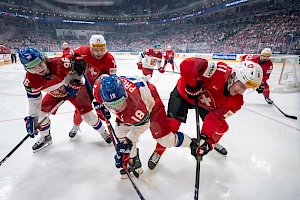
The whole of the Czech Republic is riding a wave of euphoria. The victory of the national ice hockey team at the World Championships at home has sent the whole country into a collective frenzy of joy. The public television recorded an incredible 76 percent of viewers for the final against Switzerland. Apart from public viewing in public squares, the streets were deserted.
The Czech Republic won a home World Cup for the first time in 39 years. But the country had to wait a long 14 years for its 13th title - if you count Czechoslovakia's six titles. The Czechs, led by superstar David Pastrňák, last won the World Cup in Germany in 2010. This means that the independent Czech Republic has now won more titles than Czechoslovakia. Ice hockey fans can look forward to a meeting between Germany and the Czech Republic at the 2025 World Cup in Denmark and Sweden. Both teams are already playing against each other in the group phase.
After their triumph, the ice hockey heroes were received by Prime Minister Petr Fiala, who awarded all the players the Karel Kramář Medal. It is the highest award that the Prime Minister can bestow. President Petr Pavel also received the ice hockey players. But there it was the other way round: the players dedicated a gold medal to him.
Garrison towns receive funding
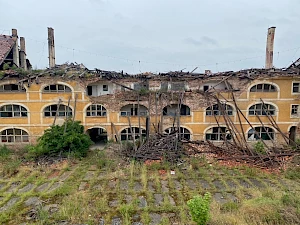
From June, the Czech historical garrison towns of Terezín (Theresienstadt) and Josefov (Josefsstadt) can apply for money from the Czech regional ministry's new program for the preservation and development of garrison towns. A total of 1.2 billion crowns (48 million euros) are available for the next ten years. A further 500 million crowns (20 million euros) can be applied for from the respective districts. In addition, the Ministry of Culture has launched an emergency program for the years 2024 to 2028. This is intended to renovate buildings that are at risk of collapse or have already partially collapsed.
Terezín has also presented plans for the use of the buildings. The former Žižka barracks in Terezín, which is already in danger of collapsing, are to be converted into apartments. The former hospital is to continue to be used by social and health facilities.
The garrison towns built during the Austro-Hungarian era have been struggling with the decaying structure of their buildings for some time. In Terezín, many buildings have been empty since the Czech army withdrew in the early 2000s and are not being preserved. Some of them have been gradually renovated with the help of subsidies. There are also ongoing problems with their use. The number of buildings is simply too high for the relatively small population.
Border controls are extended
Germany is once again extending the temporary controls at the borders with the Czech Republic, Poland and Switzerland. This time, the measure will be extended by six months, specifically until December 15th. Germany justified this by wanting to continue to restrict illegal migration and people smuggling. The controls were introduced in October last year. Most recently, they were extended by three months until June 15th.
The interior ministers of the Czech Republic and Saxony, Vít Rakušan and Armin Schuster, met in mid-May. Both ministers agreed to increase monitoring of illegal migration across the border
Gas transit fees are abolished
Germany has abolished the levy for gas transport for its neighboring countries. The levy will be abolished at the borders from next year, said State Secretary for Economic Affairs Sven Giegold in Brussels. The levy has been in force in Germany since autumn 2022. But it also affected import companies in other countries that obtain gas via German pipelines. Austria and the Czech Republic had therefore accused the federal government of hindering gas transport from ports in the Netherlands, for example, as an alternative to deliveries from Russia. They spoke of distortion of competition. The EU Commission then put pressure on Germany.
Domestically, the gas storage levy will remain in place – and could now rise further for German consumers.
The Czech Minister for Industry and Trade, Jozef Síkela (independent), has welcomed Germany's decision to abolish transit fees for natural gas. It will contribute to strengthening energy security in Central Europe, Síkela wrote on Thursday on X.
Financing of the Beneš Bridge has been clarified
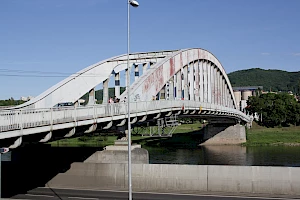
The renovation of the Beneš Bridge in Ústí nad Labem is getting closer. The Ústí District has received a promise of funding from the Integrated Regional Funding Program in the amount of 524 million crowns (almost 21 million euros). The district is contributing 92.5 million crowns (3.7 million euros) from its budget. This will ensure that the renovation of the aging bridge is financially secured. The construction of a temporary bridge for pedestrians and cyclists is currently laying the foundations for the work, which is due to begin next year. In June, the Ústí District will then present the concept of traffic measures for the complete closure of the bridge. The Beneš Bridge is one of two road bridges in the city of Ústí nad Labem. The steel bridge with the characteristic arch was built between 1934 and 1936 and named after the second president of Czechoslovakia.
The renovation has been overdue for some time, but has been postponed again and again. In the meantime, traffic on the bridge has been more restricted. For example, trolleybuses have not been allowed to pass each other on the bridge for years. The bridge has been closed to trucks for some time.
 The production of this newsletter is co-financed by tax revenue on the basis of the budget approved by the Saxon State Parliament.
The production of this newsletter is co-financed by tax revenue on the basis of the budget approved by the Saxon State Parliament.
(This is an automatic translation by Google Translator.)
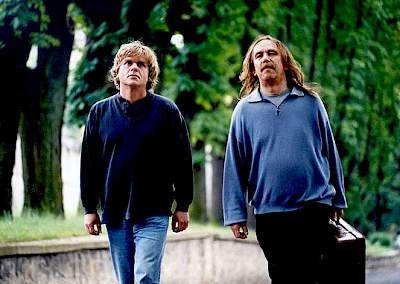
Petr Zelenka tells the story of Jaromír Nohavica, Karel Plíhal and the band Čechomor in an unconventional way, taking a documentary look at the period when the singer was recovering from his alcohol addiction. The film is enriched with interviews not only with the actors, but also with other interesting people, which undoubtedly include the musician Jaz Coleman and the Dutch documentary filmmaker Jan Holman (Jan Prent), who wants to catch Nohavica at the moment he starts drinking again. A skilled mystifier, Zelenka also has scenes in his film with a surreal, mystical - even supernatural - tone.
In 2002, the film won the main prize at the Karlovy Vary Film Festival as well as the Bohemian Lion film award in six categories.
More about the film and tickets
(This is an automatic translation by Google Translator.)
The Night of Churches is a really big deal in the Czech Republic, which is actually quite non-religious. This year it takes place on Friday, June 7th. 1,757 churches and prayer houses throughout the country are taking part. In the Ústí region there are 180.
The Night of the Churches is a good opportunity to visit places that are otherwise not so easy to get into. These include, for example , the monastery in Doksany , the oldest Premonstratensian monastery in Bohemia. In addition, most of the houses also have a special program for the evening.
(This is an automatic translation by Google Translator.)
Spektakuläre Kunst am Prager Kaufhaus Máj
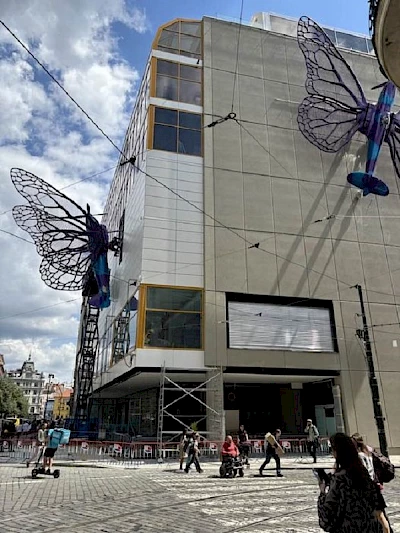
Zwei riesige Schmetterlinge, deren Körper an die Jagdflugzeuge Spitfire der Royal Air Force aus dem Zweiten Weltkrieg erinnern, sind gerade in Prag der Hingucker für Einheimische wie Touristen. Sie wurden in dieser Woche an der Fassade des bekannten Einkaufszentrums Máj in der Prager Neustadt installiert. Die beiden Objekte sind ein Werk des Künstlers David Černý. Sie hängen nicht nur an der Fassade, sondern bewegen ihre Flügel und leuchten in verschiedenen Farben. Nach einem Probebetrieb in dieser Woche sollen die Schmetterlinge ab nächster Woche ein Jahr hängen bleiben.
Die Objekte symbolisieren laut Černý die tschechoslowakischen Piloten, die während des Zweiten Weltkriegs in der britischen Luftwaffe gegen Hitler-Deutschland gekämpft hatten. Nach dem Ende des Krieges kehrte der Großteil von ihnen in die Heimat zurück und war nach dem Machtantritt der Kommunisten und des Übergangs zur sozialistischen Diktatur 1948 Verfolgung und Benachteiligung ausgesetzt. Nach 1990 wurden die Piloten rehabilitiert. Sie sind wichtiger Teil des tschechischen Selbstverständnisses, vergleichbar mit den Legionären im Ersten Weltkrieg, die später eine der Grundsäulen des neuen tschechoslowakischen Staates bildeten.
Die zwei riesigen Kunstwerke wurden laut Černý eigentlich für den neuen Sitz der NATO in Brüssel geschaffen. Dann wurde jedoch der Eigentümer des Kaufhauses Máj auf sie aufmerksam und bestellte zwei Schmetterlinge für die Fassade. Das Denkmalamt Prag bewilligte die Anbringung der Kunstwerke zunächst für die Dauer eines Jahres.
Černý gehört zu den bekanntesten Künstlern Tschechiens. Auch seine Werke sind bekannt und beliebt. Zu ihnen zählt der Trabant auf Beinen (unter anderem in der Deutschen Botschaft Prag), die kriechenden Babys (am Fernsehturm Prag) sowie der in sich drehende Kopf Franz Kafkas (im Hof der Bühne Neue Szene/Nová Scéna des Nationaltheaters/Národní divadlo).
Kleiner E-Auto-Boom in Tschechien
In Tschechien wurden im April um ein Viertel mehr Elektroautos verkauft als im Vorjahresmonat. Damit steht die Entwicklung im Kontrast zum rückläufigen Interesse in Deutschland und anderswo in Europa. Doch der kleine Boom hat einen Grund: Tschechien zahlt seit März je Auto bis zu 200.000 Kronen (8.000 Euro) Kaufprämie für die Anschaffung eines Elektroautos. Den Zuschuss können allerdings nur Gewerbetreibende und Firmen beantragen. Bedingung ist ein Mindestpreis von 300.000 Kronen (12.000 Euro). Maximal darf das Auto 1,5 Millionen Kronen kosten (60.000 Euro).
Bis zum 21. Mai wurden laut Tageszeitung Hospodářské noviny Zuschüsse für 1.932 Autos beantragt, darunter 38 LKWs. Insgesamt beinhaltet das Förderprogramm, das aus Geldern der EU-Kommission aufgelegt wurde, Mittel für 4.055 Autos. Experten gehen davon aus, dass die Mittel innerhalb weniger Monate ausgeschöpft sein werden. Das mit Abstand größte Interesse verzeichnet die Národní rozvojová banka (NRB - Nationale Entwicklungsbank) an Autos der Marke Tesla. Auf Tesla entfielen über 1.000 Anträge. Mit großem Abstand folgen Volvo (192 Anträge), Volkswagen (99 Anträge) und Škoda (99 Anträge).
Für den stotternden Elektroautomarkt in Tschechien dürfte die Förderung nur ein kleines Strohfeuer bewirken. Elektroautos haben am Neuwagenmarkt in Tschechien bisher nur einen Anteil von 2,5 Prozent. Die Nachfrage war zudem in den letzten Monaten rückläufig. Erst im April stieg sie wieder über den Vorjahreswert.
60. Beethoven-Festival in Teplice
Wie beim berühmten Musikfestival Prager Frühling erklang in diesem Jahr auch bei der Eröffnung des Beethoven-Festivals am Donnerstag in Teplice (Teplitz) der Zyklus „Má vlast“ (Mein Vaterland) von Bedřich Smetana. Damit verneigt sich der 60. Festivaljahrgang vor dem Klassiker der tschechischen Musik, dessen Geburtstag sich am 2. März dieses Jahres zum 200. Mal jährte. Die berühmte Komposition kam in der langen Geschichte des Festivals erst zum zweiten Mal zur Aufführung. Das restliche Programm erweist aber auch Namensgeber Ludwig van Beethoven die Ehre, der zweimal in Teplice zur Kur weilte. Auf dem Programm stehen unter anderem sein drittes Klavierkonzert in c-Moll, die Große Fuge in B-Dur und sein Streichquartett Nummer 8 in e-Moll. Zur Aufführung kommen des weiteren Werke von Gershwin, Dvořák, Bruckner und Janáček.
In den vier Festivalwochen finden insgesamt 18 Konzerte an 10 verschiedenen Orten statt. In Teplice erklingen die Konzerte in diesem Jahr im Krušnohorské divadlo (Erzgebirgstheater), das seinen 100. Geburtstag feiert. Es ist auch das Ausweichquartier für die Nordböhmische Philharmonie, die sonst ihren Konzertsaal im Kulturhaus hat, das gerade saniert wird. Weitere Konzertorte sind unter anderem das Schloss Jezeří (Eisenberg), Děčín (Tetschen) und Most (Brüx). Das Abschlusskonzert findet am 20. Juni im Erzgebirgstheater statt, wo die Oper "Der Bergmönch" von Josef Wolfram zur szenischen Aufführung kommt.
Präsident Pavel leicht verletzt nach Motorradunfall
Kurzer Schreckmoment Mitte der Woche: Der tschechische Präsident Petr Pavel erlitt einen Motorradunfall. Die Verletzungen seien nicht ernst, trotzdem wurde der Präsident im Krankenhaus behandelt, das er am Freitag wieder verlassen konnte. Der Präsident kuriert seine leichte Verletzung nun zu Hause aus, hieß es aus der Präsidialkanzlei.
Pavel ist als leidenschaftlicher Motorradfahrer bekannt, der seinem Hobby auch nach seiner Amtseinführung vor über einem Jahr weiter nachgeht. Der Unfall soll sich laut Tageszeitung Deník N auf einer Rennstrecke im Mittelböhmischen Bezirk zugetragen haben. Der genaue Ort wurde nicht bekannt gegeben.
Präsidentensprecher Vít Kolář geht davon aus, dass der Präsident sein geplantes Programm fortsetzen kann. Das betrifft unter anderem eine Auslandsreise.
Teplice zeigt Ausstellung über den Hohnsteiner Kasper
An den legendären Puppenspieler Harald Schwarz erinnert derzeit eine Ausstellung im Regionalmuseum Teplice (Teplitz). Schwarz wurde am 13. April in Teplice-Šanov geboren. Sein Interesse am Puppenspiel führte ihn in den 1930er Jahren nach Hohnstein, wo er noch unter Max Jakob lernte. Von dort konnte er nach 1945 nicht mehr zu seinen Eltern nach Teplice zurück. Für drei Jahre übernahm er das zweite Hohnsteiner Kaspertheater, mit dem er 1948 nach Essen übersiedelte, wo er die Tradition fortsetzte. Schwarz blieb zeitlebens seiner Heimat verbunden. Mit dem Prager Puppenmacher Václav Havlík knüpfte er in den 1960er Jahren eine Zusammenarbeit. Havlík stattete die Stücke von Schwarz mit seinen Puppen aus, die jedoch im Unterschied zu den klassischen Hohnsteiner Puppen einen ganz eigenen Stil begründeten. Ab 1990 trat Schwarz wieder regelmäßig in Tschechien auf und spielte in tschechischer Sprache. 1995 starb er kurz vor einem Auftritt in Svitavy.
Die Ausstellung ist bis zum 30. August zu sehen. Autor ist Markus Dorner, der die Ausstellung gemeinsam mit dem Museum für PuppentheaterKultur in Bad Kreuznach entwickelte. Geöffnet ist von Dienstag bis Freitag 13-17 Uhr und am Wochenende von 10-12 und 13-17 Uhr. Am 2. Juni kommt es im Rokoko-Saal zum Aufeinandertreffen von Hohnstein mit den tschechischen Klassikern Spejbl und Hurvínek. Es spielen der Kurator der Ausstellung Markus Dorner aus Neustadt an der Weinstraße und die Prager Puppenspieler Martin Klásek und Michal Barták. Schon an diesem Wochenende lädt Hohnstein wieder zum jährlichen Puppenspielfest ein.
Neue Elbfähre zum Kult-Freibad
In Ústí nad Labem (Aussig) hat eine neue Fähre über die Elbe ihre Fahrt aufgenommen. Sie verbindet den Stadtteil Vaňov mit dem Freibad in Brná. Die Fähre pendelt täglich von 8 bis 18 Uhr. In den Sommerferien soll der Betrieb auf 20 Uhr ausgeweitet werden.
 Die Erstellung dieses Newsletters wird mitfinanziert durch Steuermittel auf der Grundlage des vom Sächsischen Landtag beschlossenen Haushalts.
Die Erstellung dieses Newsletters wird mitfinanziert durch Steuermittel auf der Grundlage des vom Sächsischen Landtag beschlossenen Haushalts.
Partial confession in arson trial
The trial for the large forest fire in Saxon-Bohemian Switzerland in the summer of 2022 began on Thursday at the District Court in Ústí nad Labem. The accused is former national park ranger Jiří L. He confessed right at the start that he had set smaller fires last year. This included the historic lodge on Vlčí hora (Wolfsberg) near Krásná Lípa (Schönlinde). The lodge burned down completely. The observation tower was also damaged in the fire.
The defendant continued to deny having started the large forest fire in Bohemian Switzerland in the summer of 2022. However, this is what the prosecution accuses him of. The defendant had admitted to the arson during a police interrogation, but later retracted it.
The trial was interrupted to obtain another psychiatric report. The court also did not accept the confession because there was uncertainty about the defendant's state of health. The defendant suffers from mental illness.
Wolfsberg Tower reopened
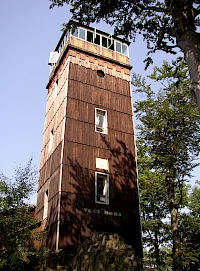 Last weekend, the observation tower on Vlčí hora (Wolfsberg) was ceremoniously reopened. It had been extensively renovated after a fire a year ago. The reopening coincided with the tower's 135th anniversary. The tower is the oldest in the Šluknov area and is popular because of its extensive view as far as the Giant Mountains.
Last weekend, the observation tower on Vlčí hora (Wolfsberg) was ceremoniously reopened. It had been extensively renovated after a fire a year ago. The reopening coincided with the tower's 135th anniversary. The tower is the oldest in the Šluknov area and is popular because of its extensive view as far as the Giant Mountains.
Police report more violations in motorway tunnel
The Czech Panenská Tunnel in the Ore Mountains on the motorway from Dresden to Prague is increasingly becoming a gold mine. The responsible municipal authorities of Ústí nad Labem (Aussig) reported almost 85,000 violations of the speed limit last year. The speed limit in the tunnel and in the Libouchec tunnel further towards Prague is 80 km/h. The Panenská Tunnel has a system for measuring speed using so-called section control. This measures an entire stretch of road and not just a single point.
According to the figures, the officials had an average of over 230 cases on their desks every day. The city therefore plans to strengthen the department and hire additional staff soon. This year, almost 20,000 violations have been identified by the end of April. This is particularly good news for the city's coffers: in 2023 up to the end of April this year, the magistrate collected around 44 million krone (1.76 million euros) in fines, including many notices sent to Germany.
On the D8 motorway, as the A17 is called in the Czech Republic, there are two more tunnels in the low mountain range, the Radejčín tunnel and the Prackovice tunnel. The city council of Lovosice (Lobositz) deals with the fines there.
Traffic violations have increased dramatically in the city of Ústí. While there were almost 3,900 violations last year, this year there have already been over 5,500. In particular, illegal parking has been punished more frequently. This is also due to a stricter approach.
Museum Ústí wins prize
The City Museum in Ústí nad Labem has won the most important museum award in the Czech Republic. The "Gloria Musaealis" award for 2023 in the category of Museum of the Year was awarded to the research project "Database of old quarries in the area of the Bohemian Switzerland National Park and the Elbe Sandstone Mountains Protected Landscape Area". The project, which also included the special exhibition on sandstone, was recognized as an example of applied research with a major social impact. The project was carried out in cooperation with the Purkyně University (UJEP) in Ústí.
The award ceremony was very successful for the Ústí Region. The North Bohemian Gallery of Fine Arts in Litoměřice and the Gallery of Modern Art in Roudnice nad Labem were also recognized for an exhibition and a publication. The Gallery of Fine Arts received the special prize in the category of "Museum Publications" for the volume "Pious Morning: The Art of Seeing / Mystics, Esoterics, Automation in Czech Fine Arts". The Gallery in Roudnice received second prize in the category of Museum Exhibition for the exhibition "The Principle of Heraclitus: 100 Years of Coal in Czech Art".
If you would like to receive our weekly review regularly in your email inbox, sign up for our newsletter.
To the newsletter registration
The production of this newsletter is co-financed by tax revenue on the basis of the budget approved by the Saxon State Parliament.
(This is an automatic translation by Google Translator.)
 This year marks 20 years since the Czech Republic joined the European Union. One of the main benefits that EU membership has brought is access to EU funding. Cohesion policy supports not only projects on Czech territory, but also initiatives that strengthen cross-border relations. Over the past 20 years, the Czech Republic has invested billions in joint projects with Saxony. How do the regional partners assess this cooperation? And how do they envision the next 20 years?
This year marks 20 years since the Czech Republic joined the European Union. One of the main benefits that EU membership has brought is access to EU funding. Cohesion policy supports not only projects on Czech territory, but also initiatives that strengthen cross-border relations. Over the past 20 years, the Czech Republic has invested billions in joint projects with Saxony. How do the regional partners assess this cooperation? And how do they envision the next 20 years?
- What is the benefit of cross-border cooperation between the Czech Republic as a "new" EU member state and Germany
- as a "long-standing" EU member state?
- How has the role of the Czech Republic in cross-border cooperation developed over the last 20 years in the EU?
- How do the regional partners assess this cooperation? And how do they envisage it in the future?
- What has proven successful in the collaboration over the years? What have been the successes of the collaboration so far? And what should be improved?
- become?
- Which lighthouse projects are financed by the Interreg programme? And which projects are in the preparation phase?
Elke Zepak, Managing Director of the Erzgebirge Euroregion, and Vladimír Lipský, Managing Director of the Elbe/Labe Euroregion, have been invited to take part in the discussion.
The event is organised by the European media network EURACTIV.
You can find more information about the event in this flyer . You can register here .
(This is an automatic translation by Google Translator.)
Czech Republic closes first open-cast mine
The phase-out of coal in the Czech Republic is approaching. The first open-cast mine to close in the coming weeks is the ČSA open-cast mine south of Horní Jiřetín. By July, the open-cast mining company Severní energetická plans to lay off 485 employees, mainly in technical positions. The employees will receive severance pay amounting to eight times their monthly salary. Some of those affected are already of retirement age.
Coal mining will initially cease. 150 employees will remain in the mine. In the event of an emergency next winter, coal mining could be restarted for a few months. For this purpose, employees could be temporarily withdrawn from the second active opencast mine, Vršany, west of Most. However, no new employees will be hired in this case. And if it does come to that, it will be over for good next spring. Because all the coal that would still be in the ground is protected by a government decision from 1991. According to this, no more towns or communities may fall victim to coal. Further mining would inevitably affect the towns of Horní Jiřetín and partly also Litvínov. There are still 750 million tonnes of brown coal stored there. In 2015, the then government finally confirmed the 1991 decision and the future began for Horní Jiřetín.
The Czech Republic plans to phase out coal by 2035. Until then, mining will continue in Most, Sokolov, Chomutov and Bílina.
Chemnitz christens tram "Ústí nad Labem"

Ústí nad Labem and Chemnitz have been twinned since 1970. This is now also reflected in the Chemnitz tram, which has been named after the northern Bohemian city. On the occasion of Europe Day on 9 May and the 20th anniversary of the EU's eastward expansion in 2004, since which the Czech Republic has also been a member of the community, the tram's godfather, Ústí's mayor Petr Nedvědický, together with Chemnitz's mayor Sven Schulze, presented the new name of the Škoda tram with the number 921 on Friday afternoon. This is already the thirteenth christening of a Chemnitz tram, most of which are named after the twelve twin cities. In their welcoming speeches, Schulze and Nedvědický emphasised the importance of the partnership, which will be celebrating its 55th anniversary next year, when Chemnitz will be the European Capital of Culture. In his speech, Nedvědický also promised to "repay" his city in an appropriate manner in the near future for this great honor. David Joram, head of vehicle service at Chemnitzer Verkehrs-AG, also emphasized that in 2018 Chemnitz was the first city in Germany to order trams from the neighboring Czech Republic since reunification. Several German transport companies have now joined this development.
Soon trains to Krupka again
Trains are expected to run from Děčín to Krupka again this year. The rail network administration Správa železnic (SŽ) plans to renovate the section from Telnice to Krupka in the coming months. This will provide a direct rail connection to the valley station of the chairlift to the Mosquito Tower and to the UNESCO old town of Krupka.
The Ice Hockey World Championship starts in the Czech Republic
The most important sporting event in the Czech Republic is still the annual Ice Hockey World Championship. Every May, hearts beat faster and the whole nation hopes for nothing other than the title. This year, the Czech Republic is hosting the World Championship for the first time in nine years and expectations are accordingly even higher. The World Championship began on Friday with the first games, Norway against Switzerland and Slovakia against Germany. In the evening, the Czech Republic played its first game in the sold-out Prague O2 Arena against Finland.
Whether the Czech Republic will actually win another World Cup title will be decided in the final on May 26th at the latest. One of the toughest competitors could be Germany, who finished runners-up a year ago and thus did better than the traditionally stronger Czechs for the first time. The Czech Republic last won a bronze medal two years ago. The last World Cup title was 14 years ago. Back then, the Czech Republic triumphed in Germany. Winning a home World Cup is not that common, by the way. But two years ago, the Finns showed the Czechs how to do it and won at home.
The production of this newsletter is co-financed by tax revenue on the basis of the budget approved by the Saxon State Parliament.
(This is an automatic translation by Google Translator.)
Hřensko's new mayor wants to close border huts
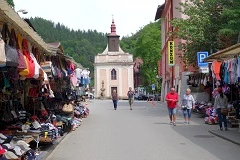
The border town of Hřensko will be run by women in the future. Kateřina Horáková was elected as the new mayor on Monday. Her deputy, Alena Pačáková, is also a woman. Horáková succeeds Zdeněk Pánek, who resigned at the end of the year and was mayor of the municipality for many years. Pačáková replaces the previous deputy Robert Mareš, who had temporarily led the municipality since the end of the year and has now resigned not only as deputy mayor but also as municipal representative.
Horáková takes over the office at a difficult time. For years, Hřensko was able to rely on a buoyant income from the operation of boat trips in the Edmund Gorge. But since the major forest fire in the summer of 2022, the gorge has been closed due to the risk of trees breaking. As a result, Hřensko has already had to lay off employees. Only the smaller Wild Gorge, which is more difficult to reach, remains open for tourist boat trips. It is not possible to say when the Edmund Gorge will open. A few weeks ago, the national park announced that it would remain closed for at least another three years.
The first goal for the newly elected mayor is therefore to negotiate with the national park about opening the gorge. The new mayor also wants to introduce parking meters in the municipal office in order to reduce the costs of parking space management.
Horáková said her second major goal was to reduce the number of stalls where mainly Vietnamese traders sell their sometimes wild mix of goods. She cited safety as the reason. Some of the stalls make it impossible for fire engines and ambulances to get through. But she also hinted that the stalls, where counterfeits and fakes have repeatedly been confiscated during checks, where right-wing extremist items are also offered for sale and which in the past have also turned out to be a transshipment point for drugs, do not fit the image of the community that she wants. "We want more tourists to visit us. That's why we will do everything we can to ensure that our village finally arrives in the 21st century. So that visitors like it here," said Horáková.
Jeschken cable car is being extended
The Liberec city council has decided. In the future, a cable car with just one large cabin suspended from two cables will lead up to the local mountain, Ještěd. At the same time, the city representatives decided to extend the cable car by 770 meters to the tram terminus in Horní Hanychov. The old cable car was 1.2 kilometers long.
The representatives made their decision based on a feasibility study. According to this, a circular variant with several gondolas would have been somewhat cheaper to build, but the city representatives were also guided by visual considerations. A cable car with circular gondolas would not suit Jeschken, they said.
However, it will still be some time before Liberec's local mountain can be reached by cable car again. Optimistic forecasts suggest that this will happen by 2029.
Pirna students translate fate of a Winton child
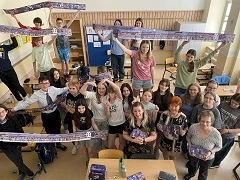
For three years now, a large, colorful mural has been located in a once dark passageway at Ústí nad Labem (Aussig) main train station. It tells the story of the unusual life of Ruth Hálová. Shortly after its completion, the mural was even viewed by Federal President Frank-Walter Steinmeier and his wife Elke Büdenbender, who made a special stopover in Ústí on their trip to the neighboring country. Recently, this mural, in the form of a leaflet, was the subject of a lesson for a German-Czech class at the binational Schiller Gymnasium in Pirna. "Ruth came from Český Krumlov in southern Bohemia. She was one of the 669 Jewish children who were rescued and brought to Great Britain shortly before the Second World War on the initiative of the Briton Nicholas Winton. (This heroic act is commemorated in the currently running film "One Life" starring Anthony Hopkins.) After the war, Ruth settled in Ústí and led a team that developed vaccines," explained Michaela Valášková, who had the idea for the mural and also for the leaflet that resulted from it.
The students' task is now to translate the leaflet into German. Ruth Hálová's story is not one that only has to do with Ústí. "It has a universal dimension that appealed to our Czech and German students," says class teacher Jana Neuper, adding: "Thanks to the translation, they are acquiring new skills that will help them in their further development." Work is still being done diligently on the translation. As soon as it is finished, a German leaflet version will of course be printed.
The mural and leaflet were created as part of the "Unknown Heroes" project and are the work of the artists Adéla Bierbaumer and Magdalena Gurská. The project presents the stories of people who were born in Ústí or who lived there and made history, sometimes later, when they no longer lived in Ústí, in public spaces in Ústí. In this way, works of art have already been created in honour of the graphic artist Heinz Edelmann, the illustrator and creator of the famous Beatles film "Yellow Submarine", or the nuclear physicist Lilli Hornig, who was involved in the development of the first atomic bomb in America and campaigned throughout her life for more women in science.
Steinmeier and von der Leyen in Prague
On May 1st 20 years ago, eight Central and Eastern European countries joined the European Union together with Malta and Cyprus. This largest wave of accession in the history of the European Union is therefore also called the EU's eastward enlargement. This week, two important politicians were in Prague: Federal President Frank-Walter Steinmeier took part in the anniversary celebrations. He called the accession an "epochal turning point". Commission President Ursula von der Leyen also paid tribute to the historic date with her visit. For both of them, the war against Ukraine was also the dominant topic. Steinmeier, together with his counterpart, Czech President Petr Pavel, emphasized the ongoing support for Ukraine. "Our solidarity has no expiration date," said Steinmeier. Ursula von der Leyen, who is running for a second term, also visited Czech arms manufacturers, whom she thanked for their deliveries to Ukraine.
The production of this newsletter is co-financed by tax revenue on the basis of the budget approved by the Saxon State Parliament.
(This is an automatic translation by Google Translator.)
April 2024
The situation of displaced persons and refugees from the former German eastern provinces and settlement areas of East Central Europe who had settled in the Soviet occupation zone/the GDR differed in important respects from that of their compatriots in the West. One crucial aspect was that the states in which their former homeland was located were among the "friendly brother countries" of the socialist camp and the people living there were considered friendly peoples. Refugees and displaced persons in the GDR were thus able to return to their old homeland in Bohemia or Silesia somewhat earlier and against a different political background than those in the Federal Republic.
Hundreds of thousands more GDR citizens traveled to Czechoslovakia and Poland on holiday or for business and met people there who often only arrived after 1945. For the refugees and displaced persons, such trips were always also trips into the past, to their former homeland, to the graves of their ancestors, to the houses in which they once lived and where other people now lived. Later, this was also possible for people from the Federal Republic, who - unlike those from the GDR - were able to speak publicly about it after their return and often did so in writing, which is why a lot of information is already available on this. Since this was not possible in the GDR, less is known about it.
This fact, often mentioned by those affected, has so far received little attention in research and in public. Encounters with Czech and Polish "new settlers" and their views on the former residents have also been sparsely investigated in this context. The conference is dedicated to these stories in the previously predominantly German-populated areas of Czechoslovakia and takes a comparative look at the situation in the People's Republic of Poland. More than 35 years after the fall of the Iron Curtain, we also want to take a look at previous reconciliation initiatives from Germany, Poland and the Czech Republic and talk to practitioners of cross-border cooperation about the future of understanding.
More about the conference and registration
This event is a cooperation project of the Deutsche Gesellschaft e. V. and the Euroregion Elbe/Labe.
The project is funded by the Federal Ministry of the Interior and Home Affairs based on a resolution of the German Bundestag, the Small Projects Fund in the Euroregion Elbe/Labe (applied for) and the Institut für Kultur und Geschichte der Deutschen in Nordosteuropa (IKGN) e.V. – Nordost-Institut (funded by the Federal Government Commissioner for Culture and the Media based on a resolution of the German Bundestag).
Roma memorial Lety opens
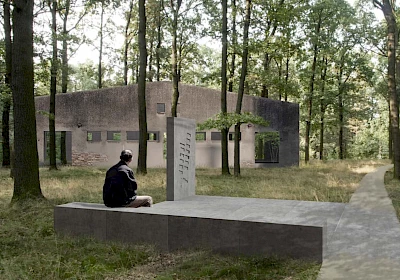
A memorial to the Porajmos, the genocide of the Roma under National Socialism, was opened in Lety in southern Bohemia. Both President Petr Pavel and Prime Minister Petr Fiala spoke at the inauguration ceremony. The memorial, which will be open to the public from May 12, commemorates a concentration camp that was set up here for Roma from the Czech Republic during the years of National Socialist occupation. A labor camp primarily for Roma had previously stood on the same site.
After 1945, the place was forgotten, and later a pig farm was built. Since the Velvet Revolution, there have been efforts - also encouraged by the then President Václav Havel - to set up a reverent place of remembrance. But the respective governments refused to close the pig farm. For a long time, the government did not want to acknowledge that the Roma had been genocide, let alone that it was its own fault. This lack of interest was also due to the fact that Roma in the Czech Republic still have only a small lobby and are largely socially excluded.
It was not until 2018 that the state agreed to buy the pig farm. In 2022, the demolition was completed and construction of the memorial could begin. It is affiliated with the Museum of Roma Culture in Brno.
1,308 Roma, both old and children, men and women, were held in the camp between August 1942 and May 1943, 327 died and over 500 were murdered in concentration camps. In Hodonín u Kunštátu in Moravia there was a second camp that served as a holiday camp after 1945. A small memorial had already been set up there. You can find out more about the history of the camp in Lety at www.holocaust.cz .
New location for Czech lithium production
The lithium in the Ore Mountains has also created a gold rush atmosphere in the Czech Republic. The raw material is to be mined in the old mining town of Cínovec. The Czech Republic hopes that this will give it independence from the world market in this important area and enable it to move into the technological forefront. But not much has happened for years. The Geomet company was taken over by the majority state-owned energy company ČEZ. But mining is still a long way off.
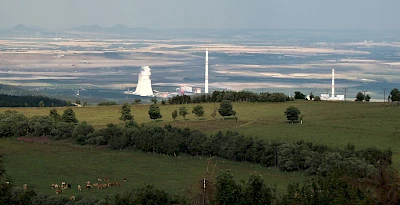
Now Geomet has even had to accept a setback. Due to protests from local residents, the company gave up the desired location for the lithium processing plant in the town of Újezdeček, south of Dubí, and decided to build the plant in Prunéřov, west of Chomutov.
Residents had been protesting against the plant in Újezdeček for two years. The residents of the small settlement of Dukla in particular were afraid of the plant, which would have bordered on their property. For two years they fought a David versus Goliath battle. Geomet always claimed that Újezdeček was the best location. Criticism from district administrator Jan Schiller was certainly crucial to the success of the protest. Other regional and local politicians also sided with the residents. Geomet was repeatedly criticized for its information policy.
Now the residents of the Dukla settlement can celebrate. Geomet now wants to transport the mined lithium to Prunéřov by train. Újezdeček is only planned as a transfer point for the ore to the railway. There is a ČEZ coal-fired power plant in Prunéřov. Geomet wants to locate both the mechanical and chemical processing of lithium there. Up to 60 lithium trains per week are planned from Újezdeček to Prunéřov.
When lithium mining will begin in the Czech Ore Mountains is still up in the air. A feasibility study, which was supposed to be available at the end of 2023, has not yet been completed. The only thing that is certain is that mining will take place underground. The transport of the ore from the shaft to the transshipment point in Újezdeček is also still an open question. Most recently, two options were considered: a transport lift or a conveyor belt. Geomet plans to mine over 2 million tons of ore per year, which will be processed into around 25,000 tons of lithium.
Žatec wins another title
A year ago, the hop town of Žatec was left empty-handed. Then, on September 18, it was added to the UNESCO World Heritage List. Exactly seven months later, Žatec was also named a "Historic Town of the Czech Republic." The town was thus recognized for its long-term, successful renovation of the historic town center and individual buildings. The jury particularly emphasized that, in addition to using state funding, the town also succeeds in motivating private homeowners to carry out renovations in accordance with the monument's preservation requirements.
Žatec won the coveted title at the eighth attempt. The winners in each district always make it to the final. Žatec won the Ústí district for the eighth time in a row in 2023. The nationwide winner will receive 1 million crowns (40,000 euros) for monument preservation.
New Elbe bridges for pedestrians and cyclists
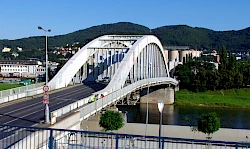
Construction of a new bridge for pedestrians and cyclists has begun in Ústí. The new Elbe crossing is being built downstream of the Beneš Bridge. It is a temporary solution for the period of the renovation of the Beneš Bridge. The temporary solution is to be three meters wide and to be completed by next winter. All supply lines that currently run over the Beneš Bridge will also be diverted over the temporary bridge. The long-overdue renovation of the Beneš Bridge is to be completed in October 2026.
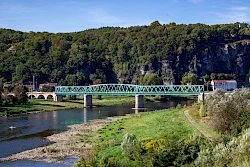
A bridge for pedestrians and cyclists is also being built in Děčín. It will be built onto the railway bridge. Unlike the one in Ústí, however, it will not be a temporary bridge, but will make it easier for pedestrians and cyclists to cross. In future, this will also make crossing the Elbe easier for all those who are using the Elbe cycle path. Until now, they had to take the inconvenient route over the Tyrš Bridge.
The production of this newsletter is co-financed by tax revenue on the basis of the budget approved by the Saxon State Parliament.
(This is an automatic translation by Google Translator.)
School year 1945/1946: The students in a boys' class are so undisciplined that they send their teacher to the madhouse. Then a new teacher takes over and fascinates the boys: on the one hand, military uniform and caning with the cane, on the other hand, he makes the tough boys cry with his violin playing to the story of Jan Hus and amazes them with his stories from the various war fronts. If it weren't for his uncontrollable passion for women...
This film by father and son Svěrák is probably a classic example of the Czech film that many people in Germany love: lovingly drawn characters in a rather rural setting who experience different, more or less everyday stories, and all of this is staged without any great sensationalism. The background is an important time in Czech history, which was certainly anything but easy, but here it is given a conciliatory sepia tone. The film is one of the most popular films of all time in the Czech Republic and is number 6 on the list at csfd.cz.
For Jan Svěrák, this was his first feature film as a director; his father Zdeněk Svěrák wrote the screenplay and acted in it. The film was nominated for the 1992 Oscar for Best Foreign Language Film.
(This is an automatic translation by Google Translator.)
100 years of the Ore Mountain Theatre Teplice
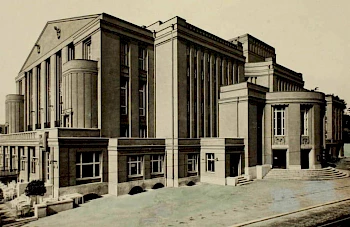
The spa town of Teplice is celebrating the 100th anniversary of the Ore Mountains Theatre (Krušnohorské divadlo). The monumental building on the edge of the spa park was ceremoniously opened as the "Teplitz-Schönau Municipal Theatre" on April 20, 1924. At the time, it was the largest theatre building outside of Prague. It was built in just under two years on the site of the previous building. It was destroyed in a fire in 1919. The current building is a Dresden co-production. The architectural competition was won by the Dresden architect with Bohemian roots, Rudolf Bitzan. He is known for the crematorium in Liberec (Reichenberg), designed the town hall in Freital-Döhlen and was also involved in the design for Leipzig Central Station. The interiors were designed by the Dresden artists Richard Guhr and Alexander Baranowsky.
Programs from the 1920s show a lively cultural life. The theater had three sections: opera, operetta and drama. Performances were performed at least once a day, sometimes several times. In addition to the large hall with over 700 seats, the theater had a small hall with 500 seats, a restaurant, a café and a cinema, as well as several other salons for dance events, for example. Due to the German-speaking majority of the population, performances were usually performed in German. At least once a month there was a Czech-language event. Many actors of Jewish descent also performed at the theater. Despite growing pressure from the fascist-minded Sudeten German Party, the directors managed to keep the Jewish actors, who made up about a third of the ensemble, until the Wehrmacht invaded the Sudetenland in 1938. In 1938 the theater not only lost its Jewish actors, but also some Germans quit their jobs. After 1945, the ethnic German population had to leave the country.
Today the theatre is run by the town of Teplice, which subsidises all venues under the roof of the cultural centre with 2 million euros every year. In addition to the modern cultural centre itself, this includes the Ore Mountains Theatre and, among others, the Zahradní dům (Garden House) near the castle. Today the theatre mainly hosts external productions, but cultural centre director Přemysl Šoba has announced four of his own premieres for the first time this year, partly supported by musicians from the Teplice Conservatory. As the cultural centre is currently being renovated, the Ore Mountains Theatre is also the venue for the North Bohemian Philharmonic this year. The Beethoven Festival in early summer will also take place in the Ore Mountains Theatre.
Interest in the European Union is increasing in the Czech Republic
On June 9, the people of the European Union will elect a new parliament. A Eurobarometer survey conducted in the Czech Republic in February suggests that voter turnout will be higher this time. According to the survey, 38 percent of eligible voters will go and vote. That may not be much for other countries. But in the Czech Republic, where turnout in EU elections has always been among the lowest, that would be a new record.
Interest in the European elections was already rising again before the last elections, after voter turnout had fallen to a historic low of 18.2 percent in 2014. After the Czech Republic joined the European Union on May 1 with nine other countries in Central and Eastern Europe and Southern Europe, voter turnout had always been just over 28 percent. In 2019, it returned to this level and even reached a new high of almost 29 percent.
When asked about priorities for the European elections, the Czech Republic's priorities are defense and security (45 percent), independence in energy supply and industrial production (40 percent) and the future of Europe (35 percent). This differs in some ways from the overall picture of all 27 EU states, where only defense and security are higher in priority. The issue of migration and asylum is also given greater weight in the Czech Republic (33 percent) than in the EU as a whole (24 percent).
There are more similarities in the values that the EU Parliament is to defend over the next five years. Peace and democracy are at the forefront here. While the Czech Republic places a little more emphasis on solidarity between EU states and regions and respect for national identities, cultures and traditions, the EU as a whole places greater emphasis on the protection of human rights and the rule of law.
When asked what the EU should focus on to strengthen its influence in the world, however, the picture is again mixed. Defence and security, as well as independence in the supply of energy and raw materials and infrastructure, are top priorities. In the Czech Republic, however, the emphasis is on strengthening the competitiveness of the economy and industry (40 percent/EU27: 27 percent). In contrast, the EU27 rate food supply and agriculture higher at 30 percent than Czech respondents (23 percent).
High-speed rail line: decision in June
While the route of the new high-speed rail line from Dresden to Prague has been clarified on the German side, the decision on the Czech side is still pending. The ball is currently in the Ústí district's court. The district office is evaluating over 600 statements. In particular, the section south of the Bohemian Central Mountains, through which the high-speed rail line is to be run via a tunnel, has still not been decided between three options. The exit of the Ore Mountains Base Tunnel on the Czech side is still controversial. But the railway infrastructure administration Správa železnic is pushing for a decision. "June is our big wish. Otherwise everything will be delayed - not just the Ore Mountains Tunnel, but also the Prague-Lovosice section, which is to be built first," says Pavel Hruška, head of planning at Správa železnic.
The district office is expected to have processed all 600 statements by June. After that, the members of the district parliament will have the final say. If no decision is reached, the Ministry of Transport wants to take over the process and force a decision. This will enable it to revise the building law. District administrator Jan Schiller (ANO) is opposed to such a course of action: "We have already struggled so intensively with all the affected communities. It would all have been in vain," said the district administrator. He is still hoping to find a compromise.
Whooping cough wave in Northern Bohemia
In recent weeks, there has been an increase in whooping cough cases in northern Bohemia. Last week, the Ústí District Hygiene Station reported an increase of 130 new cases. Most of them were registered in the Děčín District (27). The disease is also increasingly appearing in the Chomutov (25 cases) and Ústí (24 cases) districts. The prevalence in the district remains unchanged at 16 cases per 100,000 inhabitants. The disease is most prevalent in the 15-19 age group, with almost 92 cases per 100,000 inhabitants.
The production of this newsletter is co-financed by tax revenue on the basis of the budget approved by the Saxon State Parliament.
(This is an automatic translation by Google Translator.)
Overcoming language barriers is the most important and at the same time the most difficult task for all Saxon-Czech border regions. Immersing children in the neighboring language at an early stage is a special opportunity for the entire border region.
We have accepted this challenge as a project team of the INTERREG project “Neighbouring language from the beginning - Jazyk sousedů od začátku!” All Saxon-Czech Euroregions, the Saxon State Office for Neighbouring Language Education (LaNa) and TANDEM Pilsen Coordination Office for German-Czech Youth Exchange form a great team and were able to start the ambitious project in January 2024. We would like to design and implement the project together with you.
MONDAY AND AFTERNOON 29.04.2024
10 AM I 10 PM
Location: Library of the Ústí Region, Winston Churcilla 3, 400 01 Ústí nad Labem
Event language(s): German and Czech
 The project "Neighbouring language from the start" is funded with EU funds from the Saxony-Czech Republic cooperation programme 2021-2027.
The project "Neighbouring language from the start" is funded with EU funds from the Saxony-Czech Republic cooperation programme 2021-2027.
(This is an automatic translation by Google Translator.)
Funding for eight projects in the Elbe/Labe Euroregion approved
The Elbe/Labe Euroregion manages a small project fund filled with EU funds to support German-Czech projects. At today's meeting of the local steering committee in Děčín, eight project applications with a total funding volume of 69,236.80 euros were approved. These include, for example, holiday camps, sports games, joint excursions or cooperation between dog sports clubs. The applicants came from Sebnitz, Dolní Poustevna, Bad Gottleuba, Tisá, Teplice, Bannewitz, Krásná Lípa, Obercunnersdorf, Bärenstein, Česká Kamenice and Dresden.
You can find out more about the funding opportunities offered by the Small Projects Fund at www.elbelabe.eu/kpf . We would be delighted to receive many good project proposals. Please spread the word!
To the list of approved projects
Ústí District modernizes Rumburk Hospital
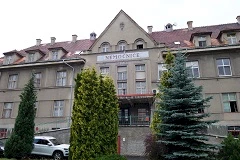
Five years ago, the hospital in Rumburk was still a nursing case. Insolvent and threatened with closure. Some departments were closed, there was not only a lack of money, but also of staff. In between there was the takeover by the hospital holding company of the Ústí district and the Covid pandemic, during which the hospital regained importance. Especially since the borders were temporarily closed and patients could no longer be cared for by Saxon clinics as once planned.
The situation for the hospital has now improved. In the coming years, the district will invest heavily again. The equivalent of 37.5 million euros is planned. The money will be used to renovate the polyclinic, i.e. the medical care center. A completely new emergency room will be built and the hospital will finally have its own helipad. The majority of the investments should be completed by 2027. The renovation of the main building will take a little longer.
The hospital, which cares for 50,000 people in the Schluchsee area, was due to be closed years ago. At the same time, negotiations were underway with facilities in neighboring Saxony that were waiting for patients from the Czech Republic. But the plan failed due to lack of funding.
Děčín acquires electric buses
Public transport in Děčín will change in the next few years. This will be achieved by purchasing new electric buses for the city lines. The city has already started a bidding process to purchase 20 electric buses. The first ten buses are expected to be delivered next year. The city will only pay a fraction of the price. The majority will be covered by subsidies from the European Union.
Děčín has been testing electric buses from various manufacturers for three years now. The decisive factor was whether the buses could also handle the mountainous terrain of the Elbe city. The result was positive. The transport company is only expecting one additional quick charge during the day.
Which company ultimately supplies the buses depends solely on the lowest price bid. The city also demands a guarantee for the batteries for the full 12-year lifespan.
In order to reduce emissions, Děčín has already purchased 21 natural gas-powered buses, whose operating costs rose sharply following the price increases after Corona and Russia's war against Ukraine. Děčín also has diesel buses in its fleet.
Unemployment highest in Northern Bohemia
Ústí nL Unemployment in the Ústí region remains the highest in the Czech Republic. In March, the employment offices reported an unemployment rate of six percent. That was two percentage points higher than the national average. However, the rate remained unchanged from February. 33,643 people were registered as unemployed compared to almost 11,000 vacancies.
The affair surrounding Bystron and the Czech newspaper Deník N
AfD politician Petr Bystron has been in the headlines for almost three weeks. He is said to have accepted money from the Russian propaganda portal Voice of Europe. Bystron denies this and the party executive of the Alternative for Germany has expressed its trust in him. But the longer the affair lasts and the more details and new findings become known, the more the politician becomes a burden for the AfD. After all, he is second on the list of candidates for the European elections in June. The name of the Czech newspaper Deník N is always mentioned in connection with Bystron. It was at the beginning and first made the allegations public.
This is no coincidence. After all, Bystron is a politician with Czech roots. Born in Olomouc in 1972, his family emigrated to Germany at the end of the 1980s. For several years now, he has had a meteoric rise in the AfD. Nevertheless, Czech media continue to write the politician's name in Czech. That means Petr remains Petr, but his surname is Bystroˇň, with a soft N at the end. His origins explain the great interest of the media in the Czech Republic in him. However, Czech media have very good sources, especially when it comes to researching Russian influence. Long before Russia's attack on Ukraine, the Czech secret service warned of the threat from Russia and its growing influence not only in the Czech Republic, but also in other parts of Europe. Czech journalists are also among the most active in Europe, researching Russian influence in networks with colleagues from other EU countries. It was no coincidence that a Europe-wide network designed to investigate Russian fake news was headed by a Czech journalist years ago.
Added to this is the long-standing investigative tradition and the growing media landscape in the Czech Republic, which has even grown in the last ten years. Deník N is the best example of this. The daily newspaper was founded when newspapers were closing elsewhere. It originated in Slovakia, where it quickly found readers and subscribers. It was so successful that after years it founded a branch in the Czech Republic. This is what has now set the Bystron affair in motion.
The production of this newsletter is co-financed by tax revenue on the basis of the budget approved by the Saxon State Parliament.
(This is an automatic translation by Google Translator.)
The Elbe/Labe Euroregion manages a small project fund filled with EU funds to support German-Czech projects. At today's meeting of the Local Steering Committee, eight project applications with a total funding volume of EUR 69,236.80 were approved.
Česká Kamenice has an astronomical clock again
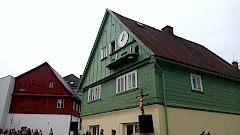
No visit to Prague is complete without a visit to the famous astronomical clock on the Old Town Square. Every hour on the hour, a huge crowd of people gathers to watch the spectacle of the apostles. A similar crowd formed on Easter Sunday in Česká Kamenice on Nerudova Street, which connects the main square with the pilgrimage church of the Virgin Mary. An astronomical clock was put into operation there. The 12 apostles can also be seen here. Two bell ringers, a skeleton and a knight complete the ensemble.
The astronomical clock was once built by a clockmaker to boost his business. But after 1945 he lost his business. What became of the clock is not known. But the place where the clock was once installed was still visible. The house on Nerudova has since been renovated and last year the town decided to install an astronomical clock again. Almost half of the money was raised through a fundraiser. The figures were made by the glass school in neighboring Kamenický Šenov.
Construction starts on the Eger cycle path
People have been talking about it for over ten years. The cycle path along the Ohře river, which has its source in Bavaria and is called the Eger there, and flows into the Elbe near Litoměřice. It is already signposted and quite a few people are already using it for cycling tours. But so far it has led along roads or forest and field paths. Some of the roads are very busy, and the forest and field paths are not always of a quality suitable for bicycles. Now the path is to have its own, mostly asphalted route. The Ústí District, as the developer, is already looking for companies to build the first sections. The first section is 3.8 kilometers long and is located between the towns of Litoměřice and Libochovice. The second section is five kilometers long and covers the stretch between Žatec and Kadaň. A total of 20 sections of cycle path are being built between the Ohře estuary and the border with the Karlovy Vary District.
German-language tours at Ústí Zoo
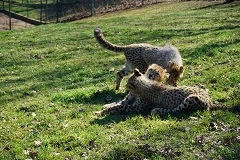
The zoo in Ústí nad Labem is particularly worthwhile right now. You have the unique opportunity to observe four cheetah cubs. The quadruplets are no longer very small, but at just over seven months old they are still very playful. Along with two others, they are the only cheetah cubs in Europe this year.
It is now possible to combine a visit to the zoo with an expert guided tour, even in German. The German volunteer Amelie Konzelmann has been working at the zoo since the autumn. She was introduced to the zoo by the Paritätische in Dresden, which has been active in German-Czech volunteer exchanges for years. Amelie Konzelmann did not acquire her knowledge of the zoo animals in Ústí, but came to the city on the Elbe with prior knowledge. The tours start this weekend at 10 a.m. and 1 p.m. Historical tours or night tours are also possible. Advance registration is required. All information, including contact details, can be found on the German version of the zoo's website. Tickets for the tour are available at the ticket office. Konzelmann also offers exciting educational programs for school classes on various topics such as "The food chain," "Behavioral biology" or "Illegal animal trade." They are designed for different age groups. More information can also be found on the website .
Day without haste
Take it easy for a day. The Czech Republic allows itself this once a year. On Wednesday, the day came. Everyone in the Czech Republic was called upon to slow down. This day was initiated by the Czech Insurance Association. The reason was the number of road deaths, which are often caused by excessive speed or inattentiveness resulting from haste. The day is therefore intended to remind people to stick to the speed limits on the roads and to drive stress-free.
But the day of no rush was not only about traffic. In Opava, the semi-final cup match between hosts Opava and favorites Sparta Prague began a few minutes later to mark the day. Theater performances also started later. Even the puppet show of the famous astronomical clock at Prague City Hall was stopped for a few minutes at 10 a.m. Instead, death rang the bell 138 times - once for every victim who died in traffic last year due to excessive speed.
The production of this newsletter is co-financed by tax revenue on the basis of the budget approved by the Saxon State Parliament.
(This is an automatic translation by Google Translator.)
March 2024
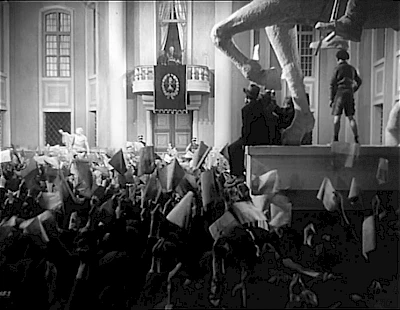
April begins on Easter Monday, which means that Wednesday is another Czech Film Wednesday. This time we are showing “Bílá nemoc” (The White Disease) from 1937.
This will be the oldest film so far at Czech Film Wednesday. The 1930s in Czechoslovakia were characterized by relatively shallow comedies, which is why suitable films from this decade are rare. “Bílá nemoc” stands out, which is certainly due to the original by the famous Karel Čapek.
About the content: A mysterious illness is raging in a totalitarian state where a strict marshal rules and threatens neighboring states with war. The marshal is supported by the arms magnate Baron Krog, and the propaganda minister is constantly preparing the population for war. Young people in particular, who are searching in vain for work, fanatically support the marshal and believe that a victorious war is the only way out of the gloomy situation.
Dr. Galén, a slum doctor, has found a cure for the white disease, but he does not want to give the formula to any government until it gives up weapons and commits to lasting world peace. He covers poor people in the suburbs and rich people seeking peace. He refuses to treat the infected Krog unless the conditions are met. The marshal rejects this. Instead, he starts war against the neighboring country. The crowds cheer, but things turn out differently than you might expect...
The film clearly takes up developments in neighboring Germany since 1933, which is also heading towards war. Czechoslovakia becomes the first victim of Hitler's war ambitions in 1938, just one year after the film, through the Munich Agreement and in 1939 through the final occupation. This makes the film also an important contemporary document.
More about the film and tickets
(This is an automatic translation by Google Translator.)
The Czech Republic celebrates Easter with a giant Easter egg
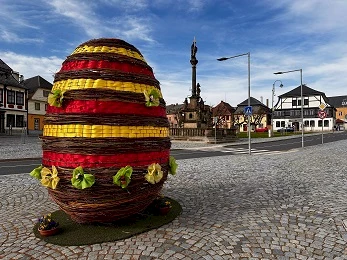
Easter is not only just around the corner, but in Jablonné v Podještědí, Czech Republic, it is a huge Easter egg in the middle of the main square. Only six kilometers from the border with Saxony, it has become a tourist attraction in recent days. Photos with the egg are eagerly shared on social networks. “The egg was made by eager craftsmen in the Heřmanice district in 80 hours of after-work work,” says Mayor Jiří Rýdl. It is around three meters high and is probably the largest egg around. It consists of a steel wire mesh through which willow branches and colored fabric panels have been woven. “We had already set it up last year, but only as a pure wire mesh. So the decorated Easter egg is a first,” the mayor continued. It can still be admired at least until Easter Monday. “We will definitely not take it down again on Tuesday, but will leave it there for a few days after Easter,” says Rýdl, given the great interest.
The Easter egg also has a tradition that is still alive today in the Czech Republic. It is considered a symbol of fertility. Colorfully decorated in many variations, it was traditionally presented on Easter Monday by women to men as they moved from house to house.
Railway lines are coming back to life
The tourist railway lines start the new season in the neighboring country on Good Friday. This also applies to train routes that are closed during the rest of the year. This applies, for example, to the popularly known Goat Railway from Děčín to Telnice, the Opárno Express from Litoměřice to Chotiměř in the Bohemian Central Mountains or the route from Ústí-Střekov to Zubrnice, which is also known as a museum village. The trains run on weekends and public holidays and the Elbe-Labe ticket is valid. Historic trains are used on most routes. The Elbe-Labe ticket is also valid on the tourist boat lines T91 to T93 on the Elbe from Ústí to Litoměřice or Hřensko. Timetables and other routes for the lines marked with a “T” can be found on the Ústí district website . Although the site is only in Czech, it is possible to navigate on the left via " Železniční linky " (rail lines) and " Lodní linky a přívozy " (ship lines and ferries).
Easter riding in Mikulášovice
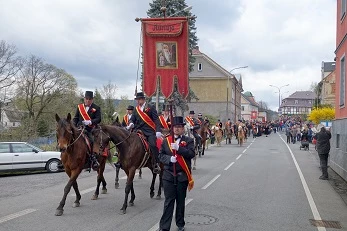
On Easter Sunday the Easter riders are also out and about among our Czech neighbors. The custom, which has been practiced again in Mikulášovice for several years, is originally a tradition of the German minority that still lives there. The procession with the horses starts immediately after Holy Mass, which begins at 10 a.m. in the Church of St. Nicholas.
NGOs criticize housing situation in Prague
Several Czech non-governmental organizations (NGOs) have published the results of a study that rates the housing situation in Prague as the worst in Europe. Nowhere else is accommodation as unaffordable as in the Czech capital, the study says. The NGOs are calling for municipal housing construction, which currently does not exist in Prague, as well as the regulation of rents.
The results of the study, which follows a comparable study in 2018, correspond to the assessment of economist Martin Červinka in the daily newspaper Hospodářské noviny. He points to the increasing purchase prices for private living space and the limited supply, which is further increasing prices. Housing construction had also come to a standstill in the Czech Republic due to skyrocketing construction prices. In addition, the Czech central bank had raised key interest rates significantly more than the European Central Bank, which increased costs for home buyers and also dampened the provision of new living space. The central bank has now made its first interest rate cut. But housing construction has not yet started again. Rents also remain at a high level.
Červinka points to data from the statistics office that Prague has grown by 100,000 residents in the last two years. Cell phone data suggests the number of residents is even higher than the official 1.38 million. The main reason behind this is the influx of Ukrainian refugees in recent years. At the same time, Červinka also viewed the situation positively. It is remarkable how the housing market has accommodated the influx of so many people in such a short time.
The creation of this newsletter is co-financed by tax revenue based on the budget approved by the Saxon state parliament.
(This is an automatic translation by Google Translator.)
Präsident Petr Pavel zu Besuch in Dresden
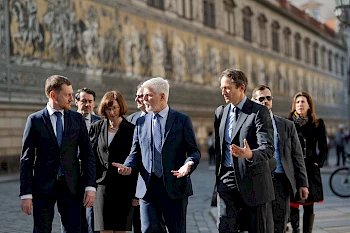
Am 15. März weilte der tschechische Präsident Petr Pavel in Dresden. Anlass war die Eröffnung der Ausstellung "Fragmente der Erinnerung" der Staatlichen Kunstsammlungen gemeinsam mit dem sächsischen Ministerpräsidenten Michael Kretschmer im Lipsius-Bau. Diesen traf Präsident Pavel zuvor zu Gesprächen über die sächsisch-tschechischen Beziehungen und die wirtschaftliche und kulturelle Zusammenarbeit (sicher auch über unsere Tschechisch-Deutschen Kulturtage). Abschließend stand ein Besuch im Dresdner Werk des Halbleiterherstellers GlobalFoundries auf dem Programm.
Ausstellung des Reliquienschatzes des Prager Veitsdoms im Lipsiusbau
Am 15. März wurde im Dresdner Lipsiusbau an der Brühlschen Terrasse die Ausstellung "Fragmente der Erinnerung" eröffnet (siehe oben), die bis zum 8. September zu sehen sein wird.
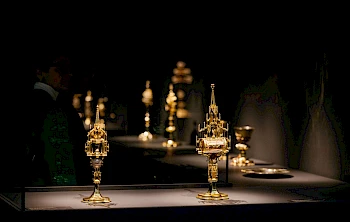
Im Zentrum steht der über Jahrhunderte gewachsene Reliquienschatz des Prager Veitsdoms – eine der bedeutsamsten Sammlungen von Belegstücken des christlichen Glaubens – der als heilig und wunderwirkend verehrt wurde. Die Ausstellung präsentiert diesen Schatz anhand 125 mittelalterlicher und frühneuzeitlicher Stücke zum ersten Mal in seiner Geschichte außerhalb seines ursprünglichen Bestimmungsortes.
Darüber hinaus eröffnen drei zeitgenössische Künstler zusätzliche Perspektiven auf das Thema des zivilisatorischen Gedächtnisses. Edmund de Waal regt mit keramischen Werken zur Reflexion über Geschichte an, die teilweise nur noch aus fragmentarischen Erinnerungen besteht. Josef Koudelka zeigt mit großformatigen Fotografien der Mauer zwischen Israel und der palästinensischen Westbank, wie diese Landschaft zerschnitten wird, in der die drei großen monotheistischen Weltreligionen ihre Wurzeln und sakralen Stätten haben. Der Film „In the Land of Drought“ von Julian Rosefeldt verwendet verlassene Filmkulissen, um Erinnerungen an die biblische Vorgeschichte und die Geschichte der Menschheit, vor allem im Nahen Osten und in Nordafrika, wachzurufen. Außerdem wendet sich der Film den realen Spuren der industriellen Vergangenheit Mitteleuropas mit großen Kratern und verlassenen Industriemaschinen zu, die heute zerstörte Landschaften prägen.
Ústí verabschiedet legendäre Škoda-Obusse
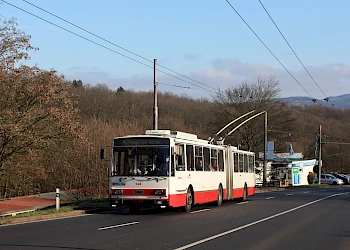
Das Straßennetz von Ústí nad Labem ist künftig um eine Attraktion ärmer, zumindest aus Sicht vieler Obusfreunde: Diese Woche verabschiedete der städtische Verkehrsbetrieb DPmÚL die legendären Škoda-Oberleitungsbusse vom Typ 15Tr. Die durch ihr eckiges Äußeres markanten Fahrzeuge fuhren seit Januar 1989 in der Stadt und wurden nun durch moderne, ebenfalls von Škoda/Solaris stammende Neufahrzeuge ersetzt. Diese verfügen zusätzlich über Hilfsantriebe auf Batteriebasis und ermöglichen daher, auch Linienabschnitte ohne Oberleitung zu befahren. Die letzten regulären Einsätze des Škoda 15Tr fanden bereits Ende Februar statt, doch diese Woche – also bis morgen! – fahren zwei bis zum Schluss aktive Exemplare noch ein letztes Mal im Rahmen einer Abschiedswoche auf verschiedenen Linien. Am Sonntag gibt es eine offizielle Abschiedsrundfahrt durch die Stadt, die jedoch bereits zwei Tage nach ihrer Veröffentlichung ausverkauft war. Das zeigt die Beliebtheit der kantigen Oldies.
Zwischen 1988 und 2004 wurden im Škoda-Werk in Ostrov nad Ohří knapp 500 Exemplare des 15Tr für zahlreiche Staaten des einstigen Ostblocks gefertigt. In Ústí fuhr mit insgesamt 77 Fahrzeugen die weltweit größte Flotte dieses Typs. Obusse verkehren in Ústí nad Labem seit 1988 und sind heute fester Bestandteil des lokalen ökologischen Verkehrskonzepts. Das Netz wurde in den 1990er und frühen 2000er Jahren erheblich erweitert. Die Topografie der Stadt mit ihren in Höhenlagen errichteten Neubaugebieten bietet optimale Voraussetzungen für die Nutzung dieses Verkehrsmittels.
Filmfestival »Jeden svět« gestartet
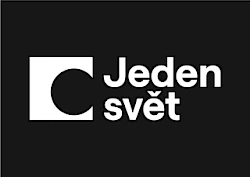 Am Mittwoch wurde in Prag das Menschenrechts-Filmfestival »Jeden svět« (Eine Welt) eröffnet. Das Festival wurde 1999 ins Leben gerufen und ist fester Bestandteil der Arbeit der international tätigen Hilfsorganisation "Člověk v tísni" (Mensch in Not). Heute ist das Festival das größte seiner Art weltweit.
Am Mittwoch wurde in Prag das Menschenrechts-Filmfestival »Jeden svět« (Eine Welt) eröffnet. Das Festival wurde 1999 ins Leben gerufen und ist fester Bestandteil der Arbeit der international tätigen Hilfsorganisation "Člověk v tísni" (Mensch in Not). Heute ist das Festival das größte seiner Art weltweit.
Präsentiert werden Dokumentarfilme über Menschenrechte aus aller Welt. Jedes Jahr kommen nicht nur Filmemacher aus verschiedenen Ländern der Welt dorthin, sondern auch Protagonisten und Verteidiger der Menschenrechte. Gespräche mit ihnen sind eine der Säulen des Programms.
Das Festival findet nicht nur in Prag statt, sondern in diesem Jahr in 47 weiteren Städten in ganz Tschechien. In unserer Region werden Filme in Ústí nad Labem (bis zum 23. März bei unseren Freunden vom Hraničář) und vom 10. bis 13. April in Děčín gezeigt.
Mehr Zugverbindungen nach Prag
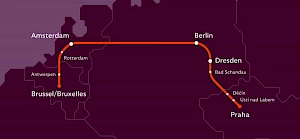
Ab dem 26. März startet das Unternehmen European Sleeper eine neue Nachtzugverbindung zwischen Prag und Brüssel. Diese verkehrt allerdings nicht täglich, sondern nur dreimal pro Woche. Für die Strecke Dresden-Prag wird wohl niemand einen Liegewagen buchen, aber der Zug bietet auch Sitzplätze. Von Prag startet der Zug 18.04 Uhr, so dass an bestimmten Tagen zwischen 17.30 und 18.30 Uhr gleich drei Züge nach Dresden fahren. Später am Abend sieht es aber erstmal weiter mau aus. In der Gegenrichtung fährt der Zug um 8.31 Uhr ab Dresden Hbf.
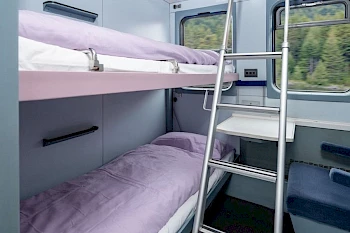
Vom 11. Juni bis 15. September wird ein zusätzlicher Eurocity mit Abfahrt in Prag um 20.28 Uhr eingesetzt, der eine späte Fahrt ermöglicht. Wichtig für alle Fans: Dieser EC soll einen bewirtschafteten Speisewagen haben. Umgekehrt kann man bereits sehr früh, um 3 Uhr, nach Prag fahren.
Die Einschränkungen durch die Bauarbeiten im Elbtal werden geringer, so dass bereits seit Mittwoch der Railjet zwischen Dresden und Graz über Prag, Brno und Wien wieder verkehrt, der im Dezember vorübergehend eingestellt werden musste. Außerdem entfällt ab nächster Woche der gelegentliche Schienenersatzverkehr für den Eurocity zwischen Ústí nad Labem und Dresden.
Sanierte Synagoge in Žatec eröffnet
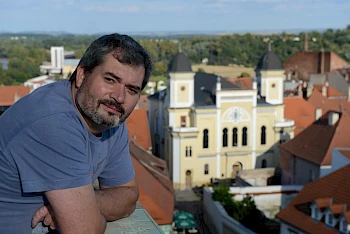
Am Dienstag wurde die frisch sanierte Synagoge in Žatec im Beisein des tschechischen Kulturministers Martin Baxa feierlich eröffnet. Das Besondere ist dabei nicht nur, dass sie das zweitgrößte jüdische Baudenkmal in Tschechien darstellt (nach der Großen Synagoge in Plzeň), sondern auch, dass die Sanierung komplett von einem Privateigentümer durchgeführt wurde. Der Unternehmer und frühere Oberbürgermeister von Chomutov Daniel Černý hatte die Synagoge 2012 in einer öffentlichen Auktion für rund 1,5 Mio. Euro erworben und sie dann für nochmal rund 2,2 Mio. Euro saniert. Dafür nutzte er vor allem EU-Fördermittel. In der Synagoge werden nun wieder Gottesdienste stattfinden, während im benachbarten Rabbinerhaus ein Museum eingerichtet wurde.
Es gibt eine eigene Website zur Synagoge, auf der man viele historische Fotos findet, die u.a. auch den beklagenswerten Zustand vor der Sanierung zeigen.
Tschechische Literatur in Leipzig
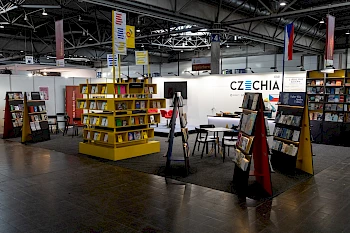
Gestern wurde in Leipzig die diesjährige Buchmesse eröffnet. Tschechien ist dort wieder mit einem Stand des Tschechischen Literaturzentrums (České literární centrum, CzechLit) vertreten. Noch bis Sonntag können Sie sich dort informieren, welche aktuellen tschechischen Werke auf Deutsch erschienen sind. Außerdem finden mehrere Lesungen tschechischer Autorinnen und Autoren im Rahmen der Reihe "Echo Tschechien" statt.
Zum Programm von Echo Tschechien
Wenn Sie unseren Wochenrückblick regelmäßig in Ihr Email-Postfach bekommen möchten, melden Sie sich für unseren Newsletter an.
 Die Erstellung dieses Newsletters wird mitfinanziert durch Steuermittel auf der Grundlage des vom Sächsischen Landtag beschlossenen Haushalts.
Die Erstellung dieses Newsletters wird mitfinanziert durch Steuermittel auf der Grundlage des vom Sächsischen Landtag beschlossenen Haushalts.
The renowned human rights film festival “Everyone Svět” (One World) opened in Prague on Wednesday. The festival was launched in 1999 and is an integral part of the work of the well-known foundation "Člověk v tísni" (People in Need). Today the festival is the largest of its kind in the world.
Documentaries about human rights from all over the world will be presented. Every year not only filmmakers from different countries of the world come there, but also protagonists and defenders of human rights. Conversations with them are one of the pillars of the program.
The festival takes place not only in Prague, but this year in 47 other cities across the Czech Republic. In our region, films are shown in Ústí nad Labem (at our friends from Hraničář) and in Děčín .
(This is an automatic translation by Google Translator.)
With our support, the Bohemian Switzerland National Park was able to add German subtitles to its video about the situation on the Gabrielensteig and the Edmundsklamm.
(This is an automatic translation by Google Translator.)
National Park closes Edmundsklamm for another three years
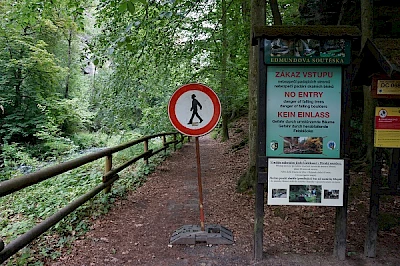
The popular Edmund Gorge (Edmundova soutěska) in Bohemian Switzerland will remain closed for significantly longer than previously known. The Bohemian Switzerland National Park announced that it will not carry out any tree felling work in and above the Edmundsklamm until 2027. The same applies to the Gabrielensteig (Gabrielina stezka) from Mezní Louka (Rainwiese) to Prebischtor (Pravčická brána). This means that the popular paths remain closed for safety reasons.
According to the national park administration, the area around the two paths should be left to its own devices for three years. “It has been shown that we can reopen the paths as quickly as possible if we give nature some time to regenerate,” explains national park director Pavel Kříž. As part of studies, a test felling was carried out above the Edmundsklamm. The intervention showed that felling on a large scale would destroy the nature around the paths and at the same time safety would not be guaranteed. “The felling would disturb the thin layer of soil,” says director Kříž. Stones and boulders could come loose. In addition, the felling itself is not without danger and involves high costs.
According to Kříž, simply leaving the burned stumps has other advantages. They store moisture and ensure sustainable drainage of rainwater into soil layers. At the same time, the tree stumps are food for insects, which in turn keep birds in the area as food. Some species of birds and bats also use the dead trees as nesting places. In addition, the burned trees scattered thousands of seeds that sprouted last year. Logging would also destroy this natural reforestation. A video commissioned by the national park shows what it looks like on the Gabrielensteig and above the Edmundsklamm and what consequences an impact would have.
The lockdown until 2027 is a hard blow. In an initial statement, the municipality of Hřensko, which owns the Edmundsklamm and runs the barge trips, was particularly disappointed. “The problem is that we largely take over the tasks of the state. We finance a fire department that not only takes care of fire protection on the front line, but also the mountain rescue service. We spend a lot of money on local police, who in many ways replace the absent state police. That costs a lot of money and we are sorely missing the income from the Edmundsklamm,” said deputy mayor Robert Mareš in an initial reaction to the daily newspaper Mladá fronta Dnes.
Děčín Zoo is car-free for three months
Anyone who wants to visit the zoo in Děčín in the coming months will have to be prepared for a short walk. Due to construction work, the only access road to the zoo, Žižkova Street, has been closed since Monday. The road should be open again from June 9th, before the start of the main season. But until then, visitors with fitness are required, as the zoo is located above the Shepherd's Wall (Pastýřská stěna). The road is only closed between 8 a.m. and 5 p.m. during the week. But times can still change and outside of construction work times, passage is only possible for cars.
Either way, the Děčín magistrate recommends leaving the car in the parking lot on Práce Street between the railway tracks and the Elbe and using the footpath over the Jahn Lookout (named after gymnastics father Friedrich Ludwig Jahn) and further uphill to the zoo. At 670 meters, this would also be the shortest route to the zoo. This option is also easily accessible from the main train station. As a second option, the red-marked hiking trail from the Tyrš Bridge over the Puchmayerova Street up to the Schäferwand is recommended. The car could then be parked at the parking lot below the Tyrš Bridge. This route is a little longer at just under a kilometer.
The closure comes at an inopportune time for the zoo, as it is celebrating its 75th anniversary this year. In an initial reaction, he quickly moved one of his anniversary events from May to August. Now the zoo is calling on its fans on August 31st to come to the zoo with a bear Nicki. The Siberian brown bear Bruno is the zoo's mascot and by far the most popular animal. The zoo wants to set a new record with as many Nicki bearers as possible.
The Czech Republic celebrates 25 years of NATO membership
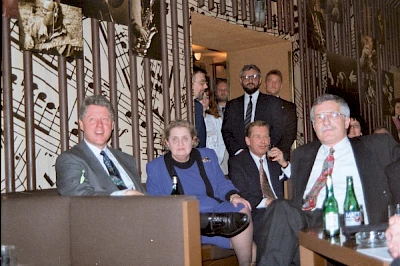
Three JAS-39 Gripen fighters, two Eurofighter Typhoon fighters and an A-400MS Atlas transport from Germany flew just 200 meters over the Czech capital on March 12. With this symbolic formation, the Czech Republic celebrated 25 years of membership in NATO. In March 1999, Poland and Hungary became the first former Eastern Bloc states to join the transatlantic defense alliance.
The then US President Bill Clinton took part in the celebrations in Prague as a guest of honor. His visit brought back memories, especially since the Czech President and former highest-ranking NATO general Petr Pavel gave his guest a visit to the legendary Reduta jazz club. Former President Václav Havel took him there in 1994. Clinton was not only enthusiastic, but was also persuaded to do a saxophone solo.
He left the music-making to others that evening, but he recalled that it was he who appointed the Czech-born Madeleine Albright first as UN ambassador and later as foreign minister. Albright, Havel's good friend, vehemently supported his efforts to get the Czech Republic into NATO as quickly as possible. Havel put all his foreign policy weight behind this, and it is indicative of the priorities in the neighboring country that the Czech Republic first joined NATO and then the European Union.
It was also significant that this week of all days the Czech Republic was able to report that it had collected enough money to purchase 800,000 rounds of artillery ammunition from third countries in order to quickly solve the ammunition shortage in Ukraine. Britain's The Telegraph could not praise this initiative highly enough. "If it's true that artillery is the king of war, then this small Eastern European country is the kingmaker..." Apart from the fact that Czechs see themselves more as Central Europeans, many people in the Czech Republic will be able to agree with this sentence.
Trouble between Prague and Bratislava
Where otherwise no leaf can fit between them, there is currently a cool distance: the two neighboring countries Czech Republic and Slovakia, which separated from Czechoslovakia into two independent states in an exemplary manner over 30 years ago, are currently divided over how to deal with Russian aggression in Ukraine. At the beginning of March, the Czech government decided to suspend regular government consultations.
It was only in the fall, after the left-wing populist Robert Fico took over as head of government in Bratislava, that both sides agreed to continue consultations. The summit of the Visegrád states, i.e. between Hungary, Poland, Slovakia and the Czech Republic, also ended on a conciliatory note in Prague at the end of February. The views on Russia and Ukraine couldn't be more different. On one side are the Pole Donald Tusk and the Czech Petr Fiala, both clear allies of Ukraine and staunch transatlanticists. On the other hand, Viktor Orbán is the eternal troublemaker in the EU, who doesn't want to give up his admiration for Putin. Robert Fico may have other motives, but in his pro-Russian stance he has nothing to do with Orbán.
But this meant that a red line had now been crossed for Prague. The Czechs have just successfully forged a coalition to supply ammunition to Ukraine. Fico's refusal to provide military support to Ukraine is an affront. How long the new ice age will last and whether and when consultations will resume is not yet known.
If you would like to receive our weekly review regularly in your email inbox, sign up for our newsletter.
To subscribe to the newsletter
The creation of this newsletter is co-financed by tax revenue based on the budget approved by the Saxon state parliament.
(This is an automatic translation by Google Translator.)
On March 4, 2024, circulation procedure No. 1 took place in the Elbe/Labe Euroregion. 1 project has been confirmed, the total amount is EUR 19,928.00.
(This is an automatic translation by Google Translator.)
Vorerst keine RegioJet-Züge nach Prag
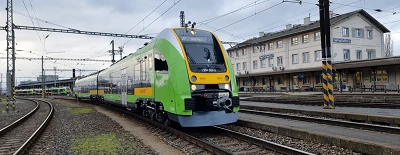
Das tschechische Eisenbahnunternehmen RegioJet startet vorerst keine regelmäßigen Zugverbindungen zwischen Prag und Berlin. Ursprünglich sollten auf der Strecke Prag-Dresden-Berlin ab 20. März täglich drei Zugpaare pendeln. Wie das Unternehmen mitteilte, hätte die Deutsche Bahn als Netzbetreiber keine ausreichende Streckenkapazität zur Verfügung gestellt. Auf Nachfrage von saechsische.de antwortete die Deutsche Bahn allerdings, dass RegioJet Kapazitäten erhalten hatte. Allerdings hätten sich die Fahrtzeiten aufgrund von Bauarbeiten verändert. Das sei für RegioJet offenbar nicht mehr attraktiv gewesen. "Die Slots waren nicht gut", wird RegioJet-Sprecherin Alexandra Janoušek Kostřicová von saechsische.de zitiert, und meint damit die von Deutsche Bahn angebotenen Fahrzeiten. RegioJet startet dagegen in Österreich und Ungarn durch. So wird die Zahl der Zugverbindungen zwischen den Hauptstädten Wien und Budapest aufgrund der hohen Nachfrage ab 4. April auf acht verdoppelt. Auch zwischen Prag und Brno kommt in den Morgen- und Abendstunden jeweils ein Zugpaar hinzu. Zwischen Prag und Dresden sowie Berlin bietet RegioJet aber wie gehabt Fernbusse an.
Kleiner Trost für die Strecke Berlin-Dresden-Prag ist die Verlängerung der Nachtzugverbindung European Sleeper aus Brüssel und Amsterdam nach Berlin weiter über Dresden in die Moldaustadt. Damit ergibt sich immer dienstags, donnerstags und samstags morgens eine weitere Direktverbindung aus Dresden und Bad Schandau. Der Zug fährt ab Dresden 8.24 Uhr (Neustadt) bzw. 8.31 (Hauptbahnhof) sowie ab Bad Schandau (8.58 Uhr).
Von Prag aus kommt (18.04 Uhr ab Hauptbahnhof) jeweils Dienstag, Donnerstag und Sonntag eine zusätzliche Verbindung am Abend hinzu.
Bischofsweihe in Litoměřice
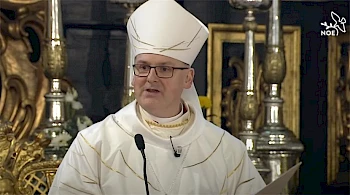
Am 2. März wurde der erst 52-jährige Stanislav Přibyl zum neuen Bischof des Bistums Litoměřice (Leitmeritz) geweiht. Der Weihe in der bis auf den letzten Platz besetzten Stephans-Kathedrale wohnten zahlreiche geistliche Würdenträger auch aus dem Bistum Meißen bei. Gleichzeitig bedeutete die Weihe den Abschied des scheidenden Bischofs Jan Baxant, der sein Amt aus Altersgründen nach 15 Jahren niederlegte.
Přibyl ist der jüngste Bischof der katholischen Kirche in Tschechien. In Litoměřice ist er kein Unbekannter. Der gebürtige Prager diente von 2009 bis 2016 im Bistum als Generalvikar. Wenn es seine Zeit zulässt, spielt Přibyl Orgel. Er spricht mehrere Sprachen, darunter auch Deutsch.
Tschechien stärkt Deutsch als Minderheitensprache
Das tschechische Parlament hat einer Erweiterung des Deutschen als Minderheitensprache zugestimmt. Damit wird Deutsch auf eine neue Stufe gehoben. Der Beschluss trat zu Ende Februar dieses Jahres in Kraft.
Die neuen Bestimmungen beziehen sich auf die Europäische Charta der Minderheitensprachen, die Tschechien bereits im Jahr 2006 verabschiedet hat. Sie besteht aus verschiedenen Stufen je nachdem, wie stark die Minderheitensprache geschützt wird. Deutsch wurde mit dem Beschluss nun in die dritte und höchste Stufe aufgenommen. Das gilt in den Regionen, in denen die deutsche Minderheit am stärksten vertreten ist. Neben drei Kreisen in Mährisch-Schlesien und Südböhmen sind das vor allem Kreise in Nordböhmen nahe der Grenze zu Sachsen wie Cheb, Sokolov, Karlovy Vary, Ústí und Liberec.
Für diese Kreise gelten neu 35 Förderbestimmungen. Dazu gehören unter anderem zweisprachige Schulen und Kindergärten, ein verstärkter Deutsch-Unterricht, aber auch die Möglichkeit, Deutsch bei Gericht sowie bei Behörden zu gebrauchen oder Rechtsurkunden auf Deutsch auszustellen. Auch außerhalb der acht Kreise soll Deutsch verstärkt gefördert werden. Das betrifft zum Beispiel den Unterricht in der Geschichte und Kultur der Deutschen in Tschechien sowie eine Förderung des Deutsch-Unterrichts.
Sowjetdenkmal muss weichen
Die Abgeordneten der Stadt Litoměřice haben beschlossen, das Denkmal des Sowjetsoldaten aus dem Jirásek-Park zu entfernen. Die Abgeordneten reagierten damit auf eine Petition, die zu einer Beseitigung des Denkmals aufgerufen hatte. Sie verabschiedeten aber einen Kompromissvorschlag. Demnach soll das Denkmal, das 1975 errichtet wurde, nicht ganz beseitigt, sondern an einen alternativen Ort verlegt werden. Autor des Denkmals ist der Künstler Otakar Petroš. Die Enthüllung erfolgte aus Anlass des 30. Jahrestages, an dem Tschechien von den Alliierten befreit wurde.
Der jetzige Standort im Jirásek-Park ist sehr prominent. Das Denkmal war in der Vergangenheit schon mehrfach beschmiert worden. Allein seit dem Überfall Russlands auf die Ukraine war es zu zwei neuen Farbanschlägen gekommen. Nach dem zweiten Farbanschlag hatte ein weiterer Unbekannter die Farbe teils wieder beseitigt und auf die ukrainischen Soldaten verwiesen, die in den Reihen der Roten Armee an der Befreiung Tschechiens beteiligt waren.
Wenn Sie unseren Wochenrückblick regelmäßig in Ihr Email-Postfach bekommen möchten, melden Sie sich für unseren Newsletter an.
 Die Erstellung dieses Newsletters wird mitfinanziert durch Steuermittel auf der Grundlage des vom Sächsischen Landtag beschlossenen Haushalts.
Die Erstellung dieses Newsletters wird mitfinanziert durch Steuermittel auf der Grundlage des vom Sächsischen Landtag beschlossenen Haushalts.
With direct bus from Schmilka to Prebischtor
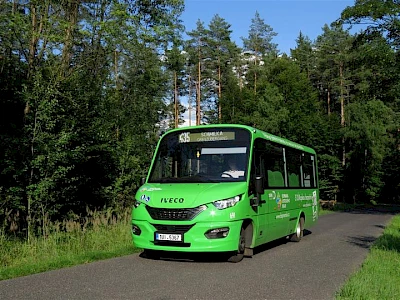
With the start of the excursion season, the transport connection from Saxony to Bohemian Switzerland is improving. The new bus route 435 will run every hour on weekends and public holidays from Schmilka, parking lot via Hřensko, Mezní Louka to Mezná. It also stops at the Tři prameny stop, where the footpath to Pravčická brána begins.
Line 435 already existed. The course has changed. She also travels much more frequently on an hourly basis. It begins operations on Good Friday (March 29th) and runs all year round until November 3rd. In the two summer months of July and August the bus even runs daily.
For tourists from Saxony there are two boarding options: one in Schmilka and one in Hřensko, where the ferry takes you from the Schöna S-Bahn station. What the exact connections will be remains to be seen, as the timetable will not be approved by the Ústí District Council until March 20th. “A connection to the S-Bahn and the ferry was not primarily our issue,” says Magdalena Fraňková, spokeswoman for the Ústí district. “In connection with line 438, which comes from Děčín and also goes to Mezná with a half-hour delay, there is an interesting half-hourly service from Hřensko to Mezná,” Fraňková continued.
The 435 buses also stop near the Schöna ferry, which makes it easier to change. In addition, the version of the timetable that has yet to be approved provides a transfer option to line 434 at the next stop Hřensko střed (Center), with which you can continue to Jetřichovice (Dittersbach) and Krásná Lípa (Schönlinde). Buses 438 continue to stop at Hřensko, nábřeží.
Despite starting in Schmilka, the 435 will run entirely under the Czech DÚK tariff (Ustí District Transport Association), so that no cross-border tariff will apply. This makes the connection interesting for Germany ticket holders as well as for those excursionists who come by car. They could then conveniently leave it in Schmilka. "For example, the ticket from Schmilka to the Prebischtor junction at Tři prameny costs 20 crowns (0.80 euros), the ticket to Mezná costs 31 crowns (1.24 euros). Payment is made on the buses either in cash in crowns or with a credit card The Elbe-Labe ticket is of course also valid on the bus.
By the way, shortly before Easter, the construction-related restrictions on the German side between Bad Schandau and Schmilka will no longer apply. From March 20th the S-Bahn will run again to Schöna. The National Park Railway is also running regularly again.
This year too, holidaymakers who stay at least two nights in Bohemian Switzerland, the Czech Elbe Sandstone Mountains or in the Schwenauer Zipfel can use public transport free of charge. The vouchers for this are issued electronically in the hotels and guesthouses. However, since this does not always happen automatically, it is advisable to ask if necessary.
Elbe shipyard near Děčín is insolvent
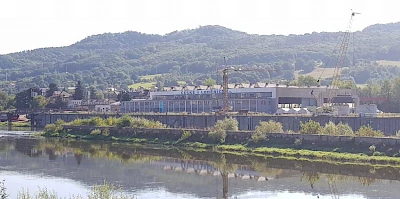
One of the last Elbe shipyards is insolvent. The district court in Ústí nad Labem (Aussig) approved the bankruptcy application of 30 employees of the České loděnice company. The company with a shipyard in the Křešice district of Děčín owes its employees over one million crowns (around 40,000 euros) in outstanding salary payments. This meant that the employees anticipated an application from the company itself. It talks about liabilities amounting to 60 million crowns (2.4 million euros). But that's not all. Other creditors are encouraged to come forward. At the same time, the company has already prepared a template for the reorganization of the company. The creditors' committee must approve this in the first half of May.
The shipyard's problems began with the Covid pandemic in 2020 and intensified with rising energy prices the following year and generally high inflation, which accelerated with Russian aggression in Ukraine. In addition, there was slow payment behavior from the shipyard's customers. The uncertain navigability of the Elbe was also a permanent problem for the shipyard. In some years it took months before finished ships could be transported to the clients in the Netherlands or Germany.
The tradition of shipbuilding in the Křešice shipyard dates back to the 19th century. In recent years, ship hulls for large freight ships in particular have been launched, which were then transported in a convoy to Germany or the Netherlands and then fully assembled on site. You can see the shipyard clearly from the train.
The future of the shipyard now lies in the hands of the creditors. If a majority of them agree to the restructuring in May, shipbuilding in Děčín can continue. If they reject the proposed plan, it will no longer be possible to prevent the end of the 150-year history of shipbuilding in Děčín.
Average income in the Czech Republic is around 10,700 euros
The average income in the Czech Republic in 2022 was 259,900 crowns (equivalent to approximately 10,700 euros at the end of 2022) per person per year. This means that it has increased by 7.7 percent compared to the previous year. However, due to very high inflation – one of the highest in Europe – real incomes fell by 6.5 percent. This was announced this week by the Czech Statistical Office (ČSÚ), which surveys 11,500 households every year.
The number of people living below the poverty line fell from 10.2 to 9.8 percent in 2023. The poverty line in the Czech Republic was an income of 16,774 crowns (approx. 661 euros at the current exchange rate) per month for a single person. In the EU statistics, so-called material and social deprivation is also considered with regard to poverty. This is accepted if people cannot afford 5 of 13 selected products ( more on this at the Federal Statistical Office ). This affected 6.3 percent of people in the Czech Republic last year, compared to 4.8 percent the previous year.
Small ski areas are drawing a line
The small ski resorts in the Ústí district have declared the winter season over. Some still had the hope of making snow again if the temperatures fell below zero. But now that spring break is almost over in the Czech Republic and school is back in session in Germany and the weather has gotten even warmer, it's no longer worth it. The lifts are only still running at Klínovec or Ještěd and in the Giant Mountains.
For most of the ski resorts in the Ústí district, it was a winter to forget. Thanks to the early snow in November, they had as many lift days as in a normal season. But already in January the weather was rather rainy, which is why few visitors came. Only in Klíny were they satisfied with the number of visitors.
Parliament rejects “marriage for all”.
A proposed law for “marriage for all” failed to find a majority in the Czech parliament. On Wednesday, however, the MPs approved a compromise draft with a clear majority of 123 votes to 53, according to which the rights of same-sex couples will be significantly strengthened in the future. The partners can now enter into a registered partnership in which one partner can adopt the other's biological child. One partner is also now entitled to a widow's or widower's pension if the other partner dies.
The creation of this newsletter is co-financed by tax revenue based on the budget approved by the Saxon state parliament.
(This is an automatic translation by Google Translator.)
On Friday, February 2, 2024, the first meeting of the KPF EEL took place in Ústí nad Labem. A total of 5 projects were approved, the funding totals €38,144.00.
Overview of approved projects
(This is an automatic translation by Google Translator.)
February 2024
Like every first Wednesday of the month, we will be showing a Czech film classic in the “ Czech Film Wednesday ” series on March 6th at 8 p.m. in the Central Cinema. This time we're playing "Rozpuštěný a vypuštěný" (Dissolved and Drained) from 1984.
With this film we have a crime thriller in our program for the first time, albeit an absurdly funny one. Towards the end of the Austro-Hungarian Empire, Inspector Trachta and his intern Hlaváček investigate the murder of the manufacturer Bierhanzl, who made a miracle ointment for hair loss from duck eggs and was apparently dissolved in sulfuric acid in a bathtub and his remains were flushed down the drain.
The legendary duo Svěrák/Smoljak has brought a piece of their Jára Cimrman theater to the screen. Jára Cimrman is a fictional character of an absurd universal genius invented by Zdeněk Svěrák in 1966. The whole Czech Republic knows and loves Jára Cimrman. He doesn't appear in this film, but the tradition of absurd theater is brilliantly implemented here. The film is bursting with ideas, even if you will unfortunately only fully understand the abundant wordplay with a good knowledge of Czech. But there are still enough absurdities and funny ideas to make it a lot of fun for the local audience.
(This is an automatic translation by Google Translator.)
New prices for motorway tolls in the Czech Republic
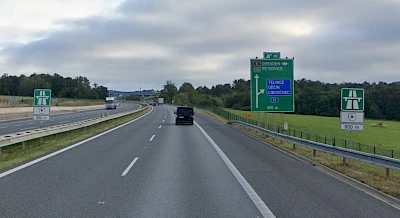
From March 1st, new prices will apply for the use of motorways in the Czech Republic. The prices for most variants fall slightly, only the annual vignette increases significantly. A one-day vignette will be introduced.
The prices for cars (up to 3.5t), teams (i.e. with trailers) and mobile homes in detail:
- 1 day: 200 Kč
- 10 days: 270 Kč
- 30 days: 430 Kč
- 1 year: 2300 Kč
Natural gas or biomethane vehicles pay a reduced price. Although electric vehicles are exempt from tolls, you have to apply for this first for vehicles registered abroad.
By the way: When driving into the Czech Republic, the route from the border to the Řehlovice exit is toll-free. In the other direction, however, this only applies between Řehlovice and Knínice (exit 80, see picture). You have to pay a toll for the last 12 km to the border.
Flooding again in Dolní Žleb
In Dolní Žleb, due to heavy rainfall in the Czech Republic in the next few days, it is expected that the road will be flooded again and the town will be cut off from its only access route. Only six weeks ago we were able to report that the road was above water again. Train traffic will not be affected.
Corruption scandal in Ústí
A corruption scandal is currently being investigated at the Ústí District Health Service, as the newspaper Deník reports. On Monday, the police searched the administration premises. The managing director was immediately dismissed. The investigation concerns overpriced purchases of medical equipment through the manipulation of public tenders. The European Public Prosecutor's Office in Luxembourg said there was damage of at least one million euros. This is dealing with the case because the purchases were largely financed with EU funding.
The Ústí District Health Service operates seven hospitals in the district. The Czech name "Krajská zdravotní as" is abbreviated as KZ, which sounds very unpleasant to German ears and is actually understood that way in the Czech Republic. Nevertheless, the title “Kauza KZ” is used for the scandal.
Legendary express train runs to Prague again
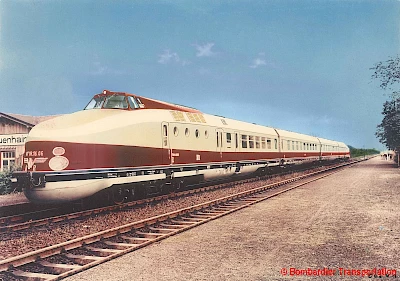
Finally, another topic that has something to do with the Czech Republic rather indirectly: Some may still remember the legendary SVT Görlitz express train (officially VT 18.16 or BR 175), which was one of the highest quality trains from the 1960s to the early 1980s GDR trains ran on international routes. For example, he traveled as Vindobona from Berlin via Prague to Vienna or as Karlex or Karola between Berlin and Karlsbad.
A lively association, with funding from the federal government, set out to make a copy of this train roadworthy again under the project title “ A Train for Central Germany ”. The first railcar was recently painted, the second will be there soon. After completion, which is expected in the next few months, the train will be used for special tourist trips. These also lead to Prague, among other places. More information can be found on the association's website.
The creation of this newsletter is co-financed by tax revenue based on the budget approved by the Saxon state parliament.
(This is an automatic translation by Google Translator.)
Neuer Mandau-Radweg durch Tschechien und Sachsen
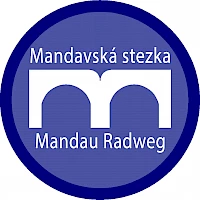 Tschechische und sächsische Partner haben sich auf einen neuen Radweg entlang des Mandau-Flusses geeinigt. Die Mandau entspringt als Mandava bei Brtníky in Tschechien, wo auch der neue Radweg beginnen soll. Er führt auf bestehenden Wegen weiter über Staré Křečany und Rumburk auf die deutsche Seite nach Seifhennersdorf, dann weiter nach Varnsdorf in Tschechien und danach endgültig nach Sachsen. Über Großschönau verläuft der Weg an der Mandau dort, wo heute bereits der Rübezahl-Radweg entlangführt, und endet in Zittau an der Mündung der Mandau in die Neiße.
Tschechische und sächsische Partner haben sich auf einen neuen Radweg entlang des Mandau-Flusses geeinigt. Die Mandau entspringt als Mandava bei Brtníky in Tschechien, wo auch der neue Radweg beginnen soll. Er führt auf bestehenden Wegen weiter über Staré Křečany und Rumburk auf die deutsche Seite nach Seifhennersdorf, dann weiter nach Varnsdorf in Tschechien und danach endgültig nach Sachsen. Über Großschönau verläuft der Weg an der Mandau dort, wo heute bereits der Rübezahl-Radweg entlangführt, und endet in Zittau an der Mündung der Mandau in die Neiße.
Der Weg soll in diesem Jahr ausgeschildert werden. Das Symbol befindet sich in einem blau umrandeten Kreis auf blauem Grund und bildet ein weißes M für Mandau, Mandava, aber auch Most, das tschechische Wort für Brücke. Letztendlich erinnern die Brückenbögen auch an ein Umgebindehaus, der für beide Seiten typischen Architektur dieser Region.
Mit dem Mandau-Radweg entsteht eine neue Verbindung von der Neiße zur Elbe über den in Brtníky beginnenden Kirnitzsch-Radweg, der an der Kirnitzschmündung in Bad Schandau endet.
Kirchenbezirk Dresden-Mitte beschließt Partnerschaft mit Děčín
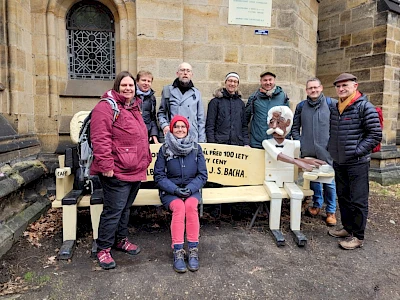
Der evangelische Kirchenbezirk Dresden-Mitte hat eine Partnerschaftsvereinbarung mit der Děčíner Kirche der böhmischen Brüder unterzeichnet. Damit wird eine schon 20 Jahre Verbindung offiziell bestätigt. Beide Gemeinden sind über regelmäßige Kinder- und Jugendfahrten aus Dresden nach Děčín verbunden. Initiiert und begleitet vom Kirchenbezirkskatechet René Herrmann hat sich ein vielfältiger Austausch entwickelt, der auf beiden Seiten bleibende Spuren hinterlassen hat und in immer neue Ideen der Zusammenarbeit mündet. Letzte Projekte waren die Erinnerung an den Besuch und ein Orgelkonzert des deutschen Pioniers der Entwicklungshilfe Albert Schweitzer in der Děčíner Christuskirche oder die Erforschung der sächsischen Geschichte der Christuskirche, die maßgeblich von der damals im mehrheitlich katholischen Děčín stationierten sächsischen Zollbeamtenschaft begründet wurde.
Eine Delegation mit Superintendent Christian Behr an der Spitze nahm kürzlich an der Einweihung des neuen Denkmals in Erinnerung an die Selbstverbrennung der jungen Tschechen Jan Palach und Jan Zajíc vor 55 Jahren teil.
Beide Gemeinden planen schon weitere gemeinsame Begegnungen. „Vieles verbindet unsere Regionen und noch vieles mehr wartet darauf, entdeckt zu werden“, sagt René Hermann. Im Rahmen der tschechienweiten „Nacht der Kirchen“ am 7. Juni 2024 singt in der Kirche des Děčíner Ortsteils Dolní Žleb der Bergsteigerchor „Kurt Schlosser“. Am 14. September 2024 werden Schülerinnen und Schüler der Evangelischen Musizierschule Dresden in der Evangelischen Christuskirche Děčín auftreten.
Schneemangel bedroht Grundwasser
Der Schneemangel bremst nicht nur den Wintersport aus. Wissenschaftler machen sich auch Sorgen um das Grundwasser. Denn das speist sich wesentlich auch aus dem langsam abtauenden Schnee. Doch der Wasseranteil im Schnee ist im Bezirk Ústí laut aktueller Angaben des tschechischen Hydrometeorologischen Instituts auf dem niedrigsten Stand der letzten 50 Jahre. Aufgrund der Regenfälle der letzten Wochen hat sich der Grundwasserstand wieder erholt. Doch der fehlende Schnee kann die Situation schnell wieder umkehren, so das Institut.
Innenministerin kündigt Verlängerung der Grenzkontrollen an
Bundesinnenministerin Nancy Faeser kündigte bei einem Besuch in Prag eine weitere Verlängerung der Kontrollen an der deutsch-tschechischen Grenze an. Durch die Kontrollen will Deutschland die Schleuseraktivitäten verhindern und den Flüchtlingsstrom kanalisieren. Die Kontrollen waren im vergangenen Herbst eingeführt worden.
Bei dem Treffen mit ihrem tschechischen Amtskollegen Vít Rakušan informierte Faeser, dass die aktuell bis Mitte März genehmigten Kontrollen voraussichtlich um ein halbes Jahr verlängert werden. Tschechiens Innenminister Vít Rakušan bedankte sich bei Faeser für die ausgezeichnete polizeiliche Zusammenarbeit, betonte aber, dass man das gemeinsame Ziel habe, in Zukunft wieder zu einem offenen Schengenraum ohne Binnengrenzen zurückzukehren. „Es sind Ausnahmelösungen, die man auch so wahrnehmen sollte. Wir sollten uns nicht an die Grenzkontrollen gewöhnen.“
Bei dem Treffen berieten die Minister auch über die Zusammenarbeit beim grenzübergreifenden Katastrophenschutz und das gemeinsame Vorgehen bei der organisierten Rauschgiftkriminalität.
Wenn Sie unseren Wochenrückblick regelmäßig in Ihr Email-Postfach bekommen möchten, melden Sie sich für unseren Newsletter an.
 Die Erstellung dieses Newsletters wird mitfinanziert durch Steuermittel auf der Grundlage des vom Sächsischen Landtag beschlossenen Haushalts.
Die Erstellung dieses Newsletters wird mitfinanziert durch Steuermittel auf der Grundlage des vom Sächsischen Landtag beschlossenen Haushalts.
By the end of 2026, the Elbe/Labe Euroregion, together with other Euroregions and other partners, will be carrying out a project for early neighborhood language education in kindergartens in Saxony.
Part of the project are so-called “language baths”. By this we mean a low-threshold offer in which preschool children are introduced to the Czech language in a relaxed manner. The language guides visit the daycare centers once a week, take part in the daycare center's normal day-to-day life, work with the children and convey educational content - all simply in Czech. We have already had very good experiences with this, as the children begin to say individual words in Czech by their third visit at the latest.
We are looking for two people to run these language baths on the German side of the Elbe/Labe Euroregion from now until the end of 2026 . The tasks include the following:
- A daily visit to one of five daycare centers in the border region (approx. from 9 a.m. to 1 p.m.), repeated weekly
- Conducting a language bath in Czech with the children
- Child-friendly communication of Czech culture and way of life
- Developing your own activities to engage with children
- Writing reports on the activity
- Participation in training courses
- Participation in exchanges of experiences with other language guides
Very good Czech language skills are absolutely necessary for these tasks.
We would like to use one person for daycare visits in the Hohnstein/Sebnitz area and one in the Dippoldiswalde/Altenberg area. Due to the location in the border area, it is advisable to have a driving license. Cars can be made available via partial car. The Euroregion bears the travel costs (tickets or kilometer allowance).
According to TVöD, remuneration is in pay group 9b.
We would be happy to accept your application by email to bewerbungenelbelabe.eu until March 15, 2024 .
Work should start on April 1, 2024 if possible.
(This is an automatic translation by Google Translator.)
Děčín is renovating the Long Ride
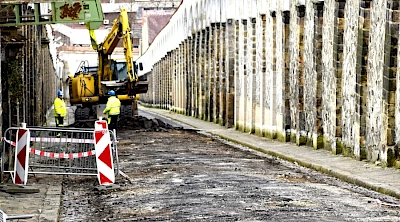
The time had come on Monday. Construction vehicles arrived and excavators tore up the asphalt surface of the almost 300 meter long drive to the castle in Děčín. Classic access to the castle will be closed almost all year round. The reason is the renovation of the access road that was built almost 350 years ago. Not only the condition of the road, but also the high walls surrounding it were already in poor condition. In the meantime, part of the wall had to be stabilized. By December, the asphalt will be replaced with concrete, the color of which will be reminiscent of historic gravel paths, and the wall will be completely renovated.
Since the entire access route, including side entrances, is closed, visitors sometimes have to take detours. It becomes almost impossible for people with restricted mobility to visit the castle. As an alternative access, the castle recommends using the southern gardens. But there are stairs there too. There is also a small parking lot near the warehouse. Alternatively, the path on the north side of the Elbe bank and the Tyrš Bridge can be used. The path winds up the northern slope and is relatively steep. Both alternative paths lead into the first castle courtyard.
The Langefahrt is one of the most sophisticated castle entrances. On the north side, in the upper part, is the rose garden, which has been closed since last August and whose renovation will take until 2025.
Ski resorts defy the thaw
The high temperatures and rainy weather make winter sports in the mountains almost impossible shortly before the start of the winter holidays in Saxony. The snow has also all but melted away in the Bohemian Ore Mountains. This means there is no snow for cross-country skiing. Some ski areas have also stopped operating for the time being. These include the ski areas at Bouřňák (Sturmer) near Mikulov and in Český Jiřetín. On the other hand, the ski areas in Telnice and Klíny still have enough artificial snow, but the conditions are not getting any better. The precipitation in the middle of the week caused a short-term improvement, as it fell as snow at altitudes over 500 meters, but disappeared again the next day.
Skiing is completely problem-free on the highest mountain in the Ore Mountains, the Klínovec (Keilberg). But even at this altitude the temperatures are currently above zero. The ski areas at Plešivec and Ještěd are also open. The relatively warm weather has been around for over three weeks. Low temperatures are not in sight until the end of next week. Until then, other ski areas could close temporarily.
Czech Republic continues without euro
President Petr Pavel made the introduction of the euro a topic in his New Year's speech. When it joined the EU in 2004, the Czech Republic actually committed itself to introducing the common currency. However, the Union is still waiting for this today.
But politicians had to react to the president's offer, especially since the mayor's party STAN, a government partner, has been trying for a long time to open the way to the introduction of the euro. The Pirates and TOP09 have also long been supporters. Prime Minister Petr Fiala's ODS is strictly against this.
At the beginning of the week, European Minister Martin Dvořák (STAN) created facts and appointed a coordinator for the introduction of the euro. It is the renowned economist Petr Zahradník. In doing so, Dvořák duped his coalition partners. On Wednesday it was agreed not to have a coordinator for the time being. However, Zahradník remains in office as Dvořák's advisor. However, he is not allowed to carry out cross-departmental coordination.
This means that the fate of the euro in the Czech Republic is likely to be sealed again. The parties know only too well that such a step would not have a majority among the Czech population. On the contrary, a large majority is in favor of retaining the crown.
Former ambassador to Germany František Černý is dead
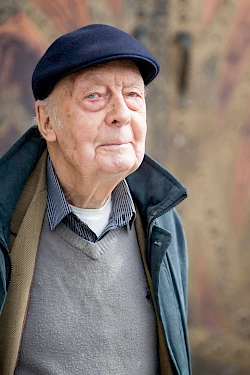
He was there wherever Germany and the Czech Republic came together. Former ambassador František Černý died at the beginning of February at the age of 93.
Born in Prague in 1931 into a German-Czech family, Černý carried the communication gene. After the Second World War, he first learned to be a machine lathe operator. In the 1950s and 1960s he experienced the growing thaw and the Prague Spring as a broadcast journalist. After the crackdown, he was no longer allowed to work as a journalist and made ends meet as a German teacher.
But after the Velvet Revolution his hour came. President Václav Havel knew only too well why he sent Černý as ambassador to Germany. First to Bonn, from where he moved the embassy to Berlin. But even the well-deserved retirement didn't end there. On the contrary, František Černý was very active in the sometimes painful process of growing together between the two states and in working through the sore points. Together with the last author of German-language literature by Kafka and Brod, Lenka Reinerová, and the Germanist Kurt Krolop, he founded the Prague German Language Literature House, where he was active until the end.
With Černý, not only the Czech Republic but also Germany is losing a mediator who was always interested and prepared to approach people with the nobility of the old school. He was actually an ambassador until the end and not just in retirement
The creation of this newsletter is co-financed by tax revenue based on the budget approved by the Saxon state parliament.
(This is an automatic translation by Google Translator.)
Overburden excavator near Most should be an attraction
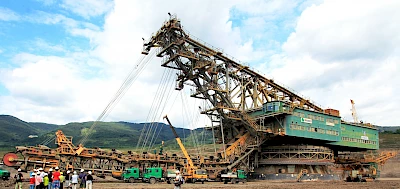
In a few years, all that will be left of the huge ČSA open-cast brown coal mine near Most (Brüx) will be a large lake. Next year, coal mining will end there and recultivation will begin. If everything goes well, there could still be a witness to coal mining. The Ústí district is negotiating with the owner, the mining company Sev.en, about the preservation of the RK 5000 overburden excavator. It is the largest of its kind in northern Bohemia. It was still in operation until 2016. However, to preserve it, it would have to be moved around one kilometer. Its current location will be underwater in the future. The crucial thing is to agree on who will cover the costs of the transport. These are estimated at around 3 million euros.
The bucket chain excavator is almost 160 meters long and almost 40 meters high. The giant, weighing 15,000 tons, was used from 1983. At that time, its purchase cost almost 250 million crowns, which corresponds to 160 million euros in today's prices.
The path to the Grundmühle is partly closed
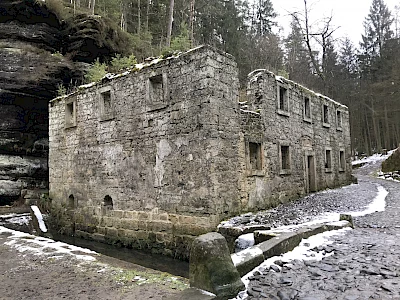
Due to the removal of unstable trees, there will be restrictions on the yellow-marked hiking trail from Jetřichovice (Dittersbach) towards Dolský mlýn (Grundmühle) in the next few weeks. As the Bohemian Switzerland National Park informs, the work on the one kilometer long section will last until the end of March and only during the week. The path is open on weekends.
The basic mill is not affected by the felling and remains accessible. The national park recommends the blue marked trail from Vysoká Lípa and the green marked trail from Srbská Kamenice. Both are for pedestrians. The third option is the blue marked trail from Kamenická Stráň, which cyclists can also use.
Legendary Kotva department store is being renovated
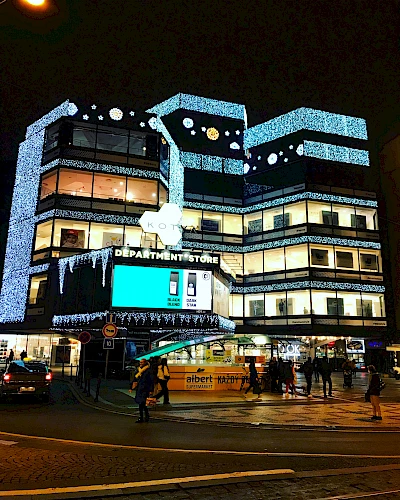
After 49 years, the Kotva department store in Prague is over. The largest department store in Czechoslovakia at the time was open for the last time on Wednesday. Now one of the brutalist icons in the Czech Republic is to be renovated. If everything goes well, the department store could reopen in three years.
The owner, the real estate subsidiary of the Italian insurance company Generali, wants to preserve 100 percent of the facade. The department store is probably the most famous work of the architect couple Věra and Vladimír Machonin. The two architects created a striking counterpoint to the surrounding older architecture in an attractive location on Republic Square (náměstí Republiky). The Kotva has been a listed building since 2019.
Changes are planned inside the department store and on the outside areas. There will be office space on the upper floors and a new restaurant at the top. The lower floors are intended for well-known brand stores. The investor would like to involve the public in the design of the outdoor facilities.
The Kotva is a legend of shopping culture. When it opened in 1975, army units had to ensure that the building was not stormed by the arriving crowds. In recent decades, like other department stores, it has struggled with a changing sales strategy that was more focused on so-called galleries or shopping centers. One of these modern consumer temples was created in 2007 with the Palladium in the former George of Poděbrady barracks directly opposite the Kotva.
Of the three most famous department stores in Prague before 1989, the Máj was the first to be transformed into a Tesco department store. The shopping center, which is now called "My" in English, now belongs to the Czech company Amadeus Real Estate. The third, much smaller functionalist-style department store Bílá Labuť, which opened in 1939, is now a kind of shopping gallery with various shops, but its popularity has declined sharply. It is located not far from Kotva on Na Poříčí Street. Renovation is also planned here.
Largest battery storage facility in the Czech Republic in operation
The Czech Republic's largest battery storage facility to date has gone into operation in Ostrava-Vítkovice. The battery is used to compensate for network fluctuations. At the same time, the system with a capacity of 10 megawatts can buy electrical energy at a reasonable price during the night and supply it during peak times. The same is possible with strong energy production from photovoltaic systems.
The investor and operator is the majority state-owned energy company ČEZ, which is already preparing other such projects. By 2030, ČEZ plans to commission 6,000 megawatts of renewable energy storage.
If you would like to receive our weekly review regularly in your email inbox, sign up for our newsletter.
To subscribe to the newsletter
The creation of this newsletter is co-financed by tax revenue based on the budget approved by the Saxon state parliament.
(This is an automatic translation by Google Translator.)
January 2024
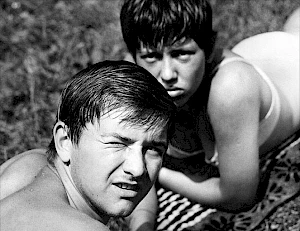
Like every first Wednesday of the month, we will be showing a Czech film classic in the “ Czech Film Wednesday ” series on February 7th at 8 p.m. in the Central Cinema. This time Miloš Forman's feature film debut »Černý Petr« (Black Peter) from 1963 is being shown.
The film describes two days in the life of 17-year-old Peter, who begins his apprenticeship in a socialist department store. A lot of things go wrong. Above all, he should make sure that no one steals (and that in socialism!). Things don't go much better with Pavla after work, neither in the outdoor pool nor at the dance evening. He just seems to pass the buck everywhere.
The then 33-year-old Miloš Forman shows with fine humor and a lot of empathy the life of young people in the 1960s with all the difficulties that come with love life, entering the world of work and the uptightness and stuffiness of the older generations. As in his second work The Firemen's Ball (which ran in this series last year), he takes an honest look at the people in socialist society, neither heroizing them nor - despite the humor - mocking them. A real portrait of the times.
This film will be shown as part of the "Czech Film Wednesday" series, as always in the original version with German subtitles.
(This is an automatic translation by Google Translator.)
The Elbe/Labe Euroregion supports smaller cross-border projects from the small project fund. The applicable capitation rates are adjusted annually to reflect the inflation rate. The specific flat rates for the three project types are as follows from February 1st:
| Project type |
Cost rate until January 31, 2024 |
Cost rate EUR/person day from February 1, 2024 |
|---|---|---|
| Events | 49 EUR | 53 EUR |
| (Further) training | 70 EUR | 76 EUR |
| Specialist conferences | 96 EUR | 105 EUR |
(This is an automatic translation by Google Translator.)
Cheetah offspring in Ústí
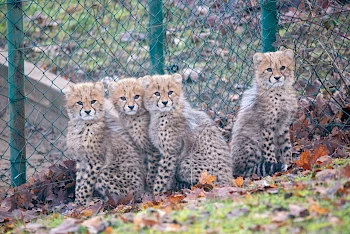
You usually only see something like this on television, but now it's almost on your doorstep: four young cheetahs in the Ústí Zoo. In return, visitors are granted exceptional access to a small enclosure above the cheetah house, where the four siblings can let off steam. But they can still only be seen to a limited extent, because due to the low temperatures, the hatch into the cheetah house remains permanently open. The four cute wild cats can go and warm up at any time, which they do actively. But as temperatures rise, they will become more visible.
The cheetah offspring was born in September. It was only announced at the beginning of December that the cheetahs had cubs. They can only be seen now. There is a reason for this reluctance: raising cheetahs in human care is extremely difficult. This begins with the selection of the couple who will only live together for the mating period and otherwise go their separate ways. In addition, the zoo had already been able to report two cubs in 2022, but both had to be euthanized one after the other due to a bone tumor. Despite the sad ending, the breeding was already a success for the zoo. The cheetah, for whom this was her first birth, has gained experience. The birth was also proof that the couple was fertile.
This time things seem to be going better, so the zoo is now going public more aggressively. If the four cheetah cubs continue to enjoy excellent health, they would be a real sensation. Because of the difficulties described, the four wild playmates are unique. The Ústí Zoo points out that only 14 cheetahs were born across Europe in 2023 as part of the cheetah breeding program. Only 6 of them are currently still alive, including the four in nearby Ústí.
Forest sets up shelters
The state forest is setting up 20 new shelters for hikers in its forests this year. The first was only released for use in the Schluckenau tip on the border with Saxony. It is located on the yellow-marked hiking trail just above the town of Severní and only a few hundred meters from the Hohwald Clinic. The next refuge will be completed in spring below Klínovec, the highest mountain in the Ore Mountains.
The open huts with sloping roofs are simply and functionally furnished. The most important building material is wood. The hut has a wide platform for sleeping, a bench and a table. They are usually located near watercourses, far from commercial accommodation options and usually on marked long-distance hiking trails such as Stezka Českem or Via Czechia. These routes have made long-distance hiking more popular in recent years. Long-distance hikers usually spend the night in the open air, but in the event of rain they also use existing shelters, which were not intended for sleeping.
The Krušnohoří Tourism Association (Ore Mountains) is also planning to build 12 trekking huts. But they should be closed and equipped with a photovoltaic system and a small oven.
Road to Hřensko open again
A heavy boulder came loose on Wednesday in Hřensko in Bohemian Switzerland and fell onto the Bad Schandau-Děčín highway. The road then had to be closed from the Schmilka/Hřensko border crossing. The cause of the fall was probably the strong wind. A fallen tree is said to have loosened the block. He had almost completely fallen onto the street. Due to its weight (around 15 tons), it had also broken through the metal safety nets, which are designed for chunks of up to 10 tons. A company then shredded the boulder on behalf of the national park administration, removed other smaller and larger pieces of rock on the slope that were in danger of falling, and repaired the safety nets. As of Friday, 1:50 p.m., the road was clear again.
The creation of this newsletter is co-financed by tax revenue based on the budget approved by the Saxon state parliament.
(This is an automatic translation by Google Translator.)
Inauguration of the monument to Jan Palach and Jan Zajíc in Děčín
On Tuesday, a new monument to Jan Palach and Jan Zajíc was inaugurated in front of the Protestant church in Děčín. The two students met on January 16th. or February 25, 1969 in Prague in protest against the occupation of Czechoslovakia by Warsaw Pact troops. On the 50th anniversary of this event, it was criticized that there was no monument dedicated to them in Děčín. The monument, now designed by the famous architect David Vávra, consists of a glass column and the two names, each with a handprint. When you touch it, the column lights up in different colors.
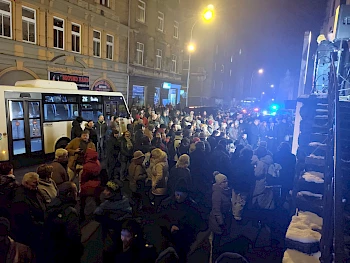
The crowds for the ceremony were overwhelming. It is estimated that at least 200 people attended. For the actual unveiling, the police had to regulate traffic in front of the church because the many guests could only find space using the street. There was then a series of speeches in the church, which was packed despite the low temperatures.
Czech Senate President Miloš Vystrčil emphasized in his contribution that although there was no direct connection between the two young men and the city of Děčín, the values for which they died should be linked to every place in the Czech Republic. In addition to Vystrčil, Mayor Anděl and other Czech representatives, representatives of the Evangelical Church in Saxony and Dresden also spoke. This was shown by the close contacts with the Protestant Church in Děčín, which were also expressed in the concert in honor of Albert Schweitzer in September 2023. Representatives also came from the twin town of Pirna.
An SZ article (unfortunately behind a paywall) sheds more light on the background of the monument.
City buys “Ustí Hole”
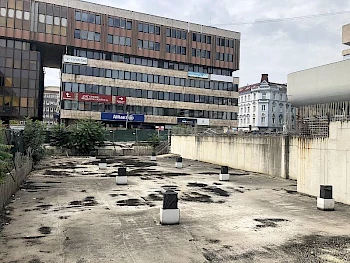
For 15 years, the cityscape has been blighted by an investment ruin at the upper corner of Mírové náměstí, which has been popularly nicknamed the "Loch of Ústí" (with a temporal overlap with the "Vienna Hole" in Dresden, if anyone remembers). The owner had started construction, but had to stop it in the basement for financial reasons. Since then, the unsightly construction site lay quietly in a prominent location between the municipality and the district administration and fell into disrepair.
Now the city of Ústí has bought the property for 73 million crowns and wants to build a building for public use on it. According to current plans, the structures built so far will be used, but the appearance will certainly be different in the end than planned almost 20 years ago. The city administration did not provide any more detailed information, but estimated that people will have to live with construction fences for at least another four years.
Excessive parliamentary debate on postal voting
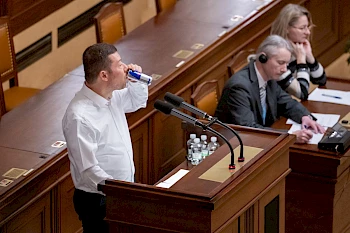
The Czech Parliament is currently debating the introduction of postal voting for Czechs living abroad. Although that's not entirely true, because most of the time people talk about completely different topics in order to drag out the debate, as various media reports.
On Wednesday, ANO boss Babiš stood at the lectern for almost four hours and spoke, for example, about the construction of the motorway to Austria. The fact that he described his southern neighbors as “magor” (crazy, idiots, fools) caused quite a stir.
The next day this was topped by the head of the right-wing populist SPD, Tomio Okamura, who spoke for almost 11 hours, mainly on historical topics, and read out, for example, an academic publication on the famous President of the First Republic Masaryk.
Due to illness, this week's newsletter is a little shorter.
If you would like to receive our weekly review regularly in your email inbox, sign up for our newsletter.
To subscribe to the newsletter
The creation of this newsletter is co-financed by tax revenue based on the budget approved by the Saxon state parliament.
(This is an automatic translation by Google Translator.)
Road to Dolní Žleb over water again
After exactly 20 days, the road from Děčín to Dolní Žleb was open again. On Thursday morning, the Elbe level in Děčín had fallen below the 4 meter mark, which is important for flood warning level 1. The street was cleaned during the day and the first cars were driving again in the afternoon.
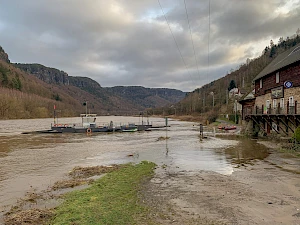
The street was flooded when the first wave of flooding began shortly before Christmas. For the residents of the last village on the left bank of the Elbe before the border with Saxony, which is part of Děčín, this means that the train becomes the only transport connection with the outside world. Since the car ferry doesn't connect to the highway on the other bank of the Elbe, the only option is to take the train. The residents of Dolní Žleb are already used to this. When the Elbe approaches the first flood warning level, they bring their cars to safe parking spaces in the Děčín city area so that they have a vehicle for longer journeys. However, the rising water brings with it further inconveniences. Bulk shopping is more difficult by train and the garbage is not picked up. Anyone who needs the rescue service has to be taken by boat to the other side of the Elbe by the fire department.
The situation on the rivers throughout the Czech Republic has now calmed down. Most recently, the first flood warning level was withdrawn in Litoměřice on Friday. The second flood warning level only applied to the Vltava in Český Krumlov and Vyšší Brod. But this is due to the fact that more water was released from the large Lipno reservoir, which was previously held back by the dam for flood protection purposes.
Hřensko's mayor resigns
The mayor of the border village of Hřensko, Zdeněk Pánek, resigned on December 31, 2023. Pánek did not want to speak to the media about the reasons for his resignation. He simply emphasized that it was his free decision and that it was not for personal reasons, but that he had to do with Hřensko.
The community is currently going through a difficult phase. Since the major fire in the summer of 2022, the Edmundsklamm has been closed due to the threat of tree collapse and rock falls. This meant that the largest source of income was lost, because the gorges belong to Hřensko. The municipality tried to counteract this by introducing an overnight tax and garbage charges for residents. But these are not real cuts. What is normal elsewhere, Hřensko had waived its citizens in times of bubbling income. As media reports, Pánek apparently no longer wanted to support these and other austerity measures, which forced him to resign.
Pánek is leaving after more than nine years as mayor. Before that, the lawyer with an office in Děčín was mayor for four years in 2002, and also deputy mayor in between. His successor will be decided at the next meeting of the local council. He must be elected from among the 7 local councilors. Until then, Vice Mayor Robert Mareš will be in charge of the official business. The next regular local elections will not take place until October 2026.
Trial of scandal speed camera
The speed measurement trial in Varnsdorf has begun at the district court in Ústí nad Labem. Four years after the police operation in the town hall of Varnsdorf, as a result of which mayor Stanislav Horáček and his deputy Josef Hambálek were arrested, the trial began that caused a great stir at the time. The city commissioned the company Water Solar Technology (WST) to measure the speed at four locations in the city. Thousands of drivers from Germany were also affected, because two measuring devices were in the Studánka district, through which the busy highway 9 from Saxony leads further into the interior of the Czech Republic. The Ministry of the Interior criticized early on that Varnsdorf had agreed to participate for each violation measured. WST therefore received a fixed sum for each case of increased speed.
In Ústí, not only Horáček and Hambálek, but also Horáček's girlfriend, Eva Petružálková, and the managing director of the WST company, Miloš Schubert, are on trial. The public prosecutor's office accuses them of abuse of office or aiding and abetting, taking advantage of a public tender, bribery and violating competition rules. Horáček, Hambálek and Petružálková testified on the first two days of the trial. All defendants deny the allegations. They face prison sentences of up to 12 years. The trial will continue in March.
Opening of the Lety Roma Memorial in April
The memorial at the site of the former concentration camp for Roma in Lety, southern Bohemia, is expected to open at the end of April. It was originally scheduled to open on February 3rd. However, the date had to be postponed for technical reasons, it is said. The reason is problems during the construction. The final work on the memorial is currently being carried out and work on the exhibition is underway.
In 2018, after years of struggle by human rights organizations and Roma representatives, the Czech government decided to build a memorial at the site of the former concentration camp to commemorate the Holocaust of Roma and Sinti. Until then, a pig farm operated there. The government bought the business and had it demolished. The memorial with a visitor center and exhibition has been under construction since last year. The construction is not only being financed by the Czech government. The Norwegian government contributes the money for the exhibition, and the German Embassy in Prague is involved in the construction of the memorial's outdoor facilities.
Along with Hodonín near Kunštát in Moravia, Lety was one of two camps where Roma were interned in the 1940s. Both camps were stopovers on the way to the extermination camp in Auschwitz-Birkenau. Hundreds of Roma died in Lety and Hodonín. Hodonín was in turn the site of a holiday home and a children's holiday camp for decades before a memorial was opened in 2019 after years of effort.
The creation of this newsletter is co-financed by tax revenue based on the budget approved by the Saxon state parliament.
(This is an automatic translation by Google Translator.)
December 2023
Tschechien im Schock
Tschechien befindet sich im Schockzustand. Am Donnerstagnachmittag hatte ein 24-jähriger Student an der Philosophischen Fakultät der Prager Karls-Universität 13 Menschen erschossen und viele weitere zum teil schwer verletzt. Eine Person erlag später im Krankenhaus ihren Verletzungen. Bei den Toten handelt es sich fast durchweg um Studenten oder Angehörige des Lehrkörpers. Der Amokläufer tötete sich Polizeiangaben zufolge selbst. Das Hauptgebäude der Fakultät am Jan-Palach-Platz in der Prager Altstadt grenzt direkt an das jüdische Viertel Josefov. Ganz in der Nähe befinden sich die Karlsbrücke und der Altstädter Ring. Das Gebiet war am Donnerstag bis in die späten Abendstunden weiträumig abgesperrt. Die Polizei ermittelt nach einem Motiv und bringt die Schießerei mit drei weiteren Toten in der Nähe von Prag in Verbindung. Eine terroristische Tat wurde ausgeschlossen. Die Polizei geht von einem Einzeltäter aus.
In Reaktion auf die grausame Bluttat ist das gesamte öffentliche Leben im Nachbarland heruntergefahren. Nicht nur in Prag, sondern auch in anderen Teilen des Landes wurden Veranstaltungen abgesagt, Weihnachtsmärkte geschlossen. Dagegen finden spontane Gedenkveranstaltungen im ganzen Land statt. Für den 23. Dezember hat die Regierung Staatstrauer angeordnet. Im Veitsdom auf dem Hradschin zelebriert der Prager Erzbischof ein Requiem für die Opfer der Bluttat.
Die Karls-Universität hat über ihren Stiftungsfonds ein Spendenkonto eingerichtet, um den Hinterbliebenen zu helfen. Am späten Freitagnachmittag waren bereits knapp 22 Millionen Kronen (über 900.000 Euro) zusammengekommen.
Elbe-Pegel steigen
Die andauernden Regenfälle der letzten Tage und ein leichtes Tauwetter haben zu einem Anstieg der Pegel von Elbe und ihren Nebenflüssen geführt. Bereits an über 20 Orten musste das Tschechische Hydrometeorologische Institut (ČMHÚ) die erste Hochwasseralarmstufe ausrufen, an einigen sogar schon die zweite. Und die Pegel steigen in den kommenden Tagen weiter an.
Die Stadt Děčín hat deshalb am Freitag die ersten Hochwasserschutzwände aufgebaut. Die Pegelmarke von 4 Metern, ab der die erste Alarmstufe gilt, wird für Samstagmittag erwartet. Dann wird die Elbe die Straße nach Dolní Žleb überfluten und das Dorf an der Grenze zu Sachsen damit nur noch über die Eisenbahn mit Děčín verbunden sein. In der Heiligen Nacht bis zum ersten Weihnachtsfeiertag dann erwartet Děčín das Erreichen der zweiten Alarmstufe mit einem Pegel von 4,90 Meter.
Ob die Elbe in Děčín weiter auf über 5 Meter steigt, lässt sich im Moment noch nicht vorhersagen. Das hängt auch von der Entwicklung des Wetters in den kommenden Tagen ab. In Nordböhmen sind bis Dienstag immer wieder Niederschläge vorhergesagt, die in Grenznähe auch als Schnee fallen. Ihre Intensität lässt jedoch ab Sonntag nach. Auch die sächsischen Gemeinden müssen sich also auf einen steigenden Elbepegel einrichten. Das Landeshochwasserzentrum erwartet für Dresden das Erreichen der ersten Alarmstufe (Pegel: 4 Meter) für die Abendstunden des Samstag. Ob auch die zweite Alarmstufe (Pegel: 5 Meter) erreicht wird, ist noch nicht sicher.
Berghütte Lovoš findet neuen Betreiber
Die Hütte auf dem Gipfel Lovoš (Lobosch) im Böhmischen Mittelgebirge ist gerettet. Mitte Januar übernimmt ein neuer Betreiber. Der bisherige hatte nach nur drei Jahren das Handtuch geworfen.
Die Suche nach einem Nachfolger gestaltete sich aber schwierig. Zwar meldeten sich 40 Interessenten, aber die meisten sprangen wieder ab, nachdem sie sich mit den Bedingungen bekannt gemacht hatten. Die Versorgung der Berghütte ist zwar mit Allrad-Pickup möglich, aber es gibt keinen Transportlift und der Weg ist sehr steil. Letztendlich blieben nur noch acht Interessenten übrig, von denen mit vier Gespräche geführt wurden. Der neue Betreiber stammt zwar nicht aus Lovosice (Lobositz), aber er ist aus der Region und kennt den Lovoš.
Die Hütte auf dem markanten Berg gehört dem Klub tschechischer Touristen (KČT), Abteilung Lovosice. Der Gipfel ist beliebt für seinen Weitblick in alle Richtungen. Er gehört zwar mit 570 Metern nicht zu den höchsten des Böhmischen Mittelgebirges, dafür erhebt er sich aber steil über seine Umgebung. Der Höhenunterschied zur Umgebung sind 400 Meter. Gemeinsam mit dem Radobyl auf der anderen Elbseite bildet er von Prag aus kommend den Eingang zum Elbe-Durchbruch durch das Böhmische Mittelgebirge, auch Porta Bohemica genannt.
Die Übergabe in der traditionsreichen Berghütte, deren Wurzeln bereits ins Jahr 1892 zurückreichen, findet erst Mitte Januar statt. Das hat mit einem traditionsreichen Event zu Jahresbeginn zu tun. Dann findet der beliebte Neujahrsaufstieg auf den Lovoš statt. Jedes Jahr zu Neujahr tummeln sich hier deshalb Hunderte Wanderer.
Gemeinsam mit dem Milešovka (Milleschauer) ist der Lovoš der beliebteste Gipfel im Böhmischen Mittelgebirge. Jedes Jahr wird er von rund 50.000 Menschen bestiegen.
Frohe Feiertage und ein glückliches neues Jahr
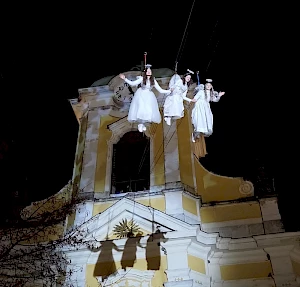
Liebe Leserinnen und Leser unseres Newsletters. Wir gehen in die Weihnachtspause. Den nächsten Wochenrückblick erhalten Sie am 5. Januar. Wir wünschen Ihnen frohe Feiertage und einen guten Rutsch in ein glückliches neues Jahr 2024.
Wenn Sie unseren Wochenrückblick regelmäßig in Ihr Email-Postfach bekommen möchten, melden Sie sich für unseren Newsletter an.
 Die Erstellung dieses Newsletters wird mitfinanziert durch Steuermittel auf der Grundlage des vom Sächsischen Landtag beschlossenen Haushalts.
Die Erstellung dieses Newsletters wird mitfinanziert durch Steuermittel auf der Grundlage des vom Sächsischen Landtag beschlossenen Haushalts.
The mass, composed in 1796, retains the structural features of a traditional Latin mass, but the focus is on the Bohemian character of Christmas and its interpretation and it was intentionally placed by Ryba in the Bohemian (or Czech) setting. Added to this is the fact that it is written in the Czech language. Jakub Jan Ryba was convinced that this is the only way a liturgical mass can find access to the listeners. Over time the fair has become the most popular fair in Bohemia.
Source: https://cs.wikipedia.org/wiki/%C4%8Cesk%C3%A1_m%C5%A1e_v%C3%A1no%C4%8Dn%C3%AD
(This is an automatic translation by Google Translator.)
National Park Railway will run for another 10 years
The operation of the cross-border national park railway in Saxon-Bohemian Switzerland is secured for the next ten years. The Upper Elbe Transport Association (VVO) has agreed to an extension of the contract with the Czech Railways České dráhy (ČD). The Ústí district had previously commissioned České dráhy to operate for another 10 years. The National Park Railway was put back into operation at the beginning of July 2014 after an interruption of almost 70 years. The prerequisite was the closure of the gap between Sebnitz and Dolní Poustevna, which had been fought over for decades. Since then, the railway has run as the Czech line U28 from Děčín via Bad Schandau and Sebnitz to Dolní Poustevna and via Šluknov to Rumburk.
Děčín is building a maternity hospital
The hospital in Děčín will have a new maternity clinic by 2026. The Ústí district hospital association, Krajská zdravotní, is building a new clinic for 477 million crowns (around 20 million euros), which is said to combine obstetrics and gynecology in equal measure. In addition to the latest technology, parents should enjoy maximum privacy. At the same time, the new building of the intensive care clinic and the emergency room is nearing completion. The first patients are scheduled to move into the new building in April 2024.
The maternity clinic in Děčín not only serves the residents of the town, which has almost 50,000 inhabitants, but also surrounding towns such as Česká Kamenice, Benešov nad Ploučnicí and Jílové, as well as Bohemian Switzerland and the entire Schwenauer tip. There is a hospital in Rumburk, but a maternity ward was closed years ago. At that time the hospital still belonged to the city of Rumburk. The Krajská zdravotní has now integrated it into its network, but a maternity ward is not yet planned again. In the event of a birth, parents have to drive an hour or more on the way to the hospital, which can be an adventure on the mountain roads in winter. A Saxon-Czech memorandum from 2019, which was intended to enable Czech patients in the border area in particular to receive cost-neutral treatment in nearby Saxon hospitals, has so far had no result.
To the Christmas market in the Czech Republic
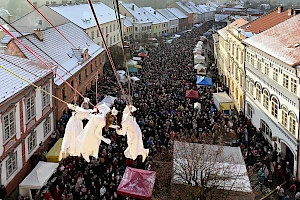
The Christmas markets in North Bohemia are becoming more and more attractive. With a new concept, Děčín has moved its multi-week Christmas market to the foot of the castle, creating an atmosphere with Christmas flair. The markets in Litoměřice and Teplice have also gained a Christmas atmosphere. The markets, which only take place on one or two days, are particularly worthwhile to visit. Several of these are taking place on the third weekend of Advent: the legendary Advent market in Úštěk, the Christmas market on the Castle Square in Teplice and the Castle Market in Děčín. We have put together a selection of the most beautiful Christmas markets in the Saxon-Czech border area for you.
Ústí district loses residents
According to the latest data, almost 11 million people live in the Czech Republic. As the statistics office ČSÚ reports, the country gained 54,700 inhabitants in the third quarter. There are now 10.88 million inhabitants living in the Czech Republic. As a result of the Covid pandemic and the high number of deaths, the population numbers fell for the first time in a long time. However, the situation changed suddenly after Russia invaded Ukraine. At times, 600,000 refugees came to the Czech Republic, where there was already a strong Ukrainian minority. The latest increases in population numbers are not due to a surplus of births, but rather to immigration. The number of births, however, was lower than the number of deaths.
While all regions of the Czech Republic are growing, the Ústí district remains the only one that is struggling with declining population numbers. The population here has fallen for the third year in a row. The district lost 2,113 residents in the third quarter. 810,224 people currently live in the district. Only the Litoměřice district bucked the trend in population growth.
The Czech Republic's economy is shrinking significantly
The Czech economy is in the middle of a recession. In the third quarter, gross domestic product (GDP) fell by 0.7% on an annual basis. Compared to the second quarter, GDP fell by half a percent. The background for the weak development is the continued weak consumption of private households and declining inventories. However, weak investment activity, especially in the private sector, and weak exports, otherwise an important pillar of economic growth in the Czech Republic, also had a negative impact. Only the investment activities of public budgets provided positive impulses, but were unable to reverse the decline in economic output, especially since the state imposed an austerity package. Analysts now assume that economic output will also decline for the year as a whole. The gross domestic product is therefore moving further away from the value it already had in 2019, before the Covid pandemic. The Czech Republic is the only country in Europe that has not yet reached the pre-Corona level. Read the analysis on Radio Prague .
The prospects for 2024 are not very rosy either. The government's austerity package will not provide any stimulus and private households continue to suffer from strong inflation, which is eating up real income and savings. Savings are made primarily on short- and medium-life consumer goods. Inflation has recently fallen further, but at 7.3 percent in November it was still significantly higher than in Germany. And it remains to be seen whether inflation will actually fall more significantly in 2024. Because further price increases are already pending. The food trade has announced further price increases despite the reduction in VAT. Depending on the region, water prices will increase by up to a quarter at the beginning of the year and restaurateurs are also pushing through further price increases.
(This is an automatic translation by Google Translator.)
Bohemian glass craft receives UNESCO title
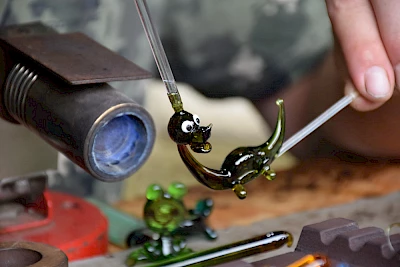
The Czech Republic can look forward to another UNESCO title. This time the international organization honored the intangible heritage of the glass craft. The Czech Republic received the title together with five other European countries. In addition to the Czech Republic, these are Germany, Finland, Hungary, France and Spain.
"This is a gift for everyone who has anything to do with glass," said Milada Valečková, head of the Glass and Jewelry Museum in Jablonec nad Nisou (Gablonz). In the Czech Republic, glass crafts are concentrated primarily in the districts of Liberec, Zlín and Vysočina. Over 5,000 craftsmen work there in around 100 workshops and companies. Traditional locations in North Bohemia are Kamenický Šenov, Nový Bor and Železný Brod.
The Saxon-Bohemian border area has already won its second UNESCO title in quick succession. At the beginning of September, UNESCO awarded the hop town of Žatec (Saaz) and the surrounding hop region the title of a World Heritage Site. The Erzgebirge mining region (together with Saxony) and the famous spas in Karlovy Vary (Karlsbad), Marianské Lázně (Marienbad) and Františkovy lázně (Franzensbad), which have also received the title along with several European spas, are also world heritage sites. Northern Bohemia is also home to the Czech Republic's only world natural heritage site, the beech forests in the Jizera Mountains.
Germany extends border controls
Federal Interior Minister Nancy Faeser has announced that stationary controls at Germany's borders with Poland, the Czech Republic and Switzerland will be extended by two months beyond December 15th. The step was justified by the results of the controls so far. As a result, since the controls were introduced in mid-October, 3,300 unauthorized entries have been detected and 1,100 unauthorized entries have been prevented. The Saxon Interior Minister Armin Schuster had previously called for border controls to be maintained in the long term, i.e. for at least six months. He sees it as a means of deterrence.
However, border controls are increasingly being criticized. As a result, it is highly questionable whether the effort is in proportion to the benefit. Markus Schlimbach, DGB chairman in Saxony, recently sharply criticized the controls at the first German-Czech regional forum. The greatest good, European freedom of movement, is being carelessly put at risk. The controls must be ended immediately. Especially on the Dresden-Prague motorway, kilometer-long queues of trucks form every day in the direction of Germany, which also affect buses and private transport. On some days the cars are parked until the Ústí nad Labem exit and have to be regulated by the police.
Andreas Roßkopf, who is responsible for the federal police at the police union, told the “Rheinische Post” that the number of asylum seekers cannot be reduced through police means and that asylum applications cannot be prevented. What needs to be clarified is "whether thousands of police officers should actually remain at the border or whether they should be better deployed for security in the cities and whether the asylum problem should be solved within the EU framework." The security situation at home is highly sensitive.
Cross-country ski trails and slopes prepared
The winter sports season also started earlier than in other years in the Saxon-Czech border area. The intense snowfall of the last few days has ensured that the cross-country ski trail network could be skied not only in the Bohemian Ore Mountains, but also in Bohemian Lusatia.
A little tip from us: Current information about the condition of the cross-country ski trails in the Czech Republic can be viewed daily on the website mapy.cz (also available as an app) if you switch the map display to "winter".
The season has also opened in the ski areas. Due to the sub-zero temperatures, sufficient artificial snow could be produced there in addition to the natural snow, which can also survive announced plus temperatures of slightly above zero. Almost all ski areas in the Bohemian part of the Ore Mountains went into operation on December 8th.
(This is an automatic translation by Google Translator.)
First German-Czech regional forum
The first German-Czech regional forum took place in Chemnitz. At the invitation of the Minister of State in the Foreign Ministry Anna Lührmann, representatives from the federal, state, district and municipalities from Germany and the Czech Republic exchanged ideas for two days. A wide range of representatives from various organizations active in the German-Czech border area were also invited, who spoke not only about the key topics of transport, the labor market and healthcare.
“Our goal is that people in the border regions are no worse off than elsewhere,” said State Minister Lührmann at the beginning of the forum. Workshops highlighted concrete problems that have existed for years in the emergency services, the status of Czech workers in Germany, cross-border transport connections, language training and the recognition of qualifications and have not yet been solved. The regional forum is intended to improve networking not only between the two states, but also between the administrative levels, the individual players and, last but not least, between Saxony and Bavaria. Lührmann announced that the problems raised would be forwarded to the appropriate authorities and that regional forums between the two countries would take place regularly in the future.
School strike and doctors' protest in the Czech Republic
On Tuesday, thousands of teachers took part in a nationwide strike. Unions announced that around half of schools had gone on a one-day strike. They were protesting against planned cuts in the education sector. They ensure that the number of hours is reduced, which is why there is a risk of loss of hours, especially in smaller schools in the regions. Employees from some companies and students also took part in the strike out of solidarity.
The strike was directed against the government, which has presented an austerity package to get the budget deficit under control. It is reacting to the necessary special spending in recent years as a result of the corona pandemic and the war in Ukraine, which have caused the budget deficit to rise sharply. In response to the strikes, Prime Minister Petr Fiala pointed out that the education budget, along with the defense budget and the social budget, are the only three departments whose spending will increase in the 2024 budget.
An indefinite strike by the medical profession seems to have been averted. Doctors had announced that they would no longer work overtime from December 1st, which would have led to severe disruptions to health care. The doctors' goals are to change the labor code to regulate 24-hour shifts and to improve pay. These demands are now being met. Labor Minister Marian Jurečka and Health Minister Vlastimil Válek introduced an amendment that reverses planned changes to labor law and allows doctors to work twice as much overtime as before. In addition, after negotiations, Prime Minister Petr Fiala promised almost 10 billion crowns more for higher doctors' salaries.
Czech route Dresden-Prague next year
The Czech Transport Minister Martin Kupka would like to announce the route of the new Prague-Dresden line on the Czech side by the end of 2024 at the latest. The minister said this at a dialogue forum with affected communities in Ústí nad Labem. The state railway network administration Správa železnic (SŽ) is currently pursuing three different routes through the Bohemian Central Mountains, which are rejected by the affected communities. The tunnel exit at Chlumec and the passage through Ústí are also controversial. The Elbe city calls for freight traffic to be routed around the city. The approximately 57 kilometer long section from the Bohemian Central Mountains to Prague with a new terminal at Roudnice nad Labem has already been determined. The first commissioning of the new high-speed line is also expected here.
(This is an automatic translation by Google Translator.)
November 2023
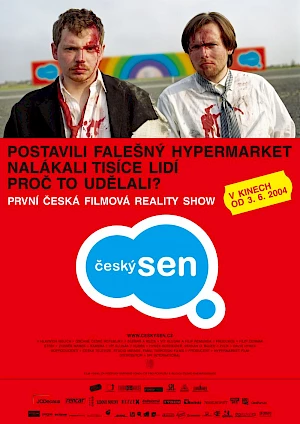 Our audience was allowed to vote on the Wednesday film in December and chose: “Český sen” (The Bohemian Dream). This 2004 film is a nasty documentary-satire about a supposed opening of a hypermarket.
Our audience was allowed to vote on the Wednesday film in December and chose: “Český sen” (The Bohemian Dream). This 2004 film is a nasty documentary-satire about a supposed opening of a hypermarket.
Two students from the Prague Film School are making a very special film as their final thesis: the facade of a huge hypermarket is being built on the outskirts of Prague. At the same time, there are massive advertising campaigns for the supposedly opening market. On the day of the "opening" a show is staged, which culminates in the waiting customers running towards the market and disappointed to find that they have been thoroughly processed. Then things get high...
More about the film and tickets
(This is an automatic translation by Google Translator.)
We had to wait a long time, but now the time has come: the new small project fund has started! Applications for funding for Saxon-Czech encounter projects can now be submitted again.
In the past, simplifications were often promised that turned out not to be the case. But this time it really looks like it: There are now capitation fees for projects with a determinable number of participants (i.e. all classic encounter projects). No offers need to be obtained and no individual receipts need to be provided at the end. All you need is proof of the number of participants. It couldn't be easier. So anyone who has held back on project applications in recent years due to the bureaucratic burden should try again now.
There are two downsides: There is still no legal basis for projects without an ascertainable number of participants. They probably can't start until mid-2024 at the earliest. And projects to promote tourism are no longer possible in the KPF.
You can find all information about this on our website.
For information on the small project fund
(This is an automatic translation by Google Translator.)
Deutsche Bahn is building a full tunnel variant
After months of testing, Deutsche Bahn has decided on a continuous tunnel for the new Dresden-Prague high-speed line through the Ore Mountains. This creates a 30 kilometer long tunnel that disappears underground near Heidenau and only comes to the surface again near Chlumec (Kulm) on the Czech side. It would be the longest railway tunnel in Germany.
A year ago, Deutsche Bahn limited the number of route variants from 10 to 2. The so-called full tunnel variant was not included in the railway's original plans, but was only brought into play by a citizens' initiative. The second so-called partially open variant had a shorter tunnel and a 27 kilometer long tunnel through the Ore Mountains. A bridge over the Seidewitztal was supposed to connect the two buildings.
The variant now chosen with the continuous tunnel is the best solution “for the environment as well as in terms of traffic, technology and economy,” Deutsche Bahn announced on Monday.
The new building, which is around 43 kilometers long, is intended to relieve pressure on the flood-prone Elbe valley and more than halve the travel time from Dresden to Prague from 2 hours 15 minutes to one hour. It is part of the future Berlin-Prague high-speed line and, in the future, continues to Vienna and the Balkans.
However, it will still be almost ten years before construction begins. The next big milestone for the project is the vote in the Bundestag on implementation and financing. This could happen in 2025. Deutsche Bahn expects building rights to be granted in 2032. The construction period is estimated to be around 12 years.
Edmundsklamm will remain closed in 2024
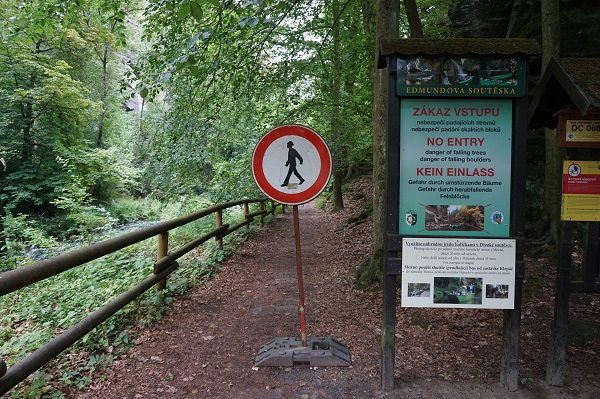
The Edmundsklamm, which has been closed since the devastating forest fire in the summer of 2022, will not open next year either. When asked, the Bohemian Switzerland National Park said that no opening date could be given. However, an opening in 2024 is ruled out. The same applies to the Gabrielensteig. The popular and panoramic hiking trail leads from Mezní Louka (Rainwiese) to Pravčická brána (Prebischtor). A total of 15 kilometers of marked hiking trails are currently closed. This affects around 5 percent of the hiking trails in the national park. The marking was removed for another 14 kilometers. You can hike there at your own risk.
The fact that a year and a half after the forest fire and years after the bark beetle catastrophe so many hiking trails are still closed was explained by national park spokesman Tomáš Salov, citing the different legal situation in the Czech Republic. All paths are now clear again in Saxony. The Bohemian Switzerland National Park, on the other hand, is responsible for safety on the paths. The national park is also liable for damage caused by the removal of dangerous trees. Strict protection requirements also apply in the quiet zone. The removal of trees causes significant associated damage. The natural regeneration is disrupted, there is a risk of instabilities in the rock and greater erosion stress occurs. This was also shown by the test clearing of a small section of the Edmundsklamm in the summer. However, the results of this pilot project are still pending.
Salov was confident that the first paths could be opened soon. But this applies more to paths in the back of Bohemian Switzerland. The decay process of damaged trees has already progressed far enough. This concerns the path from Hadí pramen (Snake Spring) to the Maiden Fir (Panenská jedle). At the same time, the national park is cutting down trees on many hiking trails to prevent further paths from being closed. The hiking trail at Brtnický potok (Zeidlerbach) is currently temporarily closed.
Municipalities and the tourism association, on the other hand, are demanding more effort from the national park in order to reopen paths more quickly. They accuse the national park of permanently closing hiking trails.
RegioJet displaces České dráhy from Ústí regional traffic
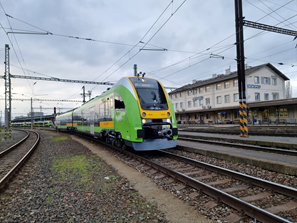
The Czech railway company RegioJet has won a tender to operate six electrified railway lines in the Ústí district. As RegioJet announced, they had submitted the lowest offer. With 90 percent weighting, the price was decisive for the outcome of the procedure. RegioJet will therefore take over the strategic lines U1 Děčín-Ústí nad Labem-Most-Kadaň, U2 Chomutov-Karlovy Vary and U3 (Děčín-) Ústí-Litvínov as well as the lines U32 Ústí-Lysá, U51 Ústí-Klášterec nad Ohří and U54 (Děčín - ) Ústí-Roudnice (-Hněvice). RegioJet already operates for the Ústí district on the routes Ústí nad Labem-Děčín on the right bank of the Elbe and Ústí-Upořiny-Most.
The Ústí district has not yet officially confirmed the outcome of the proceedings, citing the current objection period; the participants have been informed. However, the losing competitor České dráhy had made a statement, to which the Ústí district responded, thereby indirectly confirming the winner, RegioJet. So far, all lines have been operated by the state-owned České dráhy, for which the defeat is a significant loss. The Ústí district excluded České dráhy (ČD) due to a procedural error, writes the server zdopravy.cz. The company left it open whether ČD would object.
The new operator is scheduled to take over the routes when the timetable changes in December 2026. The operating contract is for 15 years.
Trekking huts for the Ore Mountains
The Krušnohoří (Ore Mountains) Tourism Agency plans to build 12 trekking cabins. They are intended to offer hikers a simple overnight camp. A simple wooden construction is planned. The huts should be equipped with photovoltaic systems and a small oven. The construction of the first two huts is planned in Adolfov near Telnice and in Sněžná near Kraslice in the Western Ore Mountains. The trekking huts are primarily intended to serve long-distance hikers. The new long-distance hiking trail Stezka Českem (Around the Czech Republic) runs through Adolfov.
Million-dollar projects for the Saxon-Czech border area
Improved early childhood education in the neighbor's language, cross-border cycle tourism and several nature conservation projects are among the projects that have received a commitment to receive funding from the European Union in the cross-border program Interreg Saxony-Czech Republic 2021-2027. At its meeting in Schönbach im Vogtland, the program's monitoring committee approved 17.7 million euros for 15 cross-border projects. The “Neighbouring Language from the Beginning” project was awarded almost 2 million euros under the leadership of the Euregio Egrensis, in which the Elbe/Labe Euroregion is also involved.
A little more than 2 million euros in funding will go to the “By bike to the neighbor” project led by the municipality of Doln'í Poustevna, in which the cities of Sebnitz and Hohnstein are involved.
A total of 28 Saxon-Czech projects have already been supported in the current funding period.
(This is an automatic translation by Google Translator.)
Digitální Kulturní pas EEL each možné letos získat stažením application zdarma zde:
Apple App Store: https://apps.apple.com/cz/app/uneeqly/id1610296683?l=cs
Google play: https://play.google.com/store/apps/details?id=com.uneeqly.app
(This is an automatic translation by Google Translator.)
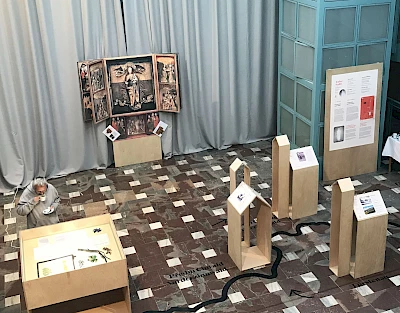
Die „Fürstenauer Madonna“ bringt seit langem die Menschen aus Böhmen und Sachsen zusammen. Sie ist die zentrale Figur eines eindrucksvollen Altars aus dem 15. Jh., der ursprünglich aus Pirna stammt und im Laufe der Jahrhunderte über Fürstenau und Vorderzinnwald nach Teplice wanderte.
Nun gibt es eine Ausstellung, die die Wanderschaft der Madonna nachzeichnet. Künstlerische Elemente beschreiben die einzelnen Stationen, zwei große Vitrinen zeigen archäologische Funde aus Vorderzinnwald, und der Altar ist als großformatige Fotokopie präsent. An jeder Station werden die Besucher mit Ereignissen, Sagen und einer historischen Persönlichkeit bekannt gemacht, die die engen Verbindungen zwischen Böhmen und Sachsen aufzeigen.
Die Ausstellung war bisher bereits in Dubí und in Krupka zu sehen. Vom 24. November 2023 bis zum 7. Januar 2024 wird sie in der Dresdner Kreuzkirche gezeigt. Der Eintritt ist frei. Die Eröffnung findet am 24. November um 14 Uhr statt (ursprünglich war fälschlich 17 Uhr genannt worden).
Educational agreement for bilingual high school
25 years after the start of the bilingual and binational German-Czech education branch at the Friedrich-Schiller-Gymnasium in Pirna, the education ministries of Saxony and the Czech Republic have decided on a permanent education agreement. The document was signed on November 8th by Head of Culture Wilfried Kühner and his Czech colleague, Vice Minister Jaroslav Miller.
This means that the long-standing project is now becoming a permanent institution, says the Saxon State Ministry for Culture. The agreement relates to the educational program and the boarding school. The revision resulted in a flexible, contemporary and permanent contract, which significantly strengthens the personal responsibility of the Friedrich-Schiller-Gymnasium, it goes on to say.
"With the new agreement, we are laying the foundation for long-term Saxon-Czech educational cooperation. The binational-bilingual educational program at the Friedrich-Schiller-Gymnasium is the flagship of our cross-border educational cooperation," said Kühner.
The binational-bilingual course lasts six years. It is intended for students from grade seven to grade twelve. Lessons are organized each school year in a binational-bilingual class with 14 Czech and 14 Saxon students.
Sister cities Dohna and Chlumec
It's not every day that a new partnership is formed between cities. The Saxon Dohna and the North Bohemian Chlumec (Kulm) did it. The partnership had been initiated organically over the past five years through collaboration between sports and cultural clubs. The fire departments have also been cooperating for a long time. Some of the projects were funded by the Elbe/Labe Euroregion. As the Sächsische Zeitung reports, the partnership was officially sealed in a two-page contract.
Dohna and Chlumec are separated by just 40 kilometers. Chlumec lies at the foot of the Ore Mountains and borders the district town of Ústí nad Labem (Aussig) to the northwest. The city has just over 4,000 inhabitants. Like Dohna, the city is located directly on the Dresden-Prague motorway. A monument in Chlumec commemorates the Battle of Kulm in 1813, when Napoleon's troops were defeated by the allied Russians, Austrians and Prussians.
The next exchange between the two cities will take place on November 25th, when the Dohna choir travels to Chlumec for a concert.
Does a wildcat live in Bohemian Switzerland?
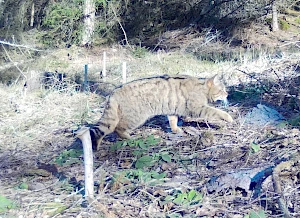
What was caught by a camera trap in the Bohemian Switzerland National Park in March 2022 could be a small sensation. In the photo in daylight light, a cat sneaks through the picture. This is not an ordinary house cat. The experts are very sure that it is a specimen of a wild cat. “The typical characteristics of a wild cat are easy to recognize, such as the stripes on the fur and the size,” says Martin Valášek, zoologist at the Bohemian Switzerland National Park. Valášek is even sure that it is not a cross with a domestic cat, but a pure wild cat.
It is still unclear whether the wildcat settled in the national park or was just passing through, and if so, where it came from. In the Czech Republic, wild cats live in small numbers in the Bohemian Forest (Šumava), in the Beskydy Mountains and in the Duppau Mountains (Doupovské hory) in northwest Bohemia. The national park has the photos evaluated externally by the Agricultural University in Prague. The find has only now become known due to the large number of recordings.
The national park has now placed wooden sticks coated with valerian near its camera traps. This is a proven lure for wild cats. If the cat rubs against it, it could lose a hair of its fur, which would allow researchers to conduct DNA analysis.
Wild cats are very shy animals. They need low-disturbance forests with dead wood in which they create caves and avoid open terrain with little cover.
Karel Schwarzenberg died
The Czech Republic mourns the death of former Czech Foreign Minister and lifelong fighter for democracy and freedom Karel Schwarzenberg. The nobleman, who was known only as the "Prince" in the Czech Republic, died on November 11th in a Vienna hospital. Schwarzenberg was 85 years old.
Born in Prague in 1937, Schwarzenberg grew up in Orlík Castle in southern Bohemia in one of the richest families in Europe. In 1941 the National Socialists confiscated the Schwarzenbergs' property, some of which they got back after 1945. After the communist coup and renewed expropriation, the family emigrated to Austria in 1948. Before 1989, Schwarzenberg supported the political opposition in his home country. He was appointed office manager (chancellor) by President Václav Havel in the early 1990s. He later became a senator and was elected to parliament for the Greens. From 2007 to 2009 and again from 2010 to 2013 he was Foreign Minister of the Czech Republic. This makes him the foreign minister with the longest service to date. In 2013 he ran for President of the Czech Republic and narrowly lost to Miloš Zeman in the runoff election.
Karel Schwarzenberg was the head of the House of Schwarzenberg since 1979. The Czech government has decided to hold a funeral with state honors for Schwarzenberg. His body will be on display in the Church of Saint Mary Under the Chain (Kostel Panny Marie pod řetězem) in Prague's Lesser Town from December 6th to 8th. The funeral mass will take place on December 9th in Prague's St. Vitus Cathedral on Hradcany.
(This is an automatic translation by Google Translator.)
Schicht factory receives monument status

The Czech Ministry of Culture has granted monument status to the administrative building of the historic strata works in Ústí nad Labem (Aussig). This is only part of the building. The owner, the company STZ Development, had the oldest part demolished in March to make way for a parking space. There was strong protest against this by architects, historians and many citizens. But the demolition permit was valid, among other things because the building was not listed at the time.
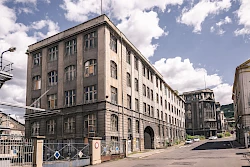
An initiative therefore immediately applied for monument protection to the Ministry of Culture, which has now been granted. However, this decision is not yet legally binding; the company STZ Development has lodged an objection against it.
The Schicht works are located on the right bank of the Elbe in Ústí in the Střekov (Schreckenstein) district and have played a decisive role in the rise of Ústí to an industrial city of European standing. In the 1920s, the Schicht family's factories merged with the Dutch Margarine Unie and the British Lever Brothers to form the Unilever corporation, which still exists today.
Kyjov dam is being renovated
For the first time in 47 years, the Kyjov (Khaa) dam on the edge of Bohemian Switzerland was drained. The background is the renovation of the building from the 1960s. The dam is to be upgraded as a fire water reservoir. A fund created by the Czech government for fire protection in Bohemian Switzerland covers the majority of the costs with 15 million crowns. By excavating 7,500 cubic meters of sediment alone, the dam's capacity increases. The improved water depth also makes it possible for water to be extracted by helicopter. In addition, the weir will be renewed. A paved fire water extraction point with access will be created. Access for bathers should also be improved. The dam is a popular swimming lake. The renovation is scheduled to be completed in spring 2025 and the dam will be filled with water again.
Since one bank of the dam is already in the Bohemian Switzerland National Park, the town of Krásná Lípa (Schönlinde), to which Kyjov belongs, must fulfill several requirements. The mud can only be dredged until the end of February 2024. “Then we will interrupt this work for now and only start it again next winter,” says Mayor Jan Kolář. When the water was drained, a surprise awaited the community: there were masses of pond mussels in the water and mud. “We were expecting a few hundred, but in the end there were almost 20,000,” says Kolář. This incredible number could only be partially distributed among the other community-owned ponds. Neighboring communities like Chřibská (Kreibitz) helped out. A very small portion of the shells served as food for forest animals such as foxes and wild boars.
Forest arsonist charged
The public prosecutor's office has brought charges against the alleged cause of the forest fire that engulfed and destroyed large parts of Bohemian and Saxon Switzerland last summer. “The indictment was sent to the district court this week,” Kateřina Doušová, prosecutor at the Ústí District Prosecutor’s Office, confirmed to the idnes.cz server. The public prosecutor's office accuses the former national park ranger not only of arson in the major fire, but also of other acts such as the burning of parts of the observation tower on the Vlčí hora (Wolfsberg) and the neighboring building, perches and feeding places. According to police, the 36-year-old is said to have admitted the crimes.
The largest forest fire in the history of Bohemian Switzerland caused damage worth 350 million crowns. This increases the maximum possible sentence for arson to 15 years in prison. The public prosecutor's office is demanding 12 years' imprisonment for the defendant.
(This is an automatic translation by Google Translator.)
VW moves battery factory in Czech Republic
Volkswagen is not building its gigafactory planned in Central Europe for the time being. The group cited the slower development of electromobility as the reason. Volkswagen's decision is, above all, against the Czech Republic. That's where the negotiations were most advanced. Recently, the Czech government pushed Volkswagen to speed up. The Czech Republic had prepared a plot of land in Líně, near Plzeň Airport. The property is conveniently located close to the D5 Prague-Plzeň-Regensburg motorway. On Monday, CEO Oliver Blume met Prime Minister Petr Fiala and gave him the bad news.
The decision is only about not tackling the battery factory now, but later. VW is sticking to its three other planned factories in Germany, Spain and Canada. But in the Czech Republic the news was received as a serious setback. Industry Minister Jozef Síkela emphasized that the government is currently negotiating with five additional investors. Of these, two projects would be the size of what Volkswagen planned, two would be medium-sized and one project would be smaller. Síkela did not name names.
The vice president of the Industry and Transport Association Radek Špicar does not believe that this decision will set the Czech Republic back, but said on Czech television Česká televize: "The automotive industry is going through a dramatic, complicated and expensive transformation towards alternative drives. It would be important to do so to get an investment, also in view of the fact that we want to mine and process lithium in the Ore Mountains." He also pointed out that the Czech Republic had lost its former location advantage of cheap and sufficiently available workers. In addition, energy prices in the Czech Republic are now higher than in Poland or Hungary. The government must work on these problems.
The Ústí district had also long had hopes of setting up a gigafactory in northern Bohemia, near Saxony. Whether the VW decision increased the chances for the location near Prunéřov near Kadaň was initially not an issue.
New wind power rules in the Ústí district
The Ústí District plans to adopt a new policy on the construction of wind turbines. The Supreme Administrative Court declared this part of the principles of regional planning to be invalid a few weeks ago. The previous regulation had made the construction of wind turbines almost impossible. Plaintiffs, however, successfully sued for discrimination. Other construction projects are not subject to such strict regulations. Municipalities, private individuals and companies had sued. The district also did not take public interest in renewable energies into account enough.
The Ústí district wants to develop the new principles within the next few months and adopt them this year. Nature conservation remains the top criterion against the construction of wind turbines, which is why nature conservation organizations and the Ministry of the Environment should be involved in the reformulation process. However, it is foreseeable that a future regulation will open the way to more wind turbines, but uncontrolled growth should be prevented, it is said.
There are a total of 50 wind turbines in the Ústí district, a quarter of all wind turbines in the entire Czech Republic. Almost all wind turbines in the Ústí district are located at high altitudes in the Ore Mountains.
Hřensko charges a tourist fee
Starting next year, overnight guests will have to pay 20 crowns per night in Hřensko (Herrnskretschen). The local council decided this. The border village hopes to compensate for the loss of income that has torn a deep hole in the community's coffers due to the closure of the Edmundsklamm. The income from parking fees is unchanged. But overall the income is only a third compared to a normal year with the Edmundsklamm open.
The accommodation fee is collected by hotels and guesthouses and passed on to the municipality. However, payment is only due from the second night.
German-Czech mayor meeting in Hohnstein
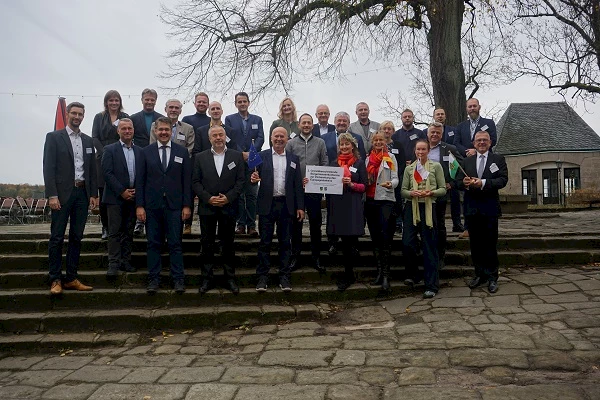 On Friday, mayors from municipalities on both sides of the border met in Hohnstein for a networking meeting. It was the second meeting of this kind after April. The conference was organized and initiated by the Saxon Switzerland Economic Initiative. The aim is to better network communities and cooperate on cross-border projects. The first meeting took place in Krásná Lípa. The second meeting was also attended by District Administrator Michael Geisler, the Czech Consul General in Dresden Mark´´éta Meissnerová, the managing directors of the Euroregions Elbe/Labe and Nisa/Neiße, Rüdiger Kubsch and Ondřej Havlíček, representatives of the Saxon Switzerland and Bohemian Switzerland tourism associations and a representative from German-Czech Future Fund.
On Friday, mayors from municipalities on both sides of the border met in Hohnstein for a networking meeting. It was the second meeting of this kind after April. The conference was organized and initiated by the Saxon Switzerland Economic Initiative. The aim is to better network communities and cooperate on cross-border projects. The first meeting took place in Krásná Lípa. The second meeting was also attended by District Administrator Michael Geisler, the Czech Consul General in Dresden Mark´´éta Meissnerová, the managing directors of the Euroregions Elbe/Labe and Nisa/Neiße, Rüdiger Kubsch and Ondřej Havlíček, representatives of the Saxon Switzerland and Bohemian Switzerland tourism associations and a representative from German-Czech Future Fund.
"The great interest shown by the mayors shows us the importance of this event. We aim to repeat these meetings twice a year in the future," announced the mayor of Hohnstein and host, Daniel Brade.
(This is an automatic translation by Google Translator.)
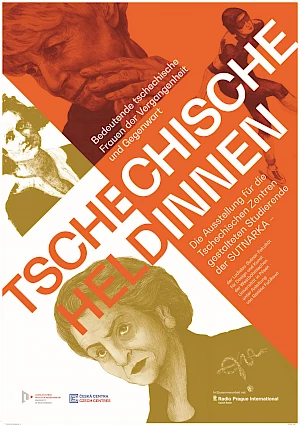 Forty important women from history and the present are portrayed in a poster exhibition at the Czech Center. The posters were designed by students from the University of Plze'n. Each poster is a specially designed work of art in its own style. Among those portrayed are rulers, painters, writers, politicians, scientists, athletes and much more.
Forty important women from history and the present are portrayed in a poster exhibition at the Czech Center. The posters were designed by students from the University of Plze'n. Each poster is a specially designed work of art in its own style. Among those portrayed are rulers, painters, writers, politicians, scientists, athletes and much more.
The exhibition will open in the Dresden Cultural City Hall on November 2nd at 7:30 p.m. Annekatrin Klepsch (Deputy for Culture, Science and Tourism of the State Capital Dresden) and Dr. Markéta Meissnerová (Consul General of the Czech Republic in Dresden) will welcome those present. Historian Hana Pištorová from the Czech Centers will introduce the content of the exhibition. Eli Kalčeva will provide the musical accompaniment.
All interested parties are cordially invited to take part in the exhibition opening. Admission is free.
(This is an automatic translation by Google Translator.)
October 2023
November 1st is Czech Film Wednesday again. Since this issue falls into the TDKT, this time there is no classic, but a current film: “Banger”.
The film follows Alex (Adam Mišík), a drug dealer with the best coke in Prague, for just a few hours. His goal: He has to quickly raise 5,000 euros to record a feat with the well-known rapper Sergei Barracuda (he really does exist). He should become a real Bagner and fulfill his dream of becoming a famous rapper. And above all, he should bring his girlfriend back. He is accompanied by his best friend Laďa ( Marsell Bendig, who won an award for this in Karlový Vary), who throws pretty much everything into himself. The film rushes through the evening until the bitter end.
Aesthetically, “Banger” is very unusual: It was shot entirely on an iPhone and always stays incredibly close to the characters. This really brings out the rushed mood.
(This is an automatic translation by Google Translator.)
Due to illness, this week's newsletter is a little shorter.
Shift epic in the Senate
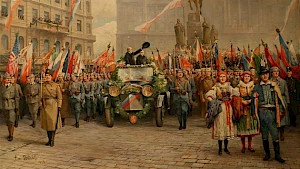 In 1928, the Schalt family of industrialists from Ústí nad Labem - best known for their deer soap - had an epic with 22 paintings made about events from Czech history in order to donate them to the Czechoslovak state. These paintings became the basis of large-format prints that were used in many schools. The 14 motifs for Czech schools were painted by Emanuel Boháč, the 8 for German schools by different painters. The layers, for whom the nationality question played no role in their companies, wanted to underline their loyalty to the Czechoslovakian state. The most famous painting is “The Arrival of the First President of Czechoslovakia Dr. TG Masaryk in Prague on December 21, 1918”. This is also shown in the exhibition "Our Germans" in the city museum in Ústí nad Labem.
In 1928, the Schalt family of industrialists from Ústí nad Labem - best known for their deer soap - had an epic with 22 paintings made about events from Czech history in order to donate them to the Czechoslovak state. These paintings became the basis of large-format prints that were used in many schools. The 14 motifs for Czech schools were painted by Emanuel Boháč, the 8 for German schools by different painters. The layers, for whom the nationality question played no role in their companies, wanted to underline their loyalty to the Czechoslovakian state. The most famous painting is “The Arrival of the First President of Czechoslovakia Dr. TG Masaryk in Prague on December 21, 1918”. This is also shown in the exhibition "Our Germans" in the city museum in Ústí nad Labem.
Martin Krsek, senator, historian and employee of the Ústí City Museum, has now organized an exhibition of some of the images in the Senate in Prague. This is until November 5th. can be seen in the anteroom of the meeting room in the Wallenstein Palace (Valdštejnský palác).
Visits are possible on Mondays between 2 p.m. and 3 p.m., but must be registered in advance by calling 257 072 678.
Source: Radio Prague International
Czech National Day on October 28th
Every year on October 28th In the Czech Republic, people commemorate the founding of independent Czechoslovakia in 1918. Because it fits so well with the motto of this year's Cultural Days (see below), we would like to draw attention to it: It certainly says a lot that, on the one hand, it is the anniversary of the founding of a state that no longer exists continues to be a national holiday, while on the other hand the founding of the current Czech Republic in 1993 is not celebrated. Short advertising block: background information will be published on November 9th. discussed in Sebnitz .
Please note: Most shops in the Czech Republic will be closed tomorrow.
25th Czech-German Cultural Days opened
The 25th Czech-German Cultural Days opened yesterday in the Dresden Palace of Culture with a great concert by the Dresden Philharmonic Orchestra and the Prague Philharmonic Choir. This year's theme "Breaks" was originally inspired by the 30th anniversary of the dissolution of Czechoslovakia and aims to show that such upheavals can also be departures. Until November 12th, almost 90 events will take place on both sides of the border throughout the Elbe/Labe Euroregion.
(This is an automatic translation by Google Translator.)
Stationary border controls
Since Monday evening, Germany has resumed stationary controls at the border with the Czech Republic for the first time since the corona pandemic. Fixed controls were set up at the A17, Heideholz rest area. From the direction of the Czech Republic, traffic behind the state border was narrowed to one lane and routed through the Heideholz rest area. There are further fixed checkpoints at the Reitzenhain/Hora Svatého Šebestiána border crossing (B172/I7). There were also temporary checks at smaller border crossings.
Depending on the time of day and the intensity of the inspection, there were sometimes significant delays in travel time. Czech employees who commute to work in Saxony reported waiting times of up to half an hour. When a Euroregion employee re-entered Saxony from the Czech Republic on the Dresden-Prague motorway on Wednesday afternoon, a kilometer-long queue of trucks had formed in the right-hand lane, stretching far into the Czech Republic. However, cars were able to drive past the truck queue and queue up just before the narrowing. The federal police only carry out random checks and allow most vehicles to roll through slowly. This way the time delay was only up to two minutes. At regular intervals, suspicious vehicles (delivery trucks, but also semi-trailers) were brought into the parking lot and searched.
Czech commuters expressed themselves predominantly negatively in Facebook groups (Pendleři). The controls would make the daily commute to work much more difficult. Saxony relies on Czech skilled workers in many industries. Czech politicians such as Interior Minister Vít Rakušan expressed understanding and the belief that Germany only carries out random checks and thus affects entry as little as possible. They also expect that the inpatient controls will only be used temporarily.
After much hesitation, Germany requested inpatient controls from the European Union. The background is the growing number of migrants who enter Germany illegally across the Czech-German border with the help of smugglers. The state of Saxony had previously supported the federal police's veil search with its police.
Bust for August the Strong
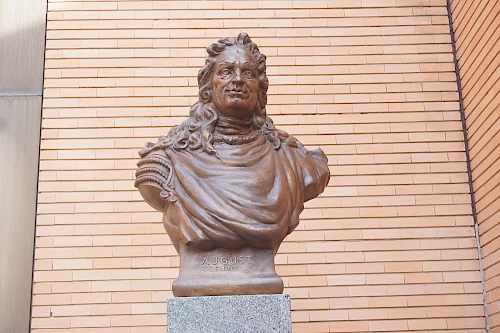
A bust of August the Strong was unveiled in Teplice. At the back of the Beethoven spa house, the bust sits on a pedestal in Lázeňská (Badgasse). The spa company commissioned the bust from the sculptor Libor Pisklák and wanted to use it to honor the spa town's close ties to the Saxon court. Every year August and his court moved into Teplice. His entourage numbered up to 1,500 people and 1,000 horses. In 1705, for example, he was accompanied by the court guard. 220 men of infantry and 209 of cavalry. This year marked the 340th anniversary of August's first spa stay in Teplice. The elector and later Polish king wasn't just here to take a cure. Teplice was also governed properly. The place was ideal for foreign policy because August was not the only ruler here. Teplice has always been the spa town of rulers. Augustus was also not the first Saxon ruler, he just continued a tradition that continued until his great-great-grandson, King Friedrich Augst II.
Teplice modernizes cultural center
The North Bohemian Philharmonic Orchestra from Teplice has to move to the neighboring Erzgebirge Theater because its venue, the Culture House, is being renovated. The work of star architect Karel Hubáček, who became known for his radio tower and mountain hotel on Ještěd, will receive a new foyer and a new main entrance. This means that the cultural center can now be accessed from two sides. The foyer area is complemented by a new café with outdoor seating. New escape routes had already been created beforehand. The house also gets new and more toilets, new electrics, new air conditioning and new heating.
However, the rest of the building remains unaffected by the renovation. The heart of the cultural center, which borders directly on the well-known colonnade made of steel and glass, is the concert hall with 550 seats. It is the most modern in the Czech Republic outside of Prague and is known for its great acoustics.
New podcast: Czech Republic six times
The Czech Republic is the focus of the Saxon State Center for Civic Education (SLpB). With the new podcast “Six Times Czech Republic” the institution is getting closer to the neighboring country. The first episode deals with the topic "Climate and Environment", with guests such as former Environment Minister Bedřich Moldan, analyst Romana Březovská, environmental psychologist Jan Krajhanzl and MEP and former Defense Minister Alexandr Vondra. The second episode has already been published. It is dedicated to the topic of "Czech Republic's relationship with Russia". Guests include the historian Karel Svoboda, the political geographer Michael Romancov and the extremism expert Jan Charvát.
As the name suggests, a total of six episodes are planned on six different topics. The podcasts are created in collaboration with Radio Prague International and will be published gradually. Episode three on the topic of “LGBTQIA+ and the Catholic Church” will be published in November.
(This is an automatic translation by Google Translator.)
German gravestones in the rose garden
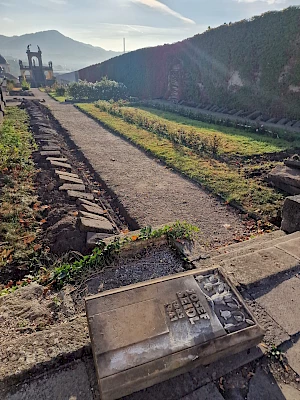 The rose garden at Děčín Castle will be renovated by the end of 2025. The workers came across a surprising find. Nine gravestones served as bases for vases and plant pots. Research has shown that they used to stand in the municipal cemetery of Podmokly (Bodenbach) in Škrabky and were apparently later removed and taken to the construction yard. During the renovation of the rose garden in the 1960s, they came to the castle as building material. Since they lay with their backs facing up, most of the grave inscriptions have been preserved. The names come from German residents before 1945, when the city was predominantly populated by Germans.
The rose garden at Děčín Castle will be renovated by the end of 2025. The workers came across a surprising find. Nine gravestones served as bases for vases and plant pots. Research has shown that they used to stand in the municipal cemetery of Podmokly (Bodenbach) in Škrabky and were apparently later removed and taken to the construction yard. During the renovation of the rose garden in the 1960s, they came to the castle as building material. Since they lay with their backs facing up, most of the grave inscriptions have been preserved. The names come from German residents before 1945, when the city was predominantly populated by Germans.
The castle management would like to return the gravestones to their original location. “In two weeks, when the work on the cemetery fence is completed, the stones will return to the cemetery,” announced castle director Miroslava Poskočilová. Historian Petr Joza, from the regional archives in Děčín, pointed out that the tombstones are worth preserving because they were made in the Germanic style in the 1930s. Some of them have already been left in the cemetery as an example.
The renovation will return the rose garden to its original form. As a result, there are no steps and the garden will be deeper in the future, but on one level. New additions include water features and access to the bastion. The roses are also being replanted. The current roses have already moved to the south garden. The rose garden is scheduled to reopen at the end of 2025.
Buses instead of ECs
Due to construction work on the control and safety technology in the Königstein - Kurort Rathen section, all international connections from Dresden to Ústí nad Labem (Aussig) will be canceled between October 17th and 27th. Instead, replacement buses will run from Dresden main station, Strehlener Straße. The buses leave 10 minutes earlier than the trains. From Ústí there is a connection to the onward journey to Prague or Graz and Budapest. Replacement buses also run on the return journey. These depart from Ústí six minutes later and arrive in Dresden later. From Dresden there is a connection to trains to Leipzig as well as Berlin and Hamburg. You can find the exact timetable here .
Tourist club buys Wolfsberg property
The Czech Tourist Club (KČT), section Krásná Lípa (Schönlinde), bought the property right next to the observation tower on Vlčí hora (Wolfsberg). There was a cabin on the property that burned down in the spring. The tower was also damaged, but was able to remain open. The tower belongs to the city of Krásná Lípa, with which the tourist club cooperates. “It was important to us that the summit remained in one hand and that no one built anything privately,” said club chairman Václav Hieke. The club paid the purchase price of 150,000 crowns out of its own pocket.
Last reminder: New newsletter from the Euroregion Elbe/Labe
A third and final time on our own behalf: So far we have only had one newsletter from the Elbe/Labe Euroregion. In the future, however, we will send out more information on different topics and are setting up several newsletter lists for this purpose.
So far we have mainly sent information about cultural events via the existing newsletter list, in the last few months especially about Czech Film Wednesday. There is now a new newsletter list that you must subscribe to in order to continue to receive information from us.
You can do this very easily by clicking on this link: Register for the cultural newsletter of the Euroregion Elbe/Labe
Furthermore, in the future we want to send a weekly overview of interesting events in the Czech Republic and the border region, from politics, society and everyday life. You are currently reading the second edition. This newsletter could be a good replacement, especially for those who sorely miss the “Look at the Neighbor” page in the SZ Dresden edition.
You can register directly by clicking on this link: Registration for the weekly newsletter of the Euroregion Elbe/Labe
(This is an automatic translation by Google Translator.)
September 2023
Město Krupka a Euroregion Elbe/Labe zvou in výstavu Madona in vandru, která se koná od 9.10. Thu 16.11. in městské knihovně Krupka na Mariánském náměstí 22. 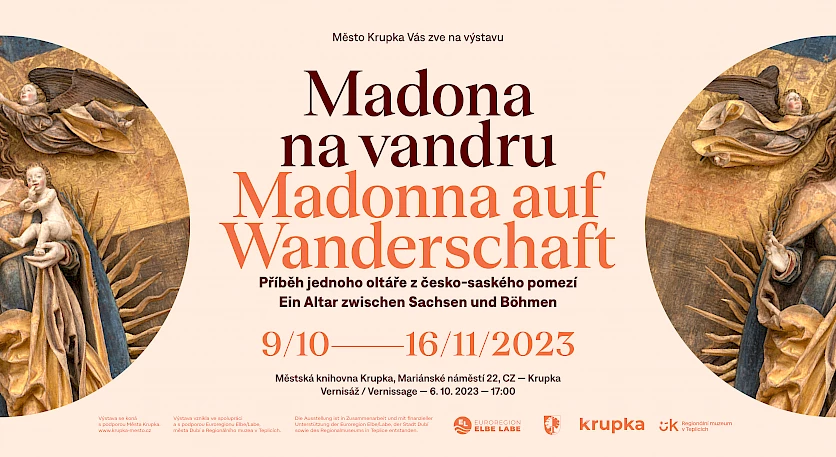
There is a beautiful view of the Madonou pochází pravděpodobně původně z Pirny av kostele ve Fürstenau se pak nacházel po mnoho desetiletí (spíše staletí). Poté, co byly poutě v Rakousku-Uhersku - a tedy iv Čechách - v 18. století za císaře Josefa II táři Madony do Fürstenau, tedy do Protestantského kostela v Sasku.
Když byl kostel ve Fürstenau v roce 1887 přestavěn, nezbylo již per oltář místo a byl přenesen do Předního Cínovce. Tam, jen pár metrů od hranic, per něj byla postavena kaple, která byla však po odsunu Němců po druhé světové válce zbořena.
Oltář se nakonec ocitl v Regionalálním muzeu v Teplicích, kde je k vidění dodnes.
(This is an automatic translation by Google Translator.)
Symbolic closure of the gap in Louka on Saturday
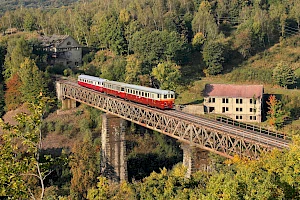
The resumption of railway operations from Holzhau to Moldava in the Czech Republic is still up in the air. But supporters of the rail connection continue to campaign undaunted to close this gap in cross-border traffic. On Saturday, September 30th , the 5th symbolic closure of the gap will take place at Louka u Litvínova (Meadow) train station. A variety of offers are on the program from 10 a.m. A special historical train also starts in Moldava at 10 a.m. After his arrival on October 11, the official program begins with railway and model railway technology, children's theater, live music and cuisine from Carpatho-Ukraine, the part that belonged to Czechoslovakia between 1918 and 1938.
The train station in Louka is an important junction of two railway lines. The route to Moldava meets the so-called “Goat Railway” (Kozí dráha) to Děčín (Tetschen), which is currently only used between Děčín and Telnice. The Ústí district is therefore planning to expand the train station into a tourist visitor center.
Regular trains to Moldava and back also run all day on Saturday. The special train starts the return journey after the end of the program at 21.05 (arrival in Moldava at 22.35). Tickets can be reserved by email info@erzgebirgs-zeitung.de . There is still a small contingent of tickets available. One trip costs 3 EUR.
Czech Railways increases prices
With the timetable change on December 10th, prices will rise at the Czech state railway České dráhy. As the company announced, prices will increase by an average of 9.5 percent. According to the railway, a ticket without a discount for a 45-kilometer route would then cost 101 crowns, instead of the previous 92. For 100 kilometers, the price increases from 188 to 205 crowns. However, travelers can extend the validity of the old prices for a while if they have bought their ticket by December 9th. Until then, tickets can be purchased up to two months in advance.
České dráhy regularly adjusts prices, most recently by 15 percent in December last year. As is the case today, the railways cited increased costs as the main reason. Conversely, the railway was able to record an increase in passenger numbers. After the corona pandemic, passengers returned to the railway. Passenger numbers rose by 6 percent to 79 million passengers in the first half of this year compared to the same period last year.
Former castle director moves to the presidential castle
Iveta Krupičková ran the castle in Děčín for 12 years and made it the most visited castle in the Ústí district. Above all, she managed the renovation and restoration of almost the entire castle and the castle gardens and managed to ensure that parts of the furnishings returned to the castle on at least a loan basis. But in 2019 the castle director was fired. The reasons were - as it quickly became clear - fictitious. Allegedly errors in economic management were the basis for the termination. Krupičková had always denied this. Police and prosecutors later confirmed that the allegations were completely unfounded. Apparently the city just wanted to get rid of the successful manager and replace her with someone she liked. Two years after the expulsion, the city issued a half-hearted apology.
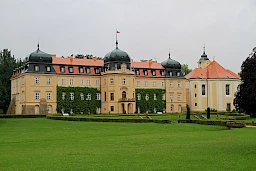
Now Krupičková could move to a particularly prestigious position. According to a report in the daily newspaper Děčínský deník, she will take over the management of the castle in Lany from October 1st. This information has not been officially confirmed. The castle in Central Bohemia serves as a country residence for the Czech presidents (and previously for the Czechoslovak ones). However, the presidents after 1990 used it very differently. While Václav Havel only stayed there occasionally, but took up the "Conversations from Lany" of his famous predecessor Tomáš G. Masaryk and published them on the radio, his successor Václav Klaus also avoided the castle. In turn, Miloš Zeman, who was seriously ill at the end, hardly showed up in Prague at all and stayed almost entirely in Lany. President Petr Pavel, who has been in office since the spring, has already announced that he does not want to use the castle for private or official purposes. If Ms. Krupičková takes over the management, the castle could also see a completely new use.
Voting for Czech Film Wednesday ends tomorrow
You still have the opportunity to vote for December's film at Czech Film Wednesday until tomorrow evening. There is currently a neck-and-neck race between two films. So your vote could be decisive.
To vote for your favorite film
Reminder: New newsletter from the Elbe/Labe Euroregion
A second time on our own behalf: So far we have only had one newsletter from the Elbe/Labe Euroregion. In the future, however, we will send out more information on different topics and are setting up several newsletter lists for this purpose.
So far we have mainly sent information about cultural events via the existing newsletter list, in the last few months especially about Czech Film Wednesday. There is now a new newsletter list that you must subscribe to in order to continue to receive information from us.
You can do this very easily by clicking on this link: Register for the cultural newsletter of the Euroregion Elbe/Labe
Furthermore, in the future we want to send a weekly overview of interesting events in the Czech Republic and the border region, from politics, society and everyday life. You are currently reading the first edition of this. This newsletter could be a good replacement, especially for those who sorely miss the “Look at the Neighbor” page in the SZ Dresden edition.
You can register directly by clicking on this link: Registration for the weekly newsletter of the Euroregion Elbe/Labe
We will only send the weekly review once again via this list. After that, it will only be used for the most important reports from the Euroregion and the border region, i.e. much less often. If you don't want to miss anything, please sign up for one of the other newsletters.
(This is an automatic translation by Google Translator.)
Příští týden je opět ten správný čas: 4.10. There are plenty of places in the world, and there is also a "Czech Film Festival" cycle at 8:00 p.m. in the Central Cinema Promítat českou Filmovou Klasiku. V říjnu je to film Příběhy obyčejného šílenství.
Příběh se točí kolem poněkud nenápadného Petra, který chce vlastně jen zpátky svou Janu, ale neustále se dost 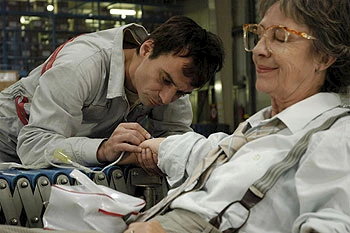 ává do absurdních situation a je obklopen bizarními lidmi: bláznivou matkou dárkyní krve, která chce zachránit svět, a jejím manželem, který zase zná nazpaměť socialistické zpravy ze 70. let, šéfem s italskou figurí nou, sousedy, u kterých nic nefunguje bez diváků v posteli , .... Díky svým vlastním sklonům k poněkud neobvyklým rozhodnutím však není zcela nevinný v mnoha propletencích, které vypadají jako každodenní šílenství.
ává do absurdních situation a je obklopen bizarními lidmi: bláznivou matkou dárkyní krve, která chce zachránit svět, a jejím manželem, který zase zná nazpaměť socialistické zpravy ze 70. let, šéfem s italskou figurí nou, sousedy, u kterých nic nefunguje bez diváků v posteli , .... Díky svým vlastním sklonům k poněkud neobvyklým rozhodnutím však není zcela nevinný v mnoha propletencích, které vypadají jako každodenní šílenství.
Ale (téměř) nikdo tu není doopravdy šílený, každý se jen po svém vyrovnává s životními nepřízněmi a příležitostmi. Celkově tak vzniká poměrně klidný a lakonický film s jemným, někdy až záhadným smyslem pro humor, but also to your českých komedií bývá. Proto je přece máme tak rádi, right?
PS: If you have any other names or a Czech film series, you will be able to see the results of the Euroregion Elbe/Labe region. Pokud byste chtěli být o Filmové středě a dalších akcích české kultury informováni iv budoucnu, je třeba se zaregistrovat k odběru new kulturního zpravodaje Euroregionu. Nejjednodušší způsob je sledovat tento odkaz: Registrace k odběru kulturního zpravodaje Euroregionu Elbe/Labe
(This is an automatic translation by Google Translator.)
Žatec is a world heritage site
The town of Žatec (Saaz) and the hop landscape around the town have been included in the UNESCO World Heritage List. The decision was made at the ongoing meeting of the World Heritage Commission in Riyadh, Saudi Arabia.
This is the first time that a hop-growing region has been added to the World Heritage List. UNESCO recognized the hop landscape, which has been intact for centuries, with the typical hop fields and functional buildings where the hops were processed on site. Specifically, it's about the hop landscape around Žatec and Stekník with the castle. The second complex recognized by UNESCO concerns parts of the historic center of Žatec, especially the Prague suburb, which was built at the end of the 19th century. The buildings intended for hop storage, production and trading still stand here today and hops are also stored, traded and shipped here to this day. Characteristic of the district are the high chimneys, 39 of which are still preserved today. The hops were preserved by sulfurization and the exhaust gases were discharged via the high food.
With the UNESCO World Heritage title, an almost 20-year process comes to an end. In 2018, the application had already made it to the World Heritage Commission. However, the application was recommended for revision again. The decision was supposed to have been made last year, but because of the Russian invasion of Ukraine, the planned world heritage in Kazan could not take place.
For the Czech Republic, Žatec and the hop landscape are already the 16th World Heritage Site. There is also a world natural heritage site in the Czech Republic with the beech forests of the Jizera Mountains.
Ústí district is recruiting doctors
The Ústí district is tackling the shortage of doctors. With a generous financial package, the district would like to encourage graduates to start working in the Ústí district after their medical studies. The new healthcare concept in the Ústí district expects up to 300,000 crowns (around 12,400 euros) in financial support for studies if the students commit to opening a practice in the district. An additional up to 800,000 crowns will be made available to equip the practice. In total, the district has provided around 60 million crowns (around 2.5 million euros) for the first phase of the scholarship program.
The district assumes that due to the increasing number of baby boomers retiring, there will be staff shortages for at least another five years before the measures that have now been decided take effect.
The Krajská zdravotní hospital network, which brings together several hospitals in the district, is already successfully using a similar scholarship program. According to the hospital association, sufficient staff have so far been found to fill vacancies through various measures, including financial measures.
Erzgebirge nature reserve in planning
What effects would a nature reserve (NSG) in the Erzgebirge have? The information campaign of the Czech State Agency for Nature and Landscape Protection is currently providing information about this. She is currently consulting the plans with the affected communities. So far, the agency representatives have already spoken to 25 of 69 municipalities in the Ústí and Karlovy Vary districts. The process is expected to be completed by the end of the year.
In the most strictly protected areas, fears of greater restrictions in life are naturally higher. “We want to achieve maximum agreement with the communities before the approval process begins,” says Environment Minister Petr Hladík. “So far, a correct exchange of opinions has prevailed,” says agency boss František Pelc, describing the atmosphere.
The establishment of a uniform protection status for the Erzgebirge has been planned for some time. So far, only individual nature reserves, natural monuments and Natura 2000 areas have been distributed as protected areas across the Ore Mountains. However, the new designation as a landscape protection area would only apply to the Czech part.
New newsletter from the Elbe/Labe Euroregion
So far we have only had one newsletter from the Elbe/Labe Euroregion. In the future, more information will be sent out on different topics.
Through this newsletter list (if you are currently reading an email: from which you receive this message) we have mainly sent information about cultural events , in the last few months especially Czech Film Wednesday. There is now a new newsletter list that you must subscribe to in order to continue to receive information from us.
You can do this very easily by clicking on this link: Register for the cultural newsletter of the Euroregion Elbe/Labe
Furthermore, in the future we want to send a weekly overview of interesting events in the Czech Republic and the border region, from politics, society and everyday life. You are currently reading the first edition of this. This newsletter could be a good replacement, especially for those who sorely miss the “Look at the Neighbor” page in the SZ Dresden edition.
You can register directly by clicking on this link: Registration for the weekly newsletter of the Euroregion Elbe/Labe
We will send the weekly review three times using this list. After that, it will only be used for the most important reports from the Euroregion and the border region, i.e. much less often. If you don't want to miss anything, please sign up for one of the other newsletters.
(This is an automatic translation by Google Translator.)
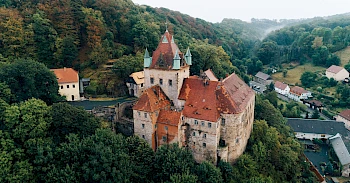
Kuckuckstein Castle in Liebstadt promises an experience for all the senses this weekend. Regional products such as vegetables, honey, chocolate, beer and wine, but also ceramics, textile art and live music await visitors. There are also petting goats and ponies for riding.
In addition to a tour of the castle, the current exhibition by the German-Austrian-Czech sculptor Jana Büttner and the painter Mirjam Jahn from Upper Bavaria can also be viewed.
Open on Saturday, 11 a.m. to 7 p.m. and Sunday 11 a.m. to 5 p.m., entry 7 euros.
(This is an automatic translation by Google Translator.)
 In the “Czech Film Wednesday” series, a film will be shown on December 6th that our viewers can choose. The vote is now underway!
In the “Czech Film Wednesday” series, a film will be shown on December 6th that our viewers can choose. The vote is now underway!
In the last few weeks we have received 15 film suggestions. We're really impressed by the range shown in terms of both age and character or genre. Almost all of the films are among the best works in Czech film history. We are very pleased with the good taste of our audience.
Now it's up to you to decide on the Santa Claus film! Voting is open until September 30th.
(This is an automatic translation by Google Translator.)
August 2023
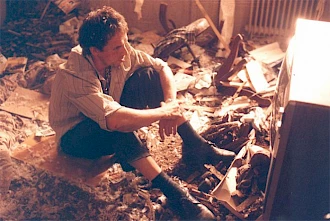
As on the first Wednesday of each month, we will be showing a Czech film classic in the "Czech Film Wednesday" series on August 2nd at 8 p.m. in the central cinema. This time the imaginative action comedy »Akumulátor 1« from 1994 is shown.
The film depicts the world behind the screen, where mirror beings live on our lives, feeding on leeching our energy while we watch television. This also applies to Olda (Petr Forman) after he was interviewed by television. dr Fišarek (Zdeněk Svěrák) supports him with many natural energies in the fight against his doppelganger. And a new found love helps him too. But he has to fight himself.
With this film in 1994, the two Svěráks created a work that falls a little outside the scope of their other work. There is more action and excitement here - albeit rather ironically than Hollywood blockbusters - and the technical possibilities that were new at the time were also clearly used. In view of the ubiquitous media consumption, the message is probably more relevant today than ever.
More about the film and tickets
(This is an automatic translation by Google Translator.)
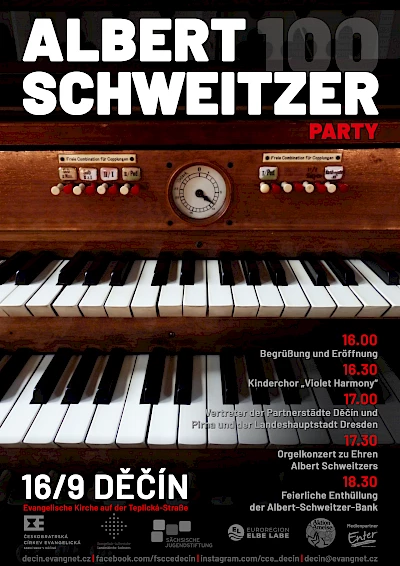 On January 15, 1923, Albert Schweitzer visited the Church of Christ in Tetschen (today Děčín). There he played a concert and reported on his work in Africa.
On January 15, 1923, Albert Schweitzer visited the Church of Christ in Tetschen (today Děčín). There he played a concert and reported on his work in Africa.
To mark the 100th anniversary of this event, the concert will now be repeated at the same venue on the same instrument. In addition, the choir "Violet Harmony" and soloists from the elementary school Kamenická will perform.
The Euroregion Elbe/Labe provides a shuttle bus from Dresden.
More about the event and
registration for the shuttle bus
The event is sponsored by the Evangelical Lutheran Church of Saxony/Children and Youth Education Office in Dresden, the Saxon Youth Foundation and the Evangelical Church of Bohemian Brethren in Děčín.
July 2023
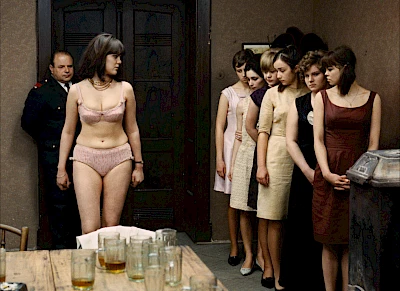
Like every first Wednesday of the month, on June 7th at 8 p.m. we will be showing a Czech film classic in the "Czech Film Wednesday" series in the central cinema. This time Miloš Forman's bitter satire »Hoří, má panenko« (The Firemen's Ball) from 1967 is shown.
A fire brigade ball in Vrchlabi turns into a complete fiasco: everyone lets themselves be mercilessly flooded and behaves accordingly. For a spontaneous beauty election, candidates must be "won" quickly. However, they are so reluctant that in the end an even more stupid solution is found. As the festival progresses, more and more of the raffle prizes disappear. Nobody here seems to have any qualms about helping themselves. At the peak there is a fire alarm...
In the run-up to the Prague Spring, Miloš Forman shot this evil satire of everyday life in his homeland. The idea came to him after attending a firemen's ball in Vrchlabí. The censors interpreted the film as a criticism of the system and banned it after three weeks. However, he went abroad, became internationally known and was even nominated for an Oscar in 1969.
More about the film and tickets
(This is an automatic translation by Google Translator.)
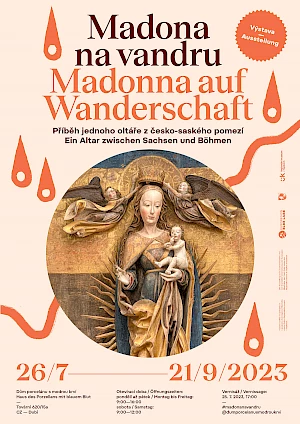 Pirna - Fürstenau - Vorderzinnwald - Hinterzinnwald - Teplice, these are the previous stations of a beautifully carved medieval Madonna altar, which - because it stayed there the longest - is also known as the Fürstenau Madonna altar.
Pirna - Fürstenau - Vorderzinnwald - Hinterzinnwald - Teplice, these are the previous stations of a beautifully carved medieval Madonna altar, which - because it stayed there the longest - is also known as the Fürstenau Madonna altar.
A new exhibition is now dedicated to the eventful history of this Madonna, who wandered between Saxony and Bohemia. This will be shown in Dubí from July 25, 2023 to September 21, 2023, after which it will set off on its own journey. In November and December it will be shown in Dresden, next year in Pirna and Lauenstein.
The station of the Madonna in Vorderzinnwald in its own chapel can be experienced virtually on site since last year. A modern smartphone or tablet is enough, and both the chapel and the Madonna altar appear to be back in their original place.
In the Fürstenau church you can see a glass replica of the Madonna statue, illuminated from the inside. This was also made last year.
(This is an automatic translation by Google Translator.)
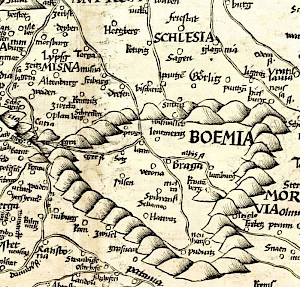
Some new copies of the popular atlas with historical maps of Bohemia, Saxony and above all the area of the Euroregion Elbe/Labe have reached us again from the bookbindery. They are available online, in a few points of sale and in our office in Dresden.
Unfortunately, the bookbindery was once again unable to produce all copies in perfect quality. We therefore offer those with small flaws as 2nd choice at a reduced price of 20 euros.
More about the historical atlas and ordering
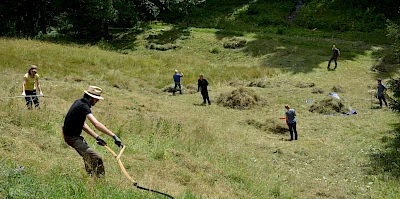
BUND Dresden and the Czech partner organization ČSOP Ophidia invite you to the 3rd German-Czech Care4Nature Camp:
From 14th to 20th August 2023 you can travel with us to the Ore Mountains for a week and have the opportunity to learn a lot about meadow care, to discover the species-rich mountain meadows and to get involved in nature conservation in a very practical way. Together with young adults from the Czech Republic and Germany, we tackle it and, with a lot of fun and energy, we are committed to preserving biodiversity in the Ore Mountains.
What awaits you?
A varied program awaits you: the focus is on tending the mountain meadows with a scythe. Never sen? No problem: we have a scythe instructor who will support us with the traditional hand mowing. Practice all the steps of making hay and try out other biotope care measures. There are also technical contributions and excursions, and the beautiful mine grounds and their immediate surroundings are also explored every year. You can also look forward to a trip to the organic farm. There we will make cheese ourselves and enjoy delicious food. We end the evenings with games or spending time together around the campfire. Do you want to be there? Then register now until 15.07. at! We look forward to you!
Where does the camp take place?
The camp takes place on the German-Czech border in the Ore Mountains. We find accommodation in an apartment house on the German-Czech border near Oberwiesenthal. On our daily way to the care areas, we walk through the beautiful mine grounds with giant ferns and rare plants such as arnica, blue tarantula, fire lily and gaping monkshood. There is also time to snack on raspberries and blueberries along the way and to jump into the cool water on the way back.
The area has a long and interesting history - where mountain farmers used to graze their cattle, valuable meadows and moors were created, which have a high natural value as a cultural landscape due to their former use and are home to rare species.
The project is funded by:
the German-Czech future fund and the Tandem D-CZ coordination center.
Who's in?
The Care4Nature Camp is aimed at young adults aged 16 to 26 from Germany and the Czech Republic. The number of participants is limited to 20 people. So register quickly and be there!
How much does that cost you?
This adventure costs you nothing! Participation in the camp, including travel expenses, accommodation and meals, is free of charge.
Further information and the registration form can be found on the website: https://www.bund-dresden.de/was-wir-tun/care4nature-camp/ .
(This is an automatic translation by Google Translator.)
June 2023
As the mayor of Budyně nad Ohří for many years, Mr. Petr Medáček was the deputy chairman of the Association of Municipalities of the Labe Euroregion (Czech side of the Elbe/Labe Euroregion). The Council of the Euroregion Labe honored his many years of work in the field of Czech-Saxon cross-border cooperation and would like to use his experience in the next funding period.
(This is an automatic translation by Google Translator.)
The train Wanderexpress Bohemica runs from April to October on weekends and public holidays between Dresden and Litoměřice (Leitmeritz), the Letní kometa (also known as Vánocní kometa during the Christmas season) between Ústí nad Labem and Dresden, each morning one way and back in the afternoon. Both are important connections for weekend getaways.
The corresponding contracts expire in December. According to a report in the newspaper Dresdner Neuste Nachrichten today, however, both sides have committed to continuing the offer to the same extent over the next few years. In view of rising costs, this is not a matter of course.
In the medium term (i.e. after 2025), the Ústecký kraj is aiming for an additional connection by extending an express train from Prague via Ústí n.L. to Dresden. However, the necessary financing is still open, as is the available capacity in the Elbe valley.
Source: Dresdner Neuste Nachrichten from June 20th, 2023, p. 16 (also online )
May 2023
On a run-down railway site in Ostrava, two boys find a corpse prepared like a hunting trophy. The police investigations lead into all social strata of the city, into high political circles and into nouveau riche entrepreneurs, into prostitutes and into broken families. The author skilfully links a murder case in the present with a German-Jewish family history that goes back many decades and shows how easily a person can fall victim to anger, history and a suppressed past. A social panorama as an excursion into the hell of the present.
Nela Rywiková, born in Ostrava in 1979, is one of the most interesting new names in Czech crime fiction, which is experiencing a kind of renaissance. Her debut novel Dům číslo 6 (House Number 6) was published in 2013.
Cooperation between: Czech Literature Center (Moravian State Library), Czech Center Berlin, Salon of German-Czech Dialogue, Staatsschauspiel Dresden and the Department for European and International Affairs of the state capital Dresden. Under the patronage of the Consul General of the Czech Republic in Dresden.
(This is an automatic translation by Google Translator.)
The Ostsächsische Sparkasse Dresden has been providing financial support to the municipal community Euroregion OE/OE eV (German side of the Euroregion Elbe/Labe) for many years. Today, at the meeting of the working committee, the new sponsorship contract for the next two years was approved by Heiko Lachmann, board member of the Ostsächsische Sparkasse Dresden, Dirk Hilbert (Mayor of the state capital Dresden and President of the KG Euroregion), and Daniel Brade (Mayor of the city of Hohnstein and Vice President of the KG Euroregion) signed. We sincerely thank the Ostsächsische Sparkasse Dresden for continuing this long-term support.
(This is an automatic translation by Google Translator.)
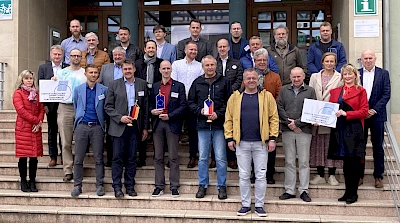
On Thursday, April 27, 2023, the first cross-border conference of mayors in the Schluckenau tip took place in Krasna Lipa. This was brought to life by the economic initiative Saxon Switzerland eV and the mayors' association Sever from the Schluckenauer corner.
The following 12 cities (mayors) took part from the Czech side: Dolni Poustevna, Jirikov, Krasna Lipa, Lipova, Lobendava, Mikulasovice, Rumburk, Stare Krecany, Sluknov, Velky Senov, Vilemov and Varndorf.
From the German side took part: Bad Schandau, Sebnitz, Neustadt, Hohnstein, Sohland an der Spree and Großschönau.
The aim of the meeting was to get to know, introduce and network the German and Czech communities. As a result, there should be concrete cross-border projects and joint activities.
Guests at this conference were Jan Šmid and Jirí Rak (České Švycarsko ops), Mgr Ondrej Havliček (Euroregion Neiße), Rüdiger Kubsch (Euroregion Elbe/Labe), Senator Zbynek Linhart and Jan Kvapil (German-Czech Future Fund).
The conference was moderated in two languages by Martina Böhme and Irena Kubicova.
Finally, the chairman of the economic initiative Saxon Switzerland and mayor of the city of Hohnstein, Mr. Daniel Brade, invited to a second cross-border conference of mayors in Hohnstein in autumn.
This event was kindly funded by the German-Czech Future Fund.
(This is an automatic translation by Google Translator.)
V souladu se stanovami DSO EL zvolila Rada EL na svém prvním řádném zasedání po volebním Sněmu EL z konce roku 2022.
Staronovým předsedou byl zvolen primátor most Ústí nad Labem pan Petr Nedvědický. Prvním místopředsedou EL zůstává primátor města Děčín pan Jiří Anděl. Druhou místopředsedkyní je starostka města Bílina paní Zuzana Schwarz-Bařtipánová.
Funkční předsednictva období je čtyřleté
(This is an automatic translation by Google Translator.)
April 2023
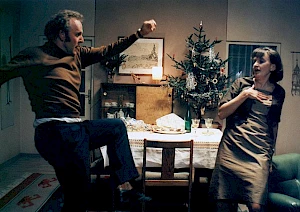
With gentle poetry and humorous exaggeration, the life of three generations of men and women in a special period of Czech history in 1968 is told...
The Šebek and Kraus families are neighbors in a two-story villa in Prague. Father Šebek is an officer and a loyal party soldier, but basically a simple, good-natured man. He praises the virtues of communism and the advances of the Eastern Bloc. Unbreakable plastic glasses from the GDR play an important role as proof of the superiority of communism.
The Kraus family above him maintains a middle-class lifestyle in which art and culture as well as old traditions play a major role. Father Kraus, a former resistance fighter against the Nazis and a staunch anti-communist, not only despises his neighbor's political attitude, but also looks down on his lack of culture. The two, who are also convinced - also in their families - that they are fundamentally right, regularly clash.
Your children, on the other hand, get along well. Michal Šebek is in love with his neighbor, but she has her eyes on someone else. Various visits, drinking bouts, a Christmas party and a funeral bring both families together again and again, resulting in a firework of subtle humor. For young people, the attractions of the capitalist world contrast with the aforementioned unbreakable plastic glasses from the socialist brothers from the GDR. The invasion of Warsaw Pact troops ultimately marks a deep turning point.
(This is an automatic translation by Google Translator.)
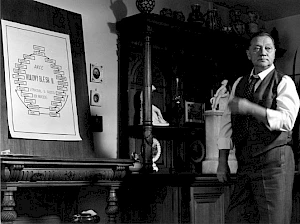 The film "Kulový blesk" is about the biggest maneuver in the history of moving: an apartment ring exchange with 12 parties involved. Everyone has to move on the same day, everything has to work, otherwise the chain will fall apart. dr Radosta is an experienced organizer of such actions, but there has never been a 12-ring exchange. This is world-class moving! And it's like watching for fleas. There is always someone wanting to change something, wanting to get an advantage, or has changed their mind and prefers not to move. Some get divorced, others have to marry quickly beforehand. dr Radosta and Knotek, his semi-voluntary assistant, have their hands full. And when it starts, of course, everything gets much worse.
The film "Kulový blesk" is about the biggest maneuver in the history of moving: an apartment ring exchange with 12 parties involved. Everyone has to move on the same day, everything has to work, otherwise the chain will fall apart. dr Radosta is an experienced organizer of such actions, but there has never been a 12-ring exchange. This is world-class moving! And it's like watching for fleas. There is always someone wanting to change something, wanting to get an advantage, or has changed their mind and prefers not to move. Some get divorced, others have to marry quickly beforehand. dr Radosta and Knotek, his semi-voluntary assistant, have their hands full. And when it starts, of course, everything gets much worse.
More about the film and Czech Film Wednesday
(This is an automatic translation by Google Translator.)
March 2023
Chcete strávit odpoledne objevováním nového, posloucháním neznámého a opětovným poznáváním starých známých sbírek a světoznámých pokladů. Ukázky historických experimentů, otevřené ateliéry a dílny nebo vypravěči zvou ke strávení inspirationalního odpoledne s rodinami a přáteli všech věkových kategorií.
Aktuální termíny
No 26.03. 15:30 - Neděle v muzeu - neděle od tří hodin - vstup zdarma:
Kennel - Matematicko-fyzikální salon
per deti a rodiny
No 02.04. 15:30
Draci jsou volni. Vzhůru do sbírky porcelánu s vypravěčem!
Kennel - sbírka porcelánu
per deti a rodiny
No 16.04. 15:00
Neděle v muzeu: od tří hodin vstup zdarma!
Albertinum - Albertinum
No 23.04. 15:30
Neděle v muzeu - neděle od tří hodin - vstup zdarma:
Kennel - Matematicko-fyzikální salon
per deti a rodiny
No 07.05. 15:30
Draci jsou volni. Vzhůru do sbírky porcelánu s vypravěčem!
Kennel - sbírka porcelánu
per deti a rodiny
No 21.05. 15:00
Neděle v muzeu: od tří hodin vstup zdarma! Otevřený studio per male i velké
Albertinum - Albertinum
(This is an automatic translation by Google Translator.)
Předsedou Asociace Euroregionů ČR se stal do konce roku 2023 zástupce Euroregionu Šumava Libor Picek a tajemníkem Ondřej Havlíček, výkonný ředitel Euroregionu Nisa.
Akce se konala pod záštitou vicepremiera a ministra per místní rozvoj Ivana Bartoše. Stanovy i orgány spolku odsouhlasilo všech 13 subjectů, které se aktivně hlásí ke spolupráci Euroregionů na všech 5 hranicích, kde se realizují přeshraniční aktivity. Jde o česko-rakouskou, česko-slovenskou, česko-polskou, česko-saskou and česko-bavorskou hranici. Ve všech těchto příhraničních regionech bude fungovat Program Interreg 2021 - 2027, a Euroregiony budou vykonávat funkci administrátorů Fondů malých projektů. 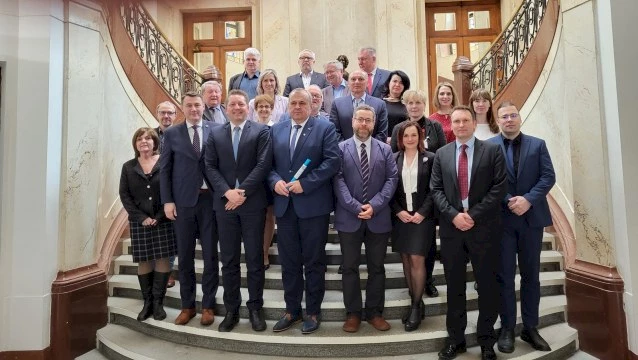
MMR, podle slov náměstka ministra Sršně, podporuje činnost Euroregionů a hodlá pomoct rovněž formou dotací na aktivity Asociace. Očekává taktéž podněty z euroregionů na zlepšení hospodářské a social situation v periferních oblastech. Na jednání zazněly hlasy na ustanovení či opětovné nastartování fungování mezivládních komisí pro přeshraniční oblasti, kde je nutné urychlit proces řešení takových otázek jako přeshraniční doprava, fungování IZS přes hranici, udržení vody v krajině v kontextu klimatických změn, efektivní spolupráce nemocnic a zdravotnických složek ve prospěch pacientů v pohraničních oblastech apod. Asociace jako den z nových členů Národní stálé konference bude usilovat o prezentaci aktivit spolku i jednotlivých členů už na nejbližším jednání NSK začátkem dubna 2023 v Plzni.
Za Euroregion Labe se jednání zúčastnili místopředseda Euroregionu Labe a primátor města Děčín pan Jiří Anděl a ředitel Euroregionu Labe Vladimír Lipský.
(This is an automatic translation by Google Translator.)
February 2023
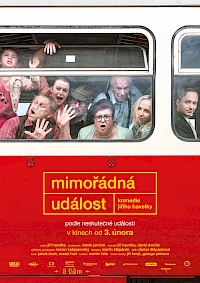 On March 1st we will start the film series "Czech Film Wednesday" in the Dresden Central Cinema, in which we will show an original Czech film with subtitles on every 1st Wednesday of the month at 8 p.m.
On March 1st we will start the film series "Czech Film Wednesday" in the Dresden Central Cinema, in which we will show an original Czech film with subtitles on every 1st Wednesday of the month at 8 p.m.
The film "Mimořádná událost" (Exceptional Situation) was a great success at the Czech-German Culture Days, with sold-out screens and many people asking us when we would be showing it again. That's why we start the film series with this absurd comedy.
(This is an automatic translation by Google Translator.)
There are small project funds (SPF) in all four Saxon-Czech Euroregions. They aim to bring people on both sides of the border closer to one another by promoting suitable projects. Unfortunately, applications will probably be possible from this summer. However, all project sponsors can look forward to significant simplifications in the processes.
The SAB has compiled initial information on the SPF: Presentation of the Small Projects Fund (PDF, 1MB) .
K celoročnímu zapojení do tohoto programu se hledají nadšenci a machři (ž/m) z česko-německých příhraničních regionů na období trvání programu od 1. 5. 2023 do 30. 4. 2024
Po celý rok budete součástí tohoto programu a budete with dostatek prostoru per creativení a nezávislý přístup. Activity probíhají ve výměně s ostatními účastníky programu as pracovníky Česko-německého fondu budoucnosti.
Časová náročnost účasti v programu odpovídá zhruba 2 and 3 dnům týdně. Česko-německý fond budoucnosti (nadační fond) podpoří Vaší účast na tomto programu formou grantu.
Veškéré informace naleznete zde
(This is an automatic translation by Google Translator.)
In the X-Dörfer project, the Staatsschauspiel Dresden supports a wide range of cultural projects in rural areas. In addition to financial support, the content-related support provided by theater professionals is particularly important.
For projects after the summer of 2023, the small project fund of the Euroregion Elbe/Labe can be used as a supplement to organize such projects across borders. The offices of the Euroregion will be happy to advise you (see Contact ).
TENDER
The Staatsschauspiel Dresden is looking for people of all ages who are interested in culture and want to jointly invent and implement cultural projects in rural areas. The aim of the initiative is to initiate and support sustainable impulses for a culture of togetherness.
Concerts in the barn, landscape theater projects, writing festivals for everyone, culture cafés, history workshops, cinema in the hairdresser's salon and much more. develop. Cultural institutions, associations, civic initiatives, cultural workers or lay people of all ages interested in culture from Saxon communities with up to 40,000 inhabitants that are no further than 60 km away from Dresden can apply.
In the application, a rough idea or a question should be outlined. It is important that no single person applies, but that it becomes apparent that several people are interested in the idea and want to get involved.
If your application is selected, the X-Dörfer project management will come to your location to develop the idea further together and to find out where the project needs support. Do you still need a brilliant idea, more committed fellow campaigners from the village or neighboring communities, an organizational structure, cooperation partners or professional artists from outside? Ultimately, the idea is to be implemented on site by those involved with the support of the X-Dörfer project management.
The project period is 2023 and/or 2024.
THE PROJECT PROVIDES AS REQUIRED:
- Advice on brainstorming
- Organizational support
- Fees for artists who live locally or who are invited from outside.
- possibly travel and accommodation costs
- Material costs for the project
- Public relations support
- if the project is successfully completed, assistance with applications for funding for the following year
APPLICATION REQUIREMENTS:
- First idea
- Short letter of motivation
- Brief self-portrayal
- Approximate time table
- Who else could you include?
The application should not comprise more than one or two A4 pages in total.
APPLICATION EXPLANATIONS:
After a pre-selection of the applications received, one or two exchange meetings take place on site. A final decision is then made as to whether cooperation is in the interest of all parties involved.
If the application is a barrier and if you have any questions, the project team Miriam Tscholl and Claudia Leutemann can be reached at xdoerferstaatsschauspiel-dresden.de. We are also happy to advise you in an online meeting or telephone call.
Deadline:
You can apply now, but no later than March 15, 2023
(This is an automatic translation by Google Translator.)
Since this year, the State Office for Early Education in the Neighbor Language has offered “čaj & kawa with the LaNa”, an open advisory service on education in the neighboring language in Czech and Polish.
From now on you can meet the LaNa staff online every 1st Tuesday of the month between 1:00 p.m. and 2:00 p.m. and discuss your questions and topics relating to education in the neighboring language with them.
These are the upcoming dates:
- February 7th
- March 7th
- April 4th
- May 2nd
- 06 June
How to take part in "čaj & kawa with LaNa": The events take place via the GoToConnect video conference module. Registration is not necessary: simply open the access link, enter the virtual room and bring your favorite drink and your conversation needs.
You can find more information and the access link to this advisory service at www.nachbarsprachen-sachsen.eu/caj-und-kawa.
(This is an automatic translation by Google Translator.)
The second round of presidential elections in the Czech Republic took place on January 27-28, 2023. The candidates who emerged from the first round were Petr Pavel and Andrej Babiš.
Petr Pavel won and became President of the Czech Republic with 58.32% of the vote. Andrej Babiš received 958,655 fewer votes, ie 41.67% of the votes.
Election results in the Ústí district:
Petr Pavel - 45.53%.
Andrei Babis - 54.47%.
Election results by district
Decin :
Petr Pavel - 49.75%.
Andrei Babis - 50.25%
Usti nad Labem:
Petr Pavel - 44.75%
Andrei Babis - 55.25%.
Teplice :
Petr Pavel - 43.15%
Andrei Babis - 56.85%.
Litomerice :
Petr Pavel - 53.32%.
Andrei Babis - 46.6%
Overview of the results at idnes.cz (Czech)
(This is an automatic translation by Google Translator.)
January 2023
At its meeting on December 22, 2022, the general meeting of the municipal community Euroregion OE/OE eV (i.e. the German side of the Euroregion Elbe/Labe) decided to admit the large district town of Sebnitz as a member.
We are very happy about this step and warmly welcome the city of Sebnitz in our midst.
(This is an automatic translation by Google Translator.)
December 2022
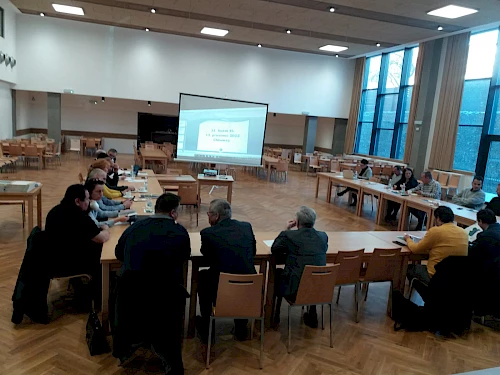 Due to the local elections in the Czech Republic in September 2022, the 33rd General Assembly of the Euroregion Labe was held on an unusual date.
Due to the local elections in the Czech Republic in September 2022, the 33rd General Assembly of the Euroregion Labe was held on an unusual date.
The main point of the meeting was the election of new organs of the Association of Municipalities. An equally important point during the deliberations of the meeting were the issues related to the launch of the Czech-Saxon Interreg program and the Small Projects Fund 2021-2027.
(This is an automatic translation by Google Translator.)
November 2022
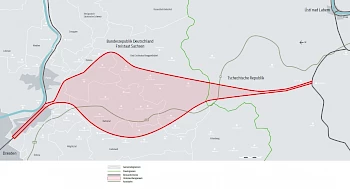
Planning for the high-speed railway line between Dresden and Prague is progressing. There are now three proposed variants of the Deutsche Bahn, two completely in the tunnel and one with an above-ground section. The picture shows the examination area for the three variants. You can already get a lot of information at neubaustrecke-dresden-prag.de .
From November 24th, 2022, Deutsche Bahn will provide detailed information about the plans and the different variants at a so-called information market.
On November 30th, 2022, an online public dialogue will take place, in which questions can be asked which - if possible - will be answered directly.
To the information market of Deutsche Bahn
(This is an automatic translation by Google Translator.)
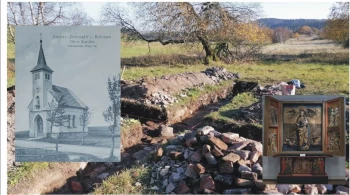 The relatively young chapel, built in 1887, was demolished in the 1950s in connection with the establishment of the border strip. Crowds of pilgrims used to come here on the feast of the Visitation until World War II, and efforts are being made to restore this tradition today.
The relatively young chapel, built in 1887, was demolished in the 1950s in connection with the establishment of the border strip. Crowds of pilgrims used to come here on the feast of the Visitation until World War II, and efforts are being made to restore this tradition today.
The archaeological investigations were carried out in October and November of this year by the regional museum in Teplitz (Teplice) in cooperation with the nature conservation station in the Eastern Ore Mountains from Altenberg and funded by the Federal Agency for Political Education.
At the end of the event, the uncovered excavations will be filled up again together. Visitors have the unique opportunity to see the finds "in situ".
The event takes place in any weather!
Arrival by public transport: With bus 360 at 11:42 a.m. from Dresden main station via Dippoldiswalde and Altenberg to Zinnwald Wendeplatz (arrival 12:52 p.m., walk to the chapel approx. 4 km on the road) or České Pomezi (arrival 12:55 p.m o'clock, footpath to the chapel approx. 4 km through the forest).
Danger! The road Cinovec - Fojtovice is not cleared in winter! On-site parking is not permitted for security reasons.
Contact for more information: jankvapil@post.cz, tel. +420 732 921 250 & +49 157 52 611 600.
(This is an automatic translation by Google Translator.)
Benno Benešovi se za totality aktivně podílel tajných salesiánských aktivitách per mládež, po revoluci stál za vznikem salesiánského nakladatelství Portál, social-teologické školy Jabok či salesianských misií v Bulharsku.
Od roku 2003 působil v Teplicích, kde léta vedl místní salesianskou komunitu a zanechal zde po sobě nesmazatelnou stopu; již od počátku 90. let dbal na rozvoj zdejšího salesiánského díla, které by bez něj nemělo zdaleka takové zázemí a nepomohlo tolika obyvatelům našeho mesta. Notně se věnoval nápravě pošramocených vztahů mezi Němci a Čechy – pocházel z česko-německé rodiny av mládí na vlastní kůži zakusil plody nacionalismem motivované nenávisti. Za tuto činnost získal v roce 2015 Zlatou holubici míru – putovní ocenění, kterým se mohl pyšnit např. Václav Havelči XIV. dalajláma.

(This is an automatic translation by Google Translator.)
You are cordially invited to the opening of the exhibition by Prague graphic artist Šimon Brejcha entitled Tissues.
Date: Friday, November 18, 2022 at 8 p.m
Location: Kunsthaus Raskolnikov , Böhmische Str. 34, Dresden
Introduction: Veronika Krülle Kotoučová / Euroregion Elbe/Labe, Eva Bendová / curator
*
OPEN AIR from 8:30 p.m.: Light-sound collage "Hillumination" by Andrea Hilger & Hartmut Dorschner
House facade at the corner of Böhmische Str./Salinger Weg
*
In cooperation and with the friendly support of the Euroregion Elbe/Labe, in the frame" stays curious Dresden City of Culture 2022.
Duration of the exhibition: until January 20, 2023
(This is an automatic translation by Google Translator.)
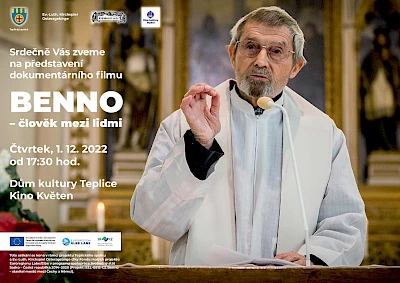 During the totalitarian regime, Benno Beneš was actively involved in secret Salesian activities for young people, after reunification he was behind the founding of the Salesian publishing house Portal, the social-theological school Jabok and the Salesian missions in Bulgaria.
During the totalitarian regime, Benno Beneš was actively involved in secret Salesian activities for young people, after reunification he was behind the founding of the Salesian publishing house Portal, the social-theological school Jabok and the Salesian missions in Bulgaria.
He has been active in Teplice since 2003, where he has been leading the local Salesian community for years and has had a significant impact on it; since the early 1990's he has been involved in the development of the local Salesian ministry which without him would not have nearly the same background and could not serve as many people in the city. He was very active in restoring damaged relations between Germans and Czechs. Coming from a Czech-German family, he experienced the consequences of nationalist hatred in his youth. In 2015 he was awarded the Golden Dove of Peace for his work.
On Thursday, December 1st, 2022 at 5.30 p.m. the premiere of the biographical film "Benno - a man among us" about the Salesian Benno Beneš from Osek will take place in the Teplice House of Culture in the Květen cinema.
(This is an automatic translation by Google Translator.)
what's new
1 Schmilka winter village – the special winter break
2 LEADER excursion 2022
3 Climate protection and digitization as topics for the future of national natural landscapes
4 Learning from the fire
5 We build for you in the Swedish holes.
6 SBB is building a new extinguishing water cistern at the Saupsdorfer Hütte
7 A little closer to the wilderness in the Saxon Switzerland National Park
8 Sautanz in Mockethal
9 The "Goldene Henne" for a hot job
10 Sensational donation result after an unforgettable football experience
11 Successful start to the Pirna 800 planting campaign
12 No hibernation for the Saxon Steamship Company
13 recipe of the month
Source: Joint initiative by the state enterprise Sachsenforst National Park Administration Saxon Switzerland and association Landschaf(f)t Zukunft e. V
(This is an automatic translation by Google Translator.)
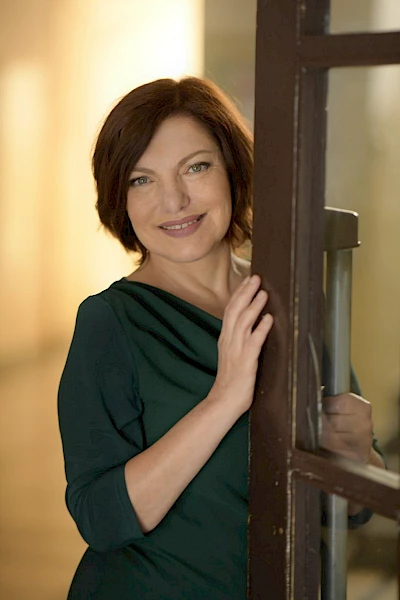
A Moravian town 1954: Mira defies her parents and goes ice-skating. She is punished with not getting a cupcake, but this event changes her life forever. Tragedy binds her to her taciturn, oddball Aunt Hana, and the two must learn to live together. Gradually, the story of her Jewish ancestors is revealed and Mira learns to understand why her aunt finds it so difficult to find her way in life.
Three generations of family history in the 20th century. Two skilfully interwoven time levels and destinies in cruel times. In addition to the suffering they have endured, two women also have to deal with the question of guilt when their own actions cause suffering to others, consciously or unconsciously. And how do you bear to be the only one to survive.
The story, based on true events, is written at a gripping pace, dramatic like a movie. Alena Mornštajnová's multi-award-winning novel has been translated into more than a dozen languages and is a bestseller in the Czech Republic.
Alena Mornštajnová, born 1963, is a Czech writer and translator. She wrote four novels and a children's book. Alena Mornštajnová studied English and Czech at the University of Ostrava. She made her debut in 2013 with the novel Slepá mapa (Blind Map) and in 2015 her second novel Hotýlek (The Little Hotel). Mainly because of her third novel, Hana, Alena Mornštajnová has been one of the most popular contemporary Czech writers since 2017. Her novel Hana was awarded the Czech Book Prize 2018, among others, and was named Book of the Year 2017 on the Databáze knih (Database of Books) website.
Location: Klemperer Hall (1st floor)
Admission free
A cooperation of: Euroregion Elbe/Labe, Municipal Libraries Dresden, SLUB, Czech Center Berlin and Czech Literature Center (ČLC). Under the patronage of the Consul General of the Czech Republic in Dresden JUDr. Marketa Meissnerova.
October 2022
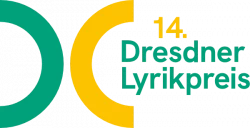 Der Dresdner Lyrikpreis wird zur Förderung des gegenwärtigen poetischen Schaffens durch den Oberbürgermeister der Landeshauptstadt Dresden ausgelobt und alle zwei Jahre vergeben, in diesem Jahr bereits zum 14. Mal. Teilnehmen können Bewerber*innen, die in Europa leben und in deutscher oder tschechischer Sprache schreiben. Die Jury ist jeweils mit tschechischen und deutschsprachigen Mitgliedern besetzt.
Der Dresdner Lyrikpreis wird zur Förderung des gegenwärtigen poetischen Schaffens durch den Oberbürgermeister der Landeshauptstadt Dresden ausgelobt und alle zwei Jahre vergeben, in diesem Jahr bereits zum 14. Mal. Teilnehmen können Bewerber*innen, die in Europa leben und in deutscher oder tschechischer Sprache schreiben. Die Jury ist jeweils mit tschechischen und deutschsprachigen Mitgliedern besetzt.
Gewinner des diesjährigen Wettbewerbs ist Pavel Novotný.
Den zusätzlich vergebenen Publikumspreis stiftet die Euroregion Elbe/Labe. In den Wochen vor der Preisverleihung können die Beiträge der Finalist*innen online angeschaut und anschließend ebenfalls online abgestimmt werden. Daraus ging Paul Henry Campbell als Sieger hervor. Den entsprechenden Beitrag können Sie hier anschauen.
Mehr dazu erfahren Sie unter www.dresdner-lyrikpreis.org.
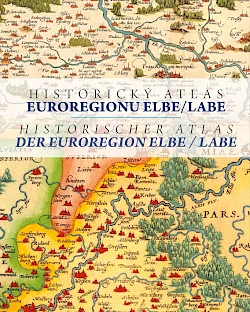
Historically, there are very close relations between Saxony and Bohemia. This can also be seen on old maps. For this reason, the Euroregion Elbe/Labe has published an atlas with historical maps of Bohemia and Saxony with a special focus on the territory of today's Euroregion.
There are 62 maps on 128 pages. The oldest is from 1280, the most recent are tourist maps from 1930. Explanations in German and Czech are included for all maps and various cartographic and historical topics (see below for table of contents). Thanks to the large format (38 cm by 31 cm) and high quality printing, many details are visible. Some special features are highlighted again in enlargements.
The atlas is now available at the Euroregion office in Dresden as well as in some bookshops in the region at a price of 30 Euro. For a shipping fee of 5 Euro and against prepayment we will also gladly send it to you. If you want to get an idea beforehand, you can download the atlas as PDF (Attention: 55 MB).
 The creation of the atlas was supported with funds from the European Union from the Small Projects Fund in the Elbe/Labe Euroregion.
The creation of the atlas was supported with funds from the European Union from the Small Projects Fund in the Elbe/Labe Euroregion.
Benno Benešovi se za totality aktivně podílel tajných salesiánských aktivitách per mládež, po revoluci stál za vznikem salesiánského nakladatelství Portál, social-teologické školy Jabok či salesianských misií v Bulharsku.
Od roku 2003 působil v Teplicích, kde léta vedl místní salesianskou komunitu a zanechal zde po sobě nesmazatelnou stopu; již od počátku 90. let dbal na rozvoj zdejšího salesiánského díla, které by bez něj nemělo zdaleka takové zázemí a nepomohlo tolika obyvatelům našeho mesta. Notně se věnoval nápravě pošramocených vztahů mezi Němci a Čechy – pocházel z česko-německé rodiny av mládí na vlastní kůži zakusil plody nacionalismem motivované nenávisti. Za tuto činnost získal v roce 2015 Zlatou holubici míru – putovní ocenění, kterým se mohl pyšnit např. Václav Havelči XIV. dalajláma.

(This is an automatic translation by Google Translator.)
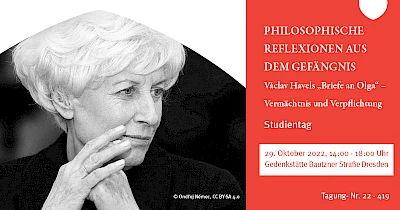 The later Czech President Václav Havel wrote exactly 165 letters to his wife Olga during the almost five years he spent in prison. These letters were not mere correspondence. Václav Havel's letters represent a legacy of European intellectual history. They are letters out of love and in a philosophical search for horizons and truth for a free society.
The later Czech President Václav Havel wrote exactly 165 letters to his wife Olga during the almost five years he spent in prison. These letters were not mere correspondence. Václav Havel's letters represent a legacy of European intellectual history. They are letters out of love and in a philosophical search for horizons and truth for a free society.
The event will take place at the Bautzner Strasse Memorial, Bautzner Strasse 112a, 01099 Dresden, from 2:00 p.m. to 6:00 p.m.
More information and registration at: https://ea-sachsen.de/veranstaltungen/philosophische-reflexionen-aus-dem-gefaengnis/
Source and photo:
Evangelical Academy of Saxony
in the Dreikönigsforum Dresden
(This is an automatic translation by Google Translator.)
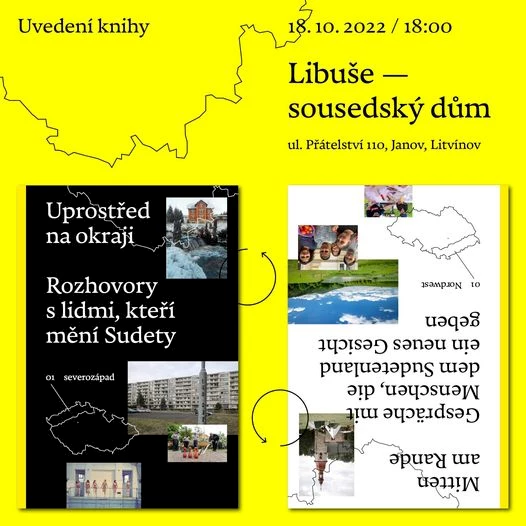 The main project result is the Czech-German publication Mitten am Rande, interviews with people who are changing the Sudetenland. The book offers 13 interviews with people who are actively contributing to a changed view of the Czech-Saxon border area.
The main project result is the Czech-German publication Mitten am Rande, interviews with people who are changing the Sudetenland. The book offers 13 interviews with people who are actively contributing to a changed view of the Czech-Saxon border area.
As part of the project, short medallions of five personalities who appear in the book were filmed. There are:
Jitka Pollakis from Erzgebirge,
Erich Vodňanský from Strann near Bleiswedel,
Alice Janstová from Jelení ,
Petr Globočník from Litvínov,
Jarmila Ptáčková Gross Schönau.

(This is an automatic translation by Google Translator.)
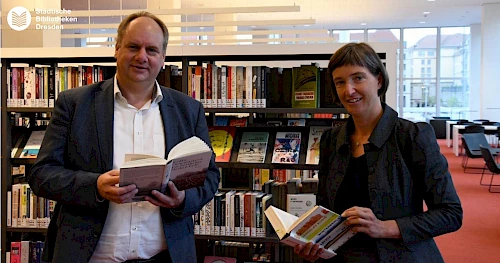
From now on, users of the Dresden libraries can also borrow Czech books in their original language. Of the 63 titles available so far, around half were handed over today as a donation from the Euroregion Elbe/Labe by the President of the Euroregion and Mayor Dirk Hilbert from Dresden. They now find themselves on their own Czech shelf. We intend to fill this up even further.
(This is an automatic translation by Google Translator.)
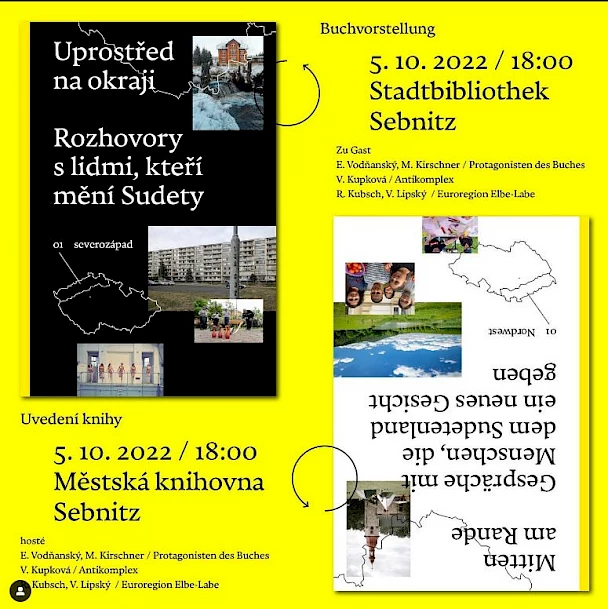 The main project result is the Czech-German publication Mitten am Rande, interviews with people who are changing the Sudetenland. The book offers 13 interviews with people who are actively contributing to a changed view of the Czech-Saxon border area.
The main project result is the Czech-German publication Mitten am Rande, interviews with people who are changing the Sudetenland. The book offers 13 interviews with people who are actively contributing to a changed view of the Czech-Saxon border area.
As part of the project, short medallions of five personalities who appear in the book were filmed. There are:
Jitka Pollakis from Erzgebirge,
Erich Vodňanský from Strann near Bleiswedel,
Alice Janstová from Jelení ,
Petr Globočník from Litvínov,
Jarmila Ptáčková from Gross Schönau.
(This is an automatic translation by Google Translator.)
Heinrich Lumpe was the founder of the Lumpepark bird sanctuary, which was located on the site of today's zoo in Ústí nad Labem.
During this event we will remember his legacy and Heinrich Lumpe himself will guide you through the sites that have survived to this day.
The event begins at 11:00 am when Mr. Lumpe arrives at the zoo and meets the current director. Together they will talk about the history and future of the zoo (also in German).
A map and information sheet in German will be available at the cash desk.
(This is an automatic translation by Google Translator.)
September 2022
Local elections were held in the Czech Republic on September 23 and 24, 2022. The turnout in the Ústí nad Labem region was 40.60%. Voter turnout in local elections has traditionally been relatively low. In the districts of the Elbe/Labe Euroregion (Litoměřice, Děčín, Ústí nad Labem, Teplice), the highest turnout was recorded in the Litoměřice district (48.21%) and the lowest in Ústí nad Labem (38.39%).
There are more than 6,250 municipalities in the Czech Republic, half of which have fewer than 500 inhabitants. Typical are large differences between larger towns (county and county towns) and smaller "rural settlements".
In smaller cities and towns, local associations of independent candidates usually won. In the larger county or district towns, parties with a national presence have been successful.
As far as general trends are concerned, it should be noted that the ANO 2011 movement in the big cities of the Ústí nad Labem region became even stronger. The Freedom and Direct Democracy party (SPD), which in many places is making its debut on municipal councils, is also among the victors.
Negotiations are currently underway to form coalitions in individual municipalities and cities. Due to legal deadlines, the first meetings of the new councils, in which new mayors and deputy mayors are elected, will take place in most municipalities within 25 days of the election.
At the same time, senate elections were held for a third of the country's senate. In the Ústí district, two candidates made it to the second round of the Senate elections that will be held on September 30 and October 1: Petr Nedvědický (Mayor of Ústí) for ANO 2011 and Martin Krsek (historian from Ústí) for SEN 21.
Detailed results of local elections can be found on the volby.cz website (only in Czech).
(This is an automatic translation by Google Translator.)
From 07.10.-08.10.2022 the trinational conference Under Pressure on the topics of right-wing populism, conspiracy myths and fake news will take place at the Goethe-Institut Dresden. The following questions will be discussed: What can countries learn from each other when it comes to civil society support for refugees? And how can democratic actors work together across borders?
In the Czech Republic, Poland and (East) Germany there are numerous parallel developments with regard to dealing with right-wing populism, conspiracy ideologies and fake news. The political public in these countries is highly polarized. The influence of anti-democratic attitudes is growing, especially in rural areas. In the context of the disputes surrounding the corona pandemic or the conflict in Ukraine, we are seeing a significant increase in conspiracy stories and targeted disinformation.
New alliances have emerged between organized right-wing extremism, right-wing populism and supporters of conspiracy ideas. At the same time, committed people support the refugees from Ukraine who arrive in Poland, the Czech Republic and Germany. All of these developments mean that democratic civil societies are moving into the focus of new undemocratic alliances and are coming under increasing pressure.
The specialist conference Under Pressure is a joint event by: Kulturbüro Sachsen eV , Bundesverband Mobileberatung eV and the Center for International Cultural Education at the Goethe-Institut Dresden in cooperation with the Friedrich-Ebert Foundation and the Foundation against Racism . Look forward to lectures, exchange, networking opportunities and discussions with numerous actors and experts, including Prof. Dr. Jens Christian Wagner, Dr. Olga Richterová and Bartosz Jozefiak.
The organizers would like to draw attention to another program highlight. Katharina Nocun will be released on Friday, October 7th, 2022 from her book “True Facts. What really helps against conspiracy narratives".
The full program can be found here .
You can register for the event here.
(This is an automatic translation by Google Translator.)
August 2022
The Euroregion Elbe/Labe is asking for offers to create an image film for the virtual chapel in Vorderzinnwald (see here ). This includes the following:
- Drone recordings in Vorderzinnwald and Fürstenau
- Fitting the 3D model of the chapel to drone images
- up to 3 short interviews
- Demonstration of the AR representation of the chapel and the altar
- Filming of the altar in the Teplice Museum
- monolingual Czech with German subtitles
- Movie length: 2 minutes
- Completion by October 15, 2022
The screenplay for the film is created by the customer in consultation with the commissioned company.
Bids must be submitted by September 4th, 2022. If you have any questions, please contact the Euroregion (see Contact ).
(This is an automatic translation by Google Translator.)
information from public authorities
The Pirna district office publishes the current situation regarding the fire on the Saxon and partly on the Czech side on the website every day. You will find the information right on the start page on the right-hand side.
To the website of the Pirna District Office
satellite imagery
The satellite images of the European Emergency Management Service provide an overview of the areas affected by the forest fire, which is updated every few days. The link below leads directly to the page for the forest fires in Bohemian-Saxon Switzerland. There it is best to click on the "200 dpi" link next to "PDF" or "JPEG" in the lower table in the rows with satellite images under "Downloadable items".
Go to the Emergency Management Service website
The current sources of fire can be roughly identified using heat maps. Zoom Earth also shows this over time.
(This is an automatic translation by Google Translator.)
July 2022
Together with the Czech partner organization ČSOP Ophidia, BUND Dresden is organizing the German-Czech Care4Nature Camp for the second time this year.
From 15th to 21st August 2022 you can travel with us to the Ore Mountains for a week and have the opportunity to learn a lot about meadow care, to discover the species-rich mountain meadows and to get involved in nature conservation in a very practical way. Together with young adults from the Czech Republic and Germany, we tackle it and, with a lot of fun and energy, we are committed to preserving biodiversity in the Ore Mountains.
What awaits you?
A varied program awaits you: the focus is on tending the mountain meadows with a scythe. Never sen? No problem: we have a scythe instructor who will support us with the traditional hand mowing. Practice all the steps of making hay and try out other biotope care measures. There are also technical contributions and excursions, and the beautiful mine grounds and their immediate surroundings are also explored every year. You can also look forward to a trip to the organic farm. There we will make cheese ourselves and enjoy delicious food. We end the evenings with games or spending time together around the campfire. Do you want to be there? Then register now until 19.07. on! We look forward to you!
Where does the camp take place?
The camp takes place on the German-Czech border in the Ore Mountains. We find accommodation in a pension in Oberwiesenthal. On our daily way to the care areas, we hike through the beautiful mine grounds with giant ferns and rare plants such as arnica, blue tarantula, fire lily and gaping monkshood. There is also time to snack on raspberries and blueberries along the way and to jump into the cool water on the way back.
The area has a long and interesting history - where mountain farmers used to graze their cattle, valuable meadows and moors were created, which have a high natural value as a cultural landscape due to their former use and are home to rare species.
The project is funded by the German-Czech Future Fund, the Heidehof Foundation and the GLS Bank.
Who's in?
The Care4Nature Camp is particularly aimed at young adults aged 16 to 27 from Germany and the Czech Republic. The number of participants is limited to 20 people. So register quickly and be there!
How much does that cost you?
This adventure costs you nothing! Participation in the camp, including travel expenses, accommodation and meals, is free of charge.
If you are interested, please send an email to naturschutz@bund-dresden.de and browse through the reports on our website.
You can register at: www.bund-dresden.de/was-wir-tun/care4nature-camp/
We are looking forward to you!
Source and contact:
BUND Dresden
Kamenzer Str. 35 | 01099 Dresden
T. 0351 27514800
https://www.bund-dresden.de/
(This is an automatic translation by Google Translator.)
The current Julischweizer is chock full of forward-looking projects by people with courage, enthusiasm and the spirit of the times.
what's new
1 Fresh from the garden straight to the table
2 The blue poppy from Helbigsdorf
3 Trara, the post is here!
4 To the insect of the year 2022
5 artificial tree cavities for biodiversity research
6 Dietrich Hasse 1933 – 2022, an obituary
7 Renovation of the Schauenstein completed
8th day of the open half-timbered house
9 New to the Landschaf(f)t Zukunft e. V
10 Silver for National Park Short Film
11 Green Theater in the Saxon Switzerland National Park
12 News from the Paddle Steamers
13 Silk Flowers for Conservation
14 A fresh breeze and new sights on a boat trip on the upper lock
15 Pirna Sculpture Summer 2022/23 – in honor of Canaletto
16 recipe of the month
17 dates and events
18 Preview
Source: Joint initiative by the Sachsenforst national park administration for Saxon Switzerland and the Landschaf(f)t Zukunft e. V
(This is an automatic translation by Google Translator.)
June 2022
In order to see the meadows in the Eastern Ore Mountains in full bloom and to preserve biodiversity, these biotopes need annual care. You contribute to the preservation of the cultural landscape of the Ore Mountains. You are actively involved in the development of the border region and have a lot of fun. On the last day of the camp we organize the German-Czech neighborhood festival in Bohemian-Zinnwald.
Spend 4 days on blooming mountain meadows and wet meadows - with the scythes, brush cutters and hand saws tending to the rocks, with pitchforks and rakes at the hay harvest.
Explore the culture and history of the border region for 3 days - we will cycle through the countryside and look for traces of human fate in nature.
(This is an automatic translation by Google Translator.)
On June 25, 2022, the Euroregion Elbe/Labe celebrated the 30th anniversary of its founding with a German-Czech cultural festival at the Mückentürmchen . This place was ideal due to its location almost on the border and the wide view of almost the entire Euroregion.
The opening of the resurrected chapel in Vorderzinnwald with the so-called Fürstenau Madonna altar started at 9 a.m. In a Euroregion project, both were made tangible in 3D using modern technology (augmented reality). Around 40 people came to the meeting point early in the morning in damp weather to try it out for the first time. Then they hiked through the former Vorderzinnwald to the mosquito tower. Luckily, the group was spared the rain, even though the clouds hung low.
The program started at 11 a.m. The guests present were welcomed by Rüdiger Kubsch, Managing Director of the Euroregion on the German side, Petr Nedvědicky, the Czech Co-President, and Manuela Förster as the German Vice-President.
Will Eifell from Ústí nad Labem and Ju von Dölzschen from Dresden entertained the guests with music on the restaurant terrace. In the St. Wolfgang Chapel, Renata Bulvová, Radek Fridrich, Milan Hrabal, Uwe Kolbe and Michael Zschech offered various insights into their literary work. The Pohadlo Theater performed two performances for the children and did handicrafts with them. Thomas Preibisch invited to the potato print, the result of which will adorn the Euroregion's office. Painter Naďa Hoštová introduced plein-air painting, landscape artists from JT Landartrio created an installation next to the cemetery.
In the anteroom of the restaurant, visitors could find out about places that had disappeared in the border area and go on a guided tour through the former towns of Ebersdorf (Habartice) and Vorderzinnwald (Přední Cínovec) in search of traces. Three tours were offered in the Starý Martin tunnel, a little below the mosquito tower.
Unfortunately, the weather was not so kind to the Euroregion. It was raining the night before and the morning of the festival, and the sun didn't come out until the afternoon. As a result, the number of guests who didn't come specifically for the anniversary celebration was significantly lower than expected. Nevertheless, according to a rough estimate, around 500 people were at the mosquito tower during the day.
We would like to thank all the artistic participants, the expert guides of the excursions and Mr. Stifter from the Mückentürmchen for their commitment and good cooperation. The event was funded from the small projects fund in the Euroregion Elbe/Labe.
A report with many photos can be found here .
(This is an automatic translation by Google Translator.)
U příležitosti oslav 30 let EEL dne 25.6. 2022 on Komáří vížce byla veřejnosti představena česko-německá publicace Historický atlas Euroregionu Elbe/Labe.
Na 128 stranách se prezentuje výběr nejzajímavějších starých map s územím dnešního EEL.
(This is an automatic translation by Google Translator.)
CZECH SEASON - Opening of the outdoor exhibition "Relocated"
Georg-Treu-Platz — Dresden State Art Collections
"Relocated". Czech season in Dresden
On June 24th the Czech Season will open and at the same time its first part, the outdoor exhibition "Relocated". The sculptural installations in public space feature works by Čestmír Suška, František Skála, Michal Gabriel, Milena Dopitová, David Černý, Krištof Kintera and Jakub Nepraš.
Program:
1:00 p.m. Start of ceremony
14:00 Performance Circus Mlejn
14:30 Concert Ivan Hlas Trio
- Break -
19:00 Concert MYDY
20:50 Performance Circus Mlejn
Food and drinks can be purchased on site.
More on this on the website of the Dresden State Art Collections .
(This is an automatic translation by Google Translator.)
The Großsedlitz Baroque Garden (more precisely the State Palaces, Castles and Gardens of Saxony non-profit GmbH) is looking for an employee for the visitor service. The position is temporary as part of a sick leave cover. The application period ends on
07/08/2022 .
Knowledge of Czech is expressly desired for the job.
All further information and the link for an online application can be found at https://werbung.sbg-intern.de/arbeiter-wmd-im-Besucherservice-de-j98.html .
(This is an automatic translation by Google Translator.)
May 2022
Author reading and discussion
Czech Republic selected : Jiří Hájíček - vignettes with a sailing ship
Marie, a divorced 47-year-old literature professor, is spending her summer vacation in Český Krumlov in her sister's nearly empty apartment. As she strolls through the streets in the stream of tourists, she meets the young bookseller Filip. Their budding romance has something of the atmosphere of a hot July day and is reminiscent of literary models. Marie had chosen the city mainly because she hoped to be able to improve her relationship with her sister and her old and sick parents and to take care of her own loneliness. Because she is in a life crisis: memories of the past overwhelm her, and the prospect of approaching old age is not pleasant either. The literary scholar recapitulates what was and considers how she wants to live in the future and what she can expect from a "Shakespearean love".
Jiří Hájíček (born in České Budějovice) is one of the outstanding Czech authors of our time. He has received numerous high awards for his novels, all of which are set in the South Bohemian countryside. In Dresden he presents his book "Vignettes with a Sailing Ship" (Plachetnice na vinětách).
Translated from the Czech by Kristina Kallert.
When: June 15, 2022, 7 p.m
Where: Library Dresden-Südvorstadt , Münchner Platz 2, 01187 Dresden, Telephone: 0351 - 471 34 26
Admission free
Moderation and interpreting: Jana Krötzsch
A cooperation of: Euroregion Elbe/Labe, Municipal Libraries Dresden, Czech Center Berlin and Czech Literature Center (ČLC). Under the patronage of the Consul General of the Czech Republic in Dresden JUDr. Marketa Meissnerova.
For many years, the Sorbian National Ensemble with orchestra, ballet and choir has been developing a unique thematic gala program year after year, which is enriched by renowned guest artists. In addition to a special gastronomic offer, the atmospheric summer evening is rounded off on a weekend at the beginning of July with musical and dancing highlights for the several hundred visitors per evening.
After the successful "Argentinian Nights" in 2019 and "Napoléon & the Agent" in 2021, the "Czech Nights" on July 1 and 2, 2022 - thanks to the friendly support of the Cultural Foundation of the Free State of Saxony - promise a new highlight in a long series of country-specific music festivals -evenings to be.
(This is an automatic translation by Google Translator.)
This edition of the Swiss Sandstone was published under the motto "Appreciation is the trapeze in the art of communication".
what's new
1 Königstein Fortress – living history with a panoramic view
2 Environment Minister Günther presents a report on the development of the Saxon Switzerland National Park region
3 Regional development in practice and on site
4 For the protection of nature: Temporary Boofen ban comes into force
5 reinforcements for the National Park Guard
6 Training of the helpers of the nature conservation warden
7 Shelter rethought
8 mobility modules to solve the traffic challenge in Saxon Switzerland
9 New member in the network Good things from here.
10 Presentation of the LEADER funding strategy 2023 - 2027 (LES)
11 Science pioneer Prof. Dr. Otto Beyer
12 New FahrradBUS trailers take bicycles and e-bikes with them
13 Pirna lives #Canaletto300
14 recipe of the month
15 dates and events
16 24th Sellnitz Festival | June 12, 2022, 11 a.m. – 6 p.m
Source: Joint initiative by the Sachsenforst national park administration for Saxon Switzerland and the Landschaf(f)t Zukunft e. V
(This is an automatic translation by Google Translator.)
Cestování po Německu bude v létě levnější: Ve čtvrtek schválil Spolkový sněm, že zlevní na tři měsíce nejen tankování benzinu, at tím i jízdu autem, ale take jízdu autobusem a vlakem. Následně Spolková rada 20.5. v pátek odhlasovala financování jízdenku za devět eur.
Podle plánů SPD, Zelených a FDP budou v červnu, červenci a srpnu k dispozici měsíční jízdenky v ceně devět eur, které umožní využívat všechny autobusy a vlaky v místní a regionální dopravě v celém Německu.
Podle zákona schvaleného Spolkovým sněmem má ztrátu příjmů kompenzovat spolková vláda. Plánovaná dotace je ve výši 2.5 billion euros.
(This is an automatic translation by Google Translator.)
How the crisis in the East saved European identity
Open Europe has created a new generation of immigrants. Academics, professionals, artists - successful Europeans.
They are envied by many. They no longer do the dirty work. They therefore see themselves neither as guests nor as workers - they feel as citizens of Europe. Of course they want to belong everywhere, but they also want to leave if they like it better somewhere else.
But what is behind the facades of the successful EU academics? How do they deal with long-distance relationships, loneliness, or expectations of gratitude and loyalty? Can they share their sorrows with those close to them? Or has the topic become a taboo that is not talked about?
And what does all this have to do with European identity?
The documentary, physical theater piece looks behind the scenes of freedom of movement and success.
The production was funded by the festival "The frame is the program" and "Ran an die Arbeit!", the German-Czech Future Fund, the Federal Association of Socio-Culture and the Cultural Foundation of the Free State of Saxony. This measure is co-financed by taxes on the basis of the budget approved by the members of the Saxon state parliament.
(This is an automatic translation by Google Translator.)
The KG Euroregion is currently carrying out a project for the virtual resurrection of the former chapel in Vorderzinnwald as well as the Madonna altar inside. Both 3D models have been created and now need to be published using WebAR. We are asking for offers for this. We will gladly send you the exact conditions on request. The bids are to be submitted by 02.06.2022. The service must be completed by 23.06.2022.
5TH INTERNATIONAL ELBE DOCK FESTIVAL IN DRESDEN
From 20.-21. May the 5th international film festival ELBE DOCK takes place in the GEH8. Everything revolves around the question "Quo vadis?", which deals with the development of the regions on both sides of the German-Czech. border busy. The competition focuses on films by students as well as debut and second films by filmmakers from Central Europe. A German-Czech Expert jury awards the ELBE DOCK AWARD to the winner of the competition.
In addition, there is a varied supporting program with panel discussions, a networking workshop, a tour of the central work and a concert by the Czech musician Jakub König.
More information is available here:
--> Program: https://elbedock.cz/en/
--> Tickets: https://goout.net/de/elbe-dock-2022/szoylos/
--> Festival passes: https://goout.net/de/tickets/elbe-dock-2022-akreditace/fakn/
--> Facebook event: https://www.facebook.com/events/1384967622002411
(This is an automatic translation by Google Translator.)
Cordial invitation to the book lounge and double vernissage in the riesa efau on Friday, May 20th, 2022, 8 p.m .:
In the Round Corner , Libuše Jarcovjáková and Lucie Cerna present the freshly printed catalog "If you go home, pick me up". Works by the exceptional Prague photographer Libuše Jarcovjáková can be seen in Dresden for the first time and on this evening you also have the opportunity to get to know the artist and curator personally (the exhibition ends on May 27).
The engine hall presents the exhibition "Speed Dating" . 40 painterly encounters between the students and graduates of the Dresden University of Fine Arts and the Nina Childress studio at the Beaux-Arts in Paris.
In addition, the gallery Adlergasse opens the exhibition "Cast Pictures from the Caste Republic VII" with works by Sándor Dóró.
(This is an automatic translation by Google Translator.)
Would you like to learn how to present a (favourite) place in an exciting and to the point way? Or are you a teacher, nature guide, volunteer or active in the Ore Mountains? Then join us!
The course is open to everyone who is interested in getting to know the basics of nature and culture interpretation using the example of the cultural landscape of the Eastern Erzgebirge and in taking part in German-Czech encounters. We will move in the German-Czech border region, get to know the abandoned village of Vorderzinnwald and the mountain meadow landscape around Altenberg. You become part of the interpretation process yourself, by mastering a group task (TeamWork) and by doing practical nature maintenance work (scything and raking a meadow, ie WorkOut).
Knowledge of the Czech language is not a prerequisite for participation: openness and language mediators will ensure understanding! All lectures will be interpreted.
Call for papers! Wanted: concepts of Czech and German artists, who will produce work on the theme of „We have no formula“ from October 14 to 23 2022 at riesa efau in Dresden. The results of this symposium will be presented in the showroom „Runde Ecke“, opening 22 October 2022.
For more information please contact Sylvia.Angele@riesa-efau.de or Lenka Holiková, kc.rehlovice@gmail.com.
For further information: www.riesa-efau.de and www.kcrehlo.cz.
The project has been sponsored by the German-Czech-Future Fond, the State of Saxony, and the Saxon State Capital of Dresden, Bureau of Culture and Monument Preservation.
The German-Czech Youth Exchange Coordination Center – Tandem Pilsen is looking for a volunteer for the ahoj.info project on September 1st, 2022 for a stay abroad as part of the European Solidarity Corps until August 31st, 2023.
In parallel, Tandem Regensburg is looking for a volunteer residing in the Czech Republic for the project. The voluntary service is carried out within the framework of the European Solidarity Corps (formerly Erasmus+ / European Voluntary Service).
Further information on the framework conditions and the application can be found in the advertisements:
Announcement for tandem in Pilsen (German)
Advertisement for tandem in Regensburg (Czech)
The application deadline for both volunteer positions at Tandem is May 31, 2022.
(This is an automatic translation by Google Translator.)
The sales exhibition by Ukrainian artist Igor Iščuk will take place in a small Dresden gallery from May 10 to September 30, 2022.
The vernissage will take place on May 21st at 7 p.m. For more information, see:
https://galerie-art-erlebnis.de/index.php/de/raeume/aktuelles2
(This is an automatic translation by Google Translator.)
KG Euroregion is asking for offers for the following services on June 25, 2022:
- Rental of 12 beer tables and 24 beer benches
- Rental of 4 tents: 2 pieces 4m x 6m, 2 pieces 3m x 3m
The objects are to be transported to and from the mosquito tower (Komáří vížka) and set up and dismantled independently. You must be ready for action from 11am to 4pm.
Please address your offers to the municipal community Euroregion OE/OE eV (address see contact ) and send them by email to the address info@elbelabe.eu . We are happy to answer any questions you may have (see Contact ).
(This is an automatic translation by Google Translator.)
The Euroregion Elbe/Labe is asking for offers for the following artistic performances on June 25, 2022 between 11 a.m. and 4 p.m.:
- Music performance on the terrace of the mosquito tower; 3 rounds of 45 minutes each
- Theater performance for children (puppet theatre, children's theater or similar); 3 rounds of 45 minutes each in a tent on a meadow
- Reading together with other artists in the St-Wolfgangs-Kapelle; 3 rounds of 30 minutes each; content related to the respective neighboring country is necessary
We are looking for artists from Saxony and the Czech Republic. All artistic performances must be able to be experienced by both German and Czech-speaking audiences without language barriers. Further details will be determined in consultation with KG Euroregion (see Contact ).
Please address your offers to the municipal community Euroregion OE/OE eV (address see contact ) and send them by email to the address info@elbelabe.eu .
(This is an automatic translation by Google Translator.)
The Euroregion Elbe/Labe is asking for offers for the following bus transport services on June 25, 2022:
1. Transport with 3 buses, each with at least 40 seats, from Dresden, An der Kreuzkirche 6, to the Mückentürmchen;
A stopover in Dippoldiswalde to accommodate further passengers is to be planned.
The route has to go via Zinnwald, as a stopover is to be made at the former village of Vorderzinnwald (coord. 50.728838, 13.813742) in order to let some passengers disembark there.
Departure at 8 a.m
2. Transport between Mückentürmchen and Habartice (coord. 50.7223125, 13.88041222) by bus at 12 noon; wait there for approx. 1 hour, then transport back to the mosquito tower
3. Bus shuttle between Mückentürmchen and Hst. Zinnwald/Wendeplatz at 2 p.m. and 4 p.m. with one bus each (which returns)
4. Transport between Mückentürmchen and the former village of Vorderzinnwald (coord. 50.728838, 13.813742) by bus at 2.30 p.m. (to turn around you may have to continue to Cinovec)
5. Return transport of guests from the Mückentürmchen to Dresden at 3 p.m., 5 p.m. and 6 p.m. with one bus each
Please send your offers to the address info@elbelabe.eu . We are happy to answer any questions you may have (see Contact ).
(This is an automatic translation by Google Translator.)
KG Euroregion would like to receive offers for the following printing services:
- printing of 9 banners
- weatherproof mesh material
- size: 2m x 2m
- 4/0-color
- delivery until 20.06.2022
Please send your offers to the address info@elbelabe.eu . We are happy to answer any questions you may have (see contact ).
April 2022
 The 25th International Dresden Summer Academy for Fine Arts will take place from July 24 to August 6, 2022. Young artists up to the age of 35 are invited.
The 25th International Dresden Summer Academy for Fine Arts will take place from July 24 to August 6, 2022. Young artists up to the age of 35 are invited.
Scholarships will be awarded for participation. These include travel expenses and the participation fee for a course. Accommodation costs are also financed for participants from the Czech Republic and Poland.
The application deadline is June 12, 2022.
More information in the info flyer and at https://riesa-efau.de/kunst-erfahren/internationale-dresdner-sommerakademie/kursprogramm/ .
(This is an automatic translation by Google Translator.)
The Euroregion is looking for a freelancer to research excursion destinations in the region and enter them on the Euroregion's website. The excursion destinations should be on both sides of the border and the entries should be made in German and Czech. The work is remunerated on the basis of a fee agreement.
If you are interested in taking on such a task for us, please contact us (see contact ).
(This is an automatic translation by Google Translator.)
Debatujeme spolu o společných tematech
Abychom ukázali témata v jejich kontroverznosti, vyvinuli jsme v Aktion Bürgercourage eV v únoru 2021 new format akcí, který jsme nazvali "Debatujeme kurážně odvážně". Tento formát si klade za cíl představit široké spektrum rozmanitých argumentů k danému tématu a přispět tak k tomu, aby si člověk mohl vytvořit fundovaný názor, a zároveň podnítit aktivní zapojení publika.
Česko-německé debaty se sousedy představují v rámci tohoto formátu vlastní řadu a mají význam pro další mezinárodní a sousedské sbližování obou stran. Česko-německé vztahy jsou úzce provázány av mnohém ohledu již mohou být příkladem soudržnosti dvou sousedních států. Přesto obě země v našem globalizovaném světě často stojí před výzvami, které samy nemohou zvládnout – v aktuálních krizích a vzhledem k válce na Ukrajině to platí více než kdy jindy. Řada debat se koná v cooperaci s euroregionem Elbe/Labe.

(This is an automatic translation by Google Translator.)
The culture pass of the Euroregion Elbe/Labe grants holders reduced admission to a number of museums and other institutions in Saxony. It is only sold in the Czech Republic.
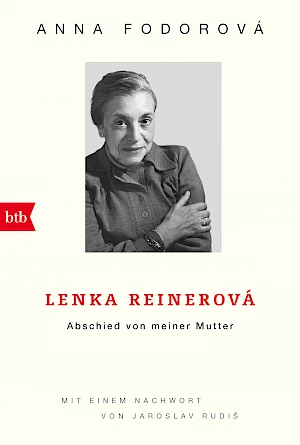 Translated from Czech by Christina Frankenberg
Translated from Czech by Christina Frankenberg
When: April 28, 2022, 7:30 p.m
Where: Central Library in the Kulturpalast Dresden
Admission: free, registration required at central library@bibo-dresden.de
Lenka Reinerová was the last German-speaking author in Prague, the great lady of German-Czech literature, Jewish, and she survived them all until her death in Prague in 2008: Anna Seghers, Egon Erwin Kisch, Max Brod. She fled from the Nazis via Paris, Marseille and Casablanca to Mexico City, after her return she was imprisoned in Czechoslovakia as part of the Stalinist purges – without a doubt, Lenka Reinerová lived one of the most moving biographies of the past century.
In her book, which is as poetic as it is personal, her daughter Anna Fodorová, who now lives in London as a psychotherapist, bids farewell to her famous mother. It is the story of Lenka Reinerová's final years, it is a new encounter with the great lady of German-Czech literature, and it is a grown-up daughter's view of life with her mother - personal, poetic and deeply touching.
A cooperation of: Euroregion Elbe/Labe, Municipal Libraries Dresden, Czech Center Berlin and Czech Literature Center (ČLC). Under the patronage of the Consul General of the Czech Republic in Dresden JUDr. Marketa Meissnerova.
With a book table from Buchers Best
(This is an automatic translation by Google Translator.)
what's new
1 experience – boat trip on the Elbe
2 Start of the 2022 summer season with bus - ferry - Kirnitzschtalbahn
3 From carrot beds to fortress forest – new special exhibition at Königstein Fortress
4 Congratulations, Yellowstone!
5 30 years of landscape maintenance with black "Scots" in Saxony's only national park
6 Emergency aid for Ukrainian protected areas
7 Kahn Ahoy! The Obere Schleuse in Hinterhermsdorf starts the season
8 The Gottleubatal Panoramaweg
9 Landgasthof Ziegelscheune in Krippen – tradition for the love of hospitality
10 Mowing for Biodiversity
11 The most beautiful and fastest planting ever!
12 Tourism Round Table – Presentation of the “Dynamic Traffic and Parking Guidance System” concept
13 Explore the Kirnitzsch Valley and the panorama villages with the hiking buses
14 A good example of sustained perseverance and good timing!
15 recipe of the month
16 appointments and events
Newsletter for download
Source: Joint initiative by the Sachsenforst state enterprise, Saxon Switzerland National Park Administration and the Landschaf(f)t Zukunft e. V
(This is an automatic translation by Google Translator.)
In this video, the State Office for Early Neighborhood Language Education explains the possibilities of partnerships between daycare centers in Saxony, the Czech Republic and Poland.
(This is an automatic translation by Google Translator.)
March 2022
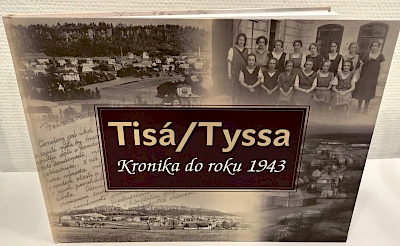 The municipality of Tisá together with the Euroregion Elbe/Labe (and funded by the EU) published the chronicle of Tisá until 1943 in autumn 2021. This is now available in some free copies at the Euroregion offices in Dresden and in Ústí.
The municipality of Tisá together with the Euroregion Elbe/Labe (and funded by the EU) published the chronicle of Tisá until 1943 in autumn 2021. This is now available in some free copies at the Euroregion offices in Dresden and in Ústí.
The chronicle proper does not begin until after the founding of Czechoslovakia, but the first chapters present a detailed review of the history of the village since the Middle Ages. Of particular interest, however, are the contemporary descriptions of the 1920s and 1930s, which give a good insight into the life and views of the people of that time.
The chronicle was kept until 1943. There is another booklet covering the years 1945/1946, but only in Czech. This is also available from the Euroregion.
If you are interested, please contact the respective Euroregion office (see Contact) and arrange to pick up the book.
Translated with www.DeepL.com/Translator (free version)
This issue has a special theme: our sustainability for a more climate-friendly future. How can everyone plan sustainable steps in everyday life?
From the content:
- We ask Barbara & Andreas Motz, owners of the Brückenschänke in Sebnitz
- What motivates young people to become fish farmers?
- "Please don't complain"
- Pirna is arming itself against the consequences of climate change
- Mobile guest card: free public transport for overnight guests
- Felsenbühne Festival 2022 in the spa town of Rathen - the green theatre
- Sustainability in the Saxon Switzerland National Park Center in Bad Schandau
- Thoughtful times – where do we draw our strength from?
- The new sustainability manager in tourism introduces herself
- Shaping tourism together – with heart and mind!
- Tourism with a future
- Naked and unpacked - the new unpacked shop in Neustadt
- The LEADER region "Saxon Switzerland" is drafting its plan for 2023 - 2027
- recipe of the month
- A new start for the market hustle and bustle on Saturdays in Pirna
- Sustainability week Saxon Switzerland
Source: Joint initiative by the Sachsenforst state enterprise, Saxon Switzerland National Park Administration and the Landschaf(f)t Zukunft e. V
(This is an automatic translation by Google Translator.)
Today the members of the local steering committee met for the last time as part of the ongoing small projects fund in Děčín Castle to decide on the funding of 7 Saxon and 5 Czech projects. All project applications were approved unanimously. The funding volume for the approved projects totals EUR 158,586.76.
Some projects - especially on the Czech side - have to wait on a waiting list so that funds that are still committed from ongoing projects are not being used in order to receive their funding. However, it can be assumed that ultimately all projects can actually be supported.
to the list of approved projects
(This is an automatic translation by Google Translator.)
Due to the lower probability of suffering a severe COVID disease from the omicron variant, the Robert Koch Institute today removed all countries from the list of risk areas. This eliminates the obligation to register for entry electronically and to quarantine. Only the 3G proof must still be carried.
on the Corona regulations in Saxony and the Czech Republic
(This is an automatic translation by Google Translator.)
Our European continent has already experienced too many wars in the past that have left generations scarred. The process of European and cross-border integration is therefore essential for promoting peace and security and respecting fundamental rights and freedoms.
The Executive Committee of the Association of European Border Regions condemns the invasion of Ukrainian territory by the armed forces of the Russian Federation. Determining the borders by means of war does not belong into the 21st Century, and falls apart from AEBR expectations from Russia, as declared in our Annual Conference in Kursk (close to the Russian-Ukrainian border) on 21 September 2011: good practices in cross-border cooperation and neighbourhood.
We also support the measures taken by the institutions of the European Union and international organisations to protect the Ukrainian population, regions and cities, the respect to the Rule of Law and the international obligations deriving from treaties, as well as the interests of the Union.
AEBR Executive Committee calls on the Russian Federation to respect Ukraine's state integrity and sovereignty and its existing territorial borders. It, therefore, calls to cease its military actions against Ukraine immediately, withdraw its troops from Ukraine and return to a peaceful diplomatic solution. Similarly, Russia must immediately withdraw the recognition of the so-called 'People's Republics' Donetsk and Luhansk, which is contrary to international law.
In Arnhem, Basel, Berlin, Bruges, Brussels, Cottbus, Drama, Dresden, Eupen, Évora, Freyung, Gronau, Groningen, Guben, Hamar, Joensuu, Lappeenranta, Liberec, Linz, Maastricht, Mérida, Salzburg, Santiago de Compostela, Sevilla, Strasbourg, Szczecin, Vaasa, Winterswijk, Xanthi and other locations all over Europe.
Online AEBR Executive Committee meeting, 25 February 2022
see: https://www.aebr.eu/resolution-aebrwithukraine/
February 2022
January 2022
Here is the announcement of the future fund for the new program "A year at the border" :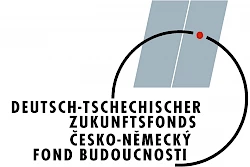
The German-Czech border region plays a key role for mutual relations and thus also for the future fund, as it offers people from both countries the opportunity to get in touch with each other over short distances, to meet each other directly and to learn from each other. Many people and organizations along the border are already actively shaping the German-Czech neighborhood. Nevertheless, we believe that there is still hidden potential for cooperation and partnership to be discovered and used.
On the occasion of the 25th anniversary of the German-Czech Declaration, the Future Fund is launching the One Year at the Border program for the year 2022/23 with the aim of strengthening local German-Czech neighborliness and thus contributing to the development of a lively border region. A total of eight Germans and Czechs will be active on both sides of the border in the various border regions: They will sound out and evaluate potential for encounters and cooperation, arrange offers and contacts and help to set up joint projects - wherever German and Czech partners need support, the bilingual enablers will lend a helping hand.
To participate in this program, by May 1st, 2022
Enthusiasts and creators (m/f)
searched.
The area of responsibility includes in particular:
- Discovering and using the potential for encounters, cooperation and partnership in the border region
- Gaining new target groups for German-Czech project work
- Renewal and strengthening of German-Czech cooperation in the border region
- Networking of German and Czech partners on both sides of the border
- Support in the implementation of joint cross-border projects
What you should bring with you:
- Interest and relation to German-Czech topics
- Active language skills CZ/DE (mother tongue / foreign language at least B2)
- Very good communication skills and open demeanor
- Place of residence in the German-Czech border region is an advantage
- Independent planning and action, organizational skills, ability to work in a team, as well as flexible working hours and willingness to travel
- Driving license class B and own car an advantage
- Good IT-Skills
What you can look forward to:
- An interesting and varied job with room for creativity
- Opportunity for independent project development (with your own budget)
- Scope of work 20h/week, duration 12 months, adequate payment
- Provision of a laptop and assumption of telephone and travel expenses
- Monitoring and regular evaluation by employees of the fund
Please send your meaningful documents with a letter of motivation, curriculum vitae, proof of language skills and certificates to Ms. Helena Vaňková (helena.vankova@fb.cz) by February 28th, 2022.
Please name at least two of the regions listed below in which you would like to work:
- Upper Lusatia - Liberecko
- Elbe Valley - Ústecko
- Eastern Ore Mountains - východní Krušnohoří
- Western Ore Mountains - západní Krušnohoří
- Upper Franconia - Chebsko
- Upper Palatinate - Domažlicko
- Northern Lower Bavaria - západní Šumava
- Southern Lower Bavaria - východní Šumava
Contact:
Helena Vankova
helena.vankova@fb.cz
+420 283 850 512
+420 605 028 151 (mobile)
(This is an automatic translation by Google Translator.)
December 2021
This film was made by the Joint Secretariat of the Saxony-Czech Republic 2014-2020 cooperation program in order to illustrate the results of the cooperation on the basis of several projects.
(This is an automatic translation by Google Translator.)
On December 23rd the Czech government has issued a new regulation on entry to the Czech Republic, which will apply from December 27th, 2021.
On the one hand, this means that people who have been vaccinated twice must show a negative PCR test. The only exceptions are people with a booster vaccination and children. In some cases, an antigen test is sufficient.
On the other hand, small border traffic will be suspended from December 30th, 2021 to January 1st, 2022. During those three days the same rules apply to short trips to the Czech Republic as to longer visits.
Cross-border commuters are not affected by these new regulations.
This 141st edition is the conclusion of twelve more Swiss people of the year, with events from the region:
1 On a digital round of visits to the national park partners
2 Clearing of hiking trails in the national park
3 Halloween and the end of the pumpkin season
4 kick-off meeting "Food vending machines in the Saxon Switzerland National Park region"
5 About the eagle owl that didn't want to fly
6 It's 10! 7 Full steam ahead against
7 Full steam ahead against grafitti
8 Three wolf pups in the Bohemian Switzerland National Park
9 Flying trees - traffic safety with a helicopter in the Kirnitzschklamm
10 Producer database “Good things from here.” Is getting a makeover.
11 Start of the new LEADER development strategy 2023 - 2027
12 Gold for Pirna - Sandstone City receives European Energy Gold Award for exemplary climate protection
13 The last Käferbus - let nature be nature!
14 recipe of the month
15 Donation to the Friends' Association
16 Train traffic
Source: Joint initiative of Staatsbetrieb Sachsenforst National Park Administration Saxon Switzerland and Association Landschaf (f) t Zukunft e. V.
|
|
(This is an automatic translation by Google Translator.)
November 2021
In an online meeting, the local steering committee for the small project fund in the Euroregion Elbe/Labe aprroved 5 Saxon and 4 Czech project applications. These include a total funding volume of 115,183.01 euros.
To the overview of the approved projects
The funds on the Czech side are formally exhausted, on the Saxon side € 32,854.70 are still available. In both cases, however, it is to be expected that further means will be available, since not all current projects will fully use their approved funding.
In January 2022 there will be one last opportunity to submit applications to the small project fund. The projects must be finished by the end of October 2022 and then settled within 2 months.
In the Czech-German border region, cross-border hiking, shopping and doing sports as well as mutual visits have fortunately become part of everyday life in cross-border relationships. The format Couragiert debattiert - Neighborhood Talks is dedicated to this friendship and offers bilingual conversation and discussion formats on current topics in order to continuously strengthen Czech-German relations.
But what about the cross-border medical care of patients? The next edition of the format on November 25, 2021, 7:00 p.m.
What happens if the nearest hospital is across the border after an accident? What special challenge does the border region have to face? Aside from communication difficulties, what are the greatest common challenges? How can both countries and the Czech-German border region strengthen and expand medical (emergency) care together? What is needed for well-functioning basic medical care in the Euroregion?
A Czech-German panel with the following experts will deal with these and other questions:
- Dr. Bernd Brenner, specialist in anesthesiology and emergency medicine, medical director of rescue services in the Görlitz district
- Petr Severa, Head of the Health Care Unit, Ústi District Office
- Pavel Šebesta Head of the Medical Control Center of the Rescue Service of the Ústí n. L. District
The evening will be moderated by Markéta Knoppik, specialist at Aktion Civil Courage e. V., the competence center for communal political education and advice in Saxony. The event is bilingual. Simultaneous translation into both Czech and German has been set up.
participation
Participation in the conversation takes place digitally via the Zoom video platform under the following link: https://aktion-zivilcourage-de.zoom.us/j/87679116448
Meeting ID: 876 7911 6448
If you have any questions about the project or the evening of debate, Markéta Knoppik is available at: m.knoppik@aktion-zivilcourage.de and Andreas Tietze at a.tietze@aktion-zivilcourage.de and 03501 460882.

(This is an automatic translation by Google Translator.)
What's new in the Saxon Switzerland National Park?
• Schmilka winter village
• Schmidt country bakery
• "Wool bloom" gives the sheep wool
• The National Park Guard has a new head
• The story of the "ball tree"
• Species-rich meadows awarded at the Mountain Meadow Festival
• With special technology against impassable paths
• Competence network for tourism mobility
• Saxon Switzerland tourism model
• Press release from SIB Stadtradeln und Fahrradgarage
• Wild boar with oven pumpkin
• Dates and events
Source: Joint initiative of Staatsbetrieb Sachsenforst National Park Administration Saxon Switzerland and Association Landschaf (f) t Zukunft e. V.
(This is an automatic translation by Google Translator.)
The exhibition on the about 800-year history of the German-speaking population in the Bohemian countries, implemented by the Collegium Bohemicum in the Municipal Museum Ústí nad Labem, will be officially opened on November 17th, 2021, and can be visited from November 18th by the public.
If you are on Facebook, you can see a few recent photos of the exhibition in a post from the Collegium Bohemicum.
Invitation of the Saxon State Ministry of Justice and for Democracy, Europe and Equality:
As the Saxon State Ministry of Justice and for Democracy, Europe and Equality (SMJusDEG), we want to actively participate in the future process of the EU. That is why we are launching a cross-border dialogue. On 10 and 11 December 2021, about 100 citizens from Saxony, Lower Silesia, Karlovy Vary Region, Ústí Region, Grand Est (France) and Baden-Württemberg (Germany) will meet at the 6-Regions Dialogue. Here they debate about living together in the border regions and share their experiences.
All citizens from the participating regions can take part. We would be particularly pleased if the participants of the trinational dialogue "Seams of Europe: Border Regions in Dialogue" were to take part once again and bring the ideas they found there to this six-region dialogue.
Invitation from the Saxon State Ministry of Justice and Democracy, Europe and Equality:
As the Saxon State Ministry of Justice and for Democracy, Europe and Equality (SMJusDEG), we want to actively participate in the future process of the EU. That is why we are starting a cross-border dialogue. The tri-national youth forum in Görlitz kicked off this dialogue process at the beginning of October.
We now invite you to take part in a dialogue with citizens from Saxony, Lower Silesia (Poland), the Karlovy Vary region, the Ústí region (Czech Republic), Grand Est (France) and Baden-Württemberg. This dialogue takes place in three events.
The geographical location of the Free State of Saxony in the triangle between Germany, Poland and the Czech Republic offers the best conditions for cross-border dialogue formats. We want to listen to the border regions and find out what is particularly important to you as citizens in relation to the European Union. Where do you see the greatest challenges? Is it climate change? Is it the desire for more direct democracy? Or something completely different?
We would like to ask you how closely you feel connected to the European Union. Could you envision European citizenship? Should the regions have a greater say at European level? Should EU citizens aged 16 and over be able to vote? What about respect for human rights in the EU?
Through the exchange, we want to collect your ideas for future coexistence in the border regions in the east and west of the European Union and together make a contribution to the future of Europe.
NOTE: The follow-up event will take place as a six-region dialogue with the participation of Baden-Württemberg (DEU) and Grand Est (FRA) on December 10-11, 2021 (Fridays from 6 p.m. to 9 p.m. and Saturdays from 9 a.m. to 3.30 p.m.) as Online event. Please make a note of this date in advance! Here is the link to register for the six-region dialogue: https://mithaben.sachsen.de/1026874
(This is an automatic translation by Google Translator.)
October 2021
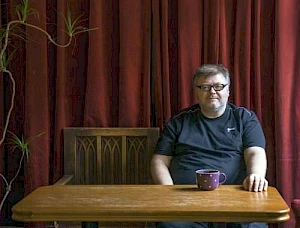 Petr Stančík and Iris Milde present his exciting story from the Second World War: a man with steel springs on his shoes, who can jump unusually far and high, uses his skills to sabotage the German war economy. A resistance fighter and an elusive ghost above the rooftops of Prague at night. He was also involved in the assassination attempt on Reinhard Heydrich, Hitler's husband in the Protectorate of Bohemia and Moravia. The name of the mysterious hero is Franz Pérák - the jump man. In the novel, he falls in love with the beautiful resistance fighter Jitka, who fights with him against the occupiers. At the same time he tries to solve the riddle of his own identity. So who is Pérák, the superhero from Prague? The answer that Petr Stančík offers is beyond imagination
Petr Stančík and Iris Milde present his exciting story from the Second World War: a man with steel springs on his shoes, who can jump unusually far and high, uses his skills to sabotage the German war economy. A resistance fighter and an elusive ghost above the rooftops of Prague at night. He was also involved in the assassination attempt on Reinhard Heydrich, Hitler's husband in the Protectorate of Bohemia and Moravia. The name of the mysterious hero is Franz Pérák - the jump man. In the novel, he falls in love with the beautiful resistance fighter Jitka, who fights with him against the occupiers. At the same time he tries to solve the riddle of his own identity. So who is Pérák, the superhero from Prague? The answer that Petr Stančík offers is beyond imagination  power.
power.
The writer, poet and playwright Petr Stančík (1968) delights readers in his diverse work with a mixture of facts, mysticism, humor and unbridled imagination. For his novel The Mummy Mill (Mlýn na mumie), published in 2014, Stančík received the Czech Republic's most prestigious literary prize Magnesia Litera. The bestseller has so far been translated into five languages. His sci-fi adventure for young readers H2O and the secret water mission was awarded the Golden Ribbon for best children's literature.
A cooperation between: Euroregion Elbe / Labe, Dresden City Libraries, Czech Literature Center (ČLC) and Czech Center Berlin.
Under the auspices of the Consul General of the Czech Republic in Dresden JUDr. Markéta Meissnerová.
With the kind support of edition Clandestin.
(This is an automatic translation by Google Translator.)
At the end of the awarding of the 13th Dresden Poetry Prize, the specialist jury will read their texts in the Erich Kästner House for Literature (Antonstrasse 1, 01097 Dresden).
In order to do justice to the numerous facets and varieties of poetry when awarding the prize, which is awarded every two years by the state capital Dresden, the main jury is made up of versatile poets and literary scholars in German and Czech. In 1998, Petr Hruška was the winner of the Dresden Poetry Prize and, in addition to his poetic work, works as a literary scholar. Anja Utler also works in the literary and literary fields. She is particularly dedicated to the performative aspect of texts. With Radka Denemarková and Nico Bleutge, two multiple award-winning authors complete (t) the main jury of the 13th Dresden Poetry Prize and the field of readers that evening.
In addition to multi-faceted poetry, the evening will also feature a concert by pianist Karel Vrtiška.
* inspired by Nelly Sachs' poem "This chain of riddles"
Nico Bleutge: including Anna Seghers Prize, Eichendorff Literature Prize
Radka Denemarková: ao Magnesia Litera (prose, translation)
Petr Hruška: including the Dresden Poetry Prize, Jan Skácel Prize
Anja Utler: including Leonce and Lena Prize, Basler Poetry Prize
Florian Ernst will be happy to answer any questions you may have on tel. 8045087.
(This is an automatic translation by Google Translator.)
In this course, using the example of the 69th European competition, the didactic-methodological possibilities of virtual cooperation in Europe are to be developed and tried out in preparation.
Interested parties can find more information here: www.europaeischer-wettbewerb.de/nachrichten/69-europaeischer-wettbewerb-naechster-halt-nachhaltigkeit/
Registration here: https://www.kmk-pad.org/veranstaltungen/anmeldung/digital-und-europaeisch-lernen-mit-dem-europaeischen-wettbewerb-2705.html
Registration deadline: Wed, November 17, 2021, 6 p.m.
Source: eTwinning moderator on behalf of the PAD of the KMK and the district government of Düsseldorf
(This is an automatic translation by Google Translator.)
What's new in the Saxon Switzerland National Park?
1 “Growth” in the database for regional products
2 Our farm shops - a change from the classic supermarket
3 Out and about with the "BrotZeitTour"
4 Networks - Who with whom? Example: Milchhof Fiedler
5 Networking - What's in it for producers and marketers ?!
6 What does it bring for the region ?!
8 The first year on your own field
10 Finally, the Saxon Switzerland natural market again
Source: Joint initiative of Staatsbetrieb Sachsenforst National Park Administration Saxon Switzerland and Association Landschaf (f) t Zukunft e. V.
(This is an automatic translation by Google Translator.)
The association Aktion Zivilcourage eV Pirna and its partners invites you to discuss the current topic "Courage debated - Germany and the Czech Republic after the elections on Wednesday, October 13, 2021 from 7-10: 15 pm in the Pirna Council Chamber and via livestream (zoom) "Sincerely.
Further information and registration
A joint project of the Aktion Zivilcourage e. V. and the Euroregion Elbe / Labe, The project is funded by the European Union from the European Regional Development Fund.
Source: Aktion Zivilcourage Pirna eV
(This is an automatic translation by Google Translator.)
September 2021
Eight cross-border projects with a total volume of funding of 108,226.81 euros were approved today by the local steering committee in the small project fund. These included six Czech and two German projects.
To the overview of the projects
(This is an automatic translation by Google Translator.)
We are asking for quotes for the following printing services:
- 3 panels, at least 3 mm thick, format A0, 4/0 colored, printed on one side
- 7 panels, at least 3 mm thick, format A0, 4/4 colored, printed on both sides
Execution until 09/30/2021
Please send us your offer by September 24th, 2021 to the address given under Contact .
(This is an automatic translation by Google Translator.)
Zpravodaj ke stažení - pouze v němčině
zdroj: Joint initiative of Staatsbetrieb Sachsenforst National Park Administration Saxon Switzerland and Association Landschaf (f) t Zukunft e. V.
(This is an automatic translation by Google Translator.)
August 2021
We ask for offers for the following bus transfers to the Czech Republic and back (each from Dresden):
October 2nd, 2021 Chabařovice
Address: Roudníky 7, 40317 Chabařovice
Departure at 3 p.m.
Return from 7 p.m.
October 3rd, 2021 Roudnice / Litoměřice
Departure at 10 a.m. from Dresden-Albertplatz
Round trip via Pillnitz, Teplice and Roudnice nad Labem to Litoměřice with possible stops
Arrival in Litoměřice around 4 p.m., longer stay
Return from around 7 p.m.
09.10.2021 Markvartice
Address: Markvartice 194, 40742 Markvartice u Děčína
Departure at 2 p.m.
Return from 6 p.m.
October 16, 2021 Velké Březno
Address: Zámecká 63, 40323 Velké Březno
Departure at 3 p.m.
Return from 7 p.m.
Unless otherwise stated, the tours start and end at the Kreuzkirche Dresden. It's always about
a bus for about 40 people.
Please send your offers to info@elbelabe.eu by 14.09.2021.
(This is an automatic translation by Google Translator.)
Communication from the German-Czech Future Fund on the RESTART II program:
Even if the pandemic situation has improved significantly in both countries, it should be noted that the general uncertainty and the uncertainty regarding realistic dates, suitable formats and meaningful project content that have burdened us in the last few weeks have not yet completely subsided .
In order to facilitate the decision-making process in favor of future projects at this moment and to make their implementation possible at all, we have decided to launch a new special funding program RE-START II, which will replace the existing special funding programs (RE-START, digital or outdoors?) and expanded. We firmly believe that together we will succeed in the German-Czech restart.
In this program, all meeting formats can be continuously funded with a maximum of CZK 100,000 or € 4,000.
The RE-START-II program is aimed at German and Czech actors of all funding areas and ages (except renovation of monuments and publications) who want to implement projects from July to December 2021 but were unable to submit a regular project application to the future fund due to the short-term nature of the project.
Funding height:
- The maximum funding amount is CZK 100,000 or € 4,000 and can amount to up to 70% of the total costs.
Use of the grant:
- The grant is intended primarily for the items of travel expenses, accommodation and meals for the participants.
Funding conditions:
- In addition to the standard criteria for granting a grant, the funded projects must meet the following conditions:
- The project has to be realized between July and December 2021.
- Applicants who can apply for and implement their projects within the regular deadlines are excluded.
- The support may not be combined with other grants from the fund that have already been approved.
Type of application:
- Applications can be submitted via the online system from July 1, 2021 until November 15, 2021 at the latest, outside of the usual deadlines.
- The decision on the application is made by the management of the DTZF within a shortened period.
The exact details as well as the link to the application can be found on the website of the German-Czech Future Fund:
To the German-Czech Future Fund
(This is an automatic translation by Google Translator.)
July 2021
The Řehlovice cultural center invites you to the opening of the 20th German-Czech art symposium STRÖMUNGEN-PROUDĚNÍ on July 24th, 3 p.m. Please refer to the invitation for further items on the program.
Source: organizer
(This is an automatic translation by Google Translator.)
In the latest edition of SandsteinSchweizer you will find the following information:
- Your way into the sandstone cliffs - sandstone makes you mobile
- The alternatives to the car are waiting for you - you have a clear conscience in the bus!
- Your goal is getting closer
- The last mile begins
- Hiking buses
- New line 254 - the rock line
- Route map of Saxon-Bohemian Switzerland (excerpt)
- With the FahrradBUS in the mountains
- Boat trips in the gorges
- Kirnitzschtalbahn
- Touring ship
- Local traffic continues with the neighbors
- Routes to and from Schöna and Hřensko
- Cast off
- Bad Schandau-Ostrau passenger elevator
- Particular danger from dead trees
- We need to talk
Source: Joint initiative of Staatsbetrieb Sachsenforst National Park Administration Saxon Switzerland and Association Landschaf (f) t Zukunft e. V.
(This is an automatic translation by Google Translator.)
Thanks to the improving epidemiological situation and the easing of border traffic, the Elbe / Labe Euroregion has started selling the Euroregion's cultural pass for 2021. It is a popular and long-term relief for Czech guests in cultural institutions on the Saxon side of the EEL.
Holders of the culture pass receive reduced admission to more than 50 Saxon cultural institutions.
A new feature in 2021 is the discounted entry for families to the Oskarshausen children's adventure area in Freital.
The passes are currently being distributed to the tourist information offices in the Euroregion. The culture pass is also available from the Euroregion Secretariat in Ústí or by post.
(This is an automatic translation by Google Translator.)
June 2021
The local steering committee in the small project fund of the Euroregion Elbe / Labe decided in its meeting on June 18, 2021 to support 13 projects. 7 of these projects have a German lead partner and six have a Czech one. A total of 173,777.61 Euros in funding was committed.
The meeting took place in the culture hall in Chlumec, which offered enough space to keep the necessary distances. We thank the city of Chlumec for their kind support.
The Robert Koch Institute announced this afternoon that the Czech Republic will no longer be classified as a risk area as of Sunday due to the sharp decrease in the number of infections. This removes all restrictions on entry (including return) from the Czech Republic.
At the same time, the Czech government is moving Germany down to the orange category from 7.6. (Monday!), so to medium risk. This does not remove all restrictions on entry, but in particular the obligation to quarantine and a second corona test is no longer necessary. Registration and a negative corona test are still required for entry.
We will update our page with all relevant Corona regulations on entry and residence as soon as the new regulations come into force.
May 2021
The pandemic situation is gradually improving on both sides of the border, but one year of Corona has had a huge impact on the lives of many. Children, young people and families are particularly affected, including people on short-time work and senior citizens. In the border regions in particular, the social consequences of the current crisis and its effects in the future could become particularly evident.
That is why the German-Czech Future Fund wants to once again support the ideas and activities of associations, non-profit organizations and initiatives that are able to counter the consequences of the pandemic exactly where it is really necessary. You would like to support those who do something against the above and similar effects of the corona pandemic and support social and health activities in the German-Czech border area.
Target group:
- Non-profit organizations, communities, associations
- Providers of social and health services, nursing homes, residential groups, children's facilities, etc.
- Educational and cultural initiatives
Funding conditions:
- Activities that react to problems that have arisen or intensified as a result of the corona crisis and lead to a lessening of the health and social consequences (e.g. activities that counteract social loneliness or the negative consequences of missed lessons, support for mental and physical health, help for disadvantaged groups, creative solutions for the current situation, etc.)
- the activities must be carried out in the German-Czech border area (up to 30 km from the border)
- In contrast to the usual funding, no Czech project partner is required
Funding height:
- max. 8000 euros
- Funding level 100%, co-financing is not necessary
Timeframe:
- Application: ongoing (until the funds are exhausted) until July 31, implementation of the project in the period from February 1 to September 30, 2021
All detailed information can be found on the website of the German-Czech Future Fund .
(This is an automatic translation by Google Translator.)
On May 13, 2021, an ordinance adopted today by the federal government will come into force. For the first time, this also regulates the quarantine obligation nationwide, while so far this has been done by the federal states.
According to the regulation, no quarantine is required when returning from a risk area if you have been there for a maximum of 24 hours. Contrary to the previous Saxon regulation, this also applies to travel without an important reason, i.e. also to tourism and recreation.
April 2021
Due to the steadily decreasing number of infections in the Czech Republic, the Robert Koch Institute announced today at noon that the Czech Republic will only be classified as a "normal" risk area from May 2nd. So far it was still a high incidence area.
That reduces the requirements for corona tests for cross-border commuters. The lower classification has no real significance for anyone else.
Around a third of EU citizens live and work in border regions. The boundaries have a direct and indirect effect on their daily life. People living in border regions often face particular challenges, be it in terms of job search, access to health care and other public services, or daily commuting and overcoming administrative problems. The most effective instrument for overcoming the separation effect of borders has been shown to be cross-border cooperation.
A Europe-wide conference on the future of Europe will open in Strasbourg on May 9th. The European Committee of the Regions wants to play an active role in this conference, so its members organize local debates in their regions. With this debate, the Euroregion Neisse would like to contribute to formulating a vision of how cross-border cooperation will work in the future and what role border regions should play in this.
The debate is public and we look forward to a broad discussion. People with important functions and many years of experience in cross-border cooperation will speak:
- Martin Půta , President of the Liberec Region, President of the Nisa Euroregion, member of the Committee of the Regions
- Bernd Lange , District Administrator of the district of Görlitz, President of the Euroregion Neisse, member of the Committee of the Regions
- Pavel Branda , Deputy Mayor of Rádlo, member of the Committee of the Regions, Vice-President of AEBR
- Thomas Zenker , Mayor of Zittau (to be confirmed)
- Iva Linderová, director of the District Chamber of Commerce in Jablonec nad Nisou
- Regina Gellrich , Head of the Saxon State Office for Early Neighbor Language Education
- Hedvika Zimmermannová , pastor of the Czechoslovak Hussite Church, representative of the city of Hrádek nad Nisou
- Hynek Böhm , Assistant Professor, Institute of Geography, Technical University of Liberec
- Blanka Konvalinová , emeritus director of the Regional Scientific Library in Liberec, chairwoman of the EUREX library
- Martín Guillermo Ramírez , General Secretary of AEBR (Association of European Border Regions)
- Slaven Klobucar , EGTC Monitoring Platform, European Committee of the Regions
Moderation: David Hamr, Czech Radio Liberec
Date: April 21, 2021, 2.30 p.m. to 4.30 p.m.
Take part in the debate too! The debate will take place online and you can participate at the following link:
https://euconf-eu.zoom.us/j/98598410661?pwd=aElKS1p0cnRQS0gxOGFlOVhGWWdDQT09
Discussion topics:
- What is the significance of cross-border cooperation for our region?
- What are the main obstacles to the development of cross-border cooperation (legal, administrative, linguistic, economic, human ...)? What's the best way to overcome it?
- What effects did / does the COVID-19 pandemic have on cross-border cooperation? How should action be taken in the future to prevent collaboration from being so impaired?
- What is the minimum level of cross-border cooperation that the EU and Member States must guarantee in similar crises?
- What should cross-border governance look like in the future? For example, should an integrated room planning system work? A common territorial development strategy?
- What should life in border regions look like? Access to public services? Education? Culture? Health care? Crisis management?
- Should a cross-border identity be developed? How can you reach them?
(This is an automatic translation by Google Translator.)
March 2021
Since March 28, 2021, the Robert Koch Institute has no longer classified the Czech Republic as a high-risk area due to the spread of particularly dangerous virus variants, but only because of its high incidence values.
Above all, this makes things easier for cross-border commuters, as well as for business travelers. But family visits and, to a limited extent, small border traffic are also made easier.
To the currently applicable regulations
(This is an automatic translation by Google Translator.)
In the current situation there are not many applicants who dare to apply for a cross-border project. Nevertheless, four project applications were submitted for the meeting of the local steering committee on March 19, 2021. All applications were approved in an online meeting.
Projekt CouReg zielt auf junge Menschen im sächsischen und böhmischen Grenzland. Unser Ziel ist die Stärkung und der Ausbau von demokratischen Potentialen. Konkret werden Bildungsmodule mit Lehrmaterialien 1) für Schüler und 2) für Studenten zum Thema Zivilcourage und zivilgesellschaftlichem Engagement entwickelt. Unser Projekt will diese Fähigkeiten trainieren und damit interkulturelle und demokratische Kompetenzen bei der jungen Generation zwischen 14 und 25 Jahren ausbauen.
The Newcastle University Bussiness School is currently researching the effects of the corona pandemic on cross-border commuters in Germany.
The aim of the study is to determine how the experience of work and stress among immigrants / temporary workers / cross-border commuters has changed during the corona pandemic. It is about your personal experience, experiences and points of view. [...]
This group of employees is not sufficiently represented in political discourse and research and generally has an increased risk of stress and psychological illnesses, which can potentially be attributed to the work situation and above all to the unfamiliar life situation (possibly no family environment , different language and culture). Since these factors could be intensified in times of Corona (travel restrictions, fewer opportunities to organize the daily routine outside of work, fewer contacts, increased workload), the aim of the study is to record how you perceive the current situation, what kind of support you need Available and what tools you would use and need in order to deal successfully with the given situation.
More information from Newcastle University
(This is an automatic translation by Google Translator.)
Nechte se nejnovějšími vydáním sandstoneSwiss vydat na jarní procházku ve stále zasněné krajině Saského Švýcarska .
Zpravodaj ke stažení - pouze v němčině
zdroj: Joint initiative of Staatsbetrieb Sachsenforst National Park Administration Saxon Switzerland and Association Landschaf (f) t Zukunft e. V.
(This is an automatic translation by Google Translator.)
Last week the Chamber of Commerce and Industry Chemnitz carried out a survey on the effects of the border closure with the Czech Republic on Saxon companies. Here are excerpts from the press release on the results:
IHK demands the fastest possible border opening for commuters
The current entry regulations on the border with the Czech Republic have serious effects on Saxon companies. This is borne out by the results of the most recent survey by the Chemnitz Chamber of Commerce and Industry on the issue of cross-border commuters. Until February 26th, 2021 a total of 255 companies with around 25,000 employees were involved. Around half of the companies come from industry.
“We call on politicians to restore normal conditions at the Czech border as soon as possible. It cannot be that companies are no longer able to work, or only to a limited extent, because they are losing their Czech workforce. Most of the companies would even accept daily testing of their employees”, emphasizes Hans-Joachim Wunderlich, General Manager of the Chemnitz Chamber of Commerce.
According to the results of the survey, the majority of respondents oppose closing the border to commuters. While 47 percent rate this measure as disproportionate, 14 percent consider it necessary. The short-term changes to the Saxon quarantine ordinance as well as the lack of reaction options and insufficient planning security are also seen as extremely critical. [...]
With a view to a possible opening of the border for commuters, two out of three companies are willing to have their commuters tested on a daily basis. This would then be the most frequently tested population group in Europe. Based on this knowledge, the federal and state governments in Bavaria and Saxony should take a joint decision as soon as possible to open the German-Czech border to commuters.
The entire press release and the detailed results can be found on the Chemnitz Chamber of Commerce website .
(This is an automatic translation by Google Translator.)
February 2021
The IHK calls for participation in a quick survey regarding the economic consequences of the border closure to the Czech Republic for Saxon companies as follows:
In view of the implementation of the Saxon Corona Quarantine Ordinance of February 15, 2021 and the classification of the Czech Republic as a virus variant area, numerous employees who commute from the Czech Republic to Saxony are no longer allowed to cross the border from the Czech Republic to Saxony. Exceptions to the quarantine requirement only apply to relatively few employees. The effects on your company are sometimes devastating, but at least are associated with considerable production-organizational problems, negative commercial effects such as impending contractual penalties and future problems in recruiting skilled workers.
We have to assume that the political actors are only superficially aware of the aforementioned consequences for your company. In order to make the political at the state and federal level the high level of concern in the border regions clear, we urge you to take part in our survey at short notice.
We are bundling many of your individual activities and expect politicians to exit the border closure for our Czech employees as quickly as possible.
Please support us in this joint task with the aim of ending the unlimited border closure for commuters as quickly as possible.
The survey takes a maximum of 5 minutes and is available here until 02/26/21: Survey on the border closure with the Czech Republic
(This is an automatic translation by Google Translator.)
From February 14, 2021, the entire Czech Republic will be classified as a virus variant area by the Federal Republic.
For all flight, train and bus operators, it is now the case that guests from areas with particularly dangerous virus variants cannot be transported to Germany. The only exception is for German citizens or for travelers who live in Germany permanently. Deutsche Bahn has already announced that it will cease all connections to the Czech Republic from Sunday (February 14, 2021).
Further information:
Status: 02/13/2021
(This is an automatic translation by Google Translator.)
The Sächsische Zeitung published the following article on February 5th:
Book about village history published
The money almost wasn't enough for the German-Czech publication.
From Steffen Neumann
Jitka Tumová from Teplice has worked for 13 years on her bilingual book “The life of the inhabitants below the Kaltenberg over time” about the two villages of Studený (Kaltenbach) and Lipnice (Limpach). She grew up in a weekend house in the villages below Studenec near the town of Česká Kamenice and spent the summer months of her life. After many additions and the extensive translation, the book was finally ready in autumn. To be able to print it, only 2,000 euros were missing.
But in the end they became a problem, despite the many donations Tumová had already received. All hope rested on the fund of the Czech bank ČSOB, which had called a vote to support regional projects. But only the winner could win. The very remote project of a chronicle of two small villages in the former Sudetes had to admit defeat. In addition, the corona pandemic returned and prevented all activities that Ms. Tumová could have developed to raise the necessary money.
Euroregion Elbe / Labe helps
The survey was lost for the book when help came as a surprise. The Sächsische Zeitung reported on the project in November, which is also read in the office of the Euroregion Elbe / Labe. And she decided to step in for the lost survey and contribute the remaining 2,000 euros. “Such publications make an important contribution to the identification with the home region, and that across the border”, explains Rüdiger Kubsch, managing director of the Euroregion, the support and adds: “We were impressed that here civic engagement without the goal of financial gain becomes one bilingual publication. Unfortunately there was no suitable funding program for this, which is why the Euroregion stepped in with its own funds. We didn't want to let this great project fail because of the manageable amount. "
The book has now been printed. Last week Jitka Tumová finally held the book in her hands, which has meanwhile arrived at the local office in neighboring Kunratice (Kunnersdorf). The book can be bought for 590 crowns. After the lockdown is over, it will also be sold in bookstores and tourist information centers. Ms. Tumová hopes to be able to sell the book, which is available in Czech and German, in Germany. The distribution has not yet been clarified.
(Source: Sächsische Zeitung of February 5, 2021, p. 18)
More information about the book
(This is an automatic translation by Google Translator.)
January 2021
In Saxony, a general decree will come into force on Jan. 23, 2021. Cross-border commuters who work in Saxony on the basis of an employment contract must be tested twice a week. Upon entry, the employment contract must be carried. If the test is taken before entry, the underlying smear test must have been taken no more than 48 hours before entry. If there is no negative test on entry, a test must be taken immediately after entry and before starting work. When the second test must be taken is not specified. It is therefore possible to take the test directly after entry at the place of work in Saxony! Evidence of the tests must be carried as soon as they are available.
Note: If you enter Saxony or Bavaria only weekly as a cross-border commuter, one test upon entry is sufficient. If you enter daily as a border crosser and work Monday through Friday, one test on Monday and one test on Wednesday would be sufficient to meet the 48-hour requirement. Quick tests will do!
More detailed info at DGB BEZIRK SACHSEN.
General ruling on the regulation of exemptions from the testing requirement for entry from high incidence areas according to § 4 paragraph 2 number 5 of the Coronavirus Entry Regulation dated 22.01.2021, valid from 24.01.2021.
The Saxon state government has shown some understanding: The originally planned obligation for border commuters to be tested twice a week has been toned down. Only one test per week is required, and the obligation does not come into force until January 18.
Czech (and Polish) tests will be recognized.
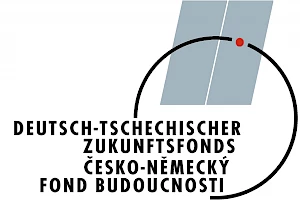 From the press release of the German-Czech Future Fund:
From the press release of the German-Czech Future Fund:
For months now, the public space has been dominated by news about a certain virus. It noticeably affects our private lives and at the same time we at the Future Fund are also aware of the long-term effects it can have on German-Czech relations - on the actors who are committed to them and also on the German-Czech border area.
We have therefore prepared some new special tenders and hope to use them to help mitigate the expected consequences of the pandemic and the measures associated with it. At the same time, we would like this to pave the way for new ideas for German-Czech activities.
We keep going!
Aid program for German-Czech networks in overcoming the Corona crisis
With this program, we would like to help organizations and individuals who have successfully implemented a German-Czech project supported by us in 2018-2020 and have found themselves in a difficult financial situation due to the current crisis. The support is especially aimed at artists, cultural institutions, associations and actors in the field of culture and youth work.
Application deadline: 15.1.2021
Help for the Border Area II
Border Area Social and Medical Mitigation Program
.
With this program we would like to mitigate the social and medical impact of the crisis on life in the German-Czech border area. We therefore support ACtivities of organizations that benefit those people who are particularly threatened by the pandemic.
Application deadline: 15.1.2021
Help for organizations caring for Nazi victims in the Czech Republic
.
Because of their age and the ordeals they endured, Nazi victims who are still alive are among the most vulnerable groups of people The Future Fund has already taken care of them in the course of compensation payments and continues to focus its attention on them.
The organizations will be approached directly.
Digital or outdoor?
Special funding for German-Czech projects in times of Corona
.
To ensure that the world of German-Czech cooperation does not come to a complete standstill, we would like to use this special call for proposals to facilitate the planning and implementation of projects that take place using digital formats or as an outdoor activity.
Application deadline:
- For applications for a grant of up to 4000 euros or 100 000 CZK continuously until 30.6.2021
- .
- For applications for a grant over 4000 euros or 100 000 CZK: at the usual quarterly deadlines (31.12.2020, 31.3.2021, 30.6.2021)
New times? New directions!
Theme of the Year 2021
.
With the theme of the year, we are responding to current social events and the challenges they bring. Within the framework of this special program, we support, with up to 70% of the total costs, projects that focus on the joint reflection of the Corona crisis and its consequences for German-Czech cooperation.
Application deadline: the usual quarterly deadlines (12/31/2020, 3/31/2021, 6/30/2021, 9/30/2021, 12/31/2021)
.
For the days and weeks ahead, let us wish each other strong health - and enthusiasm in shaping good German-Czech relations under these difficult conditions!
Your Future Fund
November 2020
Every Friday the Czech government reviews the list of countries with a low risk of infection with the corona virus. Germany has been on the list since last week, but this is no longer the case as of November 16.
The real effects are small. For foreigners, the necessity of an important reason for entry continued to apply. Only for those who had one, the procedure will now be more complex ( compulsory quarantine and testing).
You can find the details under Current Corona Rules in Saxony and Czech Republic.
The new entry rules for the Czech Republic will come into force on November 9th. For this purpose, the world will be divided into green, orange and red category countries, depending on how the COVID 19 pandemic develops in the country. Germany is in the orange category, so from there on you basically can enter the Czech Republic as before the pandemic. A scheme of the Czech Ministry of Health for entering the Czech Republic explains this very well.
But: As long as the state of emergency applies (for the time being until 20.11.), foreigners may only enter the Czech Republic for important reasons.
Further details can be found under Current regulations on Covid-19 in Saxony and Czechia.
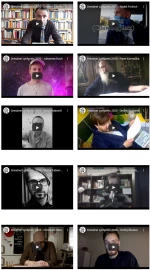 The Dresden Poetry Award is awarded every two years for poetry in German or Czech. This year the readings will take place online. The works are presented by their authors in videos, and the award ceremony on 8 November will take place in a zoom conference.
The Dresden Poetry Award is awarded every two years for poetry in German or Czech. This year the readings will take place online. The works are presented by their authors in videos, and the award ceremony on 8 November will take place in a zoom conference.
In addition to the main award, there will be an audience award donated by the Euroregion Elbe/Labe for the first time. Voting will also take place online.
To the videos of the authors To the vote
Why not take a look when the cultural sites are closed for the moment?
Following the agreement of all German states and the Federal Government, largely identical regulations to combat the corona pandemic will come into force nationwide from Monday. These are initially limited until 30 November.
These will lead to a so-called "lockdown light": almost all facilities for entertainment and leisure activities and all gastronomic establishments (except for takeaway sales) and all tourist accommodation will be banned.
In addition, a quarantine of 10 days will be mandatory from tomorrow on when entering the country from risk areas (including the Czech Republic). This can hardly be shortened: only after 5 days a corona test may be carried out, which will end the quarantine if the result is negative. As you normally have to wait at least 2 days for the result, you can shorten the quarantine by a maximum of 3 days.
All regulations in detail can be found in our overview of the corona rules in Saxony and the Czech Republic.
October 2020
After exceeding the incidence value of 50, the state capital Dresden issued a general decree with additional rules - following the Sächsische Corona-Schutz-Verordnung. These include, among other things, the obligation to wear a mouth-nose cover outdoors in the city center, in an area from the main train station through the old city and the main street bin to the entire Äußere Neustadt.
This comes into force on 27.10.
You can find more details in our updated overview of the Corona Rules in Saxony and the Czech Republic.
In the Czech Republic, measures the government is taking to slow the spread of the coronavirus are being tightened further. From Thursday, October 22, 2020, from 6 a.m., only shops with the basic range (groceries, drugstores, pharmacies) or shops with household supplies or animal feed will remain open. Service providers such as hairdressers and libraries are also closing. Schools or restaurants are still closed. You can currently find further details here .
30 years of the Saxon Switzerland National Park - a special day for the anniversary and further articles from the area of the national park, experiences and regional topics can be found in the 127th SandsteinSchweizer newsletter.
Source: Joint initiative of the Sachsenforst state enterprise, Saxon Switzerland National Park Administration and the Landschaf (f) t Zukunft e. V.
The planned general meeting of the Euroregion Labe on October 15th, 2020 was canceled due to the epidemiological situation in the Czech Republic.
Today, stricter regulations to fight the COVID 19 pandemic came into force in the Czech Republic. Cultural and sporting events are now completely prohibited.
The new regulations were announced last week, a few days after the state of emergency began, because the number of infections had not improved. This unplanned action does not increase confidence in the Czech government's forward-looking approach.
The currently effective regulations can be found here.
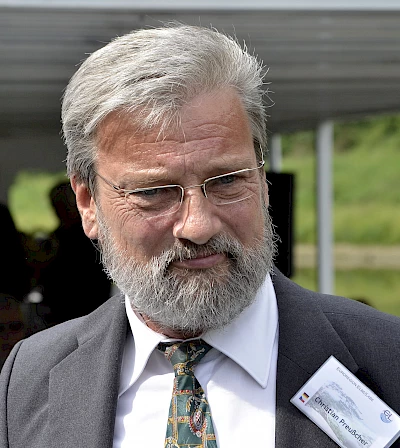 On Saturday, October 3rd, 2020, Christian Preußcher, long-time managing director of the Euroregion Elbe / Labe, died after a long illness.
On Saturday, October 3rd, 2020, Christian Preußcher, long-time managing director of the Euroregion Elbe / Labe, died after a long illness.
Christian Preußcher was a driving force behind the founding of the Elbe / Labe Euroregion and worked as its managing director on the German side from its founding in 1992 until he retired due to illness in 2014.
In this activity he has made an outstanding contribution to the development and intensification of diverse cross-border relationships between Saxony and the Czech Republic. On the other hand, as a convinced European, cooperation with other border regions and the growing together of Europe were important concerns to which he devoted himself wholeheartedly. It is fair to say that the Elbe / Labe Euroregion and probably also the Saxon-Czech relations would not be at the level they have achieved today without him.
We mourn the loss of this founding father of the Saxon-Czech euroregional cooperation and hereby express our condolences to his relatives.
The entire team of the Euroregion Elbe / Labe
September 2020
New joint website of the Europe Direct centers in the new federal states “ Reingeschlittert! 30 Years of East Germany in a United Europe ”with interviews, podcasts and interesting facts from the individual regions!
Do you know ... that Saxony has four Euroregions ? Euroregions are associations of districts and municipalities
at national internal and external borders. Four Euroregions have formed in Saxony: The Euroregions Neisse,
Elbe / Labe, Ore Mountains and Euregion Egrensis. The aim of these regional associations is the cross-border
To promote cooperation in the region in order to increase the competitiveness of the entire area.
Further information can be found in the press release
The Saxon Minister of Health Petra Köpping informed on Tuesday that Germans can stay in the Czech Republic for 48 hours without having to be in quarantine. Czech citizens are only allowed to stay in Germany for 24 hours without subsequent quarantine.
There are exceptions for commuters and direct neighbors
Commuters should be exempted from the quarantine requirement. Regular testing options continue to exist for them. In addition, people who live in the border region should continue to have neighborly encounters. In principle, Saxony wanted to treat the Czech Republic like a region in Germany in which such a difficult situation would arise.
Source: MDR Jump
On Wednesday, the whole of the Czech Republic, with the exception of the Ústí and Moravian-Silesian regions, was placed on the RKI's list of risk areas. These exceptions had caused some surprise, as they could not be justified by the development of infection rates alone. This is also shown by the current "traffic light" map of the Czech government (see map).
Now it is over: As Czech Foreign Minister Tomáš Petříček announced on Twitter, Germany will declare the entire Czech Republic a risk area today. This would have been decided at an extraordinary meeting of several federal ministries.
source: novinky.cz (in Czech)
More about the Corona rules in the Czech Republic and Saxony.
The Robert Koch Institute today declared the whole of the Czech Republic a risk area, with the exception of the Ústí and Moravian-Silesian regions. These exceptions are somewhat unexpected. It remains to be seen how long they will last.
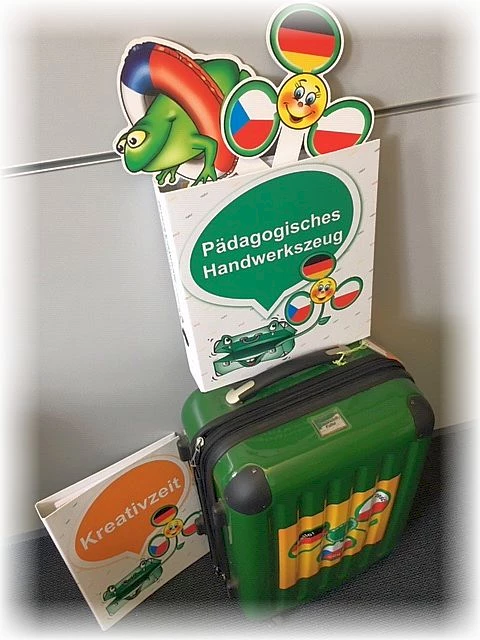
The Saxonian office for early neighbour-language education (LaNa) based in Görlitz has provided the offices of the Euroregions Egrensis, Erzgebirge / Krušnohoří, Elbe/Labe and Neisse-Nisa-Nysa with a neighbouring language kit for free lending. In the suit-case itself are among other things folders " pedagogical tools " in addition many suggestions, in order to discover the neighboring country with the children. With a variety of impulses, the pedagogical work in the day-care centers in the area of early neighborhood education in the border region can be improved.
If you are interested, please contact Mrs. Richter, telephone 0351 - 48 28 78 15 or by e-mail richter@elbelabe.eu.
Information on these play and learning materials can be found in the materials library at https://www.nachbarsprachen-sachsen.eu/de/materialpool.
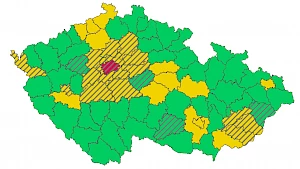 Due to the sharp rise in the number of infections and the resulting increasing difficulties in tracing infection chains, the Czech government also set all four districts in the Elbe/Labe Euroregion (Ústí, Děčín, Teplice and Litoměřice) to the second highest corona warning level on September 18th. According to the traffic light symbolism applied there, they therefore appear yellow.
Due to the sharp rise in the number of infections and the resulting increasing difficulties in tracing infection chains, the Czech government also set all four districts in the Elbe/Labe Euroregion (Ústí, Děčín, Teplice and Litoměřice) to the second highest corona warning level on September 18th. According to the traffic light symbolism applied there, they therefore appear yellow.
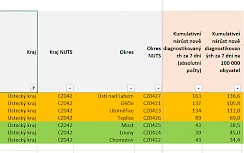 The number of new infections in the last 7 days, which is important for German decision makers, is also very high. In the district of Ústí it was 137 - calculated per 100,000 inhabitants. In Germany, the first measures are taken from 35 onwards, from 50 it's getting serious.
The number of new infections in the last 7 days, which is important for German decision makers, is also very high. In the district of Ústí it was 137 - calculated per 100,000 inhabitants. In Germany, the first measures are taken from 35 onwards, from 50 it's getting serious.
Due to these developments, it is expected that the whole of the Czech Republic will soon be declared a risk area by the Robert Koch Institute. Travellers from the Czech Republic would then have to be quarantined in Germany, including return travellers who have only been in the Czech Republic for a short time.
source: website of Czech Ministry of Health
More about the current corona rules in Saxony and the Czech Republic can be found here.
Despite the restrictions due to the COVID-19 situation, 150 Saxon and Czech young athletes and their coaches met in Bílina on Friday to test their athletic strength.
Due to the restrictions in force in the Czech Republic, this time the games took place only in three basic sports: Soccer - boys, Volleyball - girls, and Athletics for mixed teams. In each sport there were four teams in traditional colors, LABE team in blue, ELBE team in green, KRUŠNOHOŘÍ in red, and team ERZGEBIRGE in yellow.
The athletes were welcomed by the captain of the Ústí Oldřich district Bubeníček and the mayor of Bílina, Mrs. Zuzana Schwarz Bařtipánová, as well as Mr. Lipský, managing director Euroregion Labe.
In ideal weather, the individual competitions began at 11 a.m. in the stadiums FK Bílina, AK Bílina and in the Green Hall in Tyršová Street.
The athletics finished their competitions (60 m, distance, ball, 4x60 relay, 800 m and 4x800 m relay) first. After that, the soccer tournament ended. In our experience, the competitions in volleyball lasted the longest.
Results: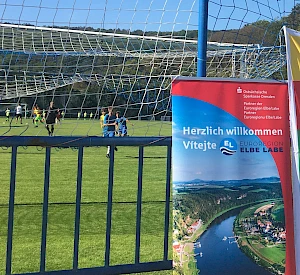
Soccer
- Erzgebirge
- Labe
- Krušnohoří
- Elbe
Athletics
- Erzgebirge
- Krušnohoří
- Labe
- Elbe
Volleyball
- Krušnohoří
- Labe
- Elbe
- Erzgebirge
The overall victory was won by the Euroregion Erzgebirge/Krušnohoří.
On September 11th, 2020, the binational local steering committee of the Euroregion Elbe / Labe gave the green light for German-Czech projects in the border area in the branch office of the Environmental Center Dresden eV. Four projects are financially supported with EU funding of around EUR 35,600.
You can find more detailed information on the approved projects here .
Yesterday the Robert Koch Institute classified the Prague city area as a risk area for corona infections. This means that persons who have been there in the last 14 days are generally obliged to remain in domestic quarantine for 14 days when entering Germany. This can be avoided by a fresh, negative corona test.
You can find more information on the regulations when entering Germany from risk areas here (in German or Czech only).
In the period from September to December 2020, the Aktion Zivilcourage eV organizes a series of online seminars as part of the voluntary training forum, which offer practical impulses on current and relevant educational topics around the topic of volunteering.
The seminars usually start at 6 p.m. and take place online via Zoom. You can take part in the seminar quickly and easily from anywhere and do not have to drive to the venue, which saves time and effort. All you need is a PC, tablet or smartphone.
Topics of the online seminars
- Introduction to association law - founding an association, tasks, rights and obligations of the association's board
- Introduction of finances in the club - accounting obligations and taxes in the club
- Project management - effectively organizing board meetings and discussions, formulation of goals and indicators, methods for seminars and workshops
- Human resource management
- Time management
- Recruiting - Methods and strategies for small and medium-sized clubs
- Donations, corporate volunteering and sponsoring - cooperate with companies
- Crowdfunding - from the idea to the campaign
- Online seminars for a better understanding of MS Office applications (Word, Excel, PowerPoint)
- Design of online seminars: focus on video moderation, tools and programs for working with groups
- Design of presentations for lectures and online seminars.
You can find an up-to- date overview of all online seminars and events, which are continuously updated, on the website: www.weiterbildung-ehrenamt.de .
Registration will be by e-mail: weiterbildungsforum-ehrenamt@aktion-zivilcourage.de or by calling 03501 460,882th
Source: Aktion Zivilcourage e. V., Lange Straße 43, 01796 Pirna, email: post@aktion-zivilcourage.de
"If you live in Dresden, Bohemia is practically on your doorstep. Ústí nad Labem and Teplice are closer than Chemnitz, Liberec is hardly further than Görlitz and Leipzig, Prague much closer than Berlin. And from the town of Wehlen it is just a few steps away. In spring 2017 I travelled for longer and several times in South and West Bohemia, in autumn 2018 I made two trips through the northern and eastern regions and another two days in Prague. Bohemia is mainly a region of small towns," says photographer Peter R. Fischer, who has been working in Dresden since 2008.
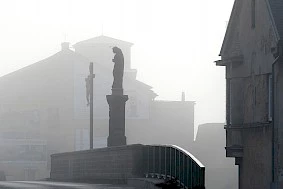 His photographs, he continues, "mostly come from smaller towns, small and occasionally large cities, rarely from landscapes. "Historical, important" motifs are not left out, but the focus here is on the search for one's own or new perspectives, the detection of unexpected connections. Apart from that, my eye is strongly devoted to the details that more or less tell how people deal with history, what has what value in the present, what an eye or no eye is there for, what is more vital or not".
His photographs, he continues, "mostly come from smaller towns, small and occasionally large cities, rarely from landscapes. "Historical, important" motifs are not left out, but the focus here is on the search for one's own or new perspectives, the detection of unexpected connections. Apart from that, my eye is strongly devoted to the details that more or less tell how people deal with history, what has what value in the present, what an eye or no eye is there for, what is more vital or not".
The exhibition is supported by the Euroregion Elbe/Labe.
August 2020
The Saxon Switzerland National Park Center invites you to an expert discussion on Saxon-Bohemian Switzerland "The Elbe - common natural heritage" on Thursday, September 10, 2020, 9:00 am to 3:30 pm. The event takes place in the National Park Center Saxon Switzerland in Bad Schandau. The free event, including moderation and discussion, will be fully interpreted simultaneously.
Registration until September 3rd, 2020
Invitation and program for download as well as information on the website of the organizer
Source: organizer
July 2020
The Saxon mountaineering choir "Kurt Schlosser" Dresden will give a guest performance on Sunday, August 16, 2020 in the Grosssedlitz Baroque Garden . From 5 p.m. the most beautiful mountain and folk songs from the ensemble's diverse repertoire will be heard under the baton of choir director Axel Langmann and conductor Christian Garbosnik. The program includes the legendary song of the mountains "La Montanara".
The organizer is the Elbe / Labe Euroregion. 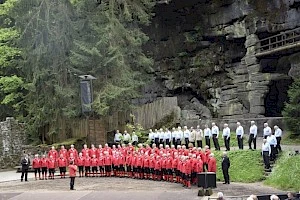
Tickets are available at the box office for 20 and 15 euros *. As Gabriele Löwe from the Baroque garden reports, there are enough chairs available. You are also welcome to bring blankets for extended seating.
* Only cash payments possible. The discount applies to pensioners, schoolchildren, apprentices, students, holders of the Dresden Pass or the volunteer pass, as well as people in the federal voluntary service or FSJ.
Photo: Manfred Döbler
The next submission deadline is July 24th. The application (by post and online), including a cost and financing plan with various attachments, must be submitted to the municipal association Euroregion OE / OE eV in Dresden with a meaningful project description with legally binding signatures from both cooperation partners.
 Further information can be found on our homepage under Funding / Small Project Fund.
Further information can be found on our homepage under Funding / Small Project Fund.
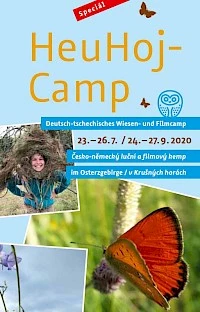 Green League Osterzgebirge e. V. and the Czech association Lužický horský spolek are organizing a German-Czech camp in the Eastern Ore Mountains in late July and late September.
Green League Osterzgebirge e. V. and the Czech association Lužický horský spolek are organizing a German-Czech camp in the Eastern Ore Mountains in late July and late September.
Registrations for the end of September are still possible.
The camp is open to adults and young people from the age of 17 who have fun in nature and in German-Czech encounters. Language skills are not a prerequisite for participation: hands, feet, openness and language mediators will ensure communication!
Registration using the online registration form at www.heuhoj.de or by email at heuhoj@gmail.com. More information on the website and on facebook.com/heuhoj .
Source: organizer
June 2020
On Friday, 19th of June, 2020, the Local Steering Committee of the Small Projects Fund in the Euroregion Elbe/Labe met in Ústí nad Labem. After the meeting in March had to be cancelled due to Corona, we were very glad to meet again in person.
The committee had six project applications with a total volume of 70,986.68 Euro for decision, three each from German and Czech side. These were all unanimously approved.
More detailed information on the approved projects can be found here.
From the press release of the German-Czech Future Fund:
The competition for the German-Czech Journalism Prize 2020 is open. Applications can be submitted until 30.6.2020.
In its fifth year, the German-Czech Future Fund, together with the journalist associations of both countries (DJV and Syndikát novinářů), is again awarding a total of eight prizes for outstanding journalists whose work arouses interest in the neighbouring country and contributes to a better understanding between Germans and Czechs through their differentiated and cliché-conscious reporting.
"The mutual perception is also currently strongly dominated by the Corona crisis, which unfortunately is also rekindling prejudices that were thought to have already been overcome, and is directing the focus of many media primarily towards Germany. This makes it all the more topical and urgent for us to offer this prize, which we would like to use to support journalists working across borders with an unbiased view," say Petra Ernstberger and Tomáš Jelínek, the managing directors of the German-Czech Future Fund.
Prizes will be awarded to the best German and Czech-language contributions of the past 12 months in the categories text, audio and multimedia (including TV). In addition, the special prize "Milena Jesenská" is awarded to a German or Czech contribution that focuses on the topics of moral courage, multicultural understanding and tolerance in a special way and with a contemporary relevance. With the special award for long-term outstanding journalistic activity, the organizers honor journalists or journalistic formats that have rendered outstanding services to more differentiated reporting on the neighboring country over a longer period of time.
The prize is endowed with 2000 Euros each, while the special award for long-term activity is an honorary award without prize money.
Contributions can be submitted by the authors themselves, or proposed by editorial offices or third parties. This year, for the first time, two entries per author and category may be submitted to the competition. A nomination by a third party is required for the special award.
The call for entries and the conditions of participation as well as further information on the award are available online at: www.deutsch-tschechischer-journalistenpreis.de.
A short video review of the last year can be found here: https://youtu.be/b6marzhVjq4.
Contact:
Silja Schultheis
Mail: silja.schultheis@fb.cz
GSM: +420 737 505 790
www.zukunftsfonds.cz
www.deutsch-tschechischer-journalistenpreis.de
"Our neighbors among us: How multilingual growing in Kita-day life can be supported?" - with this motto all interested parties to Saxon-Czech specialists and practice day as part of the are Czech-German Culture Days invited to Dresden. 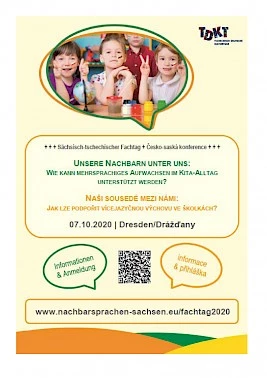
when: 07.10.2020, 10 a.m. - 4 p.m.
where: Saxon State Center for Political Education , Schützenhofstrasse 36, 01129 Dresden
Participants: Saxon, Czech and Polish actors from the field of pre-school education, in particular:
- Daycare professionals and daycare providers
- German / Czech / Polish native speakers who work in daycare centers in the respective neighboring country
as well as everyone interested in the topic.
Conference languages: German, Czech
You can find detailed information, the conference program and the option to register online at www.nachbarsprach-sachsen.eu/fachag2020 .
Source: Saxon State Office for Early Neighbor Language Education, Bahnhofstrasse 24, 02826 Görlitz
The Czech government decided this morning that the Czech borders with neighboring countries would be open again from noon. Entry and exit are possible without restrictions.
During a visit to the Karlovy Vary Region, Czech Prime Minister Andrej Babiš announced today, according to idnes.cz, that the government will hold an extraordinary meeting tomorrow morning at 7 a.m. to decide on the full opening of the borders with all neighbouring states. This should be effective from midnight, if it was up to him.
(source: idnes.cz)
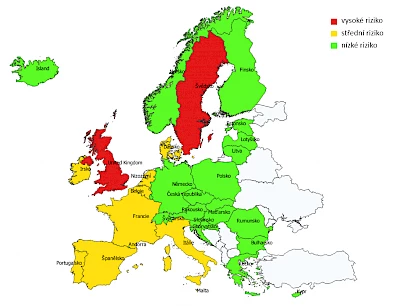 The Czech government installed today a system for classifying countries according to Corona risk, starting from June 15th. Safe countries are given the color green. Czech citizens can travel to and return from these countries without restrictions. It will also be possible to travel to the Czech Republic from these countries without restrictions.
The Czech government installed today a system for classifying countries according to Corona risk, starting from June 15th. Safe countries are given the color green. Czech citizens can travel to and return from these countries without restrictions. It will also be possible to travel to the Czech Republic from these countries without restrictions.
How lucky: Germany is green!
Countries marked in orange are a less safe, so foreigners still need a negative corona test to enter the Czech Republic from there. Traveling back from the countries marked in red, even Czechs will need a negative Corona test
(source: novinky.cz)
May 2020
Tomorrow once again some meetings along the Czech-German (and Polish) border will take placing, showing the strong desire for a real opening of the border. 12 locations are planned along the Saxon-Czech border (see map below). The Euroregion Elbe / Labe will be present at the Eulentor near Rosenthal. This time there will be a colloquium with lectures on rather different topics.
The Czech government decided today that from tomorrow, May 26th, there will be no continuous border controls at the borders with Germany and Austria, only random checks. However, the general restrictions for entering Czechia remain, i.e. the requirement for a negative corona test and a good reason to travel (you can find more information here).
There are also some Eurocity trains running between Berlin and Prague. The traffic will be expanded in June. The Nationalparkbahn/U28 does not yet run cross-border again.
(Source: landesecho.cz)
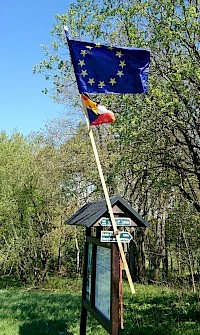 Everywhere along the Czech external border, people from the Czech Republic and neighbouring countries met yesterday - as they did two weeks ago - at the closed borders to demand it's opening. There were particularly many meetings on the German-Czech border. A map of all meetings can be found at www.hej-nachbar.de. A press release was published as well,
Everywhere along the Czech external border, people from the Czech Republic and neighbouring countries met yesterday - as they did two weeks ago - at the closed borders to demand it's opening. There were particularly many meetings on the German-Czech border. A map of all meetings can be found at www.hej-nachbar.de. A press release was published as well,
In the Euroregion Elbe/Labe the meeting took place between Špičák and Oelsen. This time about 120 people joined in. There was singing, talking, eating, drinking, sunbathing... The police on the Czech side was present, but did not intervene.
Both Saxon and Czech television were present this time:
Report in MDR Sachsenspiegel (DE)
Report in CNN Prima (CS, minute 25:00)
Further press reports:
Ústecký deník (CS)
Just like two weeks ago, people from the Czech Republic and Germany are meeting again this Saturday at the common border to send a signal about how much they miss the meeting with people from the neighbouring country and to call for an early opening of the borders.
In our region they will meet at the following two places:
- on the meadow between Oelsen and Krásný les below Špičák mountain, where the Euroregion will also be present,
Map - as well as on the meadow at the Žebrácký roh between Holzhau and Moldava.
Map
This is not a general demonstration against corona containment measures. All safety rules will be observed.
Next year the new funding period is to begin, also in the INTERREG area. For this purpose, the cooperation programme Saxony-Czech Republic is currently being developed.
In order to ensure that the funding priorities are not determined without taking into account the needs, we are interested in the feedback of potential project sponsors on which topics they could imagine projects, which is why a general survey is being conducted.
If you are interested in cross-border cooperation, think about project ideas or develop cross-border projects and want to carry them out with partners in the Czech Republic or Saxony, you can make an important contribution to the preparation of the programme with your information.
The German language version of the online survey can be found in the participation portal of the Saxon State Government under the following link:
https://buergerbeteiligung.sachsen.de/portal/sn-cz2020de/beteiligung/aktuelle-themen/1019849.
Before you start, one more technical note: On the start page of the survey, click on the link (top left) "to the questionnaire" to go to your own survey.
The survey starts on 11 May 2020 and will be active until June 5th, 2020.
From Monday, 11 May, it will be possible for all groups of people to cross the Saxon-Czech border at crossings which are currently only open to commuters and road freight traffic from 5 am to 11 pm.
At the same time, three more border crossings will be opened: Dolní Poustevna, Hřensko and Kraslice.
Source: https://www.mvcr.cz/clanek/od-11-kvetna-bude-vice-moznosti-kde-prekrocit-hranice.aspx
The mayor of Dolní Poustevna, Robert Holec, addressed a petition to the Czech government to open the Dolní Poustevna - Sebnitz border crossing for commuters. The petition demands a reasonable possibility to travel to work. Representatives of towns on the Czech and German sides of the Elbe/Labe Euroregion also demand that the border crossing be opened.
"The risk of the border closure being relaxed is not great compared to the impact on the lives of people who have to travel 150 km a day, because it is the same group of people who are affected by this concern and need, and the latter I have classified as more serious," said the mayor.
Since mid-March, the German-Czech border has only been passable in a few exceptional cases. This closing of the border has been criticized from various sides. Yesterday people from both countries met at six different places to send a signal that the border should be reopened as soon as possible. In the Euroregion Elbe/Labe, the meetings took place in Ostrov near Tisá and in Zinnwald/Cínovec. Some border crossings are said to have happened, without any intervention by the state.
Facebook-Group (with photos and discussion in DE/CS)
Just right for Labour Day in Corona times: As of June 30, 2019, 11,129 Czech citizens were employed in Saxony subject to social security contributions. In addition, there were 986 marginally employed persons who are not included in the following evaluations.
Most of these employees, namely 9,134, are cross-border commuters, i.e. they lived in the Czech Republic. This share of 82% commuters is much higher than, for example, for Polish employees in Saxony (53%).
If you look at the sectors, it is not - as one might expect - the hotel and restaurant industry or the health care sector that are in first place, but the manufacturing industry, which employs almost a quarter of the Czech workforce.
In Euroregion Elbe/Labe, 3,307 Czech citizens worked on the German side, of which 2,629 are cross-border commuters. In addition, 350 Czech* nationals were marginally employed here.
In the whole of Germany, approx. 35,700 cross-border commuters from the Czech Republic are employed (in Bavaria there are probably more than 25,000). This shows the extent of the effects of the current border closures.
More interesting information (also on Polish employees in Saxony) can be found in the DGB's short info of 28.04.2020 (PDF, German only).
April 2020
On Tuesday afternoon some forest was on fire in Zinnwald, about 350m from the border on Czech territory. Since the fire was not accessible from the German side, German fire brigades were permitted to attack from Czech territory, helping the Czech fire fighters.
The fire brigades of Altenberg, Zinnwald, Duchov, Teplice and Dubi then worked successfully together. The fire was extinguished in the evening.
The cross-border cooperation of the fire brigades (and the control centres) worked well here. Altenberg's mayor Thomas Kirsten also see a joint exercise last autumn as a reason for that.
We are very glad that the many years of efforts to improve cooperation between Saxon and Czech fire brigades have borne fruit here.
Source: Sächsische Zeitung (online, 29.04.2020) (unfortunately only in German and behind paywall)
Interessanting video about that (sorry, just on Facebook): https://www.facebook.com/hzsulk/videos/273606083802160/
Saxony to the Czech Republic (and back)
From April 27th, 2020, EU citizens can enter the Czech Republic under the following conditions:
- for the purpose of economic activity (with evidence),
- maximum 72 hours stay in the Czech Republic,
- upon presentation of a negative corona test that is a maximum of four days old.
The same applies to EU students in the Czech Republic.
Furthermore, various exception rules apply for employees in critical infrastructure and in the transport industry, for cross-border commuters and if there are valid reasons.
You can find the exact rules and all necessary bureaucratic stepshere .
The background to the relaxation was a court ruling that forced the Czech government to make changes.
Czech Republic to Saxony (and back)
Czech citizens (and foreigners with a residence permit) are allowed to leave the Czech Republic without hindrance. To return without a quarantine requirement, you also need a negative Cotona test.
However, entry into Saxony is restricted. Anyone entering Saxony from the Czech Republic must be in quarantine for 14 days. Exceptions are initially:
- Employees in the transport industry,
- Employees in critical infrastructures,
- regular cross-border commuters,
- Employees for at least 3 weeks in German companies (with appropriate measures),
- People with particularly important reasons for travel.
But everyone else can also enter Saxony without quarantine if they have not been abroad for more than 48 hours .
The trade unions in the border triangle of Saxony, the Czech Republic and Poland today published a joint declaration on the situation in the border region:
"We call on the governments of Germany, Poland and the Czech Republic to immediately restore freedom of movement on the cross-border labour market in the border triangle for all cross-border workers. Border closures are not an instrument to combat corona, but an acute threat to jobs and livelihoods of cross-border workers," said Markus Schlimbach, Chairman of the DGB District Saxony.
The trade unions note with annoyance that European cohesion is currently falling by the wayside. Those who suffer most are the employees in the common cross-border labour market. In the Free State of Saxony there are more than 11,000 employees from the Czech Republic and about 20,000 from Poland who are subject to social security contributions. Among them are more than 9,000 cross-border commuters from the Czech Republic and more than 10,000 from Poland.
Due to the quarantine regulations in the Czech Republic and Poland, it is hardly possible for them to come to Germany to work. The countries are violating the right to free movement. The border crossers are threatened with dismissals!
The IGR Elbe-Neisse was founded in 1993 and works for a social and fair development of the border region. It consists of the DGB District Saxony, the regional divisions of the Bohemian-Moravian Confederation of Trade Union Associations (ČMKOS), the Polish OPZZ and the NSZZ "Solidarność".
Translated with www.DeepL.com/Translator (free version)
On April 6th, the Local Steering Committee decided (this time by circulation procedure due to the Corona crisis) to support 14 projects from the Small Projects Fund in the Elbe/Labe Euroregion. Of these, 8 projects from the Czech Republic and 6 from Saxony had been applied for, and no project was supported.
It is unclear for many project sponsors whether they will be able to carry out their activities as planned. In each individual case, the Euroregion tries to find solutions to ensure funding.
More information on the individual projects can be found here (in German only).
The German-Czech Lawyer's Association has published a sharp criticism of the closing of the border between the Czech Republic and Germany on their website (in German only). We from the Euroregion Elbe/Labe are also quite unhappy with the current situation.
Here the Announcement of the German-Czech Future Fund :
Dear friends of the German-Czech Future Fund,
spring is here and shows itself from its best side beyond the closed borders - as if to remind us that even in times of crisis we can rely on beautiful things :-)
Reliability is essential in these weeks of uncertainty. Because if the current crisis reminds us of one thing every day, it is that it cannot be tackled alone. What is needed is cooperation and cohesion from all of us, in politics as well as in civil society.
In the Future Fund, we asked ourselves where our help is now most urgently needed and how we can quickly and unbureaucratically help those who have been hit hardest by the pandemic in the German-Czech community. We are providing them with special funding totaling 373,000 euros.
We dedicate part of this to organizations that take care of the surviving Nazi victims in the Czech Republic, who play a key role in building trusting relationships between Germans and Czechs. Because of their age and the agony they suffered, they are most at risk from the pandemic and now require special protection.
We provide further support to the often freelance bridge builders who have made a significant contribution to improving German-Czech relations in recent years and who are now feeling the economic effects of the crisis. We have advertised a special funding program for bridge builders for them.
And finally, we would now like to help those who provide social and medical help in the German-Czech border region - in a region where a lot of trust has been built between the citizens of our two countries over the past 30 years, and that is not being jeopardized may due to the social and structural effects of the crisis, which could be particularly noticeable here.
If you know of organizations in the German-Czech border area that offer help for particularly vulnerable people and could use financial support, please let us know and please enter your information directly into the form of our special funding program for the border regions .
We are confident that together we will be able to offer reliable support to those who need it most now.
You too can stay confident - and healthy!
Your German-Czech Future Fund
1. General
The simplifications mentioned below do not represent a change in the existing legal framework for the implementation of cooperation projects. They are only intended to limit the negative effects of the COVID-19 crisis on program implementation.
If you want to take advantage of one of the aforementioned facilitations, you must credibly explain the connection between the current situation of your project and the corona crisis. On the basis of documents, you must be able to prove that you were unable to influence the costs incurred and that you took all due care to avoid or at least minimize the costs. You submit the documentation to the supervisory authority (SAB or CRR) together with the settlement of the expenses. When assessing the facts, the success of the project as a whole is primarily assessed. This includes the implementation of the activities, the achievement of the project goals and project results.
Even under the more difficult conditions, the regulations of the grant agreement, the joint implementation document including award regulations and the relevant regulations of the European Union continue to apply.
2 Funding of expenses for project activities
- Did you incur financial expenses for activities for your project that could not or only partially be carried out due to the COVID-19 crisis (e.g. room rental despite a canceled event, travel expenses, no reimbursement of participation fees already paid by the Organizer, cancellation fees), these expenses can be subsidized.
- If you are reimbursed or compensated for the costs incurred by another body (e.g. from insurance, short-time working allowance, etc.), this must be reported to the SAB / CRR. In this case, the eligible expenses will be reduced by the amount paid by third parties.
- Expenses that may arise in connection with the implementation of project activities in an alternative format (e.g. virtual meetings, e-learning and the like) must make a decisive contribution to the project objectives. They must be adequately documented and justified.
- Expenses for products or services that were planned for a project activity but can now be used at a different time or for another activity outside the project due to the COVID-19 crisis are not subsidized. This applies, for example, to items of equipment, gifts or prizes for competitions that were purchased by the beneficiary and are now used for another purpose.
3 Implementation of project activities
- Changes to the overall project are to be reported to SAB by the LP before the end of the project term.
- About changes that do not have any significant impact on the achievement of the project goals (e.g. postponement of events, change of the format of an event, such as "online" instead of "on site", extension of the project duration in order to catch up on activities ) the SAB decides.
- About major changes, such as B. the change of the expenditure and financing plan or the change of the project activities, which significantly impair the achievement of the project goals, is decided by the monitoring committee.
- Project activities that could not be implemented but are necessary to achieve the project objective must be made up for or replaced in consultation with the SAB.
- At this point it is expressly pointed out that the regulations of the procurement law according to the grant agreement as well as the joint implementation document - if they are to be applied - must be observed for the changed project activities.
4 deadlines at the supervisory authority
- Inform your supervisory authority (SAB or CRR) if you cannot meet deadlines. New appointments will be arranged with you unbureaucratically.
- If you urgently need a withdrawal, report it to your supervisory authority. Your current statement will be rescheduled or you will be asked to submit an additional payment request.
5 small project funds
For the beneficiaries of small projects, the regulations in paragraphs 1 to 4 apply analogously, whereby the notifications and information mentioned therein must be submitted to the respective responsible Euroregion. If you have any further questions, we recommend that you contact the relevant project secretariat in your Euroregion.
© Sächsische Aufbaubank - Förderbank -. All rights reserved. 04/09/2020
March 2020
If projects cannot be carried out as planned due to the Corona crisis, the following regulations apply:
Costs for the cancellation of external orders due to the Corona problem are eligible costs. They can be listed in the billing list.
If events are postponed to another point in time that is no longer in the original project period, an amendment agreement will be made to the grant agreement in order to extend the project period.
If planned events are held at a different time and exceed the approved budget due to cancellation costs, the local steering committee will propose a resolution to increase the funding amount (which will certainly also be approved). However, this is only possible if the maximum amount of 15,000 euros has not yet been exhausted.
You can of course contact us at any time if you have specific questions in connection with a project. It is best to write an email , we mostly work from home.
The Coordination Centre German-Czech Youth Exchange - Tandem Pilsen is looking for a volunteer with residence in Germany for a stay of 12 months (1 September 2020 to 31 August 2021) for the project ahoj.info.
At the same time Tandem Regensburg is looking for two volunteers with residence in the Czech Republic for the project. The volunteer service is carried out within the framework of the European Solidarity Corps (formerly Erasmus+ / European Voluntary Service).
The Elbe / Labe Euroregion has been promoting cross-border cooperation between Saxony and the Czech Republic for almost 28 years. This is implemented by a large number of active members in associations, municipalities and other institutions.
All interested parties who would like to find out more about the possible support of the Euroregion Elbe / Labe for cross-border projects, who are looking for individual advice on contact placement and financial support, are cordially invited to an information event in Dippoldiswalde. When?
On Wednesday, March 25th, 2020, at 6 p.m., in the Dippoldiswalde Park Halls (Small Hall), Dr.-Friedrichs-Straße 25, 01744 Dippoldiswalde.
During the event, other options for supporting cross-border projects with the Czech Republic will be discussed and your questions will be answered.
In order to better plan the event, please register with Ms. Viera Richter by March 19, 2020 at richter@elbelabe.eu or 0351-48287815.
February 2020
A young woman wanders through the family jungle and haunts the end of a relationship, constantly trying to escape the torrent of everyday life. She moves from the Czech Republic to Germany and travels to London, where she plunges into the nightlife. She fantasizes about a bank job and looks for a job as a coach driver. We read of bursts and outbursts of toxic loves and strange therapy sessions. Desperate by her unsuccessful attempts to integrate, she finally makes a radical decision: She moves into a wardrobe. Sensitive and with a lot of humor, Tereza Semotamová tells of the absurd search for your own path in a world in which nobody knows exactly where to go.
 Tereza Semotamová (* 1983 in Boskovice) is a prose writer, publicist and translator. She studied screenwriting and dramaturgy at the Janáček Academy for Music and Performing Arts, German studies at Masaryk University in Brno and completed her doctorate with a dissertation on German radio plays from the 1950s. She writes radio plays, features and columns, translates German-language literature into Czech, teaches and works for the German-Czech platform já-du.
Tereza Semotamová (* 1983 in Boskovice) is a prose writer, publicist and translator. She studied screenwriting and dramaturgy at the Janáček Academy for Music and Performing Arts, German studies at Masaryk University in Brno and completed her doctorate with a dissertation on German radio plays from the 1950s. She writes radio plays, features and columns, translates German-language literature into Czech, teaches and works for the German-Czech platform já-du.
Photo: Richard Klíčník
The reading will take place on April 21st at 7.30 p.m. in the Dresden Central Library (in the Kulturpalast, Schlossstrasse 2). Admission is free.
A cooperation between the Euroregion Elbe / Labe, Dresden City Libraries, the Czech Literature Center and the Czech Center Berlin. Under the auspices of the Consul General of the Czech Republic in Dresden, JUDr. Markéta Meissnerová.
An important item on the agenda was the status of the preparation of the new funding program in the area of cross-border cooperation. A joint working group was set up for this purpose, made up of the chairmen of the two Euroregions, their representatives and their managing directors. For the Ústecký kraj region, representatives from the regional development department will be there.
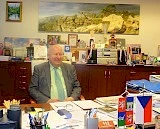 The new managing director of the Euroregion Krušnohoří, Ing.Petra Konečná, introduced herself at the meeting. She is the successor to František Bína. Captain Oldřich Bubeníček thanked him for his many years of work and presented him with the captain's medal with a memorial letter.
The new managing director of the Euroregion Krušnohoří, Ing.Petra Konečná, introduced herself at the meeting. She is the successor to František Bína. Captain Oldřich Bubeníček thanked him for his many years of work and presented him with the captain's medal with a memorial letter.
Read the press release from the Ústí district administration.
The European Solidarity Corps enables a new (that means second) volunteer position at the cultural centre Řehlovice in the Czech Republic. This volunteer position is available for six months from 01.03. to 31.10.
Experience an exciting summer full of art, culture, politics and society on the farm. During your time at the cultural centre, you will be part of various projects, experience international encounters and help to organise them. We are looking for help with public relations, planning and implementation of the projects, practical activities on the farm and creative input and expression.
We support accommodation, travel costs, seminars, food etc. and you will receive some pocket money.
Application to: andre.schmahl@posteo.cz
Questions can also be sent via Instagram @kulturdaca
January 2020
Application deadline: February 28, 2020
Further information (please save forms before filling in):
Applications by post and as PDF by email to:
Dr. Astrid Winter
Institute for Slavic Studies
All students who are regularly enrolled at a German university can apply. If you are paying yourself, please contact the respective summer school directly.
Would you like to learn more about cross-border cooperation?
Do you speak German, Czech and possibly also English?
Are you communicative and open for new experiences?
A volunteer position for six months is available now.
Your tasks:
- Support with the organisation of the annual event
- Publication of news, objectives and achievements of cross-border projects
The position is advertised in cooperation with the Interreg Volunteer Youth initiative for young Europeans aged 18-30. The coordinating organisation AEBR offers you a financial support of 28 € per day and helps you with travel expenses and insurance.
Applications to kontakt@sn-cz2020.eu.
More information about the IVY initiative can be found under this link: https://www.interregyouth.com/.
Source: SAB
The Collegium Bohemicum in Ústí nad Labem is looking for a new cultural manager. One of the main tasks would be the organization of the Czech-German cultural days on the Czech side.
You can find more information on the website of the Collegium Bohemicum .
Applications for the funding of German-Czech small projects from the small project fund of the Euroregion can be submitted until January 31st. The next submission deadline is May 1st, 2020. You can find all dates here .
European Academy Berlin: This year again, 14 young professionals will meet selected experts in a series of workshops in order to receive practical recommendations, ideas and suggestions for their future careers.
This year's theme ties in with the current challenges and approaches that arise from climate change for our society, for the economy and for politics. The following three workshops will take place under the focus on " Sustainable Business & Lifestyle - Czech and German Answers ":
- from March 12th to 15th, 2020 in Berlin,
- from June 18 to 21 in Prague as well
- from September 24th to 27th in a German and a Czech town in the border region
Young professionals from Germany or the Czech Republic who want to network across borders and professions and who want to deal with current political and social issues can apply by January 31, 2020.
Application requirements are at least three years of professional experience and very good knowledge of the English language.
The advertisement can be found in the attachment and here .
The project is funded by the German-Czech Future Fund.
12 / 372
ProCache: v401 Render date: 2025-11-02 09:20:18 Page render time: 7.4318s Total w/ProCache: 7.4402s


